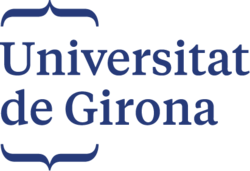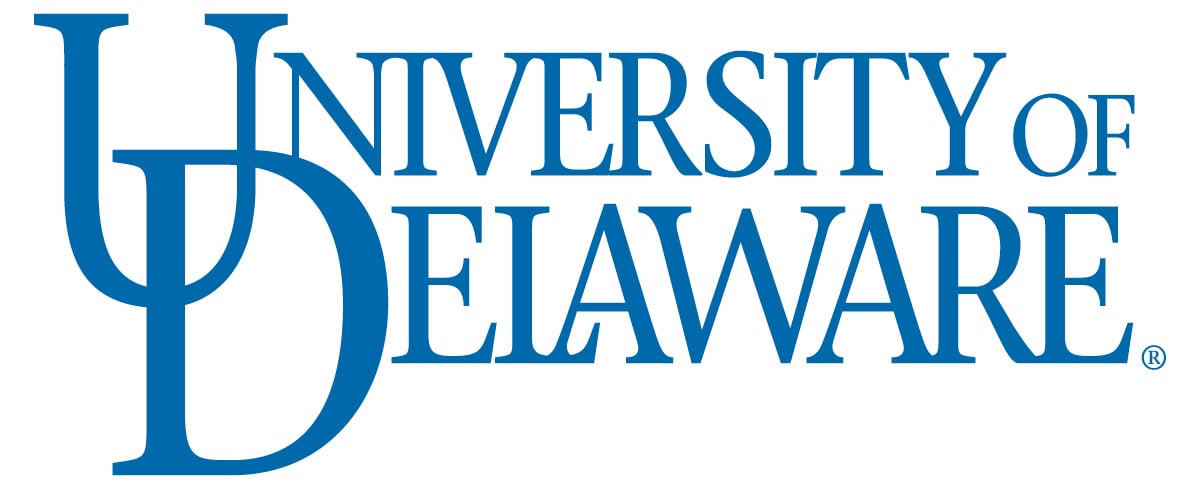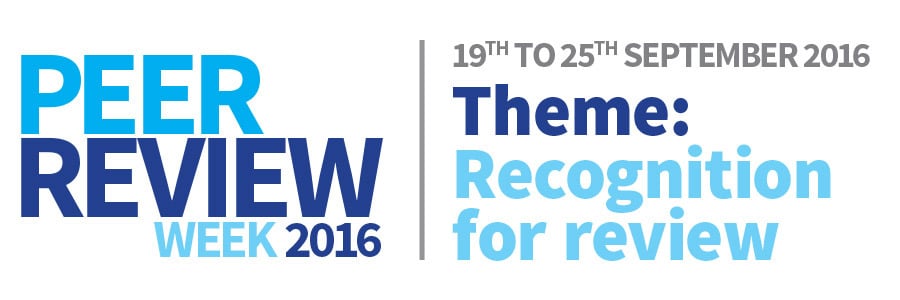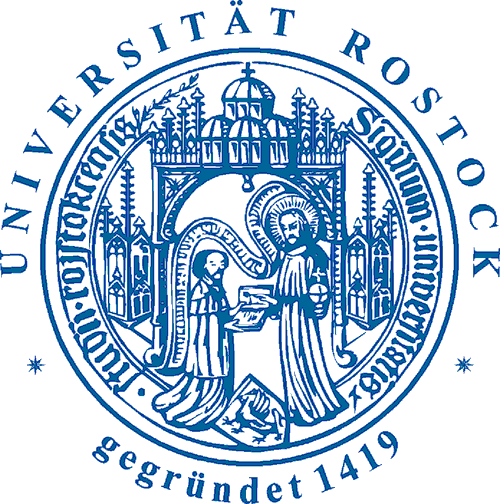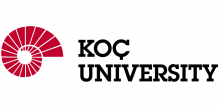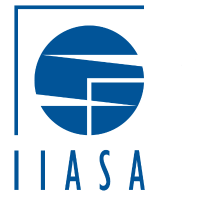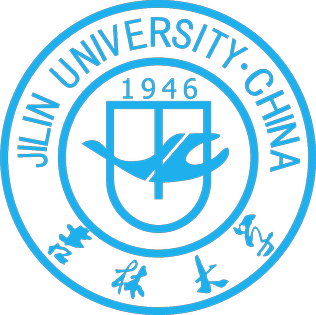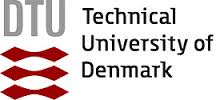
Journal Menu
► ▼ Journal Menu-
- Nutrients Home
- Aims & Scope
- Editorial Board
- Reviewer Board
- Topical Advisory Panel
- Instructions for Authors
- Special Issues
- Topics
- Sections & Collections
- Article Processing Charge
- Indexing & Archiving
- Editor’s Choice Articles
- Most Cited & Viewed
- Journal Statistics
- Journal History
- Journal Awards
- Society Collaborations
- Conferences
- Editorial Office
Journal Browser
► ▼ Journal BrowserNeed Help?
Announcements
15 April 2024
Nutrients | Call for Special Issue Proposals
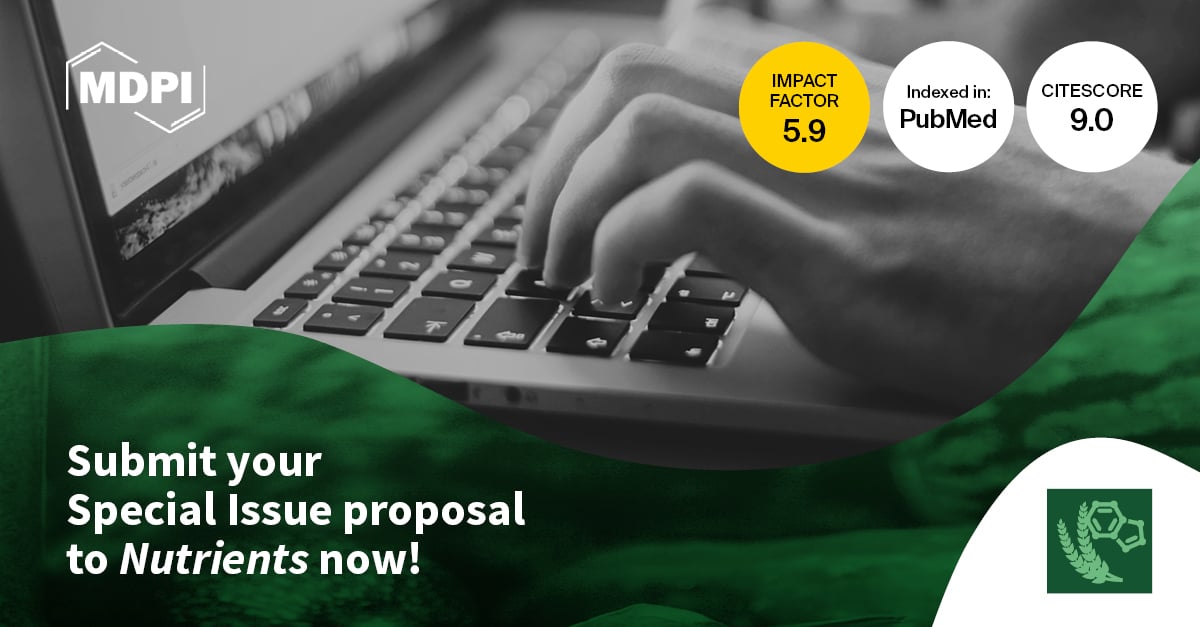
Nutrients (ISSN: 2072-6643) is an international, peer-reviewed, open access advanced forum for publishing studies related to human nutrition.
The Nutrients editorial team is pleased to announce an open call for Special Issue proposals. This Special Issue will allow a group of authors to work on an interconnected set of papers on an innovative topic. We welcome high-quality proposals that will be evaluated in an ongoing selection process throughout the year.
In order to ensure that the topic of your proposal is within the scope of Nutrients, please read its aim and scope at the following website: https://www.mdpi.com/journal/nutrients/about.
Proposals for Special Issues should be sent to the Editorial Office or submitted via the following link: https://www.mdpi.com/journalproposal/sendproposalspecialissue/nutrients.
The following information should be provided in a proposal:
- A 100–200-word summary that clearly states the significance, novelty, technical advancement, and adherence to the scope of the journal of the proposed topic;
- A list of 5–10 keywords related to the topic;
- A brief resume of the proposed Guest Editors, together with their information (title, name, email, affiliation, personal website, and keywords of their research interests);
- A proposed submission deadline (a Special Issue will usually be open for submissions for 6–8 months);
- A list of at least 20 potential contributors or eight planned papers.
As a Guest Editor, you would be responsible for:
- Inviting your peers to submit papers to be published in your Special Issue. These papers will be able to take advantage of the high publicity offered by our open access publishing, our rapid and high-quality peer review process, and immediate publication after acceptance;
- Checking the suitability of abstracts/manuscripts submitted to the Special Issue;
- Making pre-check decisions regarding whether to send a new submission to peer review;
- Making final decisions regarding accepting a paper based on peer review outcomes.
As a Guest Editor, you would have the following privileges:
- A certificate of recognition as a Guest Editor of Nutrients;
- The ability to publish one feature paper in your Special Issue;
- The ability to invite authors to submit high-quality papers to be published in your Special Issue with discounts;
- If the Special Issue is successful and features at least 10 manuscripts accepted after full peer review, we can organize it into a printed book and send you a free copy as a gift.
The Editorial Office will set up the Special Issue website, arrange the promotional material, assist with invitations for paper contributions, and handle the administrative tasks associated with peer review, including inviting reviewers, collating reports, contacting authors, and arranging professional production before publication.
Please do not hesitate to contact the Editorial Office for further details and clarification.
We look forward to receiving your proposals.
Nutrients Editorial Office
2 April 2024
MDPI Insights: The CEO's Letter #10 - South Korea, IWD, U2A, Japan

Welcome to the MDPI Insights: The CEO's Letter.
In these monthly letters, I will showcase two key aspects of our work at MDPI: our commitment to empowering researchers and our determination to facilitating open scientific exchange.
Opening Thoughts

Left to right: Dr. Jisuk Kang (Scientific Officer, MDPI), Stefan Tochev (CEO, MDPI), and Dr. Giulia Stefenelli (Chair of Scientific Office Board, MDPI), during media meetings at Prain Agency office in Seoul, South Korea.
Visit to Seoul, South Korea
During my recent visit to South Korea, I had the privilege of meeting various stakeholders, including representatives of government, research institutions, and academia, to understand their needs and communicate MDPI’s commitment to accessible science. Accompanied by my colleagues Dr. Giulia Stefenelli and Dr. Jisuk Kang, I engaged with the Korean scientific community, which is increasingly embracing open access (OA).
As the leading OA publisher in South Korea, MDPI is trusted by local authors and in 2023 enjoyed an approximately 30% share of the OA market. South Korea ranks sixth globally for MDPI in terms of research papers submitted and published.
MDPI and South Korea by Numbers
As at 30 March, over 76,000 MDPI articles have been authored by individuals affiliated with Korean institutions. We have over 1,800 active editorial board members (EBMs) from South Korea, with more than 880 EBMs having an H-index between 26 and 50, including 10 serving as Chief Editors.
“South Korea is the sixth-largest contributor to our total publications”
Over the past five years (2019–2023), nearly 120,000 authors affiliated with South Korean institutes have published with MDPI. Specifically in 2023, we received approximately 25,000 submissions from South Korean authors, publishing close to 13,000 articles, resulting in a rejection rate of 47.4%, which is not far below MDPI’s overall rejection rate of 56.4% in 2023.
Institutional Partnerships with South Korea
I am pleased to share that MDPI has more than 825 institutional partnerships worldwide, with 12 in South Korea, including Kyunghee University, Chung-Ang University, and Inha University, among others.

Left to right: Dr. Jisuk Kang (Scientific Officer, MDPI), Dr. Giulia Stefenelli (Chair of Scientific Office Board, MDPI), and Stefan Tochev (CEO, MDPI) fielding media questions at Prain PR Agency office in Seoul, South Korea.
Over the past three years (2021–2023), we have had some of the most prestigious academic universities ranked among the top 10 Korean institutions publishing with MDPI. Seoul National University had the highest number of publications with MDPI during those three years, publishing nearly 6,000 papers. Universities such as Korea University and Yonsei University also rank among the top 10 Korean institutions publishing with MDPI.
MDPI Hosts Seminar for Academia and Media
As the world’s leading OA publisher, MDPI is actively democratizing science. This is reflected in the seminars we hosted on 21 March to address questions about our editorial processes and ethical standards. The visit garnered media coverage, reflecting our mission to providing high-quality services and fostering open dialogue in the community.
“MDPI is actively democratizing science”
MDPI in the News

Stefan Tochev (CEO, MDPI) leading a seminar on OA and MDPI at Prain PR Agency office in Seoul, South Korea.
Media coverage generated by our visit to Seoul included the following stories:
“Open access is an unstoppable trend…it will lead the development of the knowledge ecosystem.”
I greatly appreciate the contributions of everyone who took the time to meet with us, share their stories, and hold us accountable for continuing to provide high-quality publishing services while identifying areas for improvement. I am also excited to announce that we have opened an MDPI office in Seoul and will release a press release on MDPI.com, with details, by the end April 2024. The purpose of the office is to establish a local presence to connect with and support the South Korean academic community through institutional partnerships, conferences, author workshops, stakeholder communications, and more.
Impactful Research

Featured Articles on Women’s Leadership and Healthcare
In celebration of International Women’s Day (8 March 2024), MDPI curated a collection of research articles on various topics, including women’s leadership, reproductive health, preventive healthcare, and a selection of articles from our journal Women.
Women’s Leadership
- Women Entrepreneurship and Sustainable Development: Bibliometric Analysis and Emerging Research Trends
Sustainability 2022, 14, 9160. https://doi.org/10.3390/su14159160 - Refugee Women Business Mentors: New Evidence for Women’s Empowerment
Sustainability 2022, 14, 9154. https://doi.org/10.3390/su14159154 - Women and Leadership in Higher Education: A Systematic Review
Soc. Sci. 2023, 12, 555. https://doi.org/10.3390/socsci12100555 - Understanding Needs and Potentials for Gender-Balanced Empowerment and Leadership in Climate Change Adaptation and Mitigation in Africa
Sustainability 2022, 14, 9410. https://doi.org/10.3390/su14159410 - Challenges Women Experience in Leadership Careers: An Integrative Review
Merits 2023, 3, 366-389. https://doi.org/10.3390/merits3020021
Women’s Reproductive Health
- Recreational Female Athletes’ Understanding of and Perceived Impact of the Menstrual Cycle on Physical Performance, Mood, and Sleeping Behaviour
Women 2023, 3, 445-456. https://doi.org/10.3390/women3030034 - Difficulties in Adaptation of the Mother and Newborn via Cesarean Section versus Natural Birth—A Narrative Review
Life 2023, 13, 300. https://doi.org/10.3390/life13020300 - The Main Theories on the Pathogenesis of Endometriosis
Int. J. Mol. Sci. 2023, 24, 4254. https://doi.org/10.3390/ijms24054254
Women’s Preventive Healthcare
- Insulin Metabolism in Polycystic Ovary Syndrome: Secretion, Signaling, and Clearance
Int. J. Mol. Sci. 2023, 24, 3140. https://doi.org/10.3390/ijms24043140 - Assessing Barriers Encountered by Women in Cervical Cancer Screening and Follow-Up Care in Urban Bolivia, Cochabamba
Healthcare 2022, 10, 1604. https://doi.org/10.3390/healthcare10091604 - Updates on HPV Vaccination
Diagnostics 2023, 13, 243. https://doi.org/10.3390/diagnostics13020243
Featured Articles in MDPI Journal Women
Below are a few articles from Women, our journal focused on women’s health, the social determinants of health, and the healthcare system that serves women. The aim of Women is to encourage academics to publish their experimental and theoretical results in detail, to aid reproducibility, and in an engaging style, to aid comprehensibility.
- Premenstrual Syndrome and Exercise: A Narrative Review
Women 2023, 3, 348-364. https://doi.org/10.3390/women3020026 - Increasing Awareness of the Human Papillomavirus (HPV) Vaccine for Women 18–45 Years of Age
Women 2023, 3, 365-373. https://doi.org/10.3390/women3030027 - Addressing Women’s Needs with Human Immunodeficiency Virus (HIV) and Enhancing the Visibility of Pharmacists in the Public Health Arena
Women 2022, 2, 346-352. https://doi.org/10.3390/women2040032
Inside MDPI

Championing Women’s Healthcare and Access to Healthcare Information
MDPI colleagues from our offices joined in celebrating #IWD2024. In doing so, we emphasized key missions that encompass:
- Empowering women to assume leadership and decision-making roles in both business and science.
- Helping women and girls make informed decisions about their health.
- Recruiting and developing female talent and fostering inclusive workplace environments.
“We are thrilled to recognize the accomplishments of women scientists”
I am proud to see our colleagues enthusiastically supporting the International Women’s Day call to ‘Inspire Inclusion!’ The heart-hands in the collage below symbolize our appreciation of the achievements of women researchers and the recognition of the trailblazers who have courageously made a mark on societies past and present.

We are thrilled to recognize the accomplishments of women scientists through our many MDPI awards and by highlighting success stories. As inspirational figures, female scientists are paving the way for the next generation of women aspiring to pursue careers in engineering, life sciences, computing, and various other STEM fields.
“I consider myself lucky because I work with incredibly talented women who inspire me every day.”
– Dr. Alessandra Pasut, Winner of MDPI's ‘Biology 2023 Young Investigator Award’
“It’s really important to find a supportive and enabling environment in which to do your science; it would have a big impact on you as a person and on your scientific outputs.”
– Dr. Rhea Longley, Winner of the ‘Pathogens 2023 Young Investigator Award’
Open-access publishing, in particular, allows early-career women researchers to share their work more widely, potentially attracting mentorship opportunities and collaborations. This support is crucial for career development and advancement.
Coming Together for Science

MDPI Joins United2Act in Collective Fight to Stop Paper Mills
In my February 2024 CEO Letter, I highlighted some of our recent initiatives aimed at bolstering our commitment to research integrity, including joining the STM Integrity Hub and expanding our Research Integrity and Publication Ethics team (RIPE). Continuing our efforts in coming together for science, I am pleased to share our participation in the United2Act initiative.
The text below is taken from our official announcement:
United2Act represents an international group of stakeholders in the publishing industry committed to addressing the collective challenge posed to research integrity by paper mills.
Scientists and academic publishers have increasingly noted the alarming proliferation of paper mills, recognized as fraudulent entities seeking to manipulate the publication process for financial profit. These entities engage in fraudulent practices such as falsifying or fabricating data, selling co-authorship of fake papers, manipulating peer review, and including inappropriate citations. These actions pose a significant threat to the integrity of the scholarly record, prompting widespread concern among those involved in the academic community.
MDPI has been actively contributing to combat the undermining of the scientific record. Our editors employ a set of tools to detect potential ethical breaches within a manuscript and to tackle the issue of fake papers.
United2Act’s consensus statement is the outcome of a virtual summit held in May 2023. It involved the participation of research bodies, publishers, researchers/sleuths, universities, and publishing infrastructure from 15 countries and resulted in a Consensus Statement outlining five key areas of action for all stakeholders:
- Education and awareness
- Improve post-publication corrections
- Facilitate and organise research on paper mills
- Enable the development of trust markers
- Facilitate dialogue between stakeholders
MDPI is committed to promoting transparency and integrity in scholarly publishing and is continuing to work closely with the scientific community toward this goal.
Closing Thoughts

Left to right: Ryo Hirayama (Marketing Specialist, MDPI), Takashi Sasabe (Marketing Specialist, MDPI), Dr. Giulia Stefenelli (Chair of Scientific Office Board, MDPI), Dr. Izumi Yamamoto (Marketing Manager, MDPI), and Stefan Tochev (CEO, MDPI), at MDPI’s office in Tokyo, Japan.
Visit to Tokyo and Kyoto, Japan
In March, I had the opportunity to visit our Tokyo office and engage with stakeholders in Tokyo and Kyoto. During the visit, I also recorded a video message to welcome Japanese scholars working with MDPI and to highlight our operations in Japan.
We held meetings with Editors-in-Chief, librarians, scholars, and external consultants to gather feedback on our efforts to enhance our reputation and explore additional steps we can take in that direction. Japan's rich cultural heritage, characterized by tradition, respect, and formality, provided valuable insights into meeting the publishing needs specific to Japan.
Japan’s Open Access statistics
Over the years, we have seen a shift from subscription-only to gold OA publishing in Japan, despite the lack of an official mandate. Here are some statistics:
- 2012: 68% of articles were subscription-only, 6% were green Open Access, and 8% were gold Open Access.
- 2016: 55% of articles were subscription-only, 6% were green Open Access, and 20% were gold Open Access.
- 2022: 43% of articles were subscription-only, 7% were green Open Access, and 39% were gold Open Access.
To learn more about the history of OA in Japan as well as about future trends, please read this blog post.
“Japan is the ninth-largest contributor to our total publications”

Left to right: Stefan Tochev (CEO, MDPI), Dr. Izumi Yamamoto (Marketing Manager, MDPI), and Dr. Giulia Stefenelli (Chair of Scientific Office Board, MDPI) visiting Kyoto University in Kyoto, Japan.
MDPI and Japan by Numbers
As at 1 April, over 50,000 MDPI articles have been authored by scholars affiliated with Japanese institutions, making the country the ninth-largest contributor to our total publications. Over the past three years (2020–2023), nearly 90,000 authors affiliated with Japanese institutes have published with MDPI, and we have collaborated with over 4,600 Guest Editors from Japan.
In 2023, we published over 8,200 papers from authors associated with Japanese institutions. MDPI collaborates with 41 institutional partnerships in Japan, including the University of Tokyo, Hokkaido University, and Nagoya University. We have over 2,100 active EBMs from Japan, more than 1,050 EBMs having an H-index between 26 and 50, including 13 serving as Editors-in-Chief.
General Feedback – a side note
A general takeaway from our discussions with stakeholders from around the world is that negative perceptions of MDPI often stem from misinformation, misconceptions, or misunderstandings about MDPI and our practices. While we acknowledge our mistakes and work diligently to address them, maintaining a strong editorial procedure and robust peer-review process, I find that educating stakeholders about our how we do what we do and our ongoing improvements tends to help shift opinions.
That said, we recognize the importance of addressing individual concerns. We take feedback seriously and are continuously working to get better while not compromising the core principles that millions of authors appreciate about MDPI.
Chief Executive Officer
MDPI AG
29 March 2024
Nutrients | Invitation to Read the Updated Editor's Choice Articles Published in 2021–2024
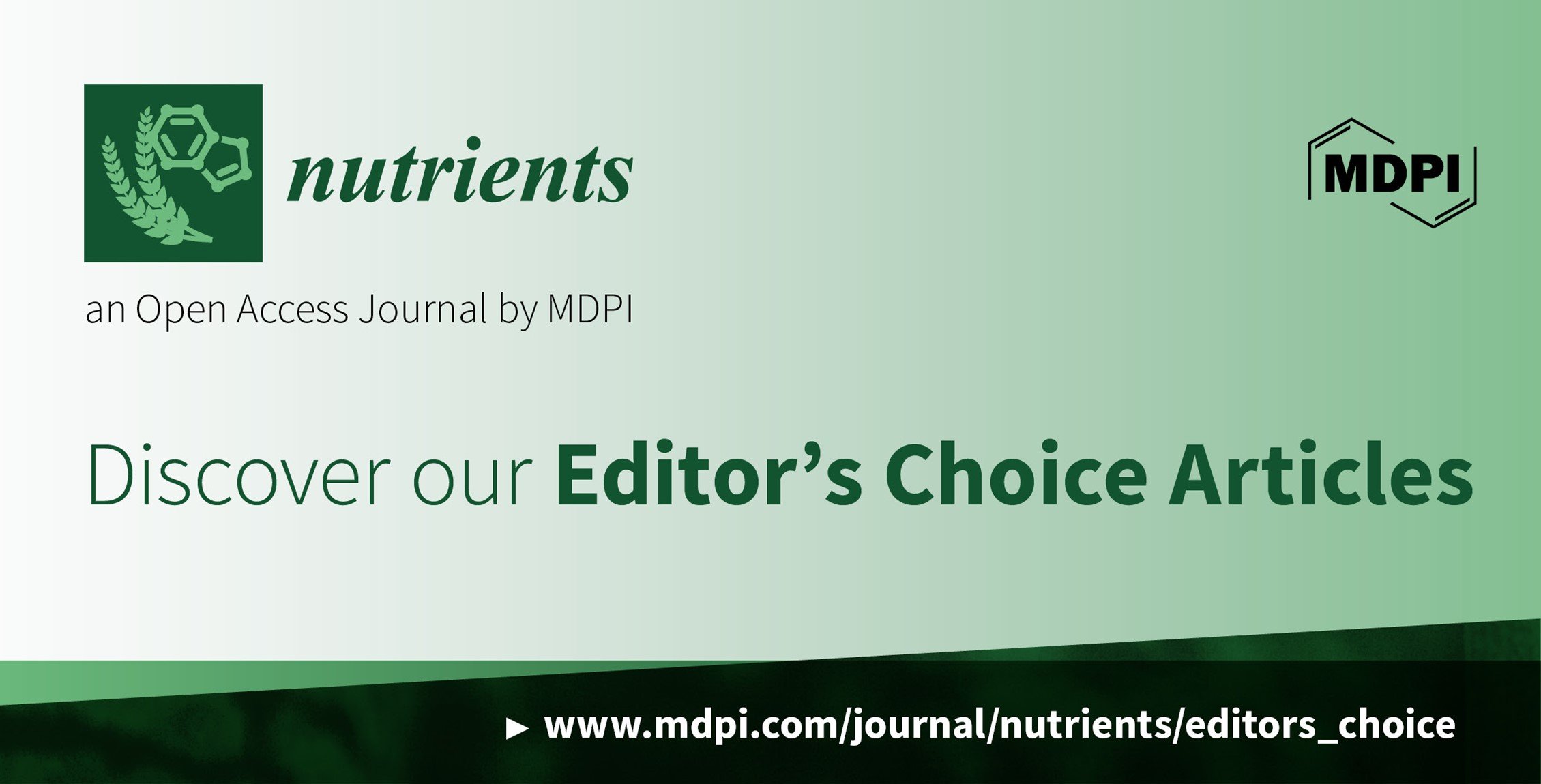
Editor's Choice Articles are selected based on suggestions from Nutrients’ Academic Editors worldwide. The Editors select a small number of recently published articles that they consider particularly interesting to our readers or important in their respective fields of research. You are welcome to read the updated Editor's Choice Articles, a curated list of high-quality articles from 2021 to 2024 Nutrients (ISSN: 2072-6643). The full list of Editor's Choice Articles can be viewed at the following link: https://www.mdpi.com/journal/nutrients/editors_choice.
“Magnesium and the Hallmarks of Aging”
by Ligia J. Dominguez, Nicola Veronese and Mario Barbagallo
Nutrients 2024, 16(4), 496; https://doi.org/10.3390/nu16040496
Available online: https://www.mdpi.com/2072-6643/16/4/496
Viewed by: 7739
“Twelve Weeks of Daily Lentil Consumption Improves Fasting Cholesterol and Postprandial Glucose and Inflammatory Responses—A Randomized Clinical Trial”
by Morgan L. Chamberlin, Stephanie M.G. Wilson, Marcy E. Gaston, Wan-Yuan Kuo and Mary P. Miles
Nutrients 2024, 16(3), 419; https://doi.org/10.3390/nu16030419
Available online: https://www.mdpi.com/2072-6643/16/3/419
Viewed by: 2573
“Vitamin D and Aging: Central Role of Immunocompetence”
by Carsten Carlberg and Eunike Velleuer
Nutrients 2024, 16(3), 398; https://doi.org/10.3390/nu16030398
Available online: https://www.mdpi.com/2072-6643/16/3/398
Viewed by: 3068
“The Role of the FODMAP Diet in IBS”
by Luisa Bertin, Miriana Zanconato, Martina Crepaldi, Giovanni Marasco, Cesare Cremon, Giovanni Barbara, Brigida Barberio, Fabiana Zingone and Edoardo Vincenzo Savarino
Nutrients 2024, 16(3), 370; https://doi.org/10.3390/nu16030370
Available online: https://www.mdpi.com/2072-6643/16/3/370
Viewed by: 2573
“Adverse Food Reactions in Inflammatory Bowel Disease: State of the Art and Future Perspectives”
by Ivan Capobianco, Federica Di Vincenzo, Pierluigi Puca, Guia Becherucci, Maria Chiara Mentella, Valentina Petito and Franco Scaldaferri
Nutrients 2024, 16(3), 351; https://doi.org/10.3390/nu16030351
Available online: https://www.mdpi.com/2072-6643/16/3/351
Viewed by: 2172
“Low Adherence to Mediterranean Diet Is Associated with Probable Sarcopenia in Community-Dwelling Older Adults: Results from the Longevity Check-Up (Lookup) 7+ Project”
by Stefano Cacciatore, Riccardo Calvani, Emanuele Marzetti, Anna Picca, Hélio José Coelho-Júnior, Anna Maria Martone, Claudia Massaro, Matteo Tosato and Francesco Landi
Nutrients 2023, 15(4), 1026; https://doi.org/10.3390/nu15041026
Available online: https://www.mdpi.com/2072-6643/15/4/1026
Cited by: 19 | Viewed by: 3970
“The Effect of Non-Nutritive Sweetened Beverages on Postprandial Glycemic and Endocrine Responses: A Systematic Review and Network Meta-Analysis”
by Roselyn Zhang, Jarvis C. Noronha, Tauseef A. Khan, Néma McGlynn, Songhee Back, Shannan M. Grant, Cyril W. C. Kendall and John L. Sievenpiper
Nutrients 2023, 15(4), 1050; https://doi.org/10.3390/nu15041050
Available online: https://www.mdpi.com/2072-6643/15/4/1050
Cited by: 13 | Viewed by: 12,832
“The Association of Emotional Eating with Overweight/Obesity, Depression, Anxiety/Stress, and Dietary Patterns: A Review of the Current Clinical Evidence”
by Antonios Dakanalis, Maria Mentzelou, Souzana K. Papadopoulou, Dimitrios Papandreou, Maria Spanoudaki, Georgios K. Vasios, Eleni Pavlidou, Maria Mantzorou and Constantinos Giaginis
Nutrients 2023, 15(5), 1173; https://doi.org/10.3390/nu15051173
Available online: https://www.mdpi.com/2072-6643/15/5/1173
Cited by: 20 | Viewed by: 8729
“Association between Food, Beverages and Overweight/Obesity in Children and Adolescents—A Systematic Review and Meta-Analysis of Observational Studies”
by Dorthe Dalstrup Jakobsen, Lea Brader and Jens Meldgaard Bruun
Nutrients 2023, 15(3), 764; https://doi.org/10.3390/nu15030764
Available online: https://www.mdpi.com/2072-6643/15/3/764
Cited by: 9 | Viewed by: 4045
“New Advances in Metabolic Syndrome, from Prevention to Treatment: The Role of Diet and Food”
by Donatella Ambroselli, Fabrizio Masciulli, Enrico Romano, Giuseppina Catanzaro, Zein Mersini Besharat, Maria Chiara Massari, Elisabetta Ferretti, Silvia Migliaccio, Luana Izzo, Alberto Ritieni et al.
Nutrients 2023, 15(3), 640; https://doi.org/10.3390/nu15030640
Available online: https://www.mdpi.com/2072-6643/15/3/640
Cited by: 24 | Viewed by: 7816
“Iodine and Iodine Deficiency: A Comprehensive Review of a Re-Emerging Issue”
by Adrienne Hatch-McChesney and Harris R. Lieberman
Nutrients 2022, 14(17), 3474; https://doi.org/10.3390/nu14173474
Available online: https://www.mdpi.com/2072-6643/14/17/3474
Cited by: 48 | Viewed by: 8128
“The Dark Side of Iron: The Relationship between Iron, Inflammation and Gut Microbiota in Selected Diseases Associated with Iron Deficiency Anaemia—A Narrative Review”
by Ida J. Malesza, Joanna Bartkowiak-Wieczorek, Jakub Winkler-Galicki, Aleksandra Nowicka, Dominika Dzięciołowska, Marta Błaszczyk, Paulina Gajniak, Karolina Słowińska, Leszek Niepolski, Jarosław Walkowiak et al.
Nutrients 2022, 14(17), 3478; https://doi.org/10.3390/nu14173478
Available online: https://www.mdpi.com/2072-6643/14/17/3478
Cited by: 20 | Viewed by: 10,618
“Metabolism and Bioavailability of Olive Bioactive Constituents Based on In Vitro, In Vivo and Human Studies”
by Theodora Nikou, Maria Eleni Sakavitsi, Evangelos Kalampokis and Maria Halabalaki
Nutrients 2022, 14(18), 3773; https://doi.org/10.3390/nu14183773
Available online: https://www.mdpi.com/2072-6643/14/18/3773
Cited by: 20 | Viewed by: 2542
“Nutritional Composition and Estimated Iron and Zinc Bioavailability of Meat Substitutes Available on the Swedish Market”
by Inger-Cecilia Mayer Labba, Hannah Steinhausen, Linnéa Almius, Knud Erik Bach Knudsen and Ann-Sofie Sandberg
Nutrients 2022, 14(19), 3903; https://doi.org/10.3390/nu14193903
Available online: https://www.mdpi.com/2072-6643/14/19/3903
Cited by: 20 | Viewed by: 24,088
“Evolving Concepts on Inflammatory Biomarkers and Malnutrition in Chronic Kidney Disease”
by Fredzzia Graterol Torres, María Molina, Jordi Soler-Majoral, Gregorio Romero-González, Néstor Rodríguez Chitiva, Maribel Troya-Saborido, Guillem Socias Rullan, Elena Burgos, Javier Paúl Martínez, Marina Urrutia Jou et al.
Nutrients 2022, 14(20), 4297; https://doi.org/10.3390/nu14204297
Available online: https://www.mdpi.com/2072-6643/14/20/4297
Cited by: 27 | Viewed by: 3802
“Low Zinc Levels at Admission Associates with Poor Clinical Outcomes in SARS-CoV-2 Infection”
by Marina Vogel-González, Marc Talló-Parra, Víctor Herrera-Fernández, Gemma Pérez-Vilaró, Miguel Chillón, Xavier Nogués, Silvia Gómez-Zorrilla, Inmaculada López-Montesinos, Isabel Arnau-Barrés, Maria Luisa Sorli-Redó et al.
Nutrients 2021, 13(2), 562; https://doi.org/10.3390/nu13020562
Available online: https://www.mdpi.com/2072-6643/13/2/562
Cited by: 65 | Viewed by: 26,095
“Dietary Polyphenols and Non-Alcoholic Fatty Liver Disease”
by Ludovico Abenavoli, Tiziana Larussa, Alessandro Corea, Anna Caterina Procopio, Luigi Boccuto, Marcello Dallio, Alessandro Federico and Francesco Luzza
Nutrients 2021, 13(2), 494; https://doi.org/10.3390/nu13020494
Available online: https://www.mdpi.com/2072-6643/13/2/494
Cited by: 67 | Viewed by: 5897
“Creatine in Health and Disease”
by Richard B. Kreider and Jeffery R. Stout
Nutrients 2021, 13(2), 447; https://doi.org/10.3390/nu13020447
Available online: https://www.mdpi.com/2072-6643/13/2/447
Cited by: 70 | Viewed by: 42,209
“The Immunopathogenesis of Alzheimer’s Disease Is Related to the Composition of Gut Microbiota”
by Friedrich Leblhuber, Daniela Ehrlich, Kostja Steiner, Simon Geisler, Dietmar Fuchs, Lukas Lanser and Katharina Kurz
Nutrients 2021, 13(2), 361; https://doi.org/10.3390/nu13020361
Available online: https://www.mdpi.com/2072-6643/13/2/361
Cited by: 63 | Viewed by: 12,130
“Patterns of Change in Dietary Habits and Physical Activity during Lockdown in Spain Due to the COVID-19 Pandemic”
by Carmen Pérez-Rodrigo, Marta Gianzo Citores, Gotzone Hervás Bárbara, Fátima Ruiz-Litago, Luis Casis Sáenz, Victoria Arija, Ana M. López-Sobaler, Emilio Martínez de Victoria, Rosa M. Ortega, Teresa Partearroyo et al.
Nutrients 2021, 13(2), 300; https://doi.org/10.3390/nu13020300
Available online: https://www.mdpi.com/2072-6643/13/2/300
Cited by: 93 | Viewed by: 16,299
29 March 2024
Meet Us at the 20th Annual International Conference of the Metabolomics Society (Metabolomics 2024), 16–20 June 2024, Osaka, Japan
MDPI will be attending the 20th Annual International Conference of the Metabolomics Society (Metabolomics 2024) held in Osaka, Japan, from 16 to 20 June 2024. The conference is the official annual meeting of the Metabolomics Society, and the largest metabolomics meeting worldwide. This is the third time that the conference will be held in Japan, following the 2005 and 2014 conferences held in Tsuruoka. We look forward to welcoming the metabolomics community, building strong connections, and discussing world-class research in a relaxed collegial environment. Let us build on the momentum of the incredible Niagara Falls and Valencia conferences that brought us back together in person, and make it the best meeting of 2024 together!
During this conference, MDPI will welcome researchers from different backgrounds to visit and share their latest views and research with us.
The following MDPI journals will be represented:
- Metabolites;
- Biomolecules;
- Plants;
- IJMS;
- Life;
- Cells;
- Agronomy;
- Nutrients;
- Cancers;
- CIMB;
- Genes;
- Antioxidants.
If you plan on attending this conference, feel free to stop by our booth. Our delegates look forward to meeting you in person to answer any questions you may have. For more information about the conference, please visit the following link: https://www.metabolomics2024.org/.
6 March 2024
Interview with Prof. Dr. Mauro Lombardo, the Event Chair of the 4th International Electronic Conference on Nutrients—Plant-Based Nutrition Focusing on Innovation, Health, and Sustainable Food Systems (IECN 2024)
Prof. Dr. Mauro Lombardo is the Event Chair of the 4th International Electronic Conference on Nutrients—Plant-Based Nutrition Focusing on Innovation, Health, and Sustainable Food Systems (IECN 2024), which will be hosted online between 16 and 18 October 2024 by MDPI, Nutrients (ISSN: 2072-6643) and co-organized by the San Raffaele Open University in Rome, Italy. Participation is free of charge for all participants and we are welcoming you to register and to submit your abstract.
The following is an interview with Prof. Dr. Mauro Lombardo:
1. Can you please introduce yourself and your research interests briefly?
I am a nutrition researcher with a focus on the impact of dietary patterns on human health, particularly in the context of chronic disease prevention and management. My work explores the nutritional benefits of plant-based diets and their role in sustainable food systems.
2. Thank you very much for your involvement in IECN 2024. As the conference’s Chair, how do you believe this conference will shape insightful discussions about the newest advances in the field? Which research topics do you think are of the most interest, and which will definitely be a point of focus at this conference?
As Chair, I believe the conference will catalyze significant discussions on cutting-edge research in plant-based nutrition, highlighting innovative approaches to health and sustainable food systems. Key topics will likely include the role of plant-based diets in chronic disease prevention, the environmental impacts of dietary choices, and the development of sustainable agricultural practices.
3. Which of your accomplishments do you consider to be the most impactful one? What are you most proud of?
The accomplishment I consider most impactful is my contribution to the evidence base supporting the health benefits of plant-based diets, influencing dietary guidelines and public health policies. I am most proud of my role in mentoring young researchers and helping to cultivate the next generation of nutrition scientists.
4. What was your main inspiration in pursuing a scientific career?
My main inspiration was the potential to make a tangible difference in people’s lives through research. The intersection of nutrition, health, and sustainability presented a unique opportunity to address some of the most pressing challenges of our time.
5. Could you describe the most difficult challenge you have faced in your research work and how you overcame it?
One of the most difficult challenges was overcoming the skepticism surrounding the efficacy of Mediterranean and plant-based diets for chronic disease management. Through rigorous research, collaborative projects, and public education, we were able to build a strong case for the benefits of such diets, gradually changing perceptions within the scientific community and the public.
6. Do you have any advice for young researchers who might be interested in doing research in nutrition?
My advice would be to remain curious, open-minded, and persistent. Nutrition science is a rapidly evolving field that requires a willingness to continually learn and adapt. Engaging with a wide range of disciplines, from molecular biology to public health, can provide a comprehensive understanding of nutrition’s role in health and disease.
4 March 2024
MDPI Insights: The CEO's Letter #9 - Romania, Research Integrity, Viruses

Welcome to the MDPI Insights: The CEO's Letter.
In these monthly letters, I will showcase two key aspects of our work at MDPI: our commitment to empowering researchers and our determination to facilitating open scientific exchange.
Opening Thoughts

Reka Kovacs (Deputy Office Manager, MDPI), Stefan Tochev (CEO, MDPI), and Sandra Ana Spatariu (Office Manager, MDPI) at the MDPI office in Cluj, Romania.
MDPI’s Impact on Romania
In February, I visited our office in Cluj, Romania. I worked closely with our senior office managers and various teams, including the departments of training, marketing and conferences, as well as our journal relationship specialists, reviewing our service to the local scholarly community. During the visit, I also met with representatives from Babes-Bolyai University and the Technical University of Cluj-Napoca. Our multifunctional Romanian office plays an important role in supporting our collaborations with the local market as well as helping to meet MDPI’s overall business needs.

Feedback and strategy meeting with a group of MDPI’s Journal Relationship Specialists at the MDPI office in Cluj, Romania.
With 22,436 articles, Romania ranks as a top 20 contributing country to MDPI’s total number of papers published as at 28 February 2024. This highlights the importance of our collaboration with Romanian-affiliated authors and the growing opportunity to support their publishing needs. MDPI is one of the few academic publishers with a significant presence in Romania, boasting over 360 colleagues across our offices in Bucharest and Cluj. We are also proud to hire colleagues from local institutions to launch their careers within publishing.
Romania ranks as a top 20 contributing country.
The Numbers: 2019–2023
MDPI has seen a healthy increase in submissions from Romanian authors over the past three years, from 8,439 in 2021 to 11,866 by end of 2023, with most submissions going to journals such as Sustainability, Medicina, Diagnostics, IJMS, Applied Sciences, and JCM. From 2019 to 2023, MDPI published articles from 32,145 authors affiliated with Romanian institutions. Over those years, we have worked with Romanian Guest Editors on nearly 3,000 occasions to support their Special Issue and Topical collections.
With more than 300 Editorial Board Members from Romania, 34 appear on the board of Mathematics, 27 on Materials, 19 on Polymers, 18 on Coatings, and 16 on Molecules, while three serve as Section Editors-in-Chief (SEiC) on our journals Coatings (3.4 IF, 4.6 Citescore), Magnetochemistry (2.7 IF, 3.5 Citescore), and Chemosensors (4.2 IF, 3.9 Citescore).
Institutional Open Access Programs
Our commitment to working with institutions is evident in Romania, where we have established eight Institutional Open Access Programs (IOAP) with esteemed institutions such as the University of Bucharest, the University of Medicine and Pharmacy Cluj-Napoca, and most recently the National Institute for Laser, Plasma and Radiation Physics.
Our growth and presence in Romania are a true testament.
We also have IOAP agreements with Babes-Bolyai University and the Technical University of Cluj-Napoca, where I had the opportunity to meet senior stakeholders during my visit. Below are a few photos capturing our meeting with Prof. Radu Silaghi-Dumitrescu (Head of Faculty of Chemistry, Babes-Bolyai University) at the MDPI office in Cluj, Romania, along with a photo from our meeting with Vice Deans Nicoleta Cobarzan, Nicoleta Ilies, and Hoda Gavril, from the faculty of Civil Engineering at the Technical University of Cluj, Romania.


Our growth and presence in Romania are a true testament to the service we provide to the scholarly community and the relationships we foster in that region. We look forward to continuing to support Romanian scholars and institutions by providing a valuable and trusted experience with MDPI, the leader in open access publishing.
Impactful Research

MDPI Joins the STM Integrity Hub
MDPI has long been a supporter and partner of STM, with our involvement ranging from sponsoring and attending events to helping organize event programs. By joining the STM Integrity Hub, we aim to further our commitment to STM initiatives aimed at safeguarding the integrity of science.
“We are pleased to welcome MDPI as the 35th organisation participating in the Hub. This expansion is critical, as every new member enhances our capacity to prevent fraudulent submissions from entering the academic record.”
Joris van Rossum, Director of Research Integrity, STM
MDPI operates in full alignment with STM Integrity Hub's values of shared data and experiences. We strongly believe in collaboration and open exchange for the purposes of creating a holistic approach to support research integrity at MDPI itself and across the entire academic publishing industry. The Integrity Hub is an excellent example of how publishers can come together to jointly address industry-wide challenges related to research integrity, such as manuscripts that breach research integrity standards and paper-mills.
I look forward to our Research Integrity and Publication Ethics Team (RIPE) team immersing themselves in this initiative, exchanging information, best practices, and tools for the benefit of the entire scholarly ecosystem. We believe that ethical publishing standards should be implemented across the board, and we aim to be rigorous in our approach, addressing research integrity issues and improving the impact of published research.
Inside MDPI

MDPI Expands Research Integrity and Publication Ethics Team (RIPE)
In addition to external collaborations and joint initiatives aimed at further strengthening our commitment to research integrity, we are also enhancing our internal efforts. This includes improving our processes and guidelines and expanding our teams and departments to ensure quality assurance throughout our publishing process.
We are pleased to announce the expansion of our Research Integrity and Publication Ethics Team (RIPE) at MDPI. The RIPE team has recently welcomed new colleagues, each bringing unique skills and a personal commitment to prioritize ethical considerations in all our work.
The demand for research integrity and high ethical standards in academic publishing is steadily rising across our industry. Our expanded RIPE team will work to enhance and align our practices with industry best practices, ensuring excellence in research integrity and publication ethics.

Stefan Tochev (CEO, MDPI) introduces Dr. Tim Tait-Jamieson (Research Integrity Lead, MDPI) for his presentation on MDPI’s Retraction and Approval Process to a group of Journal Relationship Specialists at the MDPI office in Cluj, Romania: “The demand for research integrity and publication ethics is steadily rising across our industry.”
Introducing our Research Integrity and Publication Ethics Team
Led by Dr. Tim Tait-Jamieson (Research Integrity Lead), the RIPE team comprises Dr. Ivana Resanovic (Research Integrity Manager), Dr. Lavinia Rogojina (Research Integrity Manager), Ms. Diana Apodaritei (Research Integrity Specialist), Dr. Zoltan Mihaly (Research Integrity Specialist), Mr. Aleksandar Đukić (Research Integrity Specialist), Ms. Ana Stankovic (Research Integrity Specialist), and Ms. Anna Pena (Publication Ethics Assistant).
Please click here to access everything that you need to know about MDPI’s Research and Publication Ethics.
With this span of complementary roles, the RIPE team collaborates directly with journal editorial teams and works closely with various departments, including our Scientific Office Board and our Journal Relationship Specialists. The team’s primary objectives are to help prevent issues regarding research integrity and publication ethics during peer review, uphold MDPI’s ethics policies, adhere to industry standards, and resolve publication ethics and research integrity issues and complaints.
Quality Updates to Special Issues Oversight
At MDPI, we are committed to reviewing policies pertaining to the quality of research. In this blog post, Shaheena Patel (Communications Associate, MDPI), outlines two recent updates to MDPI journal processes. These updates pertain to Special Issue (SI) quality guidelines, in line with criteria provided by COPE and DOAJ. Alongside the SI updates, details regarding the new minor corrections policy introduced in 2024 are provided in the blog.
The two updates we implemented include greater oversight and the verification of Guest Editor credentials. These guidelines require that Editors-in-Chief (EiCs) and Editorial Board Members (EBMs) take responsibility for overseeing SIs.
PS. Thank you, James Butcher, for featuring this up in your 67th issue of the Journalogy newsletter.
Read more:
Coming Together for Science

Viruses 2024 – A World of Viruses
I am pleased to share the success of our MDPI conference Viruses 2024 – A World of Viruses, held 14-16 February, in Barcelona. With 240 registrations, this event brought together top scientists, researchers, and industry experts from 40 countries to share their findings on the latest developments in viral pathogenesis and immune responses.
Attendees gathered for the 5th edition of the Viruses’ conference, where we hosted influential keynote speeches from Nobel Prize laureate Dr. Charles M. Rice and ‘Distinguished Senior Virologist’ Prof. Luis Enjuanes, along with 14 invited speakers, 47 selected speakers, and nine flash poster presenters, to discuss the most significant issues in virology today.
Recap on the #Viruses2024 Conference
Take a look at the key moments from MDPI’s Viruses event and please join us in commemorating a gathering for global knowledge and cooperation. A heartfelt thank-you to all attendees; their passion and engagement played a crucial role in making this event an engaging success!
Below are calls to action from the keynote speakers encouraging collaboration and communication:
“There’s never been a better time than now to really take the power that we have both in terms of basic research and also in biotech and pharma to develop antiviral agents.” - Dr. Charles M. Rice, The Rockefeller University, New York, USA
“The collaboration between labs is absolutely essential. Improving initial detection and improving communication is a must for all of us working in science.” - Prof. Dr. Luis Enjuanes, National Center of Biotechnology (CNB-CSIC), Madrid, Spain

Our thanks go to our sponsors and partnering societies, our Viruses journal and editorial team, our Barcelona colleagues, and the social media, conference and other MDPI teams for making this event a memorable occasion. View the event gallery here.
Upcoming In-Person Event

24–26 April, 2024
4th MMCS – Harnessing the Power of New Drug Modalities
Location: Barcelona, Spain
Esteemed speakers at MMCS 2024 include Prof. Arun K. Ghosh, the mind behind the Darunavir molecule, and Prof. Paul Brennan, CSO of Alzheimer's Research UK Oxford Drug Discovery Institute.
Find more upcoming MDPI events here.
Organize Your Event with MDPI’s Sciforum
Sciforum is MDPI’s platform dedicated to the organization of scientific events. In line with our mission to promote science, Sciforum supports scholars, societies, research networks, and universities at all stages of organizing in-person events, virtual events and webinars. Our platforms are efficient, user-friendly, and cost-effective. We handle all steps related to event management. Contact us for details.
Closing Thoughts

Researcher to Reader (R2R) Conference
From 20–21 February 2024, I had the pleasure of attending the Researcher to Reader (R2R) conference in London, which MDPI has proudly sponsored over the years. The conference programme offered a variety of session formats, including workshops, panel discussions, debates, interviews, presentations, and lightning talks, with opportunities to discuss relevant topics.
We take pride in supporting the scientific community, bringing researchers across the world together to network, exchange ideas and share the latest in science and publishing. In 2023, MDPI invested close to 2 million CHF in sponsoring over 2,000 scientific and publishing-related conferences worldwide.
R2R Peer Review Innovations Workshop
I found the R2R conference to be engaging, with the workshops being particularly enjoyable. My colleague Giulia Stefenelli (Chair of Scientific Office Board) and I participated in the “Peer Review Innovations” workshop, which spanned four sessions over the two days. These sessions explored the future of peer review and how we can improve the peer review process for everyone involved. Notably, the large majority of attendees expressed their opinion that peer review, as currently practiced, requires significant improvement. Together, we collaborated on potential immediate and long-term improvements and innovative processes, aiming to create an ecosystem beneficial to all stakeholders by strengthening submission systems with the aim of reducing threats and making authors more responsible for their work. We also discussed the opportunity for academic institutions to better scrutinize the quality of the work produced and submitted to journals.
Our group comprised publishers, software providers, librarians, and more, bringing diverse perspectives to the discussions. These interactions were relevant to MDPI’s ongoing conversations, providing insights to our efforts. The session also made me appreciate that MDPI is doing well, as the group discussions included the subject of various quality checks that we have already embedded in our processes, ensuring that we keep abreast of industry standards.
The need for an optimized system to incentivize the activities of editors and reviewers was also a focus of discussion, as well as the support that reviewers need from publishers via the provision of strong reports through fixed forms, questionnaires and training.
At MDPI, we are currently auditing our reviewer program to improve reviewer recognition, guidelines, and methods for identifying suitable reviewers, while maintaining our commitment to quality and timeliness.
Congratulations to Mark Carden, Conference Director, and the R2R team for organizing a productive and successful event. PS: The break times were greatly appreciated as well!
Chief Executive Officer
MDPI AG
7 February 2024
Nutrients | Highly Cited Papers in 2021–2022 in the Section “Pediatric Nutrition”
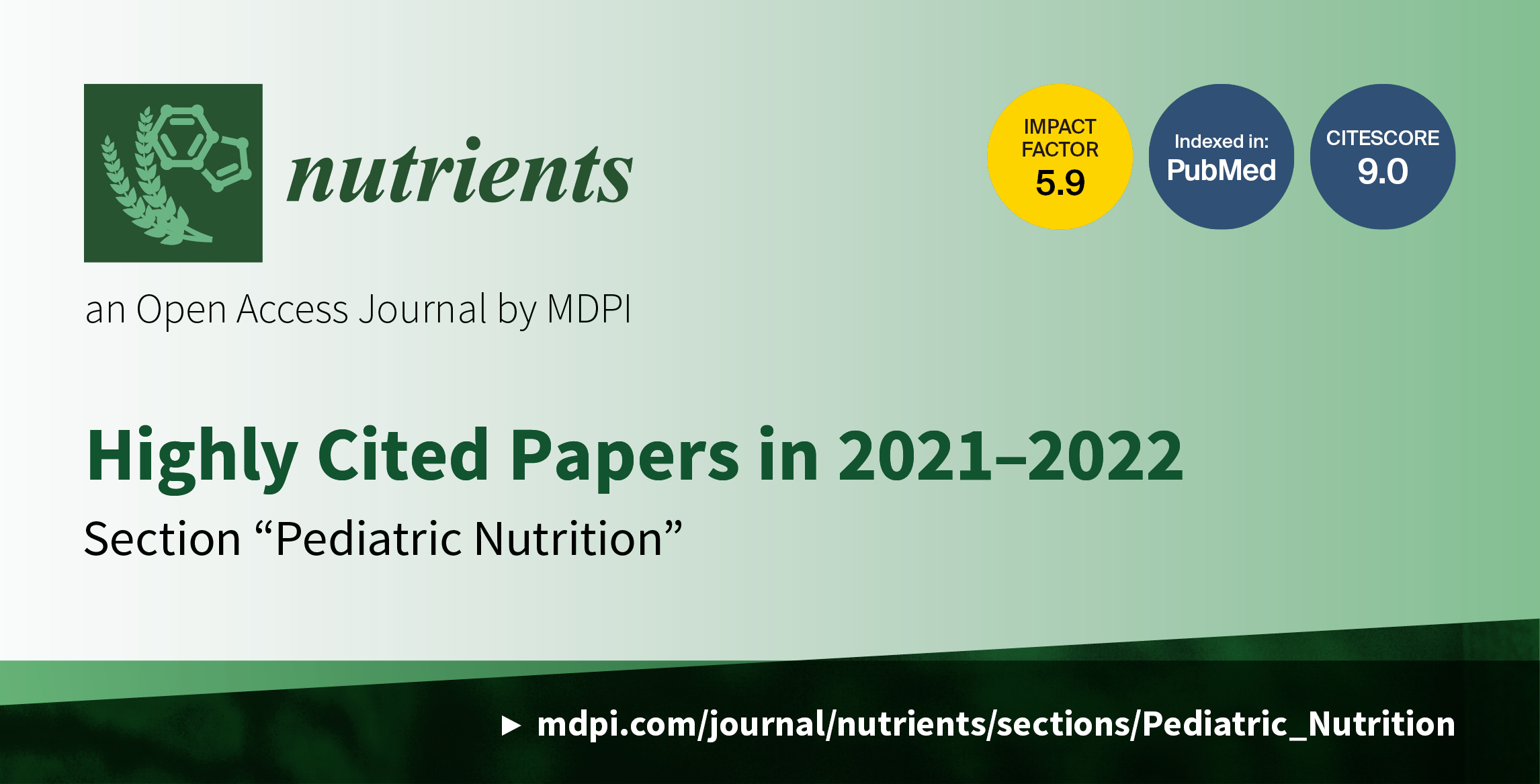
As all of the articles published in our journal are in an open access format, you have free and unlimited access to the full texts. We welcome you to read our most highly cited papers published in 2021 and 2022 listed below:
1. “Nutrient Intake and Status of German Children and Adolescents Consuming Vegetarian, Vegan or Omnivore Diets: Results of the VeChi Youth Study”
by Ute Alexy, Morwenna Fischer, Stine Weder, Alfred Längler, Andreas Michalsen, Andreas Sputtek and Markus Keller
Nutrients 2021, 13(5), 1707; https://doi.org/10.3390/nu13051707
Available online: https://www.mdpi.com/2072-6643/13/5/1707
2. “Strategies to Improve School Meal Consumption: A Systematic Review”
by Juliana F. W. Cohen, Amelie A. Hecht, Erin R. Hager, Lindsey Turner, Kara Burkholder and Marlene B. Schwartz
Nutrients 2021, 13(10), 3520; https://doi.org/10.3390/nu13103520
Available online: https://www.mdpi.com/2072-6643/13/10/3520
3. “A Narrative Review on Pediatric Scurvy: The Last Twenty Years”
by Sandra Trapani, Chiara Rubino, Giuseppe Indolfi and Paolo Lionetti
Nutrients 2022, 14(3), 684; https://doi.org/10.3390/nu14030684
Available online: https://www.mdpi.com/2072-6643/14/3/684
4. “The Effects of Nutritional Interventions on the Cognitive Development of Preschool-Age Children: A Systematic Review”
by Marina Roberts, Terezie Tolar-Peterson, Abby Reynolds, Caitlin Wall, Nicole Reeder and Gina Rico Mendez
Nutrients 2022, 14(3), 532; https://doi.org/10.3390/nu14030532
Available online: https://www.mdpi.com/2072-6643/14/3/532
5. “Development of the Gastrointestinal Tract in Newborns as a Challenge for an Appropriate Nutrition: A Narrative Review”
by Flavia Indrio, Josef Neu, Massimo Pettoello-Mantovani, Flavia Marchese, Silvia Martini, Alessia Salatto and Arianna Aceti
Nutrients 2022, 14(7), 1405; https://doi.org/10.3390/nu14071405
Available online: https://www.mdpi.com/2072-6643/14/7/1405
6. “Effect of Vitamin D Supplementation in Early Life on Children’s Growth and Body Composition: A Systematic Review and Meta-Analysis of Randomized Controlled Trials”
by Kristine Ma, Shu Qin Wei, Wei Guang Bi, Hope A. Weiler and Shi Wu Wen
Nutrients 2021, 13(2), 524; https://doi.org/10.3390/nu13020524
Available online: https://www.mdpi.com/2072-6643/13/2/524
7. “Early Enteral Feeding Improves Tolerance of Parenteral Nutrition in Preterm Newborns”
by Giovanni Boscarino, Maria Giulia Conti, Maria Di Chiara, Marco Bianchi, Elisa Onestà, Francesca Faccioli, Giorgia Deli, Paola Repole, Salvatore Oliva, Francesco Cresi et al.
Nutrients 2021, 13(11), 3886; https://doi.org/10.3390/nu13113886
Available online: https://www.mdpi.com/2072-6643/13/11/3886
8. “The Impact of Lifestyle, Diet and Physical Activity on Epigenetic Changes in the Offspring—A Systematic Review”
by Louise Rasmussen, Sine Knorr, Christian Skødt Antoniussen, Jens Meldgaard Bruun, Per Glud Ovesen, Jens Fuglsang and Ulla Kampmann
Nutrients 2021, 13(8), 2821; https://doi.org/10.3390/nu13082821
Available online: https://www.mdpi.com/2072-6643/13/8/2821
9. “Prevalence of Metabolic Syndrome in Children and Adolescents with Type 1 Diabetes Mellitus and Possibilities of Prevention and Treatment: A Systematic Review”
by Monika Grabia, Renata Markiewicz-Żukowska and Katarzyna Socha
Nutrients 2021, 13(6), 1782; https://doi.org/10.3390/nu13061782
Available online: https://www.mdpi.com/2072-6643/13/6/1782
10. “Nutritional Approach to Prevention and Treatment of Cardiovascular Disease in Childhood”
by Maria Elena Capra, Cristina Pederiva, Claudia Viggiano, Raffaella De Santis, Giuseppe Banderali and Giacomo Biasucci
Nutrients 2021, 13(7), 2359; https://doi.org/10.3390/nu13072359
Available online: https://www.mdpi.com/2072-6643/13/7/2359
7 February 2024
Nutrients | Highly Cited Papers in 2021–2022 in the Section “Nutrition and Metabolism”
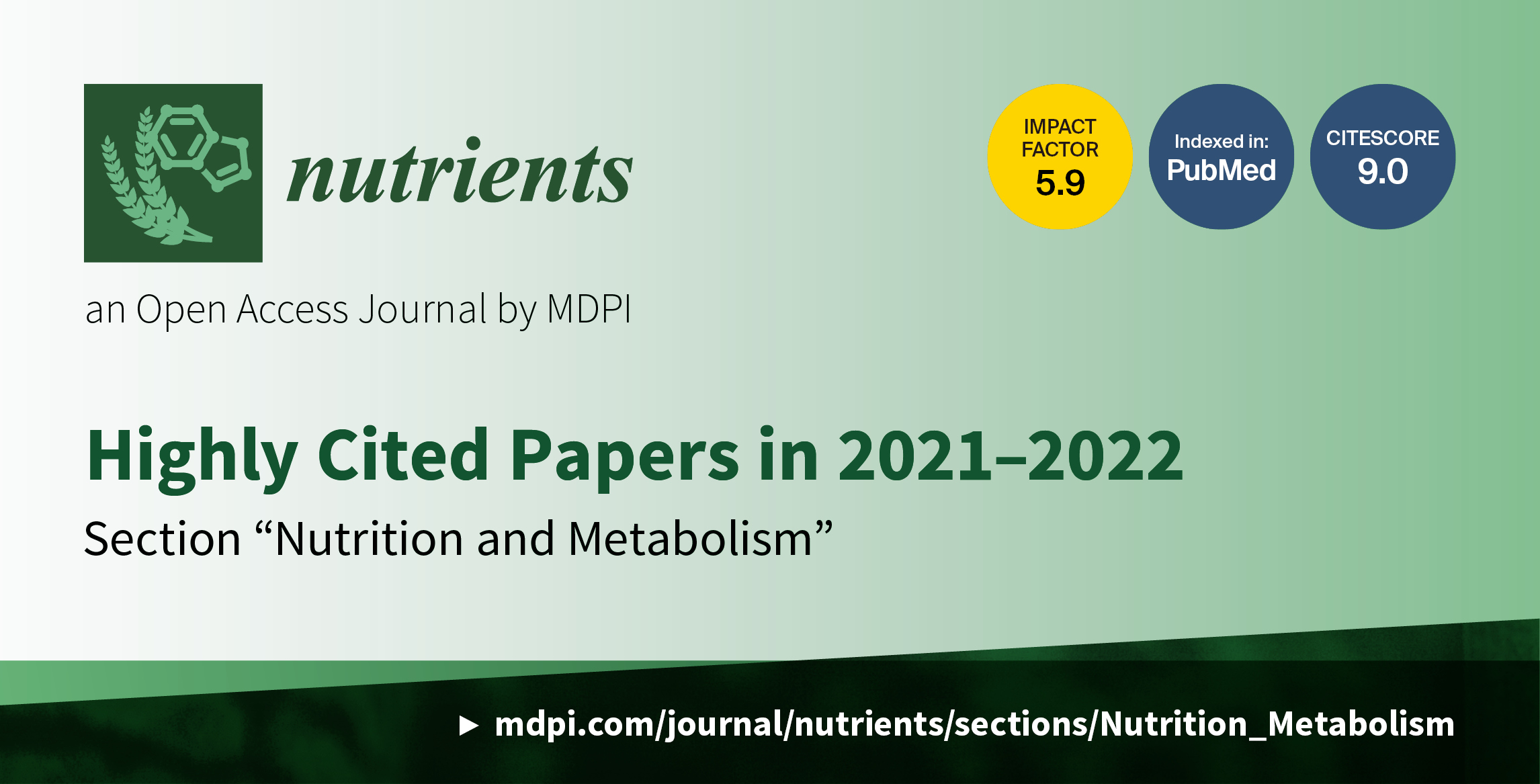
As all of the articles published in our journal are in an open access format, you have free and unlimited access to the full texts. We welcome you to read our most highly cited papers published in 2021 and 2022 listed below:
1. “Metabolic Syndrome and Sarcopenia”
by Hiroki Nishikawa, Akira Asai, Shinya Fukunishi, Shuhei Nishiguchi and Kazuhide Higuchi
Nutrients 2021, 13(10), 3519; https://doi.org/10.3390/nu13103519
Available online: https://www.mdpi.com/2072-6643/13/10/3519
2. “Gut Microbiota Profile and Its Association with Clinical Variables and Dietary Intake in Overweight/Obese and Lean Subjects: A Cross-Sectional Study”
by Judit Companys, Maria José Gosalbes, Laura Pla-Pagà, Lorena Calderón-Pérez, Elisabet Llauradó, Anna Pedret, Rosa Maria Valls, Nuria Jiménez-Hernández, Berner Andrée Sandoval-Ramirez, Josep Maria del Bas et al.
Nutrients 2021, 13(6), 2032; https://doi.org/10.3390/nu13062032
Available online: https://www.mdpi.com/2072-6643/13/6/2032
3. “Edible Microalgae and Their Bioactive Compounds in the Prevention and Treatment of Metabolic Alterations”
by Sara Ramos-Romero, Joan Ramon Torrella, Teresa Pagès, Ginés Viscor and Josep Lluís Torres
Nutrients 2021, 13(2), 563; https://doi.org/10.3390/nu13020563
Available online: https://www.mdpi.com/2072-6643/13/2/563
4. “Time-Restricted Eating and Metabolic Syndrome: Current Status and Future Perspectives”
by Iwona Świątkiewicz, Alina Woźniak and Pam R. Taub
Nutrients 2021, 13(1), 221; https://doi.org/10.3390/nu13010221
Available online: https://www.mdpi.com/2072-6643/13/1/221
5. “Nutritional Imbalances in Adult Celiac Patients Following a Gluten-Free Diet”
by Aner Cardo, Itziar Churruca, Arrate Lasa, Virginia Navarro, Maialen Vázquez-Polo, Gesala Perez-Junkera and Idoia Larretxi
Nutrients 2021, 13(8), 2877; https://doi.org/10.3390/nu13082877
Available online: https://www.mdpi.com/2072-6643/13/8/2877
6. “Intermittent Fasting and Metabolic Health”
by Izzah Vasim, Chaudry N. Majeed and Mark D. DeBoer
Nutrients 2022, 14(3), 631; https://doi.org/10.3390/nu14030631
Available online: https://www.mdpi.com/2072-6643/14/3/631
7. “Intermittent Fasting and the Possible Benefits in Obesity, Diabetes, and Multiple Sclerosis: A Systematic Review of Randomized Clinical Trials”
by María Morales-Suarez-Varela, Ester Collado Sánchez, Isabel Peraita-Costa, Agustín Llopis-Morales and José M. Soriano
Nutrients 2021, 13(9), 3179; https://doi.org/10.3390/nu13093179
Available online: https://www.mdpi.com/2072-6643/13/9/3179
8. “Endocannabinoids and the Gut-Brain Control of Food Intake and Obesity”
by Nicholas V. DiPatrizio
Nutrients 2021, 13(4), 1214; https://doi.org/10.3390/nu13041214
Available online: https://www.mdpi.com/2072-6643/13/4/1214
9. “Microbiome and Human Aging: Probiotic and Prebiotic Potentials in Longevity, Skin Health and Cellular Senescence”
by Jacqueline Lena Boyajian, Merry Ghebretatios, Sabrina Schaly, Paromita Islam and Satya Prakash
Nutrients 2021, 13(12), 4550; https://doi.org/10.3390/nu13124550
Available online: https://www.mdpi.com/2072-6643/13/12/4550
10. “Sugar or Fat? Renal Tubular Metabolism Reviewed in Health and Disease”
by Leslie S. Gewin
Nutrients 2021, 13(5), 1580; https://doi.org/10.3390/nu13051580
Available online: https://www.mdpi.com/2072-6643/13/5/1580
7 February 2024
Nutrients | Highly Cited Papers in 2022 in the Section “Clinical Nutrition”
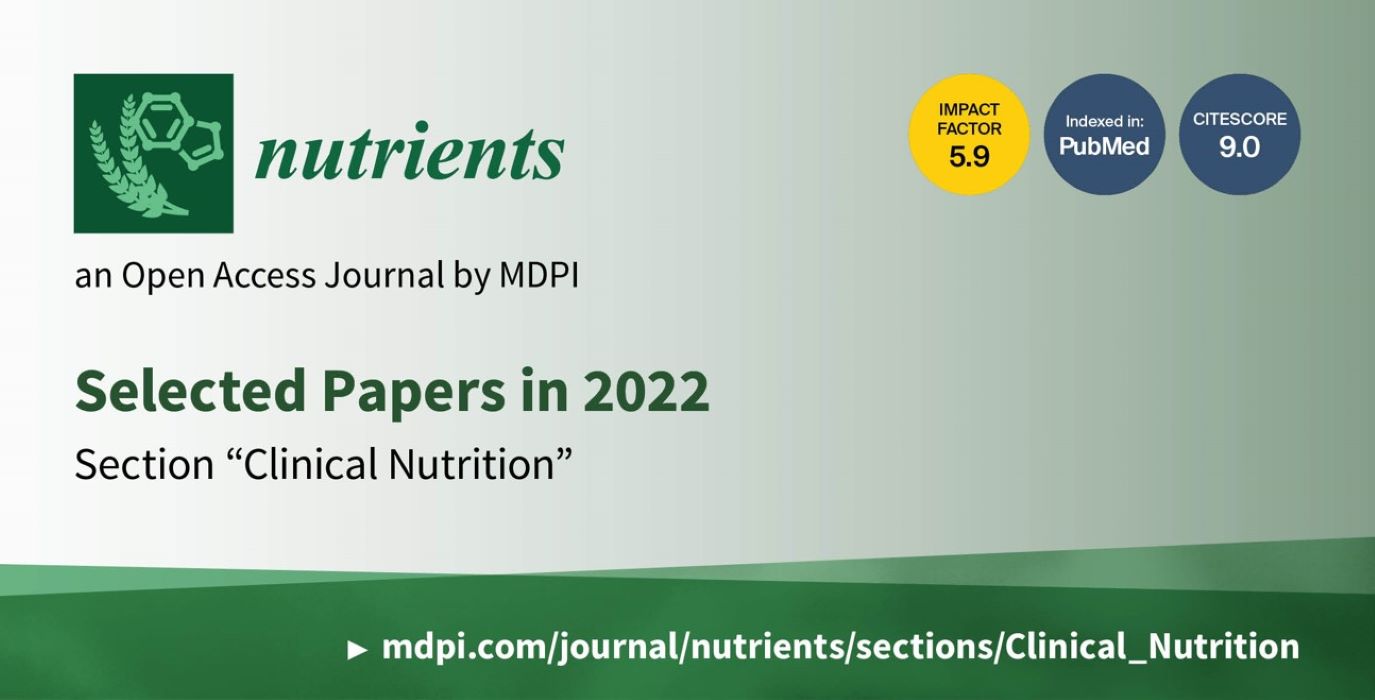
As all of the articles published in our journal are in open access format, you have free and unlimited access to the full text. We welcome you to read our most highly cited papers published in 2022 listed below:
1. “Effects of Diet, Lifestyle, Chrononutrition and Alternative Dietary Interventions on Postprandial Glycemia and Insulin Resistance”
by Christina Oikonomou, Emilia Papakonstantinou, George Nychas and George D. Dimitriadis
Nutrients, 2022, 14(4), 823; https://doi.org/10.3390/nu14040823
Available online: https://www.mdpi.com/2072-6643/14/4/823
2. “Malnutrition Screening and Assessment”
by Alberto Lafita-López, Carlos Serón-Arbeloa, José Puzo-Foncillas, Lorenzo Labarta-Monzón, Miguel Montoro-Huguet, Néstor Bueno-Vidales and Tomas Mallor-Bonet
Nutrients, 2022, 14(12), 2392; https://doi.org/10.3390/nu14122392
Available online: https://www.mdpi.com/2072-6643/14/12/2392
3. “The Changing Landscape of Nutrition in Cystic Fibrosis: The Emergence of Overweight and Obesity”
by Julianna Bailey, Kevin R. Fontaine and Stefanie Krick
Nutrients, 2022, 14(6), 1216; https://doi.org/10.3390/nu14061216
Available online: https://www.mdpi.com/2072-6643/14/6/1216
4. “Glucose Uptake by Skeletal Muscle within the Contexts of Type 2 Diabetes and Exercise: An Integrated Approach”
by Jane E. B. Reusch, Nicholas A. Hulett and Rebecca L. Scalzo
Nutrients, 2022, 14(3), 647; https://doi.org/10.3390/nu14030647
Available online: https://www.mdpi.com/2072-6643/14/3/647
5. “Efficacy of Probiotics in Rheumatoid Arthritis and Spondyloarthritis: A Systematic Review and Meta-Analysis of Randomized Controlled Trials”
by Claire Daïen, Jean-Guillaume Letarouilly, Jérémie Sellam, Johanna Sigaux, Pauline Sanchez, René-Marc Flipo, Sébastien Czernichow, Thomas Barnetche and Yann Nguyen
Nutrients, 2022, 14(2), 354; https://doi.org/10.3390/nu14020354
Available online: https://www.mdpi.com/2072-6643/14/2/354
6. “The Therapeutic Role of Short-Chain Fatty Acids Mediated Very Low-Calorie Ketogenic Diet–Gut Microbiota Relationships in Paediatric Inflammatory Bowel Diseases”
by Naser A. Alsharairi
Nutrients, 2022, 14(19), 4113; https://doi.org/10.3390/nu14194113
Available online: https://www.mdpi.com/2072-6643/14/19/4113
7. “Malnutrition and Increased Risk of Adverse Outcomes in Elderly Patients Undergoing Elective Colorectal Cancer Surgery: A Case-Control Study Nested in a Cohort”
by Ángel Belenguer-Varea, Cristina Cunha-Pérez, Cristina Martínez-Escribano, David Cuesta Peredo, Francisco Arteaga Moreno, Francisco J. Tarazona-Santabalbina, Francisco Javier Blanco González and Marcos Pérez-López
Nutrients, 2022, 14(1), 207; https://doi.org/10.3390/nu14010207
Available online: https://www.mdpi.com/2072-6643/14/1/207
8. “Dietary Omega-3 Polyunsaturated Fatty-Acid Supplementation Upregulates Protective Cellular Pathways in Patients with Type 2 Diabetes Exhibiting Improvement in Painful Diabetic Neuropathy”
by Alfonso M. Durán, Anthony Firek, Marino De León, W. Lawrence Beeson and Zaida Cordero-MacIntyre
Nutrients, 2022, 14(4), 761; https://doi.org/10.3390/nu14040761
Available online: https://www.mdpi.com/2072-6643/14/4/761
9. “Effect of Morning and Evening Exercise on Energy Balance: A Pilot Study”
by Bethelhem Shiferaw, Daniel H. Bessesen, Edward L. Melanson, Erik A. Willis, Laura Grau, Liza Wayland, Matthew J. Breit, Rebecca Rosenberg, Sarah A. Purcell, Seth A. Creasy et al.
Nutrients, 2022, 14(4), 816; https://doi.org/10.3390/nu14040816
Available online: https://www.mdpi.com/2072-6643/14/4/816
10. “The Role of Diet and Dietary Patterns in Parkinson’s Disease”
by Donna Burnett, Emily Knight, Jeganathan Ramesh Babu and Thangiah Geetha
Nutrients, 2022, 14(21), 4472; https://doi.org/10.3390/nu14214472
Available online: https://www.mdpi.com/2072-6643/14/21/4472
7 February 2024
Nutrients | Highly Cited Papers in 2021–2022 in the Section “Carbohydrates”
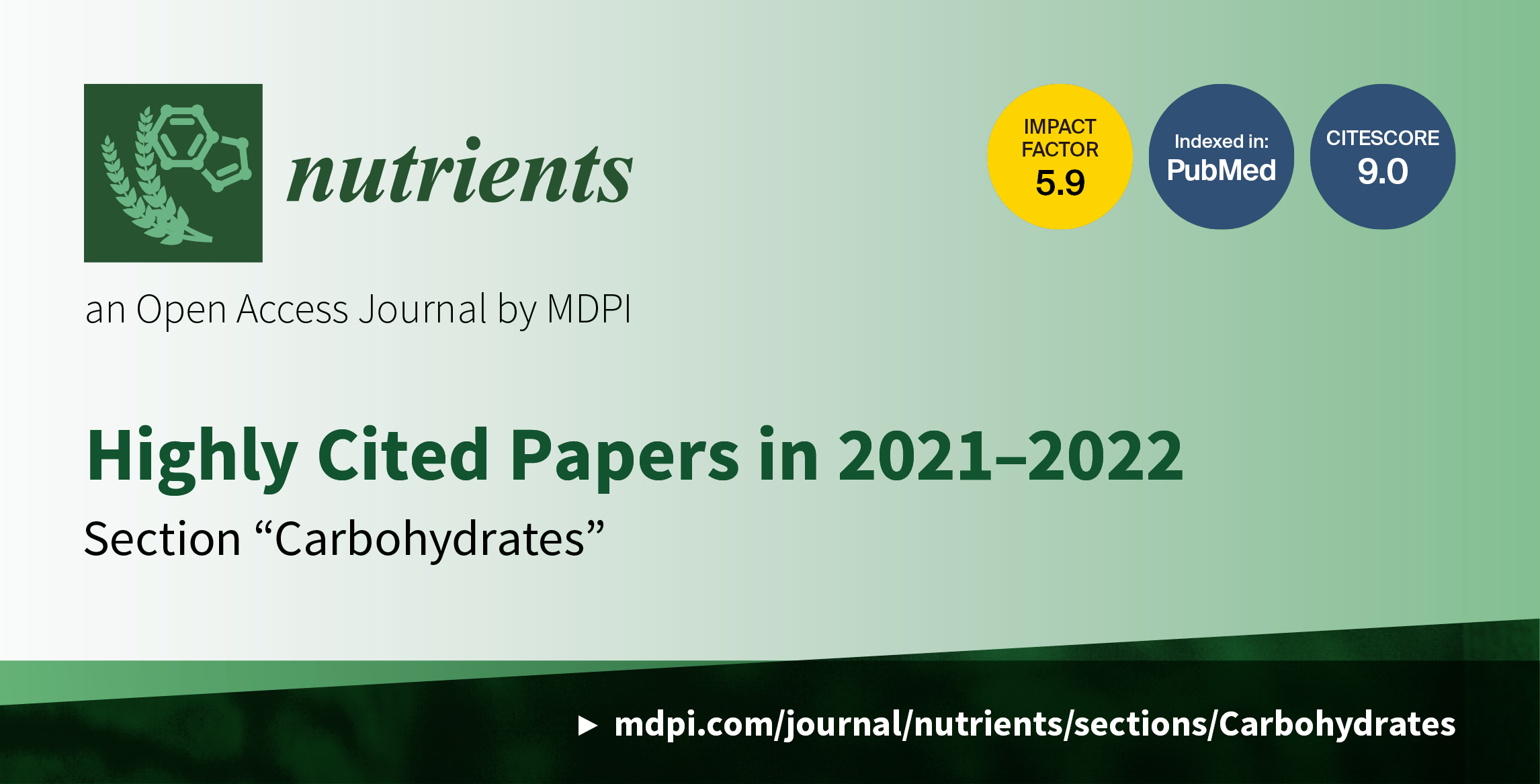
As all of the articles published in our journal are in an open access format, you have free and unlimited access to the full texts. We welcome you to read our most highly cited papers published in 2021 and 2022 listed below:
1. “Exopolysaccharides of Lactic Acid Bacteria: Production, Purification and Health Benefits towards Functional Food”
by Helena Mylise Sørensen, Keith D. Rochfort, Susan Maye, George MacLeod, Dermot Brabazon, Christine Loscher and Brian Freeland
Nutrients 2022, 14(14), 2938; https://doi.org/10.3390/nu14142938
Available online: https://www.mdpi.com/2072-6643/14/14/2938
2. “Prebiotic Inulin Supplementation and Peripheral Insulin Sensitivity in adults at Elevated Risk for Type 2 Diabetes: A Pilot Randomized Controlled Trial”
by Cassie M. Mitchell, Brenda M. Davy, Monica A. Ponder, Ryan P. McMillan, Michael D. Hughes, Matthew W. Hulver, Andrew P. Neilson and Kevin P. Davy
Nutrients 2021, 13(9), 3235; https://doi.org/10.3390/nu13093235
Available online: https://www.mdpi.com/2072-6643/13/9/3235
3. “The Burden of Carbohydrates in Health and Disease”
by Vicente Javier Clemente-Suárez, Juan Mielgo-Ayuso, Alexandra Martín-Rodríguez, Domingo Jesús Ramos-Campo, Laura Redondo-Flórez and Jose Francisco Tornero-Aguilera
Nutrients 2022, 14(18), 3809; https://doi.org/10.3390/nu14183809
Available online: https://www.mdpi.com/2072-6643/14/18/3809
4. “Comparison of Indices of Carbohydrate Quality and Food Sources of Dietary Fiber on Longitudinal Changes in Waist Circumference in the Framingham Offspring Cohort”
by Caleigh M. Sawicki, Alice H. Lichtenstein, Gail T. Rogers, Paul F. Jacques, Jiantao Ma, Edward Saltzman and Nicola M. McKeown
Nutrients 2021, 13(3), 997; https://doi.org/10.3390/nu13030997
Available online: https://www.mdpi.com/2072-6643/13/3/997
5. “Effect of Physicochemical Properties of Carboxymethyl Cellulose on Diffusion of Glucose”
by Elisabeth Miehle, Stephanie Bader-Mittermaier, Ute Schweiggert-Weisz, Hans Hauner and Peter Eisner
Nutrients 2021, 13(5), 1398; https://doi.org/10.3390/nu13051398
Available online: https://www.mdpi.com/2072-6643/13/5/1398
6. “Acacia Gum Is Well Tolerated While Increasing Satiety and Lowering Peak Blood Glucose Response in Healthy Human Subjects”
by Riley Larson, Courtney Nelson, Renee Korczak, Holly Willis, Jennifer Erickson, Qi Wang and Joanne Slavin
Nutrients 2021, 13(2), 618; https://doi.org/10.3390/nu13020618
Available online: https://www.mdpi.com/2072-6643/13/2/618
7. “Effects of Whole-Grain and Sugar Content in Infant Cereals on Gut Microbiota at Weaning: A Randomized Trial”
by Julio Plaza-Diaz, Maria Jose Bernal, Sophie Schutte, Empar Chenoll, Salvador Genovés, Francisco M. Codoñer, Angel Gil and Luis Manuel Sanchez-Siles
Nutrients 2021, 13(5), 1496; https://doi.org/10.3390/nu13051496
Available online: https://www.mdpi.com/2072-6643/13/5/1496
8. “Fasting: How to Guide”
by Alda Attinà, Claudia Leggeri, Rita Paroni, Francesca Pivari, Michele Dei Cas, Alessandra Mingione, Maria Dri, Marco Marchetti and Laura Di Renzo
Nutrients 2021, 13(5), 1570; https://doi.org/10.3390/nu13051570
Available online: https://www.mdpi.com/2072-6643/13/5/1570
9. “Is the Use of Artificial Sweeteners Beneficial for Patients with Diabetes Mellitus? The Advantages and Disadvantages of Artificial Sweeteners”
by Katsumi Iizuka
Nutrients 2022, 14(21), 4446; https://doi.org/10.3390/nu14214446
Available online: https://www.mdpi.com/2072-6643/14/21/4446
10. “Oxidative Stress and Left Ventricular Performance in Patients with Different Glycometabolic Phenotypes”
by Velia Cassano, Sofia Miceli, Giuseppe Armentaro, Gaia Chiara Mannino, Vanessa Teresa Fiorentino, Maria Perticone, Elena Succurro, Marta Letizia Hribal, Francesco Andreozzi, Francesco Perticone et al.
Nutrients 2022, 14(6), 1299; https://doi.org/10.3390/nu14061299
Available online: https://www.mdpi.com/2072-6643/14/6/1299
6 February 2024
Nutrients | Highly Cited Papers in 2022 in the Section “Nutrition and Public Health”
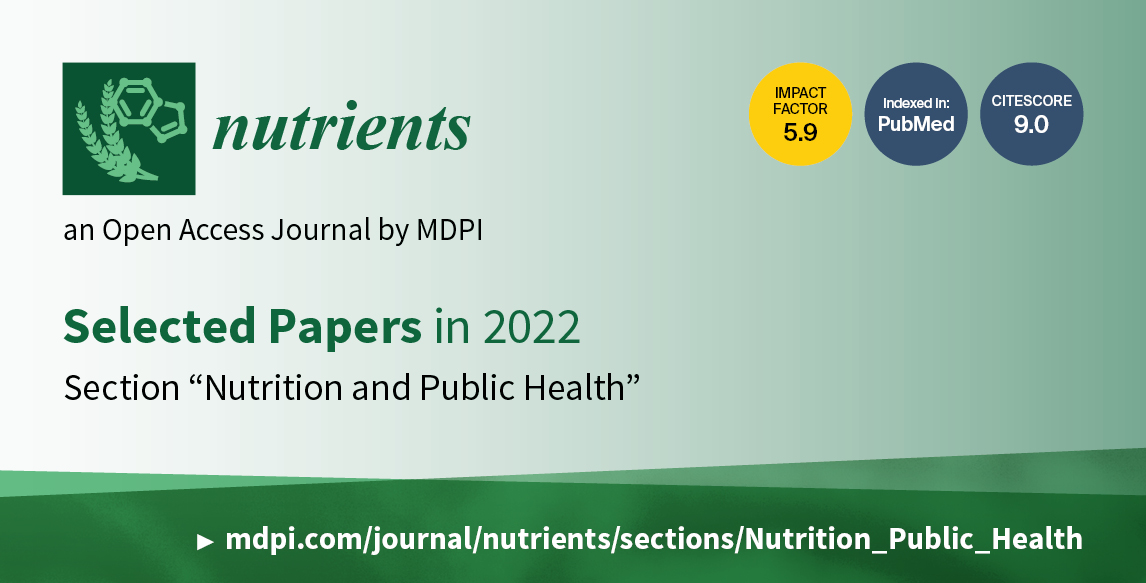
As all of the articles published in our journal are in an open access format, you have free and unlimited access to the full text. We welcome you to read our most highly cited papers published in 2022 listed below:
“Health Benefits of Apple Juice Consumption: A Review of Interventional Trials on Humans”
by Bastien Vallée Marcotte, Marie Verheyde, Sonia Pomerleau, Alain Doyen and Charles Couillard
Nutrients 2022, 14(4), 821; https://doi.org/10.3390/nu14040821
Available online: https://www.mdpi.com/2072-6643/14/4/821
“Reported Changes in Eating Habits Related to Less Healthy Foods and Beverages during the COVID-19 Pandemic among US Adults”
by Sohyun Park, Seung Hee Lee, Amy L. Yaroch and Heidi M. Blanck
Nutrients 2022, 14(3), 526; https://doi.org/10.3390/nu14030526
Available online: https://www.mdpi.com/2072-6643/14/3/526
“Systematic Review of the Effects of Exercise and Physical Activity on the Gut Microbiome of Older Adults”
by Catarina Ramos, Glenn R. Gibson, Gemma E. Walton, Daniele Magistro, Will Kinnear and Kirsty Hunter
Nutrients 2022, 14(3), 674; https://doi.org/10.3390/nu14030674
Available online: https://www.mdpi.com/2072-6643/14/3/674
“Long Term Follow-Up of Sarcopenia and Malnutrition after Hospitalization for COVID-19 in Conventional or Intensive Care Units”
by Dan Levy, Margherita Giannini, Walid Oulehri, Marianne Riou, Christophe Marcot, Megane Pizzimenti, Lea Debrut, Anne Charloux, Bernard Geny and Alain Meyer
Nutrients 2022, 14(4), 912; https://doi.org/10.3390/nu14040912
Available online: https://www.mdpi.com/2072-6643/14/4/912
“The Effect of Artificial Sweeteners Use on Sweet Taste Perception and Weight Loss Efficacy: A Review”
by Klara Wilk, Wiktoria Korytek, Marta Pelczyńska, Małgorzata Moszak and Paweł Bogdański
Nutrients 2022, 14(6), 1261; https://doi.org/10.3390/nu14061261
Available online: https://www.mdpi.com/2072-6643/14/6/1261
“Are We What We Eat? Impact of Diet on the Gut–Brain Axis in Parkinson’s Disease”
by Margherita Alfonsetti, Vanessa Castelli and Michele d’Angelo
Nutrients 2022, 14(2), 380; https://doi.org/10.3390/nu14020380
Available online: https://www.mdpi.com/2072-6643/14/2/380
“Eating out of Home: Influence on Nutrition, Health, and Policies: A Scoping Review”
by Eva Gesteiro, Alberto García-Carro, Raquel Aparicio-Ugarriza and Marcela González-Gross
Nutrients 2022, 14(6), 1265; https://doi.org/10.3390/nu14061265
Available online: https://www.mdpi.com/2072-6643/14/6/1265
“Plant-Based Dairy Alternatives: Consumers’ Perceptions, Motivations, and Barriers—Results from a Qualitative Study in Poland, Germany, and France”
by Dominika Adamczyk, Diana Jaworska, Daria Affeltowicz and Dominika Maison
Nutrients 2022, 14(10), 2171; https://doi.org/10.3390/nu14102171
Available online: https://www.mdpi.com/2072-6643/14/10/2171
“What Are the Effects of Vitamin A Oral Supplementation in the Prevention and Management of Viral Infections? A Systematic Review of Randomized Clinical Trials”
by Alessandra Sinopoli, Susanna Caminada, Claudia Isonne, Maria Mercedes Santoro and Valentina Baccolini
Nutrients 2022, 14(19), 4081; https://doi.org/10.3390/nu14194081
Available online: https://www.mdpi.com/2072-6643/14/19/4081
by Charlotte C. Gupta, Grace E. Vincent, Alison M. Coates, Saman Khalesi, Christopher Irwin, Jillian Dorrian and Sally A. Ferguson
Nutrients 2022, 14(3), 420; https://doi.org/10.3390/nu14030420
Available online: https://www.mdpi.com/2072-6643/14/3/420
5 February 2024
Acknowledgment of the Reviewers of Nutrients in 2023
In recognizing the exceptional efforts of our reviewers in 2023, we express our sincere gratitude for upholding the high standards of Nutrients. Their commitment ensured the rigorous peer review that is integral to quality academic publishing.
In 2023, Nutrients received 15543 review reports, from 8662 reviewers. This past year, we worked with reviewers from 103 countries and regions, reflecting the diversity in our collaboration with research communities. Their dedication shapes scholarly discourse and advances global research. The editorial team expresses gratitude for the vital role played by each reviewer in the Nutrients family throughout 2023, and we look forward to their continued support in 2024.
The following are the reviewers who have consented to show their names:
| A Ganesan | Lana EL OSTA |
| A. N. M. Mamun-Or-Rashid | Lanfranco D'elia |
| A. Velena | Lara Costantini |
| Aarti Nagayach | Larissa Krasnopolskaya |
| Abazar Ghorbani | Larry Tucker |
| Abbas F. Almulla | Lars Ängquist |
| Abbas Malandish | Lars Christensen |
| Abbas Smiley | Lasse Markussen |
| Abdul Bari Shah | Lateef Ahmad |
| Abdul Rashid Aziz | Laura Aracely Contreras-Angulo |
| Abdul Sadiq | Laura Chiavaroli |
| Abhay Tiwari | Laura Domínguez Díaz |
| Abhirup Shaw | Laura Mazilu |
| Abhishek Anant Kulkarni | Laura Zlibinaite |
| Abhishek Bhattacharya | Laura-María Compañ Gabucio |
| Abraham Wall-Medrano | Laura-Marinela AILIOAIE |
| Adam Wichniak | Laurence Balas |
| Adam Włodarczyk | Laurene Rehman |
| Adel Hammoutène | Laurentiu M. Pop |
| Adela Badau | Lazzeri Giacomo |
| Adelina Vlad | Leander Corrie |
| Adina Braha | Lei Huang |
| Adina Magdalena Musuc | Leigh Ward |
| ADINA ROCEANU | Leila Abdelhamid |
| Adriaan Van Bodegraven | Leilson Ribeiro |
| Adrian Costache | Lentze Michael |
| Adrian Sadłowski | Lenycia de Cassya Lopes Neri |
| Adriana Caldo-Silva | Letao Fan |
| Adriana Fodor | Letizia Bernardo |
| Adriana Grigoraș | Liang Zhang |
| Adriana Rusu | Libo Tan |
| Adriana Urcan | Lidia Caporossi |
| Agata Gazdzinska | Lidia Perenc |
| Agata Stanek | Lidia Santarpia |
| Agata Znamirowska-Piotrowska | Lifu Sheng |
| Agathi Pritsa | Li-Han Chen |
| Agnieszka Chwałczyńska | Lijing Gong |
| Agnieszka Gunia-Krzyżak | Lili Zhang |
| Agnieszka Jankowska | Liliana Cristina Soare |
| Agnieszka Micek | Liliana Dumitrache |
| Agnieszka Stawarska | Liliya Mihaylova |
| Agnieszka Szlagatys-Sidorkiewicz | Lilya Dzhemileva |
| Agnieszka Zdzislawa Robaszkiewicz | Limin Shi |
| Agnieszka Zelek-Molik | Lin Zhu |
| Agustin Ariño | Linda Myers |
| Ahmad Khusairi Azemi | Linda YAKER |
| Ahmed A. Zaky | Ling Yang |
| Ahmed Abdel Moneim | Lingli Deng |
| Ahmed Abdellatif | Lionel Ulmann |
| Ahmed Darwish | Lisa Lungaro |
| Ahmed Doghish | Lissé Angarita |
| Ahmed Rakib | Liudmila Gerasimova-Meigal |
| Ahmet Ayaz | LIVIU MACOVEI |
| Ahsan Javed | Liwang Gao |
| Ai Yue | Ljilja Torovic |
| Aijaz Bhat | Loredana Bergandi |
| AIKATERINI KONSTANTINIDI | Loredana Brioschi |
| Aikaterini Theodorou | Loredana Elena Vijan |
| Aileen Hill | Lorena Elena Melit |
| Ailton Cesar Lemes | Lorena Mardones |
| Ajay Singh | Lorenzo Caruso |
| Akalesh Verma | Lorenzo Zanella |
| Akihiko Katayama | Loris Pinto |
| Akihiko Murayama | Lothar Brecker |
| Akinkunmi Paul Okekunle | Lourdes Franco |
| Akira Ishida | Luan Luong Chu |
| Akira Minoura | Luana Toniolo |
| Alain Massart | Luca Falzone |
| Alan Fernandes | Luca Potestio |
| Alanderson Ramalho | Luca Toti |
| Albert F. Smith | Lucas Delmonico |
| alberto finamore | LUCAS FORNARI LAURINDO |
| ALBERTO JORGE OLIVEIRA LOPES | Lucia Pedrosa |
| Alberto Zamora | Lucia De Rosa |
| Alda Attina' | Lucia Pirvu |
| Aldo Manzin | Lucia Scisciola |
| Aldo Proietti-Junior | Lucia Sideli |
| Alejandra García-Gasca | Lucia Stanciakova |
| Alejandro Islas-Jácome | Lucian Birsa |
| Alejandro Suarez de la Rica | Lucian Evdochim |
| Aleksandar Stojsavljević | Luciana Baroni |
| Aleksander Czogalla | Luciano Colangelo |
| Aleksandra Czumaj | lucilla crudele |
| Aleksandra Jovanović Galović | Lucyna Ścisło |
| Aleksandra Józefczyk | Ludmila Kazdova |
| Aleksandra Klisic | Luigi Di Filippo |
| Alena Buková | Luigi La Via |
| alessandra amato | Luigi Ruggiero |
| Alessandra De Giani | Luis Apaza Ticona |
| Alessandra Sinopoli | Luis Cobos Puc |
| Alessandro Benedetto | Luís Crisóstomo |
| ALESSANDRO DI RIENZO | Luis G. Celis-Regalado |
| Alessandro Maugeri | Luis Leitão |
| Alessandro Salatino | Luis Salgado |
| Alessandro Strumia | LUIS Yurrita |
| Alevtina Savicheva | Luiz Leonardo Saldanha |
| Alexander Deryabin | Łukasz Lewandowski |
| Alexander Lykov | Lukasz Nawacki |
| Alexander Zemchenkov | Luke Chong |
| Alexandr Ceasovschih | Luling Lin |
| Alexandra Craciun | Lutz Schomburg |
| Alexandra Dobell | M. Belén Alonso Ortiz |
| Alexandra Filippopoulou | M. Isabel Ismael |
| Alexandra-Maria Michaelidou | M. Teresa Llinás |
| Alexandros Sykaras | Mª Luisa Zagalaz Sánchez |
| Alexandru Florea | Macarena Lozano |
| Alfredo Caturano | Maciej Socha |
| Ali Ali Redha | Mack Shelley |
| Alice Monzani | Maddalena Rossi |
| Alice Raphael Karikachery | Madelene Ericsson |
| Alice Verticchio Vercellin | Magdalena Matyasik |
| Alicia Heath | Magdalena Orczyk-Pawiłowicz |
| Alin Laurentiu TATU | Magdalena Rudzińska |
| Alin Mihai Vasilescu | Magdalena Skotnicka |
| Alina Popa | Magdalena Zabielska-Kaczorowska |
| Alin-Constantin Pînzariu | Magdalena Zemelka-Wiacek |
| Allen Pettey | Magnus Monné |
| ALMA VILLASEÑOR | Maha Nasr |
| Alma. D. Hernández-Fuentes | Maharshi Bhaswant |
| Álvaro Astasio-Picado | Mahbub MH |
| Alvaro Cruz Carrión | Mahdi Mahdipour |
| Alvaro Macias | Mahendra Chordia |
| Alvaro Perez | Mahesh Gupta |
| Alvin Wong | Mahesh Nepal |
| Amany Abdel-Rahman | Mahmoud Abdallah |
| Ambikapathi Nivetha | Mahmoud Balbaa |
| Amby Anoruo | Mahrous Abdelbasset Ibrahim |
| Amelia Caretto | Maija Huttunen-Lenz |
| Amélia Martins Delgado | Maja Kozarski |
| Amelia Silva | Małgorzata Chojak |
| Amir Ariff | Małgorzata Gajewska |
| Amira Abdellatef | Małgorzata Gietka-Czernel |
| Ammar Saleem | Małgorzata Godala |
| Amna Sahar | Małgorzata Grabarczyk |
| Amrita Sarkar | Małgorzata Jamka |
| Amritlal Mandal | Małgorzata Kołodziej |
| Amutha Ramadas | Małgorzata Matysek |
| Amy Lovell | Małgorzata Stachoń |
| Amy Shaver | Małgorzata Szczuko |
| Ana Maria Silva | Malgorzata Tyszka-Czochara |
| Ana Bustos | Malin Holmström Rising |
| ANA BUZALEH | Manhai Long |
| Ana Carolina Rabelo | Manisha Naithani |
| Ana Castanho | manohar kodavati |
| Ana Dascalu | Manoj Kumar |
| Ana Karković Marković | MANOJ NEOG |
| Ana Leahu | Manoj Tripathi |
| Ana Luísa De Sousa-Coelho | Manuel Gómez-Guzmán |
| Ana Maria Carmona-Ribeiro | Manuel Ortega-Calvo |
| Ana Moreno Alvarez | Manuel Sanchez |
| Ana Pereira | Mara Carsote |
| Ana Rita Jesus | Marc Briggs |
| Ana Stupin | Marcelino Pérez-Bermejo |
| Ana Teixeira | Marcellino Monda |
| Anamaria Ciubara | Marcelo Arancibia |
| Anamaria Cozma-Petruț | Marcelo Barros |
| Anamaria Ioana Paştiu | Marcia Bastos Convento |
| Anamaria Savu | Marcin Dziekiewicz |
| Anand Desai | Marcin Gackowski |
| Anand Joshi | Marcin Maciejczyk |
| ANAPAULA VINAGRE | Marcin Różewicz |
| Anastasios Apostolos | Marco Atteritano |
| Anastasios Serbis | Marco Carmignani |
| Anastasiya Kazantseva | Marco Cosentino |
| Anastazia Kei | Marco Fabbri |
| Anbazhagan Sathiyaseelan | Marco Invernizzi |
| Anders Larsson | Marco Meyer |
| Andleeb Khan | Marco Tafani |
| Andor Molnár | Marcos Brioschi |
| André Dos Santos | MARCOS DRUMMOND |
| André Moreira-Rosário | Marcos Herkenhoff |
| André Pinto | Marcos Lima |
| André Silva Júnior | Marek Wesolowski |
| Andrea Battistoni | Margalida Monserrat-Mesquida |
| Andrea Cioffi | Margaret Slavin |
| Andrea Deledda | Margarida Cardoso |
| Andrea Godino | Margarida Liz Martins |
| Andrea Maria Patelski | Margarida Vieira |
| Andrea Mastinu | Margarita Aguilera |
| Andrea Re Cecconi | margherita borriello |
| Andrea Tittarelli | Margriet Fleur Charlotte De Jong |
| Andrea Trombetta | Maria Adriana Neag |
| Andrea Vania | Maria Angeles Rojo |
| Andreas Anestis | Maria Antonietta Panaro |
| Andreas Doetsch | Maria Baltogianni |
| Andreas Troumbis | Maria Blanco-Diaz |
| Andreea Lili Barbulescu | María Concepción Robles-Gil |
| Andrei Bunaciu | Maria Cristina Caroleo |
| Andrei Dumitrescu | Maria de Lurdes Nunes Enes Dapkevicius |
| Andrés Godoy | Maria Denisse Montoya Flores |
| Andrew Hill | María Dolores Marrodán Serrano |
| Andrew Jin | Maria Enrica Bettinelli |
| Andrey Markov | Maria Ida Maiorino |
| Andrey Nagdalian | Maria Jesus Herrero |
| Andrzej Szutowicz | Maria José Caramujo |
| Anestis Dougkas | Maria Jose Muñoz Alferez |
| Aneta Ostróżka-Cieślik | MARÍA JULIA AJEJAS BAZÁN |
| Aneta Otocka-Kmiecik | Maria Leonor Faleiro |
| Ángel Arturo López González | María Leyre Lavilla- Lerma |
| Ángel Denche-Zamorano | Maria Loureiro |
| Angel Gustavo Salas-Lais | Maria Manuela Silva |
| Angel Llamas | Maria Michelle Papamichael |
| Ángel Luis García-Otín | Maria Miletta |
| Angela Conte | Maria Paola Bertuccio |
| Angela Sorrentino | Maria Pina Concas |
| Angeliki Katsafadou | Maria Salome Gomes |
| Angelo Fumia | MARIA SANTILLAN |
| Angelo hooker | Maria Simona Chis |
| Anibal de Freitas Santos Junior | MARIA SOLE FACIONI |
| ANIL KUMAR | Maria Teresa Ferreira Moreira |
| Anil Sharma | MARIA TERESA GUAGNANO |
| Aniruddha Das | María Teresa Hernández-Huerta |
| Anis Sfendla | Maria Teresa Iglesias López |
| Anita Silvana Ilak Peršurić | María Teresa Nestares |
| Anita Subramanian | Maria Turtoi |
| Anja Kathrin Jaehne | Maria Wallert |
| Ankit Shroff | Maria Wróbel |
| Ankona Banerjee | MARIA-GABRIELA ANITEI |
| Ann Anderson Berry | Marialuisa Lugaresi |
| Anna Birgitte Milford | Marian BUTU |
| Anna Charuta | Mariana Eugenia Mureșan |
| Anna Jamroz-Wis̈niewska | Mariana Ferdes |
| Anna Kęska | Mariana Floria |
| Anna Klintsova | Mariana Melo |
| Anna Kopiczko | Mariana Palage |
| Anna Milczarek | Mariangela Mancini |
| Anna Ogrodowczyk | Mariann Harangi |
| Anna Oniszczuk | Marianna Török |
| Anna Pilutin | Mariarita Spampinato |
| Anna Piotrowska | Maricarmen Vizcaino |
| Anna Presicci | Marie Sjögren |
| Anna Spagnoletta | Marietta Kiss |
| Anna Staniszewska | Mariko Fujisawa |
| Anna Stasiak | Marilia Carabotti |
| Anna Vila-Martí | Marilyn Cornelis |
| Anna Vittoria Mattioli | Marina Krpan |
| Annalisa Barbieri | Marina Mordenti |
| Annalisa Chiavaroli | Marina Sayuri Nogueira |
| Annamaria Zsakai | Marine Coué |
| Annarita Stringaro | Mario Bernardo-Filho |
| Anne Marie Minihane | Mario Dell'agli |
| ANTIMO CUTONE | Mario Diplomatico |
| Antonella Rosa | Mario F. C. Santos |
| Antoni Pons | Mario Felice Tecce |
| Antoni Stadnicki | Mario Marendić |
| Antonietta Robino | Mario Simirgiotis |
| Antonina Starodubova | Marion Korach-André |
| Antonio Aversa | Marios Hadjicharalambous |
| Antonio Cerasa | Marisol Fernández Ortiz |
| Antonio E Pontiroli | Marius Baranauskas |
| Antonio Gidaro | Marius Craina |
| Antonio Jesús Ruiz Malagón | Mariusz Hartman |
| Antonio Miguel Linares-Luján | Mariusz Niemczyk |
| Antonio Mincione | Mariya Smetanina |
| Antonio Oliveira | Mark Fox |
| Antonio Stasi | Mark Musch |
| ANU PAUL | Mark Willems |
| Anushka Gupta | Marko Baralić |
| Anwar Ali | Markus Puchinger |
| Ao Shi | Markus Wilhelmi |
| Apolinaras Zaborskis | Marlene Fabiola Escobedo Monge |
| Apostolos Thomareis | Marlene Santos |
| Arda Isik | Marloes Dekker Nitert |
| Argha Mondal | Marouane CHEMEK |
| Arianna De Mori | Marta Gaburjáková |
| Arif Sabta Aji | Marta Jackowska |
| Arina Ponomarenko | Marta Jeruszka-Bielak |
| Arindam Ghosh Mazumder | Marta Liszka-Skoczylas |
| Aris Kaltsas | Marta Menegoli |
| Aristea Gioxari | Marta Sochocka |
| Aristeidis Stavroulopoulos | Marta Wysocka-Mincewicz |
| Arjun Singh | Martha Alejandra Morales-Sánchez |
| Armando Caseiro | Martha Gallegos |
| Armando Patrizio | martin grajower |
| Áron Török | Martin Lenicek |
| Arrigo Cicero | Martin M. Mortazavi |
| Artur Ferron | Martin Roderfeld |
| Artur Słomka | Martin Root |
| Arunaksharan Narayanankutty | Martin Schepelmann |
| Ashish Mohite | Martin Stephne Lipsky |
| Ashley Tovar | Martin Svoboda |
| Ashu Johri | Martina Gažarová |
| Asif Khaliq | Martina Smolic |
| Asmaa Khafaga | Martis Georgiana |
| Atefeh Najafi | Marvin Soriano-Ursua |
| Atique Behan | Marwa Ali |
| Atsushi Kawahara | Marwan El Ghoch |
| Atukuri Dorababu | Mary Maj |
| Augustin C. Moţ | Mary O’connell O’Connell Motherway |
| Aunchalee Aussanasuwannakul | Maryam Ranjbar |
| Aura M. Jiménez Garduño | Marzia Di Donato |
| Aurea Ramírez-Jiménez | Masaaki Inaba |
| Aurelijus Burokas | Masaru Tanaka |
| Aurelio Seidita | Masayuki Okuda |
| Auriel A. Willette | Massimiliano Ammirabile |
| Austin Graybeal | Massimo D'Archivio |
| Avisek Majumder | Matea Nikolac Perkovic |
| Ayse Gunes-Bayir | Matea Zajc Petranović |
| Azad Bhuiyan | Matei Marcel |
| Azmat Ullah | Mateja Sirše |
| BAJI SHAIK | Mateusz Babicki |
| Barbara Lanza | Mateusz Szudzik |
| Barbara Olendzki | Matt Spick |
| Bart van Hoek | Matteo Cotta Ramusino |
| Bartłomiej Gmaj | Matthew Cook |
| Bartosz Kruszewski | Matthew Taylor |
| Basant Puri | Matthias Breidert |
| Beata Druzynska | Matthias Eckhardt |
| Beata Gruber-Bzura | Matti Jauhiainen |
| Beata Kasztelan-Szczerbinska | Mattia Spano |
| Beate Obermüller | Mattias Paulsson |
| Beatriz Pereira | Maureen Meister |
| Beatriz Puisac | Maurizio Balestrino |
| Beenish Chaudhry | Maurizio Manera |
| Begoña Olmedilla-Alonso | Mauro Lombardo |
| Bela Balint | Maximilian Hammer |
| Benjamin Rolles | Maximilian Storz |
| Berenika Szczęśniak-Sięga | Mayank Choubey |
| Bert Bosche | Mayukh Guha |
| Bertrand Kaeffer | Mayur Doke |
| Beth McMannis | Md. Tariqujjaman |
| Bettina Wölnerhanssen | Mebrahtu Tedla |
| Bhagwati Gupta | Megan L. Falsetta |
| Bhoomika Patel | Mekala Venkatachalam |
| Bianca-Maria Tihauan | Melania Melis |
| Bice Avallone | Mengxi Shen |
| Bi-He Cai | Michael Boschmann |
| Bilal Ghalloo | Michael Petrie |
| Biljana Miova | Michael Szardenings |
| Bill Woodward | Michael Walter |
| Bin Du | Michaela Šiklová |
| Bin Qiu | Michal Czapla |
| Bingxian Xie | Michał Ginszt |
| Bingyan Li | Michał Gontarz |
| Birute Strukcinskiene | Michał Karbownik |
| Bistra Galunska | Michał Zarobkiewicz |
| Blessing Akombi-Inyang | Michel Jancloes |
| Bo Sun | Mickaël DURAND-DUBIEF |
| Bo Tang | Mieko Nakamura |
| Bodil Ohlsson | Miguel Ángel Montero-Alonso |
| Bogdan Amuzescu | Miguel Angel Rubio-Herrera |
| Bogdan Chis | Miguel Brito |
| Bogna Grygiel-Górniak | Miguel Montoro |
| Bojan Knap | Miguel Romero |
| Bojan Masanovic | Miguel Sánchez-Castro |
| Bojana Kokić | Miha Moškon |
| Bojana Vidović | Mihaela Hostiuc |
| Bojarska Joanna | Mihaela Niculae |
| Boldeanu Virgil | Mihaela Vlad |
| Boleslaw T. Karwowski | Mihaela-Simona Subtirelu |
| Bonglee Kim | Mihai Covasa |
| Boryana Nikolova-Mladenova | Mihai CRAIU |
| Bowen Li | Mihai Georgescu |
| Bożena Cukrowska | Mihai Popescu |
| Božena Ćurko-Cofek | Mihail Chervenkov |
| Bratko Filipic | Mihalj Poŝa |
| Brian D. Adams | Mikhail Kostik |
| Brisamar Estébanez | Mikhail Vorob'ev |
| Bruno Bonnechère | Mikkel Nørgård |
| Cai-Ping Zhang | Mikko Laukkanen |
| Candida Manuel | Milan Toma |
| Cara J. Westmark | Milka Mileva |
| Carla Ferreri | Miłosz Caban |
| Carla Masala | Min Deng |
| Carla Petrella | Mindy Millard-Stafford |
| Carlo Castruccio Castracani | Ming-Wei Lin |
| Carlo Maria Rossi | Mira Horváthová |
| Carlos Escobar | Mircea-Catalin Fortofoiu |
| Carlos Gamarra-Luques | Mirolyuba Ilieva |
| CARLOS ORTIZ-MENDOZA | Miroslava Atanassova |
| Carlos Pastor Vargas | mirta crovetto |
| Carlos Sanz García | Mirto Foletto |
| Carlos Vasconcelos | Mislav Mikuš |
| Carmela Rinaldi | Mithun Rudrapal |
| Carmen Balan | Mititelu Magdalena |
| Carmen Enrique Mirón | Mohamad Hesam Shahrajabian |
| Carmen Rohde | Mohamed Ahmed Tammam |
| Carmen Rubio Armendariz | Mohamed Ali |
| Carmen-Rosa Hernández-Socorro | Mohamed Elfaruk |
| Carmine Izzo | Mohamed Jaber |
| Carol Johnston | Mohamed Khalifa |
| Carol Nash | Mohammad Alfhili |
| Carolina Otero | Mohammad Attaullah |
| CAROLINA PÉREZ REYES | Mohammad Mehdizadeh |
| Carolina Restini | Mohammad Qneibi |
| Caroline S. Stokes | Mohammadian Mehdi |
| Carolyn Abitbol | Mohammadreza Mohammadabadi |
| Carsten Carlberg | Mohammed Goni |
| Cassiano Gonçalves-de-Albuquerque | Mohd Nazam Ansari |
| Catalin Herghelegiu | Moisés Silva |
| Catana Cristina | Mojtaba Bayani |
| Catarina Gregório Martins | Mona Boaz |
| Caterina Formichi | Monica Trif |
| Catharine Fleming | Monika Fekete |
| Catherine Bennetau-Pelissero | Monika Grabia |
| Catherine Chan | Monika Kosmala |
| Catherine Kunyanga | Monika Łopuszańska-Dawid |
| Cécil Meulenberg | Monika Martiniaková |
| Cecilia Georgescu | Monika Mielus |
| Cecilia Lazea | Monika Przeor |
| Celia Strunz | Montserrat Esteve |
| Céline Tiffon | Moshe Frenkel |
| Cenyi Wang | Mostafa Baky |
| Cesar Martín Bozzola | Mostafa Gouda |
| Cesare Sirtori | Mostefa FODIL |
| CESARE Tosetti | Muawuz Ijaz |
| Chad Yixian Han | Mugagga Kalyesubula |
| Chan Zhang | Muhammad Adnan Bodlah |
| Changshan Niu | Muhammad Fasih Khalid |
| Chao Luo | MUHAMMAD HUMAYUN |
| Chao Ma | Muhammad Kashif Yar |
| Chao Sun | Muhammad Mahmood |
| CHARALAMPIA AMERIKANOU | Muhammad Nadeem |
| Chen Dong | Muhammad Sajid Hamid Akash |
| Cheng Wang | Mujeeb Khan |
| Chenghao Chen | Murali Dama |
| Chengquan Ma | Muralidharan Arumugam Ramachandran |
| Chennaiah Ande | MURUGANANTH KUMAR RAJU |
| Chenqi Tao | Mustafa Yaman |
| Chethan Sampath | Mustapha Imam |
| Chia Shan Wu | Muthukumar Karuppasamy |
| Chiao-Ming Chen | Muthuvel Jayachandran |
| Chi-Chih Hung | Myoung-Sook Shin |
| Chien-Liang Chen | Myron Szewczuk |
| Chih-Chien Sung | Nada Mostafa |
| Chih-Li Lin | Nada Oršolić |
| Chika Momoki | Nader Tanideh |
| Chin-Lon Lin | Nadine Baumgart |
| Chinmayi Prasanna | Nae-Cherng Yang |
| Christa Nehs | Nagendraprabhu Ponnuraj |
| Christian Bux | Nain-Feng CHU |
| Christie Bennett | Naman Vatsa |
| Christina Oetzmann von Sochaczewski | Nan Jiang |
| Christine Garner | Nan Miao |
| Christine Yee Yan Wai | Nan Wang |
| Christoph Binder | Nancy J. Rehrer |
| Christopher D'adamo | Nancy Reame |
| Christopher Kobierzycki | Nancy Saad |
| Christopher Lievens | Naohisa Shobako |
| Christos Kourek | Naotake Funamizu |
| Christos Papaneophytou | Naresh Poondla |
| Chrysoula (Chrysa) Voidarou | Naser Alsharairi |
| Chuanjin Wu | Nasima Akhter |
| Chuanqi Chu | Nasser Laouali |
| Chunyue Wang | Nassim Naderi |
| Cidália Dionísio Pereira | Nasui Bogdana Adriana |
| Cinzia Ferraris | Natale Musso |
| Cinzia Giacometti | Natalia Belkova |
| Ciprian Constantin | Natalia Belosludtseva |
| Ciprian Ilea | Natalia Ferreira Mendes |
| Ciprian Silaghi | Natalia Świątoniowska-Lonc |
| Claire Stocker | Nataša Marčun Varda |
| Clara Lima | Nathalie Guriec |
| Claudia Altamura | Nathaniel Szewczyk |
| Claudia Calzada | Naveen Sharma |
| Claudia Giovagnoli-Vicuña | Navid Abedpoor |
| Cláudia Jacques Lagranha | Nazario Foschi |
| Claudia Manca | Nebojsa Ilic |
| Claudiu Morgovan | Nebojsa Pantelic |
| Claudiu Popescu | Neeladrisingha Das |
| Codruta Popescu | Neelam Sharma |
| Connie Weaver | Neelanjan Vishnu |
| Constantin Munteanu | Nejc Umek |
| Constantine E. Kosmas | Neli-Kinga Olah |
| CONSTANTINOS GIAGINIS | Nelly Datukishvili |
| Corica Francesco | Nemat Ali |
| Corina Predescu | Nevin SANLİER |
| Corina Zugravu | Nicola Manfrini |
| Cornelia Mircea | NICOLA NANTE |
| Cornelia Weikert | Nicolae Gica |
| Corrado Romano | Nicoleta Anton |
| Cosimo Galletti | Nicolò Fabbri |
| Costel Mironeasa | Nicos Maglaveras |
| Craig Frank | Nidia Casas Forero |
| Cristian Del Bo' | Nikee Awasthee |
| Cristian Gergichevich | Nikola Štoković |
| Cristian Sandoval | Nikolina Mihaylova |
| Cristiana Pistono | Nilima Rajpal Kundnani |
| Cristiano Fava | Nina Filip |
| Cristina Gabriela Grigoraş | Nirmalya Dasgupta |
| Cristina Manuela Dragoi | Nisarat Phithakwatchara |
| Cristina Raluca Gh. Popescu | Nithyananthan Subramaniyam |
| Cristina Vassalle | NITIN AMDARE |
| Cruciat Gheorghe | Niya Zhang |
| Cynthia Barrera | Nobuhiro Kanemura |
| Cyril NICOLAS | Noelia Soledad Bedoya-Perales |
| Dae-Wui Yoon | Norbert Quadflieg |
| Daisuke Sato | Norrie Pearce |
| Damien Lannoy | Nunzia Gallo |
| Dan Shi | Nunzio Di Nunno |
| Dan Tesloianu | Nurhanis Syazni Roslan |
| DANA CARMEN ZAHA | Nuria Gimenez-Blasi |
| Dana Ciobanu | Nurpudji Astuti Taslim |
| Dana Lucia Stanculeanu | Nur-Vaizura Mohamad |
| Dana Teodora Anton Paduraru | Oana Pop |
| Dancho Danalev | Oana Sirbu |
| Daniel Antwi-Amoabeng | Ock Chun |
| Daniel Piskorz | Octavian Vasiliu |
| Daniel Potaczek | Octavio Galindo-Hernandez |
| Daniel Sanz-Martín | Ofer Gover |
| Daniel Ślęzak | Olesia Makhutova |
| Daniel Wilson | Olga Anatskaya |
| Daniel Zalewski | Olga Giménez-Palop |
| DANIEL Zamora-Valdés | Olga Lyublinskaya |
| Daniela Baconi | Olguța Orzan |
| Daniela Buchaim | Oliver Sander |
| Daniela Elena Serban | Olubunmi Oladunjoye |
| Daniela Gomes | Olutosin Otekunrin |
| Daniela Hanganu | Omar Cauli |
| Daniela Istrati | Omar Porras |
| Daniela Lopes Gomes | Oren Contreras-Rodríguez |
| Daniela Opriş-Belinski | Osaka University Graduate School Medicine |
| Daniele Maria-Ferreira | Osama Kishta |
| Daniele Sola | Óscar Lorenzo González |
| Danielle Greenberg | Ottavia Eleonora Ferraro |
| Danijela Cvetković | Pablo Zambrano |
| Danijela Horvatek Tomic | Pai Peng |
| Danijela Radojkovic | Palaniyandi Karuppaiya |
| Danijela Ristic-Medic | Pamela Koch |
| Danka Bukvicki | Panagiota Mitrou |
| Danuta Gajewska | Panagiota Xaplanteri |
| Dario Calafiore | Panagiotis Tsiartas |
| dariusz bazaliński | PANAGIOTIS TSIKOURAS |
| Dariusz Chlubek | Pantelis Zebekakis |
| Daryoush Babazadeh | Panthakarn Rangsinth |
| Daryoush Shahbazi-Gahrouei | Paola Iaccarino Idelson |
| David Bar-Or | Paola Iovino |
| David Daguet | Paola Mantuano |
| David Hill | Paola Sangiorgio |
| David Kump | Paolo Di Giamberardino |
| David Lawrence | Paolo Magni |
| David Mela | Paolo Meneguzzo |
| David Ramiro-Cortijo | Paolo Polidori |
| David Rudd | Pär Myrelid |
| David Varillas Delgado | Parasuraman Subramani |
| Davide Bertelli | Parisa Gazerani |
| Davide Giuseppe Ribaldone | Parisa Ziarati |
| Davide Lauro | Partha Narayan Dey |
| Debashis Dutta | Pasqua Anna Quitadamo |
| Debasish Dey | Patric Delhanty |
| Débora Santos | Patrícia Monteiro Seraphim |
| Deborah Good | Patricia Reboredo-Rodríguez |
| Deborah Verran | Patricia Vermeersch |
| Debra L. Safer | Patrick Martin |
| Deepak Ahire | Patrick Poucheret |
| Deiana Roman | Patrick Rockenfeller |
| Demin Cai | Patrizia Riso |
| Denis Nchang Che | PATROKLOS VARELTZIS |
| Denisa Margina | Patxi León-Guereño |
| Denise Dillon | paul clayton |
| Derar H. Abdel-Qader | Paul Harrison |
| Dhan Shrestha | Paul Mcjarrow |
| Dhirendra Singh | Paul Ramirez |
| Diana Rojas-Gómez | Paula Alexandra Lopes |
| Diana Vranceanu | Paula Cristina Cola |
| Dianbao Zhang | Paula Dworatzek |
| Diego A. Esquivel-Hernandez | Paula Pereira |
| Diego Castro Musial | Paula Pinto |
| Diego Estrada-Luna | Paula Silva |
| Diego Martinez | Paula Tavares |
| Diego Mora | Paulina Adamska |
| Dimitri Kakabadse | Paulo Henrique Guerra |
| Dimitris Kounatidis | Paulo Schwingel |
| Diogo Martinho | Paulo Tambasco de Oliveira |
| Dionysios Tafiadis | Pavel Rehak |
| Dipak Kumar Sahoo | Pavel Solopov |
| Dirk W. Lachenmeier | Pedro Araujo |
| Doina Andrada Mihai | Pedro Gil-Madrona |
| Doina Todea | Pedro Melo |
| Domagoj Vidosavljevic | Pedro Paulo Scariot |
| Domenico Di Raimondo | Pedro Tauler |
| Domenico Ferro | Pedro Valdivia-Moral |
| Domenico Lio | Peter C. Konturek |
| Dominika Skolmowska | Peter Fahmy |
| Dominika Zając | Peter Lemon |
| Don Green | Peter Piko |
| Dong Keon Yon | Petr Masliukov |
| Dongxu Wang | Petros Papalexis |
| Dongying Zhang | Petru Alexandru Vlaicu |
| Dorin Dragoş | Peyman Ebrahimi |
| Dorota Formanowicz | Phakkharawat Sittiprapaporn |
| Dorota Olszewska-Słonina | Philip Calder |
| Dorota Tichaczek-Goska | Philip Chilibeck |
| Douglas Adamoski | Philip Moore |
| Douglas J. H. Shyu | Philip Prinz |
| Dragan Milicevic | Piergiorgio Cianciullo |
| Dragana Komnenov | Pieter De Lange |
| Dragana Nikolic | Pieter Jj Sauer |
| Drago Beslo | Pilar Font-Ugalde |
| Dragos Serban | Pingfan Hu |
| Dražen Čular | Ping-Hsiu Huang |
| Drew Budner | Ping-Ting Lin |
| Durreajam Khokhar | pingyuan wang |
| Dusanka Krajnovic | Piotr B. Heczko |
| Duska Martinovic Kaliterna | Piotr Dobrowolski |
| Ebba Nexo | Piotr Zarzycki |
| Eden Barrett | Pirola Carlos |
| Ederlan Ferreira | Polliana Mihaela Leru |
| Edina Pandur | Po-Wen Chen |
| Edith Claros | prajakta shinde |
| Eduardo Melguizo-Ibáñez | Prakash Adhikari |
| Eduardo Nakano | Prasenjit Mondal |
| Eduardo Piedrafita | Prashant Tarale |
| Edurne Simon | Praveen Rajendran |
| Edward Bliss | Prawej Ansari |
| Edward N. Harris | PREMRANJAN KUMAR |
| Edyta Symoniuk | Priscilla Reque |
| Eirini Christodoulou | Priti Prasanna Maity |
| Eirini Martinou | Prokopios Magiatis |
| Ekaterina Ilgisonis | Pushpa Verma (Sharma) |
| Ekaterina V Zubareva | Qi Miao |
| El Hadji M Dioum | Qian Zhang |
| Elena Bernad | Qiang Peng |
| Elena Crehuá-Gaudiza | Qilei Chen |
| Elena Dinte | Qin Xiang Ng |
| Elena Grimaccia | Qingqing Xiao |
| Elena Indukaeva | Qingsen Shang |
| Elena Maria Yubero-Serrano | Qing-Wei Chen |
| Elena Nikitina | Qirong Wang |
| ELENA OBRADOR | Quan Pan |
| ELENA TARCA | Rachel Tan |
| Elena Tchetina | Radu CRIȘAN-DABIJA |
| ELENA-DANIELA GRIGORESCU | Radu Racovita |
| Elena-Raluca Baciu | Rafael Baltiérrez-Hoyos |
| Eleni Karligiotou | Rafael Fernandez Castillo |
| Eleni Mavrogonatou | Rafael Guillen |
| Eleni Rebelos | Rafael Martín-Masot |
| ELEONORA LAI | Rafael Moreno-Gómez-Toledano |
| Eleonora Russo | Rafael Ríos-Tamayo |
| Eleonore Fröhlich | Rafael Salto |
| Elham Hosseini | Raffaele Serra |
| Elio Pizzo | Ragaa Hamouda |
| Elisa Ceccherini | Raghbendra Dutta |
| Elisa Mazza | Raghu Ramanathan |
| Elisabet Rothenberg | Rais Ansari |
| ELISABETA ANTONESCU | Rajendra Rohokale |
| Elisabeta Botez | Rajmohan Dharmaraj |
| Elisabete Pinto | Raju Bhardwaj |
| Elisabeth Pinart | Raju Senthil Kumar |
| Elisavet Stavropoulou | Rakesh Patel |
| Elizabeth Fragopoulou | Raluca Marica |
| Elke Trautwein | Ramakanta Lamichhane |
| Ellen Cristina Oliveira | Ramesh Yadava |
| Elsa Marisa Vieira | Rami Najjar |
| Elsayed Mehana | Ramona Danac |
| Elżbieta Grześk | Ran An |
| Elżbieta Jarocka-Cyrta | Randall Maples |
| Elżbieta Karlińska | Randhall Carteri |
| Elżbieta Krzęcio-Nieczyporuk | Ranjeet Kumar |
| Elżbieta Pac-Kożuchowska | Raphael Ayivi |
| Elżbieta Sochacka-Tatara | Rathnakumar Kumaragurubaran |
| Elzbieta Wierzbicka | RAUL Díaz |
| Eman Toraih | Raúl González-Domínguez |
| Emil Stoicescu | Raúl Quevedo-Blasco |
| Emilia Papakonstantinou | Ravindran Caspa Gokulan |
| Emilie Picard | RAYAZ MALIK |
| Emilio Lozano-Aguilera | Raymond Sayegh |
| Emily Johnston | Reema Tayyem |
| Emmanouil-Georgios Tzanakakis | Reggie Surya |
| Emmanuella Magriplis | Rekha Balakrishnan |
| Enric I. Canela | Renalison Farias-Pereira |
| Enrique Lozano-Bilbao | Renáta Szabó |
| Enrique Romero-Velarde | Renata Tobiasz-Salach |
| Er Sheng Gong | Renato Melo |
| Erand Llanaj | Rene Chun |
| Eric Goulet | Renqiang Yu |
| Eric Peeples | Rex Jeya Rajkumar Samdavid Thanapaul |
| Eric van Breda | Reyna Peñailillo |
| Erica R. Goldstein | Reza Nedaeinia |
| Erica Varese | Reza Shirazi |
| Erik Froyen | Ricardo Araujo |
| Erin Reed-Geaghan | Ricardo Cobucci |
| Ernesto Cortés Castell | Ricardo Hernández-Martínez |
| Estela Sanguesa | Richard Naftalin |
| Esther Cuadrado-Soto | Rina Bandopadhyay |
| Eszter Ducza | Rini Arianti |
| EUGENIA IRENE DAVIDESCU | Rita Businaro |
| Eung-Kwon Pae | Ritesh Chimoriya |
| Eusebio Chiefari | Robert Marshall |
| Eva Conceição | ROBERT ROGHAIR |
| Evelyn Frias-Toral | Robert Rucker |
| Evelyn Jantscher-Krenn | Roberta Imperatore |
| Evelyn Pereira | Roberta Masella |
| Evert Van Schothorst | Roberta Scrimieri |
| Evgeny Bojko | Roberta Zupo |
| Ewa Błaszczyk-Bębenek | roberto cannataro |
| Ewa Piątkowska | Roberto Castiglione |
| Ewa Rychlik | Roberto Codella |
| Ewa Sicinska | Roberto Fabiani |
| Ewa Śliwicka | Roberto Sanchez-Cabrero |
| Ewa Tomaszewska | Robin Cooper |
| Ewa WASILEWSKA | Robin Tucker |
| Fabio FABBIAN | Rodney Infante |
| Fábio Lanferdini | Rodolfo Pinto-Almazán |
| Fabrizio Damiano | Rodrigo Chamorro |
| Fabrizio Terenzio Gizzi | Rodrigo Moore |
| Fahimeh Ranjbar | Rodrigo Zacca |
| Fang Tong | Rogelio Rodríguez Rodríguez |
| Farah Al-Marzooq | Roger Clemens |
| Farhad Vahid | Rogério Mendes |
| Farman Khan | Rohil Bhatnagar |
| Farooq Ahmed | Roman Lysiuk |
| Fatma Eldemery | Roman Maslennikov |
| Federica Buccino | Romil Parikh |
| Federica Fogacci | Romina Alina Marc (Vlaic) |
| Federica Scarano | Rômulo Carneiro |
| Federico Infascelli | Ron Kedem |
| Federico Manai | Ronaldo Thomatieli-Santos |
| Federico Rosa | Rónán Doherty |
| Fei Liu | Rosa María Giráldez-Pérez |
| Feili Yang | Rosa Peraita-Adrados |
| Felix Sebastian Oberhoffer | Rosa Suades |
| Feng Tian | Rosalba Senese |
| Fenghai Guo | Rosanna Mallamaci |
| Feng-Qing Yang | Rosaria Varì |
| Fengyang Huang | Rosario Russo |
| Ferenc Budan | Rosendo Berengüí |
| Ferenc Orosz | Roshan Mahat |
| Fernando Cardona | Rosita Verteramo |
| Fernando De La Guía-Galipienso | Rossana Sirabella |
| Filipa Mandim | Rossella Cacciola |
| Filippe Falcao-Tebas | Rossi Indiarto |
| Filippo Carannante | Roxana Carbo |
| Filippo Mariano | Roxana Filip |
| Flavia Graca | Roxana Jijie |
| Flavia Sarti | Roxana Liana Lucaciu (Stan) |
| Flaviu Moldovan | Roxana Ramona Onofrei |
| Florian Ebner | Rozeta Sokou |
| Florica Sandru | Rozilaine Faria |
| FLORIN DUMITRU PETRARIU | ruizhi hu |
| Fragkiski Anthouli-Anagnostopoulou | Rulin Zhuang |
| Frances Hardin-Fanning | Rumyana Simeonova |
| Francesca Bosco | Ruocheng Sang |
| Francesca Denoth | Ruojun Wang |
| Francesca Pacifici | Russ Best |
| Francesca Silvagno | Rūta Kananavičiūtė |
| Francesca Uberti | Ruth Edge |
| Francesca Zito | Ryo Maekawa |
| Francesco Bruno | Ryota Hosomi |
| Francesco Cadario | Ryuichi Furuya |
| Francesco Esposito | Sabina Fijan |
| Francesco Maria Calabrese | Sabine Brandt |
| Francesco Salis | Sabrina Gensberger-Reigl |
| Francesco Tovoli | Sabrina Masotti |
| Francesco Visioli | Saeid Jafari |
| Francisco J Romero | Sahiti Chukkapalli |
| Francisco José Minero | Sai Pranathi Meda Venkata |
| Francisco Les | Saifei Lei |
| Francois Fenaille | Salar Vaseghi |
| François Mariotti | Salman Ahmed |
| Frank Krause | Salvatore Barbera |
| Frank Vriesekoop | Salvatore Pezzino |
| Franz-Georg Hanisch | Salvatore Vaccaro |
| Frederic Harb | Sameera Abuaish |
| Fulvia Farabegoli | Sami El Khatib |
| G. David Lin | Samy sayed |
| Gábor Nagy | Sanda Andrei |
| Gabriel Lozano Berges | Sandeep Kondakala |
| Gabriela Chiciudean | Sandra Abreu |
| Gabriela Dumitru | Sandra Carrera Juliá |
| Gabriella Morini | Sandra Fonseca |
| Gaetano Leto | Sandra Rute-Pérez |
| Gaetano Santulli | Sandra Sobocanec |
| Gail Rees | Sandra Zampieri |
| Ganesh Nikalje | Sandro Glumac |
| Gang Wang | SANDRO JOSE RIBEIRO BONATTO |
| Garavaglia Maria Lisa | Sandro Massao Hirabara |
| Gauhar Rehman | Saniye Bilici |
| Gavin Connolly | Sanja Masnec |
| Georg Halbeisen | Sanjay Gupta |
| George Aphamis | SANJAY PATEL |
| George Briassoulis | Sanjin Kovacevic |
| George K. Psillas | Sankha Bhattacharya |
| George Paraskevas | Santhosh Kumar Pasupuleti |
| GEORGIOS DIMAKOPOULOS | Santos Villafaina |
| Georgios Katsaras | SANTOSH MISAL |
| GEORGIOS PAMPALAKIS | Saqlain Raza |
| Georgios Rozos | Sara Bonini |
| Gerasimos Grivas | Sara Manti |
| Gergely Toldi | Sara Marçal |
| Germán Domínguez-Vías | Sara Mora-Simon |
| Ghassan Ghssein | Sarah-Michelle Orton |
| Gheorghita Isvoranu | Sarmad Al-Shawi |
| Gheorghiu Monica | Saroj Basak |
| Giancarlo Condello | Sasan Adibi |
| Gianluca Fasciolo | Sascha Rohn |
| Gianluca Rizzo | Sathish Sivaprakasam |
| Gianni Lazzarin | Sathish Thirunavukkarasu |
| Gib Chatchaporn Uraipong | Satoru Yamada |
| Gil Fraqueza | Satwant Kumar |
| Gina Segovia-Siapco | Saunjoo Yoon |
| Giorgia Sollai | Scott Fuller |
| Giorgio Bedogni | Sehar Iqbal |
| Giorgio Fanò Illic | Semer Maksoud |
| Giovanna Franciosa | Senem Kamiloglu |
| Giovanni Buzzaccarini | Senthil Kumaran Satyanarayanan |
| Giovanni Corsetti | Seong-Hee Ko |
| Giovanni Mario Pes | Sergey Apryatin |
| Giovanni Rolla | Sergey Arutyunov |
| Giovanni Sartore | Sergey G. Afanasyev |
| Giulia De Riso | Sergey Kolomeichuk |
| Giulia Frank | Sergey Okovityi |
| Giulia Purpura | Sergey Sedykh |
| Giulia Querio | Sergi Maicas |
| Giuliana Muzio | Sergio Martinez Huenchullan |
| Giuliana Scarpati | Sergio Ruiz-Santana |
| Giuliana Solinas | Şeyda Bostancı |
| Giuliano Tocci | Seyed Mohammad Nasir Mousavi |
| Giulio Marchesini | Shabnam Bakhshalizadeh |
| Giuseppe Campagna | Shabnam Jalili-Moghaddam |
| Giuseppe Cerullo | Shah Mohammad Fahim |
| Giuseppe Della Pepa | Shaher Hamaideh |
| Giuseppe Lisco | Shankar Jaikishan Evani |
| Giuseppe Milone | Sharat Chandra |
| Giuseppe Petito | Shaun Sabico |
| Giuseppe Stefani | Shehwaz Anwar |
| Giuseppina Augimeri | Sheila M. Brady |
| Glenn P. Dorsam | Sheila Veronese |
| Gloria Salazar | Shen Rao |
| Gökmen Özen | Sheng Zhang |
| Gopinath M. Sundaram | Sheraz Gul |
| Goran Gajski | Sherri Stastny |
| Gordana Blagojević Zagorac | Shi Zhou |
| Gordana Kenđel Jovanović | Shiba Dandpat |
| Gözde Şengül Ayçiçek | Shichao Lv |
| Graça Soveral | Shifeng Pan |
| Graciela Padilla-Castillo | Shigeho Tanaka |
| Grażyna Nowicka | Shih-Chieh Shao |
| Gregorio Peron | Shimaa Amer |
| Greta Krešić | Shingen Nakamura |
| Grethe Hyldig | ShingJye Chen |
| Grigorios Dimas | Shinji Takamatsu |
| Grzegorz Bartosz | Shiva Hemmati |
| Grzegorz Jakubiak | Shooka Mohammadi |
| Grzegorz Józef Nowicki | Shozo Yano |
| Grzegorz Sobek | Shraddha Vyas |
| Grzegorz Trybek | Shu Yuan |
| Grzegorz Zieliński | Shuai Guo |
| Guangjie Chen | Shubhra Saha |
| Guangliang Xing | Shuguang Wang |
| Guanying Xu | Shuo Li |
| Guglielmina Froldi | Shu-Yong Lin |
| Guilherme Tamarindo | Shweta Tripathi |
| Gulali Aktas | Shyam Kumar Gudey |
| Gülden Gülden | Sıddika Songül Yalçın |
| Guohui Sun | Siemowit Muszyński |
| Guoyou Zhang | Siew-Keah Lee |
| Gwenyth R. Wallen | Silvia Angelova |
| Habtamu Bizuayehu | Silvia Giannattasio |
| Hafiz Muhammad Umer Farooqi | Silvia Leoncini |
| Haijun Liu | Silvia Lisciani |
| Haitham Amal | Silvia Mª Albillos |
| Haiwei Lou | Silvia P. Tsanova-Savova |
| Haiyu Ji | Sílvia Pinhão |
| Halim İşsever | Silvia Turroni |
| Han Peng | Silvia Vincenzetti |
| Hanna Hübner | Simon Erridge |
| Hanna Szaefer | Simon Fox |
| Hans Demmelmair | Simon Galas |
| Han-Shen Chen | Simona Bo |
| Hao Ma | Simona Clichici |
| Hao Wu | Simona Gavrilas |
| Hao Xing | Simona Sagona |
| Hao Zhong | Simone Ceratto |
| Harikesh Dubey | Simons Svirskis |
| Harpreet Kaur | Sin-Hyeog Im |
| Haruki Usuda | Sirous Naeimi |
| Hashim Talib Hashim | Siva Merugu |
| Hasnaa Jalou | Siva Rama Raju Kanumuri |
| Hatice Merve Bayram | Siwei Zhang |
| Hayato Tada | Sladjan Pavlovic |
| Hayato Terayama | Slavica Kvolik |
| Haytham Sheerah | Sławomir Lewicki |
| Heather Logan-Sprenger | Snigdha Guha |
| Héctor González-de la Torre | Socorro Retana-Marquez |
| Hee Eun Kang | Sodeif Azadmard-Damirchi |
| Hee-Geun Jo | Sohail Mushtaq |
| Helena Alves De Carvalho Sampaio | SOKHNA M. S. YAKHINE-DIOP |
| Helena Lenasi | Sol García-Germán |
| Helena Pachón | Solange Parra-Soto |
| Hemangi Bhonsle | Soledad López-Enríquez |
| Henri Vähä-Ypyä | Somchai Amornyotin |
| Henrique Cerqueira | Song Wang |
| Henry Sutanto | Songli Zhu |
| Henry Thompson | Sonia González |
| Herbert L. Meiselman | Sonia Losada |
| Herbert Ryan Marini | Sorina Mihaela Solomon |
| Hermann Toplak | Sotirios Kalfas |
| Hervé Lobbes | Sotirios N. Kiokias |
| Hexiao Wang | Sousana Papadopoulou |
| Hida Azumi | Srijani Basu |
| Himashu Singh | Srijit Das |
| Hipolito Nzwalo | Srujan Marepally |
| Hiroshi Kishimoto | Stacey Slone |
| Hiroshi Yoshida | Stanislava Ivanova |
| Hiroyasu Mori | Stankovska Gordana |
| Hiroyuki Noda | Stathis Frillingos |
| Hiroyuki Nojima | Stefaan De Smet |
| Hisayoshi Kawahara | Stefan Gazdzinski |
| Hoi Leong Xavier Wong | Stefana Moisa |
| Hong Shi | Stefania D'Angelo |
| Hongbing Chen | Stefania Grimaudo |
| Honghui Guo | Stefano De Virgiliis |
| Hongmin Wu | Stefano Gonnelli |
| hosam habib | Stefano Guandalini |
| Houssem BOULEBD | Stefano Palomba |
| Hrvoje Brkić | Stefano Piazza |
| Hrvoje Karninčić | Stefano Saran |
| Hsin-Hua Lee | Stefano Vendrame |
| Hsiu-Mei Chiang | Steffen Maak |
| Hsiuying Wang | Stela Dragomanova |
| Hsu-Sheng Yu | Stephanie Ettinger de Cuba |
| Huaifu Deng | Stephanie Howe |
| Huang-Pin Wu | Stephen Alway |
| Hubert Dobrowolski | Stephen Atkin |
| Hue-Yu Wang | Stephen Inbaraj |
| Hui Hannah Xiaoyan | Stephen Inns |
| Huiwen Ren | Stephen Jones |
| Huma Qureshi | Stephen Kolwicz Jr. |
| Hung-Chi Cheng | Steve Glass |
| Hung-Pin Tu | Steve Taylor |
| Hunter Waldman | Steven Esworthy |
| Hussein M. El-Husseiny | STEVEN YANNICELLI |
| Hussein Touliabah | Subhadip Mukhopadhyay |
| HYUNSIK KANG | Sudarshan Bhattacharjee |
| Iacopo Cappellini | SUDARSHAN DEBNATH |
| Iain Brownlee | Sudhir Pandey |
| Ida Nilsson | Suhail Akhtar |
| Idoia Postigo | Sukanya Dej-adisai |
| Ifigenia Kostoglou-Athanassiou | Sukanya Saha |
| Iga Hołyńska-Iwan | Sukhamoy Gorai |
| Ignacio Díez López | Sukkum Chang |
| Igor Iskusnykh | Sultan Saghir |
| I-Jen Wang | Suman Lata Wattal |
| Ilaria Cataldo | Sun Yung Ly |
| Ilaria Zanotti | Sunny Chi Lik Au |
| Ildiko Szanto | Suraj Mali |
| Iliana Mani | Surajit Basak |
| Ilias Mylonis | Susan Fairweather-Tait |
| Iliyan Ivanov | Susan McClement |
| Illimar Altosaar | Susan Schembre |
| Ilona Górna | Susan Sergeant |
| Ilze Beitane | Susana Franco |
| Iman Zarei | Susana Rocha |
| Imran Ali Khan | Susanna Klevebro |
| Inaki Elio | Susanne Klaus |
| Ines Drenjancevic | Susanne Rospleszcz |
| Ines Krbavčić | Suzanne De La Monte |
| Inga Matulyte | Suzanne Ford |
| Ingrid Cipakova | Sven F Garbade |
| Ingrid Friesema | Sven Niklander |
| Ingrid Rodríguez-Buenfil | Svetlana Merenkova |
| Innokenty Mokhosoev | Svetoslav Todorov |
| Ioana Balan | Swati Jaiswal |
| Ioana Corina Bocsan | SWATI PHALKE |
| Ioana Ienascu | Syed Ali Raza Naqvi |
| Ioannis Ilias | Syed Rizvi |
| Ioannis Kanakis | Sylvia Kirchengast |
| Ioannis Kyrou | Sylvia Twersky |
| Ioan-Sebastian Brumă | Sylvie Berthoz |
| Ionel Alexandru Checherita | Sylwia Płaczkowska |
| Ionut Donoiu | Sylwia Wieder-Huszla |
| Irena Wojsyk – Banaszak | Syuhaily Osman |
| Irene Baroni | Sze Wa Chan |
| Iriani Maldonade | Szymon Tomczak |
| Irina Kologrivova | Tadatoshi Sato |
| Irina Naletova | Tadeusz Derezinski |
| IRINI PATSAKI | Taiki Miyazawa |
| Iryna Kravchenko | Takaomi Arai |
| Isaac Amoah | Takashi Yazawa |
| Isaac Boateng | Takayoshi Akimoto |
| Isabel Carmo | Takayuki Tsukui |
| Isabelle A. Leclercq | Takeshi Ohkubo |
| Isabel-Maria Rosa-Diaz | Takuya Koie |
| Isac Medeiros | Talal Zari |
| Isac Sebastian | Tamara B. Popović |
| Isidora Vujcic | Tanja Pessi |
| ISMAEL MONTERO FERNANDEZ | Tanmay Kulkarni |
| Iuliana Aprodu | Tao Wang |
| IULIANA MAGDALENA STARCEA | Tarana Arman |
| Iva Sklempe Kokic | Tariq Alalwan |
| Iván Ferraz-Amaro | Tarja Kokkola |
| Ivan L. Hand | Tatjana Radosavljević |
| Ivan Nagaev | Tatsuro Yoneyama |
| Ivan Pavić | Tatt Jhong Haw |
| Ivan Rubio-Gayosso | Taweegrit Siripongboonsitti |
| Ivan Savic | Taylor Wallace |
| Ivana Banic | Teleky Bernadette-Emoke |
| Ivana Restović | Teling Lu |
| Ivana Škrlec | Teodora Alexa-Stratulat |
| Iwona Puzio | Teresa D'Amore |
| IZABEL CRISTINA RODRIGUES DA SILVA | Teresa Letra Mateus |
| Izabela Chudzicka-Strugala | Teresa Madureira |
| Izabela Zakrocka | Teresa Padro |
| Izolde Bouloukaki | Teresa Rubio-Tomás |
| Jacek Lewandowicz | Teresa Sanclemente |
| Jacopo Talluri | Thais Rasia Silva |
| Jacqueline Castenmiller | Theng Choon Ooi |
| Jacqueline Takahashi | Theocharis Ispoglou |
| Jadwiga Ambroszkiewicz | Theodoros Androutsakos |
| Jadwiga Hamulka | Theodoros Varzakas |
| Jae-Hyung Park | Thiago Alvares |
| Jaganmay Sarkar | Thilini Jayasinghe |
| Jakub Klekowski | tianhao liu |
| James B. Gibson | Tianjie Pu |
| James Faed | Tibebeselassie Keflie |
| James Waterman | Ticuta Negreanu-Pirjol |
| Jan Azarov | Timur Mirzoev |
| Jan Heller | Tina Didari |
| Jan Romantowski | Tina Tomazic |
| janakiram vangala | Tingtao Chen |
| Janet Thompson | Tivadar Kiss |
| Janitschke Daniel | Tiziana Bachetti |
| Janusz Madaj | Tobias Fischer |
| Jaques Waisberg | Tom Baranowski |
| Jaroslav A Hubacek | Tomas Fait |
| Jaroslaw Chmielewski | Tomasz Cebulak |
| Jarosław Domaradzki | Tomasz Frączyk |
| Jaroslaw Kwiecien | Tomasz Hikawczuk |
| Jarosław Walory | Tomasz Kostka |
| Jasbir Upadhyaya | Tomasz Lesiow |
| Jasmina Lukinac | Tomasz Płoszaj |
| Jasna Novak | Tomasz Szablewski |
| Javad Anjom-Shoae | Tomislav Bulum |
| Jawad Nasim | Tomislav Tosti |
| Jean Vanderpas | Tommaso Trombetta |
| Jeanette Andrade | Tomomi Yamazaki |
| Jean-Marc LOBACCARO | Tong Zhao |
| Jean-Philippe Therrien | TONGJUN GUO |
| Jeffrey Parr | Tonia Vassilakou |
| Jeffrey Schelling | Tricia Johnson |
| Jennifer Norman | Troy Wood |
| Jenny Vilchis-Gil | Tsan-Chi Chen |
| Jerónimo Aragón-Vela | Tsuyoshi Chiba |
| Jerry Polesel | Tuba Esatbeyoglu |
| Jessica Pepe | Tudor Lucian Pop |
| Jessica Woo | Tuoyu Geng |
| Jessica Zuñiga-Hernandez | Tusty-Jiuan Hsieh |
| Jesús Alfredo Araujo-León | Tzu-Shing Deng |
| Jesus Vioque | Ugur Soysal |
| Jia Li | Ungureanu-Iuga Mădălina |
| Jialin Meng | Urna Kansakar |
| Jian Zhang | Urška Blaznik |
| Jianguo Wu | Valentina Vellecco |
| Jianjun Zhou | Valerio Giaccone |
| Jiaomei Yang | Valerio Leoni |
| Jia-Yau Doong | Vallo Tillmann |
| Jie Gao | Vanessa Capriles |
| JIE QIAN | Vanja Martinovic Jovicevic |
| Jieqiang Zhong | Vanja Todorovic |
| Jimi Francis | Vanja Travičić |
| Jin Wan | Vasanthan Devaraj |
| JIN WEN | Vasil Georgiev |
| Jinchuang Zhang | Vasile Valeriu Lupu |
| Jing Li | Vasileios Nikolaou |
| JING LIN | VASILIKI KARAVA |
| Jing Pang | Vedran Kovacic |
| Jing Zhao | VEERA CHANDRA SEKHAR REDDY CHITTEPU |
| Jingan Li | Velmarini Vasquez |
| Jingbo Pang | Venerando Antonio Rapisarda |
| Jingjing Tang | VERONICA RIVI |
| Jinle Xiang | Veronika Kovač |
| Jinlong Liu | Víctor Hernández-Beltrán |
| Jinwang Li | Victor Martin |
| Jitendra Kumar | Víctor Toro-Román |
| Jitendra Kumar Sinha | Viera Karaffová |
| Jiun-Chi Huang | Vignesh Muthusamy |
| Joan Aureli Cadefau Surroca | Vijaya Anand Arumugam |
| Joana Almeida Palha | Vijeta Sharma |
| Joanna Bartkowiak-Wieczorek | VIKAS KUMAR |
| Joanna Bierła | Vikas Malik |
| Joanna Gromadzka-Ostrowska | Vikash Chandra Roy |
| Joanna Piepiórka-Stepuk | Vikash Singh |
| Joanna Rudnicka | Vikram Dalal |
| Joanna Zarzyńska | Viktor V. Brygadyrenko |
| Joanne Slavin | VILELMINE CARAYANNI |
| João Gregorio | Viliana Gugleva |
| João Henrique G. Lago | Vinaya Kumar Golla |
| João Lima | Vincenzo Piccolo |
| João P. Monteiro | Vincenzo Tufarelli |
| Joao Pessoa | Vinícius Pinto |
| Joaquin Gonzales | Violeta Turcuș |
| Jochen G. Schneider | VIOREL HERMAN |
| Joe Vinson | Virginia Chan |
| Joel Ellwanger | Virginia Uhley |
| John Bartkowski | virginie monceau |
| John executive director/professor | Visarut Buranasudja |
| John Guers | Vishwanath Prabhu |
| John Lalith Charles Richard | Vitor Parola |
| John Rathmacher | Vittorio Dibello |
| John Triantafillidis | VIVEK KUMAR |
| Johura Ansary | Vivien Chavanelle |
| Jolanta Szymańska | Vjekoslav Peitl |
| Jonathan M. Scott | Vladimir Chobot |
| Jonathan Soldera | Vladimir Shvartz |
| Joncer Naibaho | Vladimir Tesar |
| Jong Myong Park | Volkan Karataşlı |
| Jong-Won Kim | Wael Mohamed |
| Joonhong Park | Wafaa Elkady |
| Jorge A. López | Wai Cheung |
| Jorge Amil Dias | Wai San Cheang |
| Jorge Feito | Waldemar A. Turski |
| Jorge Gutiérrez-Cuevas | Walter R. Schumm |
| José A. García-Sanz | Wan Shen |
| Jose A. Garrote | Wei Guo |
| JOSE A. VEGA | Wei Huang |
| JOSÉ ANTONIO GARCÍA SANTOS | WEI NI |
| José Antonio Picó-Monllor | Wei-Hsiung Yang |
| José C. De La Flor | Wei-Ting Lin |
| Jose Carlos Cameselle | WEITING WANG |
| Jose Emanuel Loeza Alcocer | Wenchao Xu |
| José Francisco López-Gil | Wenchao Yang |
| Jose Francisco Tornero-Aguilera | Wenjing Tao |
| José Justicia | Wen-jun shen |
| José López Castro | Wenjun Wang |
| José Luis Romero-Béjar | Wen-Sheng Liu |
| Jose M. Romero-Márquez | Wenxin Tong |
| JOSE MANUEL Cancio-Trujillo | Wenya Zheng |
| Jose Manuel Moreno-Villares | WenYen Juan |
| Jose Manuel Quesada Gómez | Wesam Gouda |
| José Martínez Sanz | William Grant |
| José Ramírez-Manent | Willibald Wonisch |
| Josefa Gonzalez-Santos | Wilma Maria Araujo |
| Jose-Luis Pérez-Castrillón | Wim Calame |
| José-María Sánchez-González | Winda Ariyani |
| Josep Manyé | Wiramon Rungratanawanich |
| Joshua Sparks | Witold Brniak |
| Josko Osredkar | Wi-Young So |
| Joydeep Chakraborty | Wojciech Skrobot |
| Jozef Simenko | Wojciech Szlasa |
| Juan Armendariz-Borunda | Wonwoo Byun |
| Juan Carlos Lopez-Delgado | work ZŁOTKOWSKA |
| Juan Corral-Pérez | Xenophon Kassianides |
| Juan Guzman-Flores | Xiang Li |
| Juan Han | Xiang-Yu Hou |
| Juan José López-Gómez | Xiao Shen |
| Juan José Morante | Xiaobo Wu |
| Juan Leon | Xiaofan Li |
| Juan Mozas-Moreno | Xiaohua Teng |
| Judit Bajor | Xiaomin Sun |
| Judit Krisch | xiaorong fu |
| Juha Taavela | Xiaosheng Tan |
| Jui-Hung Yen | Xiaoyu Hao |
| Juliana Camacho-Pereira | Xiaoyu Liao |
| Juliana Kain | Xiaoyu Zhang |
| Juliana Teruel Camargo | Xin Liu |
| Júlio Costa | Xin Rui |
| Julio Ochoa | Xing Jian |
| JULIO PLAZA-DIAZ | xing zhang |
| Jun Shi Lai | Xinglin Yang |
| Jun Zhang | Xinhong Chen |
| Junaid Rafi | Xinyi Li |
| Juncan Anca Maria | Xinyin Jiang |
| Junjie Luo | Xinyu Li |
| Jure Urbančič | Xiruo Li |
| Juristo Fonollá | Xiushi Yang |
| Justin La Favor | Xóchitl Trujillo |
| Justyna Miłek | Xue-ming Zhang |
| Kabelo Mokgalaboni | Xueqin Gao |
| Kacie Ho | Xun Tao |
| Kacper Nijakowski | YALI WANG |
| Kah Hui Wong | Ya-Ling Huang |
| Kaijian Hou | Yaling Zhao |
| Kalliopi-Anna Poulia | Yan Zhang |
| Kaloyan Petrov | Yana Ilieva |
| kamal belhaj | Yang Chen |
| Kamalakannan Radhakrishnan | Yang Liu |
| Kambiz Farahmand | Yang-Heon Song |
| Kamila Płoszczyca | Yangyang Liu |
| Kandi Sridhar | Yan-Ming Xu |
| Kankan Zhang | Yannis Dotsikas |
| Karel Allegaert | Yanwei Su |
| Karen Christensen | Yaowared Chulikhit |
| Karen Lambert | Yara MICHELACCI |
| Karen Lindsay | Yari Longobucco |
| Karina Diaz Lopez | Yasin TÜLÜCE |
| Karolina A. Wojtunik-Kulesza | Yasmina Abd-Elhakim |
| Karolina Gołąbek | Yavuz AYAR |
| Karolina Hoffmann | Ye Peng |
| Karolina Kłoda | Yeonsoo Kim |
| Karolina Szewczyk-Golec | Yiannis Kourkoutas |
| Karolina Turżańska | Yi-Chia Huang |
| Karthikeyan Subbarayan | YI-CHIN LIN |
| Karthikkumar Venkatachalam | Yi-huang Shih |
| Kashif Shamim | Yijuan Lu |
| Katalin Pető | Yiming Huang |
| Katalin Várnagy | Ying Liu |
| KATARINA SMILJANIC | Yingqian Chen |
| Katarzyna Antosik | Yingyun Gong |
| Katarzyna Broczek | Yoichi Matsuo |
| Katarzyna Domaszewska | Yongpeng Guo |
| Katarzyna Kała | Yongsheng Chen |
| Katarzyna Korybalska | Yoong Soon Yong |
| Katarzyna Lisowska | YoonJu Song |
| Katarzyna Lubecka-Gajewska | Yorito Hattori |
| Katarzyna Oszajca | Yoshiaki Tsuji |
| Katarzyna Piotrowska | Yoshihiro Shidoji |
| Katelyn A. Carr | Yoshio Nakata |
| katerina kotzampassi | Younes Rezaee Danesh |
| Katharina Wirnitzer | Young-Whan Choi |
| Kathleen Davis | YOUSI FU |
| Kathleen Hill Gallant | Yu Xiao |
| Katsuhisa Inoue | Yuan Fang |
| Katsuyuki Tanabe | Yuan Liu |
| Kazuhiko Nakadate | Yue Yang |
| Kazuo Itabashi | Yuefan Song |
| Kazuo Takahashi | Yue-Xuan Li |
| Kazuto Tajiri | Yu-Feng Jiang |
| Kee-Lung Chang | Yuhei Uda |
| Keigi Fujiwara | Yuh-Yih Lin |
| Keiko Unno | Yuichi Adachi |
| Keisuke Ishizawa | Yuki Hirata |
| Kelly Lambert | Yuko Nakamura |
| Kelsey Gabel | Yulia Bobrova |
| Ken Shirato | Yulia Sidorova |
| Keren Xu | Yulia Stroylova |
| Kevin Glinton | Yu-Mei Hsueh |
| Kezhou Zhu | Yung-Hsiang Chen |
| Ki Choon Choi | Yun-Hong Li |
| Kim Faulkner-Hogg | Yunkoo Kang |
| Kim Kyu-Nam | Yuriy Vasil'ev |
| Kim Van Vliet | Yu-Shan Hsieh |
| Kimberley Wang | Yves Sabbagh |
| Kimberly Garza | Zafer Erbay |
| Kimberly Middleton | Zahra Ashkavand |
| Kinga Lis | Zahra Gharari |
| Kinga Szczepanek | Zaira Kharaeva |
| Kirsten Wright | Zbigniew Bujak |
| Kirthiram Sivakumar | Zeeshan Hamid |
| Kit-Leong Cheong | Zenobia Talati |
| Klaus Fortschegger | Zenon Nogalski |
| Koichiro Takagi | Zezhong Tian |
| Koji Yamatsu | Zhanming Li |
| Komuraiah Myakala | Zhaohua Cai |
| Konstantinos Papadimitriou | Zhen Luo |
| Kosuke Nakamura | Zhengwei Huang |
| Kosuke Nishi | ZHENNI ZHU |
| Kousalya Prabahar | ZhenXing Wang |
| Krastena Nikolova | Zhenyu Zhang |
| Krishna Mohbey | ZHIBIN ZHOU |
| Kristie Waterfield | Zhicheng Du |
| Kristin Nieman | Zhijie Qi |
| Kristina Kondrotiene | Zhila Semnani-Azad |
| Krystyna Makowska | Zhixin Jia |
| Krystyna Szymandera-Buszka | Zhi-Yong Jiang |
| Krzysztof Czaja | Zhong Jian |
| Ksenia Babina | Zhonglei Wang |
| Ksenija Tušek-Bunc | Zhongqi He |
| Kui Zhang | Zhoujin Tan |
| Kun Chen | Ziqi Meng |
| Kun Li | Zizy Elbialy |
| Kun Lyu | Zongshuai Zhu |
| KUNHUA QIN | Zrinjka Matek Mišak |
| KUO-CHING YUAN | Zsolt Sarang |
| Kurt Gedrich | Zulfitri Azuan Mat Daud |
| Kwang-Hoon Chun | Zuohui Zhang |
| Kyong Park | Zuzana Paduchová |
| Lai Wei | Zvonimir Šatalić |
| Laikang Yu | Zvonko Rumboldt |
| Laisa Liane Paineiras-Domingos | Zygmunt Warzecha |
| Lan Lin |
31 January 2024
MDPI Insights: The CEO's Letter #8 - Altmetric and Flat Fee Agreement

Welcome to the MDPI Insights: The CEO's Letter.
In these monthly letters, I will showcase two key aspects of our work at MDPI: our commitment to empowering researchers and our determination to facilitating open scientific exchange.
Opening Thoughts

MDPI and Digital Science Meeting
At MDPI, we are committed to providing our authors with the essential tools to publish, promote, and track their research. In line with this commitment, we have established a longstanding collaboration with Digital Science, a company specializing in research data and analytical insights for the research community. Our collaboration integrates their Altmetric tool, offering us and our authors the ability to track a variety of sources that monitor and report attention surrounding publications.
As part of our collaboration, we recently hosted Cathy Holland, Director of Global Publisher Business Development, and Helen Cooke, Managing Director of Publisher Sales, from Digital Science, at our MDPI headquarters in Basel, Switzerland.

Left to right: Facundo Santomé (Senior Marketing Manager, MDPI), Constanze Shelhorn (Indexing Manager, MDPI), Cathy Holland (Director of Global Publisher Business Development, Digital Science), Helen Cooke (Managing Director of Publisher Sales, Digital Science), and Stefan Tochev (CEO, MDPI) in front of MDPI headquarters in Basel, Switzerland.
During our meeting, we discussed MDPI’s publishing philosophy and explored further avenues for collaboration. We look forward to continuing our partnership with Digital Science, aiming to improve our services yet further and meet the needs of our authors more closely than ever.
What is Altmetric?
You will notice that MDPI articles feature an Altmetric score, a colourful doughnut capturing the score in the upper right corner of the article page. This score represents ‘alternative metrics,’ as distinct from traditional metrics such as Impact Factor, CiteScore, and Scimago Journal Rank.
Altmetrics complement traditional citation-based metrics by capturing online discussions related to a specific research topic. By analyzing both sets of data, we can obtain a comprehensive understanding of the attention a particular research output receives and the sources in which it is mentioned.
“Almetric provides visual insights into where research is being discussed”
Sources Tracked by Altmetric
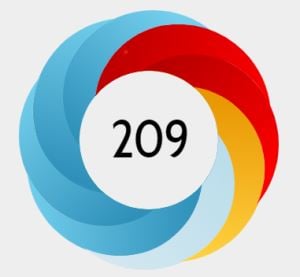
Altmetric badge showing the Altmetric score and colour-coded mention sources.
Altmetric monitors various sources, categorizing them into segments such as policy documents, peer reviews, Wikipedia, news and blogs, and social media, among other sources. Each category is identifiable by a specific colour.
The Altmetric badge provides visual insights into where the research is being discussed. A more colourful badge indicates broader mentions across multiple platforms. Such tracking enables us to gauge the extent of an article’s online dissemination, noting that increased visibility may correlate with higher citation rates.
Read more:
Impactful Research

Ten High-Altmetric Articles Published by MDPI
As at 30 January 2024, Altmetric has tracked 670,500 MDPI research outputs from MDPI, resulting in over 4.3 million mentions. This includes over 71,894 mentions in policy and patents and 294,714 mentions in news and blogs, with some achieving an Altmetric score as high as 28,754.
So, what is a good Altmetric score? There are various ways to put this score into context. You can find out more about the score in context and how to evaluate your work by this means.
Here are ten MDPI papers ranking in the top 5% of all research outputs scored by Altmetric.
|
|
“Accuracy in Wrist-Worn, Sensor-Based Measurements of Heart Rate and Energy Expenditure in a Diverse Cohort” J. Pers. Med. 2017, 7(2), 3; https://doi.org/10.3390/jpm7020003 Altmetric page: https://mdpi.altmetric.com/details/20477344 Altmetric shows that this article appeared in 253 news stories from 209 outlets including Forbes, BBC, and Fox News. |
|
|
“Daylight Saving Time and Acute Myocardial Infarction: A Meta-Analysis” J. Clin. Med. 2019, 8(3), 404; https://doi.org/10.3390/jcm8030404 Altmetric page: https://mdpi.altmetric.com/details/57654628 Altmetric shows that this article appeared in 295 news stories from 207 outlets including Forbes, The Atlantic, and New York Times. |
|
|
“The Preliminary Analysis of Cave Lion Cubs Panthera spelaea (Goldfuss, 1810) from the Permafrost of Siberia” Quaternary 2021, 4(3), 24; https://doi.org/10.3390/quat4030024 Altmetric page: https://mdpi.altmetric.com/details/111086701 Altmetric shows that this article appeared in 182 news stories from 134 outlets including CBC News, CNN, and National Geographic. |
|
|
“Not the Cat’s Meow? The Impact of Posing with Cats on Female Perceptions of Male Dateability” Animals 2020, 10(6), 1007; https://doi.org/10.3390/ani10061007 Altmetric page: https://mdpi.altmetric.com/details/83796184 Altmetric shows that this article appeared in 124 news stories from 98 outlets including VICE, CNN and The Guardian. |
|
|
“Behaviour and Welfare Impacts of Releasing Elephants from Overnight Tethers: A Zimbabwean Case Study” Animals 2022, 12(15), 1933; https://doi.org/10.3390/ani12151933 Altmetric page: https://mdpi.altmetric.com/details/133463915 Altmetric shows that this article appeared in 192 news stories from 186 outlets. |
How do I use altmetrics?
Altmetric Explorer provides a detailed step-by-step guide and instruction video for first-time users of the tool. The guide includes useful diagrams that make it easy to get started.
Sharing Research Online
For research to be tracked across different sources, Altmetric needs a research output with a persistent identifier: a DOI, ISBN, PubMed ID, handle ID, etc. When sharing research, it is important to include a link to the original research output.
|
|
“An Update on Eukaryotic Viruses Revived from Ancient Permafrost” Viruses 2023, 15(2), 564; https://doi.org/10.3390/v15020564 Altmetric page: https://mdpi.altmetric.com/details/142929875 Altmetric shows that this article appeared in 250 news stories from 180 outlets including CTV, Fox News, and CNN. |
|
|
“The Global Problem of Insufficient Sleep and Its Serious Public Health Implications” Healthcare 2019, 7(1), 1; https://doi.org/10.3390/healthcare7010001 Altmetric page: https://mdpi.altmetric.com/details/53406248 Altmetric shows that this article appeared in 252 news stories from 168 outlets including BBC, Harvard Business Review, and Forbes. |
|
|
“A Detailed Review Study on Potential Effects of Microplastics and Additives of Concern on Human Health” Int. J. Environ. Res. Public Health 2020, 17(4), 1212; https://doi.org/10.3390/ijerph17041212 Altmetric page: https://mdpi.altmetric.com/details/86529137 Altmetric shows that this article appeared in 197 news stories from 150 outlets including BBC, The Tribune, and World Economic Forum. |
|
|
“An Empirical Study of Chronic Diseases in the United States: A Visual Analytics Approach to Public Health” Int. J. Environ. Res. Public Health 2018, 15(3), 431; https://doi.org/10.3390/ijerph15030431 Altmetric page: https://mdpi.altmetric.com/details/34714141 Altmetric shows that this article appeared in 232 news stories from 149 outlets including Forbes, New York Times, and Harvard Business Review. |
|
|
“Garden Scraps: Agonistic Interactions between Hedgehogs and Sympatric Mammals in Urban Gardens” Animals 2023, 13(4), 590; https://doi.org/10.3390/ani13040590 Altmetric page: https://mdpi.altmetric.com/details/142934305 Altmetric shows that this article appeared in 172 news stories from 168 outlets including BBC. |
Inside MDPI

MDPI Annual Meeting Celebrations in China
On Thursday 25 January, over 1,300 MDPI colleagues from our two offices in Beijing gathered to kick off MDPI’s traditional ‘Annual Meetings.’ These celebrations take place in MDPI’s offices across China, including Dalian, Tianjin, Wuhan, and Nanjing.
The evenings include performances, informative talks and presentations, awards, and entertainment, providing an ideal platform to recognize our colleagues, celebrate their achievements, and set our sights on the future.
“It is essential that we stay connected and share best practices”

I sent a video congratulating everyone on their work and sharing our vision of building MDPI into the most trusted OA publisher, highlighting the roles each of us has to play in achieving that goal.
Unfortunately I could not join in person, but you may recall my recent trip, when I visited our offices in Beijing and Wuhan, which I look forward to visiting again this year.
Although our headquarters are in Basel, Switzerland, and we are expanding throughout Europe and North America, the majority of MDPI’s workforce is in China and throughout the Asia-Pacific region, including offices in Singapore, Thailand, Japan, and newly opened office in South Korea. It is essential that as a global organization, we stay connected and share best practices in order to grow collectively and continue providing the exceptional service to our authors.
The Annual Meeting is a moment to reflect and enjoy the year’s hard work and dedication.

I extend our best wishes to all for the Chinese New Year (Xīnnián kuàilè)!
Coming Together for Science
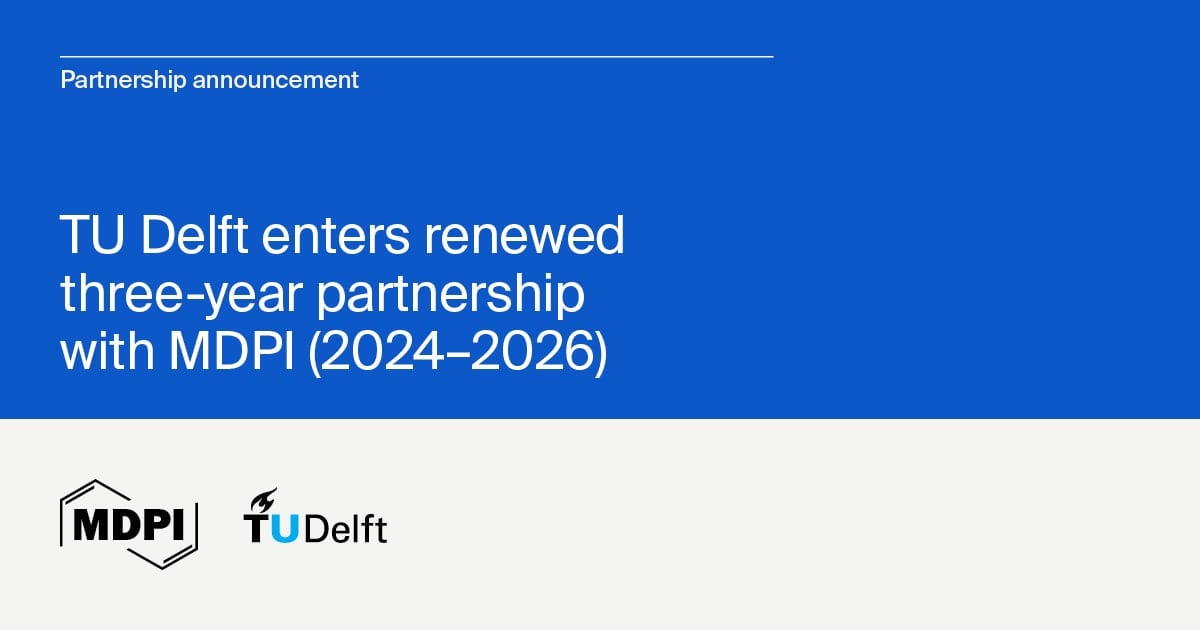
MDPI and TU Delft Adopt Flat Fee Model in Extended Partnership
We are excited to announce a renewed three-year partnership with Delft University of Technology (TU Delft) in the Netherlands. This collaboration introduces a fixed lump-sum fee, covering publishing costs from 2024 to 2026.
“This initiative reflects our dedication to transparent and inclusive publishing”
TU Delft-affiliated authors will enjoy cost-free publishing in any MDPI journal during this period, aligning with our commitment to removing barriers for open access publishing. The agreement supports Plan S compliance and facilitates a seamless publishing process for TU Delft corresponding authors. This initiative reflects our dedication to transparent and inclusive publishing, providing stability and predictability both for authors and for institutions.
For further details on our Institutional Open Access Program (IOAP), please contact us.
Benefits to MDPI’s IOAP
At MDPI we have a long tradition of partnerships, including our Institutional Open Access Program (IOAP). IOAP supports institutions through simplification, access, transparency, APC discounts, and institutional repository deposits. The program simplifies administrative processes, offers central payment, and allows easy opting in and out. Participants gain free access to Susy, MDPI’s online submission system, with extensive article metadata and exportable data. APC discounts and Book Processing Charge discounts are available for affiliated authors. Automated deposits to institutional repositories and streamlined matching of papers to IOAP participants enhance the overall experience.
For further information, see our IOAP FAQ.
Closing Thoughts

Reflections on the 2024 APE Conference
MDPI was proud to co-sponsor the Academic Publishing in Europe (APE) 2024 Conference that took place in Berlin, Germany, from 9–10 January 2024.
The conference theme, ‘Keep the Conversation Going!’, explored the evolving landscape of scholarly communication. APE is one of the key conferences I make a point to attend each year. January offers a valuable opportunity to engage with new contacts, reconnect with familiar faces, and participate in impactful discussions and presentations among professionals, scholars, and practitioners in the field.
“It's fascinating to see how other publishers are leveraging AI”
Highlights
Some of the standout panels for me include: the role of the UN Sustainable Development Goals (SDGs) within the publishing industry. It was encouraging to hear the current status quo, though I was eager also to learn about the exciting projects planned for 2024 and beyond. These will allow us to track progress in subsequent years. At MDPI, we remain committed to promoting Open–Access (OA) content on SDGs through scientific articles and books. Furthermore, we extend our commitment to sustainability by financially supporting researchers through initiatives such as the World Sustainability Award and the Emerging Sustainability Leader Award, as well as waiving the APC for feature papers on each SDG.
In recent years, discussions on AI have become increasingly prominent at such conferences. It’s fascinating to see how other publishers are leveraging AI to meet the evolving needs of their audiences while at the same time using it to safeguard the scientific process. Other engaging panels that I enjoyed included updates on transformation beyond transformative agreements, the principles of lean change, incentive structures related to research integrity, and the panel on reviewer incentives.
“We can share best practices and lessons learned”
Incorporating MDPI’s Insights into Conferences
I must confess that I sometimes feel overlooked when MDPI is not invited to participate in crucial industry discussions. As the leading open access publisher and the third-largest publisher overall, we possess extensive experience in many of these areas and can offer valuable contributions to these discussions. We can share best practices, lessons learned, and our thinking about future trajectories. For instance, in panels discussing reviewer incentives, at MDPI we offer a discount voucher to reviewers for future submissions, reflecting our commitment to fostering a robust peer review process. In 2022 alone, MDPI collected over 1.4 million peer review reports, informing the decision-making processes of our editors. Given our expertise in these areas, it would be natural to include MDPI in such discussions. I therefore extend an invitation to future conference organizers to consider MDPI for speaking engagements and collaborative opportunities.
Chief Executive Officer
MDPI AG
5 January 2024
Nutrients | Highly Cited Papers in 2021–2022 in the Section “Sports Nutrition”
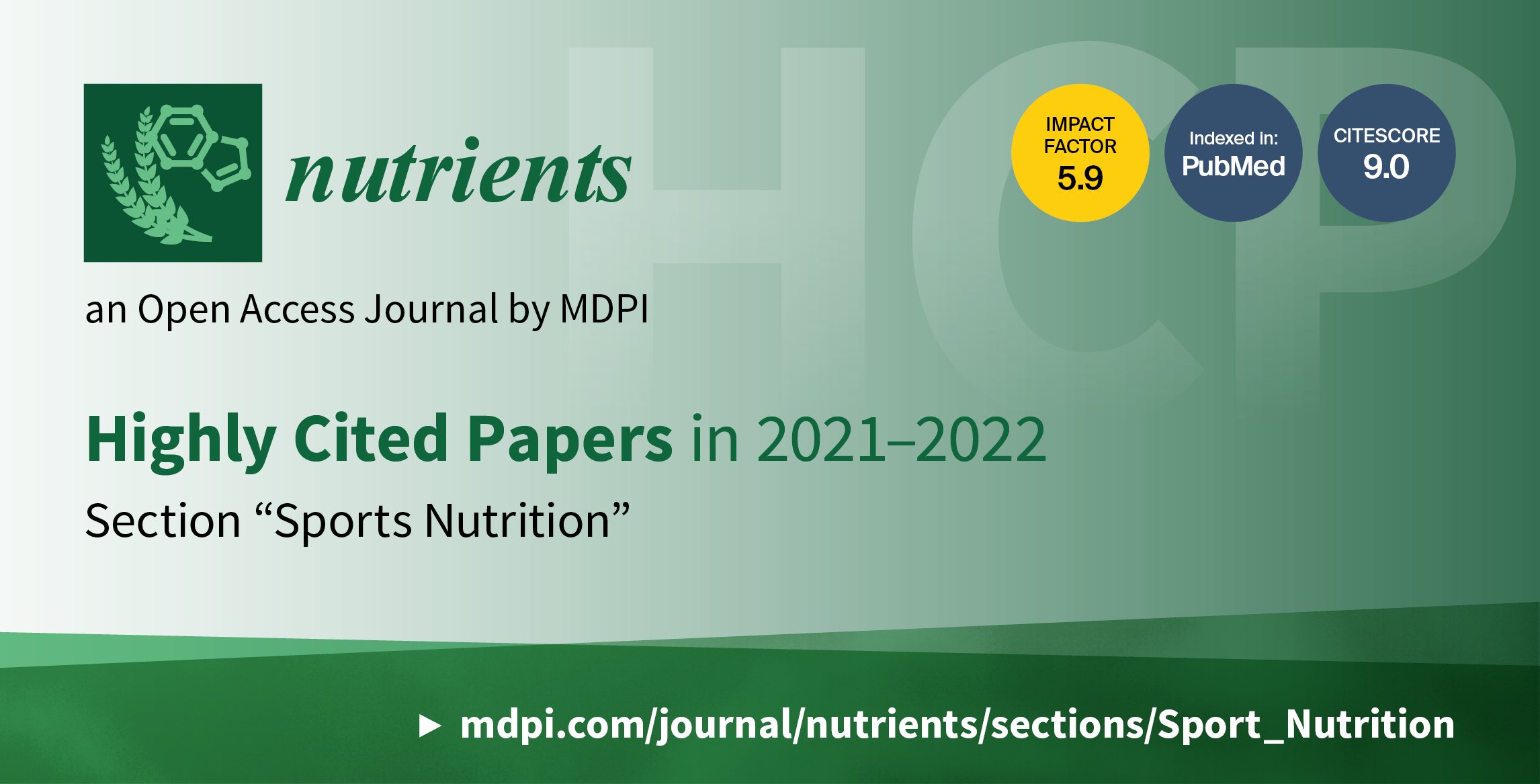
As all of the articles published in our journal are in an open access format, you have free and unlimited access to the full text. We welcome you to read our most highly cited papers published in 2021 and 2022, which are listed below:
1. “Creatine in Health and Disease”
by Richard B. Kreider and Jeffery R. Stout
Nutrients 2021, 13(2), 447; https://doi.org/10.3390/nu13020447
Available online: https://www.mdpi.com/2072-6643/13/2/447
2. “Effects of Two Months of Very Low Carbohydrate Ketogenic Diet on Body Composition, Muscle Strength, Muscle Area, and Blood Parameters in Competitive Natural Body Builders”
by Antonio Paoli, Lorenzo Cenci, PierLuigi Pompei, Nese Sahin, Antonino Bianco, Marco Neri,
Massimiliano Caprio and Tatiana Moro
Nutrients 2021, 13(2), 374; https://doi.org/10.3390/nu13020374
Available online: https://www.mdpi.com/2072-6643/13/2/374
3. “Creatine for Exercise and Sports Performance, with Recovery Considerations for Healthy Populations”
by Antonio Paoli, Lorenzo Cenci, PierLuigi Pompei, Nese Sahin, Antonino Bianco, Marco Neri,
Massimiliano Caprio and Tatiana Moro
Nutrients 2021, 13(6), 1915; https://doi.org/10.3390/nu13061915
Available online: https://www.mdpi.com/2072-6643/13/6/1915
4. “Caffeine as a Factor Influencing the Functioning of the Human Body—Friend or Foe?”
by Kamil Rodak, Izabela Kokot and Ewa Maria Kratz
Nutrients 2021, 13(9), 3088; https://doi.org/10.3390/nu13093088
Available online: https://www.mdpi.com/2072-6643/13/9/3088
5. “Creatine Metabolism in Female Reproduction, Pregnancy and Newborn Health”
by Anna Maria Muccini, Nhi T. Tran, Deborah L. de Guingand, Mamatha Philip, Paul A. Della Gatta, Robert Galinsky, Larry S. Sherman, Meredith A. Kelleher, Kirsten R. Palmer, Mary J. Berry et al.
Nutrients 2021, 13(2), 490; https://doi.org/10.3390/nu13020490
Available online: https://www.mdpi.com/2072-6643/13/2/490
6. “Deprescribing Leads to Improved Energy Intake among Hospitalized Older Sarcopenic Adults with Polypharmacy after Stroke”
by Ayaka Matsumoto, Yoshihiro Yoshimura, Hidetaka Wakabayashi, Eiji Kose, Fumihiko Nagano, Takahiro Bise, Yoshifumi Kido, Sayuri Shimazu and Ai Shiraishi
Nutrients 2022, 14(3), 443; https://doi.org/10.3390/nu14030443
Available online: https://www.mdpi.com/2072-6643/14/3/443
7. “Auditing the Representation of Female Versus Male Athletes in Sports Science and Sports Medicine Research: Evidence-Based Performance Supplements”
by Ayaka Matsumoto, Yoshihiro Yoshimura, Hidetaka Wakabayashi, Eiji Kose, Fumihiko Nagano, Takahiro Bise, Yoshifumi Kido, Sayuri Shimazu and Ai Shiraishi
Nutrients 2022, 14(5), 953; https://doi.org/10.3390/nu14050953
Available online: https://www.mdpi.com/2072-6643/14/5/953
8. “Chair-Stand Exercise Improves Sarcopenia in Rehabilitation Patients after Stroke”
by Yoshihiro Yoshimura, Hidetaka Wakabayashi, Fumihiko Nagano, Takahiro Bise, Sayuri Shimazu,
Ai Shiraishi, Yoshifumi Kido and Ayaka Matsumoto
Nutrients 2022, 14(3), 461; https://doi.org/10.3390/nu14030461
Available online: https://www.mdpi.com/2072-6643/14/3/461
9. “Screening for Low Energy Availability in Male Athletes: Attempted Validation of LEAM-Q”
by Bronwen Lundy, Monica K. Torstveit, Thomas B. Stenqvist, Louise M. Burke, Ina Garthe, Gary J. Slater, Christian Ritz and Anna K. Melin
Nutrients 2022, 14(9), 1873; https://doi.org/10.3390/nu14091873
Available online: https://www.mdpi.com/2072-6643/14/9/1873
10. “Extra Virgin Olive Oil (EVOO), a Mediterranean Diet Component, in the Management of Muscle Mass and Function Preservation”
by Sara Salucci, Anna Bartoletti-Stella, Alberto Bavelloni, Beatrice Aramini, William L. Blalock, Francesco Fabbri, Ivan Vannini, Vittorio Sambri, Franco Stella and Irene Faenza
Nutrients 2022, 14(17), 3567; https://doi.org/10.3390/nu14173567
Available online: https://www.mdpi.com/2072-6643/14/17/3567
5 January 2024
Nutrients | Highly Cited Papers in 2021–2022 in the Section “Proteins and Amino Acids”
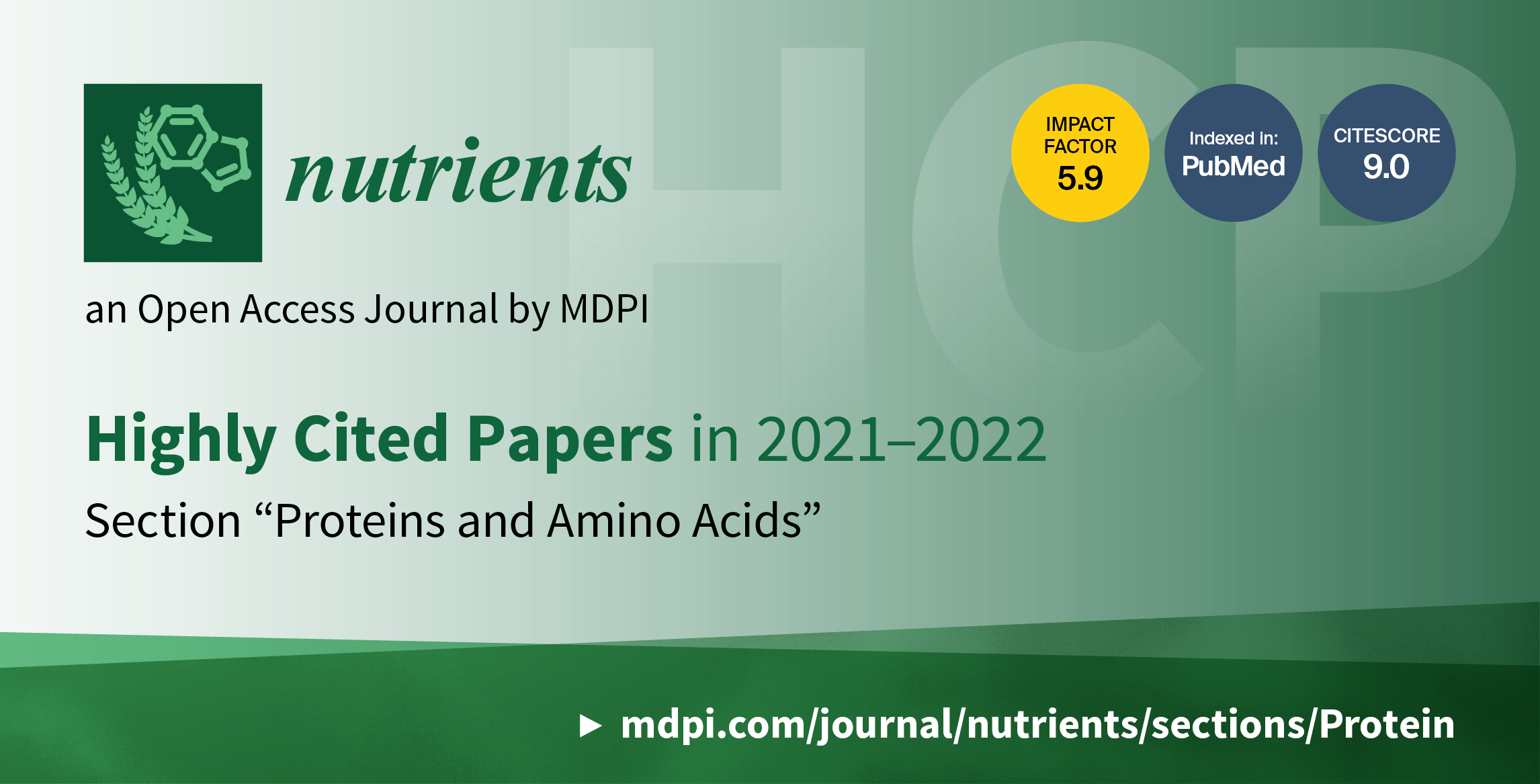
As all of the articles published in our journal are in an open access format, you have free and unlimited access to the full text. We welcome you to read our most highly cited papers published in 2021 and 2022, which are listed below:
1. “Relationship between the Gut Microbiome and Osteoarthritis Pain: Review of the Literature“
by Eleuterio A. Sánchez Romero, Erika Meléndez Oliva, José Luis Alonso Pérez, Sebastián Martín Pérez, Silvia Turroni, Lorenzo Marchese and Jorge Hugo Villafañe
Nutrients 2021, 13(3), 716; https://doi.org/10.3390/nu13030716
Available online: https://www.mdpi.com/2072-6643/13/3/716
2. “Are Dietary Proteins the Key to Successful Body Weight Management? A Systematic Review and Meta-Analysis of Studies Assessing Body Weight Outcomes after Interventions with Increased Dietary Protein”
by Thea Toft Hansen, Arne Astrup and Anders Sjödin
Nutrients 2021, 13(9), 3193; https://doi.org/10.3390/nu13093193
Available online: https://www.mdpi.com/2072-6643/13/9/3193
3. ”Transport of Dietary Anti-Inflammatory Peptide, γ-Glutamyl Valine (γ-EV), across the Intestinal Caco-2 Monolayer”
by Snigdha Guha, Sophie Alvarez and Kaustav Majumder
Nutrients 2021, 13(5), 1448; https://doi.org/10.3390/nu13051448
Available online: https://www.mdpi.com/2072-6643/13/5/1448
4. ”Trans-Epithelial Transport, Metabolism, and Biological Activity Assessment of the Multi-Target Lupin Peptide LILPKHSDAD (P5) and Its Metabolite LPKHSDAD (P5-Met)”
by Carmen Lammi, Gilda Aiello, Carlotta Bollati, Jianqiang Li, Martina Bartolomei, Giulia Ranaldi, Simonetta Ferruzza, Enrico Mario Alessandro Fassi, Giovanni Grazioso, Yula Sambuy et al.
Nutrients 2021, 13(3), 863; https://doi.org/10.3390/nu13030863
Available online: https://www.mdpi.com/2072-6643/13/3/863
5. ”The Effect of Hemp (Cannabis sativa L.) Seeds and Hemp Seed Oil on Vascular Dysfunction in Obese Male Zucker Rats”
by Michał Majewski and Adam Jurgonski
Nutrients 2021, 13(8), 2575; https://doi.org/10.3390/nu13082575
Available online: https://www.mdpi.com/2072-6643/13/8/2575
6. ”Protein Quality in Perspective: A Review of Protein Quality Metrics and Their Applications”
by Shiksha Adhikari, Marijke Schop, Imke J. M. de Boer and Thom Huppertz
Nutrients 2022, 14(5), 947; https://doi.org/10.3390/nu14050947
Available online: https://www.mdpi.com/2072-6643/14/5/947
7. ”GlyNAC (Glycine and N-Acetylcysteine) Supplementation in Mice Increases Length of Life by Correcting Glutathione Deficiency, Oxidative Stress, Mitochondrial Dysfunction, Abnormalities in Mitophagy and Nutrient Sensing, and Genomic Damage”
by Premranjan Kumar, Ob W. Osahon and Rajagopal V. Sekhar
Nutrients 2022, 14(5), 1114; https://doi.org/10.3390/nu14051114
Available online: https://www.mdpi.com/2072-6643/14/5/1114
8. “The Health Benefits of Egg Protein”
by Michael J. Puglisi and Maria Luz Fernandez
Nutrients 2022, 14(14), 2904; https://doi.org/10.3390/nu14142904
Available online: https://www.mdpi.com/2072-6643/14/14/2904
9. “Indexing of Fatty Acids in Poultry Meat for Its Characterization in Healthy Human Nutrition: A Comprehensive Application of the Scientific Literature and New Proposals”
by Alessandro Dal Bosco, Alice Cartoni Mancinelli, Gaetano Vaudo, Massimiliano Cavallo, Cesare Castellini and Simona Mattioli
Nutrients 2022, 14(15), 3110; https://doi.org/10.3390/nu14153110
Available online: https://www.mdpi.com/2072-6643/14/15/3110
10. ”Hempseed (Cannabis sativa) Peptide H3 (IGFLIIWV) Exerts Cholesterol-Lowering Effects in Human Hepatic Cell Line”
by Jianqiang Li, Carlotta Bollati, Martina Bartolomei, Angelica Mazzolari, Anna Arnoldi, Giulio Vistoli and Carmen Lammi
Nutrients 2022, 14(9), 1804; https://doi.org/10.3390/nu14091804
Available online: https://www.mdpi.com/2072-6643/14/9/1804
5 January 2024
Nutrients | Highly Cited Papers in 2021–2022 in the Section “Prebiotics and Probiotics”
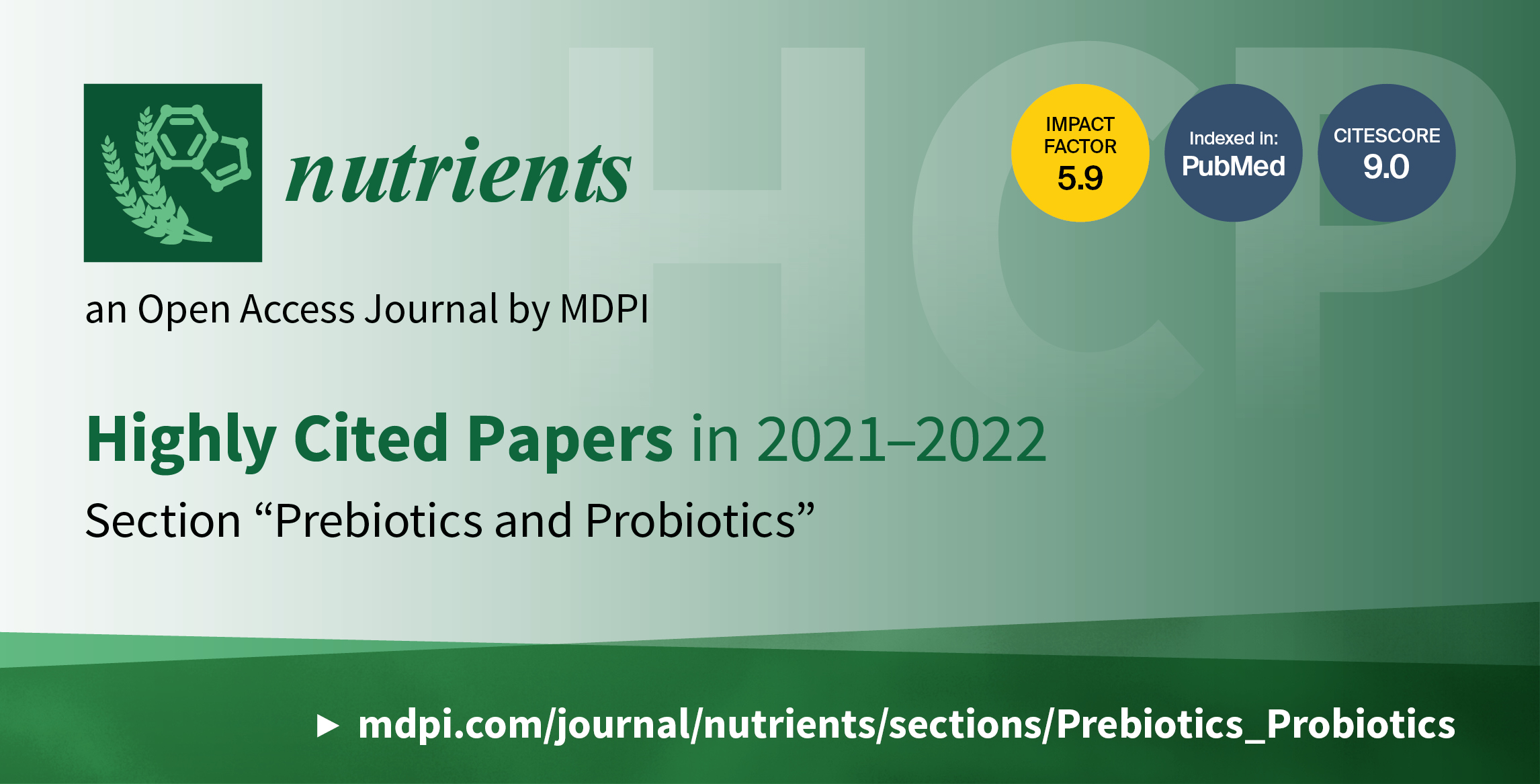
As all of the articles published in our journal are in an open access format, you have free and unlimited access to the full text. We welcome you to read our most highly cited papers published in 2021 and 2022, which are listed below:
1. “Paraprobiotics: A New Perspective for Functional Foods and Nutraceuticals”
by Rosa Anna Siciliano, Anna Reale, Maria Fiorella Mazzeo, Stefano Morandi, Tiziana Silvetti and Milena Brasca
Nutrients 2021, 13(4), 1225; https://doi.org/10.3390/nu13041225
Available online: https://www.mdpi.com/2072-6643/13/4/1225
2. “Probiotics, Prebiotics, and Synbiotics: Implications and Beneficial Effects against Irritable Bowel Syndrome”
by Elemer Simon, Lavinia Florina Călinoiu, Laura Mitrea and Dan Cristian Vodnar
Nutrients 2021, 13(6), 2112; https://doi.org/10.3390/nu13062112
Available online: https://www.mdpi.com/2072-6643/13/6/2112
3. “Malnutrition and Gut Microbiota in Children”
by Ishawu Iddrisu, Andrea Monteagudo-Mera, Carlos Poveda, Simone Pyle, Muhammad Shahzad,
Simon Andrews and Gemma Emily Walton
Nutrients 2021, 13(8), 2727; https://doi.org/10.3390/nu13082727
Available online: https://www.mdpi.com/2072-6643/13/8/2727
4. “Diarrhea Predominant-Irritable Bowel Syndrome (IBS-D): Effects of Different Nutritional Patterns on Intestinal Dysbiosis and Symptoms”
by Annamaria Altomare, Claudia Di Rosa, Elena Imperia, Sara Emerenziani, Michele Cicala and Michele Pier Luca Guarino
Nutrients 2021, 13(5), 1506; https://doi.org/10.3390/nu13051506
Available online: https://www.mdpi.com/2072-6643/13/5/1506
5. “Gut Microbiota and Complications of Type-2 Diabetes”
by Camelia Oana Iatcu, Aimee Steen and Mihai Covasa
Nutrients 2022, 14(1), 166; https://doi.org/10.3390/nu14010166
Available online: https://www.mdpi.com/2072-6643/14/1/166
6. “Fermented Foods, Health and the Gut Microbiome”
by Natasha K. Leeuwendaal, Catherine Stanton, Paul W. O’Toole and Tom P. Beresford
Nutrients 2022, 14(7), 1527; https://doi.org/10.3390/nu14071527
Available online: https://www.mdpi.com/2072-6643/14/7/1527
7. “The Complex Role of Lactic Acid Bacteria in Food Detoxification”
by Penka Petrova, Alexander Arsov, Flora Tsvetanova, Tsvetomila Parvanova-Mancheva, Evgenia Vasileva, Lidia Tsigoriyna and Kaloyan Petrov
Nutrients 2022, 14(10), 2038; https://doi.org/10.3390/nu14102038
Available online: https://www.mdpi.com/2072-6643/14/10/2038
8. “Effect of Probiotics on Psychiatric Symptoms and Central Nervous System Functions in Human Health and Disease: A Systematic Review and Meta-Analysis”
by Charlotte Le Morvan de Sequeira, Charlotte Hengstberger, Paul Enck and Isabelle Mack
Nutrients 2022, 14(3), 621; https://doi.org/10.3390/nu14030621
Available online:https://www.mdpi.com/2072-6643/14/3/621
9. “Curcumin Supplementation (Meriva®) Modulates Inflammation, Lipid Peroxidation and Gut Microbiota Composition in Chronic Kidney Disease”
by Francesca Pivari, Alessandra Mingione, Giada Piazzini, Camilla Ceccarani, Emerenziana Ottaviano, Caterina Brasacchio, Michele Dei Cas, Margherita Vischi, Mario Gennaro Cozzolino, Paolo Fogagnolo et al.
Nutrients 2022, 14(1), 231; https://doi.org/10.3390/nu14010231
Available online: https://www.mdpi.com/2072-6643/14/1/231
10. “Gastrointestinal Symptoms in Autism Spectrum Disorder: A Systematic Review”
by Geraldine Leader, Cathal Abberton, Stephen Cunningham, Katie Gilmartin, Margo Grudzien, Emily Higgins, Lokesh Joshi, Sally Whelan and Arlene Mannion
Nutrients 2022, 14(7), 1471; https://doi.org/10.3390/nu14071471
Available online: https://www.mdpi.com/2072-6643/14/7/1471
2 January 2024
MDPI Insights: The CEO’s Letter #7 - Nobel Laureates Entrust MDPI with Their Research

Welcome to the MDPI Insights: The CEO's Letter.
In these monthly letters, I will showcase two key aspects of our work at MDPI: our commitment to empowering researchers and our determination to facilitating open scientific exchange.
Opening Thoughts

Nobel Prize Laureates Entrust MDPI with Their Research
The Nobel Prize stands as a hallmark of distinction, honouring ground-breaking research across disciplines. Annually, the Nobel Prizes are awarded in six categories: Physics, Chemistry, Medicine or Physiology, Literature, Peace, and Economic Sciences.
Through the years, renowned scholars have entrusted MDPI with their work. As at December 2023, 26 Nobel laureates have contributed to more than 75 articles across 25 MDPI journals, including: Antibiotics, Applied Sciences, Biology, Biomedicines, Cancers, Catalysts, Cells, Crystals, Entropy, Games, IJMS, Life, Materials, Micromachines, Molecules, Pharmaceuticals, Pharmaceutics, Photonics, Quantum Beam Science, Remote Sensing, Sensors, Solids, Universe, Vaccines, and Viruses.
The best of the best trust us with their work.
Nobel Prize Laureates Who Have Published with MDPI
We are proud to list the names of Pierre Agostini, Hiroshi Amano, Werner Arber, Aaron Ciechanover, Robert H. Grubbs, Oliver Hart, Gerard ‘t Hooft, Michael Houghton, Harald zur Hausen, Katalin Karikó, Jean-Marie Lehn, Gérard Mourou, Ferid Murad, Shuji Nakamura, William Nordhaus, Kostya S. Novoselov, Giorgio Parisi, Charles M. Rice, Alvin E. Roth, Donna Strickland, K. Barry Sharpless, George F. Smoot, Anne L’Huillier, Drew Weissman, Kurt Wüthrich, Ada Yonath.
The privilege of hosting such contributors resonates deeply with our editorial teams. For instance, in this interview, the Editor-in-Chief (EiC) of Universe speaks on the significance of publishing a paper by Nobel laureate Gerard ’t Hooft within the journal.
2023 Nobel Prize Winners Published by MDPI

Nobel Prize Winners, 2023: Katalin Karikó, Drew Weissman, Anne L’Huillier (Ill. Niklas Elmehed © Nobel Prize Outreach)
Three laureates from the 2023 Nobel Prize cohort have trusted MDPI as their publishing platform. Notably, in a 2022 Pharmaceutics paper, molecular biologist Katalin Karikó and her team presented a methodology for evaluating mRNA capping efficiency, pivotal for therapeutic applications. Pharmaceutics had previously dedicated a Special Issue to “mRNA Therapeutics: A Themed Issue in Honor of Professor Katalin Karikó”, spotlighting ten articles from August 2021 to February 2022.
In the journal Vaccines, Professor Drew Weissman, collaborating with scholars from Pennsylvania University and George Mason University, contributed an influential review titled “Nanomaterial Delivery Systems for mRNA Vaccines”. His collaborative efforts spanned five papers across MDPI journals between 2021 and 2023.
Furthermore, Anne L'Huillier of Lund University, only the fifth female recipient of the Physics Prize, co-authored an article in Applied Sciences focusing on "Advanced EUV and X-Ray Optics". Similarly, Pierre Agostini, an Emeritus Professor from Ohio State University, co-authored an article featured in the special issue "Attosecond Science and Technology: Principles and Applications".
We extend heartfelt congratulations to all Nobel Prize laureates and express sincere gratitude for their confidence in MDPI as a platform for their scholarly contributions.
Read more:
Impactful Research

MDPI Journals Newly Indexed in 2023
The aim of indexing is to enhance the quality and credibility of published research, ensuring that researchers access the most credible resources available. While the principle behind citation indexing is straightforward, it remains one of the most dependable methods for tracking an idea's evolution across various scientific disciplines.
Throughout the year, MDPI works to expand the reach of our publications across premier multidisciplinary databases like Web of Science, Scopus, EBSCO, and ProQuest. This initiative is spearheaded by MDPI's Indexing team, under the leadership of Dr. Constanze Schelhorn.
In 2023, MDPI achieved 54 new acceptances in Scopus, 29 in Web of Science, 52 in EBSCO, and 83 in DOAJ: Directory of Open Access Journals.
The team prioritizes ensuring that our journals feature in numerous specialized databases, including PMC, PubMed, MEDLINE, Inspec, CAS, and FSTA, among others. Currently, MDPI collaborates with over 65 renowned international databases, consistently enhancing our database affiliations annually.
MDPI’s journals are indexed in all major global databases.
Furthermore, we collaborate with universities and government organizations to list our journals in country-specific ranking lists and relevant institutional repositories. This ensures compliance with requirements often set by funders or institutions for authors to publish in specific journals.
Web of Science Adds 24 MDPI Journals to Emerging Sources Citation Index (ESCI)
Clarivate recently analysed MDPI’s new journals, resulting in 24 journals, mainly established in 2020, being added to the ESCI in November and December 2023. Additionally, five journals passed this assessment earlier in the year. For a complete list of our journals in Web of Science, refer here. Journals in the ESCI meet 24 quality criteria, ensuring editorial rigor. They may be considered for inclusion in broader indices like the Science Citation Index Expanded (SCIE), the Social Sciences Citation Index (SSCI), or the Arts and Humanities Citation Index (AHCI), based on four impact criteria.
Read more:
Inside MDPI

MDPI Appoints New Chief Operating Officer (COO)

Alistair Freeland returned to MDPI and assumed the role of Chief Operating Officer in November 2023, a position he previously held from 2013 to 2019. He succeeds Dr. Yu Lin, who will remain a member of MDPI’s Board of Directors, overseeing significant financial decisions for the company. I would like to express my sincere thanks to Dr. Yu Lin for his service as COO.
Alistair brings extensive experience not only in scholarly publishing but also in technology and business management. Prior to rejoining MDPI, he was associated with SIX Group, the entity responsible for Switzerland's financial market infrastructure. There, he played a pivotal role in developing the blockchain-based platform SDX (SIX Digital Exchange), which has gained traction among major Swiss banks and the Swiss National Bank.
As COO, Alistair will collaborate with the MDPI management team to improve the practices and services we offer to scholarly communities. I am pleased to welcome Alistair back to MDPI and look forward to his contributions going forward.
Coming Together for Science

MDPI’s 2024 In-Person Academic Events Schedule
MDPI's Conference Team is dedicated to organizing and hosting in-person academic events across Europe, Asia-Pacific, and North America. We recognize conferences as invaluable platforms for scientific collaboration, scholarly exchange, discussions on contemporary topics, networking, and forging collaborations.
Here's a glimpse of the notable events we currently have scheduled for 2024:
|
|
14–16 February, 2024 |
|
|
24–26 April, 2024 |
|
|
28–31 May, 2024 |
|
|
1–4 August, 2024 |
Upcoming events with details to be announced:
- September 2024, Materials 2024 – Basel, Switzerland
- 19–21 September 2024, International Conference on Nanomaterials Sciences 2024 – Beijing, China
- October 2024, ncRNA 2024 – Basel, Switzerland
- November 2024, Pharmaceuticals 2024 – Barcelona, Spain
- 22–26 November 2024, International Conference on Science of Electronics – Wuhan, China
- Stay tuned for more details on the Sustainable Publishing Forum 2024.
Click here for all upcoming MDPI events.
Organize Your Event with MDPI’s Sciforum
Sciforum is MDPI’s platform dedicated to the organization of scientific events. In line with our mission to promote science, Sciforum supports scholars, societies, research networks, and universities at all stages of organizing in-person events, virtual events and webinars. Our platforms are efficient, user-friendly, and cost-effective. We handle all steps related to event management. Contact us for details.
Closing Thoughts

Reflecting on 2023 and Looking Ahead to 2024
As we approach 2024, I reflect on the incredible journey we’ve had together at MDPI this year. The past 12 months have been marked by ambitious projects and initiatives to improve our internal processes, and a commitment to continue delivering top-notch services to our stakeholders. I’d like to thank each and every one of our staff members for contributing to the positive experiences our stakeholders have reported in our surveys. Your dedication to speed, efficiency, and effective communication with our stakeholders is very much recognized and appreciated.
Becoming a stronger organisation
While we have encountered challenges in 2023, it’s important to understand that these are a part of our growth process. Difficulties provide us with opportunities to reflect, address problems at their roots, and ultimately evolve into a stronger organization. Our stakeholders expect us to overcome tough times, and it’s an expectation that we have for ourselves.
I extend my sincere appreciation to every MDPI employee, from our editorial office and IT department to marketing, indexing, IOAP, societies, Scientific Office board, products, production, conferences, finance, operations, admin, and beyond. To our newest team members, a warm welcome; to our longstanding colleagues, your dedication is invaluable.
“I am committed to taking MDPI to a new level of excellence.”
Interacting with many of you during my visits to our offices and representing MDPI at external events has been a personal highlight. I am deeply grateful to Dr. Lin for entrusting me with the role of CEO of MDPI. Looking forward, I am committed to working closely with our management team to lead MDPI and take it to a new level of excellence, aiming to establish it as the most trusted publisher in open access worldwide. This is a collective endeavour, with each of us shaping MDPI’s reputation. I therefore encourage us to take pride in our work, as it represents not only our craft but also MDPI as a whole.
Accountability and communication
As we look forward to 2024, there’s a lot to be excited about. Together, we’ll navigate challenges, seize growth opportunities, and refine our practices. To solidify MDPI’s position as the premier open access publisher globally, we must bolster accountability, improve stakeholder communication, share MDPI’s best practices, champion the open access philosophy, and educate stakeholders about our mission, methodologies, and motivations.
Thank you for engaging with the CEO Letter over the past six months of 2023. I will continue to release this newsletter as a method of sharing the great work being done at MDPI. Please feel free to connect directly with any insights or questions.
Here’s to a joyous and prosperous 2024!
Chief Executive Officer
MDPI AG
29 December 2023
Nutrients | Invitation to Read the Current Editor’s Choice Articles Published in 2021–2023
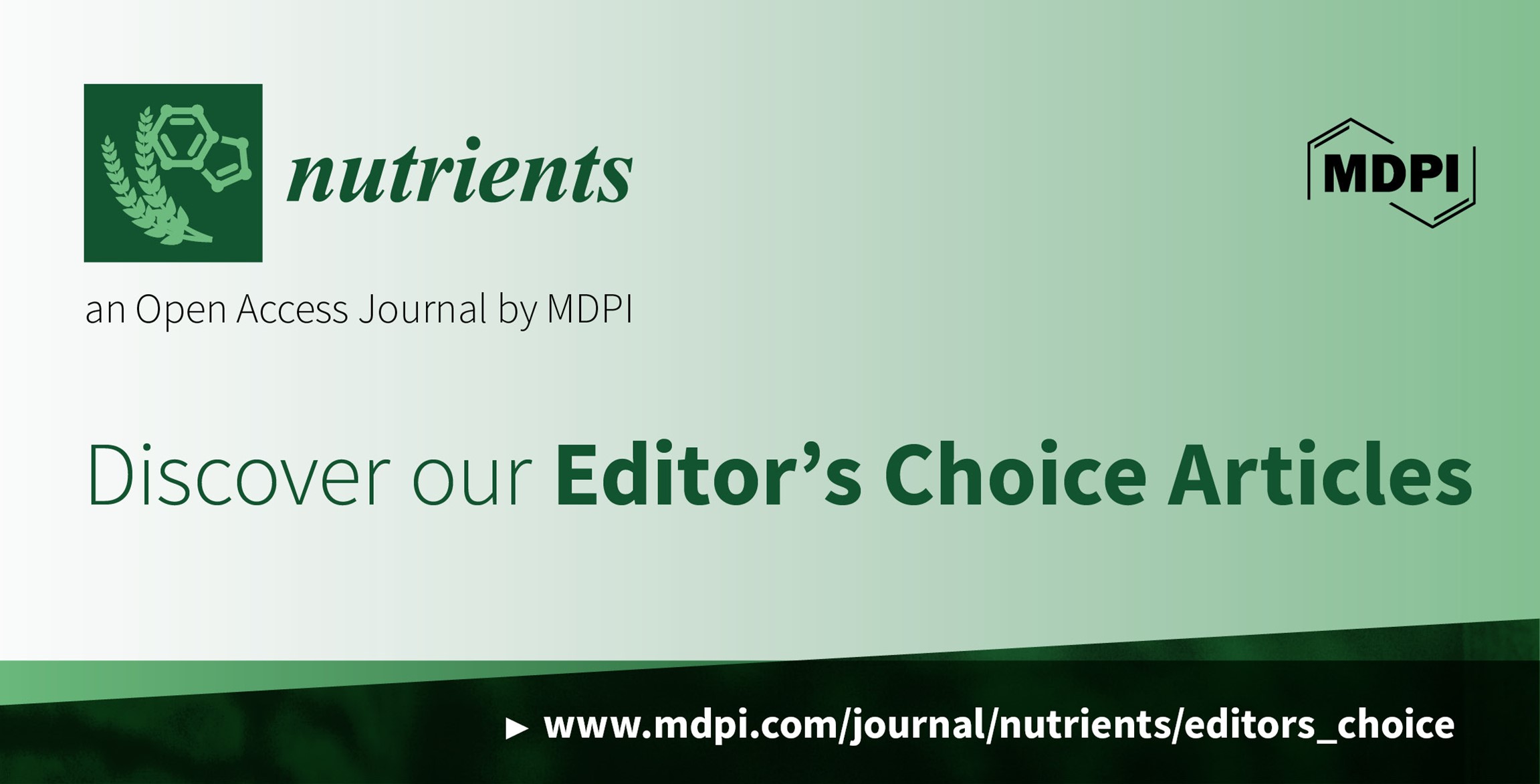
Editor's Choice Articles are selected based on suggestions from Nutrients’ academic editors worldwide. The editors select a small number of recently published articles that they consider particularly interesting to our readers or important in their respective fields of research. You are welcome to read the updated 2021–2023 Editor's Choice Articles, a curated list of high-quality articles from Nutrients (ISSN: 2072-6643). The full list of Editor's Choice Articles can be viewed at the following link: https://www.mdpi.com/journal/nutrients/editors_choice.
“Nutritional Components in Western Diet Versus Mediterranean Diet at the Gut Microbiota–Immune System Interplay. Implications for Health and Disease”
by Cielo García-Montero, Oscar Fraile-Martínez, Ana M. Gómez-Lahoz, Leonel Pekarek, Alejandro J. Castellanos, Fernando Noguerales-Fraguas, Santiago Coca, Luis G. Guijarro, Natalio García-Honduvilla, Angel Asúnsolo et al.
Nutrients 2021, 13(2), 699; https://doi.org/10.3390/nu13020699
Available online: https://www.mdpi.com/2072-6643/13/2/699
Cited by 137 | Viewed by 26550+
“Obesity and Cardiometabolic Risk Factors: From Childhood to Adulthood”
by Dorota Drozdz, Julio Alvarez-Pitti, Małgorzata Wójcik, Claudio Borghi, Rosita Gabbianelli, Artur Mazur, Vesna Herceg-Čavrak, Beatriz Gonzalez Lopez-Valcarcel, Michał Brzeziński, Empar Lurbe et al.
Nutrients 2021, 13(11), 4176; https://doi.org/10.3390/nu13114176
Available online: https://www.mdpi.com/2072-6643/13/11/4176
Cited by 108 | Viewed by 14520+
“Ultra-Processed Foods and Nutritional Dietary Profile: A Meta-Analysis of Nationally Representative Samples”
by Daniela Martini, Justyna Godos, Marialaura Bonaccio, Paola Vitaglione and Giuseppe Grosso
Nutrients 2021, 13(10), 3390; https://doi.org/10.3390/nu13103390
Available online: https://www.mdpi.com/2072-6643/13/10/3390
Cited by 97 | Viewed by 9550+
“Nutrition, Physical Activity, and Other Lifestyle Factors in the Prevention of Cognitive Decline and Dementia”
by Ligia J. Dominguez, Nicola Veronese, Laura Vernuccio, Giuseppina Catanese, Flora Inzerillo, Giuseppe Salemi and Mario Barbagallo
Nutrients 2021, 13(11), 4080; https://doi.org/10.3390/nu13114080
Available online: https://www.mdpi.com/2072-6643/13/11/4080
Cited by 81 | Viewed by 16500+
“Mediterranean Diet as an Antioxidant: The Impact on Metabolic Health and Overall Wellbeing”
by Katherina V. Gantenbein and Christina Kanaka-Gantenbein
Nutrients 2021, 13(6), 1951; https://doi.org/10.3390/nu13061951
Available online: https://www.mdpi.com/2072-6643/13/6/1951
Cited by 77 | Viewed by 11345+
“Overview of Non-Alcoholic Fatty Liver Disease (NAFLD) and the Role of Sugary Food Consumption and Other Dietary Components in Its Development”
by Pau Vancells Lujan, Esther Viñas Esmel and Emilio Sacanella Meseguer
Nutrients 2021, 13(5), 1442; https://doi.org/10.3390/nu13051442
Available online: https://www.mdpi.com/2072-6643/13/5/1442
Cited by 69 | Viewed by 14480+
“The Role of Diet Quality in Mediating the Association between Ultra-Processed Food Intake, Obesity and Health-Related Outcomes: A Review of Prospective Cohort Studies”
by Samuel J. Dicken and Rachel L. Batterham
Nutrients 2022, 14(1), 23; https://doi.org/10.3390/nu14010023
Available online: https://www.mdpi.com/2072-6643/14/1/23
Cited by 69 | Viewed by 14730+
“Vitamin D and Cancer: An Historical Overview of the Epidemiology and Mechanisms”
by Alberto Muñoz and William B. Grant
Nutrients 2022, 14(7), 1448; https://doi.org/10.3390/nu14071448
Available online: https://www.mdpi.com/2072-6643/14/7/1448
Cited by 65 | Viewed by 8785+
“Fermented Foods, Health and the Gut Microbiome”
by Natasha K. Leeuwendaal, Catherine Stanton, Paul W. O’Toole and Tom P. Beresford
Nutrients 2022, 14(7), 1527; https://doi.org/10.3390/nu14071527
Available online: https://www.mdpi.com/2072-6643/14/7/1527
Cited by 56 | Viewed by 17640+
“The Role of Diet and Interventions on Multiple Sclerosis: A Review”
by Panagiotis Stoiloudis, Evangelia Kesidou, Christos Bakirtzis, Styliani-Aggeliki Sintila, Natalia Konstantinidou, Marina Boziki and Nikolaos Grigoriadis
Nutrients 2022, 14(6), 1150; https://doi.org/10.3390/nu14061150
Available online: https://www.mdpi.com/2072-6643/14/6/1150
Cited by 42 | Viewed by 7975+
“Ultra-Processed Food Consumption and Mental Health: A Systematic Review and Meta-Analysis of Observational Studies”
by Melissa M. Lane, Elizabeth Gamage, Nikolaj Travica, Thusharika Dissanayaka, Deborah N. Ashtree, Sarah Gauci, Mojtaba Lotfaliany, Adrienne O’Neil, Felice N. Jacka and Wolfgang Marx
Nutrients 2022, 14(13), 2568; https://doi.org/10.3390/nu14132568
Available online: https://www.mdpi.com/2072-6643/14/13/2568
Cited by 36 | Viewed by 19455+
“Vitamin D in Inflammatory Bowel Diseases. Mechanisms of Action and Therapeutic Implications”
by Filippo Vernia, Marco Valvano, Salvatore Longo, Nicola Cesaro, Angelo Viscido and Giovanni Latella
Nutrients 2022, 14(2), 269; https://doi.org/10.3390/nu14020269
Available online: https://www.mdpi.com/2072-6643/14/2/269
Cited by 35 | Viewed by 5845+
“Sleep Quality: A Narrative Review on Nutrition, Stimulants, and Physical Activity as Important Factors”
by Monika Sejbuk, Iwona Mirończuk-Chodakowska and Anna Maria Witkowska
Nutrients 2022, 14(9), 1912; https://doi.org/10.3390/nu14091912
Available online: https://www.mdpi.com/2072-6643/14/9/1912
Cited by 36 | Viewed by 20545+
“The Impact of Probiotics, Prebiotics, and Synbiotics during Pregnancy or Lactation on the Intestinal Microbiota of Children Born by Cesarean Section: A Systematic Review”
by Sandra Martín-Peláez, Naomi Cano-Ibáñez, Miguel Pinto-Gallardo and Carmen Amezcua-Prieto
Nutrients 2022, 14(2), 341; https://doi.org/10.3390/nu14020341
Available online: https://www.mdpi.com/2072-6643/14/2/341
Cited by 26 | Viewed by 5770+
“Taurine Supplementation as a Neuroprotective Strategy upon Brain Dysfunction in Metabolic Syndrome and Diabetes”
by Zeinab Rafiee, Alba M. García-Serrano and João M. N. Duarte
Nutrients 2022, 14(6), 1292; https://doi.org/10.3390/nu14061292
Available online: https://www.mdpi.com/2072-6643/14/6/1292
Cited by 26 | Viewed by 10220+
“Vitamin D in Osteosarcopenic Obesity”
by Luigi Di Filippo, Rebecca De Lorenzo, Andrea Giustina, Patrizia Rovere-Querini and Caterina Conte
Nutrients 2022, 14(9), 1816; https://doi.org/10.3390/nu14091816
Available online: https://www.mdpi.com/2072-6643/14/9/1816
Cited by 27 | Viewed by 5355+
“Systematic Review of the Effects of Exercise and Physical Activity on the Gut Microbiome of Older Adults”
by Catarina Ramos, Glenn R. Gibson, Gemma E. Walton, Daniele Magistro, Will Kinnear and Kirsty Hunter
Nutrients 2022, 14(3), 674; https://doi.org/10.3390/nu14030674
Available online: https://www.mdpi.com/2072-6643/14/3/674
Cited by 24 | Viewed by 6185+
“Intestinal Barrier Permeability in Allergic Diseases”
by Monika Niewiem and Urszula Grzybowska-Chlebowczyk
Nutrients 2022, 14(9), 1893; https://doi.org/10.3390/nu14091893
Available online: https://www.mdpi.com/2072-6643/14/9/1893
Cited by 24 | Viewed by 3905+
“The Effects of Nutritional Interventions on the Cognitive Development of Preschool-Age Children: A Systematic Review”
by Marina Roberts, Terezie Tolar-Peterson, Abby Reynolds, Caitlin Wall, Nicole Reeder and Gina Rico Mendez
Nutrients 2022, 14(3), 532; https://doi.org/10.3390/nu14030532
Available online: https://www.mdpi.com/2072-6643/14/3/532
Cited by 24 | Viewed by 10505+
“GlyNAC (Glycine and N-Acetylcysteine) Supplementation in Mice Increases Length of Life by Correcting Glutathione Deficiency, Oxidative Stress, Mitochondrial Dysfunction, Abnormalities in Mitophagy and Nutrient Sensing, and Genomic Damage”
by Premranjan Kumar, Ob W. Osahon and Rajagopal V. Sekhar
Nutrients 2022, 14(5), 1114; https://doi.org/10.3390/nu14051114
Available online: https://www.mdpi.com/2072-6643/14/5/1114
Cited by 24 | Viewed by 28500+
“Short-Chain Fatty-Acid-Producing Bacteria: Key Components of the Human Gut Microbiota”
by William Fusco, Manuel Bernabeu Lorenzo, Marco Cintoni, Serena Porcari, Emanuele Rinninella, Francesco Kaitsas, Elena Lener, Maria Cristina Mele, Antonio Gasbarrini, Maria Carmen Collado et al.
Nutrients 2023, 15(9), 2211; https://doi.org/10.3390/nu15092211
Available online: https://www.mdpi.com/2072-6643/15/9/2211
Cited by 19 | Viewed by 5230+
“Role of Vitamin D Deficiency in the Pathogenesis of Cardiovascular and Cerebrovascular Diseases”
by Éva Pál, Zoltán Ungvári, Zoltán Benyó and Szabolcs Várbíró
Nutrients 2023, 15(2), 334; https://doi.org/10.3390/nu15020334
Available online: https://www.mdpi.com/2072-6643/15/2/334
Cited by 19 | Viewed by 4555+
“Low Adherence to Mediterranean Diet Is Associated with Probable Sarcopenia in Community-Dwelling Older Adults: Results from the Longevity Check-Up (Lookup) 7+ Project”
by Stefano Cacciatore, Riccardo Calvani, Emanuele Marzetti, Anna Picca, Hélio José Coelho-Júnior, Anna Maria Martone, Claudia Massaro, Matteo Tosato and Francesco Landi
Nutrients 2023, 15(4), 1026; https://doi.org/10.3390/nu15041026
Available online: https://www.mdpi.com/2072-6643/15/4/1026
Cited by 19 | Viewed by 3250+
“Nutritional Quality of Plant-Based Meat and Dairy Imitation Products and Comparison with Animal-Based Counterparts”
by Alexandra Katidi, Konstantina Xypolitaki, Antonis Vlassopoulos and Maria Kapsokefalou
Nutrients 2023, 15(2), 401; https://doi.org/10.3390/nu15020401
Available online: https://www.mdpi.com/2072-6643/15/2/401
Cited by 13 | Viewed by 4545+
“Update on Anti-Inflammatory Molecular Mechanisms Induced by Oleic Acid”
by Consuelo Santa-María, Soledad López-Enríquez, Sergio Montserrat-de la Paz, Isabel Geniz, María Edith Reyes-Quiroz, Manuela Moreno, Francisca Palomares, Francisco Sobrino and Gonzalo Alba
Nutrients 2023, 15(1), 224; https://doi.org/10.3390/nu15010224
Available online: https://www.mdpi.com/2072-6643/15/1/224
Cited by 11 | Viewed by 7015+
27 December 2023
Meet Us Online at the 4th International Electronic Conference on Nutrients (IECN 2024), 16–18 October 2024
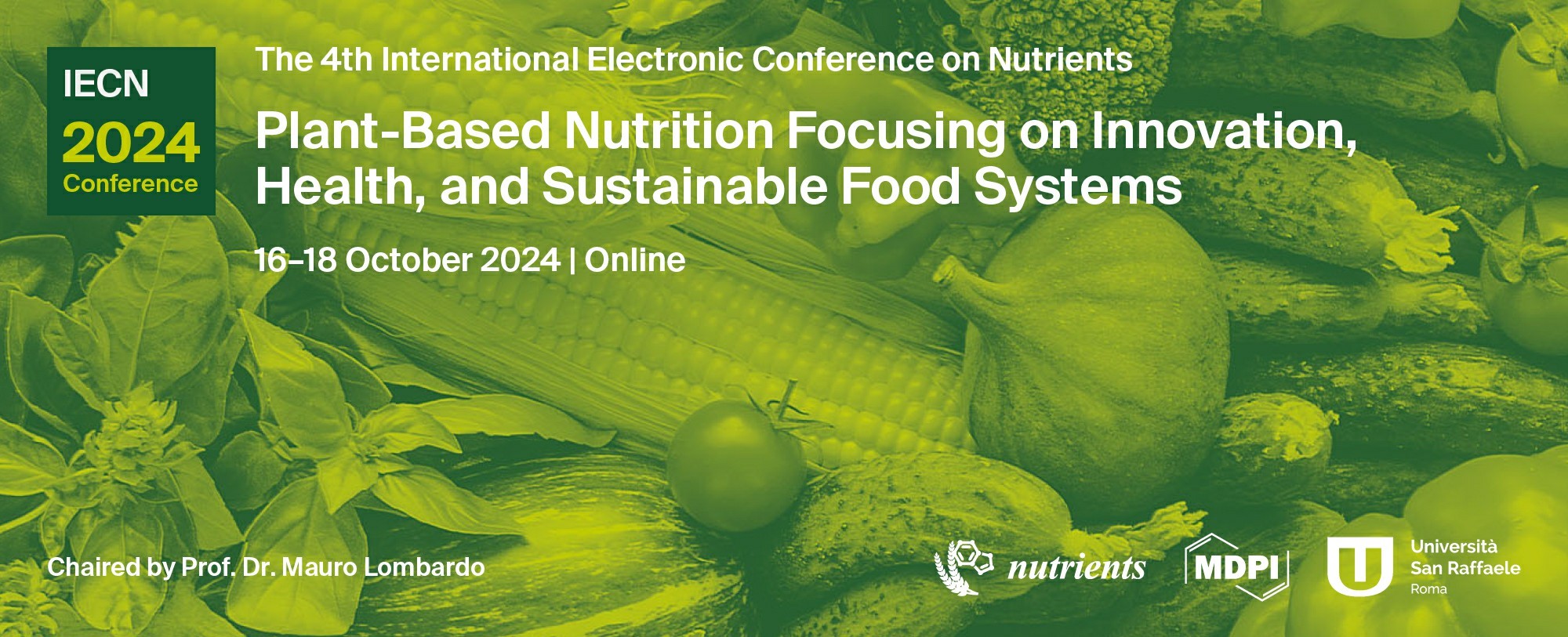
We are pleased to announce that the 4th International Electronic Conference on Nutrients (IECN 2024) is back. The conference is organized by the MDPI’s journal Nutrients (ISSN: 2072-6643, Impact Factor: 5.9) and will take place virtually from 16 to 18 October 2024, Central European Summer Time.
This conference aims to serve as a multidisciplinary platform for the exploration of innovative research and advancements in nutrient science. Emphasizing both macro- and micronutrients, the conference will delve into novel methodologies for nutrient extraction, bioavailability, and functional food development. Analytical techniques such as metabolomics, proteomics, and nutrient profiling will be discussed in the context of their application to food safety and quality. As the global search for healthier and more sustainable diets intensifies, the role of nutrients and lifestyle modification are at the forefront. For a healthier and more sustainable diet, it is clear that most people will need to incorporate more plant-based foods into their diet. Moreover, as we strive to feed a growing world population, the role of plant-based foods becomes increasingly critical. The aim is to explore the effectiveness of using plant-based nutrition as a primary approach in preventing, suspending, and even reversing chronic diseases. Furthermore, the conference aims to foster dialogue on the critical intersections between nutrient science, public health, and sustainable food systems. Our collective goal is to challenge existing scientific paradigms, broaden the scope of research, and contribute to an integrated approach where innovation, health, and sustainability coexist harmoniously.
The topics of this conference include:
S1. Plant-Based Diets: Health and Well-being;
S2. Innovation in Dietary Choices;
S3. Diet and Chronic Disease Management;
S4. Global Nutrition Trends: Shaping Health and Athletic Performance;
S5. Behavioral Approaches to Healthier Eating;
S6. Nutrition Across the Lifespan.
Important Deadlines:
1. Deadline for abstract submission: 18 June 2024.
2. Announcement of oral and poster abstract results: 16 August 2024. You will be notified of the acceptance of an oral/poster presentation in a separate email.
For any inquiries regarding the event, please contact iecn2024@mdpi.com.
We look forward to seeing you at the 4th International Electronic Conference on Nutrients.
Conference Chair:
Prof. Dr. Mauro Lombardo, Department of Human Sciences and Promotion of Quality of Life, San Raffaele Open University, Rome
22 December 2023
Nutrients Webinar | Functional Foods and Sustainable Health, 31 January 2024
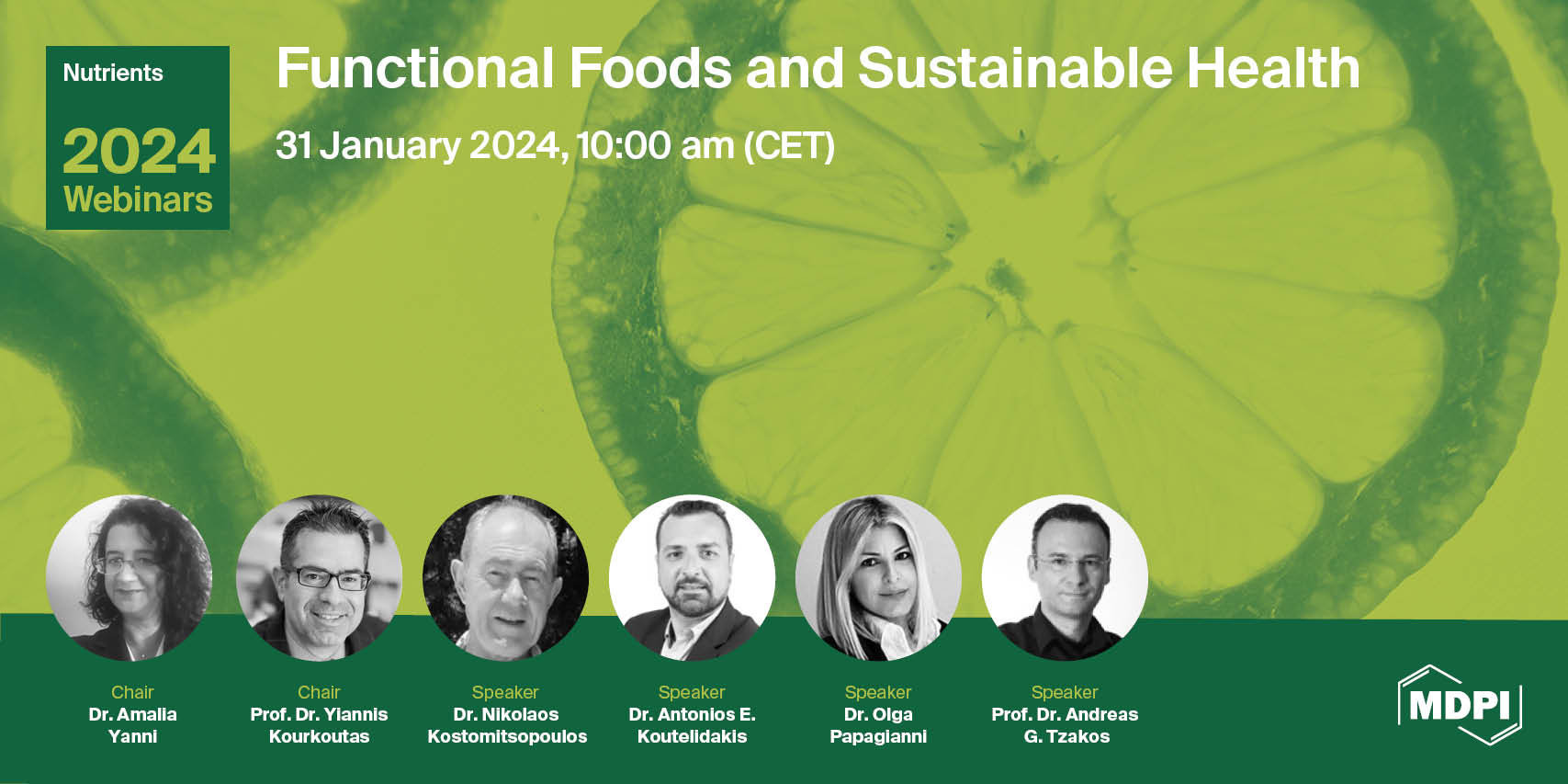
Functional foods have become a growing trend worldwide due to consumers’ demand for foods with health-promoting effects as well as manufacturers’ interest in a rapidly growing market. The inclusion of functional foods in a balanced dietary plan may have an impact on the prevention and management of diseases, and consequently it can support health sustainability and economic growth.
The Special Issue “Functional Foods and Sustainable Health” aims to highlight the use of functional foods for the prevention and management of chronic diseases and healthy aging, as well as the underlying mechanisms connecting functional foods/ingredients with beneficial effects on target body functions.
In the context of this Special Issue, this webinar aims to discuss different aspects of the research in the field of functional foods, including the following:
- Ethical issues and concerns with the use of animals in food science;
- Practical issues for the bioactivity assessment of functional foods during nutritional interventions/clinical trials;
- Generation of novel food products using functional ingredients.
Date: 31 January 2024 at 10:00 a.m. CET | 5:00 p.m. CST Asia
Webinar ID: 847 4883 5937
Webinar website: https://sciforum.net/event/Nutrients-12
Register now for free!
|
Speaker |
Presentation |
Time in CET |
Time in CST Asia |
|
Dr. Amalia Yanni and Prof. Dr. Yiannis Kourkoutas |
Chair Introduction |
10:00–10:10 a.m. |
5:00–5:10 p.m. |
|
Dr. Nikolaos Kostomitsopoulos |
Ethical Issues and Concerns on the Use of Animals in Food Science |
10:10–10:30 a.m. |
5:10–5:30 p.m. |
|
Dr. Antonios E. Koutelidakis and Dr. Olga Papagianni |
Nutritional Interventions-Clinical Trials: Practical Issues for Bioactivity Assessment of Innovative Functional Foods |
10:30–10:50 a.m. |
5:30–5:50 p.m. |
|
Prof. Dr. Andreas Tzakos |
Exploiting the Epirusherbs Database to Generate Novel Products |
10:50–11:10 a.m. |
5:50–6:10 p.m. |
|
Q&A Session |
11:10–11:25 a.m. |
6:10–6:25 p.m. |
|
|
Dr. Amalia Yanni and Prof. Dr. Yiannis Kourkoutas |
Closing of Webinar |
11:25–11:30 a.m. |
6:25–6:30 p.m. |
After registering, you will receive a confirmation email containing information on how to join the webinar. Registrations with academic institutional email addresses will be prioritized.
Unable to attend? Register anyway and we will let you know when the recording is available to watch.
Webinar Chairs and Keynote Speakers:
- Dr. Amalia Yanni, Laboratory of Chemistry, Biochemistry and Physical Chemistry of Foods, Department of Nutrition and Dietetics, Harokopio University, Athens, Greece;
- Prof. Dr. Yiannis Kourkoutas, Laboratory of Applied Microbiology & Biotechnology, Department of Molecular Biology & Genetics, Democritus University of Thrace, Alexandroupolis, Greece;
- Dr. Nikolaos Kostomitsopoulos, Senior Research Scientist, Biomedical Research Foundation of the Academy of Athens, Athens 115 27, Greece;
- Dr. Antonios E. Koutelidakis, Unit of Human Nutrition, Laboratory of Nutrition and Public Health, Department of Food Science and Nutrition, University of the Aegean, 81400 Lemnos, Greece;
- Dr. Olga Papagianni, Unit of Human Nutrition, Laboratory of Nutrition and Health, Department of Food Science and Nutrition, University of the Aegean, 81400 Lemnos, Greece;
- Dr. Andreas Tzakos, Section of Organic Chemistry and Biochemistry, Department of Chemistry, University of Ioannina, Ioannina, GR-45110, Greece.
Relevant Special Issue:
“Functional Foods and Sustainable Health”
Guest Editors: Amalia Yanni and Yiannis Kourkoutas
Deadline for manuscript submissions: 15 March 2024
12 December 2023
Editorial Board Members from Nutrients Featured in the 2023 Highly Cited Researchers List Published by Clarivate
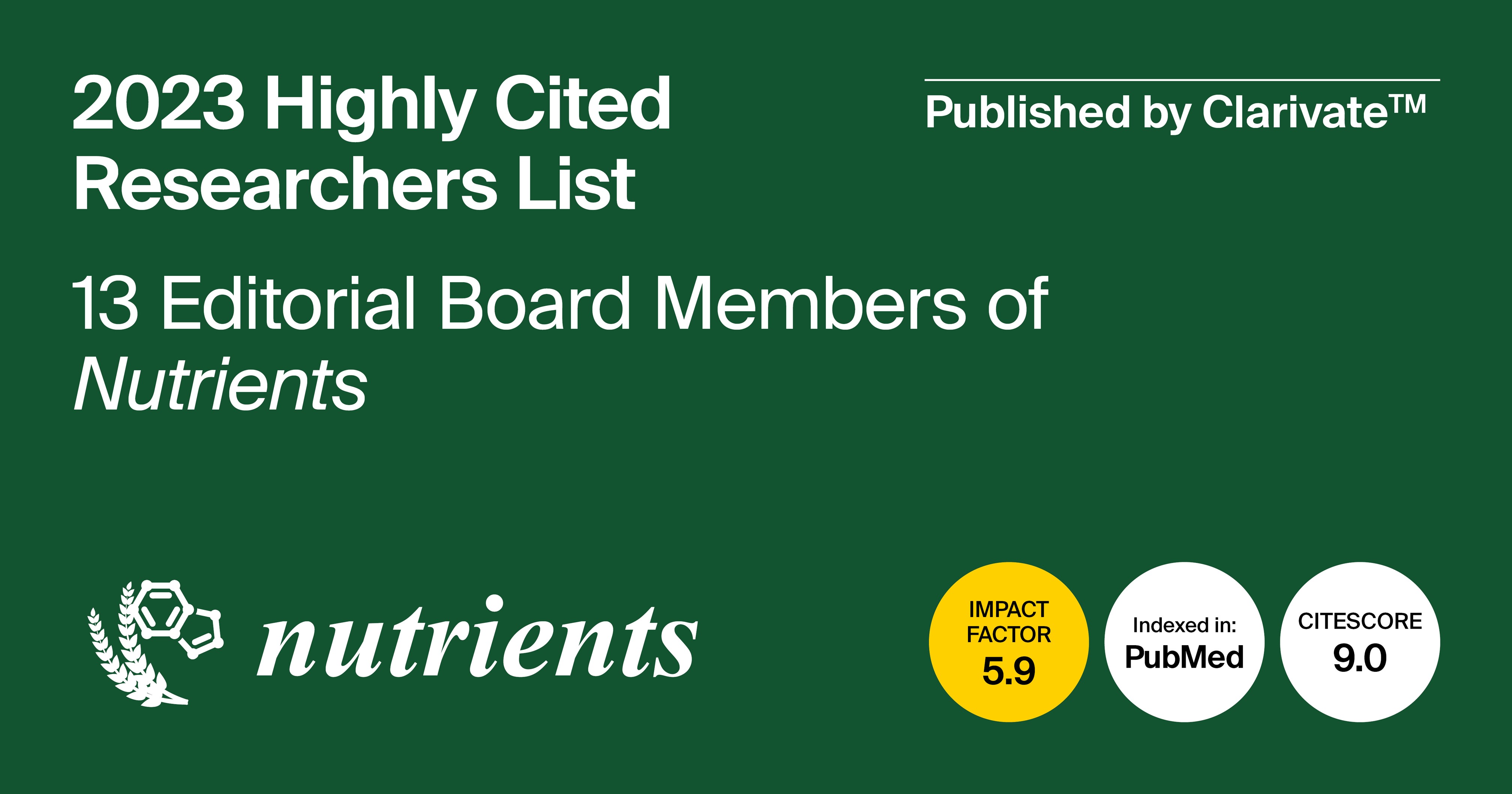
Recently, ClarivateTM revealed its 2023 list of Highly Cited ResearchersTM—individuals at universities, research institutes, and commercial organizations.
The scientists who were selected for this year’s list of Highly Cited Researchers published highly cited papers in the 11-year period from January 2012 to December 2022, with citation frequency in the top 1% of academic subjects and the same year of publication in the Web of ScienceTM database. This year, 7,125 Highly Cited Researcher 2023 designations were issued to 6,849 individuals, representing just 1 in 1,000 researchers worldwide. This means that these researchers have demonstrated an incredible level of significant and broad influence in their chosen field or fields over the last decade. The list is truly global, spanning 67 countries or regions and spread across a diverse range of research sciences and social sciences.
According to our statistics, 13 members of the Editorial Board of Nutrients (ISSN: 2072-6643) were selected for the list of Highly Cited Researchers by ClarivateTM in 2023. They are being recognized for their high-quality scientific research achievements and outstanding contributions to their professional fields. The Nutrients Editorial Office sincerely congratulates all elected editorial members and hopes that they continue to have an academically productive relationship with the journal.
|
Researcher |
Category |
Affiliation |
|
Fasano, Alessio |
Cross-Field |
Massachusetts General Hospital, United States |
|
Gasbarrini, Antonio |
Cross-Field |
Catholic University of the Sacred Heart, Italy |
|
La Vecchia, Carlo |
Clinical Medicine |
University of Milan, Italy |
|
Franceschi, Claudio |
Cross-Field |
University of Bologna, Italy |
|
Rodriguez-Manas, Leocadio |
Cross-Field |
Hospital Universitario de Getafe, Spain |
|
Holick, Michael F. |
Cross-Field |
Boston University, United States |
|
Tsao, Rong |
Agricultural Sciences |
Agriculture & Agri-Food Canada, Canada |
|
Grant, William B. |
Cross-Field |
Sunlight, Nutrition and Health Research Center (SUNARC), United States |
|
Godos, Justyna |
Agricultural Sciences |
University of Catania, Italy |
|
Giampieri, Francesca |
Agricultural Sciences |
Marche Polytechnic University, Italy |
|
Galvano, Fabio |
Agricultural Sciences |
University of Catania, Italy |
|
Sureda, Antoni |
Cross-Field |
Universitat de les Illes Balears, Spain |
|
Grosso, Giuseppe |
Agricultural Sciences |
University of Catania, Italy |
7 December 2023
Nutrients | Highly Cited Papers in 2021–2022 in the Section “Micronutrients and Human Health”
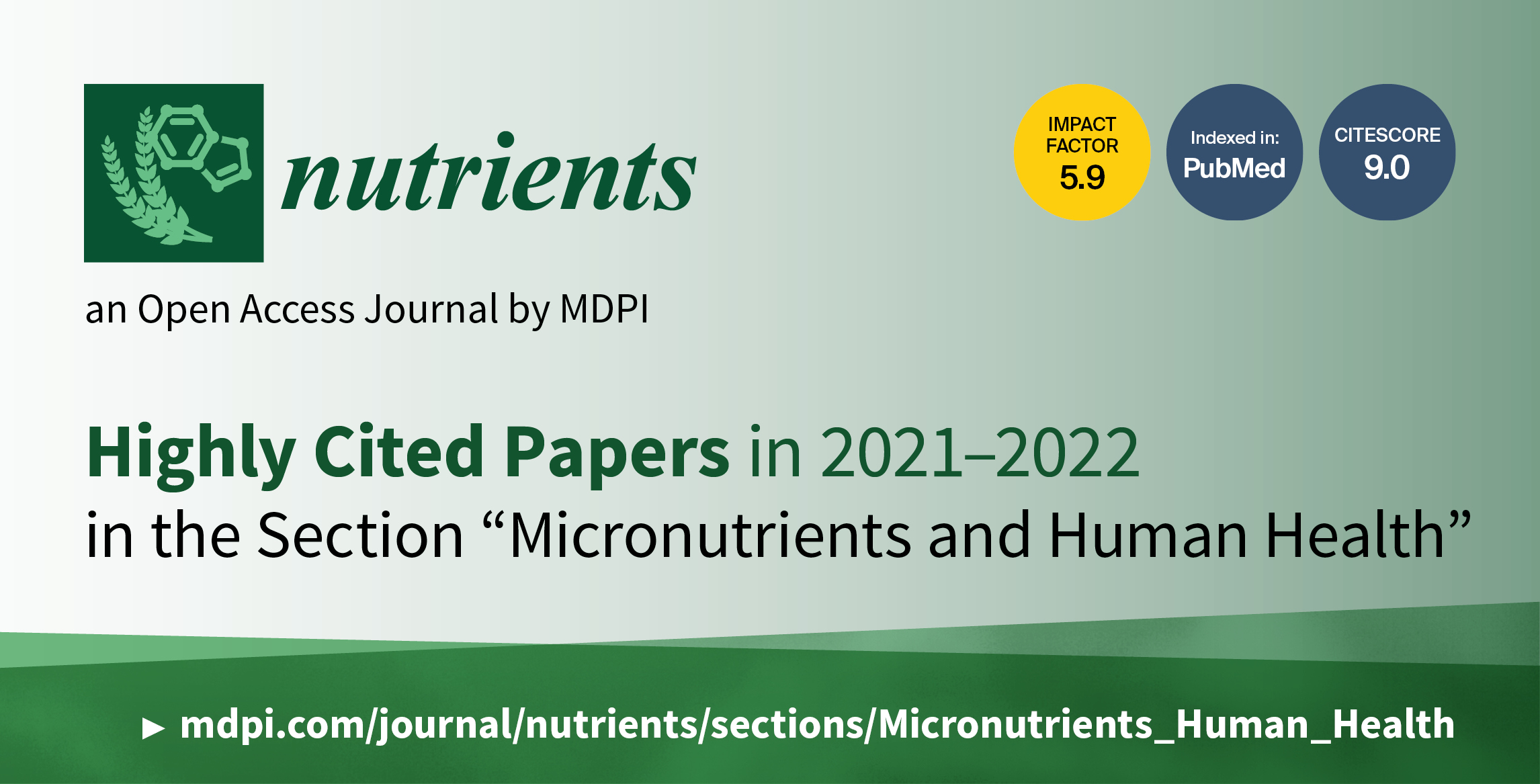
As all of the articles published in our journal are of an open access format, you have free and unlimited access to the full text. We welcome you to read our most highly cited papers published in 2021 and 2022 listed below:
1. “Vitamin C—Sources, Physiological Role, Kinetics, Deficiency, Use, Toxicity, and Determination”
by Martin Doseděl, Eduard Jirkovský, Kateřina Macáková, Lenka Kujovská Krčmová, Lenka Javorská, Jana Pourová, Laura Mercolini, Fernando Remião, Lucie Nováková, Přemysl Mladěnka et al.
Nutrients 2021, 13(2), 615; https://doi.org/10.3390/nu13020615
Available online: https://www.mdpi.com/2072-6643/13/2/615
2. “Magnesium: Biochemistry, Nutrition, Detection, and Social Impact of Diseases Linked to Its Deficiency”
by Diana Fiorentini, Concettina Cappadone, Giovanna Farruggia and Cecilia Prata
Nutrients 2021, 13(4), 1136; https://doi.org/10.3390/nu13041136
Available online: https://www.mdpi.com/2072-6643/13/4/1136
3. “Magnesium in Aging, Health and Diseases”
by Mario Barbagallo, Nicola Veronese and Ligia J. Dominguez
Nutrients 2021, 13(2), 463; https://doi.org/10.3390/nu13020463
Available online: https://www.mdpi.com/2072-6643/13/2/463
4. “Vitamin A Update: Forms, Sources, Kinetics, Detection, Function, Deficiency, Therapeutic Use and Toxicity”
by Alejandro Carazo, Alejandro Carazo, Kateřina Matoušová, Lenka Kujovská Krčmová, Michele Protti and Přemysl Mladěnka
Nutrients 2021, 13(5), 1703; https://doi.org/10.3390/nu13051703
Available online: https://www.mdpi.com/2072-6643/13/5/1703
5. “Vitamin D and Cancer: An Historical Overview of the Epidemiology and Mechanisms”
by Alberto Muñoz and William B. Grant
Nutrients 2022, 14(7), 1448; https://doi.org/10.3390/nu14071448
Available online: https://www.mdpi.com/2072-6643/14/7/1448
6. “Lutein and Zeaxanthin and Their Roles in Age-Related Macular Degeneration—Neurodegenerative Disease”
by Małgorzata Mrowicka, Jerzy Mrowicki, Ewa Kucharska and Ireneusz Majsterek
Nutrients 2022, 14(4), 827; https://doi.org/10.3390/nu14040827
Available online: https://www.mdpi.com/2072-6643/14/4/827
7. “Emerging Roles of Vitamin D-Induced Antimicrobial Peptides in Antiviral Innate Immunity”
by John H. White
Nutrients 2022, 14(2), 284; https://doi.org/10.3390/nu14020284
Available online: https://www.mdpi.com/2072-6643/14/2/284
8. “Vitamin D and Its Target Genes”
by Carsten Carlberg
Nutrients 2022, 14(7), 1354; https://doi.org/10.3390/nu14071354
Available online: https://www.mdpi.com/2072-6643/14/7/1354
9. “Vitamin D in Osteosarcopenic Obesity”
by Luigi Di Filippo, Rebecca De Lorenzo, Andrea Giustina, Patrizia Rovere-Querini and Caterina Conte
Nutrients 2022, 14(9), 1816; https://doi.org/10.3390/nu14091816
Available online: https://www.mdpi.com/2072-6643/14/9/1816
10. “Overlapping Mechanisms of Action of Brain-Active Bacteria and Bacterial Metabolites in the Pathogenesis of Common Brain Diseases”
by Tanja Patricia Eicher and M. Hasan Mohajeri
Nutrients 2022, 14(13), 2661; https://doi.org/10.3390/nu14132661
Available online: https://www.mdpi.com/2072-6643/14/13/2661
7 December 2023
Nutrients | Highly Cited Papers in 2021–2022 in the Section “Geriatric Nutrition”
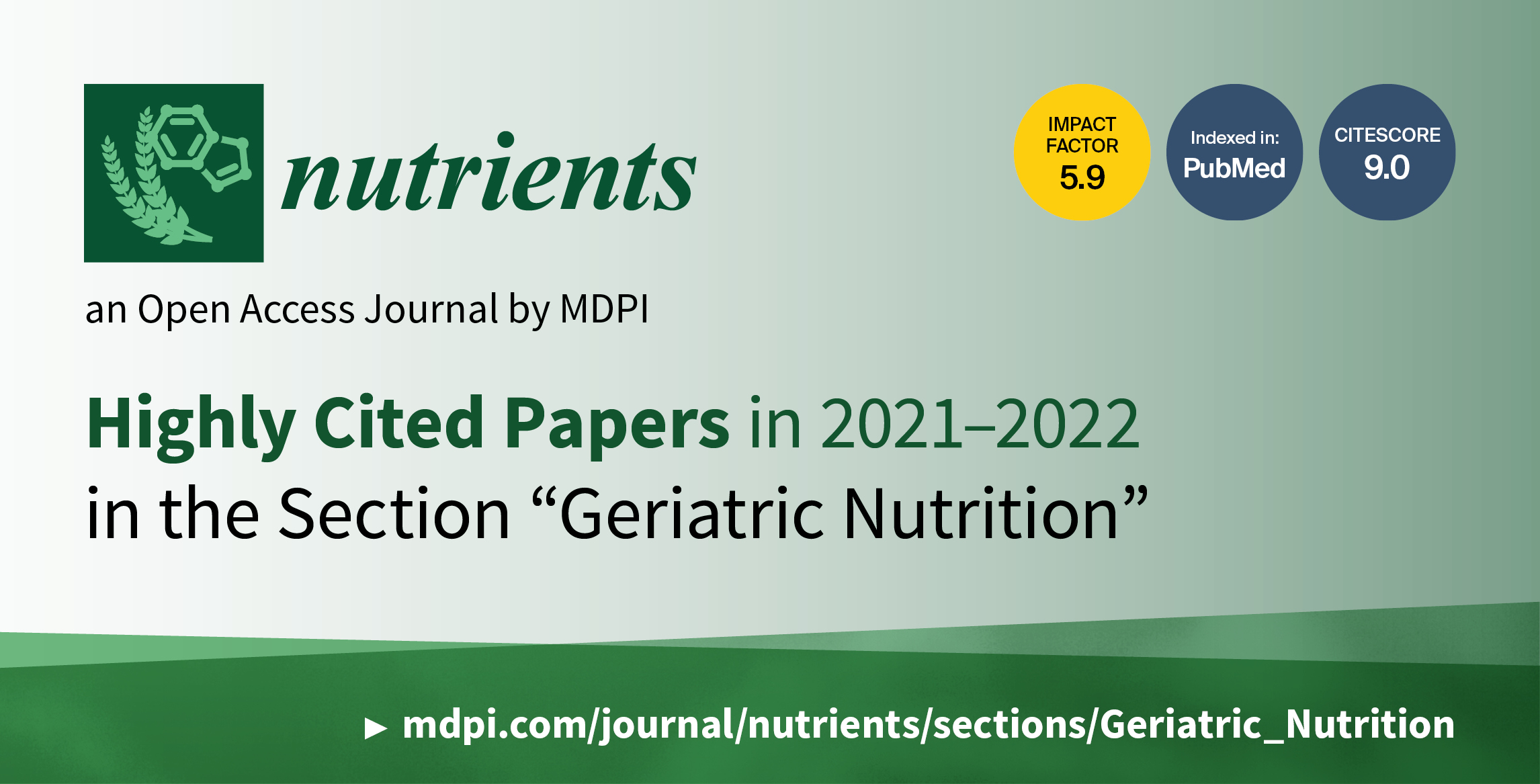
As all of the articles published in our journal are of an open access format, you have free and unlimited access to the full text. We welcome you to read our most highly cited papers published in 2021 and 2022 listed below:
1. “The Role of Macronutrients, Micronutrients and Flavonoid Polyphenols in the Prevention and Treatment of Osteoporosis”
by Monika Martiniakova, Martina Babikova, Vladimira Mondockova, Jana Blahova, Veronika Kovacova and Radoslav Omelka
Nutrients 2022, 14(3), 523; https://doi.org/10.3390/nu14030523
Available online: https://www.mdpi.com/2072-6643/14/3/523
2. “Whey Protein, Leucine- and Vitamin-D-Enriched Oral Nutritional Supplementation for the Treatment of Sarcopenia”
by Emanuele Cereda, Roberto Pisati, Mariangela Rondanelli and Riccardo Caccialanza
Nutrients 2022, 14(7), 1524; https://doi.org/10.3390/nu14071524
Available online: https://www.mdpi.com/2072-6643/14/7/1524
3. “Healthy Aging and Dietary Patterns”
by Ligia J. Dominguez, Nicola Veronese, Eleonora Baiamonte, Martina Guarrera, Angela Parisi, Chiara Ruffolo, Federica Tagliaferri and Mario Barbagallo
Nutrients 2022, 14(4), 889; https://doi.org/10.3390/nu14040889
Available online: https://www.mdpi.com/2072-6643/14/4/889
4. “Effect of 12-Week Intake of Nicotinamide Mononucleotide on Sleep Quality, Fatigue, and Physical Performance in Older Japanese Adults: A Randomized, Double-Blind Placebo-Controlled Study”
by Mijin Kim, Jaehoon Seol, Toshiya Sato, Yuichiro Fukamizu, Takanobu Sakurai and Tomohiro Okura
Nutrients 2022, 14(4), 755; https://doi.org/10.3390/nu14040755
Available online: https://www.mdpi.com/2072-6643/14/4/755
5. “Malnutrition in Hospitalized Old Patients: Screening and Diagnosis, Clinical Outcomes, and Management”
by Francesco Bellanti, Aurelio lo Buglio, Stefano Quiete and Gianluigi Vendemiale
Nutrients 2022, 14(4), 910; https://doi.org/10.3390/nu14040910
Available online: https://www.mdpi.com/2072-6643/14/4/910
6. “Impact of Malnutrition Status on Muscle Parameter Changes over a 5-Year Follow-Up of Community-Dwelling Older Adults from the SarcoPhAge Cohort”
by Laetitia Lengelé, Olivier Bruyère, Charlotte Beaudart, Jean-Yves Reginster and Médéa Locquet
Nutrients 2021, 13(2), 407; https://doi.org/10.3390/nu13020407
Available online: https://www.mdpi.com/2072-6643/13/2/407
7. “Effects of Dietary Food Components on Cognitive Functions in Older Adults”
by Hitoshi Ozawa, Taiki Miyazawa and Teruo Miyazawa
Nutrients 2021, 13(8), 2804; https://doi.org/10.3390/nu13082804
Available online: https://www.mdpi.com/2072-6643/13/8/2804
8. “Prevalence of Undernutrition, Frailty and Sarcopenia in Community-Dwelling People Aged 50 Years and Above: Systematic Review and Meta-Analysis”
by Nada Almohaisen, Matthew Gittins, Chris Todd, Jana Sremanakova, Anne Marie Sowerbutts, Amal Aldossari, Asrar Almutairi, Debra Jones and Sorrel Burden
Nutrients 2022, 14(8), 1537; https://doi.org/10.3390/nu14081537
Available online: https://www.mdpi.com/2072-6643/14/8/1537
9. “The Effect of Nutrition on Aging—A Systematic Review Focusing on Aging-Related Biomarkers”
by Catarina Leitão, Anna Mignano, Marta Estrela, Marta Estrela, Adolfo Figueiras, Fátima Roque and Maria Teresa Herdeiro
Nutrients 2022, 14(3), 554; https://doi.org/10.3390/nu14030554
Available online: https://www.mdpi.com/2072-6643/14/3/554
10. “Treatment-Related Dysgeusia in Oral and Oropharyngeal Cancer: A Comprehensive Review”
by Lucrezia Togni, Marco Mascitti, Arianna Vignini, Sonila Alia, Davide Sartini, Alberta Barlattani, Monica Emanuelli and Andrea Santarelli
Nutrients 2021, 13(10), 3325; https://doi.org/10.3390/nu13103325
Available online: https://www.mdpi.com/2072-6643/13/10/3325
6 December 2023
Nutrients 2023 Young Investigator Award—Winner Announced
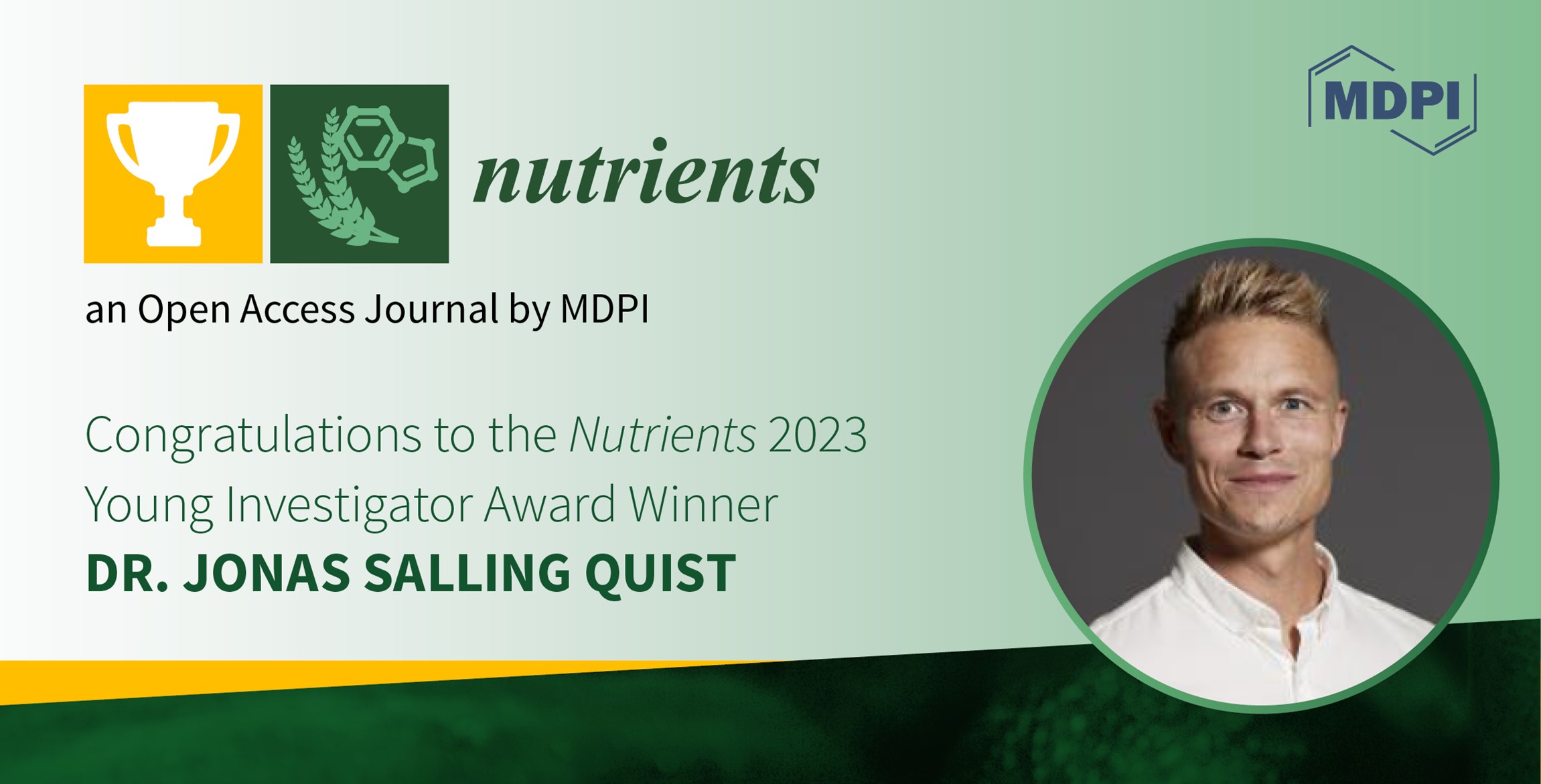
We are pleased to announce that the winner of the Nutrients 2023 Young Investigator Award—Dr. Jonas Salling Quist.
Dr. Jonas Salling Quist is a senior researcher at Steno Diabetes Center, Copenhagen, Denmark. He is also a visiting researcher in the Appetite Control and Energy Balance Research Group at the University of Leeds, UK. He focuses on lifestyle, circadian rhythm, appetite regulation, and metabolism in relation to the prevention and treatment of obesity and type 2 diabetes areas where he has received significant scientific recognition. Dr. Jonas Salling Quist received his Ph.D. in 2017 and has an outstanding publication record, comprising 36 publications in international peer-reviewed journals in the last 5 years. His Scopus scientific citation number is 511 and his Hirsch index is 13. He is a rising star in the field, with a remarkable record of achievement for a young investigator at this stage of his career, especially in light of the competitive environment of scientific research today. Please join us in congratulating Dr. Jonas Salling Quist on his outstanding achievements.
As the awardee, Dr. Jonas Salling Quist will receive an honorarium of CHF 2000, an offer to publish a paper free of charge in Nutrients (ISSN: 2072-6643) following peer review before the end of 2024, and an electronic certificate.
We would like to thank all the nominators from various fields of research for their participation, and all the Award Committee members for their evaluation of the many excellent nominations.
Prof. Dr. Maria Luz Fernandez
Editor-in-Chief of Nutrients
30 November 2023
MDPI Insights: The CEO’s Letter #6 - MDPI Spain Summit and ResearchGate

Welcome to the MDPI Insights: The CEO's Letter.
In these monthly letters, I will showcase two key aspects of our work at MDPI: our commitment to empowering researchers and our determination to facilitating open scientific exchange.
Opening Thoughts

MDPI Spain Summit

Stefan Tochev (CEO, MDPI) gives the opening speech at the MDPI Spain Summit.
On Friday 10 November 2023 I was in Barcelona, Spain, to deliver the opening presentation and participate in a panel at MDPI’s Spain Summit, a two-day event, inspired by our salon events in China.
With 16 Editors-in-Chief (EiCs) and 20 Editorial Board Members (EBMs) in attendance, the event, organized by our conference team and Barcelona office, featured presentations on open access (OA), MDPI, and publishing market trends in Spain.
The event provided a great opportunity to engage with stakeholders from various MDPI journals, including Nutrients, Vaccines, Buildings, IJMS, and others. We were able to gather feedback and have open conversations around manuscript quality, the peer-review process, and journal development, as well as accreditation agencies.
The main objective of this Summit was to bring together Editors representing MDPI journals across various disciplines within Spanish universities and research centers, primarily from the Barcelona area. The aim was to facilitate an open and fruitful discussion regarding the development of their journals, the future of OA in Spain, and to provide meaningful interactions and networking opportunities.
Connecting with Editorial Board Members

Stefan Tochev in conversation with Summit participants: "Our EBMs are passionate about the journals they serve."
Interacting with our EBMs in person provides a valuable opportunity to show how important it is to us to connect with them, hear their perspectives on their journals and learn more about their own experience collaborating with MDPI.
From my conversations, it was clear that our EBMs are passionate about the journals they serve. I know the advice they provide may sometimes involve just small tweaks, but these can lead to important improvements. As the saying goes, small hinges swing open big doors.
As at November 2023, MDPI has over 6,300 EBMs affiliated with Spanish institutions, with more than 30 of them serving as EiCs or section EiCs. Furthermore, over 68,000 Spanish scholars have contributed as reviewers in MDPI journals.
Open Access in Spain
In 2023, Spain implemented legislation mandating immediate OA for all publicly funded research, aligning with the EU’s Plan S initiative to expedite the transition to OA. The Spanish government also approved a four-year, €23.8 million annual budget for the first national OA strategy, aiming to make publicly funded research freely accessible upon publication. This strategy aims to strengthen the quality and transparency of research in Spain, and to help promote movement towards a digital, low-carbon economy.
For further details of Spain's OA policy and the history of government mandates, click here.
Spain has already seen a notable decline in subscription-only articles, decreasing by 62% over a 10-year period, while gold OA increased by 42%. Green OA slightly decreased, suggesting a shift towards publishing in gold OA journals rather than traditional subscription-based ones. Here are some statistics from Scopus.
A big thank-you to the various MDPI teams, including our conference team and the Barcelona office, for organizing this very successful event!

MDPI colleagues from various offices gathered to host and support the first MDPI Spain Summit, in Barcelona, Spain.
I think this type of gathering has the potential to become an annual event in various locations. For example, Manchester could be an option, as we have over 30 EiCs and over 3,000 EBMs in the UK, a top market for MDPI that publishes high-quality research.
Impactful Research

769 Editorial Board Members of MDPI Journals Recognized as Highly Cited Researchers in 2023
Congratulations to our 769 Editorial Board Members from 40 countries/territories who have been awarded Highly Cited Researcher status for 2023 by Clarivate. This recognition is based on their outstanding scientific research contributions and significant influence in various fields, as evidenced by Web of Science data.
Click here to view the full list of 769 Editorial Board Members.
Clarivate's Highly Cited ResearchersTM list identifies individuals with exceptional impact in scientific and social science domains over the past decade. Their papers rank in the top 1% of citations in 21 fields analysed in ‘Essential Science Indicators,’ showcasing their substantial influence.
This year, 7,125 Highly Cited Researcher 2023 designations were issued to 6,849 individuals from 67 countries, representing just 1 in 1,000 researchers worldwide.
These researchers demonstrate exceptional influence, representing a small fraction of contributors pushing the boundaries of knowledge, contributing to global well-being, sustainability, and security.
Congratulations to these scholars for their remarkable achievement: we are honoured to have them on board with our journals!
Inside MDPI

Corporate Marketing and Communications Strategy Session

Members of MDPI’s Corporate Marketing & Communications team.
For the past few years, I have led the Corporate Marketing & Communications department in our annual strategy session.
This typically involves 2–3 days of focused sessions covering key topics including budgeting, hiring targets, campaign reviews, and planning for the upcoming year, department strategy, and structure.
We are constantly exploring ways to optimize the Corporate Marketing & Communications department to support MDPI’s primary objectives and better convey the MDPI story while serving the scholarly community.
The strategy session also serves as a team-building activity, during which the team voted on bowling!
Strategy Session
In this strategy session, we looked at how to align our teams in order to better streamline our content with our campaigns, build a dedicated marketing team to strategically support our core MDPI products, expand our communications teams and functionalities to focus on company-critical campaigns and press releases, align our new brand design system with our marketing initiatives, set up a community and engagement team to support various teams with their outreach and communication efforts, and increase our use of data in the evaluation of campaign performance.
To grow in these areas, we will be hiring for various positions, including those of Public Relations Manager, Communications Manager, Internal Communications Manager, Campaign Manager, Marketing Associate, and Editorial Engagement Manager.
I am grateful for the way our Corporate Marketing & Communications department has grown and gelled over the years, and I look forward to supporting the department teams and their ideas for the future.
Coming Together for Science

ResearchGate and MDPI Partner to Boost the Visibility of Open Access Content through Journal Home

Stefan Tochev (CEO, MDPI) and Sören Hofmayer (Co-Founder and Chief Strategy Officer, ResearchGate) meet in Berlin, Germany to take their ongoing discussion further.
When I assumed the role of CEO at MDPI, my primary focus was to initiate the building of essential partnerships and collaborations within our industry. After all, I am a firm believer in achieving our goals by helping others achieve theirs and focusing on co-opetition wherever there is an opportunity. I first touched on the notion of co-opetition in MDPI Insights: The CEO's Letter #3, particularly when discussing collaborations with Elsevier.
In light of this, Sören Hofmayer (Co-Founder and Chief Strategy Officer at ResearchGate) and I connected recently to continue a discussion that had been ongoing for months. I was quickly brought up to speed and felt there was an opportunity for MDPI journals to pilot the Journal Home service that ResearchGate had launched. This would provide a new way for MDPI to engage with authors and readers and amplify the visibility of our journals.
While I receive many offers and opportunities for discussions with vendors, I am a firm believer that timing is everything, and in this case, the time for us is now. Sören and I met in person during my recent visit to Berlin and decided to proceed with piloting ten MDPI journals with the Journal Home service.
The press release below provides further details.
Press Release: Berlin (Germany) and Basel (Switzerland), 15 November 2023
ResearchGate, the professional network for researchers, and MDPI, the largest open access publisher in the world and a pioneer in open access publishing, today announced a partnership that will see ten of MDPI’s open access journals benefit from an enhanced presence on ResearchGate through its innovative Journal Home offering.
This new partnership will expand the reach and visibility of MDPI’s participating flagship journals with ResearchGate’s highly relevant community of more than 25 million researchers globally.
Around 210,000 version-of-record articles from these 10 titles will be readily available on ResearchGate, including the full archive material and all new articles as they are published. These journals also benefit from enhanced brand visibility, with dedicated journal profiles, prominent representation on all associated article pages and all relevant touchpoints across the ResearchGate network – keeping the journals top-of-mind with their reader and author audiences. All articles covered by the new partnership will automatically be added to the authors’ publication records in ResearchGate. This not only reduces MDPI authors’ needs for direct management but also offers them valuable insights into the impact of their work, including data about readership and citations.
Closing Thoughts

November is Men’s Health Awareness Month

Stefan Tochev (CEO, MDPI) listening to music as he writes at a coffee shop in Basel, Switzerland.
November is dedicated to raising awareness of various men’s health issues. I have been fortunate to have positive male role models in my life, and I strive to share my experiences with others.
I used to take part in Movember, growing my moustache throughout November to raise awareness and funds and to help “change the face of men’s health.” With male family and friends impacted by physical and mental health issues, I have recently become more interested in men’s overall well-being.
Men often face stigma involving the perceived need always to be strong and have things figured out. Recently, I’ve had meaningful conversations with male friends and colleagues about issues we rarely discuss, and it was a positive experience.
Various factors impact men’s health and well-being, all too easily leading to risky health behaviours including a lack of health awareness, poor health education, and negative, culturally induced, behaviour patterns in our work and personal lives. I hope we can break down these barriers in our work environment.
Healthy men help build healthy families and a healthy society
Men are less likely than women to seek help with their physical and mental health struggles. This is a reminder to prioritize your overall well-being. I hope that as men, we will continue to open up to one another, becoming vulnerable in order to share what we are going through. By sharing and by supporting each other, we can learn and grow together. You are not alone, and when you fall, you can still get up and stand tall.
From one broski to another, you are loved and appreciated. I hope this mindset carries into December and beyond.
Mindfulness
Our content team recently released a handful of articles on mindfulness, a practice that I believe provides a good opportunity for stress release and self-reflection:
Chief Executive Officer
MDPI AG
22 November 2023
Recruiting Reviewer Board Members for Nutrients

We are recruiting Reviewer Board Members for Nutrients (ISSN: 2072-6643). If you are an active researcher in the field and are passionate about promoting the publication of cutting-edge research, please contact the Nutrients Editorial Office (nutrients@mdpi.com) to apply for this role.
Nutrients is an international, peer-reviewed, open access, advanced forum for publishing studies related to human nutrition, and it is published semimonthly online by MDPI. The aims and scope of the journal can be found via the following link: https://www.mdpi.com/journal/nutrients/about.
The Reviewer Board (RB) consists of experienced researchers whose main responsibility is to regularly and actively support journals by providing high quality, rigorous, and transparent review reports for submitted manuscripts within their area of expertise. The initial term is for one year, which can then be renewed or terminated.
The benefits of joining our Reviewer Board are as follows:
- We will announce your entry information on the journal's Reviewer Board;
- We award discounts for comprehensive and timely reviews. These vouchers can be used for all MDPI journals;
- You will receive a personalized reviewer certificate;
- Review frequency is flexible and based on your schedule;
- You can showcase your peer reviews and editorial contributions to our journal readers.
If you are interested in this position, please send your application, including a full academic CV, to the Nutrients Editorial Office (nutrients@mdpi.com). We look forward to collaborating with you.
21 November 2023
769 Editorial Board Members of MDPI Journals Achieve Highly Cited Researcher Recognition in 2023

We extend our sincere congratulations to the 769 Editorial Board Members of our journals – from 40 different countries/territories – who have been recognized as Highly Cited Researchers for the year 2023 by Clarivate. They are being recognized for their high-quality scientific research achievements and outstanding contributions to their professional fields, as indicated by Web of Science data.
Clarivate's annual list of Highly Cited ResearchersTM identifies the most highly cited scientists for the past decade who stand out for their significant and broad influence in various scientific and social science domains. Their impactful papers are among the top 1 per cent in the citation distribution of one or more of 21 fields analyzed in the "Essential Science Indicators", distinguishing them as hugely influential among their peers.
This year, 7,125 Highly Cited Researcher 2023 designations were issued to 6,849 individuals from 67 countries, representing just 1 in 1,000 researchers worldwide.
This means that these researchers have demonstrated an incredible level of significant and broad influence in their chosen field or fields over the last decade. They represent a small fraction of the researcher population whose contributions disproportionately push the boundaries of knowledge, enhancing global well-being, sustainability, and security.
Congratulations to the scholars for their noteworthy achievement – we are honored to have them on board with our journals!
|
Abate, Antonio |
Jaiswal, Amit K. |
Shen, Zexiang |
15 November 2023
Nutrients | Highly Cited Papers in 2021 in the Section “Nutrition and Public Health”
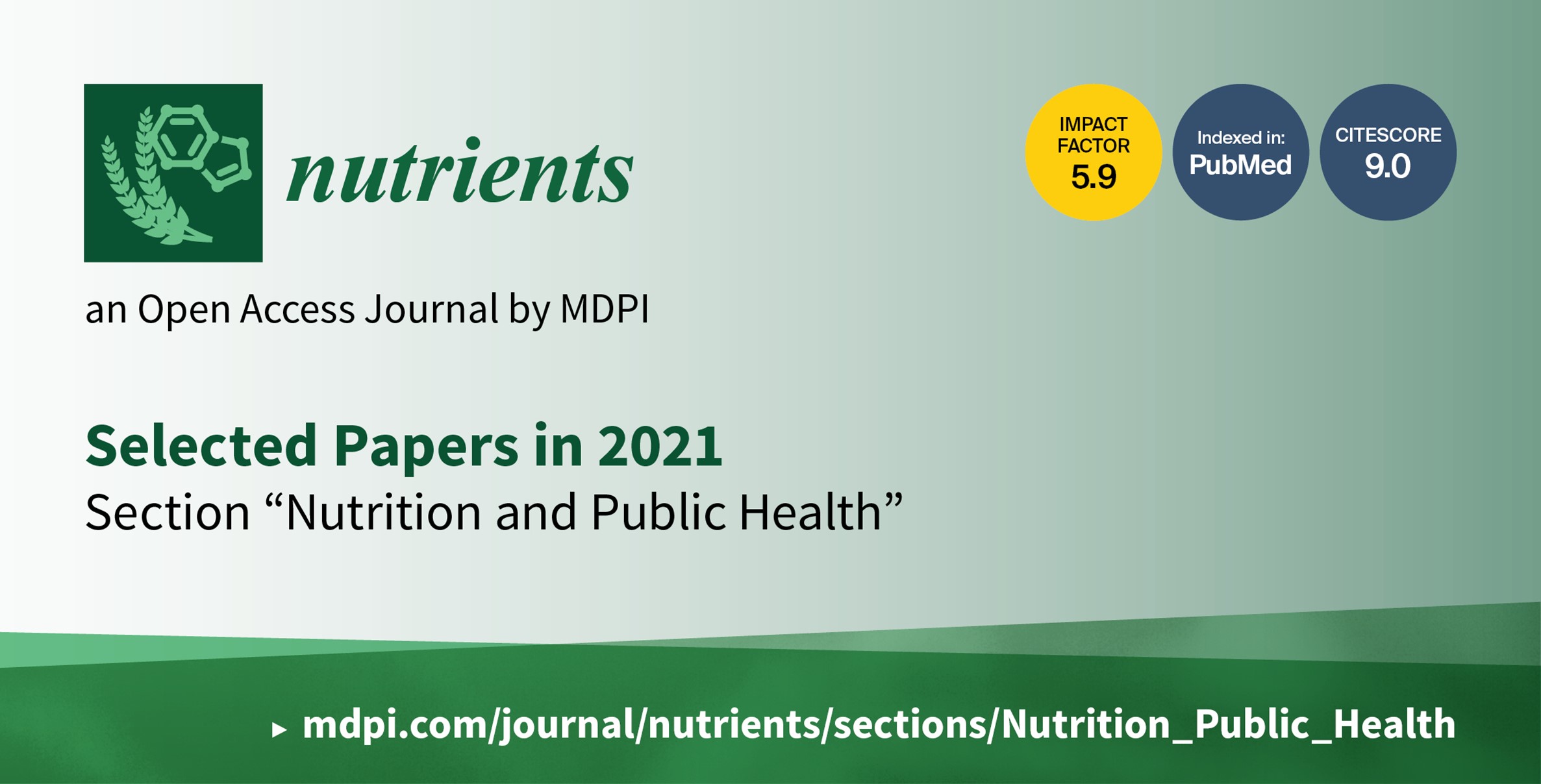
As all of the articles published in our journal are in an open access format, you have free and unlimited access to the full text. We welcome you to read our most highly cited papers published in 2021 listed below:
“Universal School Meals and Associations with Student Participation, Attendance, Academic Performance, Diet Quality, Food Security, and Body Mass Index: A Systematic Review”
by Juliana F. W. Cohen, Amelie A. Hecht, Gabriella M. McLoughlin, Lindsey Turner and Marlene B. Schwartz
Nutrients 2021, 13(3), 911; https://doi.org/10.3390/nu13030911
Available online: https://www.mdpi.com/2072-6643/13/3/911
“Edible Insects versus Meat—Nutritional Comparison: Knowledge of Their Composition Is the Key to Good Health”
by Agnieszka Orkusz
Nutrients 2021, 13(4), 1207; https://doi.org/10.3390/nu13041207
Available online: https://www.mdpi.com/2072-6643/13/4/1207
“A Systematic Review of Worldwide Consumption of Ultra-Processed Foods: Findings and Criticisms”
by Mirko Marino, Federica Puppo, Cristian Del Bo’, Valentina Vinelli, Patrizia Riso, Marisa Porrini and Daniela Martini
Nutrients 2021, 13(8), 2778; https://doi.org/10.3390/nu13082778
Available online: https://www.mdpi.com/2072-6643/13/8/2778
“Vegan Diet Health Benefits in Metabolic Syndrome”
by Giulia Marrone, Cristina Guerriero, Daniela Palazzetti, Paolo Lido, Alessandro Marolla, Francesca Di Daniele and Annalisa Noce
Nutrients 2021, 13(3), 817; https://doi.org/10.3390/nu13030817
Available online: https://www.mdpi.com/2072-6643/13/3/817
“Natural Bioactive Compounds Useful in Clinical Management of Metabolic Syndrome”
by Annalisa Noce, Manuela Di Lauro, Francesca Di Daniele, Anna Pietroboni Zaitseva, Giulia Marrone, Patrizia Borboni and Nicola Di Daniele
Nutrients 2021, 13(2), 630; https://doi.org/10.3390/nu13020630
Available online: https://www.mdpi.com/2072-6643/13/2/630
“Plasma Free Fatty Acid Concentration as a Modifiable Risk Factor for Metabolic Disease”
by Gregory C. Henderson
Nutrients 2021, 13(8), 2590; https://doi.org/10.3390/nu13082590
Available online: https://www.mdpi.com/2072-6643/13/8/2590
“Perinatal Dietary Polyunsaturated Fatty Acids in Brain Development, Role in Neurodevelopmental Disorders”
by Maud Martinat, Moïra Rossitto, Mathieu Di Miceli and Sophie Layé
Nutrients 2021, 13(4), 1185; https://doi.org/10.3390/nu13041185
Available online: https://www.mdpi.com/2072-6643/13/4/1185
“Diet–Microbiota Interactions in Inflammatory Bowel Disease”
by Kohei Sugihara and Nobuhiko Kamada
Nutrients 2021, 13(5), 1533; https://doi.org/10.3390/nu13051533
Available online: https://www.mdpi.com/2072-6643/13/5/1533
“Human Milk Exosomal MicroRNA: Associations with Maternal Overweight/Obesity and Infant Body Composition at 1 Month of Life”
by Kruti B. Shah, Steven D. Chernausek, Lori D. Garman, Nathan P. Pezant, Jasmine F. Plows, Harmeet K. Kharoud, Ellen W. Demerath and David A. Fields
Nutrients 2021, 13(4), 1091; https://doi.org/10.3390/nu13041091
Available online: https://www.mdpi.com/2072-6643/13/4/1091
“The Immunopathogenesis of Alzheimer’s Disease Is Related to the Composition of Gut Microbiota”
by Friedrich Leblhuber, Daniela Ehrlich, Kostja Steiner, Simon Geisler, Dietmar Fuchs, Lukas Lanser and Katharina Kurz
Nutrients 2021, 13(2), 361; https://doi.org/10.3390/nu13020361
Available online: https://www.mdpi.com/2072-6643/13/2/361
15 November 2023
Nutrients | Highly Cited Papers in 2021 in the Section “Clinical Nutrition”
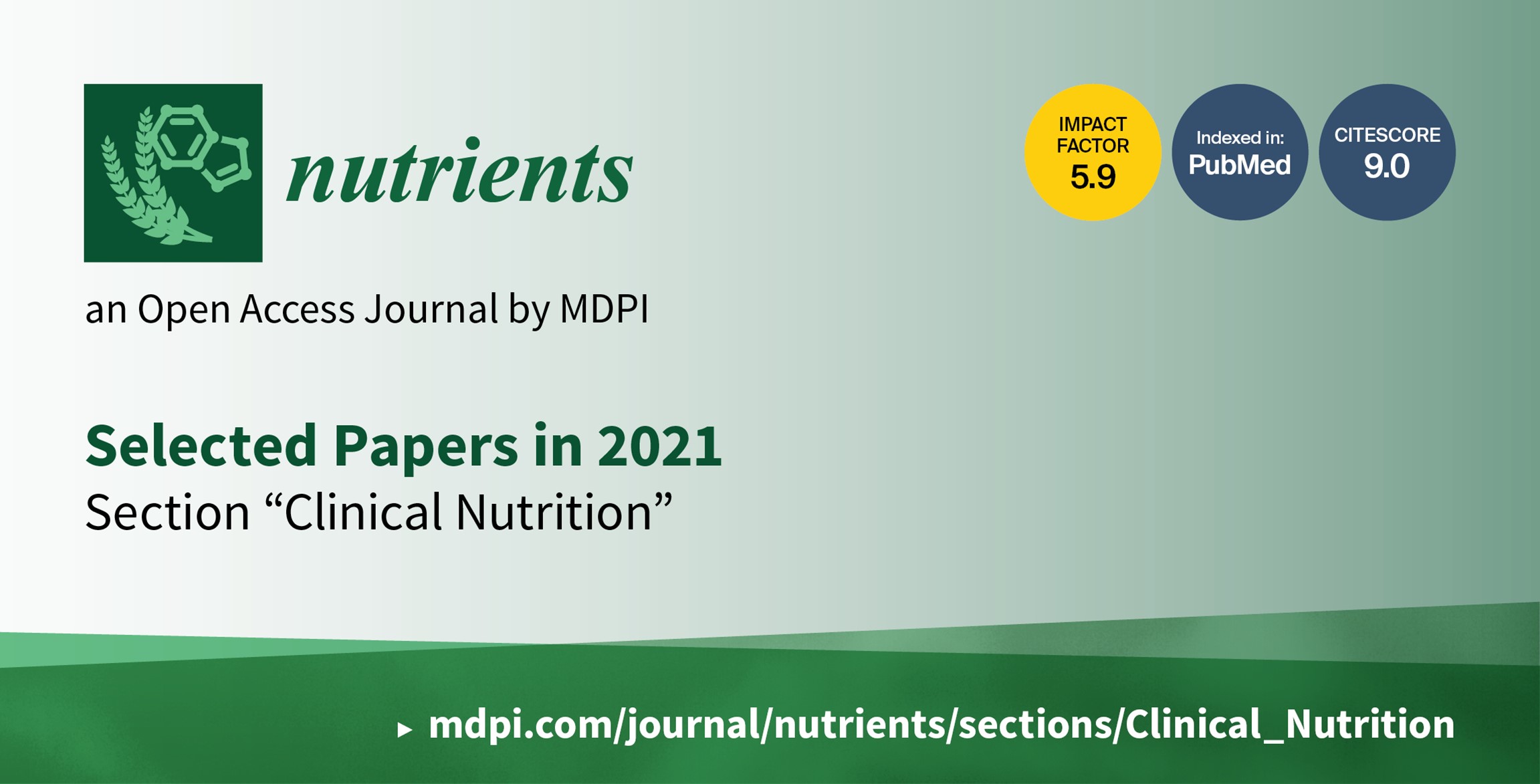
As all of the articles published in our journal are in an open access format, you have free and unlimited access to the full text. We welcome you to read our most highly cited papers published in 2021 listed below:
“Malnutrition in Older Adults—Recent Advances and Remaining Challenges”
by Kristina Norman, Ulrike Haß and Matthias Pirlich
Nutrients 2021, 13(8), 2764; https://doi.org/10.3390/nu13082764
Available online: https://www.mdpi.com/2072-6643/13/8/2764
“Nutrition and Kidney Stone Disease”
by Roswitha Siener
Nutrients 2021, 13(6), 1917; https://doi.org/10.3390/nu13061917
Available online: https://www.mdpi.com/2072-6643/13/6/1917
“Phytosterols, Cholesterol Control, and Cardiovascular Disease”
by Andrea Poli, Franca Marangoni, Alberto Corsini, Enzo Manzato, Walter Marrocco, Daniela Martini, Gerardo Medea and Francesco Visioli
Nutrients 2021, 13(8), 2810; https://doi.org/10.3390/nu13082810
Available online: https://www.mdpi.com/2072-6643/13/8/2810
“Edible Mushrooms and Beta-Glucans: Impact on Human Health”
by Chiara Cerletti, Simona Esposito and Licia Iacoviello
Nutrients 2021, 13(7), 2195; https://doi.org/10.3390/nu13072195
Available online: https://www.mdpi.com/2072-6643/13/7/2195
“Food and Food Groups in Inflammatory Bowel Disease (IBD): The Design of the Groningen Anti-Inflammatory Diet (GrAID)”
by Marjo J. E. Campmans-Kuijpers and Gerard Dijkstra
Nutrients 2021, 13(4), 1067; https://doi.org/10.3390/nu13041067
Available online: https://www.mdpi.com/2072-6643/13/4/1067
“Diet, Microbiome, and Cancer Immunotherapy—A Comprehensive Review”
by Michał Szczyrek, Paulina Bitkowska, Patryk Chunowski, Paulina Czuchryta, Paweł Krawczyk and Janusz Milanowski
Nutrients 2021, 13(7), 2217; https://doi.org/10.3390/nu13072217
Available online: https://www.mdpi.com/2072-6643/13/7/2217
“Curcumin in Metabolic Health and Disease”
by Marzena Jabczyk, Justyna Nowak, Bartosz Hudzik and Barbara Zubelewicz-Szkodzińska
Nutrients 2021, 13(12), 4440; https://doi.org/10.3390/nu13124440
Available online: https://www.mdpi.com/2072-6643/13/12/4440
“The Association between Diet and Hepatocellular Carcinoma: A Systematic Review”
by Elena S. George, Surbhi Sood, Anna Broughton, Georgia Cogan, Megan Hickey, Wai San Chan, Sonal Sudan and Amanda J. Nicoll
Nutrients 2021, 13(1), 172; https://doi.org/10.3390/nu13010172
Available online: https://www.mdpi.com/2072-6643/13/1/172
“Physiology and Inflammation Driven Pathophysiology of Iron Homeostasis—Mechanistic Insights into Anemia of Inflammation and Its Treatment”
by Lukas Lanser, Dietmar Fuchs, Katharina Kurz and Günter Weiss
Nutrients 2021, 13(11), 3732; https://doi.org/10.3390/nu13113732
Available online: https://www.mdpi.com/2072-6643/13/11/3732
“The Gluten-Free Diet for Celiac Disease and Beyond”
by Bara Aljada, Ahmed Zohni and Wael El-Matary
Nutrients 2021, 13(11), 3993; https://doi.org/10.3390/nu13113993
Available online: https://www.mdpi.com/2072-6643/13/11/3993
13 November 2023
Nutrients | Highly Cited Papers in 2021–2022 in the Section “Nutritional Policies and Education for Health Promotion”
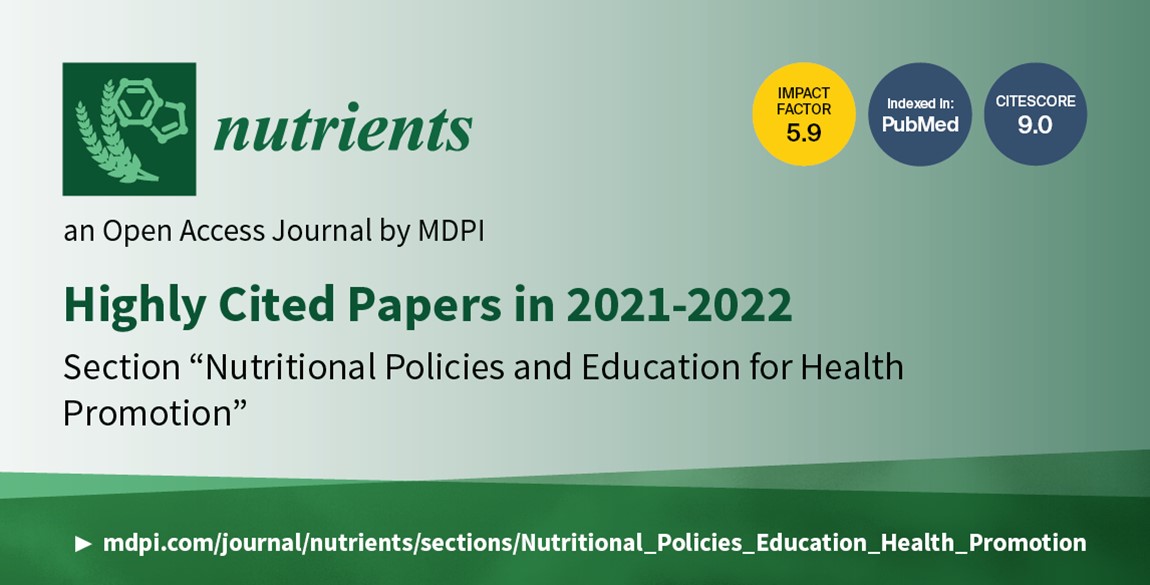
We welcome you to read highly cited papers published in 2021 and 2022 listed below:
1. “Food-Based Dietary Guidelines around the World: A Comparative Analysis to Update AESAN Scientific Committee Dietary Recommendations”
by Montaña Cámara, Rosa María Giner, Elena González-Fandos, Esther López-García, Jordi Mañes, María P. Portillo, Magdalena Rafecas, Laura Domínguez and José Alfredo Martínez
Nutrients 2021, 13(9), 3131; https://doi.org/10.3390/nu13093131
Available online: https://www.mdpi.com/2072-6643/13/9/3131
2. “Intensive Treatments in Adolescent Anorexia Nervosa”
by Beate Herpertz-Dahlmann
Nutrients 2021, 13(4), 1265; https://doi.org/10.3390/nu13041265
Available online: https://www.mdpi.com/2072-6643/13/4/1265
3. “Factors Related to Diet Quality: A Cross-Sectional Study of 1055 University Students”
by Enrique Ramón-Arbués, José-Manuel Granada-López, Blanca Martínez-Abadía, Emmanuel Echániz-Serrano, Isabel Antón-Solanas and Benjamin Adam Jerue
Nutrients 2021, 13(10), 3512; https://doi.org/10.3390/nu13103512
Available online: https://www.mdpi.com/2072-6643/13/10/3512
4. “Gamification for the Improvement of Diet, Nutritional Habits, and Body Composition in Children and Adolescents: A Systematic Review and Meta-Analysis”
by Nora Suleiman-Martos, Rubén A. García-Lara, María Begoña Martos-Cabrera, Luis Albendín-García, José Luis Romero-Béjar, Guillermo A. Cañadas-De la Fuente and José L. Gómez-Urquiza
Nutrients 2021, 13(7), 2478; https://doi.org/10.3390/nu13072478
Available online: https://www.mdpi.com/2072-6643/13/7/2478
5. “Nutritional Quality of Pasta Sold on the Italian Market: The Food Labelling of Italian Products (FLIP) Study”
by Marika Dello Russo, Carmela Spagnuolo, Stefania Moccia, Donato Angelino, Nicoletta Pellegrini, Daniela Martini, and on behalf of the Italian Society of Human Nutrition (SINU) Young Working Group
Nutrients 2021, 13(1), 171; https://doi.org/10.3390/nu13010171
Available online: https://www.mdpi.com/2072-6643/13/1/171
6. “Macro- and Micronutrient Intake in Children with Avoidant/Restrictive Food Intake Disorder”
by Ricarda Schmidt, Andreas Hiemisch, Wieland Kiess, Kai von Klitzing, Franziska Schlensog-Schuster and Anja Hilbert
Nutrients 2021, 13(2), 400; https://doi.org/10.3390/nu13020400
Available online: https://www.mdpi.com/2072-6643/13/2/400
7. “An Update Regarding the Bioactive Compound of Cereal By-Products: Health Benefits and Potential Applications”
by Anca Corina Fărcaș, Sonia Ancuța Socaci, Silvia Amalia Nemeș, Oana Lelia Pop, Teodora Emilia Coldea, Melinda Fogarasi and Elena Suzana Biriș-Dorhoi
Nutrients 2022, 14(17), 3470; https://doi.org/10.3390/nu14173470
Available online: https://www.mdpi.com/2072-6643/14/17/3470
8. “Does Examining the Childhood Food Experiences Help to Better Understand Food Choices in Adulthood?”
by Aleksandra Małachowska and Marzena Jeżewska-Zychowicz
Nutrients 2021, 13(3), 983; https://doi.org/10.3390/nu13030983
Available online: https://www.mdpi.com/2072-6643/13/3/983
9. “Physical Education and the Adoption of Habits Related to the Mediterranean Diet”
by María-Jesús Lirola, Rubén Trigueros,Jose M. Aguilar-Parra, Isabel Mercader, Juan M. Fernandez Campoy and Mª del Pilar Díaz-López
Nutrients 2021, 13(2), 567; https://doi.org/10.3390/nu13020567
Available online: https://www.mdpi.com/2072-6643/13/2/567
10. “Education Interventions to Improve Knowledge, Beliefs, Intentions and Practices with Respect to Dietary Supplements and Doping Substances: A Narrative Review”
by Jana Daher, Dalia El Khoury and John J. M. Dwyer
Nutrients 2021, 13(11), 3935; https://doi.org/10.3390/nu13113935
Available online: https://www.mdpi.com/2072-6643/13/11/3935
11 November 2023
Nutrients | Highly Cited Papers in 2021–2022 in the Section “Nutrition in Women”
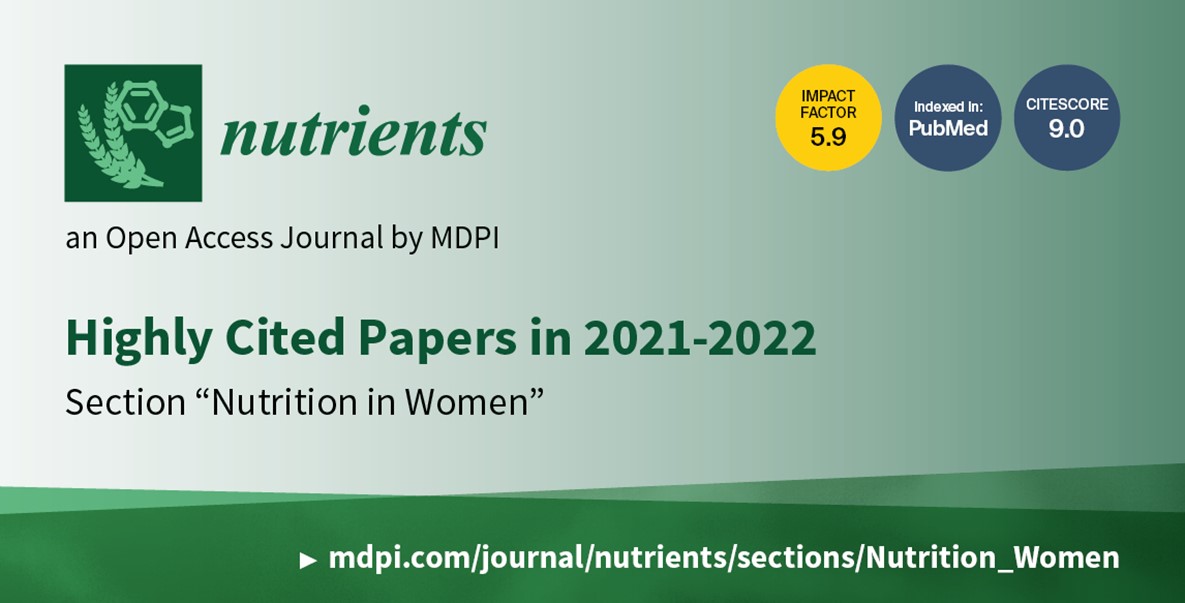
We welcome you to read highly cited papers published in 2021 and 2022 listed below:
1. “Botanicals in Postmenopausal Osteoporosis”
by Wojciech Słupski, Paulina Jawień and Beata Nowak
Nutrients 2021, 13(5), 1609; https://doi.org/10.3390/nu13051609
Available online: https://www.mdpi.com/2072-6643/13/5/1609
2. “Maternal Obesity and Risk of Low Birth Weight, Fetal Growth Restriction, and Macrosomia: Multiple Analyses”
by Małgorzata Lewandowska
Nutrients 2021, 13(4), 1213; https://doi.org/10.3390/nu13041213
Available online: https://www.mdpi.com/2072-6643/13/4/1213
3. “Anemia among Women of Reproductive Age: An Overview of Global Burden, Trends, Determinants, and Drivers of Progress in Low- and Middle-Income Countries”
by Aatekah Owais, Catherine Merritt, Christopher Lee and Zulfiqar A. Bhutta
Nutrients 2021, 13(8), 2745; https://doi.org/10.3390/nu13082745
Available online: https://www.mdpi.com/2072-6643/13/8/2745
4. “Diet and Nutrition in Gynecological Disorders: A Focus on Clinical Studies”
by Sadia Afrin, Abdelrahman AlAshqar, Malak El Sabeh, Mariko Miyashita-Ishiwata, Lauren Reschke, Joshua T. Brennan, Amanda Fader and Mostafa A. Borahay
Nutrients 2021, 13(6), 1747; https://doi.org/10.3390/nu13061747
Available online: https://www.mdpi.com/2072-6643/13/6/1747
5. “Faecal Microbiota Composition Varies between Patients with Breast Cancer and Healthy Women: A Comparative Case-Control Study”
by Christine Bobin-Dubigeon, Huyen Trang Luu, Sébastien Leuillet, Sidonie N. Lavergne, Thomas Carton, Françoise Le Vacon, Catherine Michel, Hassane Nazih and Jean-Marie Bard
Nutrients 2021, 13(8), 2705; https://doi.org/10.3390/nu13082705
Available online: https://www.mdpi.com/2072-6643/13/8/2705
6. “Genistein: Dual Role in Women’s Health”
by Linda Yu, Eddy Rios, Lysandra Castro, Jingli Liu, Yitang Yan and Darlene Dixon
Nutrients 2021, 13(9), 3048; https://doi.org/10.3390/nu13093048
Available online: https://www.mdpi.com/2072-6643/13/9/3048
7. “Dietary Patterns of Breastfeeding Mothers and Human Milk Composition: Data from the Italian MEDIDIET Study”
by Francesca Bravi, Matteo Di Maso, Simone R. B. M. Eussen, Carlo Agostoni, Guglielmo Salvatori, Claudio Profeti, Paola Tonetto, Pasqua Anna Quitadamo, Iwona Kazmierska, Elisabetta Vacca et al.
Nutrients 2021, 13(5), 1722; https://doi.org/10.3390/nu13051722
Available online: https://www.mdpi.com/2072-6643/13/5/1722
8. “Polyphenols as a Diet Therapy Concept for Endometriosis—Current Opinion and Future Perspectives”
by Agata Gołąbek, Katarzyna Kowalska and Anna Olejnik
Nutrients 2021, 13(4), 1347; https://doi.org/10.3390/nu13041347
Available online: https://www.mdpi.com/2072-6643/13/4/1347
9. “Prenatal Folate and Choline Levels and Brain and Cognitive Development in Children: A Critical Narrative Review”
by Nathalie Irvine, Gillian England-Mason, Catherine J. Field, Deborah Dewey and Fariba Aghajafari
Nutrients 2022, 14(2), 364; https://doi.org/10.3390/nu14020364
Available online: https://www.mdpi.com/2072-6643/14/2/364
10. “Association of Dietary Total Antioxidant Capacity with Bone Mass and Osteoporosis Risk in Korean Women: Analysis of the Korea National Health and Nutrition Examination Survey 2008–2011”
by Donghyun Kim Anna Han and Yongsoon Park
Nutrients 2021, 13(4), 1149; https://doi.org/10.3390/nu13041149
Available online: https://www.mdpi.com/2072-6643/13/4/1149
11 November 2023
Nutrients | Highly Cited Papers in 2021–2022 in the Section “Phytochemicals and Human Health”
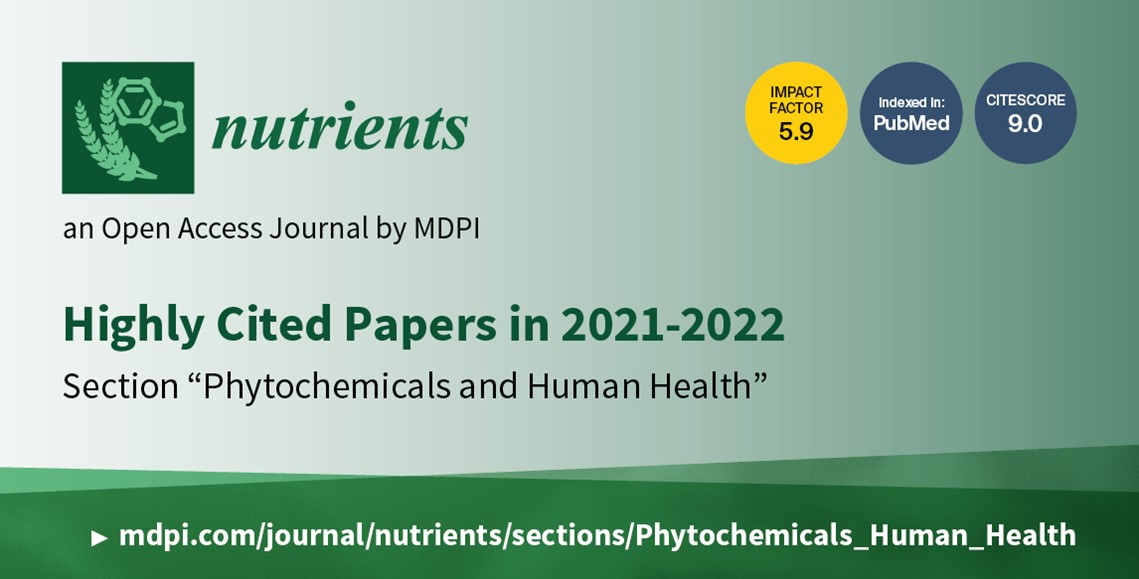
We welcome you to read highly cited papers published in 2021 and 2022 listed below:
1. “Polyphenols and Human Health: The Role of Bioavailability”
by Chiara Di Lorenzo, Francesca Colombo, Simone Biella, Creina Stockley and Patrizia Restani
Nutrients 2021, 13(1), 273; https://doi.org/10.3390/nu13010273
Available online: https://www.mdpi.com/2072-6643/13/1/273
2. “Polyphenols—Gut Microbiota Interrelationship: A Transition to a New Generation of Prebiotics”
by Diana Plamada and Dan Cristian Vodnar
Nutrients 2022, 14(1), 137; https://doi.org/10.3390/nu14010137
Available online: https://www.mdpi.com/2072-6643/14/1/137
3. “Curcumin, Quercetin, Catechins and Metabolic Diseases: The Role of Gut Microbiota”
by Umair Shabbir, Momna Rubab, Eric Banan-Mwine Daliri, Ramachandran Chelliah, Ahsan Javed and Deog-Hwan Oh
Nutrients 2021, 13(1), 206; https://doi.org/10.3390/nu13010206
Available online: https://www.mdpi.com/2072-6643/13/1/206
4. “Bioactive Compounds for Skin Health: A Review”
by Monika Michalak, Monika Pierzak, Beata Kręcisz and Edyta Suliga
Nutrients 2021, 13(1), 203; https://doi.org/10.3390/nu13010203
Available online: https://www.mdpi.com/2072-6643/13/1/203
5. “Health Benefits of Plant-Based Nutrition: Focus on Beans in Cardiometabolic Diseases”
by Amy P.Mullins and Bahram H. Arjmandi
Nutrients 2021, 13(2), 519; https://doi.org/10.3390/nu13020519
Available online: https://www.mdpi.com/2072-6643/13/2/519
6. “Oleanolic Acid: Extraction, Characterization and Biological Activity”
by José M. Castellano, Sara Ramos-Romero and Javier S. Perona
Nutrients 2022, 14(3), 623; https://doi.org/10.3390/nu14030623
Available online: https://www.mdpi.com/2072-6643/14/3/623
7. “Anti-Inflammatory and Immunomodulatory Properties of Fermented Plant Foods”
by Roghayeh Shahbazi, Farzaneh Sharifzad, Rana Bagheri, Nawal Alsadi, Hamed Yasavoli-Sharahi and Chantal Matar
Nutrients 2021, 13(5), 1516; https://doi.org/10.3390/nu13051516
Available online: https://www.mdpi.com/2072-6643/13/5/1516
8. “The Effect of Dietary Polyphenols on Vascular Health and Hypertension: Current Evidence and Mechanisms of Action”
by Giuseppe Grosso, Justyna Godos, Walter Currenti, Agnieszka Micek, Luca Falzone, Massimo Libra, Francesca Giampieri, Tamara Y. Forbes-Hernández, José L. Quiles, Maurizio Battino et al.
Nutrients 2022, 14(3), 545; https://doi.org/10.3390/nu14030545
Available online: https://www.mdpi.com/2072-6643/14/3/545
9. “Chrysin: Perspectives on Contemporary Status and Future Possibilities as Pro-Health Agent”
by Monika Stompor-Gorący, Agata Bajek-Bil and Maciej Machaczka
Nutrients 2021, 13(6), 2038; https://doi.org/10.3390/nu13062038
Available online: https://www.mdpi.com/2072-6643/13/6/2038
10. “Anticancer Activity of Propolis and Its Compounds”
by Ewa Forma and Magdalena Bryś
Nutrients 2021, 13(8), 2594; https://doi.org/10.3390/nu13082594
Available online: https://www.mdpi.com/2072-6643/13/8/2594
1 November 2023
MDPI Insights: The CEO’s Letter #5 - OA Week, UK, and Strategy

Welcome to the MDPI Insights: The CEO's Letter.
In these monthly letters, I will showcase two key aspects of our work at MDPI: our commitment to empowering researchers and our determination to facilitating open scientific exchange.
Opening Thoughts

Open Access Week 2023 – the Global Drive to Open Continues
As the world's largest open-access (OA) publisher, we believe that unrestricted access to research findings is the cornerstone of transparency, efficiency, and quality control across scientific disciplines. At MDPI, we provide free, immediate access to scientific papers, empowering scientists to examine, validate, replicate, and build upon existing results. This minimizes redundancy, optimizes resources, and fosters innovative approaches.
International OA Week, held from 23 to 29 October 2023, provided a unique opportunity to link the global movement toward open sharing and open science with the progress of policy changes at the local level. Our mission, during OA Week and all the year round, is to offer educational resources highlighting the benefits of open-access publishing. The MDPI Blog is a valuable resource for information on open access and open science.
Core principles of OA publishing
Accessibility, transparency, and collaboration are core principles of OA publishing. OA aims to break down barriers that have traditionally restricted research access, ensuring that knowledge is available to all, regardless of financial situation or institutional affiliations. Our commitment to diverse pathways for OA publishing worldwide includes discounts for researchers. You can learn more about how MDPI supports scientific communities here.
One of the key strengths of OA publishing is its ability to facilitate interdisciplinary research. By removing paywalls and promoting knowledge-sharing across disciplines, OA encourages collaboration and innovation. Researchers from various fields can access and build upon each others’ work, fostering a holistic approach to addressing complex global challenges.
OA holds the potential to democratize knowledge, advance science, and drive positive societal change.
Policy driving change
Governments, institutions, and funding agencies have recognized the transformative potential of OA and have implemented policies to promote it. These policies often require publicly funded research to be made openly accessible, accelerating the growth of OA repositories and journals. Check out our spotlights on OA policies in the US, EU and China.
OA publishing is continuously evolving, with community-driven models and technologies shaping its future. Initiatives such as “Plan S” and “cOAlition S” promote OA publishing from the perspective of national funders, requiring grantees to publish their research openly. A new policy announced by the US administration last year mandates that, with effect from January 2026, all US federally funded research should be freely and immediately available after publication.
Additionally, preprint servers such as MDPI's Preprints.org, which allow researchers to share their findings before formal peer review, have gained popularity, enhancing the speed at which new knowledge is disseminated. The rise of blockchain technology is also being explored to ensure transparency and authenticity in scholarly publishing.
For more than two decades, OA publishing has been revolutionizing academic publishing by promoting accessibility, transparency, and collaboration. Its support for interdisciplinary research, evolving policies, and innovative practices all contribute to its growing influence in the global research community. As OA continues to expand, it holds the potential to democratize knowledge, advance science, and drive positive societal change.
MDPI is proud to lead the transition to open access.
Read more:
Impactful Research

Spotlight on Smart Cities
Smart cities will serve as a cornerstone for future human development. Their implementation will help us tackle many of the significant challenges we are facing – climate change, ageing populations, waste management, public safety, travel, and so on. Recognising the importance of this multifaceted field, MDPI launched the inaugural issue of Smart Cities in 2018 to provide an advanced forum for research into smart technology and society. Here we take a look at how this journal has developed, and its impact in this exciting field.
As at 30 October, 2023, Smart Cities has published 421 papers and has an Impact Factor of 6.4. It also has a CiteScore of 8.5, and more than one quarter of its published papers – 124 – have been cited 10 times or more.
Highly cited papers in Smart Cities
Below are several highly cited papers recently published in Smart Cities. Citation metrics are current as at 31 October 2023.
1. “Introducing the “15-Minute City”: Sustainability, Resilience and Place Identity in Future Post-Pandemic Cities”
Authors: Carlos Moreno, Zaheer Allam, Didier Chabaud, Catherine Gall and Florent Pratlong
Smart Cities 2021, 4(1), 93-111; https://doi.org/10.3390/smartcities4010006
Citations: Crossref (338), Scopus (366), Web of Science (270), Google Scholar (710)
The paper discusses the socio-economic impacts of the COVID-19 on cities, including increasing inequalities and rising unemployment. It introduces the concept of the "15-Minute City," a form of "chrono-urbanism," as a response to the challenges posed by the pandemic.
2. “A Review on Electric Vehicles: Technologies and Challenges”
Authors: Julio A. Sanguesa, Vicente Torres-Sanz, Piedad Garrido, Francisco J. Martinez and Johann M. Marquez-Barja
Smart Cities 2021, 4(1), 372-404; https://doi.org/10.3390/smartcities4010022
Citations: Crossref (359), Scopus (363), Web of Science (268), Google Scholar (558)
This paper provides an overview of the progress in Electric Vehicles (EVs), focusing on battery technology, charging methods, and emerging research challenges. It also analyzes the global EV market and its future outlook.
3. “IoT in Smart Cities: A Survey of Technologies, Practices and Challenges”
Authors: Abbas Shah Syed, Daniel Sierra-Sosa, Anup Kumar and Adel Elmaghraby
Smart Cities 2021, 4(2), 429-475; https://doi.org/10.3390/smartcities4020024
Citations: Crossref (121), Scopus (151), Web of Science (91), Google Scholar (215)
This paper gives an overview of the Internet of Things (IoT) in the context of Smart Cities, discussing the fundamental components, technologies, architectures, networking technologies, and artificial algorithms that underpin IoT-based Smart City systems.
4. “Artificial Intelligence Techniques in Smart Grid: A Survey”
Authors: Olufemi A. Omitaomu and Haoran Niu
Smart Cities 2021, 4(2), 548-568; https://doi.org/10.3390/smartcities4020029
Citations: Crossref (76), Scopus (94), Web of Science (57), Google Scholar (120)
This survey paper reviews the utilization of artificial intelligence (AI) techniques in the context of the smart grid. It covers various applications of AI in load forecasting, power grid stability assessment, fault detection, and security issues in the smart grid and power systems.
5. “The Metaverse as a Virtual Form of Smart Cities: Opportunities and Challenges for Environmental, Economic, and Social Sustainability in Urban Futures”
Authors: Zaheer Allam, Ayyoob Sharifi, Simon Elias Bibri, David Sydney Jones and John Krogstie
Smart Cities 2022, 5(3), 771-801; https://doi.org/10.3390/smartcities5030040
Citations: Crossref (72), Scopus (75), Web of Science (43), Google Scholar (176)
This paper discusses the concept of the Metaverse, a virtual world introduced by Meta (formerly Facebook), and its potential impact on urban life. It explores how emerging technologies such as AI, Big Data, IoT, and Digital Twins could reshape urban design and services in the context of the Metaverse.
Testimonial
“It was indeed a great and pleasant experience with MDPI regarding our recent publication. The submission process was very straightforward and less time-consuming than the norm. The review process was very fast compared to many other open access journals, which is praiseworthy. The support from the Editorial Office during the revision process was highly useful as well. We look forward to publishing with MDPI in the future, and I will most definitely recommend MDPI to my colleagues and collaborators.” – Dr. Luís Rosa, University of Minho
Article in Smart Cities: Mobile Networks and Internet of Things Infrastructures to Characterize Smart Human Mobility
Inside MDPI

MDPI Manchester office, UK Visit

Allie Shi (Editorial Director, MDPI), Stefan Tochev (CEO, MDPI), Jamie Anderson (Manchester Office Manager, MDPI), Michael O’Sullivan (Senior Scientific Officer, MDPI), Hushneara Akhtar, and Becky Castellon (IOAP Team Lead, MDPI), dining out in Manchester, UK.
In October, I visited MDPI’s new office in Manchester. During the visit, I connected with our English Editing (EE) managers, Scientific Officer, members of the Editorial team, the Marketing team, and IOAP Team Lead.
Our Manchester office focuses primarily on EE services and provides local support for the UK market. Additionally, we regularly visit Editorial Board members and participate in local conferences.
I would like to thank Jamie Anderson, Manchester Office Manager, and her team, for their deep commitment to our Manchester staff and to MDPI’s impact on the UK market.
The UK by numbers
The UK is a hub for the world’s top universities, making it a key market for MDPI and the publishing world in general. It is home to two of the top-five-ranked universities globally, 11 in the top 100, and 15 in the top 200.
As a result, the UK plays a key role in MDPI’s global market. As at October 2023, it ranks as the seventh-largest contributor to the total number of papers published by MDPI. We have 3,500 Editorial Board members affiliated with UK institutions, including 34 serving as Editors-in-Chief (EiCs). Our commitment to collaboration with institutions is evident in the UK, where we have successfully established some 60 Institutional Open Access Program (IOAP) agreements with esteemed institutions, such as the University of Oxford, the University of Cambridge, Imperial College London, the University of Edinburgh, and more.
According to InCites Dataset + ESCI for the period 2018–2022, as at October 2023, nearly 65% of UK papers are now published as OA. Just over 10% of total OA publications are by UK authors. UK papers are known for their high quality, with an average of 11 citations per paper. Furthermore, 2.16% of UK papers are in the top 1% of cited papers, and 14.61% are in the top 10% of cited papers, showcasing their impact.
We are currently hiring EEs in various locations worldwide.
English Editing at MDPI
Our English Editing (EE) department consists of two main branches, Quality Control and Learning and Development, reflecting our priorities. We are continuously enhancing the quality of our English Editing services and have raised the relevant standards, which now extend to company-wide communications. English editors participate in international interviews, conduct English assessments, and provide colleagues with presentations on ways to improve their use of written and spoken English.
While expanding, the EE department has proactively refocused its efforts on the quality of our work and how the English Editing department can benefit the company more broadly. We currently have approximately 140 full-time English Editors based across five offices worldwide, supplemented by over 700 freelance English editors.
Our Manchester office serves as the hub for the EE Department, with EE Managers situated there, except for Kurtis Jackson, who serves as the Head of EE and is located in our Basel office. Manchester EEs play a critical role in establishing and developing EE teams in our other offices, overseeing management and recruitment. The EE department plays a vital role in MDPI’s operations, as it is the department that touches every published paper. If this work interests you, I encourage you to explore our available EE positions, whether you are seeking full-time or freelance opportunities.
Testimonials
“MDPI provides an excellent service compared to any other previously used services. It delivers fast and high-quality results but at an affordable price.” – Ardha Apriyanto, University of Potsdam
“In my role as a professor, I consider that MDPI Author Services offer an excellent quality in the editing of Western academic writing while maintaining the required standards of clarity, precision and rigor. Additionally, delivery times are fast compared to other available services.” – Jesus Insuasti, University of Nariño
Read more:
Coming Together for Science

STM and Frankfurt Book Fair
Attending STM
MDPI has been a proud sponsor of the STM Conference for several years. The STM Conference is a dynamic event featuring interactive sessions, expert panellists, idea-sharing, and ample networking opportunities. On 16 October, the event kicked off with arrival drinks, sponsored by MDPI, followed by a welcoming dinner, providing a great chance to connect and network with industry professionals. The following day was filled with speakers, sessions, and further opportunities to connect. STM exemplifies the collaborative spirit of the scientific community, with session topics including achieving open, visible, and impactful research at scale; maintaining research integrity in a rapidly changing world; and exploring the impact of ever-evolving technology in the scholarly community.
Meeting with Web of Science
On a personal note, one of the highlights of STM was a candid and productive conversation with Nandita Quaderi, Editor-in-Chief and SVP at Web of Science. During our discussion, we talked about MDPI, Web of Science, the IJERPH delisting, and ways of moving forward. This open conversation aimed at fostering better collaboration for the future.
“We discussed ways to improve our communication and collaboration.”
I appreciated our frank discussion and felt that Nandita wholeheartedly supports open access. She also expressed her appreciation for the monthly CEO Letter, which she sees as a way to add personality to the MDPI brand and provide insight into the great work we do at MDPI. While we highlighted the positives, we also discussed ways to improve our communication and collaboration moving forward. This meeting alone made the trip worthwhile, and I hope Nandita doesn’t mind my sharing that she found our chat to be “the most honest and constructive discussion” she’s had with someone from MDPI in recent years.
75th Frankfurt Book Fair

Jelena Milojevic (Book Editor, MDPI), Jovana Dubajic (Book Editor, MDPI), Evan Escamilla (Project Manager, MDPI), Laura Wagner (Head of Books, MDPI), and Jenny Knowles (Commissioning Editor, MDPI), at the Frankfurt Book Fair in Frankfurt am Main, Germany.
For the 75th time, the Frankfurter Buchmesse opened its doors in October to celebrate exciting stories and their authors. If you haven’t yet had the chance to visit the Frankfurt Book Fair, I highly recommend it. It’s the largest book fair in the world, attracting thousands of visitors from around the globe. This is the place to gain valuable industry insights from top-class publishing professionals, connect with publishers directly, and learn about the latest trends in publishing.
MDPI Books
Our Books team was also present at the Frankfurt Book Fair, networking and learning from various panels. Did you know that our MDPI Books department publishes OA Books?
The book publishing program includes monographs, book series, edited books and reprints of special issues and topical collections, among other book types.
If you have a book proposal you would like to discuss, please feel free to contact our Books team to understand the benefits and methods of publishing your next book with the OA model.
Closing Thoughts

MDPI Strategy Meeting
As the newly appointed CEO, this is my first year leading the MDPI Senior Management Strategy session. I saw it as an opportunity to explore what MDPI has the potential to become in the next five years. Guided by the vision of its founder and President, Dr. Shu-kun Lin, the company has accomplished remarkable feats over the past 27 years and currently holds the position as the world’s third-largest academic publisher, following Springer Nature and Elsevier.
Our primary objective is to build upon the milestones of the past decades and consolidate MDPI’s position as well-established publishing brand. The two-day meeting emphasized the importance of communicating MDPI’s values more actively via its brand and adopting a straightforward yet impactful approach to managing MDPI as a mature academic publisher.
“Our primary objective is to consolidate MDPI’s position as well-established publishing brand”
As the world’s number one open-access publisher, MDPI has long been a game-changer in the scholarly community, serving millions of authors. The challenge in being a trailblazer is the need to continuously improve and at the same time explore the next blue-ocean strategy, while also maintaining the smooth operation of the business. Our collection model, featuring guest-curated thematic topics in the form of Special Issues, has disrupted the industry. Other publishers closely study us and attempt to replicate our models. The future of this collection model is something we are actively addressing – while, of course, looking ahead to what comes next!
Chief Executive Officer
MDPI AG
30 October 2023
Nutrients | Top 10 Highly Cited Papers in 2022
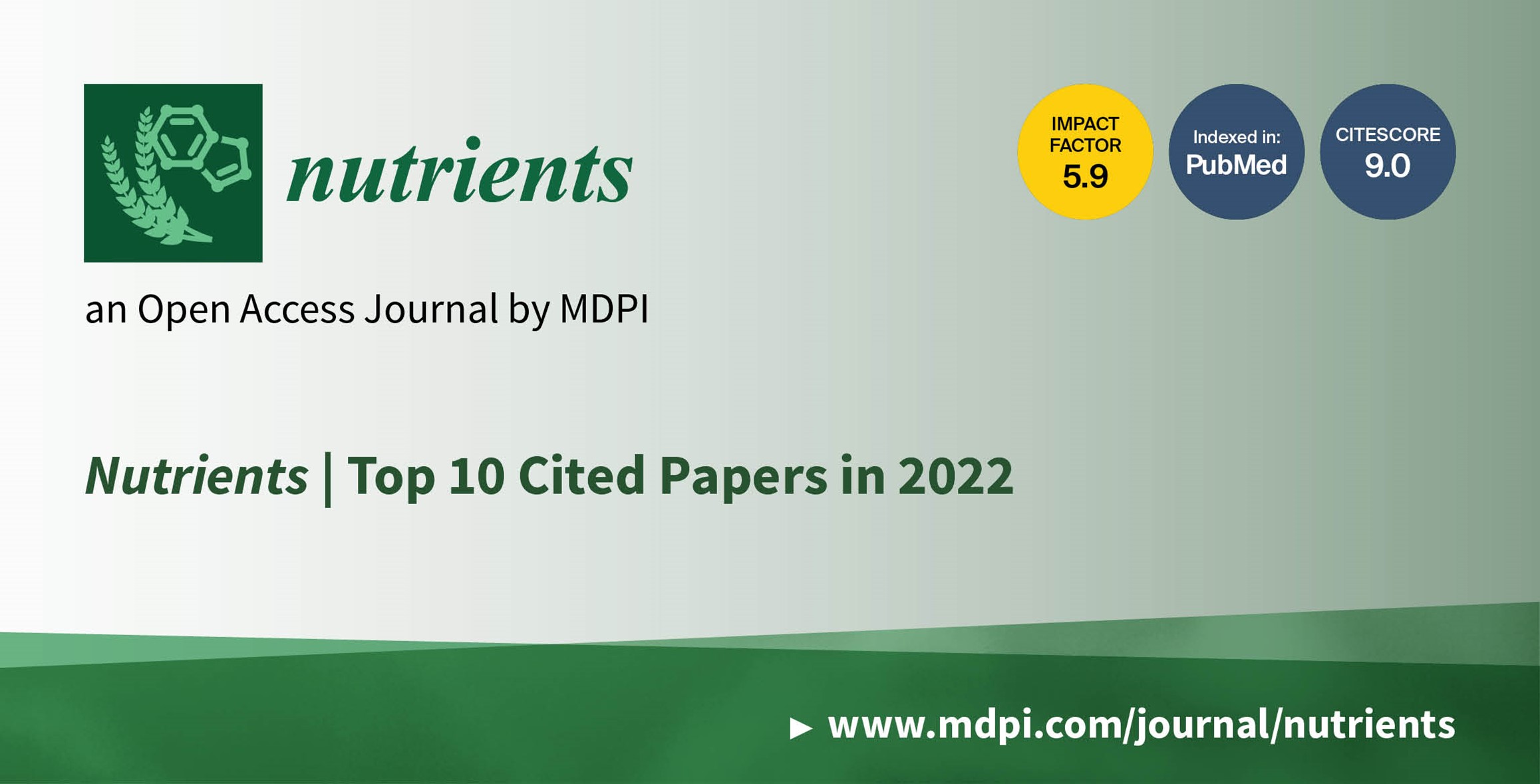
Nutrients (ISSN: 2072-6643) presents the top 10 highly cited papers published in 2022.
“Vitamin D and Cancer: An Historical Overview of the Epidemiology and Mechanisms”
by Alberto Muñoz and William B. Grant
Nutrients 2022, 14(7), 1448; https://doi.org/10.3390/nu14071448
Available online: https://www.mdpi.com/2072-6643/14/7/1448
“Oleanolic Acid: Extraction, Characterization and Biological Activity”
by José M. Castellano, Sara Ramos-Romero and Javier S. Perona
Nutrients 2022, 14(3), 623; https://doi.org/10.3390/nu14030623
Available online: https://www.mdpi.com/2072-6643/14/3/623
“The Effect of Dietary Polyphenols on Vascular Health and Hypertension: Current Evidence and Mechanisms of Action”
by Giuseppe Grosso, Justyna Godos, Walter Currenti, Agnieszka Micek, Luca Falzone, Massimo Libra, Francesca Giampieri, Tamara Y. Forbes-Hernández, José L. Quiles, Maurizio Battino et al.
Nutrients 2022, 14(3), 545; https://doi.org/10.3390/nu14030545
Available online: https://www.mdpi.com/2072-6643/14/3/545
“Clinical Practice in the Prevention, Diagnosis and Treatment of Vitamin D Deficiency: A Central and Eastern European Expert Consensus Statement”
by Pawel Pludowski, Istvan Takacs, Mihail Boyanov, Zhanna Belaya, Camelia C. Diaconu, Tatiana Mokhort, Nadiia Zherdova, Ingvars Rasa, Juraj Payer and Stefan Pilz
Nutrients 2022, 14(7), 1483; https://doi.org/10.3390/nu14071483
Available online: https://www.mdpi.com/2072-6643/14/7/1483
“Fermented Foods, Health and the Gut Microbiome”
by Natasha K. Leeuwendaal, Catherine Stanton, Paul W. O’Toole and Tom P. Beresford
Nutrients 2022, 14(7), 1527; https://doi.org/10.3390/nu14071527
Available online: https://www.mdpi.com/2072-6643/14/7/1527
“Time to Consider the “Exposome Hypothesis” in the Development of the Obesity Pandemic”
by Victoria Catalán, Iciar Avilés-Olmos, Amaia Rodríguez, Sara Becerril, José Antonio Fernández-Formoso, Dimitrios Kiortsis, Piero Portincasa, Javier Gómez-Ambrosi and Gema Frühbeck
Nutrients 2022, 14(8), 1597; https://doi.org/10.3390/nu14081597
Available online: https://www.mdpi.com/2072-6643/14/8/1597
“Lutein and Zeaxanthin and Their Roles in Age-Related Macular Degeneration—Neurodegenerative Disease”
by Małgorzata Mrowicka, Jerzy Mrowicki, Ewa Kucharska and Ireneusz Majsterek
Nutrients 2022, 14(4), 827; https://doi.org/10.3390/nu14040827
Available online: https://www.mdpi.com/2072-6643/14/4/827
“The Role of Minerals in the Optimal Functioning of the Immune System”
by Christopher Weyh, Karsten Krüger, Peter Peeling and Lindy Castell
Nutrients 2022, 14(3), 644; https://doi.org/10.3390/nu14030644
Available online: https://www.mdpi.com/2072-6643/14/3/644
“A Narrative Review of the Evidence for Variations in Serum 25-Hydroxyvitamin D Concentration Thresholds for Optimal Health”
by William B. Grant, Fatme Al Anouti, Barbara J. Boucher, Erdinç Dursun, Duygu Gezen-Ak, Edward B. Jude, Tatiana Karonova and Pawel Pludowski
Nutrients 2022, 14(3), 639; https://doi.org/10.3390/nu14030639
Available online: https://www.mdpi.com/2072-6643/14/3/639
“Anti-Inflammatory Nutrients and Obesity-Associated Metabolic-Inflammation: State of the Art and Future Direction”
by Giuseppe Grosso, Daniela Laudisio, Evelyn Frias-Toral, Luigi Barrea, Giovanna Muscogiuri, Silvia Savastano, and Annamaria Colao on behalf of the Obesity Programs of Nutrition, Education, Research and Assessment (OPERA) Group
Nutrients 2022, 14(6), 1137; https://doi.org/10.3390/nu14061137
Available online: https://www.mdpi.com/2072-6643/14/6/1137
30 October 2023
Nutrients | Top 10 Highly Cited Papers in 2021
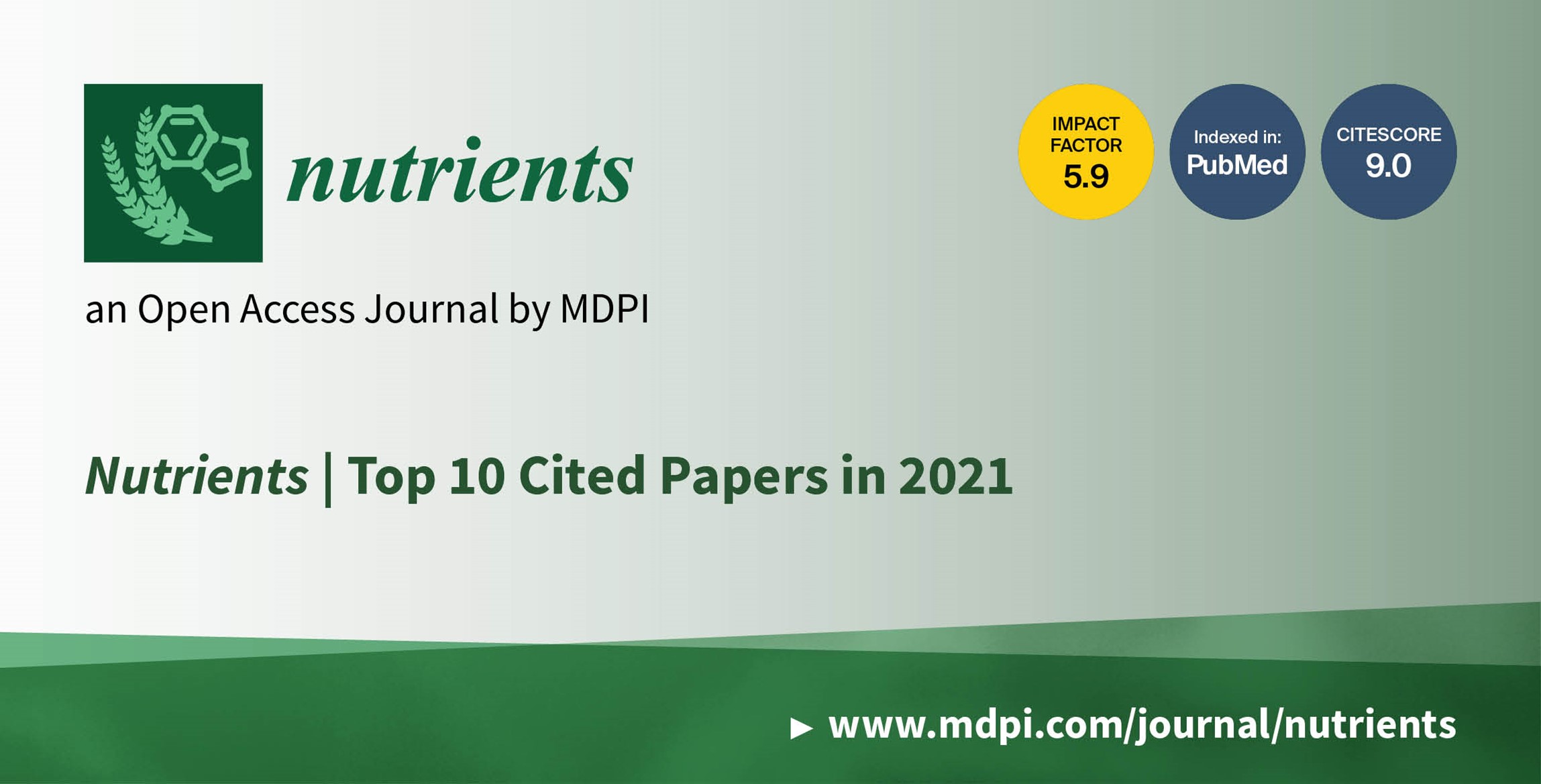
Nutrients (ISSN: 2072-6643) presents the top 10 highly cited papers published in 2021.
“Polyphenols and Human Health: The Role of Bioavailability”
by Chiara Di Lorenzo, Francesca Colombo, Simone Biella, Creina Stockley and Patrizia Restani
Nutrients 2021, 13(1), 273; https://doi.org/10.3390/nu13010273
Available online: https://www.mdpi.com/2072-6643/13/1/273
“Beneficial Outcomes of Omega-6 and Omega-3 Polyunsaturated Fatty Acids on Human Health: An Update for 2021”
by Ivana Djuricic and Philip C. Calder
Nutrients 2021, 13(7), 2421; https://doi.org/10.3390/nu13072421
Available online: https://www.mdpi.com/2072-6643/13/7/2421
“Malnutrition in Older Adults—Recent Advances and Remaining Challenges”
by Kristina Norman, Ulrike Haß and Matthias Pirlich
Nutrients 2021, 13(8), 2764; https://doi.org/10.3390/nu13082764
Available online: https://www.mdpi.com/2072-6643/13/8/2764
“Curcumin, Quercetin, Catechins and Metabolic Diseases: The Role of Gut Microbiota”
by Umair Shabbir, Momna Rubab, Eric Banan-Mwine Daliri, Ramachandran Chelliah, Ahsan Javed and Deog-Hwan Oh
Nutrients 2021, 13(1), 206; https://doi.org/10.3390/nu13010206
Available online: https://www.mdpi.com/2072-6643/13/1/206
“Nutritional Components in Western Diet Versus Mediterranean Diet at the Gut Microbiota–Immune System Interplay. Implications for Health and Disease”
by Cielo García-Montero, Oscar Fraile-Martínez, Ana M. Gómez-Lahoz, Leonel Pekarek, Alejandro J. Castellanos, Fernando Noguerales-Fraguas, Santiago Coca, Luis G. Guijarro, Natalio García-Honduvilla, Angel Asúnsolo et al.
Nutrients 2021, 13(2), 699; https://doi.org/10.3390/nu13020699
Available online: https://www.mdpi.com/2072-6643/13/2/699
“Effect of Diet and Dietary Components on the Composition of the Gut Microbiota”
by Ashley Beam, Elizabeth Clinger and Lei Hao
Nutrients 2021, 13(8), 2795; https://doi.org/10.3390/nu13082795
Available online: https://www.mdpi.com/2072-6643/13/8/2795
“Longitudinal Weight Gain and Related Risk Behaviors during the COVID-19 Pandemic in Adults in the US”
by Surabhi Bhutani, Michelle R. vanDellen and Jamie A. Cooper
Nutrients 2021, 13(2), 671; https://doi.org/10.3390/nu13020671
Available online: https://www.mdpi.com/2072-6643/13/2/671
“Assessment of Body Composition in Athletes: A Narrative Review of Available Methods with Special Reference to Quantitative and Qualitative Bioimpedance Analysis”
by Francesco Campa, Stefania Toselli, Massimiliano Mazzilli, Luís Alberto Gobbo and Giuseppe Coratella
Nutrients 2021, 13(5), 1620; https://doi.org/10.3390/nu13051620
Available online: https://www.mdpi.com/2072-6643/13/5/1620
“A Narrative Review on Sarcopenia in Type 2 Diabetes Mellitus: Prevalence and Associated Factors”
by Anna Izzo, Elena Massimino, Gabriele Riccardi and Giuseppe Della Pepa
Nutrients 2021, 13(1), 183; https://doi.org/10.3390/nu13010183
Available online: https://www.mdpi.com/2072-6643/13/1/183
“Lifestyle Changes and Determinants of Children’s and Adolescents’ Body Weight Increase during the First COVID-19 Lockdown in Greece: The COV-EAT Study”
by Odysseas Androutsos, Maria Perperidi, Christos Georgiou and Giorgos Chouliaras
Nutrients 2021, 13(3), 930; https://doi.org/10.3390/nu13030930
Available online: https://www.mdpi.com/2072-6643/13/3/930
27 October 2023
Nutrients | Top 10 Highly Cited Papers in 2021–2022 Written by Editorial Board Members

Nutrients (ISSN: 2072-6643) has selected the 2021 and 2022 top 10 highly cited papers written by Editorial Board Members. As we publish open access literature, you have free and unlimited access to the full texts. We welcome you to read these papers.
“Polyphenols and Human Health: The Role of Bioavailability”
by Chiara Di Lorenzo, Francesca Colombo, Simone Biella, Creina Stockley and Patrizia Restani
Nutrients 2021, 13(1), 273; https://doi.org/10.3390/nu13010273
Available online: https://www.mdpi.com/2072-6643/13/1/273
Cited by 266 | Viewed by 13879
“Vitamin C—Sources, Physiological Role, Kinetics, Deficiency, Use, Toxicity, and Determination”
by Martin Doseděl, Eduard Jirkovský, Kateřina Macáková, Lenka Kujovská Krčmová, Lenka Javorská, Jana Pourová, Laura Mercolini, Fernando Remião, Lucie Nováková, Přemysl Mladěnka et al.
Nutrients 2021, 13(2), 615; https://doi.org/10.3390/nu13020615
Available online: https://www.mdpi.com/2072-6643/13/2/615
Cited by 87 | Viewed by 16967
“Magnesium in Aging, Health and Diseases”
by Mario Barbagallo, Nicola Veronese and Ligia J. Dominguez
Nutrients 2021, 13(2), 463; https://doi.org/10.3390/nu13020463
Available online: https://www.mdpi.com/2072-6643/13/2/463
Cited by 83 | Viewed by 21150
“Ultra-Processed Foods and Nutritional Dietary Profile: A Meta-Analysis of Nationally Representative Samples”
by Daniela Martini, Justyna Godos, Marialaura Bonaccio, Paola Vitaglione and Giuseppe Grosso
Nutrients 2021, 13(10), 3390; https://doi.org/10.3390/nu13103390
Available online: https://www.mdpi.com/2072-6643/13/10/3390
Cited by 76 | Viewed by 8274
“Calcifediol Treatment and Hospital Mortality Due to COVID-19: A Cohort Study”
by Juan F. Alcala-Diaz, Laura Limia-Perez, Ricardo Gomez-Huelgas, Maria D. Martin-Escalante, Begoña Cortes-Rodriguez, Jose L. Zambrana-Garcia, Marta Entrenas-Castillo, Ana I. Perez-Caballero, Maria D. López-Carmona, Javier Garcia-Alegria et al.
Nutrients 2021, 13(6), 1760; https://doi.org/10.3390/nu13061760
Available online: https://www.mdpi.com/2072-6643/13/6/1760
Cited by 56 | Viewed by 24541
“Vitamin D and Cancer: An Historical Overview of the Epidemiology and Mechanisms”
by Alberto Muñoz and William B. Grant
Nutrients 2022, 14(7), 1448; https://doi.org/10.3390/nu14071448
Available online: https://www.mdpi.com/2072-6643/14/7/1448
Cited by 49 | Viewed by 7514
“Oleanolic Acid: Extraction, Characterization and Biological Activity”
by José M. Castellano, Sara Ramos-Romero and Javier S. Perona
Nutrients 2022, 14(3), 623; https://doi.org/10.3390/nu14030623
Available online: https://www.mdpi.com/2072-6643/14/3/623
Cited by 47 | Viewed by 7408
“The Effect of Dietary Polyphenols on Vascular Health and Hypertension: Current Evidence and Mechanisms of Action”
by Giuseppe Grosso, Justyna Godos, Walter Currenti, Agnieszka Micek, Luca Falzone, Massimo Libra, Francesca Giampieri, Tamara Y. Forbes-Hernández, José L. Quiles, Maurizio Battino et al.
Nutrients 2022, 14(3), 545; https://doi.org/10.3390/nu14030545
Available online: https://www.mdpi.com/2072-6643/14/3/545
Cited by 46 | Viewed by 6112
“Time to Consider the “Exposome Hypothesis” in the Development of the Obesity Pandemic”
by Victoria Catalán, Iciar Avilés-Olmos, Amaia Rodríguez, Sara Becerril, José Antonio Fernández-Formoso, Dimitrios Kiortsis, Piero Portincasa, Javier Gómez-Ambrosi and Gema Frühbeck
Nutrients 2022, 14(8), 1597. https://doi.org/10.3390/nu14081597
Available online: https://www.mdpi.com/2072-6643/14/8/1597
Cited by 40 | Viewed by 4869
by Shaun Eslick, Evan J. Williams, Bronwyn S. Berthon, Timothy Wright, Constantine Karihaloo, Mark Gately and Lisa G. Wood
Nutrients 2022, 14(4), 765. https://doi.org/10.3390/nu14040765
Available online: https://www.mdpi.com/2072-6643/14/4/765
Cited by 21 | Viewed by 2362
19 October 2023
Open Access Week 2023 – the Global Drive to Open Continues

MDPI has been a strong proponent of the open access publishing model right from the beginning. As one of the pioneering fully open access publishers, we firmly believe that unrestricted access to research findings forms the foundation for better transparency, efficiency, and quality control across all scientific disciplines.
In December 2022, we reached a significant milestone by surpassing one million articles published. That is one million articles freely available to all, to circulate and build upon!
Offering free and immediate access to scientific papers empowers scientists to examine, validate, replicate, and expand upon existing results. This not only helps prevent redundancy and optimizes how resources are used but also paves the way for innovative new approaches.
The International Open Access Week takes place from 23 to 29 October 2023, providing a unique opportunity to connect the global movement towards open sharing and open science with the progress of policy transformations at the local level.
Our goal, during Open Access Week as well as throughout the year, is to offer resources for educating people about the benefits of open access publishing. The MDPI Blog offers a wealth of information around open access and open science.
Promoting the values of accessibility, transparency, and collaboration
Open access publishing embodies the fundamental values of democratizing knowledge and fostering global accessibility. It aims to break down barriers that have traditionally limited access to scholarly work, ensuring that knowledge is available to all, regardless of their financial or institutional affiliations.
Discounts are part of our commitment to ensuring there are diverse pathways to Open Access publishing for researchers worldwide. MDPI supports scientific communities in several different ways.
One of the key strengths of open access publishing lies in its ability to facilitate interdisciplinary research. By removing paywalls and promoting the sharing of knowledge across disciplines, OA encourages collaboration and innovation. Researchers from diverse fields can access and build upon each other's work, fostering a holistic approach to addressing complex global challenges.
Funders' policies are getting aligned with open science
Governments, institutions, and funding agencies have recognized the transformative potential of open access and have implemented policies to promote it. These policies often mandate that publicly funded research should be made openly accessible. Such initiatives have accelerated the growth of open access repositories and journals, reinforcing the commitment to open access principles. Check our spotlights on OA policies in the US, EU and China.
Open access publishing is continually evolving, with innovative and community-driven models and technologies shaping its future. Initiatives like "Plan S" and "cOAlition S" promote the adoption of OA publishing from the national funders’ perspective by requiring grantees to publish their research openly. A new policy announced by the US administration last year requires that, as of January 2026, all US federally funded research be made freely and immediately available after publication.
Additionally, preprint servers such as MDPI's Preprints.org, which allow researchers to share their findings before formal peer review, have gained popularity, enhancing the speed at which new knowledge is disseminated. The rise of blockchain technology is also being explored to ensure transparency and authenticity in scholarly publishing.
For more than twenty years, open access scholarly publishing has been revolutionizing academia by promoting the values of accessibility, transparency, and collaboration. Its support for interdisciplinary research, evolving policies, and innovative practices all contribute to its growing influence in the global research community. As open access continues to expand, it holds the potential to democratize knowledge, advance science, and drive positive societal change.
MDPI is proud to be a leader in the transition to open access.
13 October 2023
Meet Us at the 14th European Nutrition Conference, 14–17 November 2023, Belgrade, Serbia
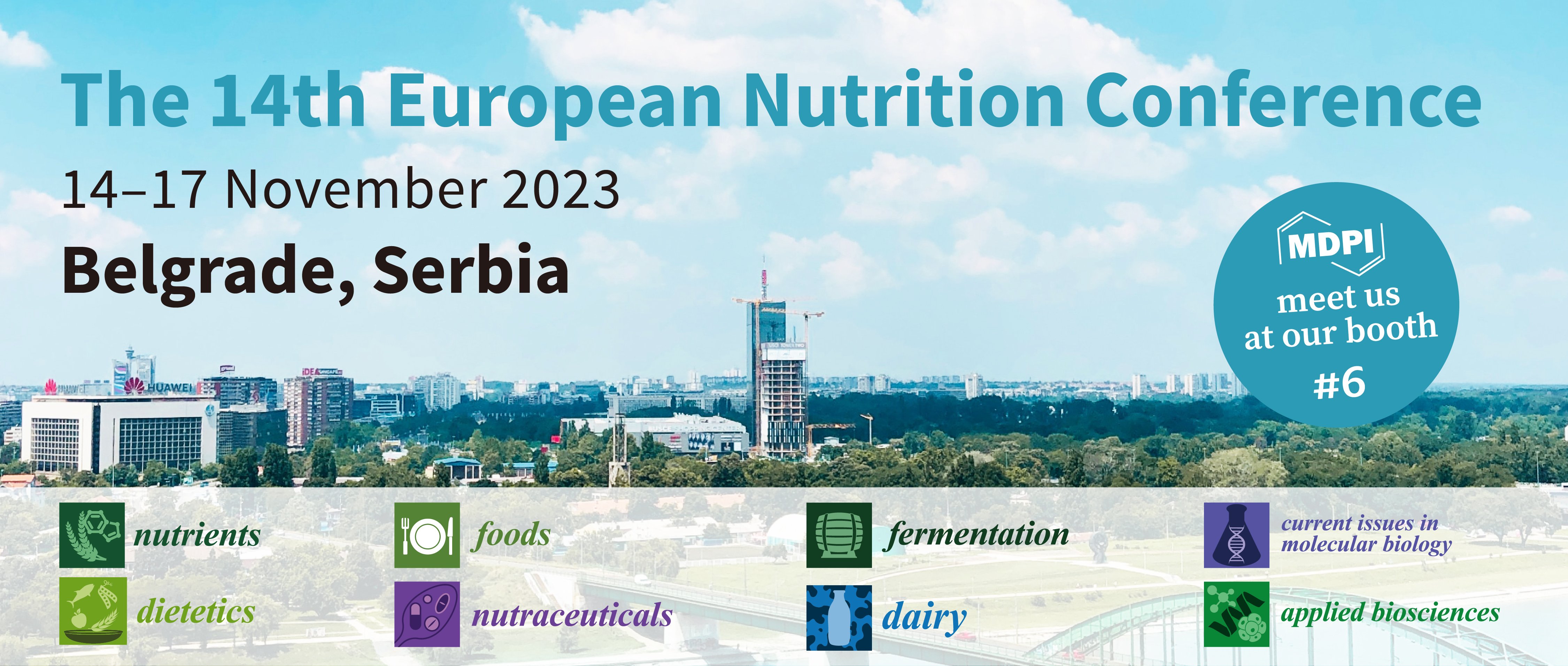
The 14th European Nutrition Conference will be held from 14 to 17 November 2023 in Belgrade, Serbia. The conference is organized by the Federation of European Nutrition Societies (FENS).
Topics include the following:
- Nutrition across the life course;
- Nutrition, metabolism and chronic diseases;
- Dietary studies, guides and recommendations;
- New technologies in nutrition research;
- Personalized nutrition;
- Nutrition and the environment, sustainability and diversity;
- Food science;
- Dietary bioactives;
- Nutrition education, consumers and practitioners;
- Cultural, societal and behavioral aspects of diet and nutrition.
The following MDPI journals will be represented:
- Nutrients;
- Foods;
- Fermentation;
- CIMB;
- Dietetics;
- Nutraceuticals;
- Dairy;
- Applied Biosciences.
If you are attending this conference, please feel free to start an online conversation with us. Our delegates look forward to meeting you in person at the booth and answering any questions that you may have. For more information about the conference, please visit the following link: https://fens2023.org/.
13 October 2023
Meet Us at the 34th Annual Meeting of the Japanese Society of Clinical Sports Medicine, 11–12 November 2023, Tokyo, Japan
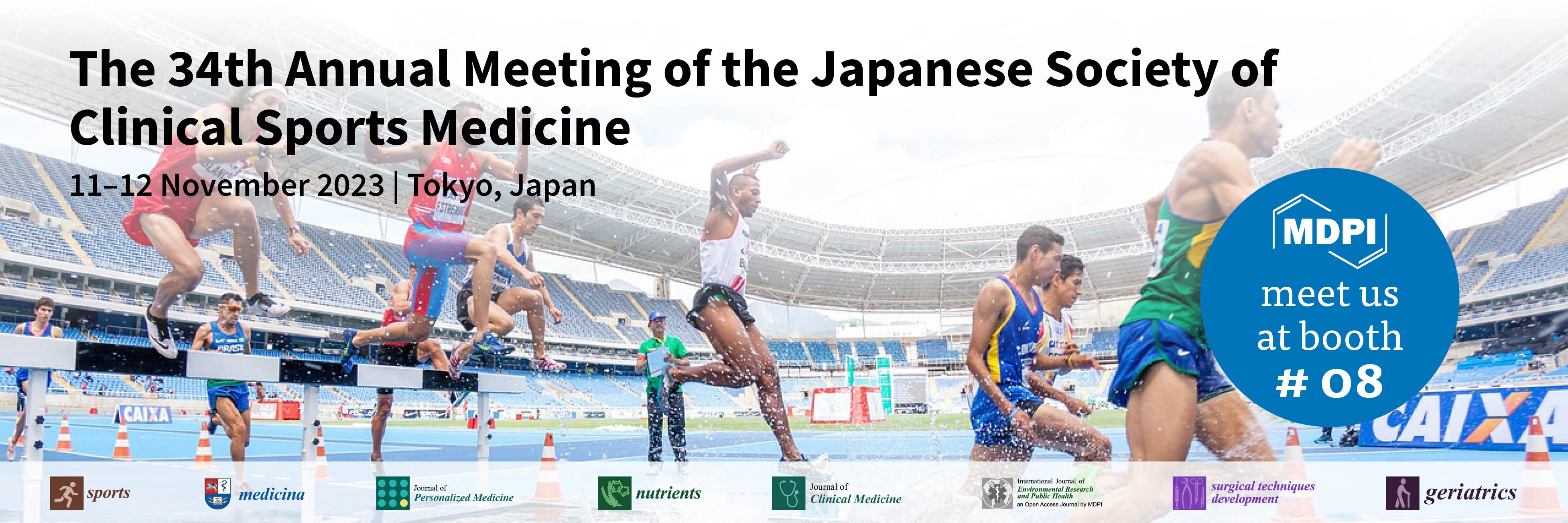
MDPI will be attending the 34th Annual Meeting of the Japanese Society of Clinical Sports Medicine, which will be held from 11 to 12 November in Tokyo, Japan.
The theme of this academic conference is "Cooperation and Evolution". As many academic conferences have been held online due to the coronavirus pandemic, we are now realizing that one of the most important aspects of academic conferences is the face-to-face exchange of information inside and outside the academic venue. This academic conference will aim to promote the future progress of sports medicine by disseminating the research results of each person who has made progress during the coronavirus pandemic and by bringing together many participants for full discussions.
The following MDPI journals will be represented:
- Sports;
- Medicina;
- JPM;
- Nutrients;
- JCM;
- IJERPH;
- STD;
- Geriatrics.
If you are planning to attend this conference, please feel free to stop by our booth and chat with us. Our delegates look forward to meeting you in person and answering any questions that you may have. For more information about the conference, please visit the following website: https://www.34rinspo.jp/index.html.
11 October 2023
Nutrients | Invitation to Read the Updated Editor’s Choice Articles Published in 2021–2023
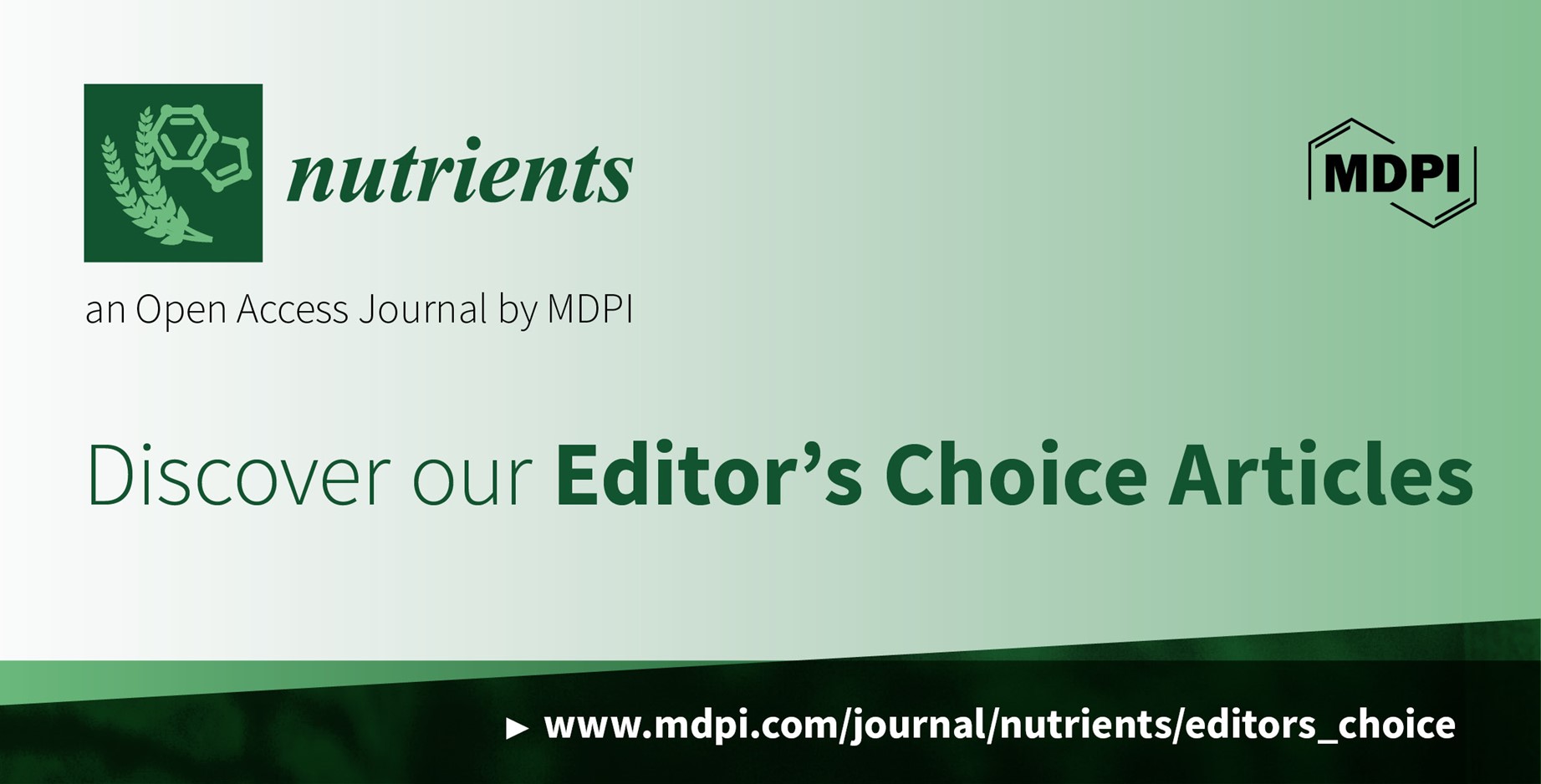
Editor’s Choice Articles are selected based on suggestions from Nutrients’ academic editors around the world. The editors select a small number of recently published articles that they consider to be of particular interest to our readers or important in their respective fields of research. We are delighted to present the 2021–2023 Editor’s Choice Articles, a curated list of high-quality articles from Nutrients (ISSN: 2072-6643). The full list of Editor’s Choice Articles can be seen at the following link: https://www.mdpi.com/journal/nutrients/editors_choice.
“Plant-Based Meat Alternatives: Technological, Nutritional, Environmental, Market, and Social Challenges and Opportunities”
by Giulia Andreani, Giovanni Sogari, Alessandra Marti, Federico Froldi, Hans Dagevos and Daniela Martini
Nutrients 2023, 15(2), 452; https://doi.org/10.3390/nu15020452
Available online: https://www.mdpi.com/2072-6643/15/2/452
Cited by 17 | Viewed by 12021
“New Advances in Metabolic Syndrome, from Prevention to Treatment: The Role of Diet and Food”
by Donatella Ambroselli, Fabrizio Masciulli, Enrico Romano, Giuseppina Catanzaro, Zein Mersini Besharat, Maria Chiara Massari, Elisabetta Ferretti, Silvia Migliaccio, Luana Izzo, Alberto Ritieni et al.
Nutrients 2023, 15(3), 640; https://doi.org/10.3390/nu15030640
Available online: https://www.mdpi.com/2072-6643/15/3/640
Cited by 12 | Viewed by 4726
“The Effect of Dietary Polyphenols on Vascular Health and Hypertension: Current Evidence and Mechanisms of Action”
by Giuseppe Grosso, Justyna Godos, Walter Currenti, Agnieszka Micek, Luca Falzone, Massimo Libra, Francesca Giampieri, Tamara Y. Forbes-Hernández, José L. Quiles, Maurizio Battino et al.
Nutrients 2022, 14(3), 545; https://doi.org/10.3390/nu14030545
Available online: https://www.mdpi.com/2072-6643/14/3/545
Cited by 48 | Viewed by 6089
“Clinical Practice in the Prevention, Diagnosis and Treatment of Vitamin D Deficiency: A Central and Eastern European Expert Consensus Statement”
by Pawel Pludowski, Istvan Takacs, Mihail Boyanov, Zhanna Belaya, Camelia C. Diaconu, Tatiana Mokhort, Nadiia Zherdova, Ingvars Rasa, Juraj Payer and Stefan Pilz
Nutrients 2022, 14(7), 1483; https://doi.org/10.3390/nu14071483
Available online: https://www.mdpi.com/2072-6643/14/7/1483
Cited by 47 | Viewed by 8387
“Time to Consider the “Exposome Hypothesis” in the Development of the Obesity Pandemic”
by Victoria Catalán, Iciar Avilés-Olmos, Amaia Rodríguez, Sara Becerril, José Antonio Fernández-Formoso, Dimitrios Kiortsis, Piero Portincasa, Javier Gómez-Ambrosi and Gema Frühbeck
Nutrients 2022, 14(8), 1597; https://doi.org/10.3390/nu14081597
Available online: https://www.mdpi.com/2072-6643/14/8/1597
Cited by 43 | Viewed by 4855
“Lutein and Zeaxanthin and Their Roles in Age-Related Macular Degeneration—Neurodegenerative Disease”
by Małgorzata Mrowicka, Jerzy Mrowicki, Ewa Kucharska and Ireneusz Majsterek
Nutrients 2022, 14(4), 827; https://doi.org/10.3390/nu14040827
Available online: https://www.mdpi.com/2072-6643/14/4/827
Cited by 38 | Viewed by 10674
“Role of Probiotics in the Management of COVID-19: A Computational Perspective”
by Quang Vo Nguyen, Li Chuin Chong, Yan-Yan Hor, Lee-Ching Lew, Irfan A. Rather and Sy-Bing Choi
Nutrients 2022, 14(2), 274; https://doi.org/10.3390/nu14020274
Available online: https://www.mdpi.com/2072-6643/14/2/274
Cited by 33 | Viewed by 7965
“Nutritional Composition and Bioactive Components in Quinoa (Chenopodium quinoa Willd.) Greens: A Review”
by Safiullah Pathan and Rafat A. Siddiqui
Nutrients 2022, 14(3), 558; https://doi.org/10.3390/nu14030558
Available online: https://www.mdpi.com/2072-6643/14/3/558
Cited by 38 | Viewed by 6849
“The Role of Minerals in the Optimal Functioning of the Immune System”
by Christopher Weyh, Karsten Krüger, Peter Peeling and Lindy Castell
Nutrients 2022, 14(3), 644; https://doi.org/10.3390/nu14030644
Available online: https://www.mdpi.com/2072-6643/14/3/644
Cited by 39 | Viewed by 8616
“Anti-Inflammatory Nutrients and Obesity-Associated Metabolic Inflammation: State of the Art and Future Direction”
by Giuseppe Grosso, Daniela Laudisio, Evelyn Frias-Toral, Luigi Barrea, Giovanna Muscogiuri, Silvia Savastano and Annamaria Colao
Nutrients 2022, 14(6), 1137; https://doi.org/10.3390/nu14061137
Available online: https://www.mdpi.com/2072-6643/14/6/1137
Cited by 33 | Viewed by 8634
“Emerging Roles of Vitamin D-Induced Antimicrobial Peptides in Antiviral Innate Immunity
by John H. White”
Nutrients 2022, 14(2), 284; https://doi.org/10.3390/nu14020284
Available online: https://www.mdpi.com/2072-6643/14/2/284
Cited by 31 | Viewed by 6548
“Vitamin D and Its Target Genes”
by Carsten Carlberg
Nutrients 2022, 14(7), 1354; https://doi.org/10.3390/nu14071354
Available online: https://www.mdpi.com/2072-6643/14/7/1354
Cited by 32 | Viewed by 3939
“Polyphenols and Human Health: The Role of Bioavailability”
by Chiara Di Lorenzo, Francesca Colombo, Simone Biella, Creina Stockley and Patrizia Restani
Nutrients 2021, 13(1), 273; https://doi.org/10.3390/nu13010273
Available online: https://www.mdpi.com/2072-6643/13/1/273
Cited by 279 | Viewed by 13876
“Malnutrition in Older Adults—Recent Advances and Remaining Challenges”
by Kristina Norman, Ulrike Haß and Matthias Pirlich
Nutrients 2021, 13(8), 2764; https://doi.org/10.3390/nu13082764
Available online: https://www.mdpi.com/2072-6643/13/8/2764
Cited by 135 | Viewed by 21561
“Curcumin, Quercetin, Catechins and Metabolic Diseases: The Role of Gut Microbiota”
by Umair Shabbir, Momna Rubab, Eric Banan-Mwine Daliri, Ramachandran Chelliah, Ahsan Javed and Deog-Hwan Oh
Nutrients 2021, 13(1), 206; https://doi.org/10.3390/nu13010206
Available online: https://www.mdpi.com/2072-6643/13/1/206
Cited by 131 | Viewed by 13063
“Longitudinal Weight Gain and Related Risk Behaviors during the COVID-19 Pandemic in Adults in the US”
by Surabhi Bhutani, Michelle R. vanDellen and Jamie A. Cooper
Nutrients 2021, 13(2), 671; https://doi.org/10.3390/nu13020671
Available online: https://www.mdpi.com/2072-6643/13/2/671
Cited by 108 | Viewed by 9695
“Assessment of Body Composition in Athletes: A Narrative Review of Available Methods with Special Reference to Quantitative and Qualitative Bioimpedance Analysis”
by Francesco Campa, Stefania Toselli, Massimiliano Mazzilli, Luís Alberto Gobbo and Giuseppe Coratella
Nutrients 2021, 13(5), 1620; https://doi.org/10.3390/nu13051620
Available online: https://www.mdpi.com/2072-6643/13/5/1620
Cited by 107 | Viewed by 14975
“A Narrative Review on Sarcopenia in Type 2 Diabetes Mellitus: Prevalence and Associated Factors”
by Anna Izzo, Elena Massimino, Gabriele Riccardi and Giuseppe Della Pepa
Nutrients 2021, 13(1), 183; https://doi.org/10.3390/nu13010183
Available online: https://www.mdpi.com/2072-6643/13/1/183
Cited by 115 | Viewed by 10748
“Lifestyle Changes and Determinants of Children’s and Adolescents’ Body Weight Increase during the First COVID-19 Lockdown in Greece: The COV-EAT Study”
by Odysseas Androutsos, Maria Perperidi, Christos Georgiou and Giorgos Chouliaras
Nutrients 2021, 13(3), 930; https://doi.org/10.3390/nu13030930
Available online: https://www.mdpi.com/2072-6643/13/3/930
Cited by 101 | Viewed by 10374
“Vitamin C—Sources, Physiological Role, Kinetics, Deficiency, Use, Toxicity, and Determination”
by Martin Doseděl, Eduard Jirkovský, Kateřina Macáková, Lenka Kujovská Krčmová, Lenka Javorská, Jana Pourová, Laura Mercolini, Fernando Remião, Lucie Nováková, Přemysl Mladěnka and on behalf of The OEMONOM
Nutrients 2021, 13(2), 615; https://doi.org/10.3390/nu13020615
Available online: https://www.mdpi.com/2072-6643/13/2/615
Cited by 97 | Viewed by 16960
“Magnesium in Aging, Health and Diseases”
by Mario Barbagallo, Nicola Veronese and Ligia J. Dominguez
Nutrients 2021, 13(2), 463; https://doi.org/10.3390/nu13020463
Available online: https://www.mdpi.com/2072-6643/13/2/463
Cited by 93 | Viewed by 21149
“Patterns of Change in Dietary Habits and Physical Activity during Lockdown in Spain Due to the COVID-19 Pandemic”
by Carmen Pérez-Rodrigo, Marta Gianzo Citores, Gotzone Hervás Bárbara, Fátima Ruiz-Litago, Luis Casis Sáenz, Victoria Arija, Ana M. López-Sobaler, Emilio Martínez de Victoria, Rosa M. Ortega, Teresa Partearroyo et al.
Nutrients 2021, 13(2), 300; https://doi.org/10.3390/nu13020300
Available online: https://www.mdpi.com/2072-6643/13/2/300
Cited by 82 | Viewed by 15451
8 October 2023
Meet Us at APHA’s 2023 Annual Meeting and Expo, 12–15 November 2023, Atlanta, USA
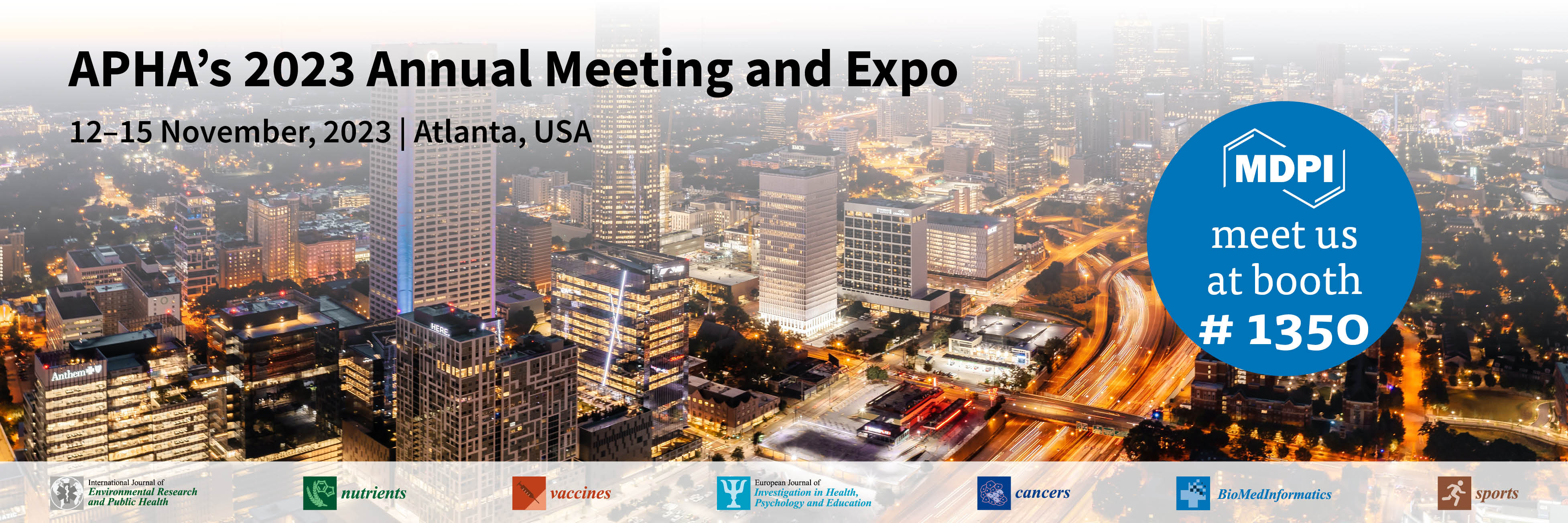
Conference: APHA’s 2023 Annual Meeting and Expo
Date: 12–15 November 2023
Location: Atlanta, USA
MDPI will be attending APHA’s 2023 Annual Meeting and Expo as an exhibitor. We welcome researchers from different backgrounds to visit and share their latest ideas with us.
This conference is organized by the American Public Health Association (APHA). APHA is the largest organization of public health professionals in the United States, founded in 1872, and APHA's annual meeting and exhibition brings the largest gathering of public health professionals in the world. Connect with public health experts and other advocates at APHA’s 2023 Annual Meeting and Expo to overcome the social and ethical challenges that threaten public health together.
The following MDPI journals will be represented:
If you are planning to attend this conference, please do not hesitate to contact us online. Our delegates look forward to meeting you in person and answering any questions that you may have. For more information about the conference, please visit the following website: https://www.apha.org/Events-and-Meetings/Annual/.
2 October 2023
MDPI Insights: The CEO’s Letter #4 - MDPI Presence in China

Welcome to the MDPI Insights: The CEO's Letter.
In these monthly letters, I will showcase two key aspects of our work at MDPI: our commitment to empowering researchers and our determination to facilitating open scientific exchange.
Opening Thoughts

Open Access in China
It is Saturday, 23 September, and I have just returned from an unforgettable 12-day trip to China, visiting our main offices in Beijing and Wuhan. In the wake of a packed and very enjoyable agenda of internal and external meetings, I would like to use this edition of the CEO Letter to showcase how MDPI supports the scholarly community in China.
Coincidentally, Jack McKenna, Communications Associate from MDPI’s corporate content team, has just released a blog article discussing China’s open access (OA) policy. It is a timely read, providing a concise overview of the development of the OA movement in China and reflecting on its future. I shall draw some content from Jack’s piece and use this edition of the CEO Letter to highlight the various ways in which MDPI is involved in this market. And it would be remiss of me not to include some pictures and highlights from my travels!
Open Access Policy in China
As per Jack’s post, in 2020, China became the world’s leading producer of research articles. Today, China is experiencing a “substantial growth rate in OA [Open Access] publication”. This growth is supported by the State’s commitment to research & development and its policy “requiring the promotion of open science”.
Over the past two decades, there have been gradual developments in China’s OA framework, with repositories and platforms being developed in a consistent manner. Currently, key institutions across China – including the National Science Library, the National Science and Technology Library, and the Natural Science Foundation of China – support OA. The State aims to establish consistent policies across government agencies – a framework for a more encompassing embrace of OA across institutions.
In China, the number of subscription-only articles decreased by nearly 30% over the 10-year period of 2011–2021, while gold OA increased by 22%. Between 2017 and 2020 alone, China published 800,921 academic papers in an OA format.
In 2023, as the leading publisher of academic research, China is pursuing “self-reliance”. Therefore, the State will be establishing consistent policies across government agencies, including those related to OA. Additionally, it will want to ensure that Chinese people can access the research that is supported by Chinese funding and produced by Chinese academics. For this reason, “Open Access is a matter of priority in China”.
MDPI Offices in China
While the history of MDPI begins in Basel, Switzerland, the story of MDPI’s founder is very much rooted in China. Dr. Shu-kun Lin, Founder and President of MDPI, graduated with a BSc from Wuhan University in 1982. He also studied physical chemistry at the Lanzhou Institute of Chemical Physics, Chinese Academy of Sciences (1982–1986; MSc in 1985), and at the University of Louisville, USA (1987–1989). Dr. Lin completed his doctorate in organic chemistry at the Swiss Federal Institute of Technology (ETH-Zürich) in 1992.

Stefan Tochev (CEO, MDPI) at MDPI’s Wuhan office.
In 2002, MDPI’s Basel headquarters moved to Matthäusstrasse 11, 4052 Basel, and Dr. Lin opened an editorial office in Qingdao, China, which launched the journal Marine Drugs in the following year. Below is a list of MDPI’s current offices in China and their respective dates of inauguration:
- 2008: Beijing (Tongzhou, Haidian)
- 2013: Wuhan (Hankou, Guanggu)
- 2019: Tianjin
- 2021: Dalian
- 2021: Nanjing
Our Strength is in Our People
With over 6,000 MDPI staff, across 20 offices in 11 countries, MDPI is able to offer authors responsive and efficient round-the-clock support, enabling a rapid publication process.
In my experience, stakeholders are genuinely surprised when they realize the extent of our global operations. My response is to reiterate that our people are our strength. This is why we have fast and efficient processes and top-notch responsiveness. Our global presence ensures that your manuscript is constantly attended to, rather than sitting on someone’s desk. We prioritize our authors’ needs and act quickly to move things through the various stages of publication. MDPI is built on speed, convenience, and competence, which I believe are core pillars for success in any industry. We continually strive to improve our systems and processes on the basis of these core strengths. We literally have over 6,000 staff worldwide dedicated to serving your needs. It’s not magic: it’s people; it’s real.
Impactful Research

MDPI Awards
To support the academic community, and especially young researchers, and also to enhance communication among scientists, MDPI journals offer various awards in specific fields. We serve the scientific community by funding research to facilitate the development of sustainable global solutions through our annual World Sustainability Award and Emerging Sustainability Leader Award.
In 2022, MDPI made awards totalling over US$1 million in recognition and support of researchers worldwide.
Across our journal catalogue, we have granted over 2,000 awards to recognize and support researchers from all disciplines. Since 2016, these awards have served as a source of recognition, acknowledging the impact of research by heightening the influence of talented individuals. The award types mainly include the Young Investigator Award, the Best PhD Thesis Award, the Best Paper Award, and the Outstanding Reviewer Award.
To learn more about MDPI Awards and to find out which are currently available, please click here.
MDPI Awards to Scholars from China
Since 2021, there have been 23 Best Paper Awards granted to authors affiliated with Chinese institutions, identifying their papers as having high-quality scientific impact. A total of 45 Chinese scholars have received awards such as the Young Investigator Award, the Best PhD Thesis Award, the Outstanding Reviewer Award, and the Tu Youyou Award, among others. Prizes for these awards include MDPI grants for paid publications, totalling over CHF 70,000 for scholars affiliated with Chinese institutions.
MDPI’s Tu Youyou Award

Prof. Tu Youyou (left), Dr. Shu-Kun Lin (President, MDPI).
In 2015, Professor Tu Youyou was awarded the Nobel Prize in Physiology or Medicine “for her discoveries concerning a novel therapy against Malaria.” In order to commemorate Professor Tu’s contributions to human health and to promote the passion and spirit conveyed by her experiences, MDPI in 2016 established the ‘Tu Youyou Award’, which runs biennially to recognize outstanding scholars dedicated to the research of natural products and medicinal chemistry.
The 2022 Tu Youyou Award was granted to Prof. Dr. Xiaoguang Lei of Peking University. Click here to access the interview with the winner.
2015 Nobel Prize for Medicine Awarded to Professor Youyou Tu
Professor Tu’s work was celebrated in a Special Issue from Molecules on the occasion of her 80th birthday. The Special Issue: 'Artemisinin (Qinghaosu): Commemorative Issue in Honor of Professor Youyou Tu on the Occasion of her 80th Anniversary” was created five years before she won the Nobel Prize, highlighting the visibility MDPI provides researchers and their work.
Highly Cited Articles by Chinese Scholars Published in MDPI
Click here to access the most cited MDPI papers published by scholars affiliated with Chinese institutions. This list presents the most influential research from the more than 287,000 MDPI papers published by Chinese scholars. With over 9 million total citations, I encourage you to maximize your visibility and impact by publishing with MDPI, the number one most cited open access publisher.
Read more:
- Tu Youyou Award
- World Sustainability Awards
- Available Awards
Inside MDPI
 Stefan Tochev (CEO, MDPI) with the Beijing Marketing team.
Stefan Tochev (CEO, MDPI) with the Beijing Marketing team.
Marketing Department in China
During my visit to our offices in Beijing and Wuhan, I had the opportunity to meet with, and to present to, our local marketing teams. These teams are responsible for various journal-related and corporate promotional activities, including newsletters, conferences, seminars, author training, journal awards, content creation, digital marketing, and social media.
I was pleased by the ambition and curiosity of our marketing colleagues. They showed a strong desire to collaborate and acquire knowledge and tactics to effectively market and promote MDPI-journal-related activities. I presented some of the principles and objectives that we apply in the Corporate Marketing and Communications department, and used the opportunity to strengthen our collaborative communications across offices.
 Stefan Tochev (CEO, MDPI) with the Wuhan Marketing team.
Stefan Tochev (CEO, MDPI) with the Wuhan Marketing team.
Coming Together for Science

Collaborations, Scholarships and Meetings
MDPI maintains partnerships with nearly 190 learned societies and over 800 institutions and consortia, helping to facilitate the transition to OA publishing. Our commitment to working with institutions is evident in China, where we have successfully established over 35 Institutional Open Access Programs (IOAP) with esteemed institutions such as the Tsinghua University, Huazhong University of Science and Technology, and Shanghai Jiao Tong University.
Our institutional partnerships, waiver programs, and article processing cost discounts create diverse pathways to OA publishing for researchers worldwide.
Scholarships in China
Since 2021, several MDPI journals (Sensors, Photonics, Coatings, Materials, Energies, and Journal of Fungi) have funded full scholarships for four Master’s and five Ph.D. projects in China. These scholarships align with Tianjin University, Wuhan University of Technology, Central South University, the Chinese Academy of Sciences, and the China University of Petroleum (Beijing).
Meeting with the Society of Chinese University Journals (CUJS)

Prof. Tieming Zhang (President of CUJS, centre) and MDPI colleagues at CUJS office.
I am pleased to have participated in some highly productive meetings during my visit to China, including one with the Society of Chinese University Journals (CUJS). The meeting involved Prof. Tieming Zhang (President of CUJS), Assoc. Prof. Xin Zhang (Vice President and Secretary General), and Dr. Fei Gao (Executive Member of CUJS). Alongside my colleagues Dr. Guoshi Liu, Dr. Giulia Stefenelli, and Anita Sun, I represented MDPI and held an open discussion to address any questions regarding OA and MDPI.
We discussed several methods for collaboration, including a workshop on the future of peer review, MDPI sponsoring a funding grant for early-career researchers, and transitioning journals from diamond to gold OA. I am thankful for the opportunity to have met our colleagues at CUJS in person and feel very confident about our future collaborations in support of OA publishing in China.
MDPI hosts free academic seminars, author training sessions, and academic conferences as part of its commitment to enrich and support the scholarly community. CUJS often stages academic events (e.g., conferences, editor training, and editor competitions), and I believe there are great opportunities for CUJS and MDPI to collaborate accordingly.
Meeting with National Science Library, Chinese Academy of Sciences (NSLC)

Stefan Tochev (CEO, MDPI), Dr. Giulia Stefenelli (Chair of Scientific Officers, MDPI), Anita Sun (PR Manager, MDPI) and Dr. Guoshi Liu (Managing Director, MDPI) at the National Science Library, Chinese Academy of Sciences.
We also visited the NSLC Director, Xiwen Liu, and colleagues Ying Jin, Zhesi Shen, and Sichao Tong. Following our introductions, we gave a presentation on the history and editorial process at MDPI, discussing specific details related to MDPI’s business and data. We highlighted the status of our IOAP collaborations in China and the makeup of our author base, specifically in China, and drew attention to the fact that MDPI has published research by authors from every country in the world. We then discussed the design indicators, calculation methods and implementation purposes of the ‘Early Warning Journal List’ and how we can have open communication to provide any data regarding MDPI journals. I am pleased to report that we reached a consensus on future communications, and am grateful to NSLC for hosting us in their offices.
In-person meetings with stakeholders provide an invaluable opportunity to communicate what MDPI is about and the various ways in which we serve the scholarly community. While digital marketing and online communication are essential, they are no replacement for the understanding and trust that come about through in-person interactions.
The Numbers
As at September 2023, China holds the largest position in MDPI’s global market, ranking as the largest contributor to the total number of papers published by MDPI.
At this point in time, there were more than 847,000 China mainland scholars who have published with MDPI, 51 of whom are Section-Editors-in-Chief (SEiC) of MDPI journals, with seven serving as Editors-in-Chief (EiCs) for journals such as Air, Big Data and Cognitive Computing, Blockchains, Future, Nanoenergy Advances, and Targets.
Our growth and presence in China are a true testament to the service we provide to the scholarly community, and to the relationships we foster through collaborative activities. We look forward to continuing to support the growth of the scholarly community in China, providing a valuable and trusted experience with MDPI.
Closing Thoughts
Final Reflections on our MDPI Offices in Beijing and Wuhan

Stefan Tochev (CEO, MDPI), Dr. Constanze Schelhorn (Indexing Manager, MDPI), Jiale Shang (Admin, Tongzhou, MDPI) at Beijing Capital International Airport, Beijing.
I spent approximately two weeks visiting some of our offices in China, and the first word that comes to mind when describing my experience is ‘hospitality.’ My colleagues and I were met with enthusiasm and delight at the airport by the Tongzhou Admin team (thank you, Jiale Shang, and thank you, Eric Wang, for keeping us organized on this trip!) and were taken care of with great attention. From hotels to transportation, dinners, and meetings, our stay was catered for perfectly.
Perhaps this is where MDPI’s focus on customers and service originates. At our core, we are a service company that provides a publishing platform for its authors. It’s therefore no surprise that authors consistently rate their experience with MDPI very highly.
95% of submitting authors rate their overall experience with the MDPI publication process as Excellent or Good (Springer Nature report 90%).
91% of submitting authors rate their overall experience with the MDPI peer review process as Excellent or Good.
Speed/Efficiency and Editorial Relationship are two key reasons underlying this high satisfaction score. ‘Editorial Relationship’ can be further explored, but in the past month, the most commonly noted aspects were the professionalism, kindness, availability, communicativeness, and personalized assistance provided by our editorial staff throughout the process. These attributes are at the core of our work across all our offices and continents.
Hospitality and Service
Just as our Chinese colleagues strove to keep us engaged by showing us the city sights (thank you, Thea Pan, and Jason Wu from the Wuhan Marketing team!) and sharing a variety of wonderful meals, our editorial staff are committed to serving our authors throughout their publishing journey. Our aim is to place the author at the centre of everything we do, eager to welcome our ‘guests’ and provide them with a pleasant publishing experience.
I asked my colleague Francis Wu (Senior Publisher, Wuhan office) where this hospitality originates. He responded that it is part of Chinese culture. I reflected long and deep on this answer. China is a vast country, and when visitors arrive, hosts want to ensure they feel welcomed and taken care of in order to maximize their time and visit. I can’t think of a better analogy for how I would want our authors to feel when they visit MDPI for their publishing needs. A company culture that prioritizes service, something that goes beyond products and productivity, and focuses on the overall experience. Over 6,000 people, across all MDPI offices, are ready, willing and able to go the extra mile for their colleagues and their customers. This is something I am truly proud of.
Chief Executive Officer
MDPI AG
27 September 2023
Meet Us at the Micronutrient Forum 6th Global Conference (MNF2023), 16–20 October 2023, The Hague, the Netherlands

MDPI will be attending the Micronutrient Forum 6th Global Conference (MNF2023), which will be held from 16 to 20 October 2023 in the Hague, the Netherlands.
We are facing multiple, complex and cascading challenges that are adversely impacting humans’ well-being, including nutrition and micronutrient security. MNF2023 will bring together diverse international and national delegates across sectors and disciplines to drive compelling, evidence-based agendas that promote nutrition and strengthen the population’s resilience against climate change and man-made conflicts.
This Global Conference offers opportunities to advance integrated research and identify innovative policy solutions and investments for micronutrient interventions, enabling accelerated progress towards global nutrition and development goals.
The following MDPI journals will be represented:
- Nutrients;
- Dietetics;
- Life;
- Diseases.
If you are planning to attend this conference, please feel free to stop by our booth and chat with us. Our delegates look forward to meeting you in person and answering any questions that you may have. For more information about the conference, please visit the following website: https://mnforum2023.org/.
25 September 2023
Meet Us at the Gerontological Society of America (GSA) 2023 Annual Scientific Meeting, 8–12 November 2023, Tampa, Florida, USA
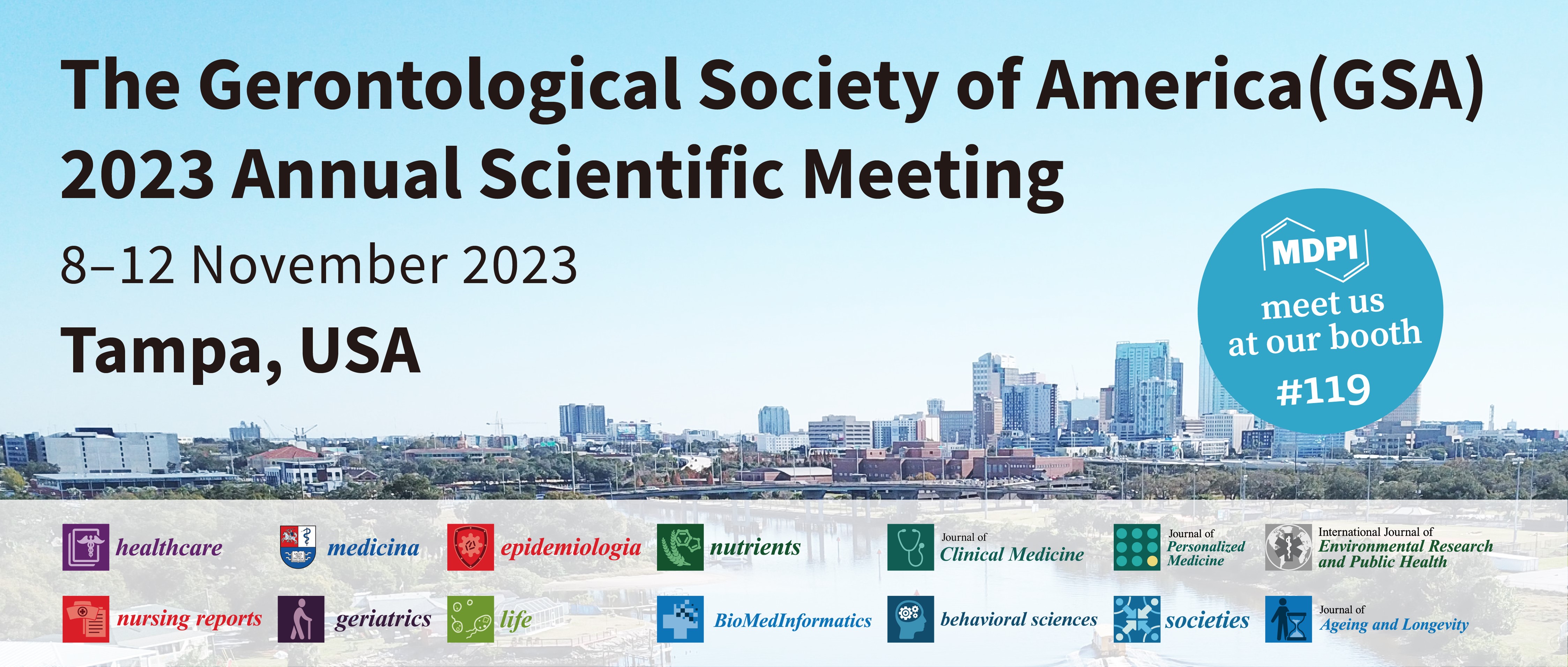
MDPI will attend the Gerontological Society of America (GSA) 2023 Annual Scientific Meeting. The Gerontological Society of America is the oldest and largest interdisciplinary organization devoted to research, education, and practice in the field of aging.
The GSA 2023 Annual Scientific Meeting draws professionals in the field of aging on a global scale. Attendees represent specialties including geriatrics, biological sciences, nursing, nutrition, medicine, social work, economics, policy, psychology, and more. The Annual Scientific Meeting offers an extensive amount of stimulating and high-level scholarship, from a diverse variety of aging research disciplines. It is this new, enriching knowledge that will inform policy, practice, and research for years to come.
The following MDPI journals will be represented:
- Healthcare;
- Medicina;
- Epidemiologia;
- Nutrients;
- JCM;
- JPM;
- IJERPH;
- Nursing Reports;
- Geriatrics;
- Life;
- BioMedInformatics;
- Behavioral Sciences;
- Societies;
- JAL.
If you plan on attending this conference, please feel free to stop by our booth #119 and start a conversation with us. Our delegates look forward to meeting you in person and answering any questions that you may have.
For more information about the conference, please visit https://www.gsa2023.org.
18 September 2023
Meet Us at the 4th Conference on Food Bioactives & Health, 18–21 September 2023, Prague, Czech Republic
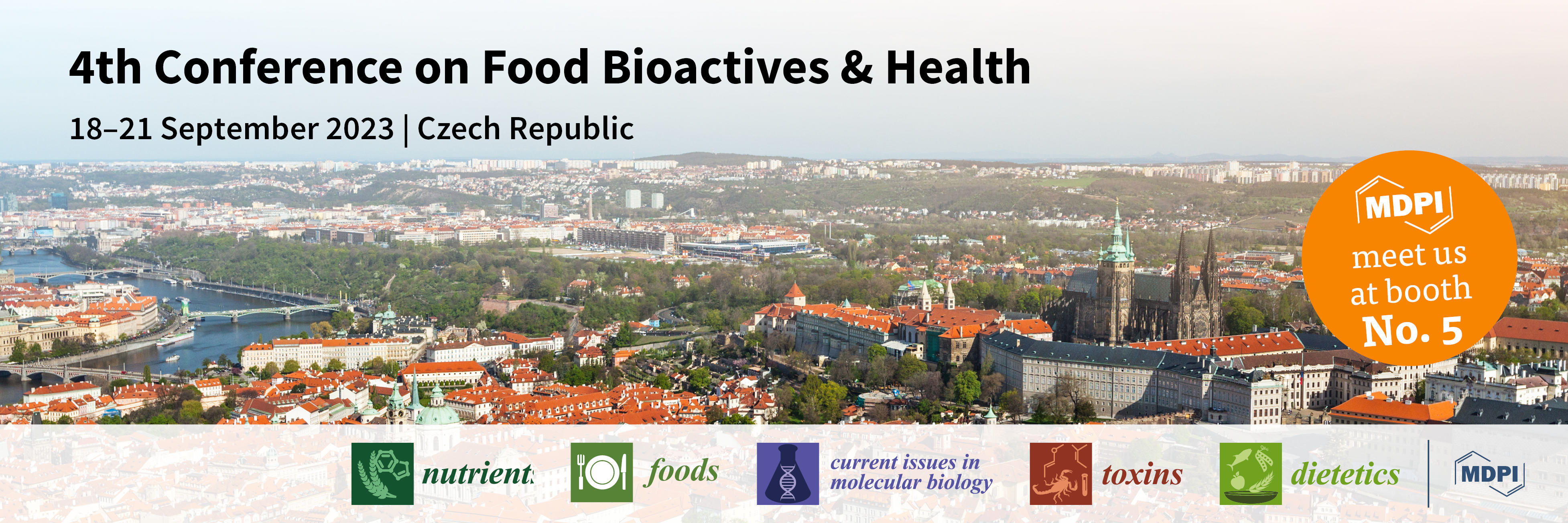
MDPI will be attending the 4th Conference on Food Bioactives & Health, which will be held from 18 to 21 September 2023 in Prague, Czech Republic.
The conference has already established itself as an important international forum for the presentation of the latest research results in the field of food bioactives, such as (poly)phenols, glucosinolates, carotenoids, peptides, (poly)saccharides, lipids, and other beneficial food constituents, but also of food contaminants and toxins. Contributions to the development of functional foods and food supplements, nutrition policy, personalized nutrition, and the bioavailability, absorption, and metabolism of food constituents and their interaction with gut microbiota are especially welcome. Researchers, practitioners, and policy makers with different professional backgrounds (e.g., physiologists, nutritionists, pharmacologists, plant scientists, and toxicologists) are welcome in order to create a multidisciplinary discussion forum typical of Food Bioactives & Health conferences.
The following MDPI journals will be represented:
- Nutrients;
- Foods;
- CIMB;
- Toxins;
- Dietetics.
If you are planning to attend this conference, please feel free to stop by our booth and start a conversation with us. Our delegates look forward to meeting you in person and answering any questions that you may have. For more information about the conference, please visit the following website: https://fbhc2023.com/.
6 September 2023
Recap of Awards Granted to Scholars in 2022
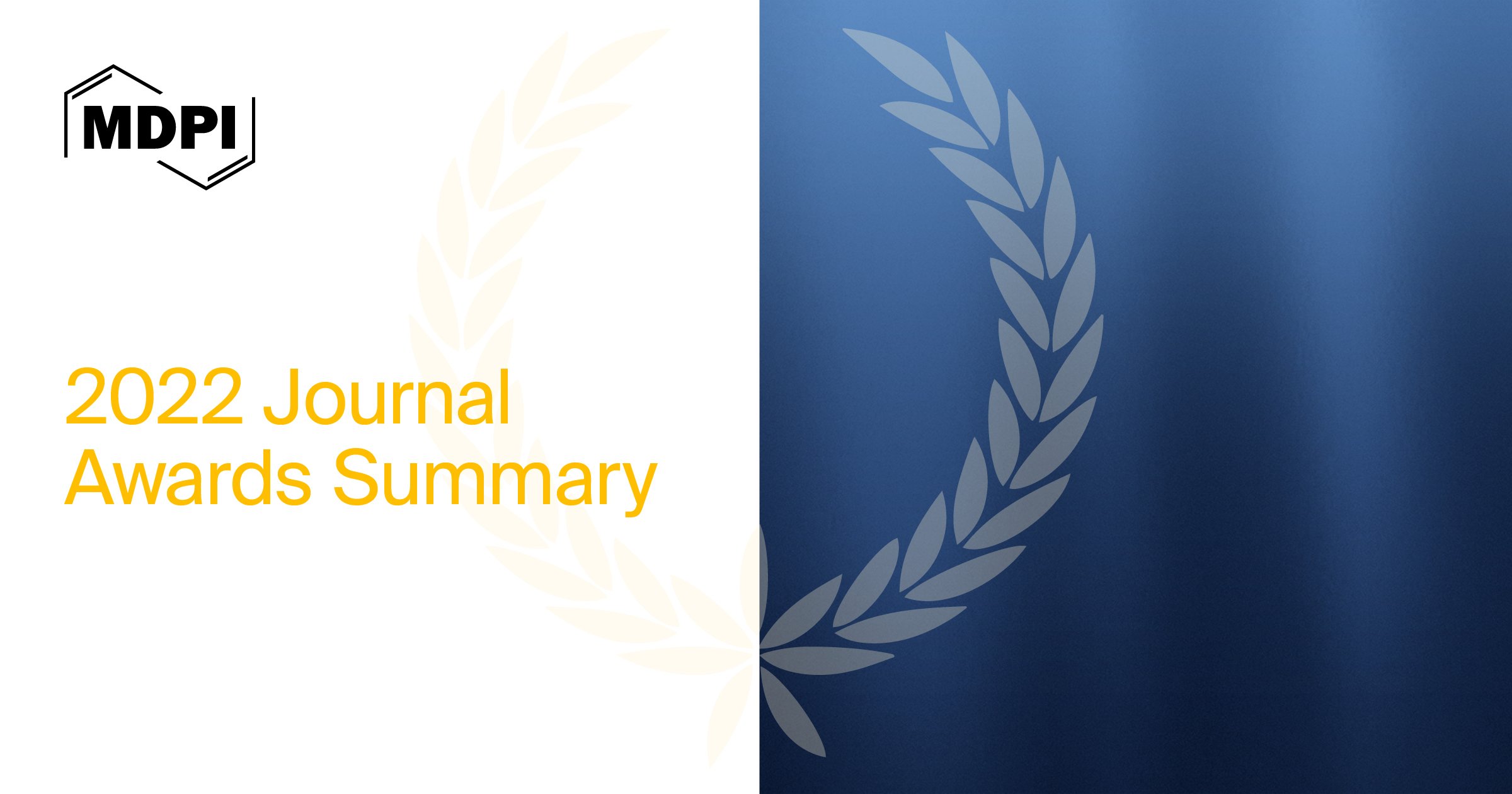
MDPI is committed to supporting the academic community, nurturing talent and advancing science. Awards are an important part of the research landscape and play a vital role in helping academics gain recognition, especially young researchers as they embark on new research avenues.
In 2022, our journals presented a total number of 394 Awards, including Travel Awards, Young Investigator Awards, Best PhD Thesis Awards, Best Paper Awards, and Outstanding Reviewer Awards, with several winners announced for some of the awards. The total prize sum amounted to just under 580,000 Swiss francs (CHF), or approximately 650,000 US dollars. Overall, more than 720 scholars were awarded.
The majority of the awards were dedicated to young researchers in relatively early stages of their careers. This encompassed 66 of the afore-mentioned Travel Awards, 60 Young Investigator Awards, supporting research projects and conference attendance, as well as 51 Best PhD Thesis Awards. Additionally, 113 Best Paper Awards were given by our journals. The selection committees were entrusted with identifying the most impactful and novel research and review articles published in their journal within a given year.
MDPI will continue its support and recognition for the academic community moving forward, sponsoring new awards across disciplines. To learn more about all the awardees and their research projects in your field of study, please visit the following pages:
To explore more MDPI awards, please click here.
30 August 2023
MDPI Insights: The CEO’s Letter #3 - Sustainability and Co-opetition

Welcome to the MDPI Insights: The CEO's Letter.
In these monthly letters, I will showcase two key aspects of our work at MDPI: our commitment to empowering researchers and our determination to facilitating open scientific exchange.
Opening Thoughts

Our Commitment to Sustainability
As a pioneer in academic open access publishing since 1996, MDPI has always been dedicated to facilitating scientific exchange across all disciplines. Our approach to open science is guided by principles such as Open Access (OA), Timeliness and Efficiency, Simplicity, High-Quality Service, Flexibility, and a commitment to Sustainability. This commitment involves preserving published papers for the long term and supporting the future of science through partnerships, sponsorships, and awards.
In this edition of the CEO Letter, I will delve into MDPI’s various sustainability initiatives. As a leader in OA publishing, we are able to provide the public with a significant amount of environment-related content at no cost.
MDPI and the Sustainable Development Goals (SDGs)
In 2020, the SDG Publishers Compact was launched to accelerate implementation of the SDGs by promoting content that informs, develops, and inspires action. MDPI joined this initiative in 2021 and subsequently launched the MDPI SDG Hub in 2022, offering free access to recent research within the scope of each of the 17 SDGs. We also support authors from underrepresented communities by waiving publication charges for selected SDG-related papers. Detailed sustainability practices and supported publications are available in the report under each Goal page.
“More than 80% of MDPI articles and reviews published in 2022 relate to the Sustainable Development Goals.” [source: InCites, Accessed on 21.08.2023]
As at August 2023, MDPI boasts 14 journals dedicated to sustainability-related topics. Our first journal in this area, Sustainability, has published over 29,000 articles on the SDGs, accumulating over 240,000 citations (source: InCites, as at 1 January 2023). These journals serve as vital platforms for researchers to share insights and address environmental challenges. In addition:
MDPI journals specializing in sustainability-related topics:
- 2009: Sustainability
- 2012: Resources
- 2013: Climate
- 2014: Environments
- 2016: Recycling
- 2019: Clean Technologies
- 2020: Sustainable Chemistry
- 2021: Wind, Biomass, Conservation, Pollutants, Solar
- 2022: Waste, Microplastics
Read more:
Impactful Research

Highly Cited Articles in Sustainability
In 2022, content published in Sustainability and indexed in Journal Citation Reports (JCR) received nearly 190,000 citations. This highlights the fact that Sustainability publishes highly cited research articles related to environmental sciences and SDG-related topics such as climate action.
We are pleased to share that Sustainability received a 2022 CiteScore of 5.8, marking a 16% increase from the 2021 metric. Specifically, the CiteScore positions Sustainability as follows: Q1 (27 out of 163) in the “Environmental Science (miscellaneous)” category, and Q1 (101 out of 779) in the “Geography Planning and Development” category. For additional journal statistics, please visit here.
“Sustainability received a 2022 CiteScore of 5.8”
While MDPI journals such as Climate and Atmosphere have a distinct focus on atmosphere pollution and its impact on climate processes, journals like Sustainability, Environments, Water, Remote Sensing, and IJERPH publish content related to climate change. These journals have published over 32,300 articles related to SDG 13: Climate Action.
Highly Cited Papers in Sustainability
Below are several highly cited papers published in Sustainability over the past three years. Citation metrics are current as at 15 August 2023.
1. “A Global Assessment: Can Renewable Energy Replace Fossil Fuels by 2050?”Authors: Jerry L. Holechek, Hatim M. E. Geli, Mohammed N. Sawalhah, and Raul Valdez
Sustainability 2022, 14(8), 4792; https://doi.org/10.3390/su14084792
Citations: Crossref (97), Scopus (91), Web of Science (82), Google Scholar (125)
This paper addresses one of the most significant challenges of climate change – achieving Net Zero Carbon by 2050. The meta-analysis suggests that while difficult, this transition is possible through the concerted application of pathways, lifestyle changes, and global cooperation.
2. “Anxiety and the Ecological Crisis: An Analysis of Eco-Anxiety and Climate Anxiety”Author: Panu Pihkala
Sustainability 2020, 12(19), 7836; https://doi.org/10.3390/su12197836
Citations: Crossref (144), Scopus (121), Web of Science (159), Google Scholar (382)
This paper has received substantial media attention, including coverage by The Guardian, BBC, Vice, and CNBC. An interview with Dr. Panu Pihkala, a leading interdisciplinary researcher on the topic, can be found on MDPI’s podcast: Insight Faster, Episode 1.
3. “Impact of Climate Change on Agriculture and Its Mitigation Strategies: A Review”Authors: Gurdeep Singh Malhi, Manpreet Kaur, and Prashant Kaushik
Sustainability 2021, 13(3), 1318; https://doi.org/10.3390/su13031318
Citations: Crossref (207), Scopus (221), Web of Science (186), Google Scholar (355)
This paper reviews literature on climate change, addressing its causes, future projections, impact on agriculture, including plant physiology, growth, productivity, pest infestation, and the economic implications of mitigation strategies.
4. “Impacts of Plastic Pollution on Ecosystem Services, Sustainable Development Goals, and Need to Focus on Circular Economy and Policy Interventions”Authors: Rakesh Kumar, Anurag Verma, Arkajyoti Shome, Rama Sinha, Srishti Sinha, Prakash Kumar Jha, Ritesh Kumar, Pawan Kumar, Shubham, Shreyas Das, Prabhakar Sharma, and P. V. Vara Prasad
Sustainability 2021, 13(17), 9963; https://doi.org/10.3390/su13179963
Citations: Crossref (134), Scopus (136), Web of Science (113), Google Scholar (184)
This review aims to assess the adverse effects of plastic pollution on ecosystems, link the management of plastic with the SDGs, and propose policy measures using transdisciplinary approaches. Empowering communities to reduce plastic use is crucial. Addressing global plastic pollution is a priority.
Sustainability is an international, cross-disciplinary, open access journal that explores environmental, cultural, economic, and social sustainability of human beings. It provides a forward-looking platform for research on sustainability and sustainable development, and is published semi-monthly online by MDPI. Sustainability is affiliated with The Canadian Urban Transit Research & Innovation Consortium (CUTRIC) and The International Council for Research and Innovation in Building and Construction (CIB).
Read more:
- Testimonials: See what our editors and authors say about Sustainability.
Inside MDPI

President of Ireland Authors Editorial in MDPI Journal Sustainability
It’s a very special occasion when the president of a country takes the initiative to write an editorial for a journal. Michael D. Higgins, President of the Republic of Ireland, has contributed his insights to a forthcoming Special Issue in Sustainability:

This Special Issue, focusing on “making sustainable development happen” at grassroots levels, allows for perspectives from, and on, the major world faiths, exploring how challenges have been conceptualised and addressed, in addition to case studies of faith-based sustainability initiatives in practice.
The experience of faith institutions and communities in translating theological and moral commitments to sustainable development into action is now a topic we must examine with urgency; one on which I am so glad this Special Issue focuses.
As President of Ireland, I very much support this Special Issue of Sustainability. It is my great hope that the contents of the papers contained herein will assist in making sustainable development happen at grassroots levels across the world so that we can cooperate together, people of faith and of none, to ensure a just, inclusive and sustainable future for all on our fragile planet.
Read the completed editorial here:
Special Issue “Faith and Sustainable Development: Exploring Practice, Progress and Challenges among Faith Communities and Institutions”: Foreword by the President of Ireland
Author: Michael D. Higgins
Sustainability 2023, 15(12), 9683; https://doi.org/10.3390/su15129683
Coming Together for Science

The World Sustainability Forum 2023
The World Sustainability Forum (WSF) is a biennial MDPI event focused on sustainability. WSF 2023 marks the tenth anniversary of the conference series, taking place on 14 September. For the first time, the event will be hosted as a 24-hour conference across three locations – Singapore, Basel in Switzerland, and Toronto in Canada – alongside virtual streaming.
This unique format allows us to span three time zones, providing live coverage of critical sustainability-related topics throughout the day:
- The Singapore Hub, chaired by Professor Horn Mun Cheah and Associate Professor Renee Tan, will explore “Sustainability for Social and Community Impact”.
- The Basel Hub, chaired by Prof. Dr. Anet Režek Jambrak and Dr. Lela Mélon, will delve into “Sustainability in the industry, and at university and corporate settings”.
- The Toronto Hub, led by Dr. Umberto Berardi, will discuss “The Sustainable Built Environment”.
MDPI Sustainability Foundation: Recognizing Excellence in Sustainability Research
The MDPI Sustainability Foundation supports researchers through two sustainability-focused awards:
- The World Sustainability Award, amounting to USD 100,000, is given to senior researchers.
- The Emerging Sustainability Leader Award, valued at USD 20,000, sponsored by the journal Sustainability, is presented to early-career researchers.
The winners of the Sustainability Foundation will be formally awarded during the WSF2023 on 14 September. Interviews with the award winners and finalists are available below.
2023 World Sustainability Award Winners
Interviews with 2023 Emerging Sustainability Leader Award Finalists
- Dr. Bahareh Kamranzad
- Dr. Youjin Kim
- Dr. Julia Lohmann
As a hybrid event, WSF23 provides scholars with the option to attend in person at one of the conference sites or, for a more sustainable approach, virtually. All sessions will be recorded and archived for future access. Registration is open until 3 September 2023, with in-person and virtual tickets available here.
Read more:
Closing Thoughts
“Co-opetition”: Collaboration Plus Healthy Competition – A Visit to Elsevier
I firmly believe in fostering collaboration and at the same time promoting healthy competition within the academic publishing industry. The market offers ample room for publishers and related companies to provide valuable services and products that enrich the academic community. While MDPI is recognized for its efficient and streamlined processes –thanks to our over 6,000 colleagues, in-house tools, and initiatives that support the author journey – our ethos has always involved learning from and collaborating with other organizations.
MDPI’s Interaction with Elsevier
In January 2023, I had a brief conversation with Judy Verses, President of Global Academic and Government Markets at Elsevier, following her participation in a panel discussion at the Academic Publishers Europe event in Berlin. One of the highlights for me was Judy’s insight into the impact of research, particularly her emphasis on the role of collaboration, including policy and showing the impact of research to influence on funding decisions.
“Such collaborations drive forward-looking strategies to elevate our support for the scholarly community”

Judy and I resumed our discussion in August, when I visited Elsevier's office to review current projects, such as our recent agreement with Science Direct and the continued indexing of MDPI journals in Scopus (indexing database owned by Elsevier). We also explored possible opportunities for the future, including a potential collaboration to expand MDPI’s Scilit data infrastructure. This endeavour aims to aggregate and provide access to scholarly metadata encompassing journal articles, conference papers, books, preprints, and more. While these discussions are ongoing, the underlying principle remains that such collaborations drive forward-looking strategies to elevate our services and support for the scholarly community.
It was great that Judy and I acknowledged the merits of 'co-opetition,' a concept based of the belief that fostering cooperation alongside healthy competition can lead to shared advancements for both individual companies and the industry at large.
‘Fully OA’ Organizations Dedicated to Open Access

MDPI proudly aligns with the ‘Fully OA’ group, a collaborative initiative comprising nine organizations dedicated to Open Access. Our monthly meetings, including an OASPA representative, serve as platforms to share non-confidential information, resources, and projects. These gatherings also facilitate discussions on topics relevant to fully OA organizations. Occasionally, joint actions spring from these interactions, such as collaborative blog posts on pertinent subjects and joint statements, such as a recent response to the House Appropriations Committee.
This display of cooperation among competing entities forms a strategic alliance focused on nurturing the best interests of the OA publishing model.
As I wrap up this third edition of the CEO Letter, I encourage you to seize opportunities for collaboration and contribute to advancing our shared academic culture. As the African proverb has it, “If you want to go fast, go alone; if you want to go far, go together.”
Chief Executive Officer
MDPI AG
25 August 2023
Meet Us at the American Congress of Rehabilitation Medicine (ACRM) 100th Annual Conference, 30 October–2 November 2023, Atlanta, USA
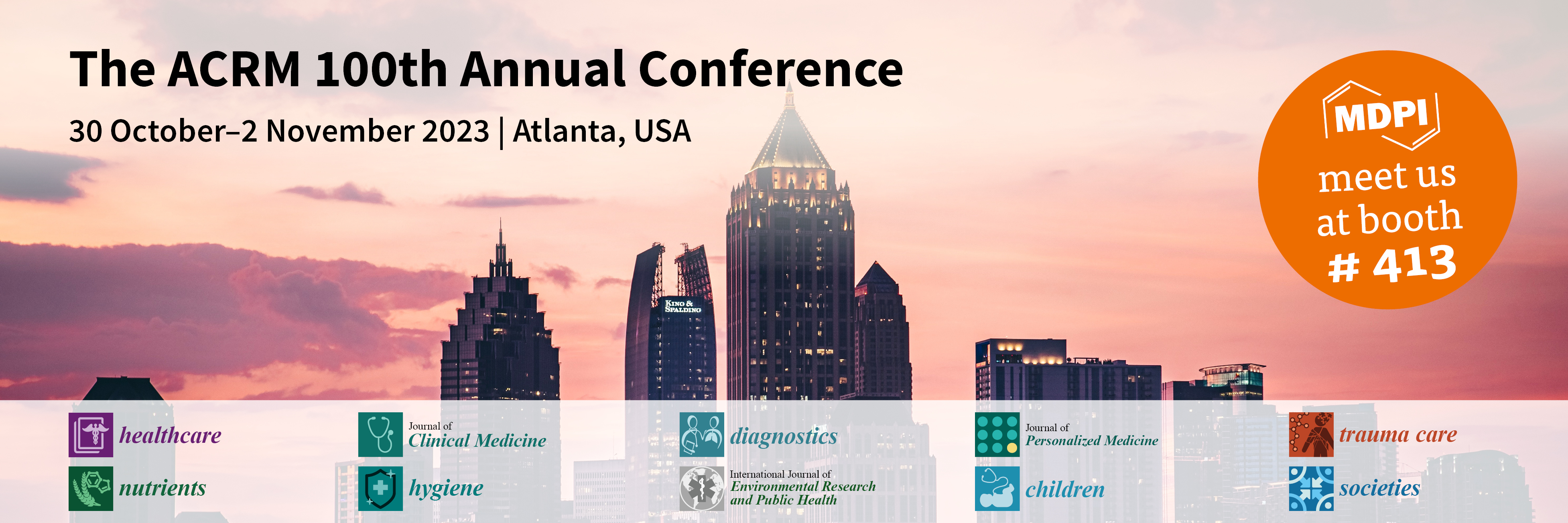
MDPI will attend the American Congress of Rehabilitation Medicine (ACRM) 100th Annual Conference. The 2023 annual meeting of ACRM is the world’s largest interdisciplinary rehabilitation research event. Rehabilitation professionals and community members from around the globe are encouraged to join. With 150+ inter-professional groups at ACRM, including community groups, committees, and task forces, the 100th anniversary conference is planning 4 powerful plenaries, 15+ symposia, 300+ educational sessions, symposia and lectures, and 600+ scientific papers and digital poster presentations, etc.
To enhance patient care, the presentation of science by researchers is required, and to inform and improve research, feedback from the clinicians is required. The aim of the ACRM 100th annual conference is to encourage attendees to join the discussions and collaborations in order to help move the field of physical medicine and rehabilitation forward.
The following MDPI journals will be represented:
If you plan on attending this conference, please feel free to stop by our booth #413 and start a conversation with us. Our delegates look forward to meeting you in person and answering any questions that you may have. For more information about the conference, please visit https://conference.acrm.org/.
23 August 2023
Meet Us at the 14th Asian Congress of Nutrition (ACN), 14–17 September 2023, Chengdu, China

MDPI will attend the 14th Asian Congress of Nutrition (ACN). The conference theme will be “Feeding the Future by Sustainable Nutrition”. Since 1973, the ACN has been held by the Federation of Asian Nutrition Societies (FANS) every four years. The conference committee categorized eight sessions in order to cover the board topics, namely: 1. Nutrition and Sustainable Development; 2. Basic Nutrition and Research; 3. Public Nutrition and Health; 4. Food and Nutrition; 5. Nutrition Across a Lifespan; 6. Nutrition Education; 7. Clinical Nutrition; and 8. Precision Nutrition.
The aim of the conference is to encourage discussion and gain valuable knowledge on a broad range of nutritional issues, such as food and energy storage, the coexisting malnutrition situation, the emerging prevalence of nutrition-related chronic diseases, the aging of societies, etc.
The following MDPI journals will be represented:
If you plan on attending this conference, please feel free to stop by our booth (#D01) and start a conversation with us. Our delegates look forward to meeting you in person and answering any questions that you may have. For more information about the conference, please visit https://acn2023.sciconf.cn/en/web/index/11826.
14 August 2023
MDPI’s 2022 Young Investigator Awards in Biology and Life Sciences—Winners Announced
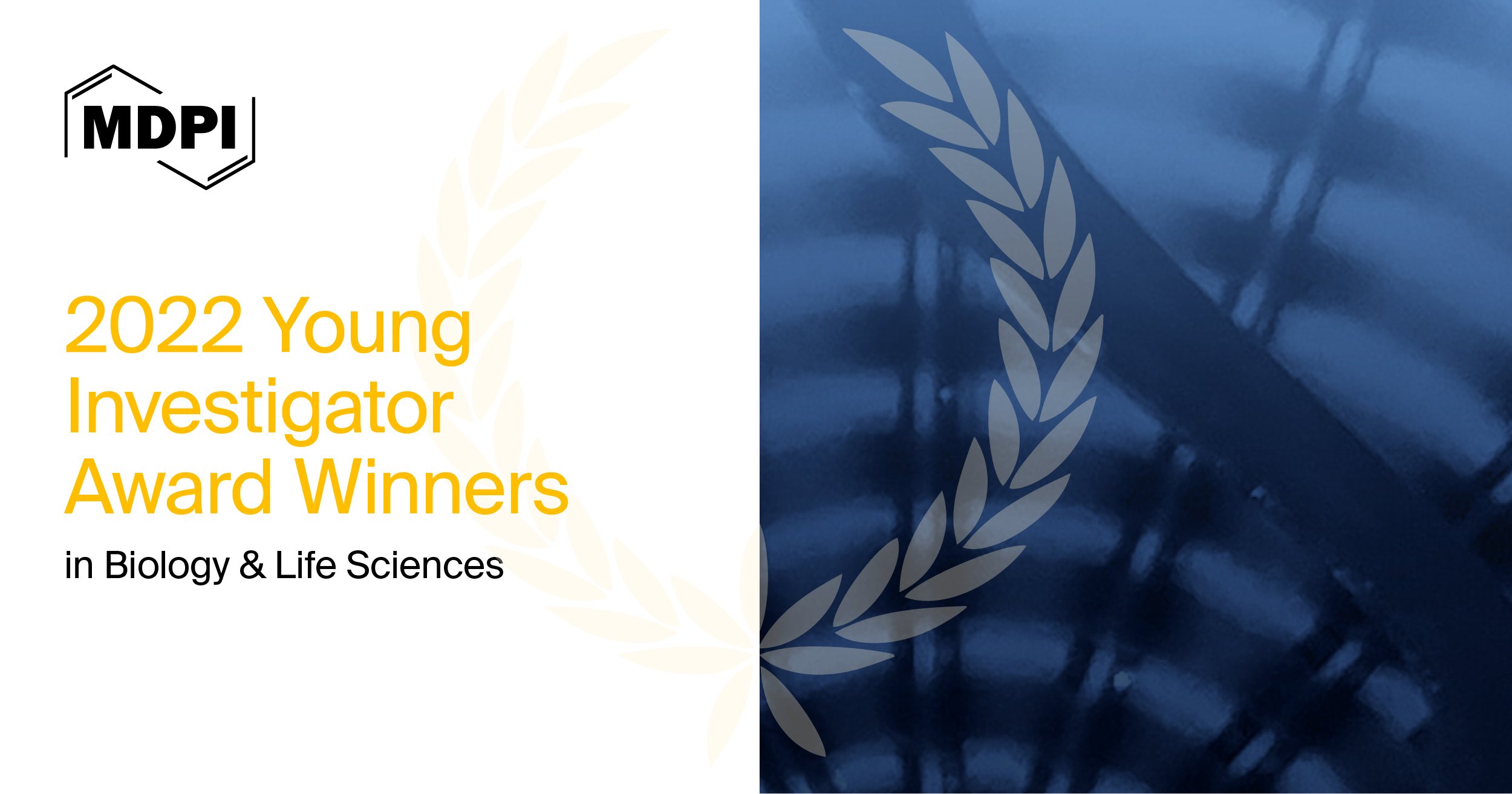
MDPI’s Young Investigator Awards recognize promising junior researchers, acknowledge their contributions, and enhance communication among scientists. We are proud to present the winners for the year 2022 in biology and life sciences. The winners were selected by the journals’ Award Evaluation Committee.
We warmly congratulate the awarded young investigators for their outstanding contributions. MDPI will continue to provide support and recognition to the academic community.
- Thomas Hartinger, University of Veterinary Medicine Vienna, Austria
- Leontina Lipan, Universidad Miguel Hernández, Spain
- Daniel Stec, Polish Academy of Sciences, Poland
- Dibyadeep Datta, Yale Medical School, USA
- Giacomo Valle, ETH Zurich, Switzerland
- Morgan H. James, Rutgers University, USA
- Xiaonan Lu, McGill University, Canada
- Alfredo Iacoangeli, King's College London, UK
- Elisa De Franco, University of Exeter, UK
- Riccardo Pecori, German Cancer Research Center, Germany
- Vanessa Silva, University of Trás-os-Montes and Alto Douro, Portugal
- Massimiliano Renna, University of Bari Aldo Moro at Bari, Italy
- Adam G. Dolezal, University of Illinois Urbana-Champaign, United States
- Carla Rodrigues, Institut Pasteur, France
- Lorena Rodriguez-Rubio, University of Barcelona, Spain
- Kevin Solomon, University of Delaware, USA
- Colleen Deane, University of Southampton, UK
- Paz Otero Fuertes, University of Vigo, Spain
- Marta Giovanetti, National Reference Laboratory of Flavivirus in the Oswaldo Cruz Foundation, Brazil
- Carrie M. Long, National Institute of Allergy and Infectious Diseases (NIAID), USA
- Carina Joe, University of Oxford, UK
About MDPI Awards:
In order to reward the academic community, especially young researchers and enhance communication among scientists, MDPI journals regularly offer various awards to researchers in specific fields. These awards, serving as a source of inspiration and recognition, help raise the influence of talented individuals who have been credited with outstanding achievements and are making a significant contribution to the advancement of their fields.
To explore more MDPI awards, please click here.
14 August 2023
MDPI’s 2022 Travel Awards in Biology and Life Sciences—Winners Announced
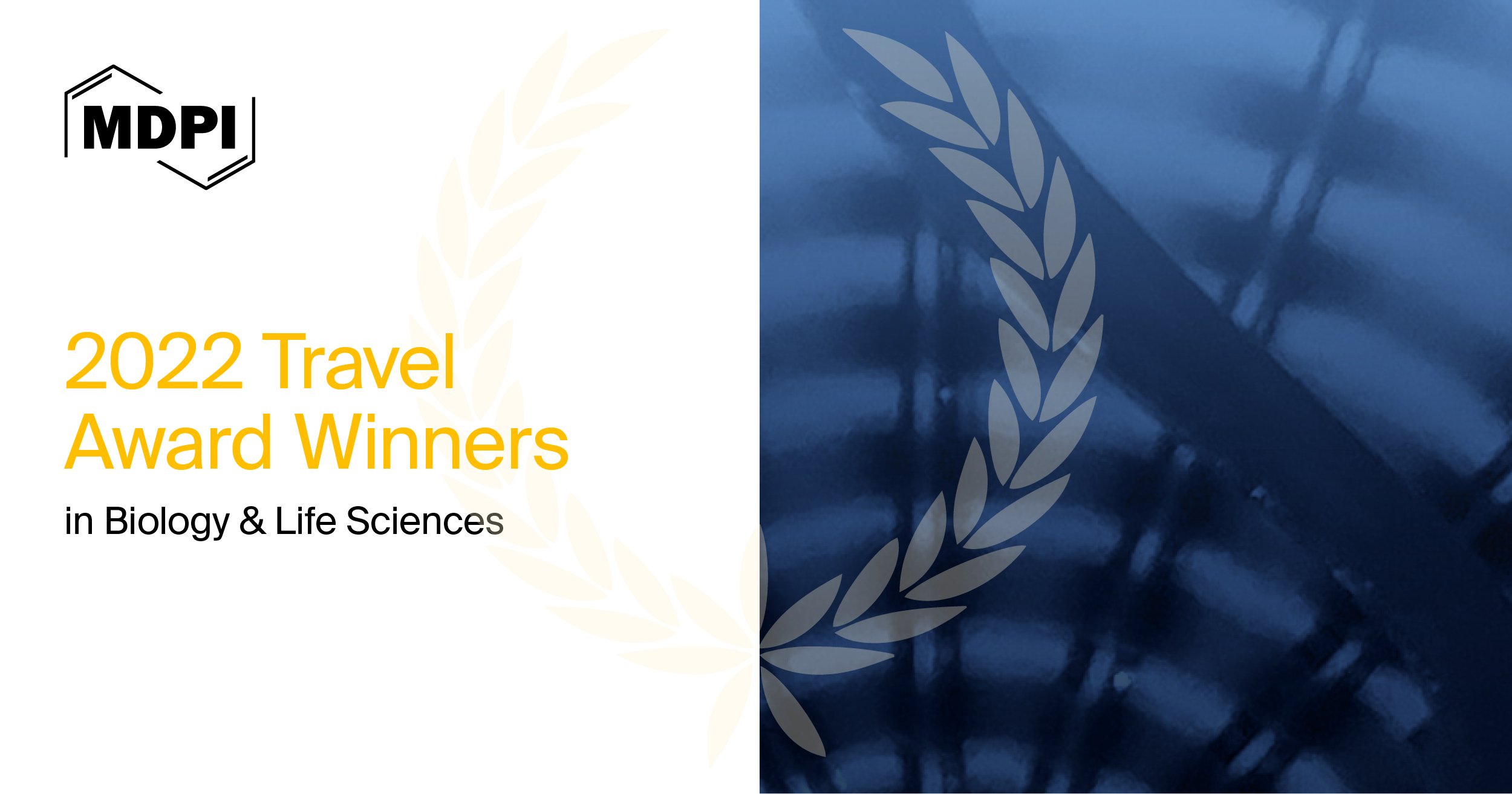
We are proud to recognize the winners of MDPI’s 2022 Travel Awards in biology and life sciences for their outstanding presentations.
MDPI journals regularly offer travel awards to encourage junior scientists to present their latest research at academic conferences in specific fields, which helps to increase their influence.
The winners mentioned below were carefully selected by the journal editors based on an outline of their research and the work to be presented at an academic conference.
We would like to warmly congratulate the winners of the 2022 Travel Awards and wish them the greatest success in their future research endeavors. MDPI will continue to enhance communication among scientists.
- Liloia Donato, University of Turin, Italy
- Roberta Bettoni, University of Milano Bicocca, Italy
- Vanessa Silva, University of Trás-os-Montes and Alto Douro, Portugal
- Carlo Matera, University of Milan, Italy
- Elisabetta Coppi, University of Florence, Italy
- Ilaria Tonazzini, Nanoscience Institute—National Research Council (CNR) @ NEST in Pisa, Italy
- Pere Catala, University Eye Clinic Maastricht, Maastricht University Medical Center, the Netherlands
- Angela Blasimann, University of Antwerp, Belgium
- Angelo Sabag, Western Sydney University, Australia
About MDPI Awards:
In order to reward the academic community, especially young researchers and enhance communication among scientists, MDPI journals regularly offer various awards to researchers in specific fields. These awards, serving as a source of inspiration and recognition, help raise the influence of talented individuals who have been credited with outstanding achievements and are making a significant contribution to the advancement of their fields.
To explore more MDPI awards, please click here.
14 August 2023
MDPI’s 2022 Outstanding Reviewer Awards in Biology and Life Sciences—Winners Announced
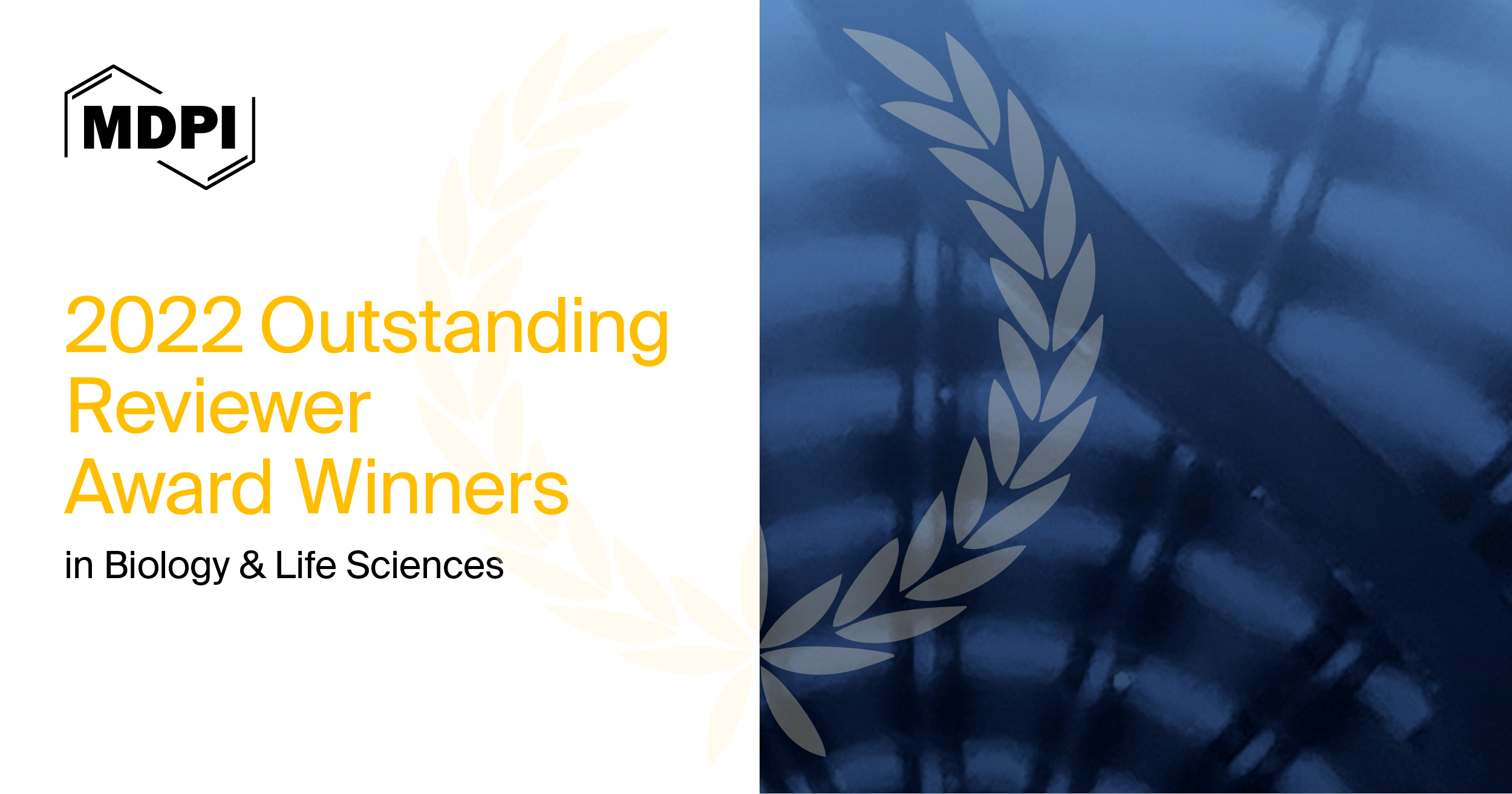
In order to acknowledge our reviewers, who demonstrate diligence, professionalism, and timeliness when generously dedicating their time to reviewing manuscripts, MDPI journals regularly offer outstanding reviewer awards to scholars who participate in the peer review process.
We are proud to recognize the winners for the year 2022 in biology and life sciences for their outstanding contributions, among extensive competition, by presenting them with an Outstanding Reviewer Award.
We would like to take this opportunity to congratulate all of the winners on their achievements. MDPI will continue to provide support and recognition to the academic community.
- Ewa Ropelewska, The National Institute of Horticultural Research, Poland
- Marek Rašovský, Slovak University of Agriculture in Nitra, Slovakia
- Prakash Jha, Kansas State University, USA
- Vasileios Greveniotis, Institute of Industrial and Forage Crops, Greece
- Alberto Collareta, University of Pisa, Italy
- Francisco Curate, University of Coimbra, Portugal
- Gianpiero Greco, University of Study of Bari, Italy
- Luca Poli, University of Study of Bari, Italy
- Shaohua Chen, South China Agricultural University, China
- Chong Chen, Yamaguchi University Graduate School of Medicine, Japan
- Marco Sapienza, University of Catania, Italy
- Sabina Barrios-Fernández, University of Extremadura, Spain
- Corrado Battisti, Torre Flavia LTER (Long Term Ecological Research) Station, Italy
- Daniel Stec, Institute of Systematics and Evolution of Animals of the Polish Academy of Sciences, Poland
- Emilia Grzędzicka, Institute of Systematics and Evolution of Animals of the Polish Academy of Sciences, Poland
- Igor Zelnik, University of Ljubljana, Slovenia
- Eva S. Liu, 1Harvard Medical School, USA 2Brigham and Women’s Hospital, USA
- Aleksandra Szydlowska, Warsaw University of Life Sciences (WULS), Poland
- Mohamed Ali Abdel-Rahman, Al-Azhar University, Egypt
- Andrew G. Jeffs, University of Auckland, New Zealand
- Mohamed Samy-Kamal, Universitat d'Alacant, Spain
- Baskaran Stephen Inbaraj, Fu Jen Catholic University, Taiwan
- Marzena Włodarczyk-Stasiak, University of Life Sciences in Lublin, Poland
- Minaxi Sharma, Haute Ecole Provinciale de Hainaut-Condorcet, Belgium
- Viviani Ruffo de Oliveira, Federal University of Rio Grande do Sul (UFRGS), Brazil
- Federico Manuel Giorgi, University of Bologna, Italy
- Jan Bocianowski, Poznań University of Life Sciences, Poland
- Magdalena Mroczek, Center for Cardiovascular Genetics and Gene Diagnostics, Switzerland
- Keigi Fujiwara, University of Texas MD Anderson Cancer Center, USA
- Tomasz W. Kaminski, University of Pittsburgh, USA
- Takujiro Homma, Yamagata University, Japan
- William Bryan Terzaghi, Wilkes University, United States
- Zong-jie Cui, Beijing Normal University, China
- Abraão Almeida Santos, University of Florida, USA
- Agata Kaczmarek, Polish Academy of Sciences, Poland
- Miguel A. García-Martínez, Universidad Veracruzana, Mexico
- Andrei S. Rodin, Diabetes and Metabolism Research Institute, USA
- Kazuhiko Kotani, Jichi Medical University, Japan
- Jianing Mi, King Abdullah University of Science and Technology, Saudi Arabia
- Nguyen Phuoc Long, Inje University College of Medicine, Republic of Korea
- Xian Luo, University of Alberta, Canada
- Guillaume Fiches, Ohio State University, USA
- Jianxuan Wu, Gilead Sciences, USA
- Tomasz M. Karpiński, Poznań University of Medical Sciences, Poland
- Alicia Ayerdi Gotor, Institut Polytechnique UniLaSalle, France
- Andrea Mastinu, University of Brescia, Italy
- Edyta Paczos-Grzeda, University of Life Sciences in Lublin, Poland
- Narayan Bhusal, Seoul National University, Republic of Korea
- Mohsen Hesami, University of Guelph, Canada
- Christian Müller, University of Greifswald, Germany
- Margarita Fernández-Tejedor, IRTA, Spain
- Christian Napoli, “Sapienza” University of Rome, Italy
- Federico Marchesi, University of Parma, Italy
- Roger E. Thomas, University of Calgary, Canada
- Fun-In Wang, National Taiwan University, Taiwan
- Valeria Grieco, University of Milan, Italy
About MDPI Awards:
In order to reward the academic community, especially young researchers and enhance communication among scientists, MDPI journals regularly offer various awards to researchers in specific fields. These awards, serving as a source of inspiration and recognition, help raise the influence of talented individuals who have been credited with outstanding achievements and are making a significant contribution to the advancement of their fields.
To explore more MDPI awards, please click here.
14 August 2023
MDPI’s 2022 Best PhD Thesis Awards in Biology and Life Sciences—Winners Announced
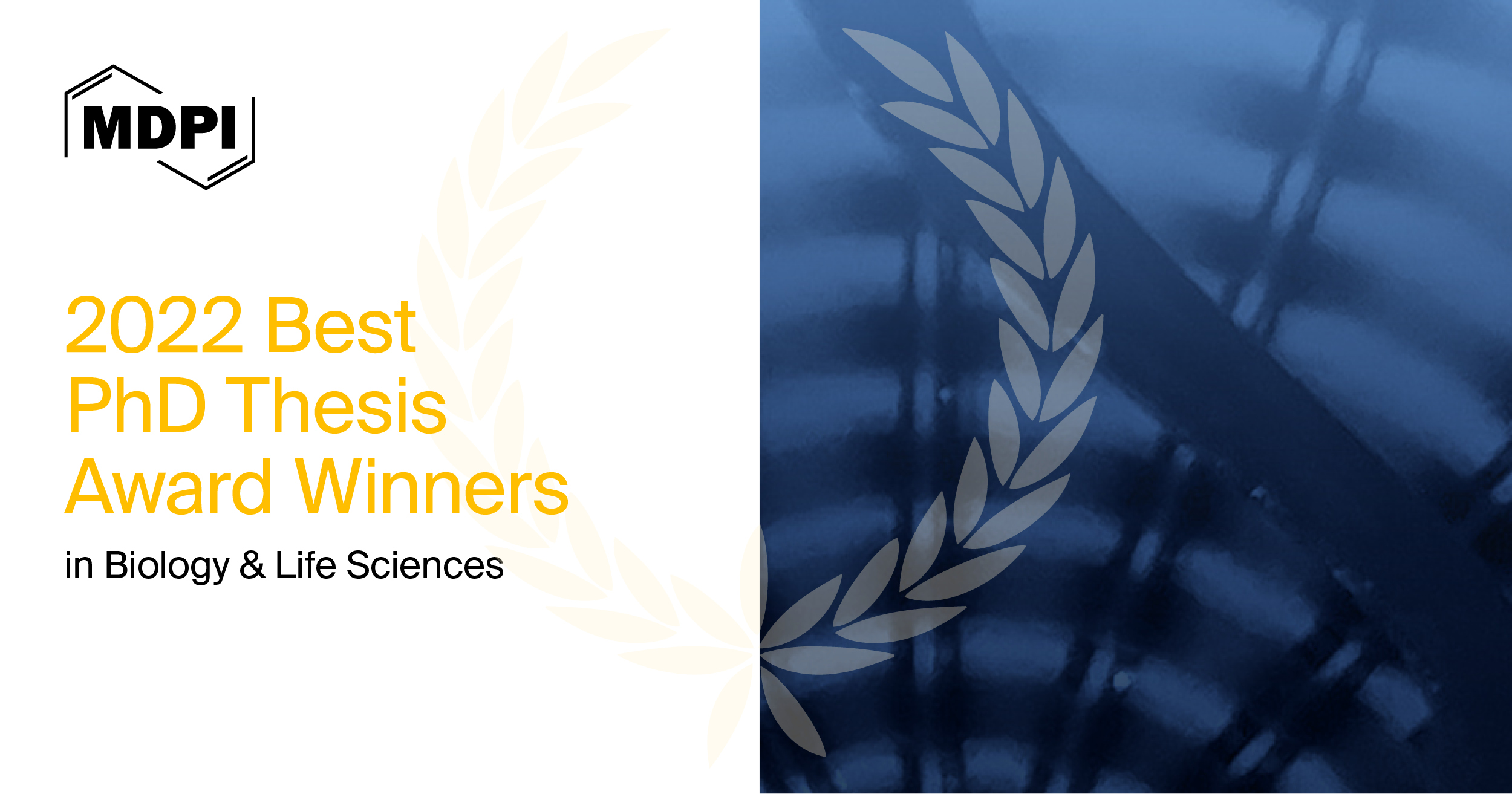
MDPI’s Best PhD Thesis Awards are presented to recognize the young scholars who are judged to have completed the most outstanding PhD thesis in their field of research and to encourage them to continue their outstanding work and further contributions to their field.
We would like to warmly congratulate the winners of the 2022 Best PhD Thesis Awards and wish them success in their future research endeavors. MDPI will continue to enhance communication among scientists.
- “CYP2D in the Brain Alters Response to Drugs and Neurotoxins”
by Marlaina R. Stocco, University of California, USA - “Neural Encoding of Prior Experience in Sensorimotor Behavior”
by Nicolas Meirhaeghe, Institut de Neurosciences de la Timone, France
- “Perinatal Stem Cell: Epigenetic, Biological and Differentiative Characteristics”
by Giulia Gaggi, University "G.D'Annunzio" of Chieti-Pescara, Italy
- “Uncovering the Genetic Variation Involved in Asthma Exacerbations through Multiple Genomic Approaches”
by Esther Herrera Luis, Universidad de La Laguna, Spain
- “Development of Novel Tools for Monitoring Antimicrobial Resistance in Complex Microbial Communities and Their Application to Improving Our Stewardship of Antimicrobials in Livestock”
by Ashenafi Feyisa Beyi, Iowa State University, United States
About MDPI Awards:
In order to reward the academic community, especially young researchers and enhance communication among scientists, MDPI journals regularly offer various awards to researchers in specific fields. These awards, serving as a source of inspiration and recognition, help raise the of talented individuals who have been credited with outstanding achievements and are making a significant contribution to the advancement of their fields.
To explore more MDPI awards, please click here.
14 August 2023
MDPI’s Best Paper Awards in Biology and Life Sciences—Winners Announced in 2022
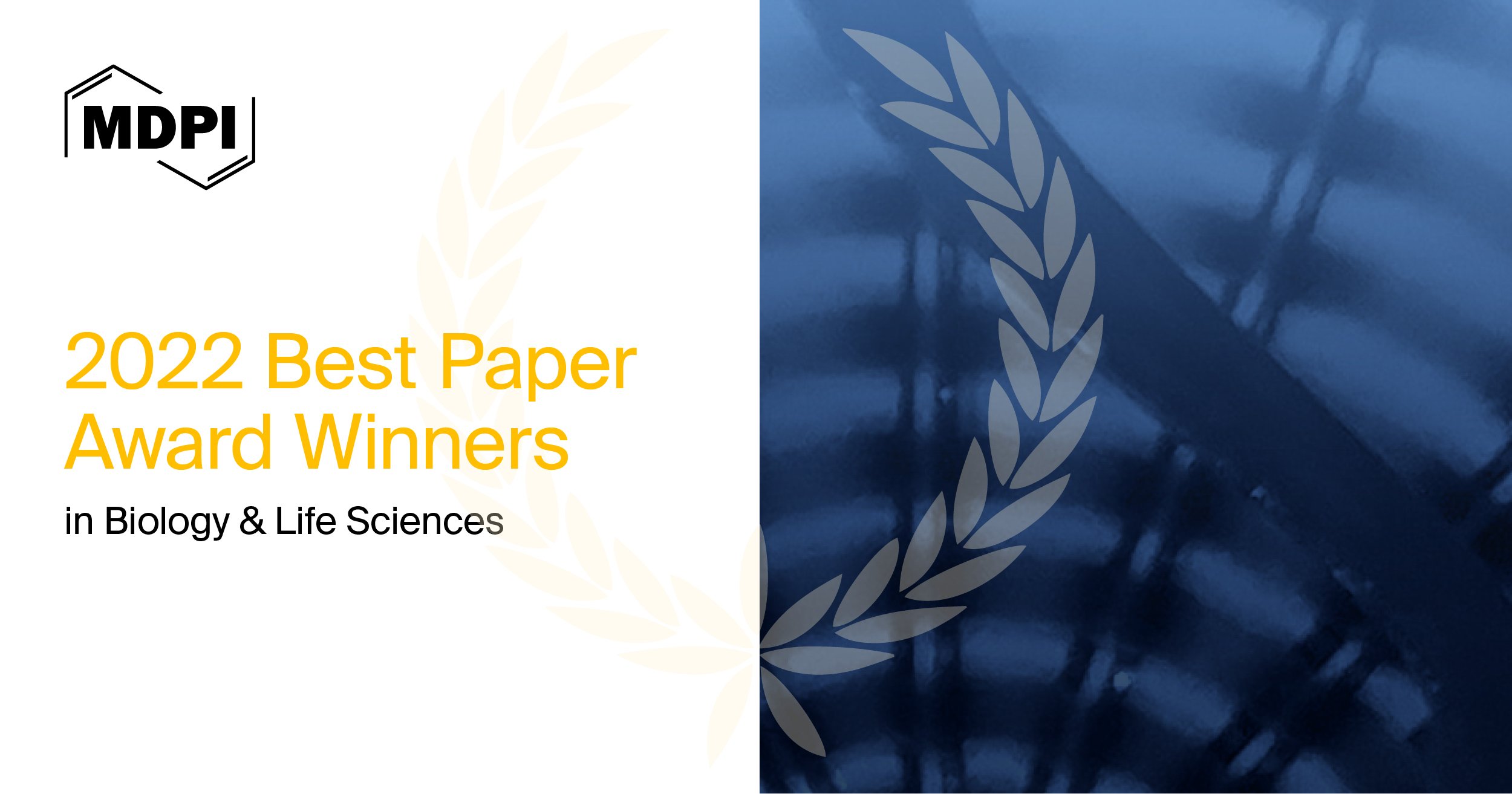
The purpose of our Best Paper Awards is to promote and recognize the most impactful contributions published within MDPI journals.
The editors of each journal carefully selected reviews and research papers through a rigorous judging process based on criteria such as scientific merit, overall impact, and the quality of presentation.
We are honored to present the winners for the year 2022 in biology and life sciences, who were selected amongst extensive competition, and congratulate the authors for their outstanding scientific publications. MDPI will continue to provide support and recognition to the academic community.
- “From Smart Farming towards Agriculture 5.0: A Review on Crop Data Management”
by Verónica Saiz-Rubio and Francisco Rovira-Más
Agronomy 2020, 10(2), 207; https://doi.org/10.3390/agronomy10020207
- “Comparison of Biochemical, Anatomical, Morphological, and Physiological Responses to Salinity Stress in Wheat and Barley Genotypes Deferring in Salinity Tolerance”
by Muhammad Zeeshan, Meiqin Lu, Shafaque Sehar, Paul Holford and Feibo Wu
Agronomy 2020, 10(1), 127; https://doi.org/10.3390/agronomy10010127
- “The Use of a Plant-Based Biostimulant Improves Plant Performances and Fruit Quality in Tomato Plants Grown at Elevated Temperatures”
by Silvana Francesca Carmen Arena, Bruno Hay Mele, Carlo Schettini, Patrizia Ambrosino, Amalia Barone and Maria Manuela Rigano
Agronomy 2020, 10(3), https://doi.org/10.3390/agronomy10030363
- “The Management of Agricultural Waste Biomass in the Framework of Circular Economy and Bioeconomy: An Opportunity for Greenhouse Agriculture in Southeast Spain”
by Mónica Duque-Acevedo, Luis J. Belmonte-Ureña, José A. Plaza-Úbeda and Francisco Camacho-Ferre
Agronomy 2020, 10(4), 489; https://doi.org/10.3390/agronomy10040489
- “Apoptotic Bodies: Particular Extracellular Vesicles Involved in Intercellular Communication”
by Michela Battistelli and Elisabetta Falcieri
Biology 2020, 9(1), 21; https://doi.org/10.3390/biology9010021
- “Vegetation and Environmental Changes on Non-Reclaimed Spoil Heaps in Southern Poland”
by Oimahmad Rahmonov, Robert Krzysztofik, Dorota Środek and Justyna Smolarek-Lach
Biology 2020, 9(7), 164; https://doi.org/10.3390/biology9070164
- “Formyl Peptide Receptor 1 Signaling in Acute Inflammation and Neural Differentiation Induced by Traumatic Brain Injury”
by Roberta Fusco, Enrico Gugliandolo, Rosalba Siracusa, Maria Scuto, Marika Cordaro, Ramona D’Amico, Maurizio Evangelista, Angelo Peli, Alessio Filippo Peritore, Daniela Impellizzeri et al.
Biology 2020, 9(9), 238; https://doi.org/10.3390/biology9090238
- “Cholesterol and Alzheimer’s Disease Risk: A Meta-Meta-Analysis”
by Olalla Sáiz-Vazquez, Alicia Puente-Martínez, Silvia Ubillos-Landa, Joaquín Pacheco-Bonrostro and Javier Santabárbara
Brain Sci. 2020, 10(6), 386; https://doi.org/10.3390/brainsci10060386
- “Psychosocial and Behavioral Impact of COVID-19 in Autism Spectrum Disorder: An Online Parent Survey”
by Marco Colizzi, Elena Sironi, Federico Antonini, Marco Luigi Ciceri, Chiara Bovo and Leonardo Zoccante
Brain Sci. 2020, 10(6), 341; https://doi.org/10.3390/brainsci10060341
- “More Than a Functional Group: Diversity within the Legume–Rhizobia Mutualism and Its Relationship with Ecosystem Function”
by Benton N. Taylor, Ellen L. Simms and Kimberly J. Komatsu
Diversity 2020, 12(2), 50; https://doi.org/10.3390/d12020050
- “A Common Approach to the Conservation of Threatened Island Vascular Plants: First Results in the Mediterranean Basin”
by Giuseppe Fenu, Gianluigi Bacchetta, Charalambos S. Christodoulou, Donatella Cogoni, Christini Fournaraki, Giusso del Galdo Gian Pietro, Panagiota Gotsiou, Angelos Kyratzis, Carole Piazza, Magdalena Vicens et al.
Diversity 2020, 12(4), 157; https://doi.org/10.3390/d12040157
- “Plant Diversity Patterns and Conservation Implications under Climate-Change Scenarios in the Mediterranean: The Case of Crete (Aegean, Greece)”
by Konstantinos Kougioumoutzis, Ioannis P. Kokkoris, Maria Panitsa, Panayiotis Trigas, Arne Strid and Panayotis Dimopoulos
Diversity 2020, 12(7), 270; https://doi.org/10.3390/d12070270
- “Conserving the Diversity of Ecological Interactions: The Role of Two Threatened Macaw Species as Legitimate Dispersers of ‘Megafaunal’ Fruits”
by José L. Tella, Fernando Hiraldo, Erica Pacífico, José A. Díaz-Luque, Francisco V. Dénes, Fernanda M. Fontoura, Neiva Guedes and Guillermo Blanco
Diversity 2020, 12(2), 45; https://doi.org/10.3390/d12020045
- “Genomics in Bacterial Taxonomy: Impact on the Genus Pseudomonas”
by Jorge Lalucat, Magdalena Mulet, Margarita Gomila and Elena García-Valdés
Genes 2020, 11(2), 139; https://doi.org/10.3390/genes11020139
- “Histone Deacetylases (HDACs): Evolution, Specificity, Role in Transcriptional Complexes, and Pharmacological Actionability”
by Giorgio Milazzo, Daniele Mercatelli, Giulia Di Muzio, Luca Triboli, Piergiuseppe De Rosa, Giovanni Perini and Federico M. Giorgi
Genes 2020, 11(5), 556; https://doi.org/10.3390/genes11050556
- “COVID-19 and Genetic Variants of Protein Involved in the SARS-CoV-2 Entry into the Host Cells”
by Andrea Latini, Emanuele Agolini, Antonio Novelli, Paola Borgiani, Rosalinda Giannini, Paolo Gravina, Andrea Smarrazzo, Mario Dauri, Massimo Andreoni, Paola Rogliani et al.
Genes 2020, 11(9), 1010; https://doi.org/10.3390/genes11091010
- “Clustered DNA Double-Strand Breaks: Biological Effects and Relevance to Cancer Radiotherapy”
by Jac A. Nickoloff, Neelam Sharma and Lynn Taylor
Genes 2020, 11(1), 99; https://doi.org/10.3390/genes11010099
- “Inhibition of Angiotensin-Converting Enzyme Ameliorates Renal Fibrosis by Mitigating DPP-4 Level and Restoring Antifibrotic MicroRNAs”
by Swayam Prakash Srivastava, Julie E. Goodwin, Keizo Kanasaki and Daisuke Koya
Genes 2020, 11(2), 211; https://doi.org/10.3390/genes11020211
- “Regulation of Ergosterol Biosynthesis in Saccharomyces cerevisiae”
by Tania Jordá and Sergi Puig
Genes 2020, 11(7), 795; https://doi.org/10.3390/genes11070795
- “Laccase Properties, Physiological Functions, and Evolution”
by Grzegorz Janusz, Anna Pawlik, Urszula Świderska-Burek, Jolanta Polak, Justyna Sulej, Anna Jarosz-Wilkołazka and Andrzej Paszczyński
Int. J. Mol. Sci. 2020, 21(3), 966; https://doi.org/10.3390/ijms21030966
- “Lysosomal Exocytosis, Exosome Release and Secretory Autophagy: The Autophagic- and Endo-Lysosomal Systems Go Extracellular”
by Sandra Buratta, Brunella Tancini, Krizia Sagini, Federica Delo, Elisabetta Chiaradia, Lorena Urbanelli and Carla Emiliani
Int. J. Mol. Sci. 2020, 21(7), 2576; https://doi.org/10.3390/ijms21072576
- “Recent Advances in Lipopolysaccharide Recognition Systems”
by Lalita Mazgaeen and Prajwal Gurung
Int. J. Mol. Sci. 2020, 21(2), 379; https://doi.org/10.3390/ijms21020379
- “Redox Interactions of Vitamin C and Iron: Inhibition of the Pro-Oxidant Activity by Deferiprone”
by Viktor A. Timoshnikov, Tatyana V. Kobzeva, Nikolay E. Polyakov and George J. Kontoghiorghes
Int. J. Mol. Sci. 2020, 21(11), 3967; https://doi.org/10.3390/ijms21113967
- “Modulation of Pro-Oxidant and Pro-Inflammatory Activities of M1 Macrophages by the Natural Dipeptide Carnosine”
by Claudia G. Fresta, Annamaria Fidilio, Giacomo Lazzarino, Nicolò Musso, Margherita Grasso, Sara Merlo, Angela M. Amorini, Claudio Bucolo, Barbara Tavazzi, Giuseppe Lazzarino et al.
Int. J. Mol. Sci. 2020, 21(3), 776; https://doi.org/10.3390/ijms21030776
- “SAAMBE-3D: Predicting Effect of Mutations on Protein–Protein Interactions”
by Swagata Pahari, Gen Li, Adithya Krishna Murthy, Siqi Liang, Robert Fragoza, Haiyuan Yu and Emil Alexov
Int. J. Mol. Sci. 2020, 21(7), 2563; https://doi.org/10.3390/ijms21072563
- “Diversity and Global Distribution of Viruses of the Western Honey Bee, Apis mellifera”
by Alexis Beaurepaire, Niels Piot, Vincent Doublet, Karina Antunez, Ewan Campbell, Panuwan Chantawannakul, Nor Chejanovsky, Anna Gajda, Matthew Heerman and Delphine Panziera
Insects 2020, 11(4), 239; https://doi.org/10.3390/insects11040239
- “Soil Health and Arthropods: From Complex System to Worthwhile Investigation”
by Cristina Menta and Sara Remelli
Insects 2020, 11(1), 54; https://doi.org/10.3390/insects11010054
- “Influence of Temperature on Age-Stage, Two-Sex Life Tables for a Minnesota-Acclimated Population of the Brown Marmorated Stink Bug (Halyomorpha halys)”
by Byju N. Govindan and William D. Hutchison
Insects 2020, 11(2), 108; https://doi.org/10.3390/insects11020108
- “Characterization of Resistance in Gram-Negative Urinary Isolates Using Existing and Novel Indicators of Clinical Relevance: A 10-Year Data Analysis”
by Márió Gajdács, Zoltán Bátori, Marianna Ábrók, Andrea Lázár and Katalin Burián
Life 2020, 10(2), 16; https://doi.org/10.3390/life10020016
- “Neuroprotection or Neurotoxicity of Illicit Drugs on Parkinson’s Disease”
by Carla Ferreira, Catarina Almeida, Sandra Tenreiro and Alexandre Quintas
Life 2020, 10(6), 86; https://doi.org/10.3390/life10060086
- “Carbonic Anhydrase Inhibitors Targeting Metabolism and Tumor Microenvironment”
by Andrea Angeli, Fabrizio Carta, Alessio Nocentini, Jean-Yves Winum, Raivis Zalubovskis, Atilla Akdemir, Valentina Onnis, Wagdy M. Eldehna, Clemente Capasso, Giuseppina De Simone et al.
Metabolites 2020, 10(10), 412; https://doi.org/10.3390/metabo10100412
- “MetaboAnalystR 3.0: Toward an Optimized Workflow for Global Metabolomics”
by Zhiqiang Pang, Jasmine Chong, Shuzhao Li and Jianguo Xia
Metabolites 2020, 10(5), 186; https://doi.org/10.3390/metabo10050186
- “Tryptophan Metabolism, Inflammation, and Oxidative Stress in Patients with Neurovascular Disease”
by Martin Hajsl, Alzbeta Hlavackova, Karolina Broulikova, Martin Sramek, Martin Maly, Jan E. Dyr and Jiri Suttnar
Metabolites 2020, 10(5), 208; https://doi.org/10.3390/metabo10050208
- “Production and Purification of Artificial Circular RNA Sponges for Application in Molecular Biology and Medicine”
by Janina Breuer and Oliver Rossbach
Methods Protoc. 2020, 3(2), 42; https://doi.org/10.3390/mps3020042
- “Effectiveness of Chemical Compounds Used against African Swine Fever Virus in Commercial Available Disinfectants”
by Małgorzata Juszkiewicz, Marek Walczak, Natalia Mazur-Panasiuk and Grzegorz Woźniakowski
Pathogens 2020, 9(11), 878; https://doi.org/10.3390/pathogens9110878
- “Betanodavirus and VER Disease: A 30-year Research Review”
by Isabel Bandín and Sandra Souto
Pathogens 2020, 9(2), 106; https://doi.org/10.3390/pathogens9020106
- “The Bradyzoite: A Key Developmental Stage for the Persistence and Pathogenesis of Toxoplasmosis”
by Aude Cerutti, Nicolas Blanchard and Sébastien Besteiro
Pathogens 2020, 9(3), 234; https://doi.org/10.3390/pathogens9030234
- “Understanding Flavivirus Capsid Protein Functions: The Tip of the Iceberg”
by Stephanea Sotcheff and Andrew Routh
Pathogens 2020, 9(1), 42; https://doi.org/10.3390/pathogens9010042
- “Photosynthetic Metabolism under Stressful Growth Conditions as a Bases for Crop Breeding and Yield Improvement”
by Fermín Morales, María Ancín, Dorra Fakhet, Jon González-Torralba, Angie L. Gámez, Amaia Seminario, David Soba, Sinda Ben Mariem, Miguel Garriga and Iker Aranjuelo
Plants 2020, 9(1), 88; https://doi.org/10.3390/plants9010088
- “Plant Roots Release Small Extracellular Vesicles with Antifungal Activity”
by Monica De Palma, Alfredo Ambrosone, Antonietta Leone, Pasquale Del Gaudio, Michelina Ruocco, Lilla Turiák, Ramesh Bokka, Immacolata Fiume, Marina Tucci and Gabriella Pocsfalvi
Plants 2020, 9(12), 1777; https://doi.org/10.3390/plants9121777
- “Feeding Behavior and Virus-transmission Ability of Insect Vectors Exposed to Systemic Insecticides”
by Elisa Garzo, Aránzazu Moreno, María Plaza and Alberto Fereres
Plants 2020, 9(7), 895; https://doi.org/10.3390/plants9070895
- “Transcriptome Analyses and Antioxidant Activity Profiling Reveal the Role of a Lignin-Derived Biostimulant Seed Treatment in Enhancing Heat Stress Tolerance in Soybean”
by Cristina Campobenedetto, Giuseppe Mannino, Chiara Agliassa, Alberto Acquadro, Valeria Contartese, Christian Garabello and Cinzia Margherita Bertea
Plants 2020, 9(10), 1308; https://doi.org/10.3390/plants9101308
- “Aflatoxin Biosynthesis and Genetic Regulation: A Review”
by Isaura Caceres, Anthony Al Khoury, Rhoda El Khoury, Sophie Lorber, Isabelle P. Oswald, André El Khoury, Ali Atoui, Olivier Puel and Jean-Denis Bailly
Toxins 2020, 12(3), 150; https://doi.org/10.3390/toxins12030150
- “Diet Breadth Mediates the Prey Specificity of Venom Potency in Snakes”
by Keith Lyons, Michel M. Dugon and Kevin Healy
Toxins 2020, 12(2), 74; https://doi.org/10.3390/toxins12020074
- “Rapid Quantification of SARS-CoV-2-Neutralizing Antibodies Using Propagation-Defective Vesicular Stomatitis Virus Pseudotypes”
by Ferdinand Zettl, Toni Luise Meister, Tanja Vollmer, Bastian Fischer, Jörg Steinmann, Adalbert Krawczyk, Philip V’kovski, Daniel Todt, Eike Steinmann, Stephanie Pfaender et al.
Vaccines 2020, 8(3), 386; https://doi.org/10.3390/vaccines8030386
- “Influences on Attitudes Regarding Potential COVID-19 Vaccination in the United States”
by Kendall Pogue, Jamie L. Jensen, Carter K. Stancil, Daniel G. Ferguson, Savannah J. Hughes, Emily J. Mello, Ryan Burgess, Bradford K. Berges, Abraham Quaye and Brian D. Poole
Vaccines 2020, 8(4), 582; https://doi.org/10.3390/vaccines8040582
- “Recent Progress on the Versatility of Virus-Like Particles”
by Ciying Qian, Xinlin Liu, Qin Xu, Zhiping Wang, Jie Chen, Tingting Li, Qingbing Zheng, Hai Yu, Ying Gu, Shaowei Li et al.
Vaccines 2020, 8(1), 139; https://doi.org/10.3390/vaccines8010139
- “COVID-19: Mechanisms of Vaccination and Immunity”
by Daniel E. Speiser and Martin F. Bachmann
Vaccines 2020, 8(3), 404; https://doi.org/10.3390/vaccines8030404
- “Manure as a Potential Hotspot for Antibiotic Resistance Dissemination by Horizontal Gene Transfer Events”
by Tiago Lima, Sara Domingues and Gabriela Jorge Da Silva
Vet. Sci. 2020, 7(3), 110; https://doi.org/10.3390/vetsci7030110
- “Seasonality of Nosema ceranae Infections and Their Relationship with Honey Bee Populations, Food Stores, and Survivorship in a North American Region”
by Berna Emsen, Alvaro De la Mora, Brian Lacey, Les Eccles, Paul G. Kelly, Carlos A. Medina-Flores, Tatiana Petukhova, Nuria Morfin and Ernesto Guzman-Novoa
Vet. Sci. 2020, 7(3), 131; https://doi.org/10.3390/vetsci7030131
About MDPI Awards:
In order to reward the academic community, especially young researchers and enhance communication among scientists, MDPI journals regularly offer various awards to researchers in specific fields. These awards, serving as a source of inspiration and recognition, help raise the influence of talented individuals who have been credited with outstanding achievements and are making a significant contribution to the advancement of their fields.
To explore more MDPI awards, please click here.
10 August 2023
Recruiting Editorial Board Members for Beverages
We are recruiting Editorial Board members for Beverages (IF: 3.5, ISSN: 2306-5710). If you are active in the field and are passionate about promoting the publication of cutting-edge research, please contact the Beverages Editorial Office (beverages@mdpi.com) to apply.
Beverages is an international, peer-reviewed, open access journal on beverage research and development published online quarterly by MDPI. The aims and scope of the journal can be found at the following website: https://www.mdpi.com/journal/beverages/about.
As an Editorial Board Member, you will have the following responsibilities:
- Attending Board meetings to advise on journal development strategy;
- Setting up at least one Special Issue on a topic related to your research interests (or supervising Special Issues related to your research field);
- Pre-screening and making decisions on new submissions in your research interests (about one per month or fewer);
- Inviting and contributing high-quality papers;
- Helping to promote the journal among your peers or at conferences.
As an Editorial Board Member, you would have the following privileges:
- A certificate of recognition as an Editorial Board Member of Beverages;
- Publishing one paper free of charge per year in Beverages;
- Inviting senior authors to submit high-quality papers to be published in Beverages with certain discounts;
- Applying for travel grants if you attend some conferences and help promote the journal.
For further information, please do not hesitate to contact the Editorial Office (beverages@mdpi.com). We look forward to collaborating with you.
10 August 2023
Beverages | Call for Special Issue Proposals and Recruiting Guest Editors
Beverages (IF: 3.5, ISSN: 2306-5710) is an international, peer-reviewed, open access journal on beverage research and development published online quarterly by MDPI. The journal is indexed within Scopus, ESCI (Web of Science), FSTA, CAPlus / SciFinder, PubAg, and other databases.
The Beverages editorial team is pleased to announce this open call for Special Issue proposals, which offers a group of authors the opportunity to work on an interconnected set of papers on an innovative topic. We are soliciting high-quality proposals that will be evaluated in a continuous selection process throughout the year.
Proposals within the scope of the journal are welcome. For more details, please see: https://www.mdpi.com/journal/beverages/about.
If you would like to propose a Special Issue topic for this journal, please contact the Beverages Editorial Office (beverages@mdpi.com) or complete and submit the form at the following link: https://www.mdpi.com/journalproposal/sendproposalspecialissue/beverages. Our editors will respond to you swiftly.
The following information should be provided in the proposal:
- A 150–200-word summary defining the scope of the Special Issue;
- A list of 5–10 keywords on the topic;
- A brief resume of the proposed Guest Editors, together with their information (title, name, email, affiliation, personal website, and keywords of interests).
The responsibilities of being a Guest Editor are as follows:
- Refining the scope of the Special Issue;
- Inviting submissions;
- Promoting the Special Issue via social media, personal websites, relevant networks, or related conferences;
- Pre-checking and making academic decisions based on peer-reviewed reports collected by the Editorial Office.
The benefits of being a Guest Editor are as follows:
- Special discounts will be offered for your submissions and any articles you invite;
- Expanding your network by engaging with experts in the field;
- Keeping up with developments in the field;
- Increasing your own influence;
- Receiving recognition by the promotion evaluation committee;
- If 10 or more papers are published in the Special Issue, it can be published as a printable book, and each Guest Editor will receive a hard copy.
The Editorial Office will take care of setting up the Special Issue website and will arrange the promotional materials, assist with the call for papers, and take care of administrative tasks associated with the peer review process and professional production before publication.
If this is of interest to you, please do not hesitate to contact the Editorial Office (beverages@mdpi.com) for further details and clarification.
We look forward to receiving your proposals.
Beverages Editorial Office
2 August 2023
Recruiting Topical Advisory Panel Members for Nutrients
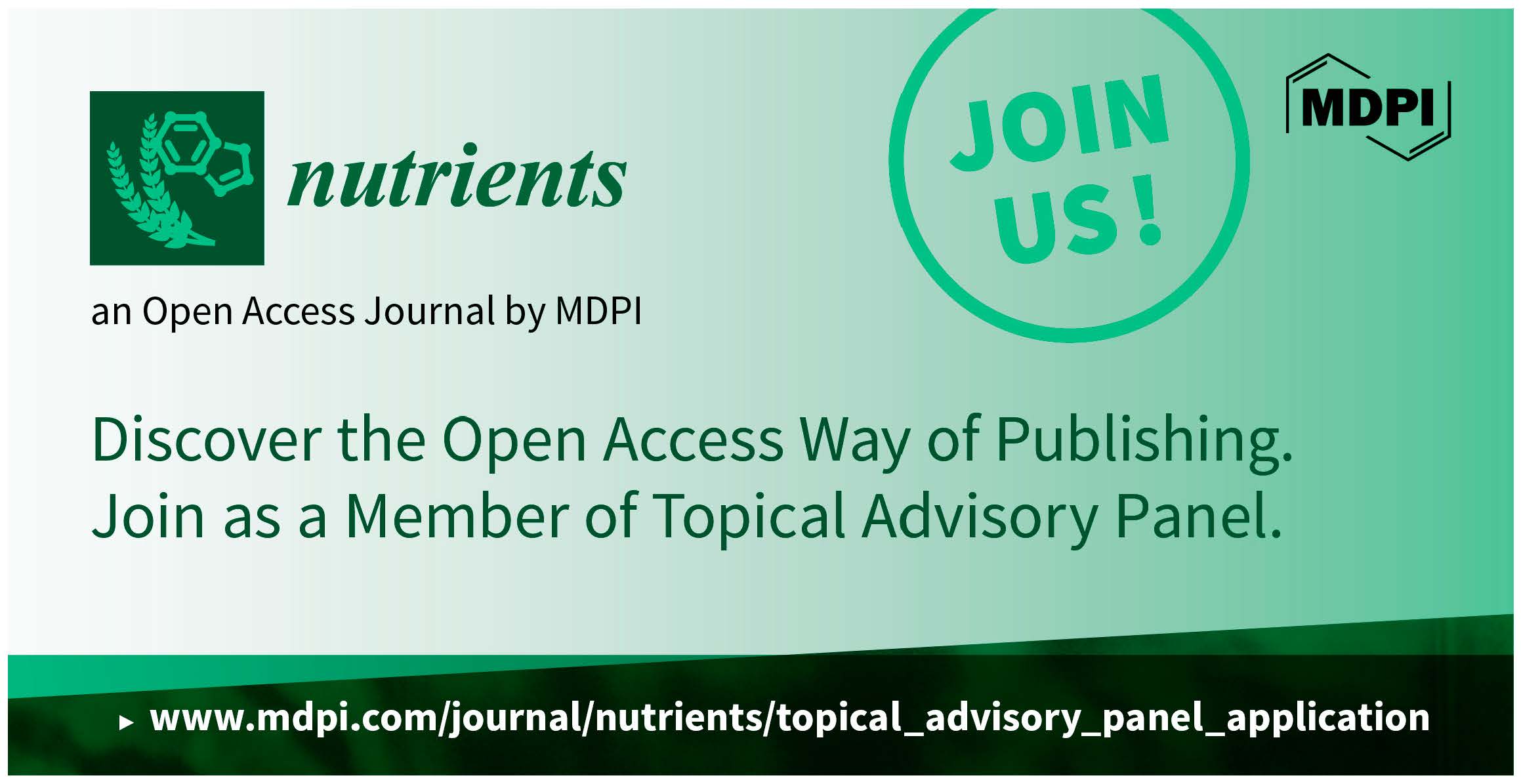
The journal Nutrients (ISSN: 2072-6643) is recruiting candidates for a new position–a Topical Advisory Panel Member. The main responsibility of the new members of the Topical Advisory Panel will be to regularly provide support to Guest Editors, Topic Editors, and Section Board Members. The other responsibilities of Topical Advisory Panel Members are available at the following link: https://www.mdpi.com/editors.
Nutrients is an international, peer-reviewed, open access, advanced forum for publishing studies related to human nutrition, and it is published semimonthly online by MDPI. The Asia Pacific Nutrigenomics Nutrigenetics Organisation (APNNO), Italian Society for Pediatric Nutrition and Gastroenterology (SIGENP), Nutrition Society of New Zealand (NSNZ), Ocular Wellness and Nutrition Society (OWNS) and others are affiliated with Nutrients. The aims and scope of the journal can be found at the following link: https://www.mdpi.com/journal/nutrients/about.
Each year, the members’ performance is evaluated and outstanding members will be promoted to the Editorial Board by the Editor-in-Chief.
To qualify as a Topical Advisory Panel Member, applicants must meet the following criteria:
- Have expertise and experience in a field related to the journal;
- Have published at least six papers in the last 5 years where they are a first author or corresponding author;
- Currently hold an independent research position in academia or a government institute.
2 August 2023
Recruiting Reviewer Board Members for Nutrients

We are recruiting Reviewer Board Members for Nutrients (ISSN: 2072-6643). If you are an active researcher in the field and are passionate about promoting the publication of cutting-edge research, please contact the Nutrients Editorial Office (nutrients@mdpi.com) to apply for this role.
Nutrients is an international, peer-reviewed, open access, advanced forum for publishing studies related to human nutrition, and it is published semimonthly online by MDPI. The Asia Pacific Nutrigenomics Nutrigenetics Organisation (APNNO), Italian Society for Pediatric Nutrition and Gastroenterology (SIGENP), Nutrition Society of New Zealand (NSNZ), Ocular Wellness and Nutrition Society (OWNS) and others are affiliated with Nutrients. The aims and scope of the journal can be found at the following link: https://www.mdpi.com/journal/nutrients/about.
Nutrients considers submissions focusing on, although not limited to, the following subject areas: macronutrients; micronutrients; essential nutrients; bioactive nutrients; nutrient requirements; nutrient sources; human nutrition aspects; functional foods; nutraceuticals; health claims; public health; diet-related disorders; metabolic syndrome; malnutrition; nutritional supplements; sport nutrition; nutritional status and body composition; bariatric surgery; sarcopenia; nutritional physiology; nutrigenomics.
The benefits of joining our Reviewer Board are as follows:
- We will announce your entry information on the journal's Reviewer Board;
- We award discounts for comprehensive and timely reviews. These vouchers can be used for all MDPI journals;
- You will receive a personalized reviewer certificate;
- Review frequency is flexible and based on your schedule;
- You can showcase your peer reviews and editorial contributions to our journal readers.
28 July 2023
Nutrients | Invitation to Read the Updated Editor's Choice Articles Published in 2021, 2022 and 2023
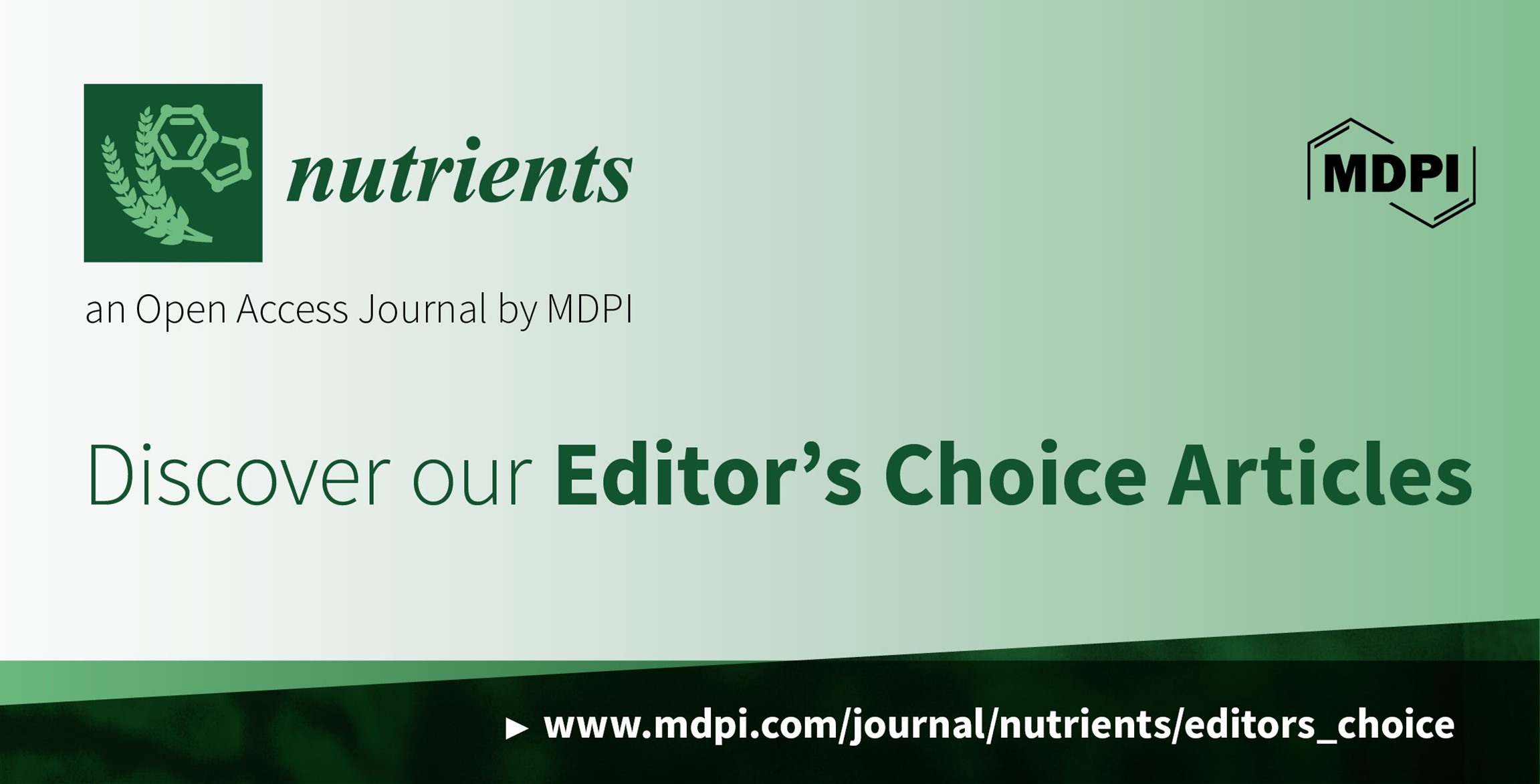
Editor's Choice Articles are selected based on suggestions from Nutrients’ academic editors around the world. The editors select a small number of recently published articles that they consider to be of particular interest to our readers or important in their respective fields of research. We are delighted to present the 2021–2023 Editor's Choice Articles, a curated list of high-quality articles from Nutrients (ISSN: 2072-6643). The full list of Editor's Choice Articles can be seen at the following link: https://www.mdpi.com/journal/nutrients/editors_choice.
“The Effect of Dietary Polyphenols on Vascular Health and Hypertension: Current Evidence and Mechanisms of Action”
by Giuseppe Grosso, Justyna Godos, Walter Currenti, Agnieszka Micek, Luca Falzone, Massimo Libra, Francesca Giampieri, Tamara Y. Forbes-Hernández, José L. Quiles, Maurizio Battino et al.
Nutrients 2022, 14(3), 545; https://doi.org/10.3390/nu14030545
Available online: https://www.mdpi.com/2072-6643/14/3/545
Cited by 40 | Viewed by 5405
“Oleanolic Acid: Extraction, Characterization and Biological Activity”
by José M. Castellano, Sara Ramos-Romero and Javier S. Perona
Nutrients 2022, 14(3), 623; https://doi.org/10.3390/nu14030623
Available online: https://www.mdpi.com/2072-6643/14/3/623
Cited by 42 | Viewed by 6370
“Nutraceuticals for Dyslipidaemia and Glucometabolic Diseases: What the Guidelines Tell Us (and Do Not Tell, Yet)”
by Manuela Casula, Alberico Luigi Catapano and Paolo Magni
Nutrients 2022, 14(3), 606; https://doi.org/10.3390/nu14030606
Available online: https://www.mdpi.com/2072-6643/14/3/606
Cited by 5 | Viewed by 2482
“Plant-Based Meat Alternatives: Technological, Nutritional, Environmental, Market, and Social Challenges and Opportunities”
by Giulia Andreani, Giovanni Sogari, Alessandra Marti, Federico Froldi, Hans Dagevos and Daniela Martini
Nutrients 2023, 15(2), 452; https://doi.org/10.3390/nu15020452
Available online: https://www.mdpi.com/2072-6643/15/2/452
Cited by 10 | Viewed by 9441
“The Role of Gut Microbiota and Metabolites in Obesity-Associated Chronic Gastrointestinal Disorders”
by Maafi R. Islam, Subha Arthur, Jennifer Haynes, Molly R. Butts, Niraj Nepal and Uma Sundaram
Nutrients 2022, 14(3), 624; https://doi.org/10.3390/nu14030624
Available online: https://www.mdpi.com/2072-6643/14/3/624
Cited by 9 | Viewed by 3715
“Emerging Roles of Vitamin D-Induced Antimicrobial Peptides in Antiviral Innate Immunity”
by John H. White
Nutrients 2022, 14(2), 284; https://doi.org/10.3390/nu14020284
Available online: https://www.mdpi.com/2072-6643/14/2/284
Cited by 30 | Viewed by 5970
“Role of Probiotics in the Management of COVID-19: A Computational Perspective”
by Quang Vo Nguyen, Li Chuin Chong, Yan-Yan Hor, Lee-Ching Lew, Irfan A. Rather and Sy-Bing Choi
Nutrients 2022, 14(2), 274; https://doi.org/10.3390/nu14020274
Available online: https://www.mdpi.com/2072-6643/14/2/274
Cited by 29 | Viewed by 6889
“Lutein and Zeaxanthin and Their Roles in Age-Related Macular Degeneration—Neurodegenerative Disease”
by Małgorzata Mrowicka, Jerzy Mrowicki, Ewa Kucharska and Ireneusz Majsterek
Nutrients 2022, 14(4), 827; https://doi.org/10.3390/nu14040827
Available online: https://www.mdpi.com/2072-6643/14/4/827
Cited by 31 | Viewed by 9313
“Microplastics: A Real Global Threat for Environment and Food Safety: A State of the Art Review”
by Khaled Ziani, Corina-Bianca Ioniță-Mîndrican, Magdalena Mititelu, Sorinel Marius Neacșu, Carolina Negrei, Elena Moroșan, Doina Drăgănescu and Olivia-Teodora Preda
Nutrients 2023, 15(3), 617; https://doi.org/10.3390/nu15030617
Available online: https://www.mdpi.com/2072-6643/15/3/617
Cited by 9 | Viewed by 4981
“Vitamin D and Its Target Genes”
by Carsten Carlberg
Nutrients 2022, 14(7), 1354; https://doi.org/10.3390/nu14071354
Available online: https://www.mdpi.com/2072-6643/14/7/1354
Cited by 28 | Viewed by 3333
“Biological Properties of Vitamins of the B-Complex, Part 1: Vitamins B1, B2, B3, and B5”
by Marcel Hrubša, Tomáš Siatka, Iveta Nejmanová, Marie Vopršalová, Lenka Kujovská Krčmová, Kateřina Matoušová, Lenka Javorská, Kateřina Macáková, Laura Mercolini, Fernando Remião et al.
Nutrients 2022, 14(3), 484; https://doi.org/10.3390/nu14030484
Available online: https://www.mdpi.com/2072-6643/14/3/484
Cited by 27 | Viewed by 12126
“Anti-Inflammatory Nutrients and Obesity-Associated Metabolic-Inflammation: State of the Art and Future Direction”
by Giuseppe Grosso, Daniela Laudisio, Evelyn Frias-Toral, Luigi Barrea, Giovanna Muscogiuri, Silvia Savastano and Annamaria Colao
Nutrients 2022, 14(6), 1137; https://doi.org/10.3390/nu14061137
Available online: https://www.mdpi.com/2072-6643/14/6/1137
Cited by 27 | Viewed by 7731
“Polyphenols and Human Health: The Role of Bioavailability”
by Chiara Di Lorenzo, Francesca Colombo, Simone Biella, Creina Stockley and Patrizia Restani
Nutrients 2021, 13(1), 273; https://doi.org/10.3390/nu13010273
Available online: https://www.mdpi.com/2072-6643/13/1/273
Cited by 245 | Viewed by 12756
“Effect of Dietary Protein and Processing on Gut Microbiota—A Systematic Review”
by Shujian Wu, Zuhaib F. Bhat, Rochelle S. Gounder, Isam A. Mohamed Ahmed, Fahad Y. Al-Juhaimi, Yu Ding and Alaa E. -D. A. Bekhit
Nutrients 2022, 14(3), 453; https://doi.org/10.3390/nu14030453
Available online: https://www.mdpi.com/2072-6643/14/3/453
Cited by 25 | Viewed by 6052
“Effects of Diet, Lifestyle, Chrononutrition and Alternative Dietary Interventions on Postprandial Glycemia and Insulin Resistance”
by Emilia Papakonstantinou, Christina Oikonomou, George Nychas and George D. Dimitriadis
Nutrients 2022, 14(4), 823; https://doi.org/10.3390/nu14040823
Available online: https://www.mdpi.com/2072-6643/14/4/823
Cited by 29 | Viewed by 11026
“The Role of Diet in Prognosis among Cancer Survivors: A Systematic Review and Meta-Analysis of Dietary Patterns and Diet Interventions”
by Carlota Castro-Espin and Antonio Agudo
Nutrients 2022, 14(2), 348; https://doi.org/10.3390/nu14020348
Available online: https://www.mdpi.com/2072-6643/14/2/348
Cited by 25 | Viewed by 8035
“The Role of Minerals in the Optimal Functioning of the Immune System”
by Christopher Weyh, Karsten Krüger, Peter Peeling and Lindy Castell
Nutrients 2022, 14(3), 644; https://doi.org/10.3390/nu14030644
Available online: https://www.mdpi.com/2072-6643/14/3/644
Cited by 31 | Viewed by 7791
“Curcumin, Quercetin, Catechins and Metabolic Diseases: The Role of Gut Microbiota”
by Umair Shabbir, Momna Rubab, Eric Banan-Mwine Daliri, Ramachandran Chelliah, Ahsan Javed and Deog-Hwan Oh
Nutrients 2021, 13(1), 206; https://doi.org/10.3390/nu13010206
Available online: https://www.mdpi.com/2072-6643/13/1/206
Cited by 119 | Viewed by 12391
“Healthy Aging and Dietary Patterns”
by Ligia J. Dominguez, Nicola Veronese, Eleonora Baiamonte, Martina Guarrera, Angela Parisi, Chiara Ruffolo, Federica Tagliaferri and Mario Barbagallo
Nutrients 2022, 14(4), 889; https://doi.org/10.3390/nu14040889
Available online: https://www.mdpi.com/2072-6643/14/4/889
Cited by 22 | Viewed by 7614
“The Mediterranean Diet: An Update of the Clinical Trials”
by Mauro Finicelli, Anna Di Salle, Umberto Galderisi and Gianfranco Peluso
Nutrients 2022, 14(14), 2956; https://doi.org/10.3390/nu14142956
Available online: https://www.mdpi.com/2072-6643/14/14/2956
Cited by 26 | Viewed by 4669
“The Role of Macronutrients, Micronutrients and Flavonoid Polyphenols in the Prevention and Treatment of Osteoporosis”
by Monika Martiniakova, Martina Babikova, Vladimira Mondockova, Jana Blahova, Veronika Kovacova and Radoslav Omelka
Nutrients 2022, 14(3), 523; https://doi.org/10.3390/nu14030523
Available online: https://www.mdpi.com/2072-6643/14/3/523
Cited by 23 | Viewed by 6638
“Intermittent Fasting and Metabolic Health”
by Izzah Vasim, Chaudry N. Majeed and Mark D. DeBoer
Nutrients 2022, 14(3), 631; https://doi.org/10.3390/nu14030631
Available online: https://www.mdpi.com/2072-6643/14/3/631
Cited by 20 | Viewed by 19097
“Longitudinal Weight Gain and Related Risk Behaviors during the COVID-19 Pandemic in Adults in the US”
by Surabhi Bhutani, Michelle R. vanDellen and Jamie A. Cooper
Nutrients 2021, 13(2), 671; https://doi.org/10.3390/nu13020671
Available online: https://www.mdpi.com/2072-6643/13/2/671
Cited by 103 | Viewed by 9247
“Deprescribing Leads to Improved Energy Intake among Hospitalized Older Sarcopenic Adults with Polypharmacy after Stroke”
by Ayaka Matsumoto, Yoshihiro Yoshimura, Hidetaka Wakabayashi, Eiji Kose, Fumihiko Nagano, Takahiro Bise, Yoshifumi Kido, Sayuri Shimazu and Ai Shiraishi
Nutrients 2022, 14(3), 443; https://doi.org/10.3390/nu14030443
Available online: https://www.mdpi.com/2072-6643/14/3/443
Cited by 19 | Viewed by 3033
“Effect of Probiotics on Psychiatric Symptoms and Central Nervous System Functions in Human Health and Disease: A Systematic Review and Meta-Analysis”
by Charlotte Le Morvan de Sequeira, Charlotte Hengstberger, Paul Enck and Isabelle Mack
Nutrients 2022, 14(3), 621; https://doi.org/10.3390/nu14030621
Available online: https://www.mdpi.com/2072-6643/14/3/621
Cited by 20 | Viewed by 5945
27 July 2023
MDPI Insights: The CEO’s Letter #2 - Open Peer-Review and IJERPH

Welcome to the MDPI Insights: The CEO's Letter.
In these monthly letters, I will showcase two key aspects of our work at MDPI: our commitment to empowering researchers and our determination to facilitating open scientific exchange.
Opening Thoughts

Open Peer Review Reports
Continuing the topic of openness from my inaugural monthly CEO letter, in these Opening Thoughts, I highlight the growth and importance of open peer-review reports at MDPI. Open peer reports align with the principles of open science, making the publishing process more transparent and facilitating rigorous peer review.
MDPI journals operate an open peer-review option by default, allowing authors to publish review reports and author responses (often referred to as open reports) together with the published paper. Publishing the reviewer reports and author responses together with the article provides greater transparency and trust for readers, as this allows them to track the editorial decision-making process. Open peer-review also encourages reviewers and editors to provide high-quality comments, as these will be made public if the article is accepted for publication.
Start and Growth of Open Peer Review at MDPI
The MDPI journal Life was a pioneer in offering this opportunity to its authors in 2014. The first MDPI article with peer-review reports openly published was a review by the Nobel Laureate Werner Arber, in which the review reports were published as supplementary material. By 2018, open peer-review was available across all MDPI journals. As such, MDPI authors have embraced the open peer-review model, providing a steady increase in the number of MDPI articles. As of 2023, approximately one-third (34.0%) of MDPI articles were published with open review reports.
As at July 2023, the percentage of MDPI articles published with open peer review has increased to 36.2% of the total papers published in 2023 so far, indicating ongoing growth in adoption.
Open peer review continues to play a critical role in the assessment of the peer-review process in Life. For further insights, please see the recent editorial by Dr. Pabulo Henrique Rampelotto, the former Editor-in-Chief of Life, who spearheaded the implementation of the open peer-review process.
Benefits of Open Peer Review
The benefits of open peer review include increased transparency, trust and constructive feedback. To promote open communication further and increase the robustness of the peer-review process, we encourage reviewers to sign their reports so that their name appears on the review report (this process is referred to as open identity). The default option is for reviewers to remain anonymous; however, by signing the reports, reviewers receive direct credit for their contribution to the peer-review process and show their commitment towards open science.
As the leading open access publisher, MDPI remains committed to promoting open peer-review and encourages authors to choose this approach. Our goal is to provide a rigorous and transparent peer-review process that benefits the scientific community, and we believe that open peer-review is a vital step in fostering openness and collaboration in scientific communication.
Impactful Research

MDPI Papers Cited in the News – IJERPH edition
Every month, our corporate marketing team compiles data from Altmetrics to create a list of MDPI papers that have been cited in the news. This list continues to grow as renowned news outlets regularly reference research published by MDPI in their articles.
During 2022, a total of 111,965 MDPI research papers were mentioned in prominent news outlets such as National Geographic, The Washington Post, Forbes, The Guardian, the BBC, CNN, Time, and Harvard Business Review.
Highly Cited Journal Publications
IJERPH, known for publishing impactful research, received the most news mentions among all MDPI journals in 2022, based on Altmetrics data:
- International Journal of Environmental Research and Public Health: 3509 mentions
- Nutrients: 2698 mentions
- International Journal of Molecular Sciences: 1701 mentions
- Journal of Clinical Medicine: 1131 mentions
- Viruses: 1111 mentions
These numbers show the recognition and impact of the articles published in IJERPH. For a more detailed view of the journal’s most cited and viewed papers, you can visit here. In total, IJERPH has garnered over 28,000 mentions in prominent news outlets, and as at July 2023, an impressive count of over 17,000 papers cited 10 times or more. These figures highlight the impactful contribution of IJERPH publications to the scientific community.
Example of Recent Mentions
During May and June 2023, a noteworthy selection of articles from IJERPH was cited in news articles, including:
The Washington Post: “Bringing nature inside can improve your health. Here’s how to do it.”
IJERPH paper: “Physiological Benefits of Viewing Nature: A Systematic Review of Indoor Experiments”
Harvard Business Review: “How to Take Better Breaks at Work, According to Research”
IJERPH paper: “Canine-Assisted Therapy Improves Well-Being in Nurses”
National Geographic: “Lyme disease is spreading fast—but a vaccine may be on the way”
IJERPH paper: “Range Expansion of Tick Disease Vectors in North America: Implications for Spread of Tick-Borne Disease”
Inside MDPI

MDPI Develops an Artificial Intelligence Tool to Enhance the Peer-Review Process
At MDPI, we believe that rigorous peer-review is the corner-stone of high-quality academic publishing. We are grateful to the scholars who generously dedicate their time to peer-review articles submitted to MDPI journals. Their contributions are invaluable to the advancement of science.
Peer-review is a critical part of the publication process, ensuring that MDPI upholds the highest quality standards for the papers we publish. Every manuscript submitted to our journals undergoes a comprehensive peer-review process conducted by subject-matter experts.
To further enhance our peer-review process, our Data Analytics team has developed an Artificial Intelligence (AI) tool designed to support the selection of reviewers. This proprietary tool utilizes Natural Language Processing (NLP), a specially designed AI language model, to extract information from the title and abstract of submitted papers. It then searches our database for similar manuscripts and suggests potential reviewers based on this analysis. Integrated with MDPI's submission system (SuSy), the AI tool cross-references the suggested candidates with our reviewer database to verify their invitation status and availability.
The goal of this tool is to provide better targeted peer-review invitations, reducing the number of emails sent for each paper and increasing the efficiency of our editorial staff.
In the near future, our Data Analytics team plans to deploy similar AI projects to improve other critical aspects of our services, offering an enhanced experience to our authors and readers.
Click here to learn about MDPI’s review process, including procedures, responsibilities, and benefits.
Read more:
Coming Together for Science
The Future of IJERPH

On 5 July 2023, Prof. Dr. Paul B. Tchounwou, the founding Editor-in-Chief of IJERPH, along with five Section Editors in Chief (Prof. Dr. Germán Vicente-Rodríguez, Prof. Dr. Karl Goodkin, Prof. Dr. William A. Toscano, Prof. Dr. Jimmy T. Efird, and Prof. Dr. William Douglas Evans), gathered in Basel to discuss the future of the journal. The meeting provided an opportunity to address the recent decision by The Web of Science to delist IJERPH due to the journal failing the Content Relevance criterion, and propose best strategies that will ensure high scientific rigor as well as a clear scope and aim of IJERPH, going forward.
While the delisting is disappointing for IJERPH, as well as for our authors, academic editors, and the entire scientific community supporting our journal, we see it as an opportunity to reflect and prepare for the future direction of the journal.
Since its launch in 2004, IJERPH’s vision and mission have evolved to be more complete and comprehensive in engaging scientific communities. In light of this, we will refresh the journal’s aims and scope, ensuring they align with the organic expansion of IJERPH. Additionally, we will restructure the journal sections into broader categories, encouraging collaborative research and transdisciplinary approaches for authors. This is designed to foster collaboration and knowledge exchange among diverse fields, contributing to a holistic understanding of health promotion and disease prevention. We are confident that these next steps will enhance the scientific strength and societal impact of our journal.

Journal Achievements
In addition to the productive discussions, we took the time to celebrate some of the remarkable achievements of IJERPH, which I highlight below:
- Founded by Prof. Dr. Paul B. Tchounwou in 2004
- Indexed in PubMed in 2008
- Received its first Impact Factor in 2012
- Published its 5000th paper in 2017
- Over 60,000 papers published as at June 30, 2023
- 131,628,173 paper views in 2018–2022
- Over 28,000 mentions in prominent news outlets
- 17,000 papers cited 10 times or more as at June 30, 2023
- No.1 journal in the 2022 Google Scholar Metrics in the category of Public Health
- Awarded several editions of Young Investigator Awards, Travel Awards, and Outstanding Reviewer Awards since 2018.
These achievements showcase the journal’s significant contributions to the field and its impact on global health. We are proud of the exceptional work accomplished by the IJERPH team and look forward to building upon this success in the years to come.
Closing Thoughts
MDPI’s Impact in Spain

During the past month, I had the opportunity to visit our new office building in Barcelona, where I met with our local colleagues to discuss the ways we serve the scholarly community, particularly in Spain. The multi-functional office plays a vital role in supporting various business needs, including editorial, design, conference management, data analytics, journal relationship management, publishing partnerships, and collaborations with societies.
Spain holds a significant position in MDPI’s global market, ranking as the fourth-largest contributor to the total number of papers published by MDPI as at July 2023, ranking next to Italy, the USA, and China, with Germany completing the top five.
The Numbers
Out of the 1,680,000 total MDPI articles published as at 25 July, almost 80,000 articles are contributed by Spanish authors, representing nearly 40,000 unique authors affiliated with Spanish institutions. Remarkably, over 6,300 of these authors hold editorial board member (EBM) positions within MDPI journals, with 30 of them serving as Editors-in-Chief (EiCs).
Our commitment to working with institutions is very evident in Spain, where we have successfully established over 40 Institutional Open Access Programs (IOAP) with esteemed institutions such as the University of Barcelona, the Autonomous University of Barcelona, Pompeu Fabra University, the University of Navarre, and Complutense University of Madrid.
Over the past five years, we have successfully organized eight in-person conferences in Barcelona, attracting over 1,150 registrations, with two forthcoming events scheduled for 2024. Barcelona's excellent connectivity to international airports makes it easily accessible to participants from around the world. Its welcoming atmosphere provides us with the perfect environment for knowledge-sharing, networking, and contributing to the local economy.
Our growth and presence in Spain are a true testament to the incredible service we provide to the scholarly community and the relationships we foster through responsive and collaborative communication. We look forward to continuing to support Spanish scholars, providing them a valuable and trusted experience with MDPI, the leader in open access publishing.
Testimonials
I close this letter as I did in the first edition, by sharing testimonials from our stakeholders. Here are a few IJERPH testimonials from a Spanish guest editor and an author:
Guest Editor
“I want to thank the kindness, attention and professionalism of the MDPI team throughout the editorial process of the Special Issue. I believe that it is a very professional and quality editorial process.”
- Professor Víctor Arufe-Giráldez, University of A Coruña
Special Issue in International Journal of Environmental Research and Public Health: Physical Activity in Childhood and Adolescence
Special Issue in International Journal of Environmental Research and Public Health: Physical Education: Present and Future
__
Author
“I want to thank the rigor of the revisions made to the manuscripts to improve their quality, the support to the authors for the editor assignment system they have and the follow-up they carry out, for the speed in answering and in carrying out the entire process of the revision, and for doing all this at an affordable price.”
- Dr. María Paz García-Caro, University of Granada
Article in International Journal of Environmental Research and Public Health: Factors Associated with Suicide Attempts and Suicides in the General Population of Andalusia (Spain)
Chief Executive Officer
MDPI AG
26 July 2023
Meet Us at the 69th International Congress of Meat Science and Technology, 20–25 August 2023, Padova, Italy
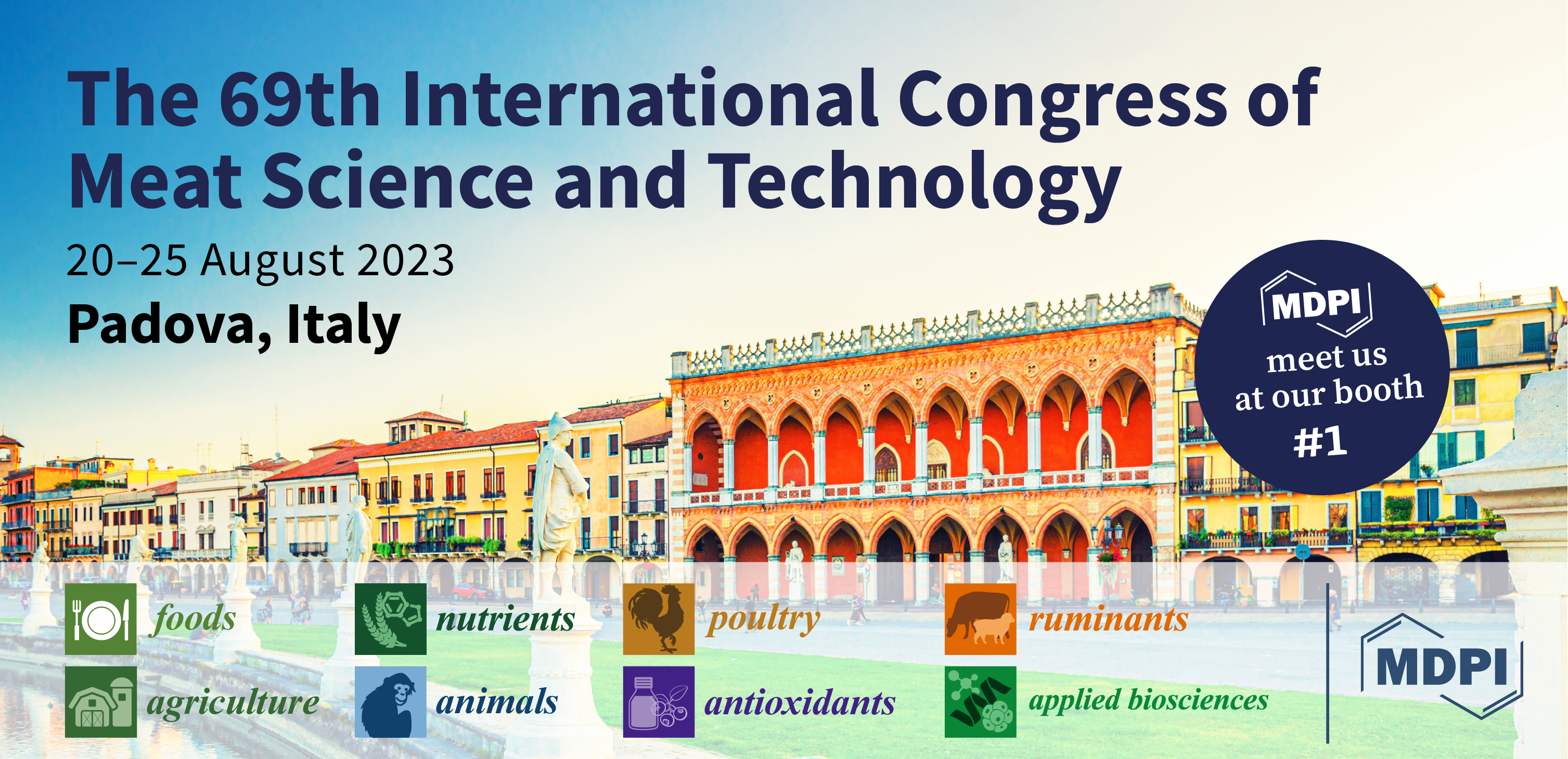
Conference: 69th International Congress of Meat Science and Technology
Date: 20–25 August 2023
Place: Padova, Italy
MDPI will be attending the 69th International Congress of Meat Science and Technology, which will be held from 20 to 25 August 2023 in Padova, Italy.
The main theme of the 69th ICoMST is “From Tradition to Green Innovation”. ICoMST hosts several organizations from over 55 countries embodying the collaboration of the brightest minds in meat science, research and innovation. Renowned scientists, researchers, and scholars will present advanced research works, discuss hot topics in the field, exchange ideas and share their experiences on all aspects of meat science and technology. We believe that the Padova Congress will be dynamic, informative and memorable for all participants; we surely hope you will feel welcome in Padova and we look forward to personally meeting you throughout the days of the congress.
The following MDPI journals will be represented:
- Foods;
- Agriculture;
- Nutrients;
- Animals;
- Poultry;
- Antioxidants;
- Ruminants;
- Applied Biosciences.
Please do not hesitate to reach out (foods@mdpi.com) if you plan on attending this conference. Our delegates look forward to meeting you in person and answering any questions that you might have. For more information about the conference, please visit the following website: https://www.icomst2023.com/.
26 July 2023
Meet Us at the 11th International Symposium of Food Science, 6–8 August 2023, Nanjing, China

Conference: The 11th International Symposium of Food Science
Date: 6–8 August 2023
Place: Nanjing, China
MDPI will be attending the 11th International Symposium of Food Science, which will be held from 6 to 8 August 2023 in Nanjing, China.
In order to further study the basic theories of scientific and technological innovation in the food industry, ensure food quality and safety, develop foods with nutrition and health functions, promote the progress of food science research, and better safeguard human health and improve the quality of life, on the basis of successful holding of the past ten international symposiums of Food Science, four international symposiums of Food Science and Human Wellness and more than 20 food thematic symposiums, Beijing Academy of Food Sciences and China Food Publishing Co., Food Science, Food Science and Human Wellness will jointly organize “The 11th International Symposium of Food Science” with Jiangsu Nanjing National Agricultural High-Tech Industry Demonstration Zone, International Association for Cereal Science and Technology (ICC), Nanjing Agricultural University, Nanjing University of Finance & Economics, Nanjing Normal University, Nanjing University of Technology, Southeast University, Jiangsu Academy of Agriculture Sciences, Xuzhou University of Technology and Kunming University of Science and Technology.
The following MDPI journals will be represented:
- Foods;
- Nutrients;
- Fermentation;
- Dairy;
- Beverages;
- Antioxidants.
Please do not hesitate to reach out (foods@mdpi.com) if you plan on attending this conference. Our delegates look forward to meeting you in person and answering any questions that you might have.
For more information about the conference, please visit the following website: https://hy.spkx.net.cn/spkx/en_index.jsp.
24 July 2023
Nutrients Webinar | Advances in Grain Nutrition, Omics and Cardiometabolic Health, 4 August 2023
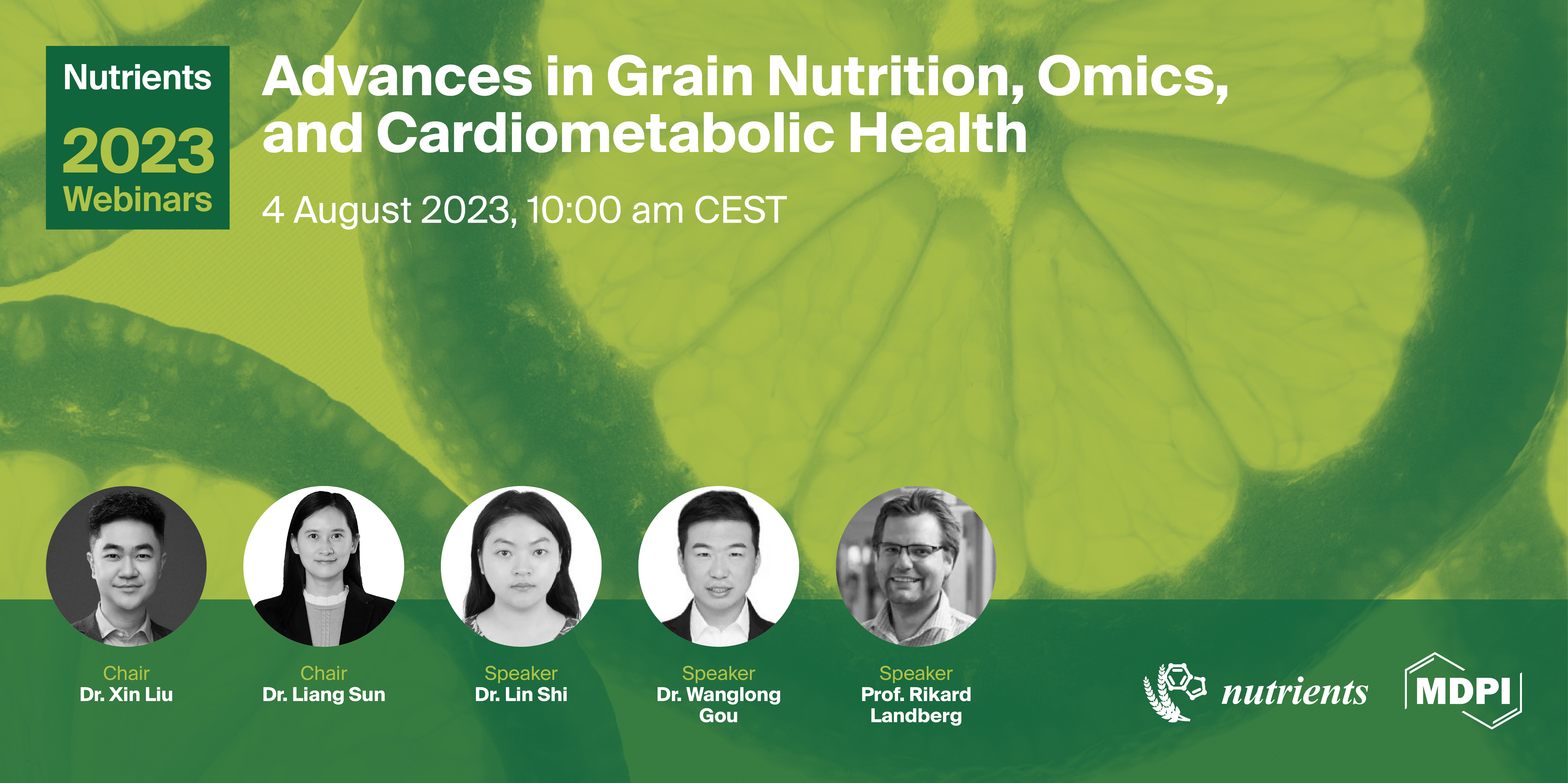
Grains are widely consumed all over the world as they provide calories, macronutrients, micronutrients, dietary fibers, minerals, and plenty of phytochemicals that may have prolonged effects on human metabolism. High-throughput omics techniques enable a comprehensive understanding of the biological perturbations associated with dietary intake and other environmental exposures. A combination of traditional populations studies, such as cohorts, and RCTs, with multi-omics measurement, provide great opportunities to advance our knowledge of how the consumption of different grains affects human health. With particular interest in the effects of whole grains, refined grains, or staple foods, we are very excited to have invited outstanding pioneer scientists in the fields of nutritional epidemiology, precision nutrition, and multi-omics studies to this webinar to share their research output with the nutrition academic communities. The duration of these presentations will be 20 minutes each, after which a Q&A session will be held.
Date: 4 August 2023 at 4:00 p.m. CST Asia | 10:00 a.m. CEST
Webinar ID: 840 8887 6896
Register now for free!
Program
|
Speaker/Presentation |
Time in CST Asia |
Time in CEST |
Time in CDT |
|
Dr. Xin Liu and Dr. Liang Sun |
4:00–4:10 p.m. |
10:00–10:10 a.m. |
3:00–3:10 a.m. |
|
Dr. Lin Shi |
4:10–4:30 p.m. |
10:10–10:30 a.m. |
3:10–3:30 a.m. |
|
Dr. Wanglong Gou |
4:30–4:50 p.m. |
10:30–10:50 a.m. |
3:30–3:50 a.m. |
|
Prof. Rikard Landberg |
4:50–5:10 p.m. |
10:50–11:10 a.m. |
3:50–4:10 a.m. |
|
Q&A Session |
5:10–5:25 p.m. |
11:10–11:25 a.m. |
4:10–4:25 a.m. |
|
Dr. Xin Liu and Dr. Liang Sun |
5:25–5:30 p.m. |
11:25–11:30 a.m. |
4:25–4:30 a.m. |
After registering, you will receive a confirmation email containing information on how to join the webinar.
Registrations with academic institutional email addresses will be prioritized.
Unable to attend? Register anyway and we’ll let you know when the recording is available to watch.
Webinar Chairs and Keynote Speakers:
- Dr. Xin Liu, Department of Epidemiology and Biostatistics, Global Health Institute, School of Public Health, Xi’an Jiaotong University, Xi’an 710061, China;
- Dr. Liang Sun, Department of Nutrition and Food Hygiene, School of Public Health, Fudan University, Shanghai 200032, China;
- Dr. Lin Shi, School of Food Engineering and Nutritional Science, Shaanxi Normal University, Xi’an 710119, China;
- Dr. Wanglong Gou, Research Center for Industries of the Future, Key Laboratory of Growth Regulation and Translational Research of Zhejiang Province, School of Life Sciences, Westlake University, Hangzhou 310030, China;
- Prof. Rikard Landberg, Department of Life Sciences, Food and Nutrition Science, Chalmers University of Technology, SE-41296 Gothenburg, Sweden;
Relevant Special Issue:
“Effects of Grain Consumption on Human Metabolome and Cardiometabolic Health”
Guest Editors: Dr. Xin Liu, Dr. Liang Sun and Dr. Lin Shi
Deadline for manuscript submissions: 30 September 2023
11 July 2023
MDPI’s Newly Launched Journals in June 2023
With the first issue released in June 2023, five new MDPI journals disseminating multi-disciplinary science are due to launch, which will cover the subjects of medicine & pharmacology, biology and physical sciences.
The newly launched journals will be overseen by professional Editorial Board Members and Editors to ensure an accurate and rapid publication, rigorous peer review and broad visibility.
Please feel free to browse and discover more about the new journals below.
| Journal | Founding Editor-in-Chief | Journal topics (selected) |
| Prof. Dr. Jun Ma, Peking University, China| Editorial | view inaugural issue | growth and development; diet and nutrients; school health promotion policies and practices; child health and care; adolescent health and wellbeing | view journal scope | submit an article |
|
| Prof. Dr. Bernd Rehm, Griffith University, Australia | Editorial | view inaugural issue | DNA and gene synthesis; synthetic transcription factors; protein engineering; viral engineering; metabolic engineering | view journal scope | submit an article | |
| Prof. Dr. Varsha Gandhi, University of Texas MD Anderson Cancer Center, USA | Editorial | view inaugural issue | lymphatics; cancers associated with lymphocytes and lymphoblasts; lymphatic tissues; lymphoma; lymphoid leukemia | view journal scope | submit an article | |
| Dr. Bradley Turner, University of Melbourne, Australia | Editorial | view inaugural issue | multiple sclerosis; amyotrophic lateral sclerosis; primary lateral sclerosis; atherosclerosis; systemic sclerosis | view journal scope | submit an article | |
 |
Prof. Dr. Clemens Burda, Case Western Reserve University, USA | Editorial | view inaugural issue | Gamma ray, X-ray, and UV–Vis spectroscopies; NIR/mid-infrared/Raman spectroscopy; microwave and THz spectroscopy; high-resolution gas-phase atomic, molecular, and cluster spectroscopy; MS, NMR, and EPR spectroscopy | view journal scope | submit an article |
We wish to thank everyone who has supported the development of open access publishing. You are welcome to submit an application to the New Journal Committee (newjournal-committee@mdpi.com) if you would like to create more new journals.
4 July 2023
Nutrients Webinar | Role of Fatty Acids in Metabolic Dysfunction—Associated Fatty Liver Disease (MAFLD) and Concomitant Cardiovascular Risk, 13 July 2023

Welcome message by Dr. Alexander V. Sorokin, the webinar Chair:
Cardiometabolic disorders represent a significant public health concern and they put millions of people worldwide at a higher risk of developing heart disease and type 2 diabetes and come with associated healthcare expenses. Among the established risk factors comprising cardiometabolic disorders, such as abdominal obesity, insulin resistance and hypertension, non-alcoholic fatty liver disease (NAFLD) has been of particular clinical interest. Moreover, accompanying dyslipidemia, elevated triglycerides and impaired resolution of inflammation have compelled international experts to revise the current understanding of NAFLD and propose a new definition which more accurately represents the pathophysiological mechanisms behind NAFLD and cardiometabolic complications. Thus, the term metabolic dysfunction-associated fatty liver disease (MAFLD) has been coined. With the recent progress in fatty acids research and clinical application of n–3 fatty acids, this seminar aims to summarize the current knowledge and increase awareness among healthcare providers.
Date: 13 July 2023 at 4:00 p.m. CEST | 10:00 a.m. EDT | 10:00 p.m. CST Asia
Register now for free!
Program:
|
Speaker/Presentation |
Time in CEST |
Time in EDT |
|
Dr. Alexander V. Sorokin |
4:00–4:10 p.m. |
10:00–10:10 a.m. |
|
Dr. You Zhou |
4:10–4:30 p.m. |
10:10–10:30 a.m. |
|
Dr. Trisha Jean Grevengoed |
4:30–4:50 p.m. |
10:30–10:50 a.m. |
|
Q&A Session |
4:50–5:05 p.m. |
10:50–11:05 a.m. |
|
Dr. Alexander Sorokin |
5:05–5:10 p.m. |
11:05–11:10 a.m. |
After registering, you will receive a confirmation email containing information on how to join the webinar. Registrations with academic institutional email addresses will be prioritized.
Unable to attend? Register anyway to be notified when the recording is available to watch.
Webinar Chair and Keynote Speakers:
- Dr. Alexander V. Sorokin, Section of Inflammation and Cardiometabolic Disease, Cardiovascular Branch, National Heart, Lung and Blood Institute (NHLBI), National Institutes of Health (NIH), Bethesda, MD 20892-1666, USA;
- You Zhou, Division of Infection & Immunity, School of Medicine, Cardiff University, UK;
- Trisha Jean Grevengoed, Endocrinology and Metabolism, Faculty of Health and Medical Sciences, 1958 Frederiksberg C, Denmark.
Relevant Special Issue:
“Biological and Clinical Implication of Fatty Acids in Liver and Cardiometabolic Disorders”
Edited by: Dr. Alexander V. Sorokin
3 July 2023
MDPI Insights: The CEO’s Letter #1 - Open Access and Impactful Research

Welcome to the MDPI Insights: The CEO's Letter.
In these monthly letters, I will showcase two key aspects of our work at MDPI: our commitment to empowering researchers and our determination to facilitating open scientific exchange.
Opening Thoughts
The Future is Open, and MDPI is Leading the Way
I strongly believe in a future that embraces openness, where open source, open information, and open access (OA) take center stage. This belief that led me to join MDPI in 2020, and I am honored to have recently been appointed as Chief Executive Officer (CEO). In this capacity, and operating in close liaison with Dr. Lin and MDPI’s senior management, I shall work to build on Dr. Lin’s achievements of the past quarter-century. In this role, I will focus on communication initiatives to promote MDPI's remarkable work and continue to build our company as a trusted leader in OA publishing. For over two decades, MDPI has been at the forefront of reshaping the academic publishing landscape, with OA surpassing subscription-based publishing in 2020. This trajectory is deeply rooted in our history and reflects our unwavering commitment and vision for an open future.
1 Million Published Articles
2023 began with a remarkable achievement for MDPI, as we became the first OA publisher to reach the milestone of 1 million published articles. This represents 2.7 million unique authors who have trusted us with their work, or about a third of all researchers worldwide. As the world's most cited OA publisher, we are proud in sharing these significant milestones.
Our mission remains unchanged: to make science open and accessible to all. We understand the importance of knowledge access, empowering researchers to stay at the forefront of a rapidly changing world. Our diverse range of journals covers a wide spectrum of disciplines, offering cutting-edge insights, trusted tools, and crucial knowledge to address global challenges.
Liberating Science
As the world’s leading OA publisher, MDPI is actively liberating science. We are committed to eliminating the frustrations researchers and the general public face when accessing information, ensuring it is not locked behind paywalls. We firmly believe that everyone has a right to information, and our commitment to open access publishing drives our work.
In this inaugural edition of Insights: The CEO's Letter, I draw inspiration from the upcoming 20th anniversary of the Berlin Declaration on Open Access. Its stated mission reminds us that true impact is achieved when knowledge is widely and readily available to society:
"Our mission of disseminating knowledge is only half complete if the information is not made widely and readily available to society”
Impactful Research

MDPI Publishes Impactful Research: Recognized by Leading Indexing Databases
MDPI journals are indexed in every single top database in the world.
As of June 2023, we have 214 journals indexed within Web of Science, 223 indexed within Scopus, 87 indexed within PubMed and PMC, and 17 indexed within MEDLINE, and these numbers increase every month. We constantly strive to expand the coverage of our journals within leading multi-disciplinary and scope-specific databases, resulting in an incredibly broad range of journals that are indexed within a variety of databases. MDPI has active relationships with approximately 65 well-known databases around the world, and we continue to expand our portfolio every year so that your work can be found, cited, and referenced with ease.
Continued Growth of MDPI Journals
The 2022 Scopus and Web of Science journal citation metrics were officially released in June, and I am pleased to report that 31 MDPI journals received their first CiteScore, taking the total number of journals with a CiteScore to 216. The number of MDPI journals receiving an Impact Factor (IF) also continues to grow with 111 receiving their first, by being covered in the ESCI, bringing our total number of journals with an IF to 208 of which 41 journals received an IF above 4.0. Looking at 2022 CiteScores in the Scopus database, 80% of MDPI journals have a score that ranks them in Q1 or Q2 in at least one subject category.
Publishing impactful science would not be possible without all of our authors, editors and reviewers. Thank you for your contribution and continued support! Together we share the latest scientific insights faster and ensure that your work is accessible to all.
Read more
Inside MDPI

Preprints.org: Clarivate adds the Preprint Citation Index to the Web of Science
At MDPI, we are dedicated to driving the advancement of science. Through our initiative, Preprints.org, researchers can publish their work and gain valuable feedback from the broader research community, ensuring rapid progress in their respective fields. This is particularly crucial during times of health and climate challenges, where timely dissemination of findings is essential.
Increased Visibility for Preprints
I am pleased to share that Clarivate recognizes the significance of preprints and has taken a crucial step to enhance their visibility. Clarivate has added the Preprint Citation Index to the Web of Science, encompassing preprints published not only on Preprints.org but also on other reputable repositories.
Looking ahead, the future of preprints appears promising, bolstered by the recent indexing announcement from the Web of Science. As a result, preprints will receive increased visibility, serving as a valuable resource for staying informed about the latest research developments.
Read more
What are Preprints?
The Pros and Cons of Preprints
Preprints and COVID-19
Preprints—The Future of Open Access Publishing?
Coming Together for Science

The First International Conference on Antioxidants: Sources, Methods, Health Benefits and Industrial Applications
In this edition of ‘Coming Together for Science,’ I am pleased to highlight the First International Conference on Antioxidants organized by our conference team in the beautiful city of Barcelona, Spain. The conference attracted over 130 attendees, who engaged in 42 talks, and 89 poster presentations spread across several sessions.
Working Together
Under the leadership of Prof. Dr. Alessandra Napolitano (Department of Chemical Sciences, University of Naples ‘Federico II’, Naples, Italy) and Prof. Dr. Rosa M. Lamuela Raventos (Department of Nutrition, Food Sciences and Gastronomy, University of Barcelona, Spain) as chairs, and supported by the committee members, 10 invited keynote speakers, poster presenters, and all the attendees, this dedicated group of academics came together to discuss the natural sources, methodologies, health benefits, and industrial applications of antioxidants.
Especially noteworthy is the positive feedback received from attendees, with 94% rating the overall organization of the conference as good or excellent. I particularly love the picture above, capturing the gathering of some of the participants. You can browse through more photos in the event gallery located here.
Managing Events With Sciforum
If you are considering hosting your own academic event, I highly recommend checking out Sciforum, MDPI's event management platform. Sciforum simplifies the entire process, making it easy to host your own event by allowing you to focus on what really matters: Science!
Read more
Closing Thoughts
 Stefan Tochev, Dr. Shu-Kun Lin, Dr. Eric O. Freed, Peter Roth, Wynne Wang, Allison Yang
Stefan Tochev, Dr. Shu-Kun Lin, Dr. Eric O. Freed, Peter Roth, Wynne Wang, Allison Yang
Viruses and Editorial Quality: Acknowledging the Dedication of our Viruses Journal Team
During a June meeting with Dr. Eric O. Freed, the founding and current Editor-in-Chief of our journal Viruses, I was reminded of the exceptional dedication of our editorial board. Meeting with Eric is a pleasure, as he has a strong commitment and clear vision for the journal. Over the course of two days, we gained a deep understanding of the journal’s expectations and focus on strategic growth, editorial board representation, and engagement.
I am pleased to share that Viruses holds a CiteScore of 7.1 (an increase of 7.57% versus the 2021 metric) and an Impact Factor of 4.7. You can view the journal statistics here. Viruses publishes highly cited papers, and is indexed in renowned databases such as Scopus, SCIE (Web of Science), PubMed, and others, and maintains affiliations with prestigious societies. Moreover, the Viruses team has recently announced an exciting upcoming event titled ‘Viruses 2024 – A World of Viruses,’ scheduled to take place in Barcelona, Spain, from 14–16 February 2024.
Testimonials
If you notice my enthusiasm regarding our editorial service, it’s because the surveys and testimonials we receive speak volumes about the experiences of our authors, reviewers, and guest editors who collaborate with MDPI. The purpose of these letters is to highlight the exceptional work that we do and the experiences we create for the scholars – thus, let me end with this testimonial from an author:
“It was a great pleasure to publish in Viruses Special Issue [Emerging Viruses in Aquaculture]. The submission process was easy. Guest editors were very helpful and provided all the guidance and support as needed. The handling of the manuscript by the Editorial Team was very fast, efficient, and professional. The reviewer’s comments were insightful, and the publication processes were remarkably rapid.”
– Ms. Magdalena Stachnik, Państwowy Instytut Weterynaryjny | PIWet
Article in Viruses: Emerging Viral Pathogens in Sturgeon Aquaculture in Poland: Focus on Herpesviruses and Mimivirus Detection
Chief Executive Officer
MDPI AG
28 June 2023
2022 Impact Factors for MDPI Journals
The 2022 citation metrics have been released in the Journal Citation Reports (JCR), and we’re pleased to announce the following results for MDPI journals:

We are thrilled to announce that 90% of our ranked MDPI journals, specifically 86 out of 96 (captured in the table below), are performing above average in Q1 or Q2. This year, Clarivate has expanded its Impact Factor (IF) awards to include journals in the Emerging Sources Citation Index (ESCI) and the Arts and Humanities Citation Index (AHCI), providing greater transparency for the full set of journals indexed in the Web of Science Core Collection. As a result, 111 of MDPI journals have received their first IF in 2023, with 37 journals surpassing an IF of 3.0. In total, 208 MDPI journals have been honored with an IF.
Clarivate explains that by "expanding the coverage but holding to highly selective standards, the [Impact Factor] is now a reliable indicator of trustworthiness, as well as a measure of scholarly impact, at the journal level."
Please visit our blog post where we discuss the release of the latest citation metrics with our Indexing Manager, Dr. Constanze Schelhorn, to find out what's different this time around and how to make use of different metrics available.
| Journal | Impact Factor | Rank Quartile | Category |
| Vaccines | 7.8 | Q1 | Immunology |
| Medicine, Research & Experimental | |||
| Antioxidants | 7.0 | Q1 | Food Science & Technology |
| Biochemistry & Molecular Biology | |||
| Chemistry, Medicinal | |||
| Cells | 6.0 | Q2 | Cell Biology |
| Nutrients | 5.9 | Q1 | Nutrition & Dietetics |
| International Journal of Molecular Sciences | 5.6 | Q1 | Biochemistry & Molecular Biology |
| Q2 | Chemistry, Multidisciplinary | ||
| Journal of Theoretical and Applied Electronic Commerce Research | 5.6 | Q2 | Business |
| Biomolecules | 5.5 | Q1 | Biochemistry & Molecular Biology |
| Biosensors | 5.4 | Q1 | Chemistry, Analytical |
| Instruments & Instrumentation | |||
| Q2 | Nanoscience & Nanotechnology | ||
| Fractal and Fractional | 5.4 | Q1 | Mathematics, Interdisciplinary Applications |
| Marine Drugs | 5.4 | Q1 | Chemistry, Medicinal |
| Pharmacology & Pharmacy | |||
| Pharmaceutics | 5.4 | Q1 | Pharmacology & Pharmacy |
| Nanomaterials | 5.3 | Q1 | Physics, Applied |
| Q2 | Chemistry, Multidisciplinary | ||
| Materials Science, Multidisciplinary | |||
| Nanoscience & Nanotechnology | |||
| Cancers | 5.2 | Q2 | Oncology |
| Foods | 5.2 | Q1 | Food Science & Technology |
| Polymers | 5.0 | Q1 | Polymer Science |
| Remote Sensing | 5.0 | Q1 | Geosciences, Multidisciplinary |
| Q2 | Remote Sensing | ||
| Imaging Science & Photographic Technology | |||
| Environmental Sciences | |||
| Antibiotics | 4.8 | Q1 | Pharmacology & Pharmacy |
| Q2 | Infectious Diseases | ||
| Drones | 4.8 | Q2 | Remote Sensing |
| Journal of Functional Biomaterials | 4.8 | Q2 | Engineering, Biomedical |
| Materials Science, Biomaterials | |||
| Biomedicines | 4.7 | Q1 | Pharmacology & Pharmacy |
| Q2 | Biochemistry & Molecular Biology | ||
| Medicine, Research & Experimental | |||
| Journal of Fungi | 4.7 | Q2 | Mycology |
| Microbiology | |||
| Viruses | 4.7 | Q2 | Virology |
| Bioengineering | 4.6 | Q2 | Engineering, Biomedical |
| Gels | 4.6 | Q1 | Polymer Science |
| Molecules | 4.6 | Q2 | Chemistry, Multidisciplinary |
| Biochemistry & Molecular Biology | |||
| Pharmaceuticals | 4.6 | Q2 | Pharmacology & Pharmacy |
| Chemistry, Medicinal | |||
| Toxics | 4.6 | Q1 | Toxicology |
| Q2 | Environmental Sciences | ||
| Biomimetics | 4.5 | Q1 | Engineering, Multidisciplinary |
| Q2 | Materials Science, Biomaterials | ||
| Microorganisms | 4.5 | Q2 | Microbiology |
| Plants | 4.5 | Q1 | Plant Sciences |
| Biology | 4.2 | Q2 | Biology |
| Chemosensors | 4.2 | Q2 | Instruments & Instrumentation |
| Chemistry, Analytical | |||
| Electrochemistry | |||
| Membranes | 4.2 | Q2 | Engineering, Chemical |
| Materials Science, Multidisciplinary | |||
| Chemistry, Physical | |||
| Polymer Science | |||
| Toxins | 4.2 | Q1 | Toxicology |
| Q2 | Food Science & Technology | ||
| Metabolites | 4.2 | Q2 | Biochemistry & Molecular Biology |
| Batteries | 4.0 | Q2 | Electrochemistry |
| Materials Science, Multidisciplinary | |||
| Q3 | Energy & Fuels | ||
| Catalysts | 3.9 | Q2 | Chemistry, Physical |
| Journal of Clinical Medicine | 3.9 | Q2 | Medicine, General & Internal |
| Land | 3.9 | Q2 | Environmental Studies |
| Sensors | 3.9 | Q2 | Instruments & Instrumentation |
| Chemistry, Analytical | |||
| Engineering, Electrical & Electronic | |||
| Sustainability | 3.9 | Q2 | Environmental Sciences (SCIE) |
| Environmental Studies (SSCI) | |||
| Q3 | Green & Sustainable Science & Technology (SCIE) | ||
| Green & Sustainable Science & Technology (SSCI) | |||
| Buildings | 3.8 | Q2 | Construction & Building Technology |
| Engineering, Civil | |||
| Agronomy | 3.7 | Q1 | Agronomy |
| Q2 | Plant Sciences | ||
| Fermentation | 3.7 | Q2 | Biotechnology & Applied Microbiology |
| Pathogens | 3.7 | Q2 | Microbiology |
| Agriculture | 3.6 | Q1 | Agronomy |
| Diagnostics | 3.6 | Q2 | Medicine, General & Internal |
| Genes | 3.5 | Q2 | Genetics & Heredity |
| Journal of Intelligence | 3.5 | Q2 | Psychology, Multidisciplinary |
| Lubricants | 3.5 | Q2 | Engineering, Mechanical |
| Processes | 3.5 | Q2 | Engineering, Chemical |
| Coatings | 3.4 | Q2 | Materials Science, Coatings & Films |
| Physics, Applied | |||
| Q3 | Materials Science, Multidisciplinary | ||
| ISPRS International Journal of Geo-Information | 3.4 | Q2 | Geography, Physical |
| Q3 | Computer Science, Information Systems | ||
| Remote Sensing | |||
| Materials | 3.4 | Q2 | Metallurgy & Metallurgical Engineering |
| Physics, Applied | |||
| Physics, Condensed Matter | |||
| Q3 | Materials Science, Multidisciplinary | ||
| Chemistry, Physical | |||
| Micromachines | 3.4 | Q2 | Instruments & Instrumentation |
| Physics, Applied | |||
| Chemistry, Analytical | |||
| Q3 | Nanoscience & Nanotechnology | ||
| Water | 3.4 | Q2 | Water Resources |
| Environmental Sciences | |||
| Brain Sciences | 3.3 | Q3 | Neurosciences |
| Energies | 3.2 | Q3 | Energy & Fuels |
| Fire | 3.2 | Q1 | Forestry |
| Q2 | Ecology | ||
| Life | 3.2 | Q2 | Biology |
| Current Issues in Molecular Biology | 3.1 | Q3 | Biochemistry & Molecular Biology |
| Horticulturae | 3.1 | Q1 | Horticulture |
| Animals | 3.0 | Q1 | Agriculture, Dairy & Animal Science |
| Veterinary Sciences | |||
| Insects | 3.0 | Q1 | Entomology |
| Atmosphere | 2.9 | Q3 | Meteorology & Atmospheric Sciences |
| Environmental Sciences | |||
| Electronics | 2.9 | Q2 | Engineering, Electrical & Electronic |
| Physics, Applied | |||
| Q3 | Computer Science, Information Systems | ||
| Forests | 2.9 | Q1 | Forestry |
| Inorganics | 2.9 | Q2 | Chemistry, Inorganic & Nuclear |
| Journal of Marine Science and Engineering | 2.9 | Q1 | Engineering, Marine |
| Q2 | Oceanography | ||
| Engineering, Ocean | |||
| Metals | 2.9 | Q2 | Metallurgy & Metallurgical Engineering |
| Q3 | Materials Science, Multidisciplinary | ||
| Tropical Medicine and Infectious Disease | 2.9 | Q2 | Tropical Medicine |
| Parasitology | |||
| Q3 | Infectious Diseases | ||
| Universe | 2.9 | Q2 | Astronomy & Astrophysics |
| Physics, Particles & Fields | |||
| Healthcare | 2.8 | Q2 | Health Policy & Services (SSCI) |
| Q3 | Health Care Sciences & Services (SCIE) | ||
| Applied Sciences | 2.7 | Q2 | Engineering, Multidisciplinary |
| Physics, Applied | |||
| Q3 | Chemistry, Multidisciplinary | ||
| Materials Science, Multidisciplinary | |||
| Crystals | 2.7 | Q2 | Crystallography |
| Q3 | Materials Science, Multidisciplinary | ||
| Entropy | 2.7 | Q2 | Physics, Multidisciplinary |
| Magnetochemistry | 2.7 | Q2 | Chemistry, Inorganic & Nuclear |
| Q3 | Chemistry, Physical | ||
| Materials Science, Multidisciplinary | |||
| Symmetry | 2.7 | Q2 | Multidisciplinary Sciences |
| Actuators | 2.6 | Q2 | Instruments & Instrumentation |
| Engineering, Mechanical | |||
| Aerospace | 2.6 | Q1 | Engineering, Aerospace |
| Behavioral Sciences | 2.6 | Q2 | Psychology, Multidisciplinary |
| Current Oncology | 2.6 | Q3 | Oncology |
| Machines | 2.6 | Q2 | Engineering, Mechanical |
| Q3 | Engineering, Electrical & Electronic | ||
| Medicina | 2.6 | Q3 | Medicine, General & Internal |
| Separations | 2.6 | Q3 | Chemistry, Analytical |
| Minerals | 2.5 | Q2 | Mining & Mineral Processing |
| Mineralogy | |||
| Geochemistry & Geophysics | |||
| Children | 2.4 | Q2 | Pediatrics |
| Diversity | 2.4 | Q2 | Biodiversity Conservation |
| Q3 | Ecology | ||
| Journal of Cardiovascular Development and Disease | 2.4 | Q3 | Cardiac & Cardiovascular Systems |
| Mathematics | 2.4 | Q1 | Mathematics |
| Photonics | 2.4 | Q3 | Optics |
| Veterinary Sciences | 2.4 | Q1 | Veterinary Sciences |
| Fishes | 2.3 | Q2 | Marine & Freshwater Biology |
| Fisheries | |||
| Axioms | 2.0 | Q2 | Mathematics, Applied |
| Systems | 1.9 | Q2 | Social Sciences, Interdisciplinary |
| Tomography | 1.9 | Q3 | Radiology, Nuclear Medicine & Medical Imaging |
Note: The Journal of Personalized Medicine's Impact Factor was omitted in the original release and will be assigned separately. Please find the data on the journal webpage in due course.
Source: 2022 Journal Impact Factors, Journal Citation Reports TM (Clarivate, 2023)
27 June 2023
Prof. Dr. Jean-Louis Guéant Appointed Section Editor-in-Chief of Section “Nutrition and Metabolism” in Nutrients
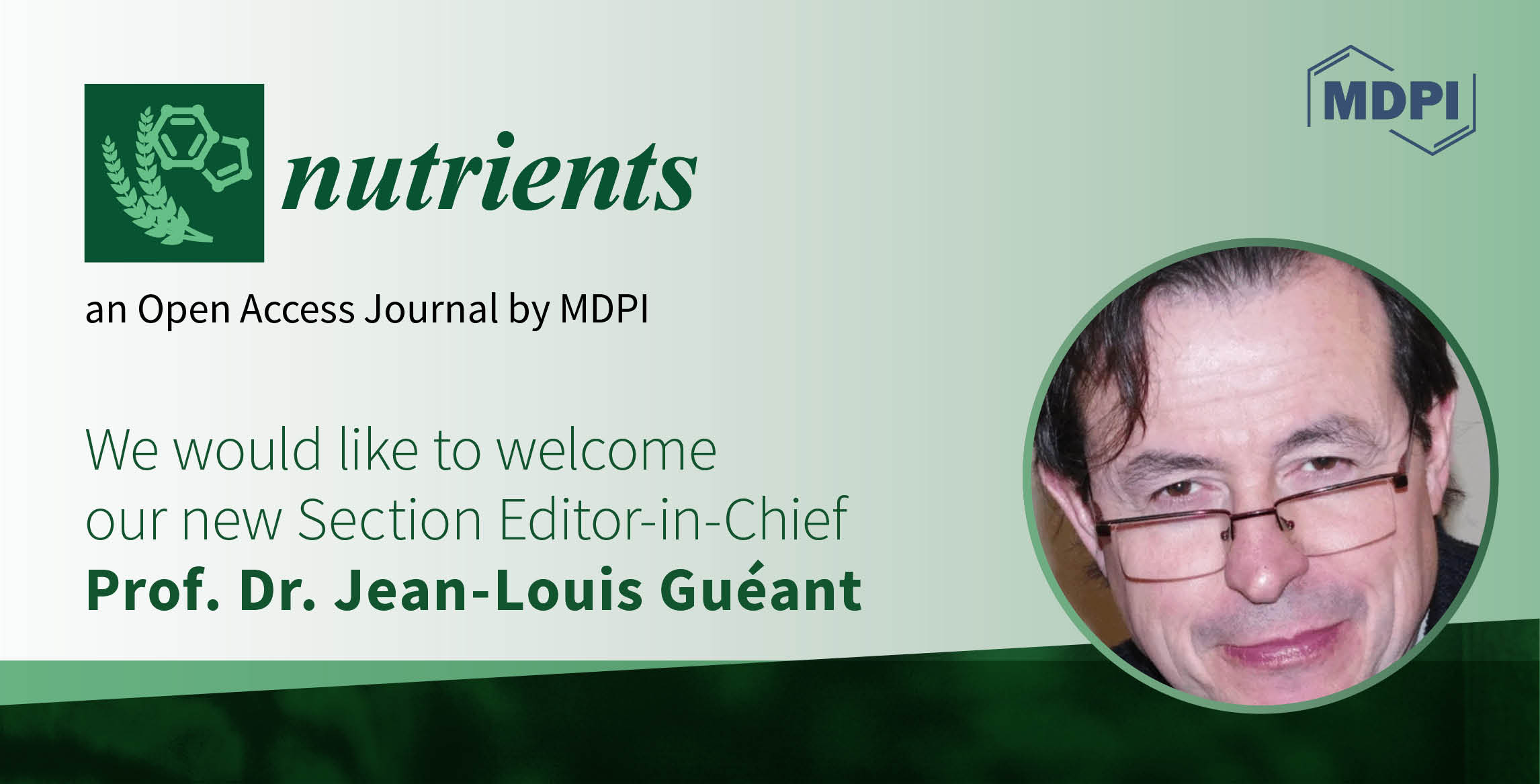
We are pleased to announce that Prof. Dr. Jean-Louis Guéant has been appointed Section Editor-in-Chief of the “Nutrition and Metabolism” Section in Nutrients (ISSN: 2072-6643).
Name: Prof. Dr. Jean-Louis Guéant
Homepage: https://cvscience.aviesan.fr/cv/2119/jean-louis-gueant
Affiliation: Department of Molecular Medicine, National Center of Inborn Errors of Metabolism, University Regional Hospital of Nancy, 54511 Vandoeuvre les Nancy, France
Interests: one-carbon metabolism; metabolism of micronutrients; obesity; NASH; inherited disorders of metabolism
Prof. Dr. Jean-Louis Guéant, M.D., Ph.D., D.Sc., specializes in hepato-gastroenterology and is a professor of biochemistry-molecular biology at the University of Lorraine, France. He is Head of the Department of Molecular Medicine, with clinical activity at the department of Hepato-Gastroenterology, National Reference Center of Inherited Metabolic Diseases of the University Regional Hospital of Nancy. He is the Director of UMR-S Inserm 1256 “Nutrition-Genetics-Environmental Exposure” and a titular member of the French National Academy of Medicine. Beside his position as Section Editor-in-Chief of the “Nutrition and Metabolism” Section in Nutrients, he is a member of the Editorial Board of Human Genetics and Vitamins and Hormones. His scientific production includes 460 articles in Pub Med, with publications in N Engl J Med, Science, Nature Comm, Nature Rev Disease Primers, The Lancet, PNAS, Ann Intern Med, Cell Rep Medicine, Gastroenterology, Gut, J Hepatology, Nucleic acid Research, J Allergy Clin Immunol, Blood, etc. He ranked as the top world expert in “vitamin B 12 deficiency” and “Methionine synthase”, and the second top expert in “vitamin B deficiencies” on Expertscape. He has described the key mechanisms of digestive transport and metabolism of vitamin B12 and folate, the influence of the one-carbon metabolism on the epigenome, cellular stress, energy metabolism, and fetal programming in rare and complex metabolic diseases and a new type of rare metabolic disease named “Epi-cblC”. He has also dissected genetic predictors of allergic drug and food reactions.
The following is a short Q&A with Prof. Dr. Jean-Louis Guéant, who shared his vision for the journal and his views on the research area and open access publishing:
1. What appealed to you about the journal and encouraged you to become its Section Editor-in-Chief?
The high quality of articles published in Nutrients is reflected by their rate of citation and the ranking of the journal as one the best in the field. The journal has a very efficient peer-review process which complies with the best international standards of scientific evaluation while providing a delay of publication as short as possible. Open access warrants the wide diffusion of science published in the journal.
2. What is your vision for Nutrients?
Nutrients will be more and more one of the best options to publish the most innovative and impactful articles of basic, clinical, and epidemiological research in nutrition and metabolism.
3. What does the future of this field of research look like?
Nutrition and metabolism are two closely interactive fields that have benefited from considerable advances in knowledge over the last decade thanks to the accessibility of multi-omics, metabolomics, proteomics, genomics and epigenomics techniques, the study of metabolic fluxes in cells and organs, the interactions with the microbiota and the environment, and the integrative views of systems biology. These developments open fantastic prospects to better understand the dynamics of metabolism at the different stages of cell life and differentiation, its adaptive capacity to stress, its direct influence on the genome and the post genome, and the molecular mechanisms of rare and complex diseases, cancers, and biological processes of aging.
4. What do you think of the development of open access in the publishing field?
Open access should be the preferred option, provided that reasonable publishing fees make it accessible to the budget of the widest community of authors, as it plays more and more a key role into the diffusion of scientific knowledge by sharing the results, methods, data, codes, and other constituent elements of a peer-reviewed publication as widely and as quickly as possible.
We warmly welcome Prof. Dr. Jean-Louis Guéant as the new Section Editor-in-Chief and we look forward to him leading Nutrients to many more milestones.
19 June 2023
Nutrients Receives an Increased CiteScore of 9.0

We are pleased to inform you that Nutrients (ISSN: 2072-6643) has received an updated CiteScore of 9.0, an increase of 14% compared with the 2021 metric. The 2022 CiteScore™ was released recently, making an assessment of the scientific influence of journals in the 2019 to 2022 period.
Nutrients’ CiteScore ranks as follows:
- Q1 (15 out of 131) in the "Nutrition and Dietetics" category;
- Q1 (39 out of 359) in the "Food Science" category.
For more journal statistics, please visit https://www.mdpi.com/journal/Nutrients/stats.
Excellent performance is inseparable from the support and dedication of all journal editors, reviewers, authors, and readers. We would like to take this opportunity to thank all of you who have contributed to the journal.
12 June 2023
Nutrients | Invitation to Read 2021–2022 Highly Cited Papers in Web of Science
We are delighted to present the 2021–2022 Highly Cited Papers in Web of Science, a curated list of high-quality articles from Nutrients (ISSN: 2072-6643), as shown below.
“Nutritional Components in Western Diet Versus Mediterranean Diet at the Gut Microbiota–Immune System Interplay. Implications for Health and Disease”
by Cielo García-Montero, Oscar Fraile-Martínez, Ana M. Gómez-Lahoz, Leonel Pekarek, Alejandro J. Castellanos, Fernando Noguerales-Fraguas, Santiago Coca, Luis G. Guijarro, Natalio García-Honduvilla, Angel Asúnsolo et al.
Nutrients 2021, 13(2), 699; https://doi.org/10.3390/nu13020699
Available online: https://www.mdpi.com/2072-6643/13/2/699
Cited by 104 | Viewed by 19589
“Vitamin D in Inflammatory Bowel Diseases. Mechanisms of Action and Therapeutic Implications”
by Filippo Vernia, Marco Valvano, Salvatore Longo, Nicola Cesaro, Angelo Viscido and Giovanni Latella
Nutrients 2022, 14(2), 269; https://doi.org/10.3390/nu14020269
Available online: https://www.mdpi.com/2072-6643/14/2/269
Cited by 24 | Viewed by 3847
“Gut Microbiome Composition in Obese and Non-Obese Persons: A Systematic Review and Meta-Analysis”
by Mariona Pinart, Andreas Dötsch, Kristina Schlicht, Matthias Laudes, Jildau Bouwman, Sofia K. Forslund, Tobias Pischon and Katharina Nimptsch
Nutrients 2022, 14(1), 12; https://doi.org/10.3390/nu14010012
Available online: https://www.mdpi.com/2072-6643/14/1/12
Cited by 50 | Viewed by 6054
“Adiponectin: Structure, Physiological Functions, Role in Diseases, and Effects of Nutrition”
by Kayvan Khoramipour, Karim Chamari, Amirhosein Ahmadi Hekmatikar, Amirhosein Ziyaiyan, Shima Taherkhani, Nihal M. Elguindy and Nicola Luigi Bragazzi
Nutrients 2021, 13(4), 1180; https://doi.org/10.3390/nu13041180
Available online: https://www.mdpi.com/2072-6643/13/4/1180
Cited by 53 | Viewed by 6415
“Influence of Mediterranean Diet on Human Gut Microbiota”
by Giuseppe Merra, Annalisa Noce, Giulia Marrone, Marco Cintoni, Maria Grazia Tarsitano, Annunziata Capacci and Antonino De Lorenzo
Nutrients 2021, 13(1), 7; https://doi.org/10.3390/nu13010007
Available online: https://www.mdpi.com/2072-6643/13/1/7
Cited by 102 | Viewed by 16869
“Vitamin D Receptor (VDR) Gene Polymorphisms Modify the Response to Vitamin D Supplementation: A Systematic Review and Meta-Analysis”
by Ricardo Usategui-Martín, Daniel-Antonio De Luis-Román, José María Fernández-Gómez, Marta Ruiz-Mambrilla and José-Luis Pérez-Castrillón
Nutrients 2022, 14(2), 360; https://doi.org/10.3390/nu14020360
Available online: https://www.mdpi.com/2072-6643/14/2/360
Cited by 14 | Viewed by 3012
“Assessment of Body Composition in Athletes: A Narrative Review of Available Methods with Special Reference to Quantitative and Qualitative Bioimpedance Analysis”
by Francesco Campa, Stefania Toselli, Massimiliano Mazzilli, Luís Alberto Gobbo and Giuseppe Coratella
Nutrients 2021, 13(5), 1620; https://doi.org/10.3390/nu13051620
Available online: https://www.mdpi.com/2072-6643/13/5/1620
Cited by 95 | Viewed by 12265
“Sarcopenic Dysphagia, Malnutrition, and Oral Frailty in Elderly: A Comprehensive Review”
by Alessandro de Sire, Martina Ferrillo, Lorenzo Lippi, Francesco Agostini, Roberto de Sire, Paola Emilia Ferrara, Giuseppe Raguso, Sergio Riso, Andrea Roccuzzo, Gianpaolo Ronconi et al.
Nutrients 2022, 14(5), 982; https://doi.org/10.3390/nu14050982
Available online: https://www.mdpi.com/2072-6643/14/5/982
Cited by 38 | Viewed by 7432
“Deprescribing Leads to Improved Energy Intake among Hospitalized Older Sarcopenic Adults with Polypharmacy after Stroke”
by Ayaka Matsumoto, Yoshihiro Yoshimura, Hidetaka Wakabayashi, Eiji Kose, Fumihiko Nagano, Takahiro Bise, Yoshifumi Kido, Sayuri Shimazu and Ai Shiraishi
Nutrients 2022, 14(3), 443; https://doi.org/10.3390/nu14030443
Available online: https://www.mdpi.com/2072-6643/14/3/443
Cited by 16 | Viewed by 2755
“Creatine in Health and Disease”
by Richard B. Kreider and Jeffery R. Stout
Nutrients 2021, 13(2), 447; https://doi.org/10.3390/nu13020447
Available online: https://www.mdpi.com/2072-6643/13/2/447
Cited by 48 | Viewed by 29548
“Chair-Stand Exercise Improves Sarcopenia in Rehabilitation Patients after Stroke”
by Yoshihiro Yoshimura, Hidetaka Wakabayashi, Fumihiko Nagano, Takahiro Bise, Sayuri Shimazu, Ai Shiraishi, Yoshifumi Kido and Ayaka Matsumoto
Nutrients 2022, 14(3), 461; https://doi.org/10.3390/nu14030461
Available online: https://www.mdpi.com/2072-6643/14/3/461
Cited by 11 | Viewed by 3280
“The Role of Diet Quality in Mediating the Association between Ultra-Processed Food Intake, Obesity and Health-Related Outcomes: A Review of Prospective Cohort Studies”
by Samuel J. Dicken and Rachel L. Batterham
Nutrients 2022, 14(1), 23; https://doi.org/10.3390/nu14010023
Available online: https://www.mdpi.com/2072-6643/14/1/23
Cited by 32 | Viewed by 11173
“Time to Consider the “Exposome Hypothesis” in the Development of the Obesity Pandemic”
by Victoria Catalán, Iciar Avilés-Olmos, Amaia Rodríguez, Sara Becerril, José Antonio Fernández-Formoso, Dimitrios Kiortsis, Piero Portincasa, Javier Gómez-Ambrosi and Gema Frühbeck
Nutrients 2022, 14(8), 1597; https://doi.org/10.3390/nu14081597
Available online: https://www.mdpi.com/2072-6643/14/8/1597
Cited by 28 | Viewed by 3574
“Metabolic-Associated Fatty Liver Disease (MAFLD), Diabetes, and Cardiovascular Disease: Associations with Fructose Metabolism and Gut Microbiota”
by Karolina Drożdż, Katarzyna Nabrdalik, Weronika Hajzler, Hanna Kwiendacz, Janusz Gumprecht and Gregory Y. H. Lip
Nutrients 2022, 14(1), 103; https://doi.org/10.3390/nu14010103
Available online: https://www.mdpi.com/2072-6643/14/1/103
Cited by 17 | Viewed by 4579
“Beneficial Outcomes of Omega-6 and Omega-3 Polyunsaturated Fatty Acids on Human Health: An Update for 2021”
by Ivana Djuricic and Philip C. Calder
Nutrients 2021, 13(7), 2421; https://doi.org/10.3390/nu13072421
Available online: https://www.mdpi.com/2072-6643/13/7/2421
Cited by 150 | Viewed by 19774
“The Role of Macronutrients, Micronutrients and Flavonoid Polyphenols in the Prevention and Treatment of Osteoporosis”
by Monika Martiniakova, Martina Babikova, Vladimira Mondockova, Jana Blahova, Veronika Kovacova and Radoslav Omelka
Nutrients 2022, 14(3), 523; https://doi.org/10.3390/nu14030523
Available online: https://www.mdpi.com/2072-6643/14/3/523
Cited by 21 | Viewed by 5903
“Healthy Aging and Dietary Patterns”
by Ligia J. Dominguez, Nicola Veronese, Eleonora Baiamonte, Martina Guarrera, Angela Parisi, Chiara Ruffolo, Federica Tagliaferri and Mario Barbagallo
Nutrients 2022, 14(4), 889; https://doi.org/10.3390/nu14040889
Available online: https://www.mdpi.com/2072-6643/14/4/889
Cited by 22 | Viewed by 6672
“Effect of Dietary Protein and Processing on Gut Microbiota—A Systematic Review”
by Shujian Wu, Zuhaib F. Bhat, Rochelle S. Gounder, Isam A. Mohamed Ahmed, Fahad Y. Al-Juhaimi, Yu Ding and Alaa E. -D. A. Bekhit
Nutrients 2022, 14(3), 453; https://doi.org/10.3390/nu14030453
Available online: https://www.mdpi.com/2072-6643/14/3/453
Cited by 22 | Viewed by 5287
“Are Front-of-Pack Labels a Health Policy Tool?”
by Luca Muzzioli, Claudia Penzavecchia, Lorenzo Maria Donini and Alessandro Pinto
Nutrients 2022, 14(4), 771; https://doi.org/10.3390/nu14040771
Available online: https://www.mdpi.com/2072-6643/14/4/771
Cited by 15 | Viewed by 4783
“A Narrative Review on Pediatric Scurvy: The Last Twenty Years”
by Sandra Trapani, Chiara Rubino, Giuseppe Indolfi and Paolo Lionetti
Nutrients 2022, 14(3), 684; https://doi.org/10.3390/nu14030684
Available online: https://www.mdpi.com/2072-6643/14/3/684
Cited by 12 | Viewed by 2909
“Critical Appraisal of Large Vitamin D Randomized Controlled Trials”
by Stefan Pilz, Christian Trummer, Verena Theiler-Schwetz, Martin R. Grübler, Nicolas D. Verheyen, Balazs Odler, Spyridon N. Karras, Armin Zittermann and Winfried März
Nutrients 2022, 14(2), 303; https://doi.org/10.3390/nu14020303
Available online: https://www.mdpi.com/2072-6643/14/2/303
Cited by 29 | Viewed by 4348
“A Narrative Review of the Evidence for Variations in Serum 25-Hydroxyvitamin D Concentration Thresholds for Optimal Health”
by William B. Grant, Fatme Al Anouti, Barbara J. Boucher, Erdinç Dursun, Duygu Gezen-Ak, Edward B. Jude, Tatiana Karonova and Pawel Pludowski
Nutrients 2022, 14(3), 639; https://doi.org/10.3390/nu14030639
Available online: https://www.mdpi.com/2072-6643/14/3/639
Cited by 22 | Viewed by 15958
“A Four-Probiotics Regimen Combined with A Standard Helicobacter pylori-Eradication Treatment Reduces Side Effects and Increases Eradication Rates”
by Nikos Viazis, Konstantinos Argyriou, Katerina Kotzampassi, Dimitrios K. Christodoulou, Periklis Apostolopoulos, Sotirios D. Georgopoulos, Christos Liatsos, Olga Giouleme, Kanellos Koustenis, Christos Veretanos et al.
Nutrients 2022, 14(3), 632; https://doi.org/10.3390/nu14030632
Available online: https://www.mdpi.com/2072-6643/14/3/632
Cited by 15 | Viewed by 2818
“Effect of Diet and Dietary Components on the Composition of the Gut Microbiota”
by Ashley Beam, Elizabeth Clinger and Lei Hao
Nutrients 2021, 13(8), 2795; https://doi.org/10.3390/nu13082795
Available online: https://www.mdpi.com/2072-6643/13/8/2795
Cited by 80 | Viewed by 15738
23 May 2023
Nutrients | 2021–2022 Highly Cited Papers in Web of Science about Prebiotics and Probiotics
We are delighted to present the 2021–2022 highly cited papers in the Web of Science, a curated list of high-quality articles from Nutrients (ISSN: 2072-6643), as shown below.
“The Microbiota–Gut–Brain Axis and Alzheimer’s Disease: Neuroinflammation Is to Blame?”
by Ashwinipriyadarshini Megur, Daiva Baltriukienė, Virginija Bukelskienė and Aurelijus Burokas
Nutrients 2021, 13(1), 37; https://doi.org/10.3390/nu13010037
Available online: https://www.mdpi.com/2072-6643/13/1/37
Cited by 82 | Viewed by 11514
“Role of Gut Microbiota and Their Metabolites on Atherosclerosis, Hypertension and Human Blood Platelet Function: A Review”
by Asim K. Duttaroy
Nutrients 2021, 13(1), 144; https://doi.org/10.3390/nu13010144
Available online: https://www.mdpi.com/2072-6643/13/1/144
Cited by 57 | Viewed by 8886
“Paraprobiotics: A New Perspective for Functional Foods and Nutraceuticals”
by Rosa Anna Siciliano, Anna Reale, Maria Fiorella Mazzeo, Stefano Morandi, Tiziana Silvetti and Milena Brasca
Nutrients 2021, 13(4), 1225; https://doi.org/10.3390/nu13041225
Available online: https://www.mdpi.com/2072-6643/13/4/1225
Cited by 51 | Viewed by 10195
“Gut Microbiota and Complications of Type-2 Diabetes”
by Camelia Oana Iatcu, Aimee Steen and Mihai Covasa
Nutrients 2022, 14(1), 166; https://doi.org/10.3390/nu14010166
Available online: https://www.mdpi.com/2072-6643/14/1/166
Cited by 45 | Viewed by 9223
“Fermented Foods, Health and the Gut Microbiome”
by Natasha K. Leeuwendaal, Catherine Stanton, Paul W. O’Toole and Tom P. Beresford
Nutrients 2022, 14(7), 1527; https://doi.org/10.3390/nu14071527
Available online: https://www.mdpi.com/2072-6643/14/7/1527
Cited by 26 | Viewed by 10576
“Intestinal Microbiota-Derived Short Chain Fatty Acids in Host Health and Disease”
by Jing Cong, Ping Zhou and Ruiyan Zhang
Nutrients 2022, 14(9), 1977; https://doi.org/10.3390/nu14091977
Available online: https://www.mdpi.com/2072-6643/14/9/1977
Cited by 22 | Viewed by 2233
“Role of Probiotics in the Management of COVID-19: A Computational Perspective”
by Quang Vo Nguyen, Li Chuin Chong, Yan-Yan Hor, Lee-Ching Lew, Irfan A. Rather and Sy-Bing Choi
Nutrients 2022, 14(2), 274; https://doi.org/10.3390/nu14020274
Available online: https://www.mdpi.com/2072-6643/14/2/274
Cited by 26 | Viewed by 6212
“Probiotics for Alzheimer’s Disease: A Systematic Review”
by Ruth Naomi, Hashim Embong, Fezah Othman, Hasanain Faisal Ghazi, Nithiyah Maruthey and Hasnah Bahari
Nutrients 2022, 14(1), 20; https://doi.org/10.3390/nu14010020
Available online: https://www.mdpi.com/2072-6643/14/1/20
Cited by 22 | Viewed by 6312
23 May 2023
Nutrients | 2021–2022 Highly Cited Papers in Web of Science about Nutritional Epidemiology
We are delighted to present the 2021–2022 highly cited papers in the Web of Science, a curated list of high-quality articles from Nutrients (ISSN: 2072-6643), as shown below.
“A Narrative Review on Sarcopenia in Type 2 Diabetes Mellitus: Prevalence and Associated Factors”
by Anna Izzo, Elena Massimino, Gabriele Riccardi and Giuseppe Della Pepa
Nutrients 2021, 13(1), 183; https://doi.org/10.3390/nu13010183
Available online: https://www.mdpi.com/2072-6643/13/1/183
Cited by 79 | Viewed by 8917
“Lifestyle Changes and Determinants of Children’s and Adolescents’ Body Weight Increase during the First COVID-19 Lockdown in Greece: The COV-EAT Study”
by Odysseas Androutsos, Maria Perperidi, Christos Georgiou and Giorgos Chouliaras
Nutrients 2021, 13(3), 930; https://doi.org/10.3390/nu13030930
Available online: https://www.mdpi.com/2072-6643/13/3/930
Cited by 82 | Viewed by 9064
“The Role of Gut Bacterial Metabolites in Brain Development, Aging and Disease”
by Shirley Mei-Sin Tran and M. Hasan Mohajeri
Nutrients 2021, 13(3), 732; https://doi.org/10.3390/nu13030732
Available online: https://www.mdpi.com/2072-6643/13/3/732
Cited by 56 | Viewed by 6050
“Nutrition in the Actual COVID-19 Pandemic. A Narrative Review”
by Vicente Javier Clemente-Suárez, Domingo Jesús Ramos-Campo, Juan Mielgo-Ayuso, Athanasios A. Dalamitros, Pantelis A. Nikolaidis, Alberto Hormeño-Holgado and Jose Francisco Tornero-Aguilera
Nutrients 2021, 13(6), 1924; https://doi.org/10.3390/nu13061924
Available online: https://www.mdpi.com/2072-6643/13/6/1924
Cited by 59 | Viewed by 12215
“Effectiveness of Curcumin on Outcomes of Hospitalized COVID-19 Patients: A Systematic Review of Clinical Trials”
by Amir Vahedian-Azimi, Mitra Abbasifard, Farshid Rahimi-Bashar, Paul C. Guest, Muhammed Majeed, Asadollah Mohammadi, Maciej Banach, Tannaz Jamialahmadi and Amirhossein Sahebkar
Nutrients 2022, 14(2), 256; https://doi.org/10.3390/nu14020256
Available online: https://www.mdpi.com/2072-6643/14/2/256
Cited by 52 | Viewed by 18983
“Clinical Practice in the Prevention, Diagnosis and Treatment of Vitamin D Deficiency: A Central and Eastern European Expert Consensus Statement”
by Pawel Pludowski, Istvan Takacs, Mihail Boyanov, Zhanna Belaya, Camelia C. Diaconu, Tatiana Mokhort, Nadiia Zherdova, Ingvars Rasa, Juraj Payer and Stefan Pilz
Nutrients 2022, 14(7), 1483; https://doi.org/10.3390/nu14071483
Available online: https://www.mdpi.com/2072-6643/14/7/1483
Cited by 23 | Viewed by 5919
“The Role of Diet in Prognosis among Cancer Survivors: A Systematic Review and Meta-Analysis of Dietary Patterns and Diet Interventions”
by Carlota Castro-Espin and Antonio Agudo
Nutrients 2022, 14(2), 348; https://doi.org/10.3390/nu14020348
Available online: https://www.mdpi.com/2072-6643/14/2/348
Cited by 21 | Viewed by 7161
“The Role of the Gut Microbiota in the Development and Progression of Major Depressive and Bipolar Disorder”
by Tom Knuesel and M. Hasan Mohajeri
Nutrients 2022, 14(1), 37; https://doi.org/10.3390/nu14010037
Available online: https://www.mdpi.com/2072-6643/14/1/37
Cited by 21 | Viewed by 5152
“The Effect of Circulating Zinc, Selenium, Copper and Vitamin K1 on COVID-19 Outcomes: A Mendelian Randomization Study”
by Maria K. Sobczyk and Tom R. Gaunt
Nutrients 2022, 14(2), 233; https://doi.org/10.3390/nu14020233
Available online: https://www.mdpi.com/2072-6643/14/2/233
Cited by 16 | Viewed by 3600
“The Relative Validity and Reproducibility of Food Frequency Questionnaires in the China Kadoorie Biobank Study”
by Chenxi Qin, Yu Guo, Pei Pei, Huaidong Du, Ling Yang, Yiping Chen, Xi Shen, Zumin Shi, Lu Qi, Junshi Chen et al.
Nutrients 2022, 14(4), 794; https://doi.org/10.3390/nu14040794
Available online: https://www.mdpi.com/2072-6643/14/4/794
Cited by 13 | Viewed by 1958
23 May 2023
Nutrients | 2021–2022 Highly Cited Papers in Web of Science about Nutrition and Metabolism
We are delighted to present the 2021–2022 highly cited papers in the Web of Science, a curated list of high-quality articles from Nutrients (ISSN: 2072-6643), as shown below.
“Short-Chain Fatty Acids, Maternal Microbiota and Metabolism in Pregnancy”
by Maciej Ziętek, Zbigniew Celewicz and Małgorzata Szczuko
Nutrients 2021, 13(4), 1244; https://doi.org/10.3390/nu13041244
Available online: https://www.mdpi.com/2072-6643/13/4/1244
Cited by 47 | Viewed by 6508
“Regulatory Effects of Quercetin on M1/M2 Macrophage Polarization and Oxidative/Antioxidative Balance”
by Cheng-Fang Tsai, Guan-Wei Chen, Yen-Chang Chen, Ching-Kai Shen, Dah-Yuu Lu, Liang-Yo Yang, Jia-Hong Chen and Wei-Lan Yeh
Nutrients 2022, 14(1), 67; https://doi.org/10.3390/nu14010067
Available online: https://www.mdpi.com/2072-6643/14/1/67
Cited by 35 | Viewed by 5251
“The Potential Role of Gut Microbiota in Alzheimer’s Disease: From Diagnosis to Treatment”
by Angelica Varesi, Elisa Pierella, Marcello Romeo, Gaia Bavestrello Piccini, Claudia Alfano, Geir Bjørklund, Abigail Oppong, Giovanni Ricevuti, Ciro Esposito, Salvatore Chirumbolo et al.
Nutrients 2022, 14(3), 668; https://doi.org/10.3390/nu14030668
Available online: https://www.mdpi.com/2072-6643/14/3/668
Cited by 29 | Viewed by 8180
“The Role of Minerals in the Optimal Functioning of the Immune System”
by Christopher Weyh, Karsten Krüger, Peter Peeling and Lindy Castell
Nutrients 2022, 14(3), 644; https://doi.org/10.3390/nu14030644
Available online: https://www.mdpi.com/2072-6643/14/3/644
Cited by 23 | Viewed by 6673
“Strategies to Prevent Sarcopenia in the Aging Process: Role of Protein Intake and Exercise”
by Patricia S. Rogeri, Rudyard Zanella, Gabriel L. Martins, Matheus D. A. Garcia, Geovana Leite, Rebeca Lugaresi, Sandro O. Gasparini, Giovana A. Sperandio, Luis Henrique B. Ferreira, Tacito P. Souza-Junior et al.
Nutrients 2022, 14(1), 52; https://doi.org/10.3390/nu14010052
Available online: https://www.mdpi.com/2072-6643/14/1/52
Cited by 17 | Viewed by 10872
“Promoting Fruit and Vegetable Consumption for Childhood Obesity Prevention”
by Frans Folkvord, Brigitte Naderer, Anna Coates and Emma Boyland
Nutrients 2022, 14(1), 157; https://doi.org/10.3390/nu14010157
Available online: https://www.mdpi.com/2072-6643/14/1/157
Cited by 10 | Viewed by 5277
23 May 2023
Nutrients | 2021–2022 Highly Cited Papers in Web of Science about Clinical Nutrition
We are delighted to present the 2021–2022 highly cited papers in the Web of Science, a curated list of high-quality articles from Nutrients (ISSN: 2072-6643), as shown below.
“Malnutrition in Older Adults—Recent Advances and Remaining Challenges”
by Kristina Norman, Ulrike Haß and Matthias Pirlich
Nutrients 2021, 13(8), 2764; https://doi.org/10.3390/nu13082764
Available online: https://www.mdpi.com/2072-6643/13/8/2764
Cited by 92 | Viewed by 15564
“The Spectrum of Malnutrition/Cachexia/Sarcopenia in Oncology According to Different Cancer Types and Settings: A Narrative Review”
by Paolo Bossi, Paolo Delrio, Annalisa Mascheroni and Michela Zanetti
Nutrients 2021, 13(6), 1980; https://doi.org/10.3390/nu13061980
Available online: https://www.mdpi.com/2072-6643/13/6/1980
Cited by 66 | Viewed by 7179
“Calcifediol Treatment and Hospital Mortality Due to COVID-19: A Cohort Study”
by Juan F. Alcala-Diaz, Laura Limia-Perez, Ricardo Gomez-Huelgas, Maria D. Martin-Escalante, Begoña Cortes-Rodriguez, Jose L. Zambrana-Garcia, Marta Entrenas-Castillo, Ana I. Perez-Caballero, Maria D. López-Carmona, Javier Garcia-Alegria et al.
Nutrients 2021, 13(6), 1760; https://doi.org/10.3390/nu13061760
Available online: https://www.mdpi.com/2072-6643/13/6/1760
Cited by 53 | Viewed by 23404
“Priming for Life: Early Life Nutrition and the Microbiota-Gut-Brain Axis”
by Anna Ratsika, Martin C. Codagnone, Siobhain O’Mahony, Catherine Stanton and John F. Cryan
Nutrients 2021, 13(2), 423; https://doi.org/10.3390/nu13020423
Available online: https://www.mdpi.com/2072-6643/13/2/423
Cited by 49 | Viewed by 14855
“Effects of Diet, Lifestyle, Chrononutrition and Alternative Dietary Interventions on Postprandial Glycemia and Insulin Resistance”
by Emilia Papakonstantinou, Christina Oikonomou, George Nychas and George D. Dimitriadis
Nutrients 2022, 14(4), 823; https://doi.org/10.3390/nu14040823
Available online: https://www.mdpi.com/2072-6643/14/4/823
Cited by 22 | Viewed by 9287
“The Mediterranean Diet: An Update of the Clinical Trials”
by Mauro Finicelli, Anna Di Salle, Umberto Galderisi and Gianfranco Peluso
Nutrients 2022, 14(14), 2956; https://doi.org/10.3390/nu14142956
Available online: https://www.mdpi.com/2072-6643/14/14/2956
Cited by 20 | Viewed by 3817
“Association between Non-Alcoholic Fatty Liver Disease and Mediterranean Lifestyle: A Systematic Review”
by Catalina M. Mascaró, Cristina Bouzas and Josep A. Tur
Nutrients 2022, 14(1), 49; https://doi.org/10.3390/nu14010049
Available online: https://www.mdpi.com/2072-6643/14/1/49
Cited by 13 | Viewed by 3791
21 May 2023
Nutrients | 2021–2022 Highly Cited Papers in Web of Science about Micronutrients and Human Health
We are delighted to present the highly cited papers from 2021 to 2022 in Web of Science, a curated list of high-quality articles from Nutrients (ISSN: 2072-6643), as shown below.
“Magnesium in Aging, Health and Diseases”
by Mario Barbagallo, Nicola Veronese and Ligia J. Dominguez
Nutrients 2021, 13(2), 463; https://doi.org/10.3390/nu13020463
Available online: https://www.mdpi.com/2072-6643/13/2/463
Cited by 65 | Viewed by 17831
“Magnesium in Obesity, Metabolic Syndrome, and Type 2 Diabetes”
by Gabriele Piuri, Monica Zocchi, Matteo Della Porta, Valentina Ficara, Michele Manoni, Gian Vincenzo Zuccotti, Luciano Pinotti, Jeanette A. Maier and Roberta Cazzola
Nutrients 2021, 13(2), 320; https://doi.org/10.3390/nu13020320
Available online: https://www.mdpi.com/2072-6643/13/2/320
Cited by 63 | Viewed by 13979
“Low Zinc Levels at Admission Associates with Poor Clinical Outcomes in SARS-CoV-2 Infection”
by Marina Vogel-González, Marc Talló-Parra, Víctor Herrera-Fernández, Gemma Pérez-Vilaró, Miguel Chillón, Xavier Nogués, Silvia Gómez-Zorrilla, Inmaculada López-Montesinos, Isabel Arnau-Barrés, Maria Luisa Sorli-Redó et al.
Nutrients 2021, 13(2), 562; https://doi.org/10.3390/nu13020562
Available online: https://www.mdpi.com/2072-6643/13/2/562
Cited by 56 | Viewed by 22976
“Magnesium: Biochemistry, Nutrition, Detection, and Social Impact of Diseases Linked to Its Deficiency”
by Diana Fiorentini, Concettina Cappadone, Giovanna Farruggia and Cecilia Prata
Nutrients 2021, 13(4), 1136; https://doi.org/10.3390/nu13041136
Available online: https://www.mdpi.com/2072-6643/13/4/1136
Cited by 67 | Viewed by 23212
“Vitamin C—Sources, Physiological Role, Kinetics, Deficiency, Use, Toxicity, and Determination”
by Martin Doseděl, Eduard Jirkovský, Kateřina Macáková, Lenka Kujovská Krčmová, Lenka Javorská, Jana Pourová, Laura Mercolini, Fernando Remião, Lucie Nováková, Přemysl Mladěnka et al.
Nutrients 2021, 13(2), 615; https://doi.org/10.3390/nu13020615
Available online: https://www.mdpi.com/2072-6643/13/2/615
Cited by 60 | Viewed by 13137
“Gluten and Autism Spectrum Disorder”
by Iain D. Croall, Nigel Hoggard and Marios Hadjivassiliou
Nutrients 2021, 13(2), 572; https://doi.org/10.3390/nu13020572
Available online: https://www.mdpi.com/2072-6643/13/2/572
Cited by 8 | Viewed by 6003
“Emerging Roles of Vitamin D-Induced Antimicrobial Peptides in Antiviral Innate Immunity”
by John H. White
Nutrients 2022, 14(2), 284; https://doi.org/10.3390/nu14020284
Available online: https://www.mdpi.com/2072-6643/14/2/284
Cited by 24 | Viewed by 5292
“Lutein and Zeaxanthin and Their Roles in Age-Related Macular Degeneration—Neurodegenerative Disease”
by Małgorzata Mrowicka, Jerzy Mrowicki, Ewa Kucharska and Ireneusz Majsterek
Nutrients 2022, 14(4), 827; https://doi.org/10.3390/nu14040827
Available online: https://www.mdpi.com/2072-6643/14/4/827
Cited by 22 | Viewed by 6411
“Calcium Absorption from Food Products: Food Matrix Effects”
by Blerina Shkembi and Thom Huppertz
Nutrients 2022, 14(1), 180; https://doi.org/10.3390/nu14010180
Available online: https://www.mdpi.com/2072-6643/14/1/180
Cited by 22 | Viewed by 7930
“Positive Effects of Vitamin D Supplementation in Patients Hospitalized for COVID-19: A Randomized, Double-Blind, Placebo-Controlled Trial”
by Sophie De Niet, Mickaël Trémège, Monte Coffiner, Anne-Francoise Rousseau, Doriane Calmes, Anne-Noelle Frix, Fanny Gester, Muriel Delvaux, Anne-Francoise Dive, Elora Guglielmi et al.
Nutrients 2022, 14(15), 3048; https://doi.org/10.3390/nu14153048
Available online: https://www.mdpi.com/2072-6643/14/15/3048
Cited by 16 | Viewed by 17909
“Vitamin D in Osteosarcopenic Obesity”
by Luigi Di Filippo, Rebecca De Lorenzo, Andrea Giustina, Patrizia Rovere-Querini and Caterina Conte
Nutrients 2022, 14(9), 1816; https://doi.org/10.3390/nu14091816
Available online: https://www.mdpi.com/2072-6643/14/9/1816
Cited by 18 | Viewed by 2643
“Biological Properties of Vitamins of the B-Complex, Part 1: Vitamins B1, B2, B3, and B5”
by Marcel Hrubša, Tomáš Siatka, Iveta Nejmanová, Marie Vopršalová, Lenka Kujovská Krčmová, Kateřina Matoušová, Lenka Javorská, Kateřina Macáková, Laura Mercolini, Fernando Remião et al.
Nutrients 2022, 14(3), 484; https://doi.org/10.3390/nu14030484
Available online: https://www.mdpi.com/2072-6643/14/3/484
Cited by 21 | Viewed by 10169
“Selenoproteins in the Human Placenta: How Essential Is Selenium to a Healthy Start to Life?”
by Claire Hogan and Anthony V. Perkins
Nutrients 2022, 14(3), 628; https://doi.org/10.3390/nu14030628
Available online: https://www.mdpi.com/2072-6643/14/3/628
Cited by 16 | Viewed by 2396
“Vitamin D Intake May Reduce SARS-CoV-2 Infection Morbidity in Health Care Workers”
by Tatiana L. Karonova, Alena T. Chernikova, Ksenia A. Golovatyuk, Ekaterina S. Bykova, William B. Grant, Olga V. Kalinina, Elena N. Grineva and Evgeny V. Shlyakhto
Nutrients 2022, 14(3), 505; https://doi.org/10.3390/nu14030505
Available online: https://www.mdpi.com/2072-6643/14/3/505
Cited by 12 | Viewed by 4640
“Vitamin D Supplementation Does Not Influence SARS-CoV-2 Vaccine Efficacy or Immunogenicity: Sub-Studies Nested within the CORONAVIT Randomised Controlled Trial”
by David A. Jolliffe, Giulia Vivaldi, Emma S. Chambers, Weigang Cai, Wenhao Li, Sian E. Faustini, Joseph M. Gibbons, Corinna Pade, Anna K. Coussens, Alex G. Richter et al.
Nutrients 2022, 14(18), 3821; https://doi.org/10.3390/nu14183821
Available online: https://www.mdpi.com/2072-6643/14/18/3821
Cited by 7 | Viewed by 1821
21 May 2023
Nutrients | 2021–2022 Highly Cited Papers in Web of Science about Nutrition and Public Health
We are delighted to present the 2021–2022 highly cited papers in Web of Science, a curated list of high-quality articles from Nutrients (ISSN: 2072-6643), as shown below.
“Dietary Fibre Modulates the Gut Microbiota”
by Peter Cronin, Susan A. Joyce, Paul W. O’Toole and Eibhlís M. O’Connor
Nutrients 2021, 13(5), 1655; https://doi.org/10.3390/nu13051655
Available online: https://www.mdpi.com/2072-6643/13/5/1655
Cited by 104 | Viewed by 13150
“Longitudinal Weight Gain and Related Risk Behaviors during the COVID-19 Pandemic in Adults in the US”
by Surabhi Bhutani, Michelle R. vanDellen and Jamie A. Cooper
Nutrients 2021, 13(2), 671; https://doi.org/10.3390/nu13020671
Available online: https://www.mdpi.com/2072-6643/13/2/671
Cited by 98 | Viewed by 8536
“Regulation of Neurotransmitters by the Gut Microbiota and Effects on Cognition in Neurological Disorders”
by Yijing Chen, Jinying Xu and Yu Chen
Nutrients 2021, 13(6), 2099; https://doi.org/10.3390/nu13062099
Available online: https://www.mdpi.com/2072-6643/13/6/2099
Cited by 98 | Viewed by 18789
“Dietary Supplements during COVID-19 Outbreak. Results of Google Trends Analysis Supported by PLifeCOVID-19 Online Studies”
by Jadwiga Hamulka, Marta Jeruszka-Bielak, Magdalena Górnicka, Małgorzata E. Drywień and Monika A. Zielinska-Pukos
Nutrients 2021, 13(1), 54; https://doi.org/10.3390/nu13010054
Available online: https://www.mdpi.com/2072-6643/13/1/54
Cited by 101 | Viewed by 12057
“Changes in Consumers’ Food Practices during the COVID-19 Lockdown, Implications for Diet Quality and the Food System: A Cross-Continental Comparison”
by Blain Murphy, Tony Benson, Amanda McCloat, Elaine Mooney, Chris Elliott, Moira Dean and Fiona Lavelle
Nutrients 2021, 13(1), 20; https://doi.org/10.3390/nu13010020
Available online: https://www.mdpi.com/2072-6643/13/1/20
Cited by 81 | Viewed by 10824
“Effects of a 2-Week 5000 IU versus 1000 IU Vitamin D3 Supplementation on Recovery of Symptoms in Patients with Mild to Moderate Covid-19: A Randomized Clinical Trial”
by Shaun Sabico, Mushira A. Enani, Eman Sheshah, Naji J. Aljohani, Dara A. Aldisi, Naif H. Alotaibi, Naemah Alshingetti, Suliman Y. Alomar, Abdullah M. Alnaami, Osama E. Amer et al.
Nutrients 2021, 13(7), 2170; https://doi.org/10.3390/nu13072170
Available online: https://www.mdpi.com/2072-6643/13/7/2170
Cited by 80 | Viewed by 22183
“Have Lifestyle Habits and Psychological Well-Being Changed among Adolescents and Medical Students Due to COVID-19 Lockdown in Croatia?”
by Ružica Dragun, Nikolina Nika Veček, Mario Marendić, Ajka Pribisalić, Gabrijela Đivić, Hellas Cena, Ozren Polašek and Ivana Kolčić
Nutrients 2021, 13(1), 97; https://doi.org/10.3390/nu13010097
Available online: https://www.mdpi.com/2072-6643/13/1/97
Cited by 70 | Viewed by 14229
“Patterns of Change in Dietary Habits and Physical Activity during Lockdown in Spain Due to the COVID-19 Pandemic”
by Carmen Pérez-Rodrigo, Marta Gianzo Citores, Gotzone Hervás Bárbara, Fátima Ruiz-Litago, Luis Casis Sáenz, Victoria Arija, Ana M. López-Sobaler, Emilio Martínez de Victoria, Rosa M. Ortega, Teresa Partearroyo et al.
Nutrients 2021, 13(2), 300; https://doi.org/10.3390/nu13020300
Available online: https://www.mdpi.com/2072-6643/13/2/300
Cited by 75 | Viewed by 14576
“Protective Effects of Lactoferrin against SARS-CoV-2 Infection In Vitro”
by Claudio Salaris, Melania Scarpa, Marina Elli, Alice Bertolini, Simone Guglielmetti, Fabrizio Pregliasco, Corrado Blandizzi, Paola Brun and Ignazio Castagliuolo
Nutrients 2021, 13(2), 328; https://doi.org/10.3390/nu13020328
Available online: https://www.mdpi.com/2072-6643/13/2/328
Cited by 61 | Viewed by 10105
“Universal School Meals and Associations with Student Participation, Attendance, Academic Performance, Diet Quality, Food Security, and Body Mass Index: A Systematic Review”
by Juliana F. W. Cohen, Amelie A. Hecht, Gabriella M. McLoughlin, Lindsey Turner and Marlene B. Schwartz
Nutrients 2021, 13(3), 911; https://doi.org/10.3390/nu13030911
Available online: https://www.mdpi.com/2072-6643/13/3/911
Cited by 64 | Viewed by 23657
“Crosstalk between Gut and Brain in Alzheimer’s Disease: The Role of Gut Microbiota Modulation Strategies”
by Umair Shabbir, Muhammad Sajid Arshad, Aysha Sameen and Deog-Hwan Oh
Nutrients 2021, 13(2), 690; https://doi.org/10.3390/nu13020690
Available online: https://www.mdpi.com/2072-6643/13/2/690
Cited by 56 | Viewed by 10312
“Effectiveness of In-Hospital Cholecalciferol Use on Clinical Outcomes in Comorbid COVID-19 Patients: A Hypothesis-Generating Study”
by Sandro Giannini, Giovanni Passeri, Giovanni Tripepi, Stefania Sella, Maria Fusaro, Gaetano Arcidiacono, Marco Onofrio Torres, Alberto Michielin, Tancredi Prandini, Valeria Baffa et al.
Nutrients 2021, 13(1), 219; https://doi.org/10.3390/nu13010219
Available online: https://www.mdpi.com/2072-6643/13/1/219
Cited by 50 | Viewed by 17514
“Bovine Colostrum: Its Constituents and Uses”
by Raymond John Playford and Michael James Weiser
Nutrients 2021, 13(1), 265; https://doi.org/10.3390/nu13010265
Available online: https://www.mdpi.com/2072-6643/13/1/265
Cited by 59 | Viewed by 10680
“Perinatal and Early-Life Nutrition, Epigenetics, and Allergy”
by Nathalie Acevedo, Bilal Alashkar Alhamwe, Luis Caraballo, Mei Ding, Antonio Ferrante, Holger Garn, Johan Garssen, Charles S. Hii, James Irvine, Kevin Llinás-Caballero et al.
Nutrients 2021, 13(3), 724; https://doi.org/10.3390/nu13030724
Available online: https://www.mdpi.com/2072-6643/13/3/724
Cited by 50 | Viewed by 8857
“Dietary Habits before and during the COVID-19 Epidemic in Selected European Countries”
by Magdalena Skotnicka, Kaja Karwowska, Filip Kłobukowski, Eliza Wasilewska and Sylwia Małgorzewicz
Nutrients 2021, 13(5), 1690; https://doi.org/10.3390/nu13051690
Available online: https://www.mdpi.com/2072-6643/13/5/1690
Cited by 51 | Viewed by 5743
“COVID-19-Related Quarantine Effect on Dietary Habits in a Northern Italian Rural Population: Data from the Brisighella Heart Study”
by Arrigo F. G. Cicero, Federica Fogacci, Marina Giovannini, Martina Mezzadri, Elisa Grandi, Claudio Borghi and the Brisighella Heart Study Group
Nutrients 2021, 13(2), 309; https://doi.org/10.3390/nu13020309
Available online: https://www.mdpi.com/2072-6643/13/2/309
Cited by 45 | Viewed by 4674
“Eating Habits and Lifestyles during the Initial Stage of the COVID-19 Lockdown in China: A Cross-Sectional Study”
by Guo-yi Yang, Xin-lei Lin, Ai-ping Fang and Hui-lian Zhu
Nutrients 2021, 13(3), 970; https://doi.org/10.3390/nu13030970
Available online: https://www.mdpi.com/2072-6643/13/3/970
Cited by 46 | Viewed by 6128
“Eating Habits during the COVID-19 Lockdown in Italy: The Nutritional and Lifestyle Side Effects of the Pandemic”
by Federica Grant, Maria Luisa Scalvedi, Umberto Scognamiglio, Aida Turrini and Laura Rossi
Nutrients 2021, 13(7), 2279; https://doi.org/10.3390/nu13072279
Available online: https://www.mdpi.com/2072-6643/13/7/2279
Cited by 43 | Viewed by 6809
“Altered Gut Microbial Metabolites in Amnestic Mild Cognitive Impairment and Alzheimer’s Disease: Signals in Host–Microbe Interplay”
by Li Wu, Yuqiu Han, Zhipeng Zheng, Guoping Peng, Ping Liu, Siqing Yue, Shuai Zhu, Jun Chen, Hanying Lv, Lifang Shao et al.
Nutrients 2021, 13(1), 228; https://doi.org/10.3390/nu13010228
Available online: https://www.mdpi.com/2072-6643/13/1/228
Cited by 53 | Viewed by 6579
“COVID-19 Disease Severity and Death in Relation to Vitamin D Status among SARS-CoV-2-Positive UAE Residents”
by Habiba AlSafar, William B. Grant, Rafiq Hijazi, Maimunah Uddin, Nawal Alkaabi, Guan Tay, Bassam Mahboub and Fatme Al Anouti
Nutrients 2021, 13(5), 1714; https://doi.org/10.3390/nu13051714
Available online: https://www.mdpi.com/2072-6643/13/5/1714
Cited by 48 | Viewed by 10833
“An Italian Survey on Dietary Habits and Changes during the COVID-19 Lockdown”
by Luana Izzo, Antonio Santonastaso, Gaetano Cotticelli, Alessandro Federico, Severina Pacifico, Luigi Castaldo, Annamaria Colao and Alberto Ritieni
Nutrients 2021, 13(4), 1197; https://doi.org/10.3390/nu13041197
Available online: https://www.mdpi.com/2072-6643/13/4/1197
Cited by 43 | Viewed by 6444
“Nutrient Intake and Status in Adults Consuming Plant-Based Diets Compared to Meat-Eaters: A Systematic Review”
by Nicole Neufingerl and Ans Eilander
Nutrients 2022, 14(1), 29; https://doi.org/10.3390/nu14010029
Available online: https://www.mdpi.com/2072-6643/14/1/29
Cited by 48 | Viewed by 18250
“Human Milk from Previously COVID-19-Infected Mothers: The Effect of Pasteurization on Specific Antibodies and Neutralization Capacity”
by Britt J. van Keulen, Michelle Romijn, Albert Bondt, Kelly A. Dingess, Eva Kontopodi, Karlijn van der Straten, Maurits A. den Boer, Judith A. Burger, Meliawati Poniman, Berend J. Bosch et al.
Nutrients 2021, 13(5), 1645; https://doi.org/10.3390/nu13051645
Available online: https://www.mdpi.com/2072-6643/13/5/1645
Cited by 41 | Viewed by 6009
“Ultra-Processed Food Consumption and Adult Mortality Risk: A Systematic Review and Dose–Response Meta-Analysis of 207,291 Participants”
by Wanich Suksatan, Sajjad Moradi, Fatemeh Naeini, Reza Bagheri, Hamed Mohammadi, Sepide Talebi, Sanaz Mehrabani, Mohammad ali Hojjati Kermani and Katsuhiko Suzuki
Nutrients 2022, 14(1), 174; https://doi.org/10.3390/nu14010174
Available online: https://www.mdpi.com/2072-6643/14/1/174
Cited by 22 | Viewed by 5633
“Systematic Review of the Effects of Exercise and Physical Activity on the Gut Microbiome of Older Adults”
by Catarina Ramos, Glenn R. Gibson, Gemma E. Walton, Daniele Magistro, Will Kinnear and Kirsty Hunter
Nutrients 2022, 14(3), 674; https://doi.org/10.3390/nu14030674
Available online: https://www.mdpi.com/2072-6643/14/3/674
Cited by 18 | Viewed by 4543
“Pre-Administration of Berberine Exerts Chemopreventive Effects in AOM/DSS-Induced Colitis-Associated Carcinogenesis Mice via Modulating Inflammation and Intestinal Microbiota”
by Jiaqiang Deng, Lili Zhao, Xieyong Yuan, Yan Li, Junyang Shi, Hua Zhang, Yuxuan Zhao, Liping Han, Huani Wang, Yan Yan et al.
Nutrients 2022, 14(4), 726; https://doi.org/10.3390/nu14040726
Available online: https://www.mdpi.com/2072-6643/14/4/726
Cited by 16 | Viewed by 3958
“Phytic Acid and Whole Grains for Health Controversy”
by Fred Brouns
Nutrients 2022, 14(1), 25; https://doi.org/10.3390/nu14010025
Available online: https://www.mdpi.com/2072-6643/14/1/25
Cited by 17 | Viewed by 4559
“Reported Changes in Eating Habits Related to Less Healthy Foods and Beverages during the COVID-19 Pandemic among US Adults”
by Sohyun Park, Seung Hee Lee, Amy L. Yaroch and Heidi M. Blanck
Nutrients 2022, 14(3), 526; https://doi.org/10.3390/nu14030526
Available online: https://www.mdpi.com/2072-6643/14/3/526
Cited by 15 | Viewed by 5780
“Long Term Follow-Up of Sarcopenia and Malnutrition after Hospitalization for COVID-19 in Conventional or Intensive Care Units”
by Dan Levy, Margherita Giannini, Walid Oulehri, Marianne Riou, Christophe Marcot, Megane Pizzimenti, Lea Debrut, Anne Charloux, Bernard Geny and Alain Meyer
Nutrients 2022, 14(4), 912; https://doi.org/10.3390/nu14040912
Available online: https://www.mdpi.com/2072-6643/14/4/912
Cited by 13 | Viewed by 2574
“Does Oxidative Stress Management Help Alleviation of COVID-19 Symptoms in Patients Experiencing Diabetes?”
by Alok K. Paul, Md K. Hossain, Tooba Mahboob, Veeranoot Nissapatorn, Polrat Wilairatana, Rownak Jahan, Khoshnur Jannat, Tohmina A. Bondhon, Anamul Hasan, Maria de Lourdes Pereira et al.
Nutrients 2022, 14(2), 321; https://doi.org/10.3390/nu14020321
Available online: https://www.mdpi.com/2072-6643/14/2/321
Cited by 11 | Viewed by 3028
21 May 2023
Nutrients | 2021–2022 Highly Cited Papers in Web of Science about Phytochemicals and Human Health
We are delighted to present the 2021–2022 highly cited papers in the Web of Science, a curated list of high-quality articles from Nutrients (ISSN: 2072-6643), as shown below.
“Polyphenols and Human Health: The Role of Bioavailability”
by Chiara Di Lorenzo, Francesca Colombo, Simone Biella, Creina Stockley and Patrizia Restani
Nutrients 2021, 13(1), 273; https://doi.org/10.3390/nu13010273
Available online: https://www.mdpi.com/2072-6643/13/1/273
Cited by 218 | Viewed by 11606
“Curcumin, Quercetin, Catechins and Metabolic Diseases: The Role of Gut Microbiota”
by Umair Shabbir, Momna Rubab, Eric Banan-Mwine Daliri, Ramachandran Chelliah, Ahsan Javed and Deog-Hwan Oh
Nutrients 2021, 13(1), 206; https://doi.org/10.3390/nu13010206
Available online: https://www.mdpi.com/2072-6643/13/1/206
Cited by 106 | Viewed by 11416
“Immunomodulatory Effects of Dietary Polyphenols”
by Hira Shakoor, Jack Feehan, Vasso Apostolopoulos, Carine Platat, Ayesha Salem Al Dhaheri, Habiba I. Ali, Leila Cheikh Ismail, Marijan Bosevski and Lily Stojanovska
Nutrients 2021, 13(3), 728; https://doi.org/10.3390/nu13030728
Available online: https://www.mdpi.com/2072-6643/13/3/728
Cited by 62 | Viewed by 7362
“Polyphenols—Gut Microbiota Interrelationship: A Transition to a New Generation of Prebiotics”
by Diana Plamada and Dan Cristian Vodnar
Nutrients 2022, 14(1), 137; https://doi.org/10.3390/nu14010137
Available online: https://www.mdpi.com/2072-6643/14/1/137
Cited by 60 | Viewed by 6455
“Bioactive Compounds for Skin Health: A Review”
by Monika Michalak, Monika Pierzak, Beata Kręcisz and Edyta Suliga
Nutrients 2021, 13(1), 203; https://doi.org/10.3390/nu13010203
Available online: https://www.mdpi.com/2072-6643/13/1/203
Cited by 57 | Viewed by 18125
“Black Cumin (Nigella sativa L.): A Comprehensive Review on Phytochemistry, Health Benefits, Molecular Pharmacology, and Safety”
by Md. Abdul Hannan, Md. Ataur Rahman, Abdullah Al Mamun Sohag, Md. Jamal Uddin, Raju Dash, Mahmudul Hasan Sikder, Md. Saidur Rahman, Binod Timalsina, Yeasmin Akter Munni, Partha Protim Sarker et al.
Nutrients 2021, 13(6), 1784; https://doi.org/10.3390/nu13061784
Available online: https://www.mdpi.com/2072-6643/13/6/1784
Cited by 55 | Viewed by 37649
“Phenolic Acids and Prevention of Cognitive Decline: Polyphenols with a Neuroprotective Role in Cognitive Disorders and Alzheimer’s Disease”
by Giuseppe Caruso, Justyna Godos, Anna Privitera, Giuseppe Lanza, Sabrina Castellano, Alessio Chillemi, Oliviero Bruni, Raffaele Ferri, Filippo Caraci and Giuseppe Grosso
Nutrients 2022, 14(4), 819; https://doi.org/10.3390/nu14040819
Available online: https://www.mdpi.com/2072-6643/14/4/819
Cited by 44 | Viewed by 4951
“Oleanolic Acid: Extraction, Characterization and Biological Activity”
by José M. Castellano, Sara Ramos-Romero and Javier S. Perona
Nutrients 2022, 14(3), 623; https://doi.org/10.3390/nu14030623
Available online: https://www.mdpi.com/2072-6643/14/3/623
Cited by 35 | Viewed by 5289
“The Effect of Dietary Polyphenols on Vascular Health and Hypertension: Current Evidence and Mechanisms of Action”
by Giuseppe Grosso, Justyna Godos, Walter Currenti, Agnieszka Micek, Luca Falzone, Massimo Libra, Francesca Giampieri, Tamara Y. Forbes-Hernández, José L. Quiles, Maurizio Battino et al.
Nutrients 2022, 14(3), 545; https://doi.org/10.3390/nu14030545
Available online: https://www.mdpi.com/2072-6643/14/3/545
Cited by 33 | Viewed by 4675
“Anti-Inflammatory and Active Biological Properties of the Plant-Derived Bioactive Compounds Luteolin and Luteolin 7-Glucoside”
by Sabrina Caporali, Alessandro De Stefano, Cinzia Calabrese, Alfredo Giovannelli, Massimo Pieri, Isabella Savini, Manfredi Tesauro, Sergio Bernardini, Marilena Minieri and Alessandro Terrinoni
Nutrients 2022, 14(6), 1155; https://doi.org/10.3390/nu14061155
Available online: https://www.mdpi.com/2072-6643/14/6/1155
Cited by 31 | Viewed by 3298
“Nutritional Composition and Bioactive Components in Quinoa (Chenopodium quinoa Willd.) Greens: A Review”
by Safiullah Pathan and Rafat A. Siddiqui
Nutrients 2022, 14(3), 558; https://doi.org/10.3390/nu14030558
Available online: https://www.mdpi.com/2072-6643/14/3/558
Cited by 24 | Viewed by 4998
“The Composition and Anti-Aging Activities of Polyphenol Extract from Phyllanthus emblica L. Fruit”
by Min Wu, Jianhang Cai, Zhengfeng Fang, Shanshan Li, Zhiqing Huang, Zizhong Tang, Qingying Luo and Hong Chen
Nutrients 2022, 14(4), 857; https://doi.org/10.3390/nu14040857
Available online: https://www.mdpi.com/2072-6643/14/4/857
Cited by 14 | Viewed by 2947
“Saffron (Crocus sativus L.) Flower Water Extract Disrupts the Cecal Microbiome, Brush Border Membrane Functionality, and Morphology In Vivo (Gallus gallus)”
by Nikita Agarwal, Nikolai Kolba, YeonJin Jung, Jacquelyn Cheng and Elad Tako
Nutrients 2022, 14(1), 220; https://doi.org/10.3390/nu14010220
Available online: https://www.mdpi.com/2072-6643/14/1/220
Cited by 11 | Viewed by 2584
“Beneficial Effects of Spirulina Consumption on Brain Health”
by Teresa Trotta, Chiara Porro, Antonia Cianciulli and Maria Antonietta Panaro
Nutrients 2022, 14(3), 676; https://doi.org/10.3390/nu14030676
Available online: https://www.mdpi.com/2072-6643/14/3/676
Cited by 12 | Viewed by 6426
“Bound Polyphenols from Red Quinoa Prevailed over Free Polyphenols in Reducing Postprandial Blood Glucose Rises by Inhibiting α-Glucosidase Activity and Starch Digestion”
by Yu Zhang, Bing Bai, Yu Yan, Juan Liang and Xiao Guan
Nutrients 2022, 14(4), 728; https://doi.org/10.3390/nu14040728
Available online: https://www.mdpi.com/2072-6643/14/4/728
Cited by 12 | Viewed by 2750
19 May 2023
Prof. Dr. George Moschonis Appointed Section Editor-in-Chief of Section “Nutrition Methodology & Assessment” in Nutrients
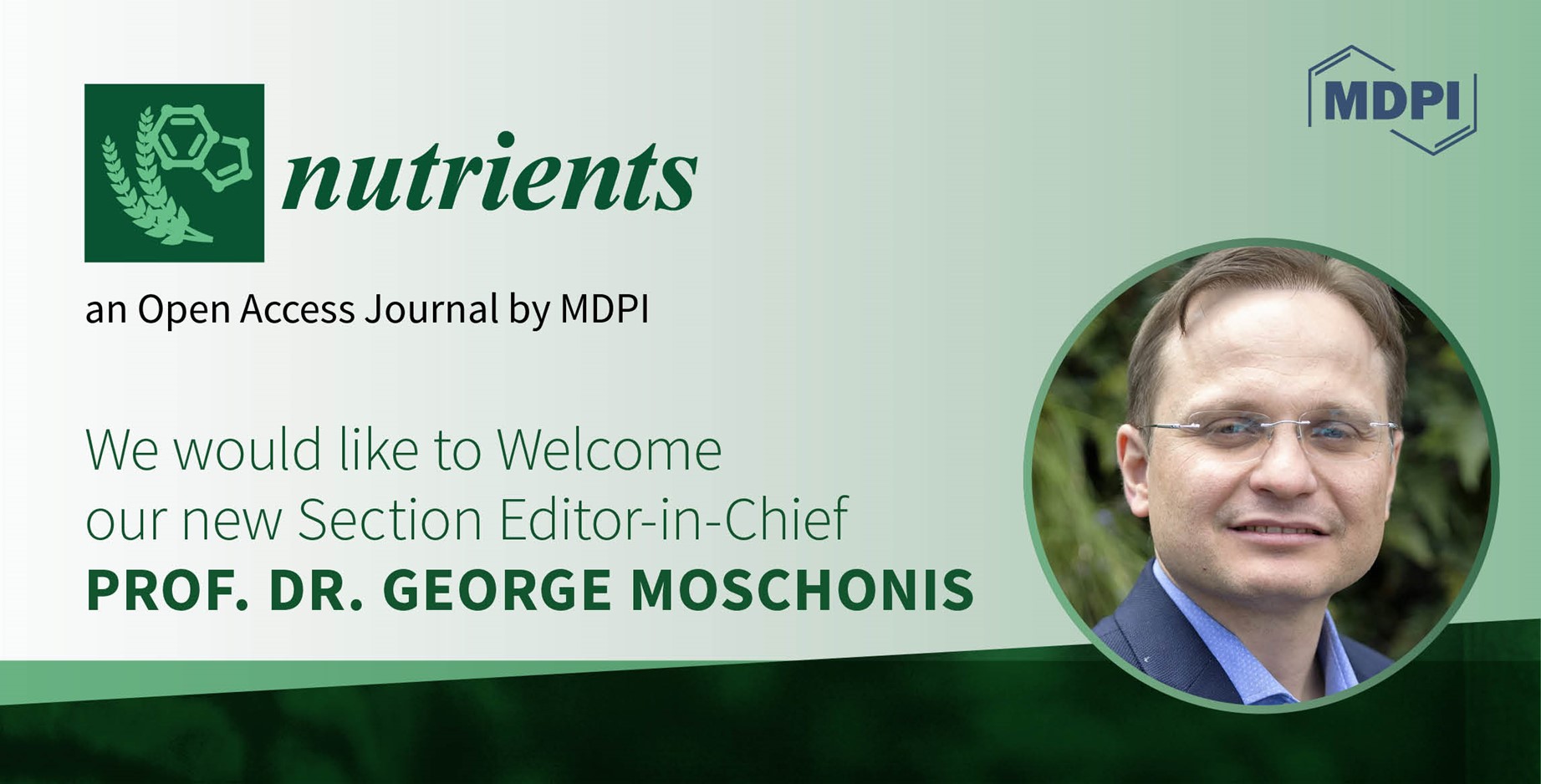
We are pleased to announce that Prof. Dr. George Moschonis has been appointed Section Editor-in-Chief of the “Nutrition Methodology & Assessment” Section in Nutrients (ISSN: 2072-6643).
Name: Prof. Dr. George Moschonis
Homepage: https://scholars.latrobe.edu.au/gmoschonis
Affiliation: School of Allied Health, Human Services and Sport, La Trobe University, Melbourne 3086, Australia
Interests: nutritional epidemiology; nutrition research methodology; nutritional assessment; nutrition counseling; functional foods
Prof. Dr. George Moschonis is a Professor at the Department of Dietetics, Nutrition and Sport at La Trobe University. Until December 2019, Prof. Dr. George Moschonis was the Head of the Discipline of Food, Nutrition and Dietetics.
Prof. Dr. Moschonis’ main research area of interest is the identification of determinants or predictors (starting from very early life stages) of obesity and obesity-related cardio-metabolic complications and the design and evaluation of the clinical effectiveness of nutrition counseling programs aiming to tackle the societal challenge of obesity and related co-morbidities (type 2 diabetes, cardiovascular disease, etc.).
In addition, his research expertise also extends toward the development of new functional food products, as well as to the design and implementation of human clinical trials that set the basis for the assessment of the clinical effectiveness of functional foods and dietary supplements in tackling nutrition-related health conditions.
Prof. Dr. George Moschonis is currently the chief investigator in several funded research projects taking place in Europe and Australia. As of May 2023, Prof. Dr. Moschonis has published 231 research articles in high-impact international peer-reviewed scientific journals, authored several book chapters and is a highly cited author, with his research outputs having more than 19,000 citations based on Scopus.
The following is a short Q&A with Prof. Dr. George Moschonis, who shared his vision for the journal and his views on the research area and open access publishing:
1. What appealed to you about the journal and encouraged you to become its Section Editor-in-Chief?
Nutrition methodology and assessment have been the focus of my academic activity and research over the last 20 years. As I was evolving in this field of nutritional science, I realized the need for methodologically valid and standardized approaches that can increase the quality of the evidence coming from nutrition research. In this regard, there are still several aspects of nutrition methodology and assessment that require refinement, as a means to reduce bias and improve the strength of scientific evidence, thus also setting a more solid basis for translation to nutrition guidelines and public health policy.
2. What is your vision for Nutrients?
I strongly believe that the "Nutrition Methodology & Assessment" Section in Nutrients will attract ample attention and interest from nutrition scientists and researchers globally, as it contributes towards the filling in of an important gap in nutrition science. At the same time, it will provide the opportunity for proposing and examining the validity of novel approaches and updates in nutrition research methods, including nutritional assessment techniques, data collection tools and processes, thus serving as a landmark for current and future researchers.
3. What does the future of this field of research look like?
There is a great need in the nutritional science community for standardized and scientifically valid methods in nutrition data collection and assessment. This necessity sets the basis for novel methods and tools, including digital solutions, which are expected to play an integral part and shape the future of nutrition research. The "Nutrition Methodology & Assessment" Section in Nutrients will foster high-impact articles in this significant and growing field of research.
4. What do you think of the development of open access in the publishing field?
Open access is quite important in research, as it allows the wider dissemination of scientific evidence not only to the scientific world, but also to the media, policy makers, educators and practitioners, thus facilitating the translation of research into practice, with numerous benefits for public health.
We warmly welcome Prof. Dr. George Moschonis as the new Section Editor-in-Chief and we look forward to him leading Nutrients to many more milestones.
16 May 2023
Meet Us at the 19th Annual International Conference of the Metabolomics Society, 18–22 June 2023, Niagara Falls, Ontario, Canada

Conference: 19th Annual International Conference of the Metabolomics Society
Date: 18–22 June 2023
Place: Niagara Falls Convention Centre, 6815 Stanley Avenue, Niagara Falls, Ontario, Canada L2G 3Y9
Booth: #T12
MDPI will be attending the 19th Annual International Conference of the Metabolomics Society, which will be held from 18 to 22 June 2023 in downtown Niagara Falls, Canada, at the Niagara Falls Convention Centre.
The conference is the official annual meeting of the Metabolomics Society, and the largest metabolomics meeting worldwide. It will cover the major scientific themes of: technology advances; computational metabolomics, statistics, and bioinformatics; metabolomics in health and disease; and metabolomics of plants, food, environment and microbes. A special theme for this conference will focus on mental health, drug addiction and medicinal cannabis. The scientific program will include plenary and keynote talks, three parallel scientific sessions, interactive poster sessions, sponsor lunches, other networking events and a specially organized parallel session to promote metabolomics research in industry. A strong line-up of both introductory and advanced workshops will take place on Sunday, 18 June, and the morning of Monday, 19 June. To complement the exciting scientific program, the conference will offer a welcome reception, vibrant early career events, a conference dinner and other engaging social activities.
The following MDPI journals will be represented:
- Metabolites;
- Agronomy;
- Antioxidants;
- Applied Biosciences;
- BioMed;
- BioMedInformatics;
- Biomolecules;
- Cancers;
- Cells;
- Children;
- CIMB;
- Diseases;
- Foods;
- Genes;
- JPM;
- Nutrients;
- Plants.
Please do not hesitate to reach out (metabolites@mdpi.com) if you plan on attending this conference. Our delegates look forward to meeting you in person and answering any questions that you might have.
For more information about the conference, please visit the following website: https://www.metabolomics2023.org/.
24 April 2023
Nutrients | Invitation to Read 2021–2022 Hot Topic Papers in Web of Science
We are delighted to present the hot topic papers from 2021 to 2022 in Web of Science, a curated list of high-quality articles from Nutrients (ISSN: 2072-6643), as shown below.
“Gut Microbiome Composition in Obese and Non-Obese Persons: A Systematic Review and Meta-Analysis”
by Mariona Pinart, Andreas Dötsch, Kristina Schlicht, Matthias Laudes, Jildau Bouwman, Sofia K. Forslund, Tobias Pischon and Katharina Nimptsch
Nutrients 2022, 14(1), 12; https://doi.org/10.3390/nu14010012
Available online: https://www.mdpi.com/2072-6643/14/1/12
Cited by 45 | Viewed by 5526
“Polyphenols–Gut Microbiota Interrelationship: A Transition to a New Generation of Prebiotics”
by Diana Plamada and Dan Cristian Vodnar
Nutrients 2022, 14(1), 137; https://doi.org/10.3390/nu14010137
Available online: https://www.mdpi.com/2072-6643/14/1/137
Cited by 57 | Viewed by 5900
“Assessment of Body Composition in Athletes: A Narrative Review of Available Methods with Special Reference to Quantitative and Qualitative Bioimpedance Analysis”
by Francesco Campa, Stefania Toselli, Massimiliano Mazzilli, Luís Alberto Gobbo and Giuseppe Coratella
Nutrients 2021, 13(5), 1620; https://doi.org/10.3390/nu13051620
Available online: https://www.mdpi.com/2072-6643/13/5/1620
Cited by 90 | Viewed by 11516
“Sarcopenic Dysphagia, Malnutrition, and Oral Frailty in Elderly: A Comprehensive Review”
by Alessandro de Sire, Martina Ferrillo, Lorenzo Lippi, Francesco Agostini, Roberto de Sire, Paola Emilia Ferrara, Giuseppe Raguso, Sergio Riso, Andrea Roccuzzo, Gianpaolo Ronconi et al.
Nutrients 2022, 14(5), 982; https://doi.org/10.3390/nu14050982
Available online: https://www.mdpi.com/2072-6643/14/5/982
Cited by 35 | Viewed by 6687
“Regulation of Neurotransmitters by the Gut Microbiota and Effects on Cognition in Neurological Disorders”
by Yijing Chen, Jinying Xu and Yu Chen
Nutrients 2021, 13(6), 2099; https://doi.org/10.3390/nu13062099
Available online: https://www.mdpi.com/2072-6643/13/6/2099
Cited by 91 | Viewed by 17645
“The Mediterranean Diet: An Update of the Clinical Trials”
by Mauro Finicelli, Anna Di Salle, Umberto Galderisi and Gianfranco Peluso
Nutrients 2022, 14(14), 2956; https://doi.org/10.3390/nu14142956
Available online: https://www.mdpi.com/2072-6643/14/14/2956
Cited by 18 | Viewed by 3343
“Beneficial Outcomes of Omega-6 and Omega-3 Polyunsaturated Fatty Acids on Human Health: An Update for 2021”
by Ivana Djuricic and Philip C. Calder
Nutrients 2021, 13(7), 2421; https://doi.org/10.3390/nu13072421
Available online: https://www.mdpi.com/2072-6643/13/7/2421
Cited by 142 | Viewed by 18350
“Polyphenols and Human Health: The Role of Bioavailability”
by Chiara Di Lorenzo, Francesca Colombo, Simone Biella, Creina Stockley and Patrizia Restani
Nutrients 2021, 13(1), 273; https://doi.org/10.3390/nu13010273
Available online: https://www.mdpi.com/2072-6643/13/1/273
Cited by 203 | Viewed by 11006
“Vitamin D Supplementation Does Not Influence SARS-CoV-2 Vaccine Efficacy or Immunogenicity: Sub-Studies Nested within the CORONAVIT Randomised Controlled Trial”
by David A. Jolliffe, Giulia Vivaldi, Emma S. Chambers, Weigang Cai, Wenhao Li, Sian E. Faustini, Joseph M. Gibbons, Corinna Pade, Anna K. Coussens, Alex G. Richter et al.
Nutrients 2022, 14(18), 3821; https://doi.org/10.3390/nu14183821
Available online: https://www.mdpi.com/2072-6643/14/18/3821
Cited by 8 | Viewed by 1700
“Effects of a 2-Week 5000 IU versus 1000 IU Vitamin D3 Supplementation on Recovery of Symptoms in Patients with Mild to Moderate COVID-19: A Randomized Clinical Trial”
by Shaun Sabico, Mushira A. Enani, Eman Sheshah, Naji J. Aljohani, Dara A. Aldisi, Naif H. Alotaibi, Naemah Alshingetti, Suliman Y. Alomar, Abdullah M. Alnaami, Osama E. Amer et al.
Nutrients 2021, 13(7), 2170; https://doi.org/10.3390/nu13072170
Available online: https://www.mdpi.com/2072-6643/13/7/2170
Cited by 74 | Viewed by 21609
7 April 2023
World Health Day–Health for All
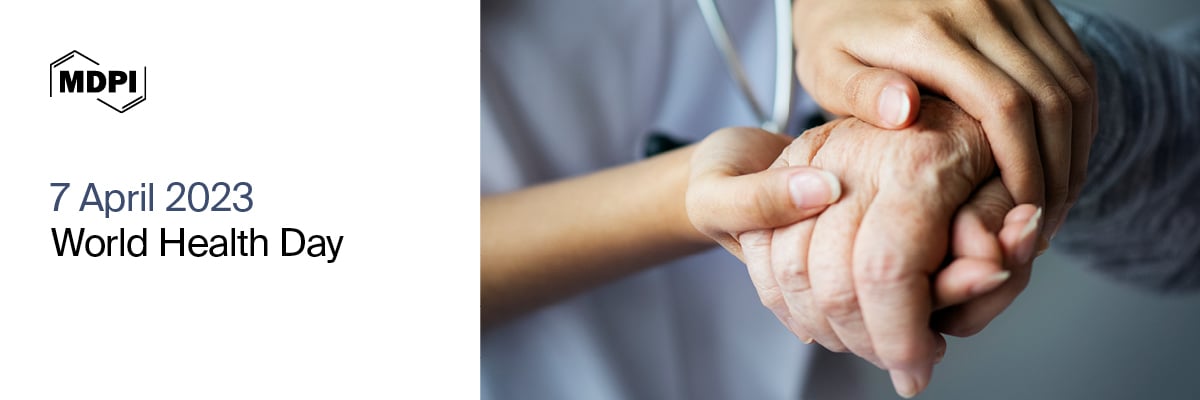
On 7 April 2023—World Health Day, the World Health Organization (WHO) will observe its 75th anniversary. In 1948, countries of the world came together and founded the WHO to promote health, keep the world safe, and serve the vulnerable, so that everyone, everywhere, can attain the highest level of health and well-being. The WHO’s 75th anniversary is an opportunity to look back at public health successes that have improved quality of life over the last seven decades. It is also an opportunity to motivate action to tackle the health challenges of today and tomorrow. In order to encourage everyone to understand health and pay attention to health, we have also curated a list of publications on topics related to universal health coverage, healthy diet, and mental health. We also want to remind everyone that all research published in MDPI journals is available in an open access format, allowing practitioners, policy makers, and people around the world to access the latest scientific knowledge to build upon and share. Although we still have a long way to go to achieve universal health, this day also provides an opportunity to celebrate the progress made and inspire further action toward a more just and equitable world. Join us on a journey at MDPI to achieve Health for All.
|
Journal Recommendation |
|||

- The Antioxidant Potential of the Mediterranean Diet as a Predictor of Weight Loss after a Very Low-Calorie Ketogenic Diet (VLCKD) in Women with Overweight and Obesity
Antioxidants 2023, 12(1), 18; https://doi.org/10.3390/antiox12010018
- Effectiveness of Non-Contact Dietary Coaching in Adults with Diabetes or Prediabetes Using a Continuous Glucose Monitoring Device: A Randomized Controlled Trial
Healthcare 2023, 11(2), 252; https://doi.org/10.3390/healthcare11020252
- The Association between Advanced Liver Fibrosis and Mortality Is Modified by Dietary Quality among Korean Adults: Results from the Korea National Health and Nutrition Examination Survey with Mortality Data
Nutrients 2023, 15(6), 1501; https://doi.org/10.3390/nu15061501
- Physical Exercise and Diet: Regulation of Gut Microbiota to Prevent and Treat Metabolic Disorders to Maintain Health
Nutrients 2023, 15(6), 1539; https://doi.org/10.3390/nu15061539
|
Section: Nutrition and Public Health |
Special Issue: Dietary Antioxidants and Cardiovascular Health |

- Modelling and Prediction of the Spread of COVID-19 in Cameroon and Assessing the Governmental Measures (March–September 2020)
COVID 2021, 1(3), 622-644; https://doi.org/10.3390/covid1030052
- SARS-CoV-2 Infection in Health Care Workers of Trieste (North-Eastern Italy), 1 October 2020–7 February 2022: Occupational Risk and the Impact of the Omicron Variant
Viruses 2022, 14(8), 1663; https://doi.org/10.3390/v14081663
- Vaccination Coverage during Childhood and Adolescence among Undergraduate Health Science Students in Greece
Children 2022, 9(10), 1553; https://doi.org/10.3390/children9101553
- Determinants of Equity in Coverage of Measles-Containing Vaccines in Wales, UK, during the Elimination Era
Vaccines 2023, 11(3), 680; https://doi.org/10.3390/vaccines11030680
|
Section: School Health |
Topical Collection: Poxviruses |

- Sex Differences in Substance Use, Prevalence, Pharmacological Therapy, and Mental Health in Adolescents with Attention-Deficit/Hyperactivity Disorder (ADHD)
Brain Sci. 2022, 12(5), 590; https://doi.org/10.3390/brainsci12050590
- Impact on Students of the Act–Belong–Commit Mentally Healthy Schools Framework
Children 2023, 10(3), 548; https://doi.org/10.3390/children10030548
- Psychological Health and Drugs: Data-Driven Discovery of Causes, Treatments, Effects, and Abuses
Toxics 2023, 11(3), 287; https://doi.org/10.3390/toxics11030287
- Characterizing Touch Discrimination Impairment from Pooled Stroke Samples Using the Tactile Discrimination Test: Updated Criteria for Interpretation and Brief Test Version for Use in Clinical Practice Settings
Brain Sci. 2023, 13(4), 533; https://doi.org/10.3390/brainsci13040533
|
Special Issue: Disruptive Behavior Disorders: Symptoms, Evaluation and Treatment |
Special Issue: Organophosphate-Induced Neurotoxicity: Countermeasures, Mechanisms, and Physiology |

4 April 2023
Meet Us at the 11th AOHUPO and 7th AOAPO Congress, 8–10 May 2023, Singapore

MDPI will be attending the 11th AOHUPO and 7th AOAPO Congress, hosted by the SSMS and the Malaysian Proteomics Society (MAPS), which will be held from 8 to 10 May 2023, in Singapore. The 3-day face-to-face joint congress will feature distinguished invited speakers in 5 plenary sessions and 27 concurrent sessions, covering broad topics of proteomics and mass spectrometry technologies and applications in health/biomedical research, agriculture/aquaculture, food, and environmental sciences. Congress participants will have the opportunity to submit abstracts for oral and poster presentations. In addition, the organizers have also planned to hold a Young Scientist Forum (YSF) for young scientists as a preconference activity.
The following MDPI journals will be represented:
If you plan on attending this conference, please feel free to stop by our booth (#A15) and start a conversation with us. Our delegates look forward to meeting you in person and answering any questions that you may have. For more information about the conference, please visit the following link: https://www.aohupo-aoapo-2023.org/.
13 March 2023
MDPI’s Newly Launched Journals in December 2022
As a leading open access publisher, MDPI provides scholars with a high-quality and rich academic exchange platform by continuously expanding into new and exciting research areas.
In December 2022, MDPI launched five new journals, covering multiple subjects such as life sciences, biology, medicine and pharmacology, social sciences and humanities. These new journals are being edited by established scholars across the world.
|
Journal |
Founding Editor-in-Chief |
Journal Topics (Selected) |
|
Prof. Dr. Fabio Gresta, University of Messina, Italy| Editorial | view inaugural issue |
grass/forage/turf production; grassland management; pasture monitoring; grazing and livestock; grass agro-ecosystems| view journal scope | submit an article |
|
|
Prof. Dr. Christos G. Athanassiou, University of Thessaly, Greece| Editorial | view inaugural issue |
pesticides; fungicides; herbicides; fertilizers; soil conditioners| view journal scope | submit an article |
|
|
Prof. Dr. Stephen H. Safe, Texas A&M University, USA| Editorial | view inaugural issue |
receptor structure; receptor function; receptor signaling; receptor expression and regulation; receptor interactions with drugs| view journal scope | submit an article |
|
|
Dr. Jean Jacques Vanden Eynde, University of Mons-UMONS, Belgium| Editorial | view inaugural issue |
drug discovery; medicinal chemistry; preclinical and clinical research; marketed drugs; intellectual property and regulatory affairs| view journal scope | submit an article |
|
|
Prof. Dr. Heather Kanuka, University of Alberta, Canada| Editorial | view inaugural issue |
higher education; tertiary education; policy and practice in higher education; educational leadership in higher education; educational administration and management in higher education| view journal scope | submit an article |
If you are interested in creating more open access journals with us to publish cutting-edge research, please send your journal proposal application to newjournal-committee@mdpi.com.
7 March 2023
Displaying Co-Authors’ Email Addresses on the Webpage of Published Papers
MDPI is pleased to announce that we now display the co-authors’ email addresses in addition to the corresponding author’s email address on the webpage of published papers, protected by Captcha. For more information about this change, please visit the journal’s instructions for authors page.
We believe this change will facilitate academic discussions and advance our cause of open science and research. The corresponding authors are responsible for communicating with their co-authors and indicating in our system (https://susy.mdpi.com/) if co-authors would prefer for their email addresses not to be displayed.
16 February 2023
Increasing Visibility for Preprints.org – Clarivate adds the Preprint Citation Index to the Web of Science
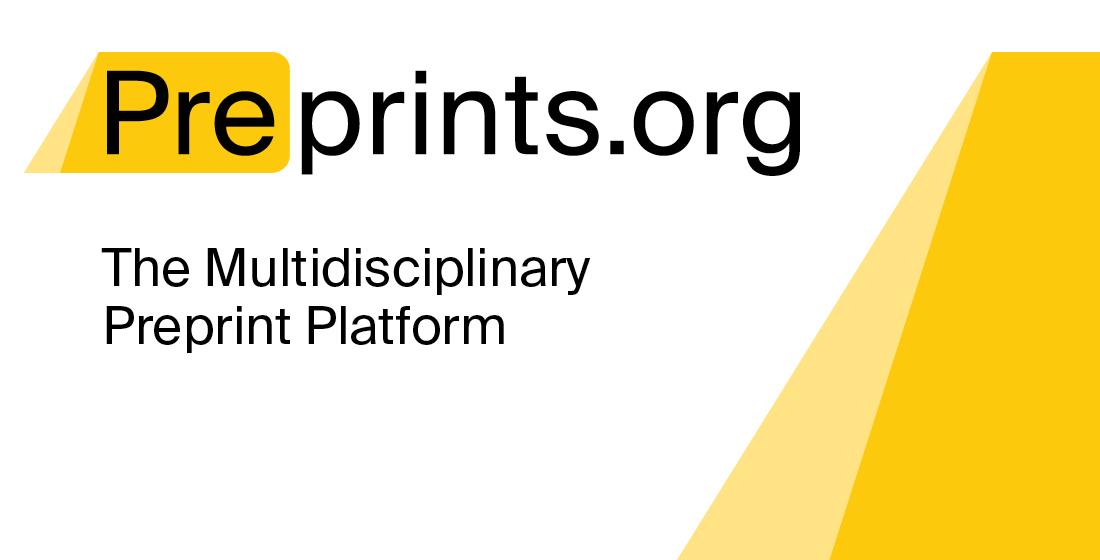
On 9 February 2023, Clarivate, a global leader in providing trusted insights and analytics, added the Preprint Citation Index to the Web of Science platform, streamlining the research process by allowing researchers to locate and link to preprints alongside other trusted content in the database.
The Preprint Citation Index will act as a bridge to connect cutting-edge preprints with peer-reviewed journal articles published within the Web of Science Core Collection. Alerts can be easily set to monitor new research across several repositories and authors will also be able to include preprints on their Web of Science Research Profile to more accurately display their various research outputs.
As of its launch, the Preprint Citation Index will provide nearly two million preprints from various repositories, including MDPI’s own Preprints.org.
MDPI's Preprints Platform – Preprints.org
To advance Open Science and the fast dissemination of research, MDPI offers researchers a free multidisciplinary preprint platform. Preprints.org accepts submissions from all research areas and offers authors high visibility, permanent archiving, article-level Metrics and immediately citable content by assigning a Digital Object Identifier (DOI) to all preprints.
During submission to any MDPI journal, authors have the option to share their research as a preprint. After an initial screening, the manuscript is available online in 48 hours or less. Once online, preprints can be downloaded, shared, commented on, and cited, providing authors maximum visibility.
We invite you to join the ranks of the over 100k researchers using Preprints.org and share your research.
For more information, please visit Preprints.org.
1 February 2023
Prof. Dr. Jaime Uribarri Appointed Section Editor-in-Chief of Section “Clinical Nutrition” in Nutrients
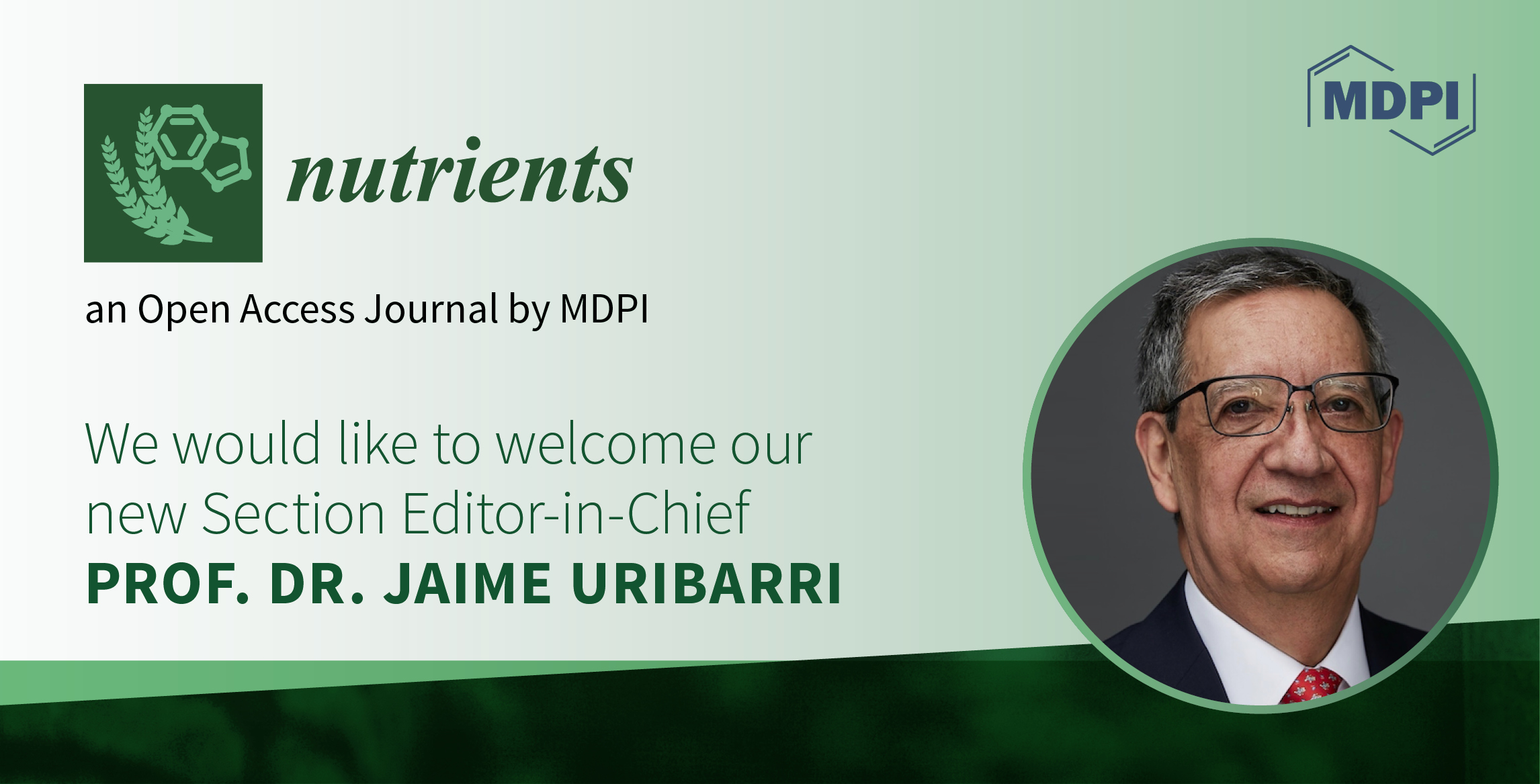
We are pleased to announce that Prof. Dr. Jaime Uribarri has been appointed Section Editor-in-Chief of the “Clinical Nutrition” Section in Nutrients (ISSN: 2072-6643).
Name: Prof. Dr. Jaime Uribarri
Homepage: http://www.mountsinai.org/profiles/jaime-uribarri
Affiliation: Icahn School of Medicine at Mount Sinai, New York, NY 10029, USA
Interests: diabetes; chronic kidney disease; dietary advanced glycation end products; dietary phosphorus; acid-base metabolism
Prof. Dr. Jaime Uribarri is a practicing nephrologist and clinical investigator in NYC. He was born in Chile and received his medical degree from the University of Chile School of Medicine. He did all his postgraduate training in the United States. He has been in the Icahn School of Medicine at Mount Sinai, NYC, since 1990, where he is currently Professor of Medicine and Director of the Renal Clinic and the Home Dialysis Program at the Mount Sinai Hospital.
In parallel with his clinical activities, Prof. Dr. Uribarri has been very active in clinical investigation for more than 40 years. His main areas of research have included acid-base, fluids, electrolyte disorders and nutrition in chronic kidney disease and diabetic patients (particularly in the fields of dietary phosphorus and dietary advanced glycation end products or AGEs). He has published over 200 peer-reviewed papers and written many chapters in books. He has lectured extensively on these research topics at local, national and international meetings.
He has edited a book on dietary AGEs and co-edited a book on dietary phosphorus published by the CRC Press. He serves as an ad hoc referee for numerous nutrition, medical and other scientific journals and he is an active member of several health organizations and professional associations including the American Society of Nephrology and the American Society of Nutrition.
The following is a short Q&A with Prof. Dr. Jaime Uribarri, who shared his vision for the journal and his views on the research area and Open Access publishing:
1. What appealed to you about the journal and encouraged you to become its Section Editor-in-Chief?
Nutrition is and will remain the focus of my research activities and is central to the strategies I apply in the care of my patients. In the USA, the main cause of chronic kidney disease is by far Diabetes type 2 and the main cause of death in these patients is cardiovascular disease, all of which result mostly from lifestyles, particularly unhealthy nutrition. Therefore, it is impossible to be involved in clinical practice and ignore the important contribution that nutrition has in the initiation and progression of these chronic diseases, on top and beyond the use of medications. I believe that Nutrients as a journal, and especially the “Clinical Nutrition” Section, lends itself very well to connect the field of nutrition with the practice of medicine, which is a very important goal for me.
2. What is your vision for Nutrients?
I would like to see the “Clinical Nutrition” Section growing and contributing significantly to strengthen the connection between nutrition and medicine in general, which I believe is badly needed. I would like the journal to become a point of knowledge translation that will help to disseminate new knowledge in nutrition to clinicians in the form of reviews and perspectives that could be easily understood.
3. What does the future of this field of research look like?
The field of clinical nutrition is a growing one and I expect this situation to continue in the near future. The increasing prevalence of chronic non-transmissible diseases in the Western world, due in part to unhealthy nutrition, combined with diseases of malnutrition in the developing world, makes this field of research particularly important.
We warmly welcome Prof. Dr. Jaime Uribarri as the new Section Editor-in-Chief and we look forward to him leading Nutrients to reach many more milestones.
3 January 2023
Nutrients | Invitation to Read the Current Editor’s Choice Articles Published in 2021–2022
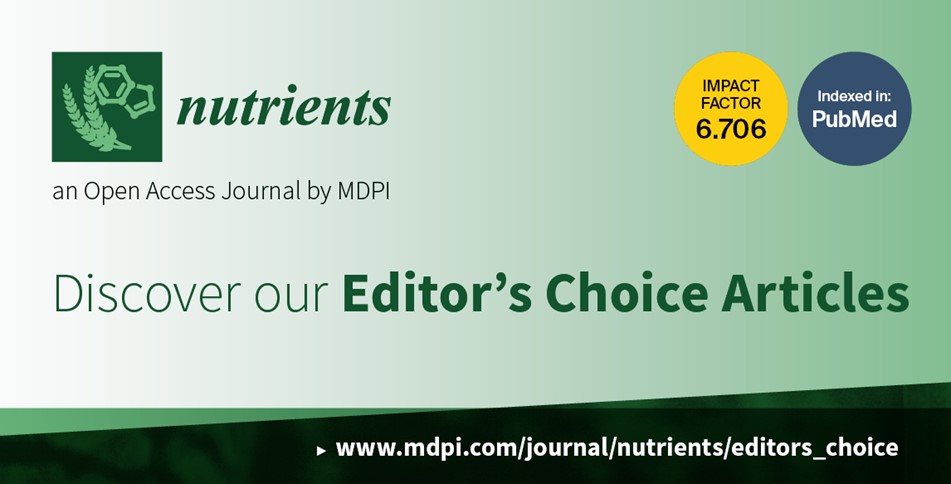
Editor's Choice Articles are selected based on suggestions from Nutrients’ academic editors from around the world. These editors select a small number of articles that have recently been published in the journal that they consider to be of particular interest to readers or important in their respective fields of research. We are delighted to present the 2021–2022 Editor's Choice Articles, a curated list of high-quality articles from Nutrients (ISSN: 2072-6643), shown below. The full list of Editor's Choice Articles can be seen at the following link: https://www.mdpi.com/journal/nutrients/editors_choice.
“Sarcopenic Dysphagia, Malnutrition, and Oral Frailty in Elderly: A Comprehensive Review”
by Alessandro de Sire, Martina Ferrillo, Lorenzo Lippi, Francesco Agostini, Roberto de Sire, Paola Emilia Ferrara, Giuseppe Raguso, Sergio Riso, Andrea Roccuzzo, Gianpaolo Ronconi et al.
Nutrients 2022, 14(5), 982; https://doi.org/10.3390/nu14050982
Available online: https://www.mdpi.com/2072-6643/14/5/982
Cited by 29 | Viewed by 4355
“Phenolic Acids and Prevention of Cognitive Decline: Polyphenols with a Neuroprotective Role in Cognitive Disorders and Alzheimer’s Disease”
by Giuseppe Caruso, Justyna Godos, Anna Privitera, Giuseppe Lanza, Sabrina Castellano, Alessio Chillemi, Oliviero Bruni, Raffaele Ferri, Filippo Caraci and Giuseppe Grosso
Nutrients 2022, 14(4), 819; https://doi.org/10.3390/nu14040819
Available online: https://www.mdpi.com/2072-6643/14/4/819
Cited by 25 | Viewed by 3660
“The Effect of Dietary Polyphenols on Vascular Health and Hypertension: Current Evidence and Mechanisms of Action”
by Giuseppe Grosso, Justyna Godos, Walter Currenti, Agnieszka Micek, Luca Falzone, Massimo Libra, Francesca Giampieri, Tamara Y. Forbes-Hernández, José L. Quiles, Maurizio Battino et al.
Nutrients 2022, 14(3), 545; https://doi.org/10.3390/nu14030545
Available online: https://www.mdpi.com/2072-6643/14/3/545
Cited by 19 | Viewed by 3144
“The Potential Role of Gut Microbiota in Alzheimer’s Disease: From Diagnosis to Treatment”
by Angelica Varesi, Elisa Pierella, Marcello Romeo, Gaia Bavestrello Piccini, Claudia Alfano, Geir Bjørklund, Abigail Oppong, Giovanni Ricevuti, Ciro Esposito, Salvatore Chirumbolo et al.
Nutrients 2022, 14(3), 668; https://doi.org/10.3390/nu14030668
Available online: https://www.mdpi.com/2072-6643/14/3/668
Cited by 20 | Viewed by 5535
“Critical Appraisal of Large Vitamin D Randomized Controlled Trials”
by Stefan Pilz, Christian Trummer, Verena Theiler-Schwetz, Martin R. Grübler, Nicolas D. Verheyen, Balazs Odler, Spyridon N. Karras, Armin Zittermann and Winfried März
Nutrients 2022, 14(2), 303; https://doi.org/10.3390/nu14020303
Available online: https://www.mdpi.com/2072-6643/14/2/303
Cited by 17 | Viewed by 3147
“Oleanolic Acid: Extraction, Characterization and Biological Activity”
by José M. Castellano, Sara Ramos-Romero and Javier S. Perona
Nutrients 2022, 14(3), 623; https://doi.org/10.3390/nu14030623
Available online: https://www.mdpi.com/2072-6643/14/3/623
Cited by 17 | Viewed by 3291
“Role of Probiotics in the Management of COVID-19: A Computational Perspective”
by Quang Vo Nguyen, Li Chuin Chong, Yan-Yan Hor, Lee-Ching Lew, Irfan A. Rather and Sy-Bing Choi
Nutrients 2022, 14(2), 274; https://doi.org/10.3390/nu14020274
Available online: https://www.mdpi.com/2072-6643/14/2/274
Cited by 15 | Viewed by 4624
“A Narrative Review of the Evidence for Variations in Serum 25-Hydroxyvitamin D Concentration Thresholds for Optimal Health”
by William B. Grant, Fatme Al Anouti, Barbara J. Boucher, Erdinç Dursun, Duygu Gezen-Ak, Edward B. Jude, Tatiana Karonova and Pawel Pludowski
Nutrients 2022, 14(3), 639; https://doi.org/10.3390/nu14030639
Available online: https://www.mdpi.com/2072-6643/14/3/639
Cited by 15 | Viewed by 13002
“Fermented Foods, Health and the Gut Microbiome”
by Natasha K. Leeuwendaal, Catherine Stanton, Paul W. O’Toole and Tom P. Beresford
Nutrients 2022, 14(7), 1527; https://doi.org/10.3390/nu14071527
Available online: https://doi.org/10.3390/nu14071527
Cited by 15 | Viewed by 5188
“The Role of Minerals in the Optimal Functioning of the Immune System”
by Christopher Weyh, Karsten Krüger, Peter Peeling and Lindy Castell
Nutrients 2022, 14(3), 644; https://doi.org/10.3390/nu14030644
Available online: https://www.mdpi.com/2072-6643/14/3/644
Cited by 14 | Viewed by 4461
“Polyphenols and Human Health: The Role of Bioavailability”
by Chiara Di Lorenzo, Francesca Colombo, Simone Biella, Creina Stockley and Patrizia Restani
Nutrients 2021, 13(1), 273; https://doi.org/10.3390/nu13010273
Available online: https://www.mdpi.com/2072-6643/13/1/273
Cited by 144 | Viewed by 9091
“Beneficial Outcomes of Omega-6 and Omega-3 Polyunsaturated Fatty Acids on Human Health: An Update for 2021”
by Ivana Djuricic and Philip C. Calder
Nutrients 2021, 13(7), 2421; https://doi.org/10.3390/nu13072421
Available online: https://www.mdpi.com/2072-6643/13/7/2421
Cited by 93 | Viewed by 13899
“Assessment of Body Composition in Athletes: A Narrative Review of Available Methods with Special Reference to Quantitative and Qualitative Bioimpedance Analysis”
by Francesco Campa, Stefania Toselli, Massimiliano Mazzilli, Luís Alberto Gobbo and Giuseppe Coratella
Nutrients 2021, 13(5), 1620; https://doi.org/10.3390/nu13051620
Available online: https://www.mdpi.com/2072-6643/13/5/1620
Cited by 77 | Viewed by 9360
“Nutritional Components in Western Diet Versus Mediterranean Diet at the Gut Microbiota–Immune System Interplay. Implications for Health and Disease”
by Cielo García-Montero, Oscar Fraile-Martínez, Ana M. Gómez-Lahoz, Leonel Pekarek, Alejandro J. Castellanos, Fernando Noguerales-Fraguas, Santiago Coca, Luis G. Guijarro, Natalio García-Honduvilla, Angel Asúnsolo et al.
Nutrients 2021, 13(2), 699; https://doi.org/10.3390/nu13020699
Available online: https://www.mdpi.com/2072-6643/13/2/699
Cited by 74 | Viewed by 15374
“Curcumin, Quercetin, Catechins and Metabolic Diseases: The Role of Gut Microbiota”
by Umair Shabbir, Momna Rubab, Eric Banan-Mwine Daliri, Ramachandran Chelliah, Ahsan Javed and Deog-Hwan Oh
Nutrients 2021, 13(1), 206; https://doi.org/10.3390/nu13010206
Available online: https://www.mdpi.com/2072-6643/13/1/206
Cited by 73 | Viewed by 9431
“Longitudinal Weight Gain and Related Risk Behaviors during the COVID-19 Pandemic in Adults in the US”
by Surabhi Bhutani, Michelle R. vanDellen and Jamie A. Cooper
Nutrients 2021, 13(2), 671; https://doi.org/10.3390/nu13020671
Available online: https://www.mdpi.com/2072-6643/13/2/671
Cited by 68 | Viewed by 7098
“Patterns of Change in Dietary Habits and Physical Activity during Lockdown in Spain Due to the COVID-19 Pandemic”
by Carmen Pérez-Rodrigo, Marta Gianzo Citores, Gotzone Hervás Bárbara, Fátima Ruiz-Litago, Luis Casis Sáenz, Victoria Arija, Ana M. López-Sobaler, Emilio Martínez de Victoria, Rosa M. Ortega, Teresa Partearroyo et al.
Nutrients 2021, 13(2), 300; https://doi.org/10.3390/nu13020300
Available online: https://www.mdpi.com/2072-6643/13/2/300
Cited by 64 | Viewed by 13335
“Lifestyle Changes and Determinants of Children’s and Adolescents’ Body Weight Increase during the First COVID-19 Lockdown in Greece: The COV-EAT Study”
by Odysseas Androutsos, Maria Perperidi, Christos Georgiou and Giorgos Chouliaras
Nutrients 2021, 13(3), 930; https://doi.org/10.3390/nu13030930
Available online: https://www.mdpi.com/2072-6643/13/3/930
Cited by 65 | Viewed by 7568
“Regulation of Neurotransmitters by the Gut Microbiota and Effects on Cognition in Neurological Disorders”
by Yijing Chen, Jinying Xu and Yu Chen
Nutrients 2021, 13(6), 2099; https://doi.org/10.3390/nu13062099
Available online: https://www.mdpi.com/2072-6643/13/6/2099
Cited by 59 | Viewed by 14341
“Malnutrition in Older Adults—Recent Advances and Remaining Challenges”
by Kristina Norman, Ulrike Haß and Matthias Pirlich
Nutrients 2021, 13(8), 2764; https://doi.org/10.3390/nu13082764
Available online: https://www.mdpi.com/2072-6643/13/8/2764
Cited by 60 | Viewed by 11170
3 January 2023
Nutrients | Issue Cover Papers in 2022
- "The Exposome and Immune Health in Times of the COVID-19 Pandemic"
by Javier S. Morales, Pedro L. Valenzuela, Adrián Castillo-García, Javier Butragueño, David Jiménez-Pavón, Pedro Carrera-Bastos and Alejandro Lucia
Nutrients 2022, 14(1), 24; https://doi.org/10.3390/nu14010024
Available online: https://www.mdpi.com/2072-6643/14/1/24 - "Synergistic Effect of Squalene and Hydroxytyrosol on Highly Invasive MDA-MB-231 Breast Cancer Cells"
by Cristina Sánchez-Quesada, Francisco Gutiérrez-Santiago, Carmen Rodríguez-García and José J. Gaforio
Nutrients 2022, 14(2), 255; https://doi.org/10.3390/nu14020255
Available online: https://www.mdpi.com/2072-6643/14/2/255 - "Late-Night Overeating or Low-Quality Food Choices Late at Night Are Associated with Subclinical Vascular Damage in Patients at Increased Cardiovascular Risk"
by Eirini D. Basdeki, Konstantina Koumi, Christiana Tsirimiagkou, Antonios Argyris, Stavri Chrysostomou, Petros P. Sfikakis, Athanase D. Protogerou and Kalliopi Karatzi
Nutrients 2022, 14(3), 470; https://doi.org/10.3390/nu14030470
Available online: https://www.mdpi.com/2072-6643/14/3/470 - "Are Front-of-Pack Labels a Health Policy Tool?"
by Luca Muzzioli, Claudia Penzavecchia, Lorenzo Maria Donini and Alessandro Pinto
Nutrients 2022, 14(4), 771; https://doi.org/10.3390/nu14040771
Available online: https://www.mdpi.com/2072-6643/14/4/771 - "Chicory: Understanding the Effects and Effectors of This Functional Food"
by Céline L. Pouille, Souad Ouaza, Elise Roels, Josette Behra, Melissa Tourret, Roland Molinié, Jean-Xavier Fontaine, David Mathiron, David Gagneul, Bernard Taminiau et al.
Nutrients 2022, 14(5), 957; https://doi.org/10.3390/nu14050957
Available online: https://www.mdpi.com/2072-6643/14/5/957 - "Meta-Analysis of Randomized Clinical Trials Evaluating Effectiveness of a Multivitamin Supplementation against Oxidative Stress in Healthy Subjects"
by Seoyoung Lee, Iksoo Huh, Seunghee Kang, Yea-eun Nam, Youngseo Cho, Md Kamruzzaman, Jina Hong, Oran Kwon and Taesung Park
Nutrients 2022, 14(6), 1170; https://doi.org/10.3390/nu14061170
Available online: https://www.mdpi.com/2072-6643/14/6/1170 - "Pilot Double-Blind Randomised Controlled Trial: Effects of Jejunal Nutrition on Postprandial Distress in Diabetic Gastropathy (J4G Trial)"
by Lucianno Carneiro, Jonathan White, Helen Parker, Caroline Hoad, Emily Tucker, Luca Marciani, Penny Gowland, Tasso Gazis, Marjorie Walker and Mark Fox
Nutrients 2022, 14(7), 1321; https://doi.org/10.3390/nu14071321
Available online: https://www.mdpi.com/2072-6643/14/7/1321 - "Relevance of β-Glucan Molecular Properties on Its Suitability as Health Promoting Bread Ingredient"
by Marcus Schmidt, Elisabeth Sciurba, Sharline Nikolay, Alexandra Hüsken and Inga Smit
Nutrients 2022, 14(8), 1570; https://doi.org/10.3390/nu14081570
Available online: https://www.mdpi.com/2072-6643/14/8/1570 - "Plasma Caffeine Levels and Risk of Alzheimer’s Disease and Parkinson’s Disease: Mendelian Randomization Study"
by Susanna C. Larsson, Benjamin Woolf and Dipender Gill
Nutrients 2022, 14(9), 1697; https://doi.org/10.3390/nu14091697
Available online: https://www.mdpi.com/2072-6643/14/9/1697 - "Associations between Breastfeeding Duration and Obesity Phenotypes and the Offsetting Effect of a Healthy Lifestyle"
by Jiajia Dang, Ting Chen, Ning Ma, Yunfei Liu, Panliang Zhong, Di Shi, Yanhui Dong, Zhiyong Zou, Yinghua Ma, Yi Song et al.
Nutrients 2022, 14(10), 1999; https://doi.org/10.3390/nu14101999
Available online: https://www.mdpi.com/2072-6643/14/10/1999 - "Moderate Alcohol Use Is Associated with Reduced Cardiovascular Risk in Middle-Aged Men Independent of Health, Behavior, Psychosocial, and Earlier Life Factors"
by Linda K. McEvoy, Jaclyn Bergstrom, Xinming Tu, Alexis C. Garduno, Kevin M. Cummins, Carol E. Franz, Michael J. Lyons, Chandra A. Reynolds, William S. Kremen, Matthew S. Panizzon et al.
Nutrients 2022, 14(11), 2183; https://doi.org/10.3390/nu14112183
Available online: https://www.mdpi.com/2072-6643/14/11/2183 - "Red Blood Cell DHA Is Inversely Associated with Risk of Incident Alzheimer’s Disease and All-Cause Dementia: Framingham Offspring Study"
by Aleix Sala-Vila, Claudia L. Satizabal, Nathan Tintle, Debora Melo van Lent, Ramachandran S. Vasan, Alexa S. Beiser, Sudha Seshadri and William S. Harris
Nutrients 2022, 14(12), 2408; https://doi.org/10.3390/nu14122408
Available online: https://www.mdpi.com/2072-6643/14/12/2408 - "Prolonged Isolated Soluble Dietary Fibre Supplementation in Overweight and Obese Patients: A Systematic Review with Meta-Analysis of Randomised Controlled Trials"
by Valentina V. Huwiler, Katja A. Schönenberger, Alexander Segesser von Brunegg, Emilie Reber, Stefan Mühlebach, Zeno Stanga and Maria L. Balmer
Nutrients 2022, 14(13), 2627; https://doi.org/10.3390/nu14132627
Available online: https://www.mdpi.com/2072-6643/14/13/2627 - "Vitamin B12 Regulates the Transcriptional, Metabolic, and Epigenetic Programing in Human Ileal Epithelial Cells"
by Yong Ge, Mojgan Zadeh and Mansour Mohamadzadeh
Nutrients 2022, 14(14), 2825; https://doi.org/10.3390/nu14142825
Available online: https://www.mdpi.com/2072-6643/14/14/2825 - "KYMASIN UP Natural Product Inhibits Osteoclastogenesis and Improves Osteoblast Activity by Modulating Src and p38 MAPK"
by Laura Salvadori, Maria Laura Belladonna, Beatrice Castiglioni, Martina Paiella, Eleonora Panfili, Tommaso Manenti, Catia Ercolani, Luca Cornioli, Sara Chiappalupi, Giulia Gentili et al.
Nutrients 2022, 14(15), 3053; https://doi.org/10.3390/nu14153053
Available online: https://www.mdpi.com/2072-6643/14/15/3053 - "The Impact of Dietary Factors on the Sleep of Athletically Trained Populations: A Systematic Review"
by Jackson Barnard, Spencer Roberts, Michele Lastella, Brad Aisbett and Dominique Condo
Nutrients 2022, 14(16), 3271; https://doi.org/10.3390/nu14163271
Available online: https://www.mdpi.com/2072-6643/14/16/3271 - "Effects of Resveratrol, Curcumin and Quercetin Supplementation on Bone Metabolism—A Systematic Review"
by Alessio Danilo Inchingolo, Angelo Michele Inchingolo, Giuseppina Malcangi, Pasquale Avantario, Daniela Azzollini, Silvio Buongiorno, Fabio Viapiano, Merigrazia Campanelli, Anna Maria Ciocia, Nicole De Leonardis et al.
Nutrients 2022, 14(17), 3519; https://doi.org/10.3390/nu14173519
Available online: https://www.mdpi.com/2072-6643/14/17/3519 - "Effects of Dietary Nitrate Supplementation on Performance and Muscle Oxygenation during Resistance Exercise in Men"
by Rachel Tan, Adam Pennell, Katherine M. Price, Sean T. Karl, Noelle G. Seekamp-Hicks, Keonabelle K. Paniagua, Grant D. Weiderman, Joanna P. Powell, Luka K. Sharabidze, Isabella G. Lincoln et al.
Nutrients 2022 14(18), 3703; https://doi.org/10.3390/nu14183703
Available online: https://www.mdpi.com/2072-6643/14/18/3703 - "Is Melatonin the “Next Vitamin D”?: A Review of Emerging Science, Clinical Uses, Safety, and Dietary Supplements"
by Deanna M. Minich, Melanie Henning, Catherine Darley, Mona Fahoum, Corey B. Schuler and James Frame
Nutrients 2022, 14(19), 3934. https://doi.org/10.3390/nu14193934
Available online: https://www.mdpi.com/2072-6643/14/19/3934 - "Dietary Fats and Cardio-Metabolic Outcomes in a Cohort of Italian Adults"
by Walter Currenti, Justyna Godos, Amer M. Alanazi, Giuseppe Grosso, Raffaele Ivan Cincione, Sandro La Vignera, Silvio Buscemi and Fabio Galva
Nutrients 2022, 14(20), 4294; https://doi.org/10.3390/nu14204294
Available online: https://www.mdpi.com/2072-6643/14/20/4294 - "Comparing Even with Skewed Dietary Protein Distribution Shows No Difference in Muscle Protein Synthesis or Amino Acid Utilization in Healthy Older Individuals: A Randomized Controlled Trial"
by Thomas Ehlig Hjermind Justesen, Simon Elmer Jespersen, Thomas Tagmose Thomsen, Lars Holm, Gerrit van Hall and Jakob Agergaard
Nutrients 2022, 14(21), 4442; https://doi.org/10.3390/nu14214442
Available online: https://www.mdpi.com/2072-6643/14/21/4442 - "Rehabilitation Nutrition in Patients with Chronic Kidney Disease and Cachexia"
by Masatsugu Okamura, Tatsuro Inoue, Masato Ogawa, Kengo Shirado, Nobuyuki Shirai, Takuma Yagi, Ryo Momosaki and Yoji Kokura
Nutrients 2022, 14(22), 4722; https://doi.org/10.3390/nu14224722
Available online: https://www.mdpi.com/2072-6643/14/22/4722 - "Effects of l-Arginine Plus Vitamin C Supplementation on Physical Performance, Endothelial Function, and Persistent Fatigue in Adults with Long COVID: A Single-Blind Randomized Controlled Trial"
by Matteo Tosato, Riccardo Calvani, Anna Picca, Francesca Ciciarello, Vincenzo Galluzzo, Hélio José Coelho-Júnior, Angela Di Giorgio, Clara Di Mario, Jacopo Gervasoni, Elisa Gremese et al.
Nutrients 2022, 14(23), 4984; https://doi.org/10.3390/nu14234984
Available online: https://www.mdpi.com/2072-6643/14/23/4984 - "Plant-Based Diets and Lipid, Lipoprotein, and Inflammatory Biomarkers of Cardiovascular Disease: A Review of Observational and Interventional Studies"
by Patrick S. Elliott, Soraeya S. Kharaty and Catherine M. Phillips
Nutrients 2022, 14(24), 5371; https://doi.org/10.3390/nu14245371
Available online: https://www.mdpi.com/2072-6643/14/24/5371
23 December 2022
Nutrients | Issue Cover Papers in 2021
- “Effects of Coffee and Its Components on the Gastrointestinal Tract and the Brain–Gut Axis”
by Amaia Iriondo-DeHond, José Antonio Uranga, Maria Dolores del Castillo and Raquel Abalo
Nutrients 2021, 13(1), 88; https://doi.org/10.3390/nu13010088
Available online: https://www.mdpi.com/2072-6643/13/1/88 - “Priming for Life: Early Life Nutrition and the Microbiota-Gut-Brain Axis”
by Anna Ratsika, Martin C. Codagnone, Siobhain O’Mahony, Catherine Stanton and John F. Cryan
Nutrients 2021, 13(2), 423; https://doi.org/10.3390/nu13020423
Available online: https://www.mdpi.com/2072-6643/13/2/423 - “Current Evidence and Possible Future Applications of Creatine Supplementation for Older Adults”
by Darren G. Candow, Scott C. Forbes, Ben Kirk and Gustavo Duque
Nutrients 2021, 13(3), 745; https://doi.org/10.3390/nu13030745
Available online: https://www.mdpi.com/2072-6643/13/3/745 - “Coffee Consumption and All-Cause, Cardiovascular, and Cancer Mortality in an Adult Mediterranean Population”
by Laura Torres-Collado, Laura María Compañ-Gabucio, Sandra González-Palacios, Leyre Notario-Barandiaran, Alejandro Oncina-Cánovas, Jesús Vioque and Manuela García-de la Hera
Nutrients 2021, 13(4), 1241; https://doi.org/10.3390/nu13041241
Available online: https://www.mdpi.com/2072-6643/13/4/1241 - “Anti-Inflammatory and Immunomodulatory Properties of Fermented Plant Foods”
by Roghayeh Shahbazi, Farzaneh Sharifzad, Rana Bagheri, Nawal Alsadi, Hamed Yasavoli-Sharahi and Chantal Matar
Nutrients 2021, 13(5), 1516; https://doi.org/10.3390/nu13051516
Available online: https://www.mdpi.com/2072-6643/13/5/1516 - “Diet and Nutrition in Gynecological Disorders: A Focus on Clinical Studies ”
by Sadia Afrin, Abdelrahman AlAshqar, Malak El Sabeh, Mariko Miyashita-Ishiwata, Lauren Reschke, Joshua T. Brennan, Amanda Fader and Mostafa A. Borahay
Nutrients 2021, 13(6), 1747; https://doi.org/10.3390/nu13061747
Available online: https://www.mdpi.com/2072-6643/13/6/1747 - “Comparative Assessment of the Acute Effects of Whey, Rice and Potato Protein Isolate Intake on Markers of Glycaemic Regulation and Appetite in Healthy Males Using a Randomised Study Design”
by Helena Tiekou Lorinczova, Sanjoy Deb, Gulshanara Begum, Derek Renshaw and Mohammed Gulrez Zariwala
Nutrients 2021, 13(7), 2157; https://doi.org/10.3390/nu13072157
Available online: https://www.mdpi.com/2072-6643/13/7/2157 - “Effects of Probiotic NVP-1704 on Mental Health and Sleep in Healthy Adults: An 8-Week Randomized, Double-Blind, Placebo-Controlled Trial”
by Hyuk Joo Lee, Jung Kyung Hong, Jeon-Kyung Kim, Dong-Hyun Kim, Seok Won Jang, Seung-Won Han and In-Young Yoon
Nutrients 2021, 13(8), 2660; https://doi.org/10.3390/nu13082660
Available online: https://www.mdpi.com/2072-6643/13/8/2660 - “Microbiota’s Role in Diet-Driven Alterations in Food Intake: Satiety, Energy Balance, and Reward”
by Allison W. Rautmann and Claire B. de La Serre
Nutrients 2021, 13(9), 3067; https://doi.org/10.3390/nu13093067
Available online: https://www.mdpi.com/2072-6643/13/9/3067 - “Manipulation of Dietary Intake on Changes in Circulating Testosterone Concentrations”
by Amit Zamir, Tavor Ben-Zeev and Jay R. Hoffman
Nutrients 2021, 13(10), 3375; https://doi.org/10.3390/nu13103375
Available online: https://www.mdpi.com/2072-6643/13/10/3375 - “Per- and Polyfluoroalkyl Substance Exposure Combined with High-Fat Diet Supports Prostate Cancer Progression”
by Ozan Berk Imir, Alanna Zoe Kaminsky, Qian-Ying Zuo, Yu-Jeh Liu, Ratnakar Singh, Michael J. Spinella, Joseph Irudayaraj, Wen-Yang Hu, Gail S. Prins and Zeynep Madak Erdogan
Nutrients 2021, 13(11), 3902; https://doi.org/10.3390/nu13113902
Available online: https://www.mdpi.com/2072-6643/13/11/3902 - “The Role of Diet, Alcohol, BMI, and Physical Activity in Cancer Mortality: Summary Findings of the EPIC Study”
by Esther Molina-Montes, Esther Ubago-Guisado, Dafina Petrova, Pilar Amiano, María-Dolores Chirlaque, Antonio Agudo and María-José Sánchez
Nutrients 2021, 13(12), 4293; https://doi.org/10.3390/nu13124293
Available online: https://www.mdpi.com/2072-6643/13/12/4293
22 December 2022
Special Issue Mentor Program
We are pleased to announce the launch of a new initiative—the MDPI Special Issue Mentor Program.
This program will enable early career researchers (who must hold a Ph.D. in a related field) to experience editing a Special Issue in MDPI journals, under the mentorship of our experienced Editorial Board Members or other experienced scientists. The mentor program will provide an excellent opportunity for early career scientists to gain editorial experience, and to cultivate their ability to edit scientific research.
The mentee’s responsibilities include:
- Proposing a Special Issue title and assisting the mentor in preparing a summary (around 200–400 words) and 3–10 keywords describing the background, importance, and goal of the Issue;
- Writing a brief promotion plan for the Special Issue;
- Preparing a list of scholars who may be interested in the Issue and personally e-mailing invitations on behalf of Guest Editors;
- Writing an editorial for the online Special Issue together with the mentor.
The mentor’s responsibilities include:
- Conducting a final check before the Special Issue is published online;
- Performing editorial control of the Special Issue and quality control of the publications, both of which must be carried out in a timely manner;
- Providing suggestions to younger scholars if they have any doubts or concerns regarding submissions;
- Organizing video calls with young scholars and the Editorial Office regularly to discuss problems and improvement suggestions for the Special Issue;
- Making and submitting decisions regarding submissions with the assistance of mentees.
Certificates and awards:
After the Special Issue closes, the Editorial Office will provide official certificates for all the mentors and early career researchers.
If you are interested in this opportunity, please send your Special Issue proposal to the Editorial Office of a journal you choose, and we will discuss the process (i.e., mentor collaboration, Special Issue topic feasibility analysis, etc.) in further detail. The full list of MDPI journals is as follows: https://www.mdpi.com/about/journals.
In addition to the new Special Issue Mentor Program, we will continue to welcome all Special Issue proposals focusing on hot research topics.
14 December 2022
"Thanks a Million!" – One Million Articles Published in MDPI Journals
MDPI has just become the first open access (OA) publisher to reach the milestone of one million articles published. That is one million articles freely available to all, to circulate and build upon! We are proud to share this special moment with the global scientific community.
This landmark has been reached thanks to the immeasurable support of more than 600,000 expert reviewers, 66,000 editorial board members and 6700 hard-working colleagues across MDPI’s global offices.
Within more than 25 years of publishing, our journals received 2.1 million manuscripts and generated 4.6 million peer review reports to get to one million papers published.
Reaching the milestone of one million articles published reinforces our mission to remove any existing barriers and to make scientific research accessible to all. Since its inception, MDPI’s goal has been to create reliable processes to make science open. This is a path towards facilitating the dissemination of novel insights in scientific communities.
Regular feedback from authors and reviewers shows that our service is greatly appreciated and needed. At the same time, the feedback helps us identify areas for further improvement.
As it stands, a significant share of published research findings remain closed access. More than half of the content published with the most well-known legacy publishers stays behind a paywall, and that is not including articles published in hybrid OA journals, or made available months or years after publication.
A new policy announced by the US administration in August 2022 requires that, as of January 2026, all US federally funded research be made freely and immediately available after publication. While the new policy does not mandate articles be published under an open access license, it is aligned with the open access movement in removing all barriers to research. Similarly, some of the most advanced research institutions in the world intend to have all funded research articles published in open access by 2025.
MDPI is proud to be the leading agent of the transition to open access.
"Thanks a Million" to all the contributors!
12 December 2022
Editorial Board Members from Nutrients Featured in the 2022 Highly Cited Researchers List Published by Clarivate

Recently, ClarivateTM revealed its 2022 list of Highly Cited Researchers™—individuals at universities, research institutes and commercial organizations.
The scientists who were selected into this year’s list of Highly Cited Researchers have published highly cited papers in the 11-year period from January 2011 to December 2021, with citation frequency in the top 1% of academic subjects and the same year of publication in the Web of ScienceTM database. Based on Web of Science Citation data, 6,938 researchers from across the globe who have demonstrated a disproportionate level of significant and broad influence in their chosen field or fields over the last decade have been awarded Highly Cited Researcher 2022 designations. The list is truly global, spanning 69 countries or regions and spread across a diverse range of research sciences and social sciences.
According to statistics, 9 members of the Editorial Board of Nutrients (ISSN: 2072-6643) have been selected into the list of Highly Cited Researchers of Clarivate in 2022. They are being recognized for their high-quality scientific research achievements and outstanding contributions to professional fields. The Nutrients journal office sincerely congratulates all elected Editorial Board Members and hopes that they continue to have an academically productive relationship with the journal.
|
Name |
Affiliation |
|
Prof. Dr. Alessio Fasano |
Harvard Medical School, USA |
|
Prof. Dr. Antonio Gasbarrini |
Catholic University of the Sacred Heart, Italy |
|
Dr. Antoni Sureda |
University of the Balearic Islands, Spain |
|
Prof. Dr. Claudio Franceschi |
University of Bologna, Italy |
|
Prof. Dr. Carlo La Vecchia |
Università degli Studi di Milano, Italy |
|
Prof. Dr. Fabio Galvano |
University of Catania, Italy |
|
Prof. Dr. Kamyar Kalantar-Zadeh |
University of California Irvine, USA |
|
Dr. Michael F. Holick |
Boston University School of Medicine, USA |
|
Prof. Dr. Rong Tsao |
Agriculture and Agri-Food Canada, Canada |
8 December 2022
MDPI Sustainability Foundation: New Look and Nominations for the 2023 Sustainability Awards Now Open

We are pleased to announce that the website of the MDPI Sustainability Foundation has been revamped! For the past couple of months, our UX UI team and front-end developers have been working hard to launch the website in time for the opening of the Sustainability Awards nominations.
The website is not the only thing that has had a remodeling. Indeed, the format of the Emerging Sustainability Leader Award (ESLA) has been updated. ESLA is now a competition open to individual researchers or start-ups founded by researchers under the age of 35. Nominee applications will go through 2 rounds of selection until the final 3 are decided. The finalists will then be invited to give pitch presentations during the Award Ceremony to win either first place (10,000 USD) or runner-up (2 x 5000 USD).
The World Sustainability Award, on the other hand, remains the same: a total prize money of 100,000 USD is up for grabs by senior individual researchers or groups of researchers from the international research community.
Nominations for both the World Sustainability Award and the Emerging Sustainability Leader award are now open! Check out our new website for more information on how to nominate.
24 November 2022
Editorial Board Members from Nutrients Featured among the World’s Top 2% Scientists in 2022
Scientists at Stanford University have published an update of the list of the top 2% most widely cited scientists—the World’s Top 2% Scientists.
The time node of the statistical data of this list is from 1960 to 2022, and it is divided into two lists: "Lifetime Scientific Influence Ranking" and "2022 Annual Scientific Influence Ranking". The "Lifetime Scientific Influence Ranking" assesses the comprehensive influence performance of scientists during their careers, and the "2022 Annual Influence Ranking" focuses on highlighting the academic influence of scientists in the previous year. This ranking, considered the most prestigious worldwide, is based on the bibliometric information contained in the Scopus database and includes more than 200,000 researchers from the more than 10 million scientists considered to be active worldwide, with 22 scientific fields and 176 subfields taken into account.
We are pleased to share that 111 Editorial Board Members from MDPI’s Nutrients (ISSN: 2072-6643) were featured in the World’s Top 2% Scientists list in 2022.
|
Name |
Affiliation |
|
Prof. Dr. Lluis Serra-Majem (Editor-in-Chief) |
University of Las Palmas de Gran Canaria, Spain |
|
Prof. Dr. Maria Luz Fernandez (Editor-in-Chief) |
University of Connecticut, USA |
|
Dr. Aamer Imdad |
SUNY Upstate Medical University, USA |
|
Prof. Dr. Adam Drewnowski |
University of Washington, USA |
|
Prof. Dr. Adam Matkowski |
Wroclaw Medical University, Poland |
|
Dr. Aldo J. Montano-Loza |
University of Alberta, Canada |
|
Prof. Dr. Alessio Fasano |
Harvard Medical School, USA |
|
Prof. Dr.Allan Linneberg |
University of Copenhagen, Denmark |
|
Dr. Amie Steel |
University of Technology Sydney, Australia |
|
Prof. Dr. Andreu Palou |
Universitat de les Illes Balears, Spain |
|
Dr. Andrew J. Sinclair |
Monash University, Australia |
|
Prof. Dr. Andrew P. Hills |
University of Tasmania, Launceston, Australia |
|
Prof. Dr. Anja Hilbert |
University of Leipzig Medical Center, Germany |
|
Dr. Antoni Sureda |
University of the Balearic Islands-IUNICS, Spain |
|
Prof. Dr. Antonio Iannelli |
University of Nice Côte d’Azur, France |
|
Prof. Dr. Antonio Paoli |
University of Padova, Italy |
|
Prof. Dr. Arved Weimann |
St. George Hospital, Germany |
|
Prof. Dr. Ascensión Marcos |
Spanish National Research Council (CSIC), Spain |
|
Prof. Dr. Bengt Jeppsson |
Skåne University Hospital, Sweden |
|
Dr. Benjamin D. Horne |
Intermountain Medical Center Heart Institute, USA |
|
Prof. Dr. Camillo Ricordi |
University of Miami Miller School of Medicine, USA |
|
Prof. Dr. Carlo La Vecchia |
Università degli Studi di Milano, Italy |
|
Prof. Dr. Carsten Carlberg |
University of Eastern Finland, Finland |
|
Dr. Christian Ritz |
University of Copenhagen, Denmark |
|
Prof. Dr. Christine Feinle-Bisset |
The University of Adelaide, Australia |
|
Prof. Dr. Chuanlai Xu |
Jiangnan University, China |
|
Dr. Daniela Cota |
Physiopathologie de la Plasticité Neuronale, France |
|
Prof. Dr. Dariusz Chlubek |
Pomeranian Medical University in Szczecin, Poland |
|
Prof. Dr. David C. Nieman |
Appalachian State University, USA |
|
Prof. Dr. David S. Sanders |
University of Sheffield, UK |
|
Prof. Dr. David Simmons |
Western Sydney University, Sydney, Australia |
|
Prof. Dr. Demosthenes Panagiotakos |
School of Health Science and Education Harokopio University, Greece |
|
Prof. Dr. Dietmar Fuchs |
Medical University of Innsbruck, Austria |
|
Prof. Dr. Dolores Corella |
University of Valencia, Spain |
|
Prof. Dr. Donald K. Ingram |
Louisiana State University, USA |
|
Prof. Dr. Edward F. Coyle |
The University of Texas, USA |
|
Prof. Dr. Eef Hogervorst |
Loughborough University, UK |
|
Prof. Dr. Elizabeth N. Pearce |
Boston University, USA |
|
Prof. Dr. Emile Levy |
Université de Montréal, Montreal, Canada |
|
Prof. Dr. Emilio Ros |
Instituto de Salud Carlos III, Spain |
|
Dr. Emmanuelle Reboul |
Aix-Marseille University, France |
|
Prof. Dr. Etienne Cavalier |
University of Liège, Belgium |
|
Prof. Dr. Eva Negri |
Università degli Studi di Milano, Italy |
|
Prof. Dr. Fabio Parazzini |
Università di Milano, Italy |
|
Prof. Dr. Faidon Magkos |
University of Copenhagen, Denmark |
|
Prof. Dr. Francesca Borrelli |
University of Naples Federico II, Italy |
|
Prof. Dr. Giulio Marchesini |
Sant’Orsola-Malpighi Hospital, Italy |
|
Prof. Dr. Giuseppe Grosso |
University of Catania, Italy |
|
Prof. Dr. Giuseppe Guglielmi |
Università degli Studi di Foggia, Italy |
|
Prof. Dr. Gordon Proctor |
King’s College London, UK |
|
Prof. Dr. Guansheng Ma |
Peking University, China |
|
Prof. Dr. Gustavo Duque |
The University of Melbourne, Australia |
|
Prof. Dr. Hajo Haase |
Berlin Institute of Technology, Germany |
|
Dr. Harri Hemilä |
University of Helsinki, Finland |
|
Prof. Dr. Henry J. Thompson |
Colorado State University, USA |
|
Dr. Hiroaki Suzuki |
University of Tsukuba, Japan |
|
Prof. Dr. Hyesook Park |
Ewha Womans University, South Korea |
|
Prof. Dr. Isabel Goñi |
University Complutense of Madrid, Spain |
|
Dr. Isabelle Lemieux |
Québec Heart and Lung Institute Research Centre, Canada |
|
Prof. Dr. Jacob C. Seidell |
Amsterdam Public Health Research Institute, the Netherlands |
|
Prof. Dr. James R. Hébert |
University of South Carolina, USA |
|
Prof. Dr. Kamyar Kalantar-Zadeh |
University of California Irvine, USA |
|
Dr. Kentaro Murakami |
University of Tokyo, Japan |
|
Dr. Leonard H. Epstein |
University at Buffalo, USA |
|
Prof. Dr. Lina Badimon |
Research Institute Hospital de la Santa Creu i Sant Pau, Spain |
|
Prof. Dr. Lisa Wood |
Hunter Medical Research Institute, Australia |
|
Prof. Dr. Lutz Schomburg |
Universitätsmedizin Berlin, Germany |
|
Prof. Dr. Maciej Banach |
Medical University of Lodz, Poland |
|
Prof. Dr. Magnus Simrén |
University of Gothenburg, Sweden |
|
Dr. Maret G. Traber |
Oregon State University, USA |
|
Prof. Dr. Margaret Allman-Farinelli |
The University of Sydney, Australia |
|
Dr. Mari Maeda-Yamamoto |
National Agriculture and Food Research Organization, Japan |
|
Prof. Dr. Maria Rosa Ciriolo |
University of Rome ‘Tor Vergata’, Italy |
|
Prof. Dr. Markus Herrmann |
Medical University of Graz, Austria |
|
Prof. Dr. Megan A. McCrory |
Sargent College of Health and Rehabilitation Sciences, USA |
|
Dr. Michael Freemark |
Duke University, USA |
|
Prof. Dr. Michael Horowitz |
University of Adelaide, Australia |
|
Prof. Dr. Michael Müller |
University of East Anglia, UK |
|
Prof. Dr. Mohan Pammi |
Baylor College of Medicine & Texas Children's Hospital, USA |
|
Dr. Mònica Bulló |
University Rovira i Virgili, Spain |
|
Prof. Dr. Murielle Bochud |
Lausanne University Hospital and University of Lausanne, Switzerland |
|
Dr. Nancy J. Rehrer |
University of Otago, New Zealand |
|
Prof. Dr. Patrick Diel |
German Sport University Cologne, Germany |
|
Prof. Dr. Patrizia Mecocci |
University of Perugia, Italy |
|
Prof. Dr. Raffaele Antonelli Incalzi |
Bio Medico University and Teaching Hospital, Italy |
|
Prof. Dr. Ralph Green |
University of California, USA |
|
Prof. Dr. Reetta Satokari |
University of Helsinki, Finland |
|
Dr. René Koopman |
University of Melbourne, Australia |
|
Dr. Riccardo Dalle Grave |
Villa Garda Hospital, Italy |
|
Prof. Dr. Robert G. Hamilton |
Johns Hopkins University School of Medicine, USA |
|
Prof. Dr. Rong Tsao |
Guelph Research and Development Centre, Canada |
|
Prof. Dr. Sabine Rohrmann |
University of Zurich, Switzerland |
|
Prof. Dr. Sara Gandini |
European Institute of Oncology IRCCS, Italy |
|
Dr. Sonia de Pascual-Teresa |
Institute of Food Science, Technology and Nutrition (ICTAN-CSIC), Spain |
|
Dr. Stan Kubow |
McGill University, Canada |
|
Dr. Stefan Pilz |
Medical University of Graz, Austria |
|
Prof. Dr. Stefano Guandalini |
University of Chicago Medicine, USA |
|
Dr. Stefanos Tyrovolas |
The Hong Kong Polytechnic University, Spain |
|
Prof. Dr. Susan S. Percival |
University of Florida, USA |
|
Dr. Susanna C. Larsson |
Karolinska Institutet, Sweden |
|
Prof. Dr. Susanne Klaus |
German Institute of Human Nutrition (DIfE), Germany |
|
Prof. Dr. Theo Wallimann |
ETH-Zurich, Switzerland |
|
Prof. Dr. Thomas Roeder |
Kiel University, Germany |
|
Prof. Dr. Toshifumi Ohkusa |
Juntendo University Graduate School of Medicine, Japan |
|
Prof. Dr. Valerie B. Duffy |
University of Connecticut, USA |
|
Dr. William B. Grant |
Sunlight, Nutrition, and Health Research Center, USA |
|
Prof. Dr. Yolanda Sanz |
Spanish National Research Council (IATA-CSIC), Spain |
|
Prof. Dr. Yukio Yamori |
Mukogawa Women's University, Japan |
|
Prof. Dr. Yvan Vandenplas |
Vrije Universiteit Brussel, Belgium |
|
Dr. Zaher Merhi |
SUNY Downstate Health Sciences University, USA |
|
Prof. Dr. Zumin Shi |
Qatar University, Qatar |
The latest rankings reflect the significant influence and research excellence of the scientists, who are committed to furthering their knowledge for the benefit of the world.
We would like to congratulate our Editorial Board Members on their excellent achievement and thank them for their immense contribution to the scientific progression and development of Nutrients.
23 November 2022
Nutrients | Top 10 Selected Papers in 2020–2021 in the Section “Nutrition and Public Health”

- “Effects of COVID-19 Home Confinement on Eating Behaviour and Physical Activity: Results of the ECLB-COVID19 International Online Survey”
by Ammar, A.; Brach, M.; Trabelsi, K.; Chtourou, H.; Boukhris, O.; Masmoudi, L.; Bouaziz, B.; Bentlage, E.; How, D.; Ahmed, M. et al.
Nutrients 2020, 12(6), 1583; https://doi.org/10.3390/nu12061583
Full text available online: https://www.mdpi.com/2072-6643/12/6/1583 - “Strengthening the Immune System and Reducing Inflammation and Oxidative Stress through Diet and Nutrition: Considerations during the COVID-19 Crisis”
by Iddir, M.; Brito, A.; Dingeo, G.; Fernandez Del Campo, S. S.; Samouda, H.; La Frano, M. R. and Bohn, T.
Nutrients 2020, 12(6), 1562; https://doi.org/10.3390/nu12061562
Full text available online: https://www.mdpi.com/2072-6643/12/6/1562 - “Human Milk Oligosaccharides: Health Benefits, Potential Applications in Infant Formulas, and Pharmacology”
by Wiciński, M.; Sawicka, E.; Gębalski, J.; Kubiak, K. and Malinowski, B.
Nutrients 2020, 12(1), 266; https://doi.org/10.3390/nu12010266
Full text available online: https://www.mdpi.com/2072-6643/12/1/266 - “The Gut Microbiome, Aging, and Longevity: A Systematic Review”
by Badal, V. D.; Vaccariello, E. D.; Murray, E. R.; Yu, K. E.; Knight, R.; Jeste, D. V.; and Nguyen, T .T.
Nutrients 2020, 12(12), 3759; https://doi.org/10.3390/nu12123759
Full text available online: https://www.mdpi.com/2072-6643/12/12/3759 - “Patterns of Change in Dietary Habits and Physical Activity during Lockdown in Spain Due to the COVID-19 Pandemic”
by Pérez-Rodrigo, C.; Gianzo Citores, M.; Hervás Bárbara, G.; Ruiz-Litago, F.; Casis Sáenz, L.; Arija, V.; López-Sobaler, A. M.; Martínez de Victoria, E.; Ortega, R. M.; Partearroyo, T. et al.
Nutrients 2021, 13(2), 300; https://doi.org/10.3390/nu13020300
Full text available online: https://www.mdpi.com/2072-6643/13/2/300 - “Effects of a 2-Week 5000 IU versus 1000 IU Vitamin D3 Supplementation on Recovery of Symptoms in Patients with Mild to Moderate COVID-19: A Randomized Clinical Trial”
by Sabico, S.; Enani, M. A.; Sheshah, E.; Aljohani, N. J.; Aldisi, D. A.; Alotaibi, N. H.; Alshingetti, N.; Alomar, S. Y.; Alnaami, A. M.; Amer, O. E. et al.
Nutrients 2021, 13(7), 2170; https://doi.org/10.3390/nu13072170
Full text available online: https://www.mdpi.com/2072-6643/13/7/2170 - “Regulation of Neurotransmitters by the Gut Microbiota and Effects on Cognition in Neurological Disorders”
by Chen, Y.; Xu, J. and Chen, Y.
Nutrients 2021, 13(6), 2099; https://doi.org/10.3390/nu13062099
Full text available online: https://www.mdpi.com/2072-6643/13/6/2099 - “Universal School Meals and Associations with Student Participation, Attendance, Academic Performance, Diet Quality, Food Security, and Body Mass Index: A Systematic Review”
by Cohen, J .F. W.; Hecht, A. A.; McLoughlin, G. M.; Turner, L. and Schwartz, M. B.
Nutrients 2021, 13(3), 911; https://doi.org/10.3390/nu13030911
Full text available online: https://www.mdpi.com/2072-6643/13/3/911 - “Bovine Colostrum: Its Constituents and Uses”
by Playford, R. J. and Weiser, M. J.
Nutrients 2021, 13(1), 265; https://doi.org/10.3390/nu13010265
Full text available online: https://www.mdpi.com/2072-6643/13/1/265 - “Crosstalk between Gut and Brain in Alzheimer’s Disease: The Role of Gut Microbiota Modulation Strategies”
by Shabbir, U.; Arshad, M.S.; Sameen, A. and Oh, D-H.
Nutrients 2021, 13(2), 690; https://doi.org/10.3390/nu13020690
Full text available online: https://www.mdpi.com/2072-6643/13/2/690
17 November 2022
Nutrients | Top 10 Selected Papers in 2020–2021 in the Section “Clinical Nutrition”
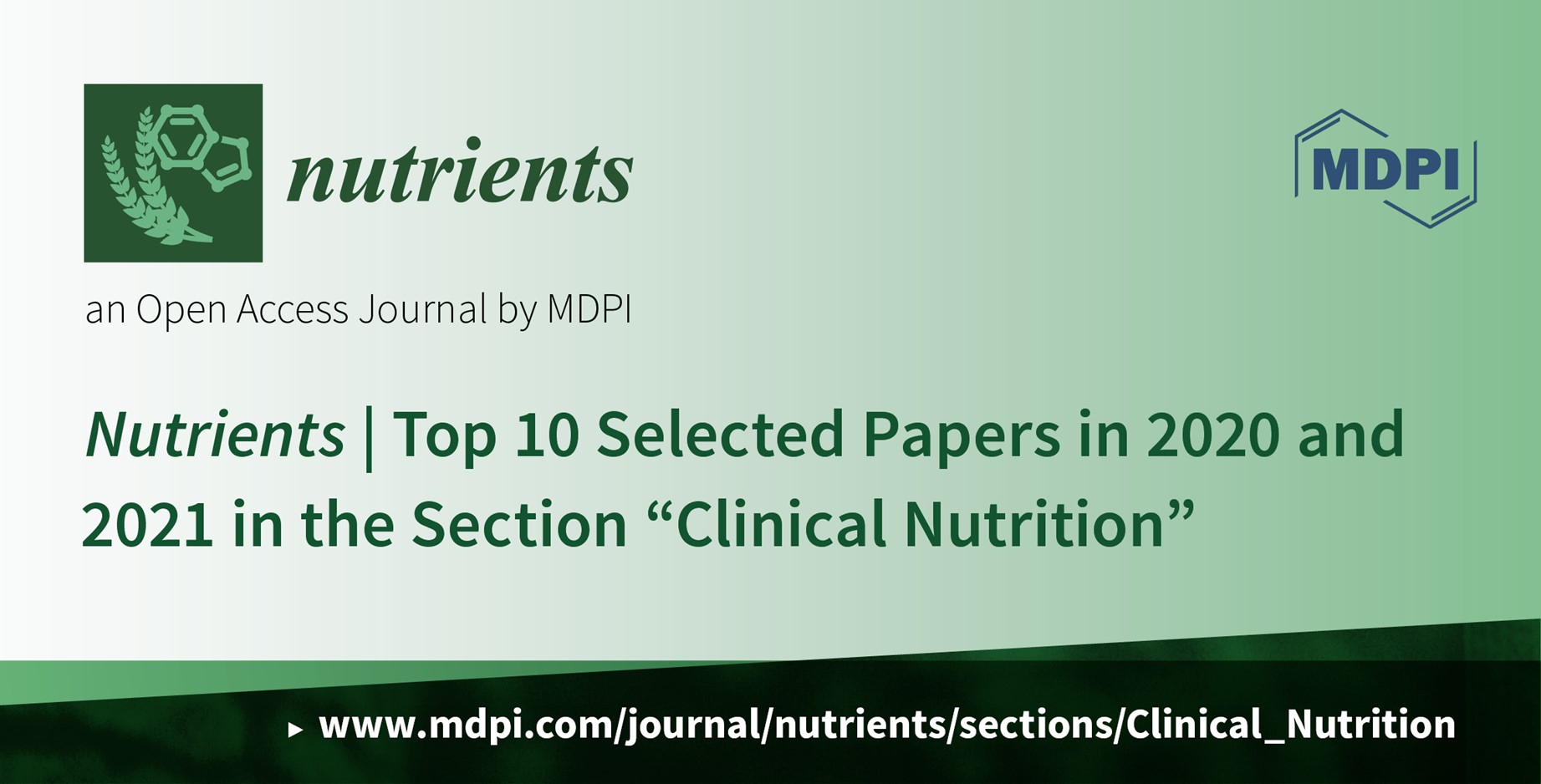
- “Nutrition, IBD and Gut Microbiota: A Review”
by Maria Chiara Mentella, Franco Scaldaferri, Marco Pizzoferrato, Antonio Gasbarrini and Giacinto Abele Donato Miggiano
Nutrients 2020, 12(4), 944; https://doi.org/10.3390/nu12040944
Full text available online: https://www.mdpi.com/2072-6643/12/4/944 - “Nutrition and Sarcopenia—What Do We Know?”
by Aravinda Ganapathy and Jeri W. Nieves
Nutrients 2020, 12(6), 1755; https://doi.org/10.3390/nu12061755
Full text available online: https://www.mdpi.com/2072-6643/12/6/1755 - “Plant-Dominant Low-Protein Diet for Conservative Management of Chronic Kidney Disease”
by Kamyar Kalantar-Zadeh, Shivam Joshi, Rebecca Schlueter, Joanne Cooke, Amanda Brown-Tortorici, Meghan Donnelly, Sherry Schulman, Wei-Ling Lau, Connie M. Rhee, Elani Streja et al.
Nutrients 2020, 12(7), 1931; https://doi.org/10.3390/nu12071931
Full text available online: https://www.mdpi.com/2072-6643/12/7/1931 - “Malnutrition Screening and Assessment in the Cancer Care Ambulatory Setting: Mortality Predictability and Validity of the Patient-Generated Subjective Global Assessment Short form (PG-SGA SF) and the GLIM Criteria”
by Lynette M. De Groot, Gahee Lee, Antoinette Ackerie and Barbara S. van der Meij
Nutrients 2020, 12(8), 2287; https://doi.org/10.3390/nu12082287
Full text available online: https://www.mdpi.com/2072-6643/12/8/2287 - “Malnutrition in Older Adults—Recent Advances and Remaining Challenges”
by Kristina Norman, Ulrike Haß and Matthias Pirlich
Nutrients 2021, 13(8), 2764; https://doi.org/10.3390/nu13082764
Full text available online: https://www.mdpi.com/2072-6643/13/8/2764 - “Calcifediol Treatment and Hospital Mortality Due to COVID-19: A Cohort Study”
by Juan F. Alcala-Diaz, Laura Limia-Perez, Ricardo Gomez-Huelgas, Maria D. Martin-Escalante, Begoña Cortes-Rodriguez, Jose L. Zambrana-Garcia, Marta Entrenas-Castillo, Ana I. Perez-Caballero, Maria D. López-Carmona, Javier Garcia-Alegria et al.
Nutrients 2021, 13(6), 1760; https://doi.org/10.3390/nu13061760
Full text available online: https://www.mdpi.com/2072-6643/13/6/1760 - “Priming for Life: Early Life Nutrition and the Microbiota-Gut-Brain Axis”
by Anna Ratsika, Martin C. Codagnone, Siobhain O’Mahony, Catherine Stanton and John F. Cryan
Nutrients 2021, 13(2), 423; https://doi.org/10.3390/nu13020423
Full text available online: https://www.mdpi.com/2072-6643/13/2/423 - “Long-Chain Polyunsaturated Fatty Acids (LCPUFAs) and the Developing Immune System: A Narrative Review”
by Elizabeth A. Miles, Caroline E. Childs and Philip C. Calder
Nutrients 2021, 13(1), 247; https://doi.org/10.3390/nu13010247
Full text available online: https://www.mdpi.com/2072-6643/13/1/247 - “Obesity and Cardiometabolic Risk Factors: From Childhood to Adulthood”
by Dorota Drozdz, Julio Alvarez-Pitti, Małgorzata Wójcik, Claudio Borghi, Rosita Gabbianelli, Artur Mazur, Vesna Herceg-Čavrak, Beatriz Gonzalez Lopez-Valcarcel, Michał Brzeziński, Empar Lurbe, et al.
Nutrients 2021, 13(11), 4176; https://doi.org/10.3390/nu13114176
Full text available online: https://www.mdpi.com/2072-6643/13/11/4176 - “Sarcopenia, Malnutrition, and Cachexia: Adapting Definitions and Terminology of Nutritional Disorders in Older People with Cancer”
by Delky Meza-Valderrama, Ester Marco, Vanesa Dávalos-Yerovi, Maria Dolors Muns, Marta Tejero-Sánchez, Esther Duarte and Dolores Sánchez-Rodríguez
Nutrients 2021, 13(3), 761; https://doi.org/10.3390/nu13030761
Full text available online: https://www.mdpi.com/2072-6643/13/3/761
17 November 2022
Nutrients | Top 10 Selected Papers in 2020–2021 in the Section “Nutritional Immunology”
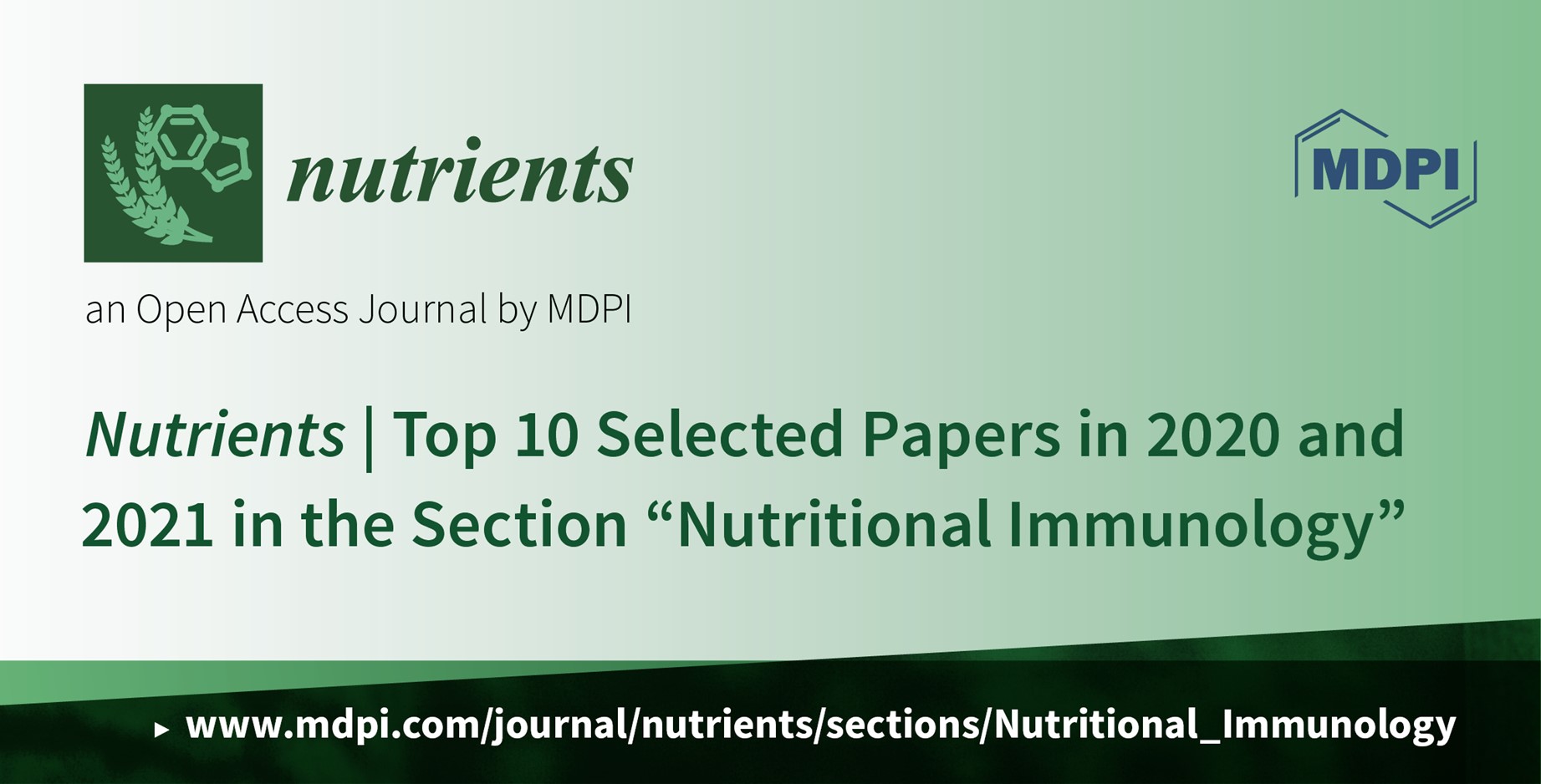
- “A Review of Micronutrients and the Immune System–Working in Harmony to Reduce the Risk of Infection”
by Adrian F. Gombart, Adeline Pierre and Silvia Maggini
Nutrients 2020, 12(1), 236; https://doi.org/10.3390/nu12010236
Full text available online: https://www.mdpi.com/2072-6643/12/1/236 - “The Role of Micronutrients in Support of the Immune Response against Viral Infections”
by Francesco Pecora, Federica Persico, Alberto Argentiero, Cosimo Neglia and Susanna Esposito
Nutrients 2020, 12(10), 3198; https://doi.org/10.3390/nu12103198
Full text available online: https://www.mdpi.com/2072-6643/12/10/3198 - “Nutritional Components in Western Diet Versus Mediterranean Diet at the Gut Microbiota–Immune System Interplay. Implications for Health and Disease”
by Cielo García-Montero, Oscar Fraile-Martínez, Ana M. Gómez-Lahoz, Leonel Pekarek, Alejandro J. Castellanos, Fernando Noguerales-Fraguas, Santiago Coca, Luis G. Guijarro, Natalio García-Honduvilla, Angel Asúnsolo et al.
Nutrients 2021, 13(2), 699; https://doi.org/10.3390/nu13020699
Full text available online: https://www.mdpi.com/2072-6643/13/2/699 - “The Gut‒Breast Axis: Programming Health for Life”
by Juan M. Rodríguez, Leónides Fernández and Valerie Verhasselt
Nutrients 2021, 13(2), 606; https://doi.org/10.3390/nu13020606
Full text available online: https://www.mdpi.com/2072-6643/13/2/606 - “Gut Microbiome Composition in Obese and Non-Obese Persons: A Systematic Review and Meta-Analysis”
by Mariona Pinart, Andreas Dötsch, Kristina Schlicht, Matthias Laudes, Jildau Bouwman, Sofia K. Forslund, Tobias Pischon and Katharina Nimptsch
Nutrients 2022, 14(1), 12; https://doi.org/10.3390/nu14010012
Full text available online: https://www.mdpi.com/2072-6643/14/1/12 - “Non–IgE- or Mixed IgE/Non–IgE-Mediated Gastrointestinal Food Allergies in the First Years of Life: Old and New Tools for Diagnosis”
by Mauro Calvani, Caterina Anania, Barbara Cuomo, Enza D’Auria, Fabio Decimo, Giovanni Cosimo Indirli, Gianluigi Marseglia, Violetta Mastrorilli, Marco Ugo Andrea Sartorio, Angelica Santoro et al.
Nutrients 2021, 13(1), 226; https://doi.org/10.3390/nu13010226
Full text available online: https://www.mdpi.com/2072-6643/13/1/226 - “Dietary Factors Modulating Colorectal Carcinogenesis”
by Filippo Vernia, Salvatore Longo, Gianpiero Stefanelli, Angelo Viscido and Giovanni Latella
Nutrients 2021, 13(1), 143; https://doi.org/10.3390/nu13010143
Full text available online: https://www.mdpi.com/2072-6643/13/1/143 - “Role of the Intestinal Microbiome, Intestinal Barrier and Psychobiotics in Depression”
by Paulina Trzeciak and Mariola Herbet
Nutrients 2021, 13(3), 927; https://doi.org/10.3390/nu13030927
Full text available online: https://www.mdpi.com/2072-6643/13/3/927 - “Gut Microbiota, in the Halfway between Nutrition and Lung Function”
by Christophe Espírito Santo, Catarina Caseiro, Maria João Martins, Rosário Monteiro and Inês Brandão
Nutrients 2021, 13(5), 1716; https://doi.org/10.3390/nu13051716
Full text available online: https://www.mdpi.com/2072-6643/13/5/1716 - 1 “Efficacy of Oral Vitamin Supplementation in Inflammatory Rheumatic Disorders: A Systematic Review and Meta-Analysis of Randomized Controlled Trials”
by Yann Nguyen, Johanna Sigaux, Jean-Guillaume Letarouilly, Pauline Sanchez, Sébastien Czernichow, René-Marc Flipo, Martin Soubrier, Luca Semerano, Raphaèle Seror, Jérémie Sellam et al.
Nutrients 2021, 13(1), 107; https://doi.org/10.3390/nu13010107
Full text available online: https://www.mdpi.com/2072-6643/13/1/107
17 November 2022
Nutrients | Top 10 Selected Papers in 2020–2021 in the Section “Nutrition Methodology & Assessment”
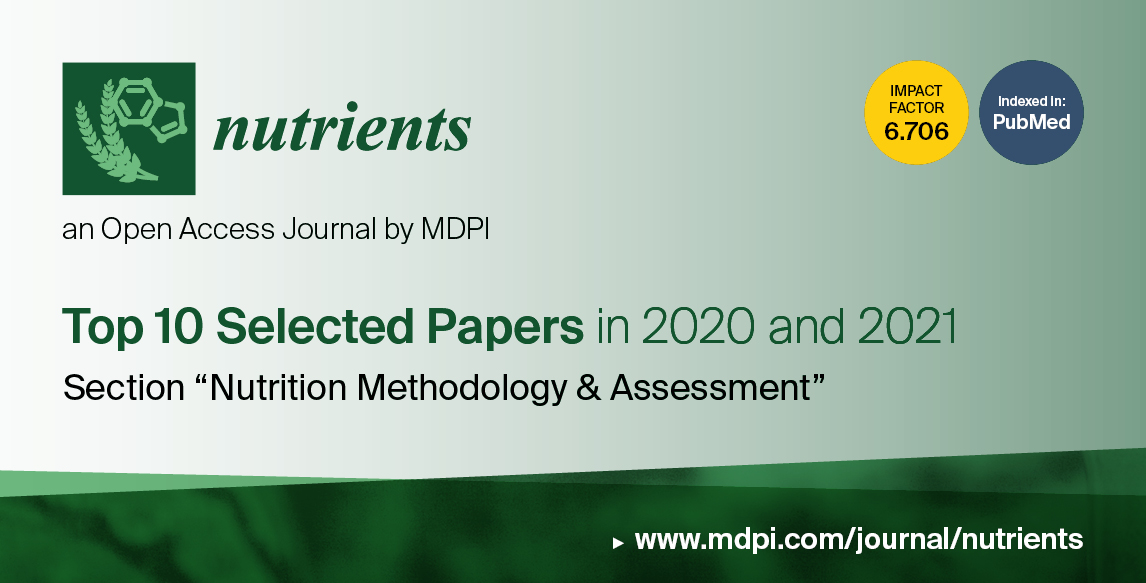
“Assessment of Body Composition in Athletes: A Narrative Review of Available Methods with Special Reference to Quantitative and Qualitative Bioimpedance Analysis”
by Francesco Campa, Stefania Toselli, Massimiliano Mazzilli, Luís Alberto Gobbo and Giuseppe Coratella
Nutrients 2021, 13(5), 1620; https://doi.org/10.3390/nu13051620
Available online: https://www.mdpi.com/2072-6643/13/5/1620
“Beneficial Effects of Time-Restricted Eating on Metabolic Diseases: A Systemic Review and Meta-Analysis”
by Shinje Moon, Jiseung Kang, Sang Hyun Kim, Hye Soo Chung, Yoon Jung Kim, Jae Myung Yu, Sung Tae Cho , Chang-Myung Oh and Tae Kim
Nutrients 2020, 12(5), 1267; https://doi.org/10.3390/nu12051267
Available online: https://www.mdpi.com/2072-6643/12/5/1267
“Exploring the Validity of the 14-Item Mediterranean Diet Adherence Screener (MEDAS): A Cross-National Study in Seven European Countries around the Mediterranean Region”
by María-Teresa García-Conesa, Elena Philippou, Christos Pafilas, Marika Massaro, Stefano Quarta, Vanda Andrade, Rui Jorge, Mihail Chervenkov, Teodora Ivanova, Paula Pinto et al.
Nutrients 2020, 12(10), 2960; https://doi.org/10.3390/nu12102960
Available online: https://www.mdpi.com/2072-6643/12/10/2960
“Fetal–Maternal Exposure to Endocrine Disruptors: Correlation with Diet Intake and Pregnancy Outcomes”
by Alessandro Rolfo, Anna Maria Nuzzo, Ramona De Amicis, Laura Moretti, Simona Bertoli and Alessandro Leone
Nutrients 2020, 12(6), 1744; https://doi.org/10.3390/nu12061744
Available online: https://www.mdpi.com/2072-6643/12/6/1744
“The Comparison of Nutritional Value of Human Milk with Other Mammals’ Milk”
by Renata Pietrzak-Fiećko and Anna M. Kamelska-Sadowska
Nutrients 2020, 12(5), 1404; https://doi.org/10.3390/nu12051404
Available online: https://www.mdpi.com/2072-6643/12/5/1404
“Associations between Body Appreciation and Disordered Eating in a Large Sample of Adolescents”
by Migle Baceviciene and Rasa Jankauskiene
Nutrients 2020, 12(3), 752; https://doi.org/10.3390/nu12030752
Available online: https://www.mdpi.com/2072-6643/12/3/752
“The Impact of Plant-Based Dietary Patterns on Cancer-Related Outcomes: A Rapid Review and Meta-Analysis”
by Esther Molina-Montes, Elena Salamanca-Fernández, Belén Garcia-Villanova and Maria José Sánchez
Nutrients 2020, 12(7), 2010; https://doi.org/10.3390/nu12072010
Available online: https://www.mdpi.com/2072-6643/12/7/2010
“Mediterranean-Type Dietary Pattern and Physical Activity: The Winning Combination to Counteract the Rising Burden of Non-Communicable Diseases (NCDs)”
by Greta Caprara
Nutrients 2021, 13(2), 429; https://doi.org/10.3390/nu13020429
Available online: https://www.mdpi.com/2072-6643/13/2/429
“Harnessing Microbes for Sustainable Development: Food Fermentation as a Tool for Improving the Nutritional Quality of Alternative Protein Sources”
by Anna Kårlund, Carlos Gómez-Gallego, Jenni Korhonen, Outi-Maaria Palo-oja, Hani El-Nezami and Marjukka Kolehmainen
Nutrients 2020, 12(4), 1020; https://doi.org/10.3390/nu12041020
Available online: https://www.mdpi.com/2072-6643/12/4/1020
“What Healthcare Professionals Think of “Nutrition & Diet” Apps: An International Survey”
by Maria F. Vasiloglou, Stergios Christodoulidis, Emilie Reber, Thomai Stathopoulou, Ya Lu, Zeno Stanga and Stavroula Mougiakakou
Nutrients 2020, 12(8), 2214; https://doi.org/10.3390/nu12082214
Available online: https://www.mdpi.com/2072-6643/12/8/2214
16 November 2022
Nutrients | Top 10 Selected Papers in 2020–2021 in the Section “Nutritional Epidemiology”

“Food Insecurity and COVID-19: Disparities in Early Effects for US Adults”
by Julia A. Wolfson and Cindy W. Leung
Nutrients 2020, 12(6), 1648; https://doi.org/10.3390/nu12061648
Available online: https://www.mdpi.com/2072-6643/12/6/1648
Cited by 231 | Viewed by 16595
“The Impact of Isolation Measures Due to COVID-19 on Energy Intake and Physical Activity Levels in Australian University Students”
by Linda A. Gallo, Tania F. Gallo, Sophia L. Young, Karen M. Moritz and Lisa K. Akison
Nutrients 2020, 12(6), 1865; https://doi.org/10.3390/nu12061865
Available online: https://www.mdpi.com/2072-6643/12/6/1865
Cited by 141 | Viewed by 13066
“Eating Habits and Physical Activity of the Spanish Population during the COVID-19 Pandemic Period”
by Eduardo Sánchez-Sánchez, Guillermo Ramírez-Vargas, Ylenia Avellaneda-López, J. Ignacio Orellana-Pecino , Esperanza García-Marín and Jara Díaz-Jimenez
Nutrients 2020, 12(9), 2826; https://doi.org/10.3390/nu12092826
Available online: https://www.mdpi.com/2072-6643/12/9/2826
Cited by 108 | Viewed by 8957
“Physical and Psychological Effects Related to Food Habits and Lifestyle Changes Derived from COVID-19 Home Confinement in the Spanish Population”
by Miguel López-Moreno, Maria Teresa Iglesias López, Marta Miguel and Marta Garcés-Rimón
Nutrients 2020, 12(11), 3445; https://doi.org/10.3390/nu12113445
Available online: https://www.mdpi.com/2072-6643/12/11/3445
Cited by 78 | Viewed by 6297
“Lifestyle Changes and Determinants of Children’s and Adolescents’ Body Weight Increase during the First COVID-19 Lockdown in Greece: The COV-EAT Study”
by Odysseas Androutsos, Maria Perperidi, Christos Georgiou and Giorgos Chouliaras
Nutrients 2021, 13(3), 930; https://doi.org/10.3390/nu13030930
Available online: https://www.mdpi.com/2072-6643/13/3/930
Cited by 57 | Viewed by 5410
“Dietary Habits and Nutrition in Rheumatoid Arthritis: Can Diet Influence Disease Development and Clinical Manifestations?”
by Chiara Gioia, Bruno Lucchino, Maria Grazia Tarsitano, Cristina Iannuccelli and Manuela Di Franco
Nutrients 2020, 12(5), 1456; https://doi.org/10.3390/nu12051456
Available online: https://www.mdpi.com/2072-6643/12/5/1456
Cited by 57 | Viewed by 11202
“A Narrative Review on Sarcopenia in Type 2 Diabetes Mellitus: Prevalence and Associated Factors”
by Anna Izzo, Elena Massimino, Gabriele Riccardi and Giuseppe Della Pepa
Nutrients 2021, 13(1), 183; https://doi.org/10.3390/nu13010183
Available online: https://www.mdpi.com/2072-6643/13/1/183
Cited by 45 | Viewed by 5351
“Low FODMAP Diet: Evidence, Doubts, and Hopes”
by Massimo Bellini, Sara Tonarelli, Attila G. Nagy, Andrea Pancetti, Francesco Costa, Angelo Ricchiuti, Nicola de Bortoli, Marta Mosca, Santino Marchi and Alessandra Rossi
Nutrients 2020, 12(1), 148; https://doi.org/10.3390/nu12010148
Available online: https://www.mdpi.com/2072-6643/12/1/148
Cited by 46 | Viewed by 11761
“Migraine and Diet”
by Parisa Gazerani
Nutrients 2020, 12(6), 1658; https://doi.org/10.3390/nu12061658
Available online: https://www.mdpi.com/2072-6643/12/6/1658
Cited by 43 | Viewed by 10024
“Nutrition Management in Older Adults with Diabetes: A Review on the Importance of Shifting Prevention Strategies from Metabolic Syndrome to Frailty”
by Yoshiaki Tamura, Takuya Omura, Kenji Toyoshima and Atsushi Araki
Nutrients 2020, 12(11), 3367; https://doi.org/10.3390/nu12113367
Available online: https://www.mdpi.com/2072-6643/12/11/3367
Cited by 42 | Viewed by 6738
8 November 2022
Nutrients | Top 10 Selected Papers in 2020–2021 in the Section “Sports Nutrition”
- “Metabolic Impacts of Confinement during the COVID-19 Pandemic Due to Modified Diet and Physical Activity Habits”
by Martinez-Ferran, M.; de la Guía-Galipienso, F.; Sanchis-Gomar, F. and Pareja-Galeano, H.
Nutrients 2020, 12(6), 1549; https://doi.org/10.3390/nu12061549
Full text available online: https://www.mdpi.com/2072-6643/12/6/1549 - “Low Energy Availability in Athletes 2020: An Updated Narrative Review of Prevalence, Risk, Within-Day Energy Balance, Knowledge, and Impact on Sports Performance”
by Logue, D. M.; Madigan, S. M.; Melin, A.; Delahunt, E.; Heinen, M.; Donnell, S.-J. M. and Corish, C. A.
Nutrients 2020, 12(3), 835; https://doi.org/10.3390/nu12030835
Full text available online: https://www.mdpi.com/2072-6643/12/3/835 - “Modulation of Exercise-Induced Muscle Damage, Inflammation, and Oxidative Markers by Curcumin Supplementation in a Physically Active Population: A Systematic Review”
by Fernández-Lázaro, D.; Mielgo-Ayuso, J.; Seco Calvo, J.; Córdova Martínez, A.; Caballero García, A. and Fernandez-Lazaro, C. I.
Nutrients 2020, 12(2), 501; https://doi.org/10.3390/nu12020501
Full text available online: https://www.mdpi.com/2072-6643/12/2/501 - “The Role of Exercise in the Interplay between Myokines, Hepatokines, Osteokines, Adipokines, and Modulation of Inflammation for Energy Substrate Redistribution and Fat Mass Loss: A Review”
by Gonzalez-Gil, A. M. and Elizondo-Montemayor, L.
Nutrients 2020, 12(6), 1899; https://doi.org/10.3390/nu12061899
Full text available online: https://www.mdpi.com/2072-6643/12/6/1899 - “Creatine in Health and Disease”
by Kreider, R. B. and Stout, J. R.
Nutrients 2021, 13(2), 447; https://doi.org/10.3390/nu13020447
Full text available online: https://www.mdpi.com/2072-6643/13/2/447 - “Come Back Skinfolds, All Is Forgiven: A Narrative Review of the Efficacy of Common Body Composition Methods in Applied Sports Practice”
by Kasper, A. M.; Langan-Evans, C.; Hudson, J. F.; Brownlee, T. E.; Harper, L. D.; Naughton, R. J.; Morton, J. P. and Close, G. L.
Nutrients 2021, 13(4), 1075; https://doi.org/10.3390/nu13041075
Full text available online: https://www.mdpi.com/2072-6643/13/4/1075 - “Creatine Supplementation and Brain Health”
by Roschel, H.; Gualano, B.; Ostojic, S. M. and Rawson, E. S.
Nutrients 2021, 13(2), 586; https://doi.org/10.3390/nu13020586
Full text available online: https://www.mdpi.com/2072-6643/13/2/586 - “Metabolic Basis of Creatine in Health and Disease: A Bioinformatics-Assisted Review”
by Bonilla, D. A.; Kreider, R. B.; Stout, J. R.; Forero, D. A.; Kerksick, C. M.; Roberts, M. D. and Rawson, E. S.
Nutrients 2021, 13(4), 1238; https://doi.org/10.3390/nu13041238
Full text available online: https://www.mdpi.com/2072-6643/13/4/1238 - “Effects of Two Months of Very Low Carbohydrate Ketogenic Diet on Body Composition, Muscle Strength, Muscle Area, and Blood Parameters in Competitive Natural Body Builders”
by Paoli, A.; Cenci, L.; Pompei, P.; Sahin, N.; Bianco, A.; Neri, M.; Caprio, M. and Moro, T.
Nutrients 2021, 13(2), 374; https://doi.org/10.3390/nu13020374
Full text available online: https://www.mdpi.com/2072-6643/13/2/374 - “Caffeine and Cognitive Functions in Sports: A Systematic Review and Meta-Analysis”
by Lorenzo Calvo, J.; Fei, X.; Domínguez, R. and Pareja-Galeano, H.
Nutrients 2021, 13(3), 868; https://doi.org/10.3390/nu13030868
Full text available online: https://www.mdpi.com/2072-6643/13/3/868
8 November 2022
Nutrients | Top 10 Selected Papers in 2020–2021 in the Section “Nutrigenetics and Nutrigenomics”
- “Current State of Evidence: Influence of Nutritional and Nutrigenetic Factors on Immunity in the COVID-19 Pandemic Framework”
by Galmés, S.; Serra, F. and Palou, A.
Nutrients 2020, 12(9), 2738; https://doi.org/10.3390/nu12092738
Full text available online: https://www.mdpi.com/2072-6643/12/9/2738 - “Nutrients and Microbiota in Lung Diseases of Prematurity: The Placenta-Gut-Lung Triangle”
by Piersigilli, F.; Van Grambezen, B.; Hocq, C. and Danhaive, O.
Nutrients 2020, 12(2), 469; https://doi.org/10.3390/nu12020469
Full text available online: https://www.mdpi.com/2072-6643/12/2/469 - “Science and Healthy Meals in the World: Nutritional Epigenomics and Nutrigenetics of the Mediterranean Diet”
by Caradonna, F.; Consiglio, O.; Luparello, C. and Gentile, C.
Nutrients 2020, 12(6), 1748; https://doi.org/10.3390/nu12061748
Full text available online: https://www.mdpi.com/2072-6643/12/6/1748 - “Genomics in Personalized Nutrition: Can You “Eat for Your Genes”?“
by Mullins, V. A.; Bresette, W.; Johnstone, L.; Hallmark, B. and Chilton, F. H.
Nutrients 2020, 12(10), 3118; https://doi.org/10.3390/nu12103118
Full text available online: https://www.mdpi.com/2072-6643/12/10/3118 - “Presence of Hypertension Is Reduced by Mediterranean Diet Adherence in All Individuals with a More Pronounced Effect in the Obese: The Hellenic National Nutrition and Health Survey (HNNHS)”
by Magriplis, E.; Panagiotakos, D.; Kyrou, I.; Tsioufis, C.; Mitsopoulou, A.-V.; Karageorgou, D.; Dimakopoulos, I.; Bakogianni, I.; Chourdakis, M. and Micha, R. et al.
Nutrients 2020, 12(3), 853; https://doi.org/10.3390/nu12030853
Full text available online: https://www.mdpi.com/2072-6643/12/3/853 - “Diet as a Modulator of Intestinal Microbiota in Rheumatoid Arthritis”
by Dourado, E.; Ferro, M.; Sousa Guerreiro, C. and Fonseca, J. E.
Nutrients 2020, 12(11), 3504; https://doi.org/10.3390/nu12113504
Full text available online: https://www.mdpi.com/2072-6643/12/11/3504 - “Genetic and Physiological Factors Affecting Human Milk Production and Composition”
by Golan, Y. and Assaraf, Y. G.
Nutrients 2020, 12(5), 1500; https://doi.org/10.3390/nu12051500
Full text available online: https://www.mdpi.com/2072-6643/12/5/1500 - “The Interaction between Dietary Selenium Intake and Genetics in Determining Cancer Risk and Outcome”
by Kadkol, S. and Diamond, A. M.
Nutrients 2020, 12(8), 2424; https://doi.org/10.3390/nu12082424
Full text available online: https://www.mdpi.com/2072-6643/12/8/2424 - “Applications of Ketogenic Diets in Patients with Headache: Clinical Recommendations”
by Di Lorenzo, C.; Ballerini, G.; Barbanti, P.; Bernardini, A.; D’Arrigo, G.; Egeo, G.; Frediani, F.; Garbo, R.; Pierangeli, G.; Prudenzano, M. P. et al.
Nutrients 2021, 13(7), 2307; https://doi.org/10.3390/nu13072307
Full text available online: https://www.mdpi.com/2072-6643/13/7/2307 - “Impact of Camellia japonica Bee Pollen Polyphenols on Hyperuricemia and Gut Microbiota in Potassium Oxonate-Induced Mice”
by Xu, Y.; Cao, X.; Zhao, H.; Yang, E.; Wang, Y.; Cheng, N. and Cao, W.
Nutrients 2021, 13(8), 2665; https://doi.org/10.3390/nu13082665
Full text available online: https://www.mdpi.com/2072-6643/13/8/2665
8 November 2022
Nutrients | Top 10 Selected Papers in 2020–2021 in the Section “Prebiotics and Probiotics”
“The Firmicutes/Bacteroidetes Ratio: A Relevant Marker of Gut Dysbiosis in Obese Patients?”
by Magne, F.; Gotteland, M.; Gauthier, L.; Zazueta, A.; Pesoa, S.; Navarrete, P. and Balamurugan, R.
Nutrients 2020, 12(5), 1474; https://doi.org/10.3390/nu12051474
Full text available online: https://www.mdpi.com/2072-6643/12/5/1474
“The Effect of Probiotics on the Production of Short-Chain Fatty Acids by Human Intestinal Microbiome”
by Markowiak-Kopeć, P. and Śliżewska, K.
Nutrients 2020, 12(4), 1107; https://doi.org/10.3390/nu12041107
Full text available online: https://www.mdpi.com/2072-6643/12/4/1107
“Postbiotics—A Step Beyond Pre- and Probiotics”
by Żółkiewicz, J.; Marzec, A.; Ruszczyński, M. and Feleszko, W.
Nutrients 2020, 12(8), 2189; https://doi.org/10.3390/nu12082189
Full text available online: https://www.mdpi.com/2072-6643/12/8/2189
“Composition of Gut Microbiota in Children with Autism Spectrum Disorder: A Systematic Review and Meta-Analysis”
by Iglesias-Vázquez, L.; Van Ginkel Riba, G.; Arija, V. and Canals, J.
Nutrients 2020, 12(3), 792; https://doi.org/10.3390/nu12030792
Full text available online: https://www.mdpi.com/2072-6643/12/3/792
“Gut Microbiota in Hypertension and Atherosclerosis: A Review”
by Verhaar, B. J. H.; Prodan, A.; Nieuwdorp, M. and Muller, M.
Nutrients 2020, 12(10), 2982; https://doi.org/10.3390/nu12102982
Full text available online: https://www.mdpi.com/2072-6643/12/10/2982
“Thyroid-Gut-Axis: How Does the Microbiota Influence Thyroid Function?”
by Knezevic, J.; Starchl, C.; Tmava Berisha, A. and Amrein, K.
Nutrients 2020, 12(6), 1769; https://doi.org/10.3390/nu12061769
Full text available online: https://www.mdpi.com/2072-6643/12/6/1769
“Paraprobiotics: A New Perspective for Functional Foods and Nutraceuticals”
by Siciliano, R.A.; Reale, A.; Mazzeo, M.F.; Morandi, S.; Silvetti, T. and Brasca, M.
Nutrients 2021, 13(4), 1225; https://doi.org/10.3390/nu13041225
Full text available online: https://www.mdpi.com/2072-6643/13/4/1225
“Probiotics, Prebiotics, and Synbiotics: Implications and Beneficial Effects against Irritable Bowel Syndrome”
by Simon, E.; Călinoiu, L. F.; Mitrea, L. and Vodnar, D. C.
Nutrients 2021, 13(6), 2112; https://doi.org/10.3390/nu13062112
Full text available online: https://www.mdpi.com/2072-6643/13/6/2112
“Effects and Mechanisms of Probiotics, Prebiotics, Synbiotics, and Postbiotics on Metabolic Diseases Targeting Gut Microbiota: A Narrative Review”
by Li, H.-Y.; Zhou, D.-D.; Gan, R.-Y.; Huang, S.-Y.; Zhao, C.-N.; Shang, A.; Xu, X.-Y. and Li, H.-B.
Nutrients 2021, 13(9), 3211; https://doi.org/10.3390/nu13093211
Full text available online: https://www.mdpi.com/2072-6643/13/9/3211
“Cardiovascular Diseases of Developmental Origins: Preventive Aspects of Gut Microbiota-Targeted Therapy”
by Hsu, C.-N.; Hou, C.-Y.; Hsu, W.-H. and Tain, Y.-L.
Nutrients 2021, 13(7), 2290; https://doi.org/10.3390/nu13072290
Full text available online: https://www.mdpi.com/2072-6643/13/7/2290
8 November 2022
Nutrients | Top 10 Selected Papers in 2020–2021 in the Section “Nutrition and Metabolism”
- “Diet Supplementation, Probiotics, and Nutraceuticals in SARS-CoV-2 Infection: A Scoping Review”
by Infusino, F.; Marazzato, M.; Mancone, M.; Fedele, F.; Mastroianni, C. M.; Severino, P.; Ceccarelli, G.; Santinelli, L.; Cavarretta, E.; Marullo, A. G. M. et al.
Nutrients 2020, 12(6), 1718; https://doi.org/10.3390/nu12061718
Full text available online: https://www.mdpi.com/2072-6643/12/6/1718
Citations: 111 - “Eating Habits and Lifestyle during COVID-19 Lockdown in the United Arab Emirates: A Cross-Sectional Study”
by Cheikh Ismail, L.; Osaili, T. M.; Mohamad, M. N.; Al Marzouqi, A.; Jarrar, A. H.; Abu Jamous, D. O.; Magriplis, E.; Ali, H. I.; Al Sabbah, H.; Hasan, H. et al.
Nutrients 2020, 12(11), 3314; https://doi.org/10.3390/nu12113314
Full text available online: https://www.mdpi.com/2072-6643/12/11/3314
Citations: 100 - “Histidine in Health and Disease: Metabolism, Physiological Importance, and Use as a Supplement”
by Holeček, M.
Nutrients 2020, 12(3), 848; https://doi.org/10.3390/nu12030848
Full text available online: https://www.mdpi.com/2072-6643/12/3/848
Citations: 94 - “Gut Microbiome, Intestinal Permeability, and Tissue Bacteria in Metabolic Disease: Perpetrators or Bystanders?”
by Chakaroun, R. M.; Massier, L. and Kovacs, P.
Nutrients 2020, 12(4), 1082; https://doi.org/10.3390/nu12041082
Full text available online: https://www.mdpi.com/2072-6643/12/4/1082
Citations: 87 - “Obesity, Bioactive Lipids, and Adipose Tissue Inflammation in Insulin Resistance”
by Kojta, I.; Chacińska, M. and Błachnio-Zabielska, A.
Nutrients 2020, 12(5), 1305; https://doi.org/10.3390/nu12051305
Full text available online: https://www.mdpi.com/2072-6643/12/5/1305
Citations: 95 - “Vitamin D and Endothelial Function”
by Kim, D.-H.; Meza, C. A.; Clarke, H.; Kim, J.-S. and Hickner, R. C.
Nutrients 2020, 12(2), 575; https://doi.org/10.3390/nu12020575
Full text available online: https://www.mdpi.com/2072-6643/12/2/575
Citations: 99 - “Menopause-Associated Lipid Metabolic Disorders and Foods Beneficial for Postmenopausal Women”
by Ko, S.-H. and Kim, H.-S.
Nutrients 2020, 12(1), 202; https://doi.org/10.3390/nu12010202
Full text available online: https://www.mdpi.com/2072-6643/12/1/202
Citations: 89 - “Role of Bile Acids in the Regulation of Food Intake, and Their Dysregulation in Metabolic Disease”
by Xie, C.; Huang, W.; Young, R. L.; Jones, K. L.; Horowitz, M.; Rayner, C. K. and Wu, T.
Nutrients 2021, 13(4), 1104; https://doi.org/10.3390/nu13041104
Full text available online: https://www.mdpi.com/2072-6643/13/4/1104
Citations: 28 - “Edible Microalgae and Their Bioactive Compounds in the Prevention and Treatment of Metabolic Alterations”
by Ramos-Romero, S.; Torrella, J. R.; Pagès, T.; Viscor, G. and Torres, J. L.
Nutrients 2021, 13(2), 563; https://doi.org/10.3390/nu13020563
Full text available online: https://www.mdpi.com/2072-6643/13/2/563
Citations: 25 - “Time-Restricted Eating and Metabolic Syndrome: Current Status and Future Perspectives”
by Świątkiewicz, I.; Woźniak, A. and Taub, P. R.
Nutrients 2021, 13(1), 221; https://doi.org/10.3390/nu13010221
Full text available online: https://www.mdpi.com/2072-6643/13/1/221
Citations: 22 - “Children’s Health Habits and COVID-19 Lockdown in Catalonia: Implications for Obesity and Non-Communicable Diseases”
by Ventura, P. S.; Ortigoza, A. F.; Castillo, Y.; Bosch, Z.; Casals, S.; Girbau, C.; Siurana, J. M.; Arce, A.; Torres, M. and Herrero, F. J.
Nutrients 2021, 13(5), 1657; https://doi.org/10.3390/nu13051657
Full text available online: https://www.mdpi.com/2072-6643/13/5/1657
Citations: 22 - “Bee Pollen: Current Status and Therapeutic Potential”
by Khalifa, S. A. M.; Elashal, M. H.; Yosri, N.; Du, M.; Musharraf, S. G.; Nahar, L.; Sarker, S. D.; Guo, Z.; Cao, W.; Zou, X. et al.
Nutrients 2021, 13(6), 1876; https://doi.org/10.3390/nu13061876
Full text available online: https://www.mdpi.com/2072-6643/13/6/1876
Citations: 23
4 November 2022
Nutrients | Top 10 Selected Papers in 2020–2021 in the Section “Micronutrients and Human Health”
- “Selenium Deficiency Is Associated with Mortality Risk from COVID-19 “
by Moghaddam, A. et al.
Nutrients 2020, 12(7), 2098; https://doi.org/10.3390/nu12072098
Full text available online: https://www.mdpi.com/2072-6643/12/7/2098
Citations: 182 - “Early Nutritional Interventions with Zinc, Selenium and Vitamin D for Raising Anti-Viral Resistance Against Progressive COVID-19”
by Alexander, J.; Tinkov, A.; Strand, T. A.; Alehagen, U.; Skalny, A. and Aaseth, J.
Nutrients 2020, 12(8), 2358; https://doi.org/10.3390/nu12082358
Full text available online: https://www.mdpi.com/2072-6643/12/8/2358
Citations: 115 - “Vitamin D’s Effect on Immune Function”
by Martens, P.-J.; Gysemans, C.; Verstuyf, A. and Mathieu, C.
Nutrients 2020, 12(5), 1248; https://doi.org/10.3390/nu12051248
Full text available online: https://www.mdpi.com/2072-6643/12/5/1248
Citations: 112 - “Evidence Regarding Vitamin D and Risk of COVID-19 and Its Severity”
by Mercola, J.; Grant, W. B. and Wagner, C. L.
Nutrients 2020, 12(11), 3361; https://doi.org/10.3390/nu12113361
Full text available online: https://www.mdpi.com/2072-6643/12/11/3361
Citations: 108 - “Low Zinc Levels at Admission Associates with Poor Clinical Outcomes in SARS-CoV-2 Infection”
by Vogel-González, M. et al.
Nutrients 2021, 13(2), 562; https://doi.org/10.3390/nu13020562
Full text available online: https://www.mdpi.com/2072-6643/13/2/562
Citations: 45 - “Magnesium in Aging, Health and Diseases”
by Barbagallo, M.; Veronese, N. and Dominguez, L. J.
Nutrients 2021, 13(2), 463; https://doi.org/10.3390/nu13020463
Full text available online: https://www.mdpi.com/2072-6643/13/2/463
Citations: 41 - “Vitamin C—Sources, Physiological Role, Kinetics, Deficiency, Use, Toxicity, and Determination”
by Doseděl, M.; Jirkovský, E.; Macáková, K.; Krčmová, L. K.; Javorská, L.; Pourová, J.; Mercolini, L.; Remião, F.; Nováková, L. and Mladěnka, P.
Nutrients 2021, 13(2), 615; https://doi.org/10.3390/nu13020615
Full text available online: https://www.mdpi.com/2072-6643/13/2/615
Citations: 35 - “Crosstalk of Magnesium and Serum Lipids in Dyslipidemia and Associated Disorders: A Systematic Review”
by Găman, M.-A.; Dobrică, E.-C.; Cozma, M.-A.; Antonie, N.-I.; Stănescu, A. M. A.; Găman, A. M. and Diaconu, C. C.
Nutrients 2021, 13(5), 1411; https://doi.org/10.3390/nu13051411
Full text available online: https://www.mdpi.com/2072-6643/13/5/1411
Citations: 29 - “Vitamin A Update: Forms, Sources, Kinetics, Detection, Function, Deficiency, Therapeutic Use and Toxicity”
by Carazo, A.; Macáková, K.; Matoušová, K.; Krčmová, L. K.; Protti, M. and Mladěnka, P.
Nutrients 2021, 13(5), 1703; https://doi.org/10.3390/nu13051703
Full text available online: https://www.mdpi.com/2072-6643/13/5/1703
Citations: 27 - “Micronutrients, Phytochemicals and Mediterranean Diet: A Potential Protective Role against COVID-19 through Modulation of PAF Actions and Metabolism”
by Detopoulou, P.; Demopoulos, C. A. and Antonopoulou, S.
Nutrients 2021, 13(2), 462; https://doi.org/10.3390/nu13020462
Full text available online: https://www.mdpi.com/2072-6643/13/2/462
Citations: 25
4 November 2022
Nutrients | Top 10 Selected Papers in 2020–2021 in the Section “Phytochemicals and Human Health”
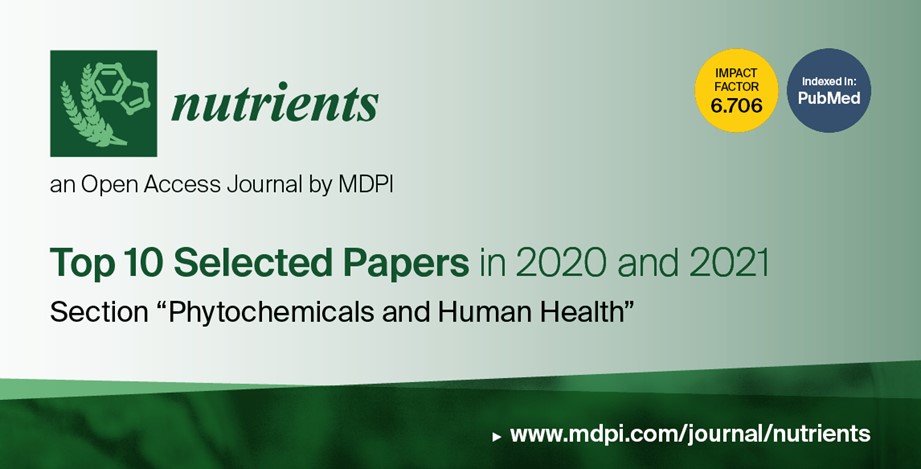
- “Polyphenols and Human Health: The Role of Bioavailability”
by Di Lorenzo, C.; Colombo, F.; Biella, S.; Stockley, C. and Restani, P.
Nutrients 2021, 13(1), 273; https://doi.org/10.3390/nu13010273
Full text available online: https://www.mdpi.com/2072-6643/13/1/273 - “Influence of In Vitro Digestion on Composition, Bioaccessibility and Antioxidant Activity of Food Polyphenols—A Non-Systematic Review”
by Wojtunik-Kulesza, K.; Oniszczuk, A.; Oniszczuk, T.; Combrzyński, M. and Nowakowska, D.
Nutrients 2020, 12(5), 1401. https://doi.org/10.3390/nu12051401
Full text available online: https://www.mdpi.com/2072-6643/12/5/1401 - “The Seed of Industrial Hemp (Cannabis sativa): Nutritional Quality and Potential Functionality for Human Health and Nutrition”
by Farinon, B.; Molinari, R.; Costantini, L. and Merendino, N.
Nutrients 2020, 12(7), 1935. https://doi.org/10.3390/nu12071935
Full text available online: https://www.mdpi.com/2072-6643/12/7/1935 - “Curcumin, Quercetin, Catechins and Metabolic Diseases: The Role of Gut Microbiota”
by Shabbir, U.; Rubab, M.; Daliri, E.B.-M.; Chelliah, R.; Javed, A. and Oh, D.-H.
Nutrients 2021, 13(1), 206. https://doi.org/10.3390/nu13010206
Full text available online: https://www.mdpi.com/2072-6643/13/1/206 - “Cocoa Bean Shell—A By-Product with Nutritional Properties and Biofunctional Potential”
by Rojo-Poveda, O.; Barbosa-Pereira, L.; Zeppa, G. and Stévigny, C. Cocoa
Nutrients 2020, 12(4), 1123. https://doi.org/10.3390/nu12041123
Full text available online: https://www.mdpi.com/2072-6643/12/4/1123 - “Polyphenols—Gut Microbiota Interrelationship: A Transition to a New Generation of Prebiotics”
by Plamada, D. and Vodnar, D. C.
Nutrients 2022, 14(1), 137. https://doi.org/10.3390/nu14010137
Full text available online: https://www.mdpi.com/2072-6643/14/1/137 - “Bioactive Compounds for Skin Health: A Review”
by Michalak, M.; Pierzak, M.; Kręcisz, B. and Suliga, E.
Nutrients 2021, 13(1), 203. https://doi.org/10.3390/nu13010203
Full text available online: https://www.mdpi.com/2072-6643/13/1/203 - “Anti-Inflammatory and Immunomodulatory Properties of Fermented Plant Foods”
Shahbazi, R.; Sharifzad, F.; Bagheri, R.; Alsadi, N.; Yasavoli-Sharahi, H. and Matar, C.
Nutrients 2021, 13(5), 1516. https://doi.org/10.3390/nu13051516
Full text available online: https://www.mdpi.com/2072-6643/13/5/1516 - “Health Effects of Coffee: Mechanism Unraveled?”
Kolb, H.; Kempf, K. and Martin, S.
Nutrients 2020, 12(6), 1842. https://doi.org/10.3390/nu12061842
Full text available online: https://www.mdpi.com/2072-6643/12/6/1842 - “Black Cumin (Nigella sativa L.): A Comprehensive Review on Phytochemistry, Health Benefits, Molecular Pharmacology, and Safety”
by Hannan, M. A. et al.
Nutrients 2021, 13(6), 1784. https://doi.org/10.3390/nu13061784
Full text available online: https://www.mdpi.com/2072-6643/13/6/1784
4 November 2022
Meet Us at the 27th Congress of the Chinese Pediatric Society, 15–18 December 2022, Changsha, China
MDPI will be attending the 27th Congress of the Chinese Pediatric Society, held in Changsha, China, from 15–18 December 2022.

The following MDPI journals will be represented:
- Children (leading journal);
- JPM;
- Medicina;
- Audiology Research;
- JCM;
- Healthcare;
- Diagnostics;
- Metabolites;
- Cancers;
- Nutrients.
If you plan on attending this conference, feel free to stop by our booth: #B67. Our delegates look forward to meeting you in person to answer any questions that you may have.
For more information about the conference, please see the following link: https://nccps2022.tiemeeting.com/CN.
28 October 2022
Nutrients | Top 10 Cited Special Issues in 2021
-
“Gut Microbiota in Cognition, Behaviour and Alzheimer's Disease”
by Dr. Tanya T. Nguyen
Available online: https://www.mdpi.com/journal/nutrients/special_issues/Gut_Microbiota_Cognition
Cited by 190 | Viewed by 34848 -
“Effect of Phenolic Compounds on Human Health”
by Dr. Elena Gonzalez-Burgos and Prof. Dr. M. Pilar Gómez-Serranillos Cuadrado
Available online: https://www.mdpi.com/journal/nutrients/special_issues/Phenolic_Health
Cited by 175 | Viewed by 27083 -
“Nutrition, Immunity and Viral Infection”
by Prof. Dr. Hiroshi Ichimura
Available online: https://www.mdpi.com/journal/nutrients/special_issues/immunity_viral
Cited by 160 | Viewed by 35171 -
“Dietary Curcumin and Health Effects”
by Dr. Roberta Masella and Dr. Francesca Cirulli
Available online: https://www.mdpi.com/journal/nutrients/special_issues/Dietary_Curcumin_and_health_effects_
Cited by 159 | Viewed by 35285 -
“Appetite and Satiety Control-Gut Mechanisms?”
by Prof. Dr. Christine Feinle-Bisset and Prof. Dr. Michael Horowitz
Available online: https://www.mdpi.com/journal/nutrients/special_issues/Satiety_and_Appetite_Control
Cited by 155 | Viewed by 46649 -
“Magnesium in Human Health and Disease”
by Dr. Sara Castiglioni, Dr. Giovanna Farruggia and Dr. Concettina Cappadone
Available online: https://www.mdpi.com/journal/nutrients/special_issues/Magnesium_Health
Cited by 154 | Viewed by 67642 -
“Childhood Obesity: Nutrition and Lifestyle Determinants, Prevention and Management”
by Dr. Odysseas Androutsos and Prof. Dr. Evangelia Charmandari
Available online: https://www.mdpi.com/journal/nutrients/special_issues/Childhood_Obesity_Nutrition_and_Lifestyle_Determinants_Prevention_and_Management
Cited by 146 | Viewed by 35298 -
“Nutrition Assessment Methodology: Current Update and Practice”
by Dr. Helen McCarthy
Available online: https://www.mdpi.com/journal/nutrients/special_issues/nutrition_assessment_methodology_current_update_and_practice
Cited by 144 | Viewed by 35970 -
“Preventing the Adverse Effects of SARS-CoV-2 Infection and COVID-19 through Diet, Supplements and Lifestyle”
by Dr. William B. Grant and Dr. Ronan Lordan
Available online: https://www.mdpi.com/journal/nutrients/special_issues/Preventing_SARS_CoV_2_and_COVID_19
Cited by 135 | Viewed by 42673 -
“Food, Nutrition, and Dietary Patterns during the COVID-19 Pandemic”
by Dr. Emma Ruiz Moreno
Available online: https://www.mdpi.com/journal/nutrients/special_issues/Dietary_COVID-19
Cited by 134 | Viewed by 34764
28 October 2022
Nutrients 2022 Best Paper Award—Winners Announced
We are pleased to announce the winners of the Nutrients 2022 Best Paper Award. All papers published in 2020 in Nutrients (ISSN: 2072-6643) were considered for the award. After a thorough evaluation of the originality and significance of the papers, citations, and downloads, three winners were selected.
First Prize: CHF 1000 plus one free publication
“Effects of COVID-19 Home Confinement on Eating Behaviour and Physical Activity: Results of the ECLB-COVID19 International Online Survey”
by Achraf Ammar et al.
Nutrients 2020, 12(6), 1583; https://doi.org/10.3390/nu12061583
Second Prize: CHF 800 plus one free publication
“Dietary Choices and Habits during COVID-19 Lockdown: Experience from Poland”
by Aleksandra Sidor and Piotr Rzymski
Nutrients 2020, 12(6), 1657; https://doi.org/10.3390/nu12061657
Third Prize: CHF 600 plus one free publication
“Immunologic Effects of Vitamin D on Human Health and Disease”
by Nipith Charoenngam andMichael F. Holick
Nutrients 2020, 12(7), 2097; https://doi.org/10.3390/nu12072097
Please join us in congratulating the winners of Nutrients 2022 Best Paper Award. We would also like to take this opportunity to thank all the authors for their continued support of Nutrients.
Nutrients Editorial Office
21 October 2022
Nutrients | Editor’s Choice Articles in 2020–2021
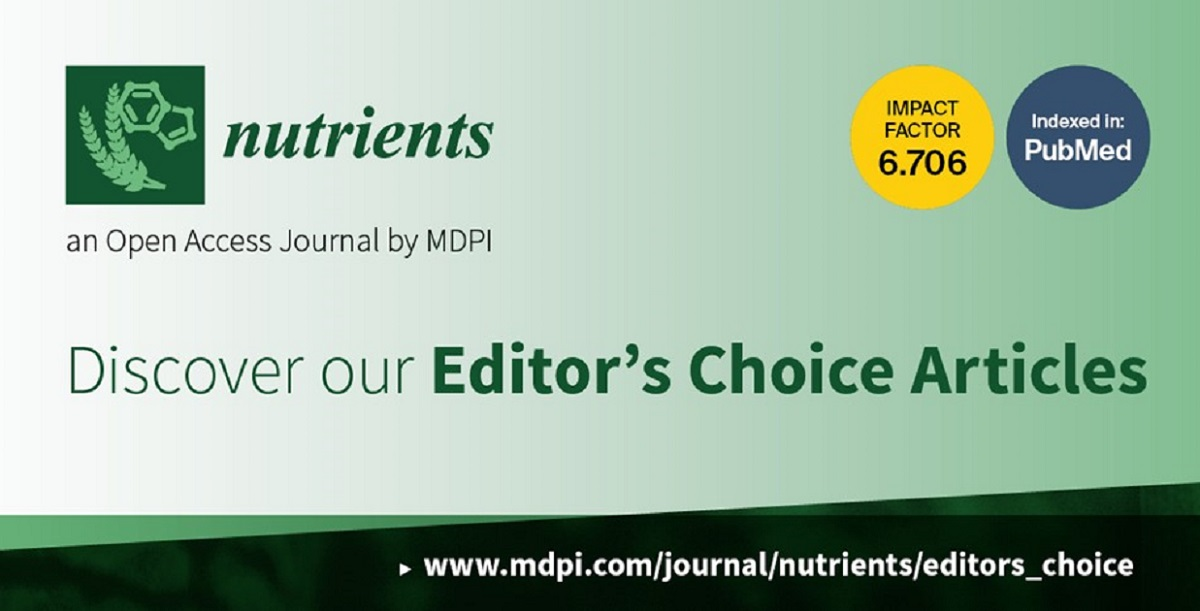
We are pleased to announce the Nutrients Editor's Choice Articles published in 2020 and 2021. Editor's Choice Articles are selected based on suggestions from the Academic Editors of Nutrients from around the world. Editors select a small number of articles recently published in journals that they consider to be of particular interest to readers or important in their respective fields of research. We are delighted to present the Editor's Choice Articles from 2020 and 2021, a curated list of high-quality articles from Nutrients (ISSN: 2072-6643) listed below, and the full list of Editor's Choice Articles can be found here: https://www.mdpi.com/journal/nutrients/editors_choice.
“Polyphenols and Human Health: The Role of Bioavailability”
by Chiara Di Lorenzo et al.
Nutrients 2021, 13(1), 273; https://doi.org/10.3390/nu13010273
Available online: https://www.mdpi.com/2072-6643/13/1/273
Cited by 124 | Viewed by 4778
“Assessment of Body Composition in Athletes: A Narrative Review of Available Methods with Special Reference to Quantitative and Qualitative Bioimpedance Analysis”
by Francesco Campa et al.
Nutrients 2021, 13(5), 1620; https://doi.org/10.3390/nu13051620
Available online: https://www.mdpi.com/2072-6643/13/5/1620
Cited by 57 | Viewed by 5161
“Beneficial Outcomes of Omega-6 and Omega-3 Polyunsaturated Fatty Acids on Human Health: An Update for 2021”
by Ivana Djuricic et al.
Nutrients 2021, 13(7), 2421; https://doi.org/10.3390/nu13072421
Available online: https://www.mdpi.com/2072-6643/13/7/2421
Cited by 72 | Viewed by 8663
“Nutritional Components in Western Diet Versus Mediterranean Diet at the Gut Microbiota–Immune System Interplay. Implications for Health and Disease”
by Cielo García-Montero et al.
Nutrients 2021, 13(2), 699; https://doi.org/10.3390/nu13020699
Available online: https://www.mdpi.com/2072-6643/13/2/699
Cited by 65 | Viewed by 6673
“Patterns of Change in Dietary Habits and Physical Activity during Lockdown in Spain Due to the COVID-19 Pandemic”
by Carmen Pérez-Rodrigo et al.
Nutrients 2021, 13(2), 300; https://doi.org/10.3390/nu13020300
Available online: https://www.mdpi.com/2072-6643/13/2/300
Cited by 57 | Viewed by 6580
“Curcumin, Quercetin, Catechins and Metabolic Diseases: The Role of Gut Microbiota”
by Umair Shabbir et al.
Nutrients 2021, 13(1), 206; https://doi.org/10.3390/nu13010206
Available online: https://www.mdpi.com/2072-6643/13/1/206
Cited by 60 | Viewed by 5943
“Effects of a 2-Week 5000 IU versus 1000 IU Vitamin D3 Supplementation on Recovery of Symptoms in Patients with Mild to Moderate Covid-19: A Randomized Clinical Trial”
by Shaun Sabico et al.
Nutrients 2021, 13(7), 2170; https://doi.org/10.3390/nu13072170
Available online: https://www.mdpi.com/2072-6643/13/7/2170
Cited by 53 | Viewed by 15806
“Longitudinal Weight Gain and Related Risk Behaviors during the COVID-19 Pandemic in Adults in the US”
by Surabhi Bhutani et al.
Nutrients 2021, 13(2), 671; https://doi.org/10.3390/nu13020671
Available online: https://www.mdpi.com/2072-6643/13/2/671
Cited by 54 | Viewed by 3286
“Lifestyle Changes and Determinants of Children’s and Adolescents’ Body Weight Increase during the First COVID-19 Lockdown in Greece: The COV-EAT Study”
by Odysseas Androutsos et al.
Nutrients 2021, 13(3), 930; https://doi.org/10.3390/nu13030930
Available online: https://www.mdpi.com/2072-6643/13/3/930
Cited by 55 | Viewed by 4254
“Effectiveness of In-Hospital Cholecalciferol Use on Clinical Outcomes in Comorbid COVID-19 Patients: A Hypothesis-Generating Study”
by Sandro Giannini et al.
Nutrients 2021, 13(1), 219; https://doi.org/10.3390/nu13010219
Available online: https://www.mdpi.com/2072-6643/13/1/219
Cited by 45 | Viewed by 7311
“Low Zinc Levels at Admission Associates with Poor Clinical Outcomes in SARS-CoV-2 Infection”
by Marina Vogel-González et al.
Nutrients 2021, 13(2), 562; https://doi.org/10.3390/nu13020562
Available online: https://www.mdpi.com/2072-6643/13/2/562
Cited by 45 | Viewed by 5783
“Universal School Meals and Associations with Student Participation, Attendance, Academic Performance, Diet Quality, Food Security, and Body Mass Index: A Systematic Review”
by Juliana F. W. Cohen et al.
Nutrients 2021, 13(3), 911; https://doi.org/10.3390/nu13030911
Available online: https://www.mdpi.com/2072-6643/13/3/911
Cited by 45 | Viewed by 8188
“A Narrative Review on Sarcopenia in Type 2 Diabetes Mellitus: Prevalence and Associated Factors”
by Anna Izzo et al.
Nutrients 2021, 13(1), 183; https://doi.org/10.3390/nu13010183
Available online: https://www.mdpi.com/2072-6643/13/1/183
Cited by 42 | Viewed by 4773
“Protective Effects of Lactoferrin against SARS-CoV-2 Infection In Vitro”
by Claudio Salaris et al.
Nutrients 2021, 13(2), 328; https://doi.org/10.3390/nu13020328
Available online: https://www.mdpi.com/2072-6643/13/2/328
Cited by 43 | Viewed by 5784
“Perinatal and Early-Life Nutrition, Epigenetics, and Allergy”
by Nathalie Acevedo et al.
Nutrients 2021, 13(3), 724; https://doi.org/10.3390/nu13030724
Available online: https://www.mdpi.com/2072-6643/13/3/724
Cited by 40| Viewed by 4030
“Evidence that Vitamin D Supplementation Could Reduce Risk of Influenza and COVID-19 Infections and Deaths”
by William B. Grant et al.
Nutrients 2020, 12(4), 988; https://doi.org/10.3390/nu12040988
Available online: https://www.mdpi.com/2072-6643/12/4/988
Cited by 1020 | Viewed by 249242
“Effects of COVID-19 Home Confinement on Eating Behaviour and Physical Activity: Results of the ECLB-COVID19 International Online Survey”
by Achraf Ammar et al.
Nutrients 2020, 12(6), 1583; https://doi.org/10.3390/nu12061583
Available online: https://www.mdpi.com/2072-6643/12/6/1583
Cited by 906 | Viewed by 33932
“Dietary Choices and Habits during COVID-19 Lockdown: Experience from Poland”
by Aleksandra Sidor et al.
Nutrients 2020, 12(6), 1657; https://doi.org/10.3390/nu12061657
Available online: https://www.mdpi.com/2072-6643/12/6/1657
Cited by 490 | Viewed by 22681
“A Review of Micronutrients and the Immune System–Working in Harmony to Reduce the Risk of Infection”
by Adrian F. Gombart et al.
Nutrients 2020, 12(1), 236; https://doi.org/10.3390/nu12010236
Available online: https://www.mdpi.com/2072-6643/12/1/236
Cited by 404 | Viewed by 40521
“The Firmicutes/Bacteroidetes Ratio: A Relevant Marker of Gut Dysbiosis in Obese Patients?”
by Fabien Magne et al.
Nutrients 2020, 12(5), 1474; https://doi.org/10.3390/nu12051474
Available online: https://www.mdpi.com/2072-6643/12/5/1474
Cited by 394 | Viewed by 12553
19 October 2022
Recruiting Editorial Board Members for Nutrients
Nutrients (IF: 6.706, ISSN: 2072-6643), a peer-reviewed, open access journal of human nutrition published semimonthly, is now recruiting Editorial Board Members (EBMs).
The responsibilities of Editorial Board Members are as follows:
- Pre-screening and making decisions on new submissions related to your research interests;
- Setting up at least one Special Issue during your term on a topic related to your research interests (or supervising Special Issues related to your research field);
- Providing input or feedback regarding journal policies;
- Helping to promote the journal among your peers or at conferences;
- Attending board meetings to suggest journal development strategies;
- Reviewing manuscripts.
For the full list of Editorial Board Members, please visit the following link: https://www.mdpi.com/journal/nutrients/editors.
If you are interested in becoming an Editorial Board Member of Nutrients, please send us your full academic CV and a short cover letter detailing your interest and suitability for the position. If you would like to recommend potential candidates or request further information, please contact the Nutrients Editorial Office at nutrients@mdpi.com. We look forward to working with you in the future.
28 September 2022
Peer Review Week 2022 – Research Integrity: Creating and Supporting Trust in Research
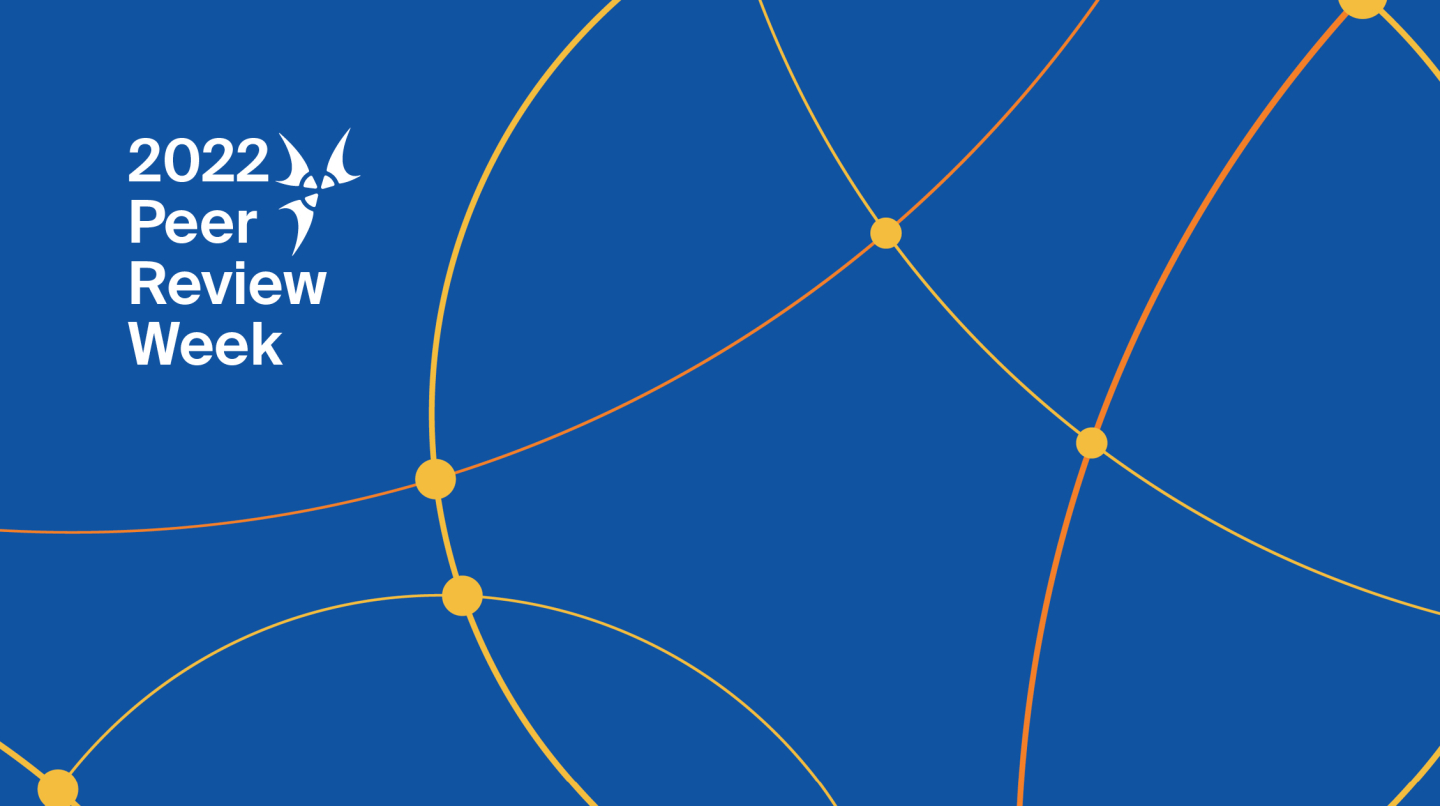
Peer Review Week began 19 September 2022 under the theme of “Research Integrity: Creating and Supporting Trust in Research”. Through various blog articles, podcast, and webinar, we discussed this crucial subject throughout the week, celebrating the essential role peer review plays in maintaining research quality.
To begin, we held a Webinar on the topic. Professor Peter W. Choate and Dr. Emmanuel Obeng-Gyasi joined Dr. Ioana Craciun, one of MDPI’s scientific officers, for an in-depth discussion.
We invite you to view the event recording:
During the week, the MDPI Blog in a series articles highlighted how good Peer Review safeguards research integrity. The following topics were covered:
- Peer Review Week 2022
- Research Integrity
- What We’ve Learned About Peer Review Reports
- 4 Steps to the Perfect Peer Review Report
- How to Write the Perfect Peer Review Report: An Interview
- Inviting Great Peer Reviewers
In a new edition of Insight Faster, an MDPI podcast, we were delighted to talk to the co-chairs of the Peer Review Week committee, Jayashree Rajagopalan (Senior Manager of Global Community Engagement for CACTUS) and Danielle Padula (Head of Marketing and Community Development at Scholastica) to get their take on this year’s event and its related topics.
You can find the Podcast here.
We hope you enjoy the contents!
26 September 2022
Nutrients | Top 10 Cited Papers in 2020
- “Evidence that Vitamin D Supplementation Could Reduce Risk of Influenza and COVID-19 Infections and Deaths”
by William B. Grant et al.
Nutrients 2020, 12(4), 988; https://doi.org/10.3390/nu12040988
Available online: https://www.mdpi.com/2072-6643/12/4/988
Cited by 1006 | Viewed by 248560 - “Effects of COVID-19 Home Confinement on Eating Behaviour and Physical Activity: Results of the ECLB-COVID19 International Online Survey”
by Achraf Ammar et al.
Nutrients 2020, 12(6), 1583; https://doi.org/10.3390/nu12061583
Available online: https://www.mdpi.com/2072-6643/12/6/1583
Cited by 873 | Viewed by 248560 - “Dietary Choices and Habits during COVID-19 Lockdown: Experience from Poland”
by Aleksandra Sidor et al.
Nutrients 2020, 12(6), 1657; https://doi.org/10.3390/nu12061657
Available online: https://www.mdpi.com/2072-6643/12/6/1657
Cited by 476 | Viewed by 22489 - “A Review of Micronutrients and the Immune System–Working in Harmony to Reduce the Risk of Infection”
by Adrian F. Gombart et al.
Nutrients 2020, 12(1), 236; https://doi.org/10.3390/nu12010236
Available online: https://www.mdpi.com/2072-6643/12/1/236
Cited by 398 | Viewed by 40075 - “The Firmicutes/Bacteroidetes Ratio: A Relevant Marker of Gut Dysbiosis in Obese Patients?”
by Fabien Magne et al.
Nutrients 2020, 12(5), 1474; https://doi.org/10.3390/nu12051474
Available online: https://www.mdpi.com/2072-6643/12/5/1474
Cited by 379 | Viewed by 12172 - “Strengthening the Immune System and Reducing Inflammation and Oxidative Stress through Diet and Nutrition: Considerations during the COVID-19 Crisis”
by Mohammed Iddir et al.
Nutrients 2020, 12(6), 1562; https://doi.org/10.3390/nu12061562
Available online: https://www.mdpi.com/2072-6643/12/6/1562
Cited by 271 | Viewed by 28342 - “Changes in Weight and Nutritional Habits in Adults with Obesity during the “Lockdown” Period Caused by the COVID-19 Virus Emergency”
by Marianna Pellegrini et al.
Nutrients 2020, 12(7), 2016; https://doi.org/10.3390/nu12072016
Available online: https://www.mdpi.com/2072-6643/12/7/2016
Cited by 244 | Viewed by 15652 - “COVID-19: The Inflammation Link and the Role of Nutrition in Potential Mitigation”
by Ioannis Zabetakis et al.
Nutrients 2020, 12(5), 1466; https://doi.org/10.3390/nu12051466
Available online: https://www.mdpi.com/2072-6643/12/5/1466
Cited by 247 | Viewed by 33228 - “25-Hydroxyvitamin D Concentrations Are Lower in Patients with Positive PCR for SARS-CoV-2”
by Antonio D’Avolio et al.
Nutrients 2020, 12(5), 1359; https://doi.org/10.3390/nu12051359
Available online: https://www.mdpi.com/2072-6643/12/5/1359
Cited by 259 | Viewed by 26108 - “Food Insecurity and COVID-19: Disparities in Early Effects for US Adults”
by Julia A. Wolfson et al.
Nutrients 2020, 12(6), 1648; https://doi.org/10.3390/nu12061648
Available online: https://www.mdpi.com/2072-6643/12/6/1648
Cited by 226 | Viewed by 11936
26 September 2022
Nutrients | Top 10 Cited Papers in 2021
- “Polyphenols and Human Health: The Role of Bioavailability”
by Chiara Di Lorenzo et al.
Nutrients 2021, 13(1), 273; https://doi.org/10.3390/nu13010273
Available online: https://www.mdpi.com/2072-6643/13/1/273
Cited by 116 | Viewed by 4574 - “Assessment of Body Composition in Athletes: A Narrative Review of Available Methods with Special Reference to Quantitative and Qualitative Bioimpedance Analysis”
by Francesco Campa et al.
Nutrients 2021, 13(5), 1620; https://doi.org/10.3390/nu13051620
Available online: https://www.mdpi.com/2072-6643/13/5/1620
Cited by 67 | Viewed by 4949 - “Beneficial Outcomes of Omega-6 and Omega-3 Polyunsaturated Fatty Acids on Human Health: An Update for 2021”
by Ivana Djuricic et al.
Nutrients 2021, 13(7), 2421; https://doi.org/10.3390/nu13072421
Available online: https://www.mdpi.com/2072-6643/13/7/2421
Cited by 67 | Viewed by 8107 - “Nutritional Components in Western Diet Versus Mediterranean Diet at the Gut Microbiota–Immune System Interplay. Implications for Health and Disease”
by Cielo García-Montero et al.
Nutrients 2021, 13(2), 699; https://doi.org/10.3390/nu13020699
Available online: https://www.mdpi.com/2072-6643/13/2/699
Cited by 63 | Viewed by 6417 - “Patterns of Change in Dietary Habits and Physical Activity during Lockdown in Spain Due to the COVID-19 Pandemic”
by Carmen Pérez-Rodrigo et al.
Nutrients 2021, 13(2), 300; https://doi.org/10.3390/nu13020300
Available online: https://www.mdpi.com/2072-6643/13/2/300
Cited by 56 | Viewed by 6464 - “Curcumin, Quercetin, Catechins and Metabolic Diseases: The Role of Gut Microbiota”
by Umair Shabbir et al.
Nutrients 2021, 13(1), 206; https://doi.org/10.3390/nu13010206
Available online: https://www.mdpi.com/2072-6643/13/1/206
Cited by 56 | Viewed by 5789 - “Effects of a 2-Week 5000 IU versus 1000 IU Vitamin D3 Supplementation on Recovery of Symptoms in Patients with Mild to Moderate Covid-19: A Randomized Clinical Trial”
by Shaun Sabico et al.
Nutrients 2021, 13(7), 2170; https://doi.org/10.3390/nu13072170
Available online: https://www.mdpi.com/2072-6643/13/7/2170
Cited by 51 | Viewed by 15540 - “Longitudinal Weight Gain and Related Risk Behaviors during the COVID-19 Pandemic in Adults in the US”
by Surabhi Bhutani et al.
Nutrients 2021, 13(2), 671; https://doi.org/10.3390/nu13020671
Available online: https://www.mdpi.com/2072-6643/13/2/671
Cited by 50 | Viewed by 3224 - “Lifestyle Changes and Determinants of Children’s and Adolescents’ Body Weight Increase during the First COVID-19 Lockdown in Greece: The COV-EAT Study”
by Odysseas Androutsos et al.
Nutrients 2021, 13(3), 930; https://doi.org/10.3390/nu13030930
Available online: https://www.mdpi.com/2072-6643/13/3/930
Cited by 50 | Viewed by 4153 - “Effectiveness of In-Hospital Cholecalciferol Use on Clinical Outcomes in Comorbid COVID-19 Patients: A Hypothesis-Generating Study”
by Sandro Giannini et al.
Nutrients 2021, 13(1), 219; https://doi.org/10.3390/nu13010219
Available online: https://www.mdpi.com/2072-6643/13/1/219
Cited by 43 | Viewed by 7239
27 July 2022
Nutrients | Special Issue Mentor Program
We are pleased to announce the launch of a new initiative—the Special Issue Mentor Program.
This program intends to provide an opportunity for early career scientists to enhance their editing, networking, and organizational skills, as well as to work closely with our journal to gain more editorial experience. Early career scientists who have novel ideas for new Special Issues of Nutrients (ISSN: 2072-6643) will act as Guest Editors under the mentorship of an experienced scientist; this mentor could be a member of the Nutrients Editorial Board or be from other well-established research institutes or laboratories, etc.
If you are interested in this opportunity, please send your Special Issue proposal to the Nutrients Editorial Office (nutrients@mdpi.com), and we will discuss the process (i.e., mentor collaboration, Special Issue topic feasibility analysis, etc.) in further detail. When the Special Issue is closed, our Editorial Office will provide certificates to all the mentors and to those who complete the program. Younger scholars will be prioritized as candidates for our journal award.

In addition to the new Special Issue Mentor Program, Nutrients will continue to welcome all Special Issue proposals based on hot research topics in the field.
26 July 2022
Meet Us at the China Functional Foods Conference 2022, 1–3 August 2022, Nanjing, China

Conference: China Functional Foods Conference 2022
Date: 1–3 August 2022
Place: Nanjing, China
Booth Number: #A19
Theme: Functional Foods and Human Health
Nutrients (ISSN: 2072-6643) will be attending the China Functional Foods Conference 2022 as exhibitors from 1 to 3 August in Nanjing, China.
Conference program:
(I) Invited reports:
- Development status and trending of global nutritional functional foods;
- Nutrition, healthcare for special food regulations and standards;
- Current situation and development of a special food industry;
- Future trends of personalized precision nutrition.
(II) Thematic forums:
- Technological innovation and industrial development of special medical use formula food;
- Technological innovation and industrial development of probiotics;
- Technological innovation and industrial development of bioactive peptides;
- Development and application of functional food raw materials/ingredients;
- Food nutrition and human health;
- Functional food development and industrial development of marine resources;
- Homology of medicine and food and development and industrial development of natural products;
- Functional polysaccharide nutrition and development and application;
- Cereal food nutrition and intensive processing.
Booth information:
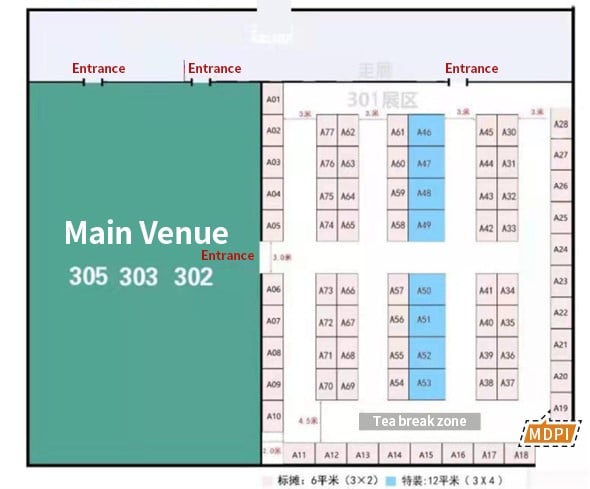
The following MDPI journals will be represented:
Please do not hesitate to reach out if you plan on attending this conference. Our delegates look forward to meeting you in person and answering any questions that you might have.
For more information about the conference, please visit the following website: http://guohsushipn.mikecrm.com/0EYH8vK.
20 July 2022
Meet Us at the 15th China Nutrition Science Congress, 29–31 July 2022, Wuhan, China

Conference: 15th China Nutrition Science Congress
Date: 29–31 July 2022
Place: Wuhan, China
Booth: #3
Nutrients (ISSN: 2072-6643) will be attending the 15th China Nutrition Science Congress 2022 as an exhibitor from 29 to 31 July in Wuhan, China.
The 15th China Nutrition Science Congress is a key academic activity of The Chinese Nutrition Society, which is a scientific grand meeting in the nutrition field, and an important platform to display the latest research results on nutrition in China, sharing the latest research progress in the field of nutrition.
The theme of the conference is “Food Nutrition and Health”. The conference will host many well-known experts and outstanding scholars in the field of nutrition and health to discuss basic theoretical research and the application of food nutrition and health, the latest breakthroughs in the field of nutrition, exchange new academic ideas and new methods, and forecast the future development trends of nutrition.
The following MDPI journals will be represented:
- Nutrients;
- Children;
- CIMB;
- Fermentation;
- Foods;
- Healthcare;
- Nutraceuticals;
- Obesities;
- Women.
Please do not hesitate to contact us if you plan on attending this conference. Our delegates look forward to meeting you in person and answering any questions that you might have.
For more information about the conference, please visit the following link: https://cnsc2021.sciconf.cn/cn/web/index/11176.
28 June 2022
2021 Impact Factors - Released
The 2021 citation metrics have been released in the Journal Citation Reports (JCR), and we’re pleased to announce the following results for MDPI journals:

| Journal | Impact Factor | Rank | Category |
| Antioxidants | 7.675 | Q1 | Food Science & Technology |
| Biochemistry & Molecular Biology | |||
| Chemistry, Medicinal | |||
| Cells | 7.666 | Q2 | Cell Biology |
| Nutrients | 6.706 | Q1 | Nutrition & Dietetics |
| Cancers | 6.575 | Q1 | Oncology |
| Pharmaceutics | 6.525 | Q1 | Pharmacology & Pharmacy |
| International Journal of Molecular Sciences | 6.208 | Q1 | Biochemistry & Molecular Biology |
| Q2 | Chemistry, Multidisciplinary | ||
| Marine Drugs | 6.085 | Q1 | Chemistry, Medicinal |
| Pharmacology & Pharmacy | |||
| Biomolecules | 6.064 | Q2 | Biochemistry & Molecular Biology |
| Batteries * | 5.938 | Q2 | Electrochemistry |
| Energy & Fuels | |||
| Materials Science, Multidisciplinary | |||
| Viruses | 5.818 | Q2 | Virology |
| Biosensors | 5.743 | Q1 | Chemistry, Analytical |
| Instruments & Instrumentation | |||
| Q2 | Nanoscience & Nanotechnology | ||
| Journal of Fungi | 5.724 | Q1 | Mycology |
| Q2 | Microbiology | ||
| Nanomaterials | 5.719 | Q1 | Physics, Applied |
| Q2 | Chemistry, Multidisciplinary | ||
| Materials Science, Multidisciplinary | |||
| Nanoscience & Nanotechnology | |||
| Metabolites | 5.581 | Q2 | Biochemistry & Molecular Biology |
| Foods | 5.561 | Q1 | Food Science & Technology |
| Drones * | 5.532 | Q2 | Remote Sensing |
| Remote Sensing | 5.349 | Q1 | Geosciences, Multidisciplinary |
| Imaging Science & Photographic Technology | |||
| Q2 | Remote Sensing | ||
| Environmental Sciences | |||
| Journal of Theoretical and Applied Electronic Commerce Research | 5.318 | Q2 | Business |
| Antibiotics | 5.222 | Q1 | Pharmacology & Pharmacy |
| Q2 | Infectious Diseases | ||
| Pharmaceuticals | 5.215 | Q1 | Pharmacology & Pharmacy |
| Q2 | Chemistry, Medicinal | ||
| Biology | 5.168 | Q1 | Biology |
| Fermentation | 5.123 | Q2 | Biotechnology & Applied Microbiology |
| Toxins | 5.075 | Q1 | Toxicology |
| Q2 | Food Science & Technology | ||
| Bioengineering * | 5.046 | Q2 | Engineering, Biomedical |
| Polymers | 4.967 | Q1 | Polymer Science |
| Journal of Clinical Medicine | 4.964 | Q2 | Medicine, General & Internal |
| Vaccines | 4.961 | Q2 | Immunology |
| Medicine, Research & Experimental | |||
| Molecules | 4.927 | Q2 | Chemistry, Multidisciplinary |
| Biochemistry & Molecular Biology | |||
| Microorganisms | 4.926 | Q2 | Microbiology |
| Journal of Functional Biomaterials * | 4.901 | Q2 | Engineering, Biomedical |
| Materials Science, Biomaterials | |||
| Biomedicines | 4.757 | Q2 | Medicine, Research & Experimental |
| Pharmacology & Pharmacy | |||
| Biochemistry & Molecular Biology | |||
| Plants | 4.658 | Q1 | Plant Sciences |
| International Journal of Environmental Research and Public Health | 4.614 | Q1 | Public, Environmental & Occupational Health (SSCI) |
| Q2 | Public, Environmental & Occupational Health (SCIE) | ||
| Environmental Sciences (SCIE) | |||
| Membranes | 4.562 | Q1 | Polymer Science |
| Q2 | Engineering, Chemical | ||
| Materials Science, Multidisciplinary | |||
| Chemistry, Physical | |||
| Pathogens | 4.531 | Q2 | Microbiology |
| Catalysts | 4.501 | Q2 | Chemistry, Physical |
| Toxics | 4.472 | Q2 | Toxicology |
| Environmental Sciences | |||
| Gels | 4.432 | Q1 | Polymer Science |
| Journal of Cardiovascular Development and Disease | 4.415 | Q2 | Cardiac & Cardiovascular Systems |
| Chemosensors | 4.229 | Q1 | Instruments & Instrumentation |
| Q2 | Chemistry, Analytical | ||
| Q3 | Electrochemistry | ||
| Genes | 4.141 | Q2 | Genetics & Heredity |
| Diagnostics | 3.992 | Q2 | Medicine, General & Internal |
| Agronomy | 3.949 | Q1 | Agronomy |
| Plant Sciences | |||
| Land | 3.905 | Q2 | Environmental Studies |
| Sustainability | 3.889 | Q2 | Environmental Sciences (SCIE) |
| Environmental Studies (SSCI) | |||
| Q3 | Green & Sustainable Science & Technology (SCIE) | ||
| Q4 | Green & Sustainable Science & Technology (SSCI) | ||
| Sensors | 3.847 | Q2 | Instruments & Instrumentation |
| Chemistry, Analytical | |||
| Engineering, Electrical & Electronic | |||
| Materials | 3.748 | Q1 | Metallurgy & Metallurgical Engineering |
| Q2 | Physics, Applied | ||
| Physics, Condensed Matter | |||
| Q3 | Materials Science, Multidisciplinary | ||
| Chemistry, Physical | |||
| Biomimetics * | 3.743 | Q2 | Engineering, Multidisciplinary |
| Q3 | Materials Science, Biomaterials | ||
| Tropical Medicine and Infectious Disease * | 3.711 | Q1 | Tropical Medicine |
| Q2 | Parasitology | ||
| Q3 | Infectious Diseases | ||
| Lubricants * | 3.584 | Q2 | Engineering, Mechanical |
| Fractal and Fractional | 3.577 | Q1 | Mathematics, Interdisciplinary Applications |
| Water | 3.530 | Q2 | Water Resources |
| Q3 | Environmental Sciences | ||
| Micromachines | 3.523 | Q2 | Instruments & Instrumentation |
| Physics, Applied | |||
| Chemistry, Analytical | |||
| Q3 | Nanoscience & Nanotechnology | ||
| Journal of Personalized Medicine | 3.508 | Q2 | Medicine, General & Internal |
| Health Care Sciences & Services | |||
| Agriculture | 3.408 | Q1 | Agronomy |
| Processes | 3.352 | Q2 | Engineering, Chemical |
| Separations | 3.344 | Q2 | Chemistry, Analytical |
| Magnetochemistry | 3.336 | Q2 | Chemistry, Inorganic & Nuclear |
| Q3 | Chemistry, Physical | ||
| Materials Science, Multidisciplinary | |||
| Brain Sciences | 3.333 | Q3 | Neurosciences |
| Buildings | 3.324 | Q2 | Construction & Building Technology |
| Engineering, Civil | |||
| Forests | 3.282 | Q1 | Forestry |
| Energies | 3.252 | Q3 | Energy & Fuels |
| Life | 3.251 | Q2 | Biology |
| Coatings | 3.236 | Q2 | Materials Science, Coatings & Films |
| Physics, Applied | |||
| Q3 | Materials Science, Multidisciplinary | ||
| Animals | 3.231 | Q1 | Agriculture, Dairy & Animal Science |
| Veterinary Sciences | |||
| Journal of Intelligence * | 3.176 | Q2 | Psychology, Multidisciplinary |
| Fishes | 3.170 | Q1 | Marine & Freshwater Biology |
| Q2 | Fisheries | ||
| Healthcare | 3.160 | Q2 | Health Policy & Services (SSCI) |
| Health Care Sciences & Services (SCIE) | |||
| Inorganics * | 3.149 | Q2 | Chemistry, Inorganic & Nuclear |
| Insects | 3.139 | Q1 | Entomology |
| Atmosphere | 3.110 | Q3 | Meteorology & Atmospheric Sciences |
| Environmental Sciences | |||
| Current Oncology | 3.109 | Q3 | Oncology |
| ISPRS International Journal of Geo-Information | 3.099 | Q2 | Geography, Physical |
| Q3 | Computer Science, Information Systems | ||
| Remote Sensing | |||
| Diversity | 3.029 | Q2 | Biodiversity Conservation |
| Ecology | |||
| Tomography | 3.000 | Q3 | Radiology, Nuclear Medicine & Medical Imaging |
| Current Issues in Molecular Biology | 2.976 | Q3 | Biochemistry & Molecular Biology |
| Medicina | 2.948 | Q3 | Medicine, General & Internal |
| Symmetry | 2.940 | Q2 | Multidisciplinary Sciences |
| Horticulturae | 2.923 | Q1 | Horticulture |
| Machines | 2.899 | Q2 | Engineering, Mechanical |
| Engineering, Electrical & Electronic | |||
| Systems * | 2.895 | Q2 | Social Sciences, Interdisciplinary |
| Applied Sciences | 2.838 | Q2 | Engineering, Multidisciplinary |
| Physics, Applied | |||
| Q3 | Chemistry, Multidisciplinary | ||
| Materials Science, Multidisciplinary | |||
| Children | 2.835 | Q2 | Pediatrics |
| Minerals | 2.818 | Q2 | Mining & Mineral Processing |
| Mineralogy | |||
| Geochemistry & Geophysics | |||
| Universe | 2.813 | Q2 | Astronomy & Astrophysics |
| Q3 | Physics, Particles & Fields | ||
| Journal of Marine Science and Engineering | 2.744 | Q1 | Engineering, Marine |
| Q2 | Oceanography | ||
| Engineering, Ocean | |||
| Entropy | 2.738 | Q2 | Physics, Multidisciplinary |
| Fire * | 2.726 | Q2 | Forestry |
| Q3 | Ecology | ||
| Metals | 2.695 | Q2 | Metallurgy & Metallurgical Engineering |
| Q3 | Materials Science, Multidisciplinary | ||
| Electronics | 2.690 | Q3 | Engineering, Electrical & Electronic |
| Computer Science, Information Systems | |||
| Physics, Applied | |||
| Crystals | 2.670 | Q2 | Crystallography |
| Q3 | Materials Science, Multidisciplinary | ||
| Aerospace | 2.660 | Q1 | Engineering, Aerospace |
| Mathematics | 2.592 | Q1 | Mathematics |
| Photonics | 2.536 | Q3 | Optics |
| Actuators | 2.523 | Q2 | Instruments & Instrumentation |
| Q3 | Engineering, Mechanical | ||
| Veterinary Sciences | 2.518 | Q2 | Veterinary Sciences |
| Behavioral Sciences * | 2.286 | Q3 | Psychology, Multidisciplinary |
| Axioms * | 1.824 | Q2 | Mathematics, Applied |
For more information on Impact Factors and what it means to index academic journals, please visit our related blog posts.
* Journals given their first Impact Factor in 2022
Source: 2021 Journal Impact Factors, Journal Citation Reports TM (Clarivate, 2022)
9 June 2022
2021 CiteScores - Released
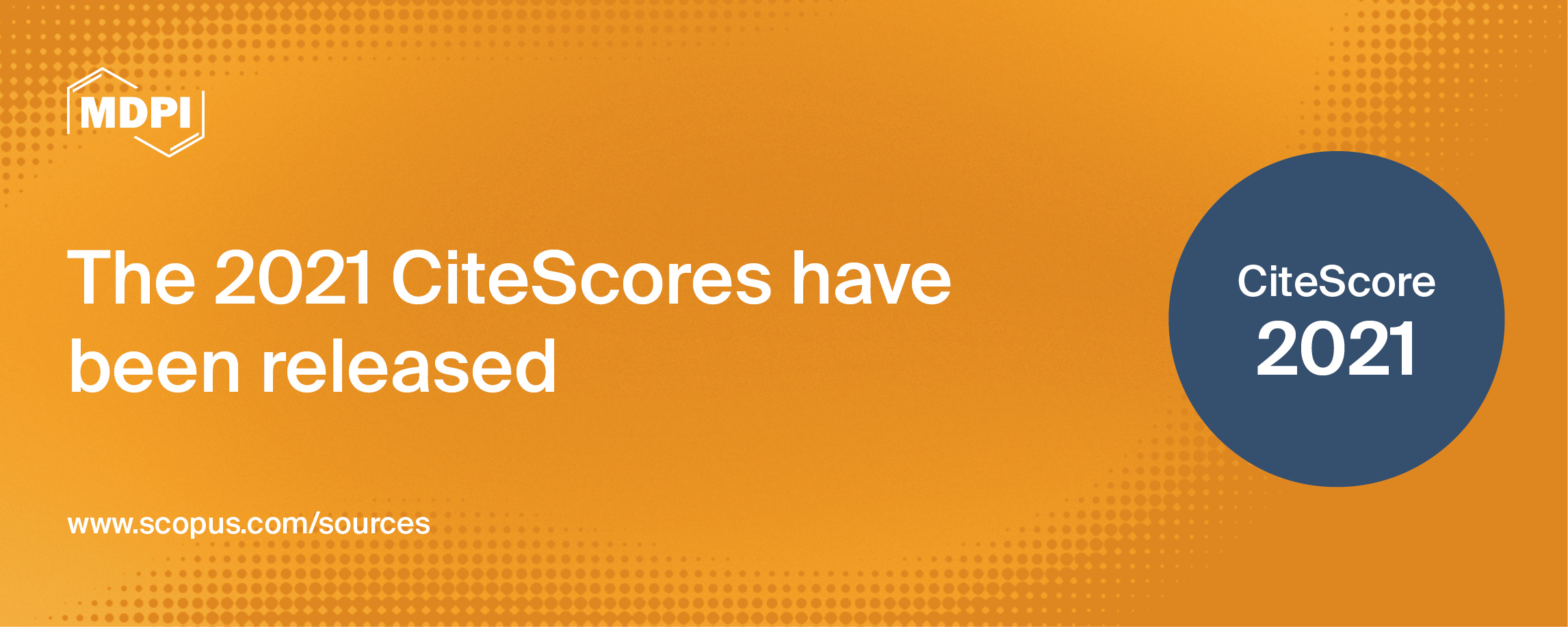
The 2021 citation metrics have been officially released in Scopus!
We are pleased to announce that 182 MDPI journals are included, of which:
● 21 journals received their first CiteScore.
● 85% of journals increased their CiteScore from 2020.
● 155 journals (85%) ranked above average, in at least one category.
The following 65 MDPI journals (36%) ranked among the top 25% of journals, in at least one category:
|
Journal |
CiteScore |
Quartile |
Category |
|
10.1 |
Q1 |
Genetics |
|
|
10.0 |
Q1 |
Biomedical Engineering |
|
|
8.1 |
Q1 |
Pharmacology, Toxicology and Pharmaceutics (miscellaneous) |
|
|
7.9 |
Q1 |
Electrical and Electronic Engineering |
|
|
7.9 |
Q1 |
Nutrition and Dietetics |
|
|
7.4 |
Q1 |
General Earth and Planetary Sciences |
|
|
7.2 |
Q1 |
Computer Science Applications |
|
|
6.9 |
Q1 |
Inorganic Chemistry |
|
|
6.9 |
Q1 |
Computer Networks and Communications |
|
|
6.7 |
Q1 |
General Biochemistry, Genetics and Molecular Biology |
|
|
6.6 |
Q1 |
General Chemical Engineering |
|
|
6.6 |
Q1 |
Health, Toxicology and Mutagenesis |
|
|
6.6 |
Q1 |
Infectious Diseases |
|
|
6.5 |
Q1 |
Food Science |
|
|
6.5 |
Q1 |
Civil and Structural Engineering |
|
|
6.4 |
Q1 |
Nature and Landscape Conservation |
|
|
6.4 |
Q1 |
Instrumentation |
|
|
6.1 |
Q1 |
Management Information Systems |
|
|
5.9 |
Q1 |
Chemistry (miscellaneous) |
|
|
5.7 |
Q1 |
Polymers and Plastics |
|
|
5.6 |
Q1 |
Engineering (miscellaneous) |
|
|
5.5 |
Q1 |
General Environmental Science |
|
|
5.5 |
Q1 |
Urban Studies |
|
|
5.4 |
Q2 |
Computer Networks and Communications |
|
|
5.3 |
Q1 |
Food Science |
|
|
5.3 |
Q1 |
Plant Science |
|
|
5.2 |
Q1 |
Ecology, Evolution, Behavior and Systematics |
|
|
5.2 |
Q1 |
General Engineering |
|
|
Journal of Open Innovation: Technology, Market, and Complexity |
5.1 |
Q1 |
Development |
|
5.0 |
Q1 |
Chemistry (miscellaneous) |
|
|
5.0 |
Q1 |
Control and Optimization |
|
|
5.0 |
Q1 |
Geography, Planning and Development |
|
|
5.0 |
Q1 |
Geography, Planning and Development |
|
|
4.9 |
Q1 |
Forestry |
|
|
4.9 |
Q1 |
Control and Optimization |
|
|
4.9 |
Q1 |
Soil Science |
|
|
4.8 |
Q1 |
General Earth and Planetary Sciences |
|
|
4.8 |
Q1 |
Mechanical Engineering |
|
|
4.8 |
Q1 |
Public Health, Environmental and Occupational Health |
|
|
4.8 |
Q1 |
Geography, Planning and Development |
|
|
International Journal of Environmental Research and Public Health |
4.5 |
Q1 |
Public Health, Environmental and Occupational Health |
|
4.5 |
Q1 |
Physical Therapy, Sports Therapy and Rehabilitation |
|
|
4.4 |
Q1 |
Mathematical Physics |
|
|
4.4 |
Q1 |
General Medicine |
|
|
4.3 |
Q1 |
General Mathematics |
|
|
4.2 |
Q1 |
Surgery |
|
|
4.1 |
Q1 |
Health Professions (miscellaneous) |
|
|
4.1 |
Q1 |
Plant Science |
|
|
4.0 |
Q1 |
General Engineering |
|
|
4.0 |
Q1 |
Forestry |
|
|
4.0 |
Q1 |
Education |
|
|
3.9 |
Q1 |
General Pharmacology, Toxicology and Pharmaceutics |
|
|
3.9 |
Q1 |
Applied Mathematics |
|
|
3.8 |
Q1 |
Development |
|
|
3.8 |
Q1 |
Architecture |
|
|
3.8 |
Q1 |
Metals and Alloys |
|
|
3.5 |
Q1 |
Communication |
|
|
3.4 |
Q1 |
General Social Sciences |
|
|
2.9 |
Q1 |
General Mathematics |
|
|
2.8 |
Q1 |
Analysis |
|
|
2.7 |
Q1 |
General Veterinary |
|
|
2.6 |
Q1 |
Algebra and Number Theory |
|
|
1.8 |
Q1 |
Conservation |
|
|
1.0 |
Q1 |
Religious Studies |
|
|
0.9 |
Q1 |
Philosophy |
Source: 2021 CiteScores™ (Elsevier)
2 June 2022
MDPI’s 2021 Outstanding Reviewer Awards in “Biology & Life Sciences”—Winners Announced
In order to acknowledge our reviewers, who so generously dedicate their time to reviewing papers and demonstrate diligence, professionalism, and timeliness when reviewing manuscripts, MDPI journals regularly offer outstanding reviewer awards to scholars who participate in the peer-review process.
We are proud to recognize winners for the year 2021 in the “Biology & Life Sciences” category for their outstanding contributions among extensive competition by presenting them with an Outstanding Reviewer Award.
We would like to take this opportunity to congratulate all the winners on their achievement.
MDPI will continue to provide support and recognition to the academic community.
- Enrico Vito Perrino, CIHEAM, Mediterranean Agronomic Institute of Bari, Italy
- Dhirendra Kumar, National Institute of Environmental Health Sciences, Research Triangle Park, USA
- Carlos A. Viegas, Univesity of Trás-os-Montes e Alto Douro, Portugal
- Yuri Shavrukov, Flinders University, Australia
- Bipin Gaihre, Mayo Clinic, USA
- Craig D. Workman, University of Iowa, USA
- Vivian Ciaramitaro, University of Massachusetts Boston, USA
- Yang Zhang, University of Minnesota, USA
- Bonam Srinivasa Reddy, Université de Paris, France
- Homma Takujiro, Yamagata University, Japan
- Hwang, In Koo, Seoul National University, South Korea
- Kobeissy Firas, University of Florida, USA
- Rebelo, Sandra, University of Aveiro, Portugal
- Günter Gollmann, University of Vienna, Austria
- Stephan Koblmüller, University of Graz, Austria
- Emiliano Mori, Istituto di Ricerca sugli Ecosistemi Terrestri, Italy
- Joshua D. Klein, Agricultural Research Organization—The Volcani Center, Israel
- Ana Cristina S Figueiredo, Faculdade de Ciências da Universidade de Lisboa, Portugal
- Carmelo Peter Bonsignore, Università Mediterranea di Reggio Calabria, Italy
- Klaus H. Hoffmann, University of Bayreuth, Germany
- Ivan Milosavljević, University of California, USA
- Remigiusz Bachor, University of Wrocław, Poland
- Nguyen Phuoc Long, Inje University College of Medicine, South Korea
- Chi Chen, University of Minnesota, USA
- Jadwiga Hamułka, Warsaw University of Life Sciences, Poland
- Grace Campbell, University of Sydney, Australia
- Nicholas Norwitz, Harvard Medical School, USA
- Stefan Kabisch, Charité University Hospital Berlin, Germany
- Luis Rodrigo, University of Oviedo, Spain
- Carlos Viegas, Univesity of Trás-os-Montes e Alto Douro, Portugal
- Arvind Sharma, The University of Queensland, Australia
2 June 2022
MDPI’s 2021 Young Investigator Awards in “Biology & Life Sciences”—Winners Announced
MDPI’s Young Investigator Awards recognize promising junior researchers, acknowledge their contributions, and enhance communication among scientists. We are proud to present the 2021 winners in the “Biology & Life Sciences” category. The winners were selected by the journals’ editors.
We warmly congratulate the awarded young investigators for their outstanding contributions.
MDPI will continue to provide support and recognition to the academic community.
- Carlos Guzmán, University of Cordoba, Spain
- Katharina Hohlbaum, Freie Universität Berlin, Germany
- Uri Ben-David, Tel Aviv University, Israel
- Enrico Lunghi, Institute of Zoology Chinese Academy of Sciences in Beijing, China
- Guodong Zhang, University of Massachusetts Amherst, USA
- Luke Bell, Temperate Horticulture, University of Reading, UK
International Journal of Molecular Sciences:
- Alessandro D’Urso, University of Catania, Italy.
- Apostolos Zaravinos, University of Cyprus, Cyprus
- Cesar de la Fuente-Nunez, University of Pennsylvania, USA
- Maria Teresa Caccamo, Messina University, Italy
- Tiziana Bonifacino, University of Genoa, Italy
- Federico Baltar, University of Vienna, Austria
- Rebecca Drummond, University of Birmingham, UK
- Miriam Oses-Ruiz, Public University of Navarre, Spain
Life:
- João Pedro da Silva Machado Lobo, University of Porto, Portugal
- Vincenzo Russo, University of Campania Luigi Vanvitelli, Italy
- Gabriele Rocchetti, Catholic University of Sacred Heart, Italy
- Fiona Lavelle, Queen's University Belfast, UK
- Matthew Snelson, Monash University, Australia
- Si Ming Man, Australian National University, Australia
- Jasper Fuk-Woo Chan, University of Hong Kong, China
- Stefania Sut, University of Padova, Italy
- Mohamed Ahmed El-Esawi, Tanta University, Tanta, Egypt
- Nicholas M. Provine, University of Oxford, UK
- Nicholas S. Heaton, Duke University, USA
2 June 2022
MDPI’s 2021 Travel Awards in “Biology & Life Sciences”—Winners Announced
We are proud to recognize the winners of MDPI’s 2021 Travel Awards in the “Biology & Life Sciences” category for their outstanding presentations and to present them with the prize.
MDPI journals regularly offer travel awards to encourage talented junior scientists to present their latest research at academic conferences in specific fields, which helps to increase their influence.
The winners mentioned below were carefully selected by the journal editors based on an outline of their research and the work to be presented at an academic conference.
We would like to warmly congratulate the winners of 2021 Travel Awards and wish them the greatest success with their future research endeavors. MDPI will continue to enhance communication among scientists.
- Zahra Bitarafan, Norwegian Institute of Bioeconomy Research (NIBIO), Norway
- Nikolaos Tsoulias, Leibniz Institute for Agricultural Engineering and Bioeconomy (ATB), Germany
- Michela Verni, University of Bari, Italy
- Philipp Demling, RWTH Aachen University, Germany
- Jagveer Singh, Punjab Agricultural University, India
- Ibrar Hussain, State University of Londrina, Brazil
- Francis Muchaamba, University of Zurich, Switzerland
- Tanja Eisemann, SBP Medical Discovery Institute, USA
- Mrinalini Dey, National Institute for Health Research, UK
- Ben Kirk, University of Melbourne, Australia
- Kirrilly Pursey, University of Newcastle, Australia
- Dieuwertje Kok, Wageningen University, the Netherlands
- Hanna Huber, University of Bonn, Germany
- Marlene Lages, University of Porto, Portugal
- Zohra S. Lassi, University of Adelaide, Australia
- Rik Olde Engberink, Amsterdam University Medicial Center, the Netherlands
- Sarah Warkentin, University of Porto (ISPUP), Portugal
- Álvaro Hernáez, Norwegian Institute of Public Health, Norway
- Leila Abdelhamid, Virginia-Maryland College of Veterinary Medicine, Virginia Tech, USA
- Maria Michela Cesare, University of Siena, Italy
- Kaisa Hiippala, University of Helsinki, Finland
- Vanessa Silva, University of Trás-os-Montes and Alto Douro, Portugal
- Hejun Liu, Scripps Research Institute, USA
- Tomokazu Tamura, Princeton University, USA
- Cecilie Knudsen, Technical University of Denmark, Denmark
- Laura Biessy, Cawthron Institute, New Zealand
- Marcelo Mendes Rabelo, University of Florida, USA
- Hee Chun Chung, Seoul National University, South Korea
- Alejandro Marin Lopez, Yale University, USA
2 June 2022
MDPI’s 2021 Best Paper Awards in “Biology & Life Sciences”—Winners Announced
The purpose of our Best Paper Awards is to promote and recognize the most impactful contributions published within MDPI journals.
The editors of each journal carefully selected reviews and research papers through a rigorous judging process based on criteria such as the scientific merit, overall impact, and the quality of presentation of the papers published in the journal last year.
We are honored to present the winners in the subject areas of “Biology & Life Sciences”, who were selected amongst extensive competition, and congratulate the authors for their outstanding scientific publications.
MDPI will continue to provide support and recognition to the academic community.
by Wenchao Liu, Yilin Yuan, Chenyu Sun, Balamuralikrishnan Balasubramanian, Zhihui Zhao and Lilong An
Animals 2019, 9(8), 506, doi 10.3390/ani9080506
by Peter Coals, Dawn Burnham, Andrew Loveridge, David W. Macdonald, Michael ’t Sas-Rolfes, Vivienne L. Williams and John A. Vucetich
Animals 2019, 9(2), 52; doi 10.3390/ani9020052
by Giovanni Sogari, Mario Amato, Ilaria Biasato, Silvana Chiesa and Laura Gasco
Animals 2019, 9(4), 119; doi 10.3390/ani9040119
by Mark L. Chiu; Dennis R. Goulet; Alexey Teplyakov and Gary L. Gilliland
Antibodies 2019, 8(4), 55; doi 10.3390/antib8040055
by Luca Frattaruolo, Gabriele Carullo, Matteo Brindisi, Sarah Mazzotta, Luca Bellissimo, Vittoria Rago, Rosita Curcio, Vincenza Dolce, Francesca Aiello and Anna Rita Cappello
Antioxidants 2019, 8(6), 186; doi 10.3390/antiox8060186
by Chunhe Gu, Kate Howell, Frank R. Dunshea and Hafiz A. R. Suleria
Antioxidants 2019, 8(9), 405; doi 10.3390/antiox8090405
by Spyridon A. Petropoulos, Ângela Fernandes, Maria Inês Dias, Ioannis B. Vasilakoglou, Konstantinos Petrotos, Lillian Barros and Isabel C. F. R. Ferreira
Antioxidants 2019, 8(8), 293; doi 10.3390/antiox8080293
by Rubén Domínguez, Mirian Pateiro, Mohammed Gagaoua, Francisco J. Barba, Wangang Zhang and José M. Lorenzo
Antioxidants 2019, 8(10), 429; doi 10.3390/antiox8100429
by Michael H. Hastings, Elizabeth S. Maywood and Marco Brancaccio
Biology 2019, 8(1), 13; doi 10.3390/biology8010013
by Gail D. Schwieterman, Daniel P. Crear, Brooke N. Anderson, Danielle R. Lavoie, James A. Sulikowski, Peter G. Bushnell and Richard W. Brill
Biology 2019, 8(3), 56; doi 10.3390/biology8030056
by Shuichi Nakamura and Tohru Minamino
Biomolecules 2019, 9(7), 279; doi 10.3390/biom9070279
by Dmitrii Usoltsev, Vera Sitnikovaandrey Kajava and Mayya Uspenskaya
Biomolecules 2019, 9(8), 359; doi 10.3390/biom9080359
by Gerhard Liebisch, Josef Ecker, Sebastian Roth, Sabine Schweizer, Veronika Öttl, Hans-Frieder Schött, Hongsup Yoon, Dirk Haller, Ernst Holler, Ralph Burkhardt and Silke Matysik
Biomolecules 2019, 9(4), 121; doi 10.3390/biom9040121
by Anna Janaszewska, Joanna Lazniewska, Przemysław Trzepiński, Monika Marcinkowska and Barbara Klajnert-Maculewicz
Biomolecules 2019, 9(8), 330; doi 10.3390/biom9080330
by Heng Sheng Sow, Jiang Ren, Marcel Camps, Ferry Ossendorp and Peter ten Dijke
Cells 2019, 8(4), 320; doi 10.3390/cells8040320
by Dinender K. Singla, Taylor A. Johnson and Zahra Tavakoli Dargani
Cells 2019, 8(10), 1224; doi 10.3390/cells8101224
by Laura M. Doyle and Michael Zhuo Wang
Cells 2019, 8(7), 727; doi 10.3390/cells8070727
by Yu Han, Xuezhou Li, Yanbo Zhang, Yuping Han, Fei Chang and Jianxun Ding
Cells 2019, 8(8), 886; doi 10.3390/cells8080886
by Sarah B. Kingan, Haynes Heaton, Juliana Cudini, Christine C. Lambert, Primo Baybayan, Brendan D. Galvin, Richard Durbin, Jonas Korlach and Mara K. N. Lawniczak
Genes 2019, 10(1), 62; doi 10.3390/genes10010062
by Katherine E Bohnsack, Claudia Höbartner and Markus T Bohnsack
Genes 2019, 10(2), 102; doi 10.3390/genes10020102
by Laura M. Boykin, Peter Sseruwagi, Titus Alicai, Elijah Ateka, Ibrahim Umar Mohammed, Jo-Ann L. Stanton, Charles Kayuki, Deogratius Mark, Tarcisius Fute, Joel Erasto, Hilda Bachwenkizi, Brenda Muga, Naomi Mumo, Jenniffer Mwangi, Phillip Abidrabo, Geoffrey Okao-Okuja, Geresemu Omuut, Jacinta Akol, Hellen B. Apio, Francis Osingada, Monica A. Kehoe, David Eccles, Anders Savill, Stephen Lamb, Tonny Kinene, Christopher B. Rawle, Abishek Muralidhar, Kirsty Mayall, Fred Tairo and Joseph Ndunguru
Genes 2019, 10(9), 632; doi 10.3390/genes10090632
by Elamin Hafiz Baillo, Roy Njoroge Kimotho, Zhengbin Zhang and Ping Xu
Genes 2019, 10(10), 771; doi 10.3390/genes10100771
by Lida Fuentes, Carlos R. Figueroa and Monika Valdenegro
Horticulturae 2019, 5(2), 45; doi 10.3390/horticulturae5020045
by Marta Guarise, Gigliola Borgonovo, Angela Bassoli and Antonio Ferrante
Horticulturae 2019, 5(1), 13; doi 10.3390/horticulturae5010013
by Rik Clymans, Vincent Van Kerckvoorde, Eva Bangels, Wannes Akkermans, Ammar Alhmedi, Patrick De Clercq, Tim Beliën and Dany bylemans
Insects 2019, 10(7), 200; doi 10.3390/insects10070200
by Marc Kenis, Hannalene du Plessis, Johnnie Van den Berg, Malick Niango Ba, Georg Goergen, Koffi Eric Kwadjo, Ibrahim Baoua, Tadele Tefera, Alan Buddie, Giovanni Cafà, Lisa Offord, Ivan Rwomushana and Andrew Polaszek
Insects 2019, 10(4), 92; doi 10.3390/insects10040092
by Rafael R. da Costa, Haofu Hu, Hongjie Li and Michael Poulsen
Insects 2019, 10(4), 87; doi 10.3390/insects10040087
International Journal of Molecular Sciences:
by Rüdiger Hardeland
Int. J. Mol. Sci. 2019, 20(5), 1223; doi 10.3390/ijms20051223
by Elise Lévy, Nadine El Banna, Dorothée Baïlle, Amélie Heneman-Masurel, Sandrine Truchet, Human Rezaei, Meng-Er Huang, Vincent Béringue, Davy Martin and Laurence Vernis
Int. J. Mol. Sci. 2019, 20(16), 3896; doi 10.3390/ijms20163896
by Beatriz Herrero-Fernandez, Raquel Gomez-Bris, Beatriz Somovilla-Crespo and Jose Maria Gonzalez-Granado
Int. J. Mol. Sci. 2019, 20(21), 5293; doi 10.3390/ijms20215293
by Claudia Beaurivage, Elena Naumovska, Yee Xiang Chang, Edo D. Elstak, Arnaud Nicolas, Heidi Wouters, Guido van Moolenbroek, Henriëtte L. Lanz, Sebastiaan J. Trietsch, Jos Joore, Paul Vulto, Richard A.J. Janssen, Kai S. Erdmann, Jan Stallen and Dorota Kurek
Int. J. Mol. Sci. 2019, 20(22), 5661; doi 10.3390/ijms20225661
by Maiko Okano, Masanori Oshi, Ali Linsk Butash, Eriko Katsuta, Kazunoshin Tachibana, Katsuharu Saito, Hirokazu Okayama, Xuan Peng, Li Yan, Koji Kono, Toru Ohtake and Kazuaki Takabe
Int. J. Mol. Sci. 2019, 20(17), 4197; doi 10.3390/ijms20174197
by Shaista Afroz, Rieko Arakaki, Takuma Iwasa, Masamitsu Oshima, Maki Hosoki, Miho Inoue, Otto Baba, Yoshihiro Okayama and Yoshizo Matsuka
Int. J. Mol. Sci. 2019, 20(3), 711; doi 10.3390/ijms20030711
Life:
by Márió Gajdács, Zoltán Bátori, Marianna Ábrók, Andrea Lázár and Katalin Burián
Life 2020, 10(2), 16; doi 10.3390/life10020016
by Carla Ferreira, Catarina Almeida, Sandra Tenreiro and Alexandre Quintas
Life 2020, 10(6), 86; doi 10.3390/life10060086
by Ronald D. Hills, Benjamin A. Pontefract, Hillary R. Mishcon, Cody A. Black, Steven C. Sutton and Cory R. Theberge
Nutrients 2019, 11(7), 1613; doi 10.3390/nu11071613
by Harri Hemilä and Elizabeth Chalker
Nutrients 2019, 11(4), 708; doi 10.3390/nu11040708
by Humaira Jamshed, Robbie A. Beyl, Deborah L. Della Manna, Eddy S. Yang, Eric Ravussin and Courtney M. Peterson
Nutrients 2019, 11(6), 1234; doi 10.3390/nu11061234
by Israr Kha, Naeem Ullah, Lajia Zha, Yanrui Bai, Ashiq Khan, Tang Zhao, Tuanjie Che and Chunjiang Zhang
Pathogens 2019, 8(3), 126; doi 10.3390/pathogens8030126
by Spyridoula-Angeliki Nikou,Nessim Kichik, Rhys Brown, Nicole O. Ponde, Jemima Ho, Julian R. Naglik and Jonathan P. Richardson
Pathogens 2019, 8(2), 53; doi 10.3390/pathogens8020053
by Steven Batinovic, Flavia Wassef, Sarah A. Knowler, Daniel T.F. Rice, Cassandra R. Stanton, Jayson Rose, Joseph Tucci, Tadashi Nittami, Antony Vinh, Grant R. Drummond, Christopher G. Sobey, Hiu Tat Chan, Robert J. Seviour, Steve Petrovski and Ashley E. Franks
Pathogens 2019, 8(3), 100; doi 10.3390/pathogens8030100
by Muhammad Hammad Saleem, Johan Potgieter and Khalid Mahmood Arif
Plants 2019, 8(11), 468; doi 10.3390/plants8110468
by Ida Linić, Dunja Šamec, Jiří Grúz, Valerija Vujčić Bok, Miroslav Strnad and Branka Salopek-Sondi
Plants 2019, 8(6), 155; doi 10.3390/plants8060155
by Marie Agatha Mohn, Besarta Thaqi and Katrin Fischer-Schrader
Plants 2019, 8(3), 67; doi 10.3390/plants8030067
by Chiara Biselliandrea Volante, Francesca Desiderio, Alessandro Tondelli, Alberto Gianinetti, Franca Finocchiaro, Federica Taddei, Laura Gazza, Daniela Sgrulletta, Luigi Cattivelli and Giampiero Valè
Plants 2019, 8(8), 292; doi 10.3390/plants8080292
7 April 2022
Nutrients | Highly Cited Papers in Science Citation Index Expanded (SCIE) in the Web of Science in 2021
It is our honor to congratulate the authors of publications in Nutrients (ISSN: 2072-6643) that have been distinguished as highly cited papers by Clarivate in 2021, according to the Web of Science data:
“Polyphenols and Human Health: The Role of Bioavailability”
by Chiara Di Lorenzo, Francesca Colombo, Simone Biella, Creina Stockley, and Patrizia Restani
Available online: https://www.mdpi.com/2072-6643/13/1/273
“Assessment of Body Composition in Athletes: A Narrative Review of Available Methods with Special Reference to Quantitative and Qualitative Bioimpedance Analysis”
by Francesco Campa, Stefania Toselli, Massimiliano Mazzilli, Luís A. Gobbo, and Giuseppe Coratella
Available online: https://www.mdpi.com/2072-6643/13/5/1620
“Influence of Mediterranean Diet on Human Gut Microbiota”
by Giuseppe Merra, Annalisa Noce, Giulia Marrone, Marco Cintoni, Maria G. Tarsitano, Annunziata Capacci, and Antonino De Lorenzo
Available online: https://www.mdpi.com/2072-6643/13/1/7
“Dietary Supplements during COVID-19 Outbreak. Results of Google Trends Analysis Supported by PLifeCOVID-19 Online Studies”
by Jadwiga Hamulka, Marta Jeruszka-Bielak, Magdalena Górnicka, Małgorzata E. Drywień, and Monika A. Zielinska-Pukos
Available online: https://www.mdpi.com/2072-6643/13/1/54
“Have Lifestyle Habits and Psychological Well-Being Changed among Adolescents and Medical Students Due to COVID-19 Lockdown in Croatia?”
by Ružica Dragun, Nikolina N. Veček, Mario Marendić, Ajka Pribisalić, Gabrijela Đivić, Hellas Cena, Ozren Polašek, and Ivana Kolčić
Available online: https://www.mdpi.com/2072-6643/13/1/97
“Patterns of Change in Dietary Habits and Physical Activity during Lockdown in Spain Due to the COVID-19 Pandemic”
by Carmen Pérez-Rodrigo, Marta Gianzo Citores, Gotzone Hervás Bárbara, Fátima Ruiz-Litago, Luis Casis Sáenz, Victoria Arija, Ana M. López-Sobaler, Emilio Martínez de Victoria, Rosa M. Ortega, Teresa Partearroyo, Joan Quiles-Izquierdo, Lourdes Ribas-Barba, Amelia Rodríguez-Martín, Gemma Salvador Castell, Josep A. Tur, Gregorio Varela-Moreiras, Lluis Serra-Majem, and Javier Aranceta-Bartrina
Available online: https://www.mdpi.com/2072-6643/13/2/300
“Changes in Consumers' Food Practices during the COVID-19 Lockdown, Implications for Diet Quality and the Food System: A Cross-Continental Comparison”
by Blain Murphy, Tony Benson, Amanda McCloat, Elaine Mooney, Chris Elliott, Moira Dean, and Fiona Lavelle
Available online: https://www.mdpi.com/2072-6643/13/1/20
“Effectiveness of In-Hospital Cholecalciferol Use on Clinical Outcomes in Comorbid COVID-19 Patients: A Hypothesis-Generating Study”
by Sandro Giannini, Giovanni Passeri, Giovanni Tripepi, Stefania Sella, Maria Fusaro, Gaetano Arcidiacono, Marco O. Torres, Alberto Michielin, Tancredi Prandini, Valeria Baffa, Andrea Aghi, Colin G. Egan, Martina Brigo, Martina Zaninotto, Mario Plebani, Roberto Vettor, Paola Fioretto, Maurizio Rossini, Alessandro Vignali, Fabrizio Fabris, and Francesco Bertoldo
Available online: https://www.mdpi.com/2072-6643/13/1/219
“Curcumin, Quercetin, Catechins and Metabolic Diseases: The Role of Gut Microbiota”
by Umair Shabbir, Momna Rubab, Eric B.-M. Daliri, Ramachandran Chelliah, Ahsan Javed, and Deog-Hwan Oh
Availabe online: https://www.mdpi.com/2072-6643/13/1/206
“Lifestyle Changes and Determinants of Children's and Adolescents' Body Weight Increase during the First COVID-19 Lockdown in Greece: The COV-EAT Study”
by Odysseas Androutsos, Maria Perperidi, Christos Georgiou, and Giorgos Chouliaras
Available online: https://www.mdpi.com/2072-6643/13/3/930
“Longitudinal Weight Gain and Related Risk Behaviors during the COVID-19 Pandemic in Adults in the US”
by Surabhi Bhutani, Michelle R. vanDellen, and Jamie A. Cooper
Available online: https://www.mdpi.com/2072-6643/13/2/671
“Creatine in Health and Disease”
by Richard B. Kreider and Jeffery R. Stout
Available online: https://www.mdpi.com/2072-6643/13/2/447
“Nutritional Components in Western Diet Versus Mediterranean Diet at the Gut Microbiota–Immune System Interplay. Implications for Health and Disease”
by Cielo García-Montero, Oscar Fraile-Martínez, Ana M. Gómez-Lahoz, Leonel Pekarek, Alejandro J. Castellanos, Fernando Noguerales-Fraguas, Santiago Coca, Luis G. Guijarro, Natalio García-Honduvilla, Angel Asúnsolo, Lara Sanchez-Trujillo, Guillermo Lahera, Julia Bujan, Jorge Monserrat, Melchor Álvarez-Mon, Miguel A. Álvarez-Mon, and Miguel A. Ortega
Available online: https://www.mdpi.com/2072-6643/13/2/699
“Bovine Colostrum: Its Constituents and Uses”
by Raymond J. Playford and Michael J. Weiser
Available online: https://www.mdpi.com/2072-6643/13/1/265
“Protective Effects of Lactoferrin against SARS-CoV-2 Infection In Vitro”
by Claudio Salaris, Melania Scarpa, Marina Elli, Alice Bertolini, Simone Guglielmetti, Fabrizio Pregliasco, Corrado Blandizzi, Paola Brun, and Ignazio Castagliuolo
Available online: https://www.mdpi.com/2072-6643/13/2/328
“Magnesium in Aging, Health and Diseases”
by Mario Barbagallo, Nicola Veronese, and Ligia J. Dominguez
Available online: https://www.mdpi.com/2072-6643/13/2/463
“Bioactive Compounds for Skin Health: A Review”
by Monika Michalak, Monika Pierzak, Beata Kręcisz, and Edyta Suliga
Available online: https://www.mdpi.com/2072-6643/13/1/203
“COVID-19-Related Quarantine Effect on Dietary Habits in a Northern Italian Rural Population: Data from the Brisighella Heart Study”
by Arrigo F.G. Cicero, Federica Fogacci, Marina Giovannini, Martina Mezzadri, Elisa Grandi, Claudio Borghi, and the Brisighella Heart Study Group
Available online: https://www.mdpi.com/2072-6643/13/2/309
“An Update on Omega-3 Polyunsaturated Fatty Acids and Cardiovascular Health”
by Andrew Elagizi, Carl J. Lavie, Evan O’Keefe, Keri Marshall, James H. O’Keefe, and Richard V. Milani
Available online: https://www.mdpi.com/2072-6643/13/1/204
“A Narrative Review on Sarcopenia in Type 2 Diabetes Mellitus: Prevalence and Associated Factors”
by Anna Izzo, Elena Massimino, Gabriele Riccardi, and Giuseppe Della Pepa
Available online: https://www.mdpi.com/2072-6643/13/1/183
“Come Back Skinfolds, All Is Forgiven: A Narrative Review of the Efficacy of Common Body Composition Methods in Applied Sports Practice”
by Andreas M. Kasper, Carl Langan-Evans, James F. Hudson, Thomas E. Brownlee, Liam D. Harper, Robert J. Naughton, James P. Morton, and Graeme L. Close
Available online: https://www.mdpi.com/2072-6643/13/4/1075
“Dietary Habits before and during the COVID-19 Epidemic in Selected European Countries”
by Magdalena Skotnicka, Kaja Karwowska, Filip Kłobukowski, Eliza Wasilewska, and Sylwia Małgorzewicz
Available online: https://www.mdpi.com/2072-6643/13/5/1690
“Perinatal and Early-Life Nutrition, Epigenetics, and Allergy”
by Nathalie Acevedo, Bilal Alashkar Alhamwe, Luis Caraballo, Mei Ding, Antonio Ferrante, Holger Garn, Johan Garssen, Charles S. Hii, James Irvine, Kevin Llinás-Caballero, Juan F. López, Sarah Miethe, Khalida Perveen, Elke Pogge von Strandmann, Milena Sokolowska, Daniel P. Potaczek, and Betty C.A.M. van Esch
Available online: https://www.mdpi.com/2072-6643/13/3/724
“The Microbiota–Gut–Brain Axis and Alzheimer’s Disease: Neuroinflammation Is to Blame?”
by Ashwinipriyadarshini Megur, Daiva Baltriukienė, Virginija Bukelskienė, and Aurelijus Burokas
Available online: https://www.mdpi.com/2072-6643/13/1/37
“Eating Habits and Lifestyles during the Initial Stage of the COVID-19 Lockdown in China: A Cross-Sectional Study”
by Guo-yi Yang, Xin-lei Lin, Ai-ping Fang, and Hui-lian Zhu
Available online: https://www.mdpi.com/2072-6643/13/3/970
“Nutraceutical Strategies for Suppressing NLRP3 Inflammasome Activation: Pertinence to the Management of COVID-19 and Beyond”
by Mark F. McCarty, Simon B. Iloki Assanga, Lidianys Lewis Luján, James H. O’Keefe, and James J. DiNicolantonio
Available online: https://www.mdpi.com/2072-6643/13/1/47
“Human Milk from Previously COVID-19-Infected Mothers: The Effect of Pasteurization on Specific Antibodies and Neutralization Capacity”
by Britt J. van Keulen, Michelle Romijn, Albert Bondt, Kelly A. Dingess, Eva Kontopodi, Karlijn van der Straten, Maurits A. den Boer, Judith A. Burger, Meliawati Poniman, Berend J. Bosch, Philip J.M. Brouwer, Christianne J.M. de Groot, Max Hoek, Wentao Li, Dasja Pajkrt, Rogier W. Sanders, Anne Schoonderwoerd, Sem Tamara, Rian A.H. Timmermans, Gestur Vidarsson, Koert J. Stittelaar, Theo T. Rispens, Kasper A. Hettinga, Marit J. van Gils, Albert J.R. Heck, and Johannes B. van Goudoever
Available online: https://www.mdpi.com/2072-6643/13/5/1645
“Vitamin D and Lung Outcomes in Elderly COVID-19 Patients”
by Alberto Sulli, Emanuele Gotelli, Andrea Casabella, Sabrina Paolino, Carmen Pizzorni, Elisa Alessandri, Marco Grosso, Diego Ferone, Vanessa Smith, and Maurizio Cutolo
Available online: https://www.mdpi.com/2072-6643/13/3/717
“Micronutrients, Phytochemicals and Mediterranean Diet: A Potential Protective Role against COVID-19 through Modulation of PAF Actions and Metabolism”
by Paraskevi Detopoulou, Constantinos A. Demopoulos, and Smaragdi Antonopoulou
Available online: https://www.mdpi.com/2072-6643/13/2/462
“Altered Gut Microbial Metabolites in Amnestic Mild Cognitive Impairment and Alzheimer’s Disease: Signals in Host–Microbe Interplay”
by Li Wu, Yuqiu Han, Zhipeng Zheng, Guoping Peng, Ping Liu, Siqing Yue, Shuai Zhu, Jun Chen, Hanying Lv, Lifang Shao, Yan Sheng, Yulan Wang, Liang Li, Lanjuan Li, and Baohong Wang
Available online: https://www.mdpi.com/2072-6643/13/1/228
“Crosstalk between Gut and Brain in Alzheimer’s Disease: The Role of Gut Microbiota Modulation Strategies”
by Umair Shabbir, Muhammad S. Arshad, Aysha Sameen, and Deog-Hwan Oh
Available online: https://www.mdpi.com/2072-6643/13/2/690
“Endocannabinoids and the Gut-Brain Control of Food Intake and Obesity”
by Nicholas V DiPatrizio
Available online: https://www.mdpi.com/2072-6643/13/4/1214
“Mediterranean-Type Dietary Pattern and Physical Activity: The Winning Combination to Counteract the Rising Burden of Non-Communicable Diseases (NCDs)”
by Greta Caprara
Available online: https://www.mdpi.com/2072-6643/13/2/429
“Role of Gut Microbiota and Their Metabolites on Atherosclerosis, Hypertension and Human Blood Platelet Function: A Review”
by Asim K Duttaroy
Available online: https://www.mdpi.com/2072-6643/13/1/144
“Dietary Polyphenols and Non-Alcoholic Fatty Liver Disease”
by Ludovico Abenavoli, Tiziana Larussa, Alessandro Corea, Anna C. Procopio, Luigi Boccuto, Marcello Dallio, Alessandro Federico, and Francesco Luzza
Available online: https://www.mdpi.com/2072-6643/13/2/494
21 March 2022
Nutrients | Recruiting Editorial Board Members for Section “Nutrition and Obesity”
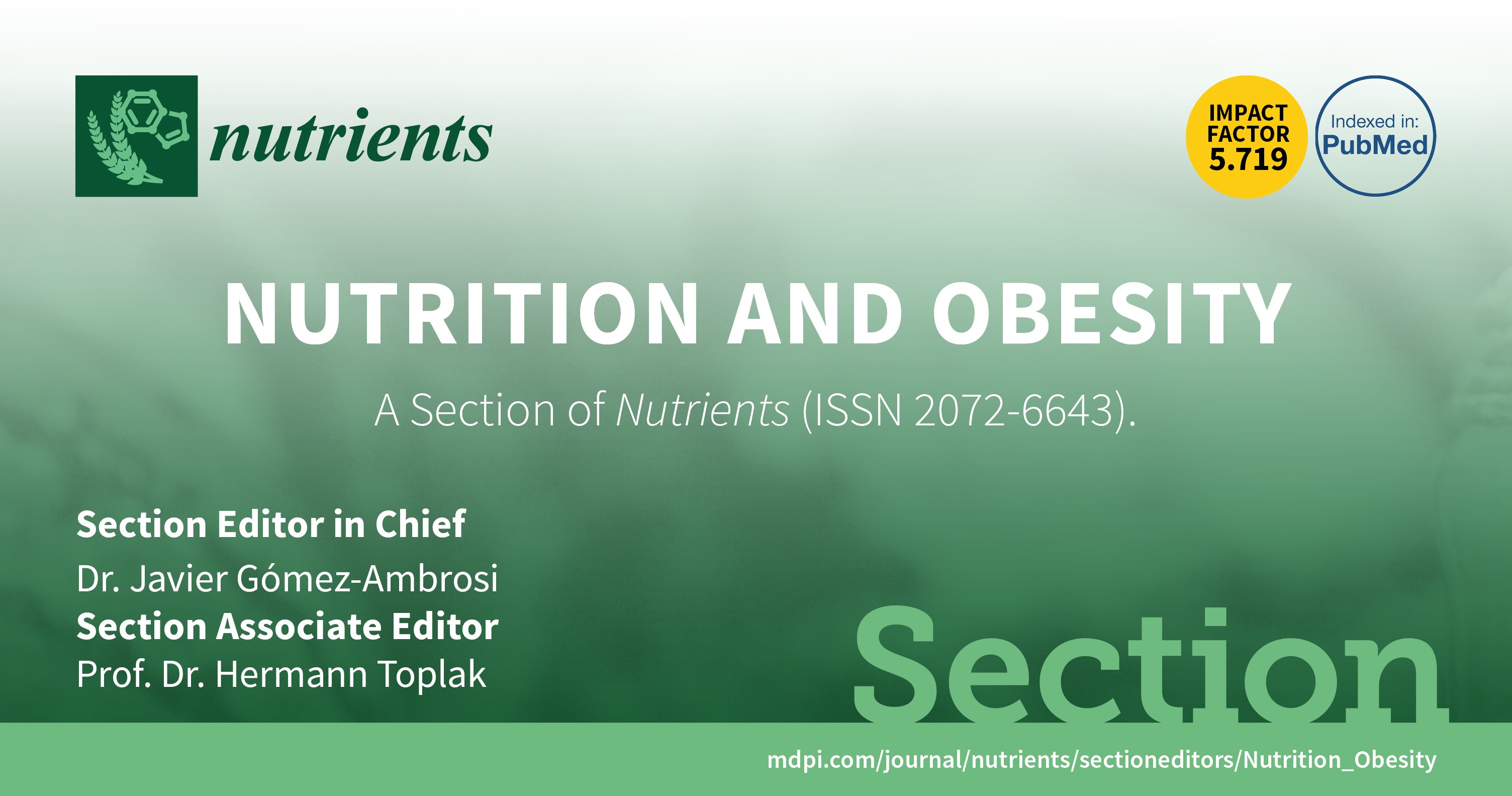
We are currently recruiting Editorial Board Members for the Section “Nutrition and Obesity” (https://www.mdpi.com/journal/nutrients/sections/Nutrition_Obesity). If you are interested in serving on the Editorial Board or have potential candidates to recommend, please do not hesitate to contact the Section Managing Editor Ms. Elisa Yuan (elisa.yuan@mdpi.com).
Nutrients (ISSN: 2072-6643) is an international peer-reviewed open access journal advancing knowledge in the field of human nutrition. Nutrients is fully covered by the leading indexing services, including PubMed/MEDLINE, Science Citation Index Expanded (Web of Science), Scopus/SciVerse, and Google Scholar. Full-text articles are also available in PubMed Central. The newly released Impact Factor of Nutrients is 5.719.
The Section welcomes original research articles describing basic, clinical, and applied studies representing novel and significant advances in all areas relevant to obesity and related disorders, as well as reviews. The areas of research covered by this Section relate to all aspects of obesity diagnosis, pathophysiology, and treatment.
As an Editorial Board Member, you will have the following responsibilities:
- Attending board meetings to advise on journal development strategy;
- Setting up at least one Special Issue on a topic related to your research interests (or supervising Special Issues related to your research field);
- Pre-screening and making decisions on new submissions in your research interests (about one per month or less);
- Inviting and contributing high-quality papers;
- Helping to promote the journal among your peers or at conferences.
As an Editorial Board Member, you will have the following privileges:
- A certificate of recognition as an Editorial Board Member of Nutrients;
- Publication of one paper per year free of charge in Nutrients;
- The opportunity to invite senior authors to submit high-quality papers to be published in Nutrients with certain discounts;
- Travel grants for attending references and helping to promote the journal.
For further information, please do not hesitate to contact the Editorial Office (nutrients@mdpi.com).
21 March 2022
Nutrients | New Section “Hydration” Established
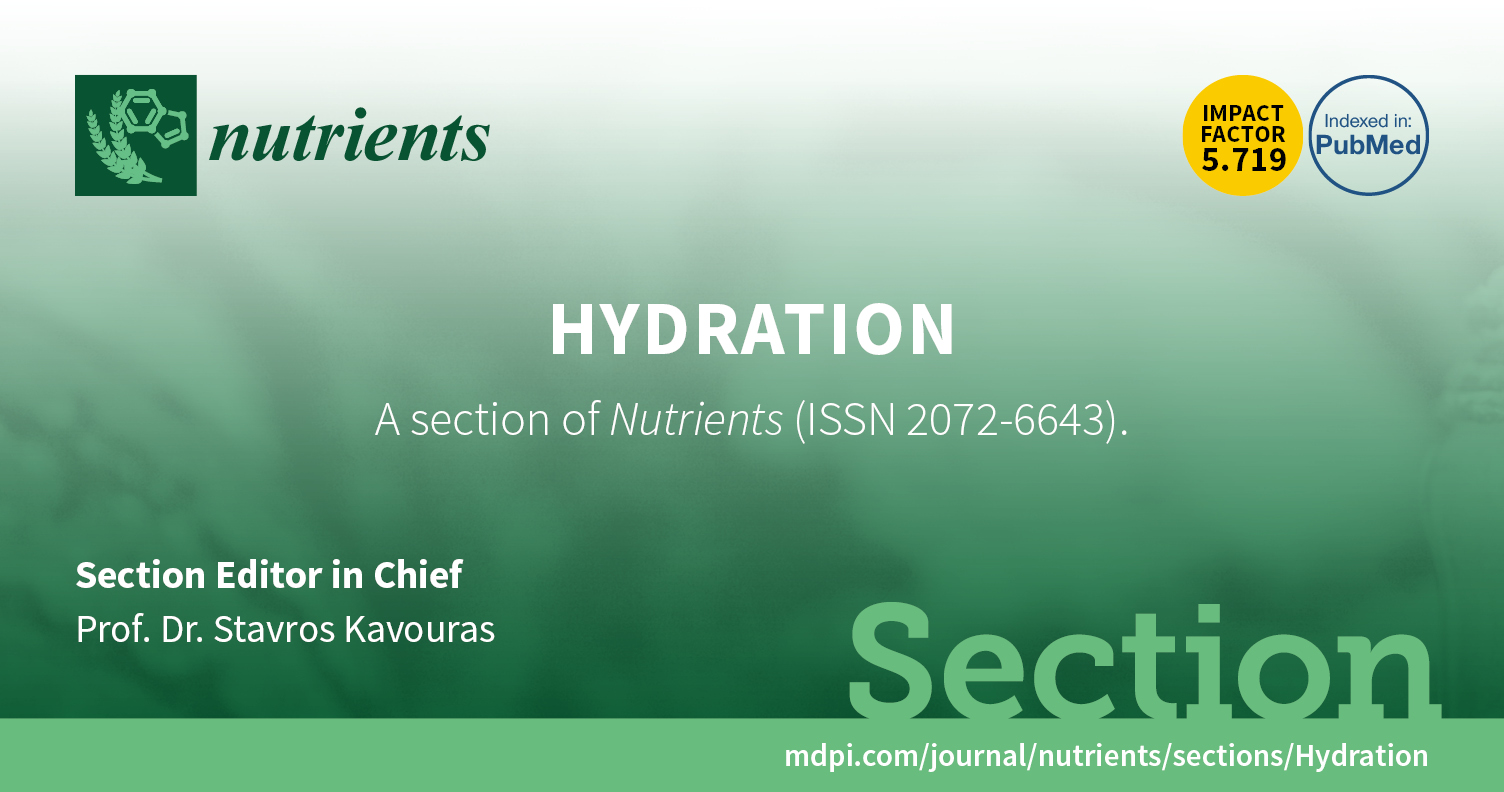
We are pleased to announce the new Section “Hydration” (https://www.mdpi.com/journal/nutrients/sections/Hydration) in the journal Nutrients (ISSN: 2072-6643). Prof. Dr. Stavros Kavouras is serving as the Section Editor-in-Chief.
Hydration has been one of the least studied topics in nutritional sciences. The present Section entitled “Hydration” is the first in the scientific literature, and it aims to publish papers on the impact of water intake and hydration on health and performance. Contributions should provide new knowledge and novel insights from various cross-sectional, feeding, observational, and other studies across the lifespan in humans and experimental animals. We encourage manuscripts that provide causality studies performed in large cohorts, multicenter studies, and international collaborations. Randomized clinical trials assessing the effect of water intake and its effectiveness in health promotion interventions will receive special attention.
Topics include but are not limited to:
- Hydration and obesity;
- Hydration and health;
- Hydration and chronic diseases;
- Cognition;
- Mood;
- Mental health;
- Hydration in children;
- Hydration in older adults;
- Hydration during pregnancy and lactation;
- Hydration assessment techniques;
- Hormonal regulation of total body water;
- Thirst regulation;
- Hydration and exercise performance;
- Electrolyte balance;
- Exercise-associated hyponatremia;
- Hyperhydration;
- Water intake across the globe;
- Fluid intake patterns;
- Sports drinks;
- Functional drinks;
- Dehydration;
- Water intake assessment;
- Wearable technology on hydration;
- Thermoregulation;
- Oxidative stress;
- Aging;
- Recovery.
For more detailed information, please see here: https://www.mdpi.com/journal/nutrients/sections/Hydration.
17 March 2022
Nutrients | Recruiting Editorial Board Members for Section “Prebiotics and Probiotics”

We are currently recruiting Editorial Board Members for the “Prebiotics and Probiotics” Section in Nutrients (https://www.mdpi.com/journal/nutrients/sections/Prebiotics_Probiotics). If you are interested in serving on the Editorial Board or would like to recommend a potential candidate for this position, please contact the Section Managing Editor, Ms. Alina Guo (alina.guo@mdpi.com).
Nutrients (ISSN 2072-6643) is an international, peer-reviewed, open access journal advancing knowledge in the field of human nutrition. Nutrients is indexed by leading indexing services, including PubMed/MEDLINE, Science Citation Index Expanded (Web of Science), Scopus/SciVerse and Google Scholar. Full-text articles are also available in PubMed Central. The newly released impact factor of Nutrients is 5.719.
As an Editorial Board Member, you will have the following responsibilities:
- Attending board meetings to contribute to discussions on journal development strategy;
- Organizing (or supervising) at least one Special Issue on a topic related to your research interests;
- Pre-screening and making decisions about new submissions relevant to your research interests (approximately one per month or fewer);
- Inviting and contributing high-quality papers;
- Helping to promote the journal among your peers or at conferences.
Our Editorial Board Members enjoy the following benefits:
- A certificate of recognition as an Editorial Board member of Nutrients;
- One paper every year may be published free of charge in Nutrients;
- Inviting senior authors to submit high-quality papers to be published in Nutrients with certain discounts;
- Members may apply for travel grants to attend conferences and help promote the journal.
If you are an active researcher in the field and are passionate about publishing cutting-edge research, please do not hesitate to contact the Section Managing Editor, Ms. Alina Guo (alina.guo@mdpi.com).
We look forward to hearing from you soon.
17 March 2022
Nutrients | Call for Special Issue Proposals for Section “Prebiotics and Probiotics”
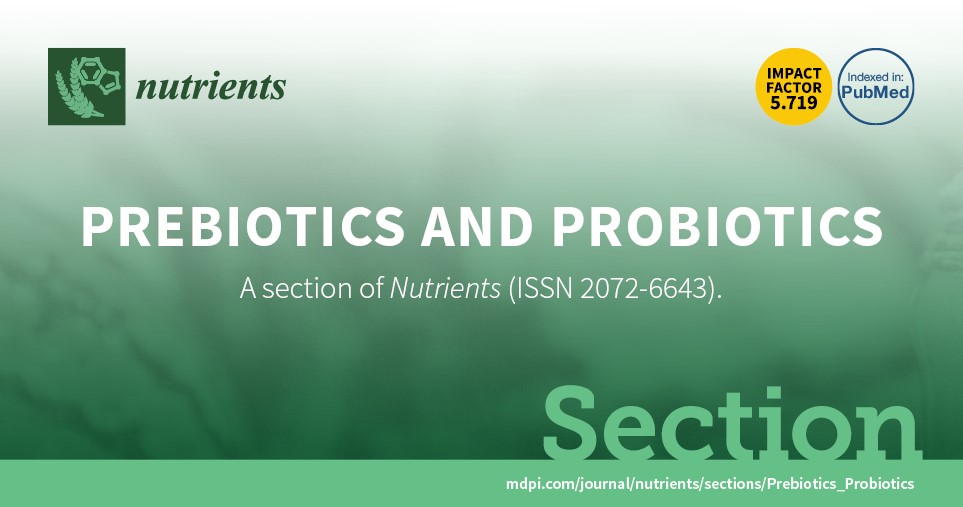
We are now accepting Special Issue proposals for the Section “Prebiotics and Probiotics” (https://www.mdpi.com/journal/nutrients/sections/Prebiotics_Probiotics) of the journal Nutrients (ISSN: 2072-6643). If you are an active researcher in the field and are passionate about publishing cutting-edge research, please do not hesitate to contact the Section Managing Editor Ms. Alina Guo (alina.guo@mdpi.com).
Nutrients is an international peer-reviewed open access journal advancing knowledge in the field of human nutrition. Nutrients is fully covered by the leading indexing services, including PubMed/MEDLINE, Science Citation Index Expanded (Web of Science), Scopus/SciVerse, and Google Scholar. Full-text articles are also available in PubMed Central. The Impact Factor of Nutrients is 5.719.
The Section “Prebiotics and Probiotics” has the following topics for your consideration:
- Gut microbiota: more than the old, dull “microflora”;
- Prebiotic and probiotics: the traditional, the newcomers, the future ones;
- Pre-, pro-, and postbiotics as “influencers” of the gut microbiota;
- Have prebiotics failed to achieve their potential?;
- Probiotics not simply for gut health, but beyond:
- Gut–brain axis implications in neurology and psychiatry;
- Chronic inflammation;
- Autoimmune disorders;
- Arthritis;
- Obesity;
- Skin disorders;
- Food allergies;
- Are we ready for the new concept of postbiotics?
The following information should be provided in a proposal:
- A 150–200-word summary that clearly states the significance, novelty, technical advancement, and adherence to the scope of the journal of the proposed topic;
- A list of 5–10 keywords relating to the topic;
- A proposed submission deadline (a Special Issue will usually be open for submissions for 6–8 months);
- A list of at least 20 potential contributors, or a list of 8 planned papers.
As Guest Editor, you would be responsible for:
- Inviting your peers to submit papers to be published in your Special Issue;
- Checking the suitability of abstracts/manuscripts submitted to the Special Issue;
- Making pre-check decisions on whether a manuscript can be sent out for peer-review;
- Making decisions on whether a manuscript can be accepted based on the reports we collect;
- Promoting the Special Issue and increasing its visibility at related academic conferences.
As Guest Editor, you would have the following privileges:
- A certificate of recognition as a Guest Editor of Nutrients;
- The ability to publish one paper free of charge in your Special Issue;
- The ability to invite senior authors to submit high-quality papers to be published in your Special Issue with certain discounts;
- Contingent on the publication of ten or more papers in this Special Issue, a hard copy of a Special Issue book published by MDPI.
Please do not hesitate to contact Section Managing Editor, Ms. Alina Guo (alina.guo@mdpi.com), for further information. We look forward to receiving your proposals.
28 February 2022
Nutrients | Recruiting Editorial Board Members for New Section “Sports Nutrition”
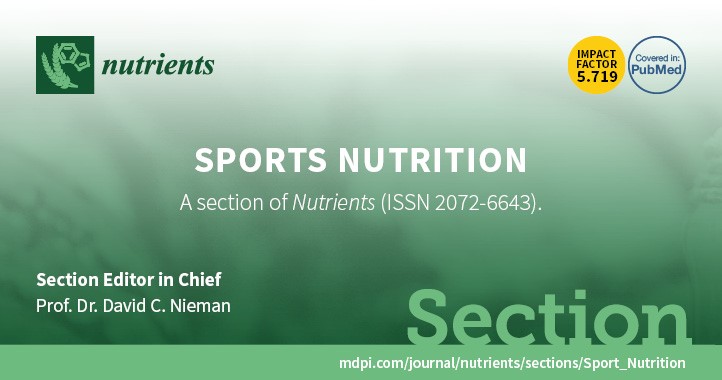
We are currently recruiting Editorial Board Members for the new Section “Sports Nutrition” (https://www.mdpi.com/journal/nutrients/sections/Sport_Nutrition), which will be published in the journal Nutrients (ISSN: 2072-6643). If you are interested in serving on the Editorial Board, or can recommend potential candidates, please contact the Section Managing Editor Ms. Amy Xie (amy.xie@mdpi.com).
Those who have applied for an Editorial Board position may nominate a specific section in which they feel their expertise lie, or they may nominate themselves as an Editorial Board Member for the entire journal.
Nutrients is an international, peer-reviewed, open access journal containing research pertaining to human nutrition, with the aim of advancing the knowledge in this area. Nutrients is fully covered by the leading indexing services, including PubMed/MEDLINE, Science Citation Index Expanded (Web of Science), Scopus/SciVerse, and Google Scholar. Full-text articles are also available in PubMed Central. The newly released impact factor of Nutrients is 5.719.
As an Editorial Board Member, you will have the following responsibilities:
- Attending board meetings to advise on journal development strategies;
- Setting up at least one Special Issue on a topic related to your research interests (or supervising Special Issues related to your research field);
- Pre-screening and making decisions on new submissions based on your research interests (approximately one per month, or fewer);
- Inviting and contributing high-quality papers to the journal;
- Helping to promote the journal among your peers or at conferences.
As an Editorial Board Member, you would have the following privileges:
- A certificate in recognition of your role as an Editorial Board Member of Nutrients;
- Publishing one paper, free of charge, per year in Nutrients;
- Inviting senior authors to submit high-quality papers to be published in Nutrients with certain discounts;
- Applying for travel grants if you attend conferences and aid in promoting the journal.
If you are an active researcher in the field, and are passionate about publishing cutting-edge research, please do not hesitate to contact the Section Managing Editor Ms. Amy Xie (amy.xie@mdpi.com).
We look forward to hearing from you soon.
Nutrients Editorial Office
21 February 2022
Nutrients | Recruiting Editorial Board Members for Section “Micronutrients and Human Health”

We are currently recruiting Editorial Board Members for the Section, titled “Micronutrients and Human Health” (https://www.mdpi.com/journal/nutrients/sections/Micronutrients_Human_Health). If you are interested in serving on the Editorial Board or have potential candidates to recommend, please do not hesitate to contact the Section Managing Editor, Ms. Susan Yu (susan.yu@mdpi.com).
Applicants for Editorial Board positions may apply for a specific section relating to their expertise, or may apply for the role of an Editorial Board Member for the entire journal.
Nutrients (ISSN 2072-6643) is an international, peer-reviewed, open access journal advancing knowledge in the field of Human Nutrition. Nutrients is fully covered by the leading indexing services, including PubMed/MEDLINE, Science Citation Index Expanded (Web of Science), Scopus/SciVerse, and Google Scholar. Full-text articles are also available in PubMed Central. The newly released impact factor of Nutrients is 5.719.
As an Editorial Board Member, you will have the following responsibilities:
- Attending board meetings to advise on journal development strategy;
- Setting up at least one Special Issue on a topic related to your research interests (or supervising Special Issues related to your research field);
- Pre-screening and making decisions on new submissions in your research interests (about one per month or fewer);
- Inviting and contributing high-quality papers;
- Helping to promote the journal among your peers or at conferences.
As an Editorial Board Member, you will:
- Receive a certificate of recognition as an Editorial Board Member of Nutrients;
- Be able to publish one paper free of charge per year in Nutrients;
- Be able to invite senior authors to submit high-quality papers to be published in Nutrients with certain discounts;
- Be able to apply for travel grants if you attend some conferences and help promote the journal.
For further information, please do not hesitate to contact the Editorial Office (nutrients@mdpi.com).
21 February 2022
Nutrients | Call for Special Issue Proposals for Section “Micronutrients and Human Health”
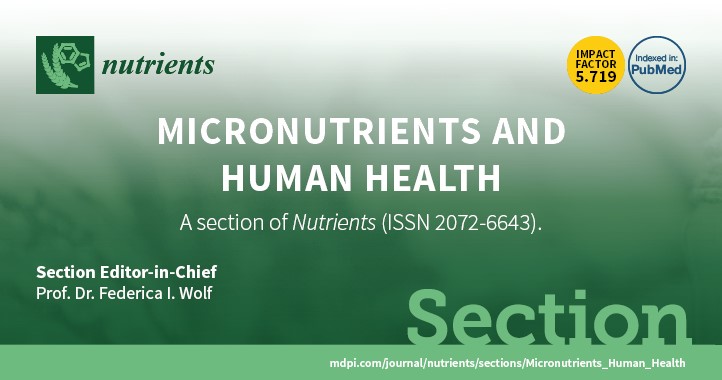
We are now accepting Special Issue proposals for the new Section “Micronutrients and Human Health” (https://www.mdpi.com/journal/nutrients/sections/Micronutrients_Human_Health) of the journal Nutrients (ISSN: 2072-6643). If you are an active researcher in the field and are passionate about publishing cutting-edge research, please do not hesitate to contact the Section Managing Editor Ms. Susan Yu (susan.yu@mdpi.com).
Micronutrients are essential components of diet. They are typically divided into four groups: water-soluble vitamins, fat-soluble vitamins, macrominerals, and microminerals or trace elements. A lack or imbalance of these components can impact human health at different levels. Awareness of how diet can affect human health is increasing, but more research is needed to understand how dietary components interact with each other and how to balance these elements in different situations.
We encourage the submission of manuscripts that provide novel and mechanistic insights on the role of micronutrients either in human health, in specific circumstances (e.g., gestation, infancy, senescence), or during pathological processes. Relevant epidemiological data and research focusing on animal models and on appropriate “in vitro” approaches are also welcome.
Nutrients is an international peer-reviewed open access journal advancing knowledge in the field of human nutrition. Nutrients is fully covered by the leading indexing services, including PubMed/MEDLINE, Science Citation Index Expanded (Web of Science), Scopus/SciVerse, and Google Scholar. Full-text articles are also available in PubMed Central. The Impact Factor of Nutrients is 5.719.
The following information should be provided in a proposal:
- A 150–200-word summary that clearly states the significance, novelty, technical advancement, and adherence to the scope of the journal of the proposed topic;
- A list of 5–10 keywords relating to the topic;
- A proposed submission deadline (a Special Issue will usually be open for submissions for 6–8 months);
- A list of at least 20 potential contributors, or a list of 8 planned papers.
As a Guest Editor, you would be responsible for:
- Inviting your peers to submit papers to be published in your Special Issue;
- Checking the suitability of abstracts/manuscripts submitted to the Special Issue;
- Making pre-check decisions on whether a manuscript can be sent out for peer-review;
- Making decisions on whether a manuscript can be accepted based on the reports we collect;
- Promoting the Special Issue and increasing its visibility at related academic conferences.
As a Guest Editor, you would have the following privileges:
- A certificate of recognition as a Guest Editor of Nutrients;
- Publishing one paper free of charge in your Special Issue;
- Inviting senior authors to submit high-quality papers to be published in your Special Issue with certain discounts;
- If ten or more papers are published in this Special Issue, we can make a Special Issue book and send a hard copy to each Guest Editor.
For further information, please do not hesitate to contact the Editorial Office (nutrients@mdpi.com).
21 February 2022
Nutrients | Recruiting Editorial Board Members for New Section “Protein”
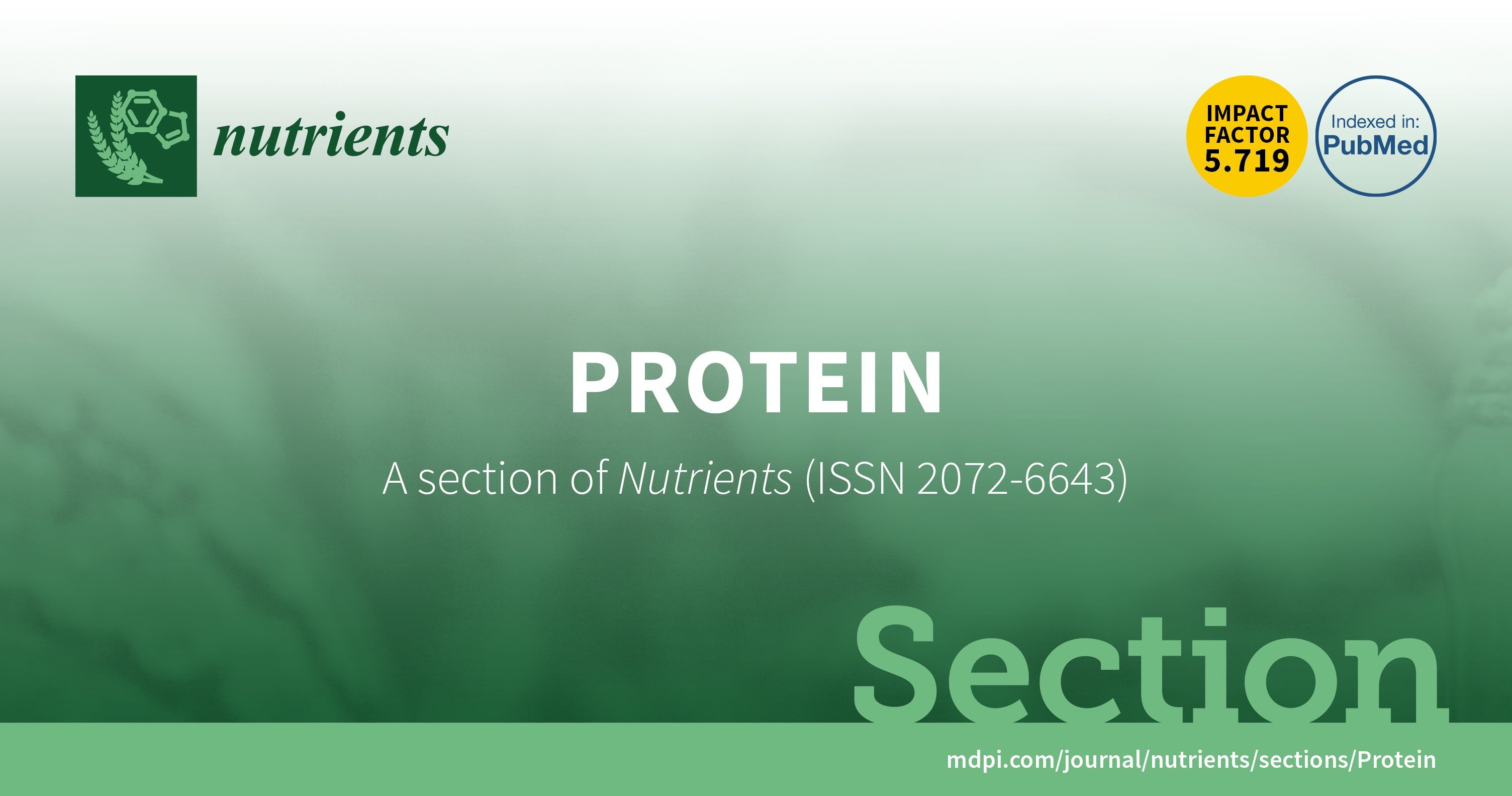
We are currently recruiting Editorial Board Members for the new the Section, titled “Protein” (https://www.mdpi.com/journal/nutrients/sections/Protein). If you are interested in serving on the Editorial Board or have potential candidates to recommend, please do not hesitate to contact the Section Managing Editor, Ms. Susan Yu (susan.yu@mdpi.com).
Applicants for the Editorial Board positions may apply for a specific section relating to their expertise, or may apply for the role of an Editorial Board Member for the entire journal.
Nutrients (ISSN 2072-6643) is an international, peer-reviewed, open access journal, advancing knowledge in the field of Human Nutrition. Nutrients is fully covered by the leading indexing services, including PubMed/MEDLINE, Science Citation Index Expanded (Web of Science), Scopus/SciVerse, and Google Scholar. Full-text articles are also available in PubMed Central. The newly released impact factor of Nutrients is 5.719.
As an Editorial Board Member, you will have the following responsibilities:
- Attending board meetings to advise on journal development strategy;
- Setting up at least one Special Issue on a topic related to your research interests (or supervising Special Issues related to your research field);
- Pre-screening and making decisions on new submissions in your research interests (about one per month or fewer);
- Inviting and contributing high-quality papers;
- Helping to promote the journal among your peers or at conferences.
As an Editorial Board Member, you will:
- Receive a certificate of recognition as an Editorial Board Member of Nutrients;
- Be able to publish one paper free of charge per year in Nutrients;
- Be able to invite senior authors to submit high-quality papers to be published in Nutrients with certain discounts;
- Be able to apply for travel grants if you attend some conferences and help promote the journal.
For further information, please do not hesitate to contact the Editorial Office (nutrients@mdpi.com).
21 February 2022
Nutrients | Recruiting Editorial Board Members for New Section “Nutrition in Women”
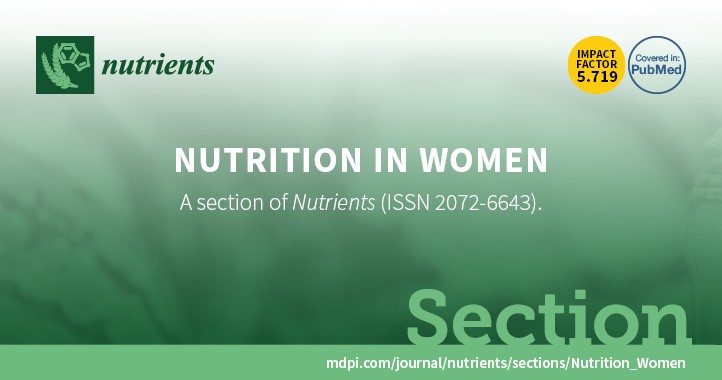
We are currently recruiting Editorial Board Members for the new Section “Nutrition in Women” (https://www.mdpi.com/journal/nutrients/sections/Nutrition_Women). If you are interested in serving on the Editorial Board or have potential candidates to recommend, please contact the Section Managing Editor, Ms. Esther Gou (esther.gou@mdpi.com).
Nutrients (ISSN 2072-6643) is an international, peer-reviewed, open access journal advancing knowledge in the field of Human Nutrition. Nutrients is fully covered by the leading indexing services, including PubMed/MEDLINE, Science Citation Index Expanded (Web of Science), Scopus/SciVerse, and Google Scholar. Full-text articles are also available in PubMed Central. The newly released Impact Factor of Nutrients is 5.719.
The Section welcomes researches on nutrition, dietary, and food approaches to understand the impact of nutrition on women’s health and disease across the lifespan.
As an Editorial Board Member, you will have the following responsibilities:
- Attending Board Meetings to advise on journal development strategy;
- Setting up at least one Special Issue on a topic related to your research interests (or supervising Special Issues related to your research field);
- Pre-screening and making decisions on new submissions in your research interests (about one per month or fewer);
- Inviting and contributing high-quality papers;
- Helping to promote the journal among your peers or at conferences.
As an Editorial Board Member, you will:
- Be given a certificate of recognition as an Editorial Board Member of Nutrients;
- Be able to publish one paper free of charge per year in Nutrients;
- Be able to invite senior authors to submit high-quality papers to be published in Nutrients with certain discounts;
- Be able to apply for travel grants if you attend some conferences and help promote the journal.
For further information, please do not hesitate to contact the Editorial Office (nutrients@mdpi.com).
14 February 2022
Nutrients | Recruiting Editorial Board Members for New Section “Geriatric Nutrition”
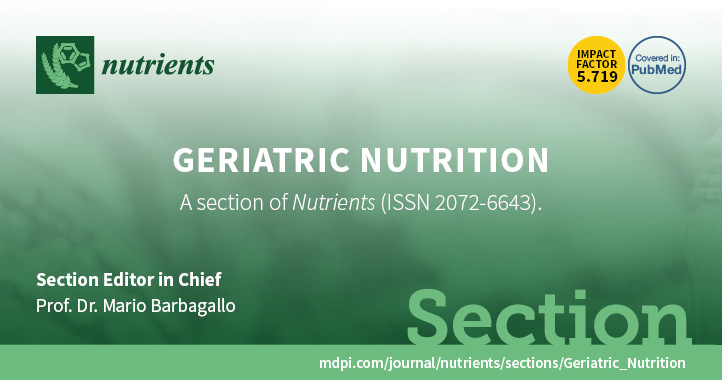
We are currently recruiting Editorial Board Members for the new Section “Geriatric Nutrition” (https://www.mdpi.com/journal/nutrients/sections/Geriatric_Nutrition), to be published in the journal Nutrients (ISSN: 2072-6643). If you are interested in serving on the Editorial Board or have potential candidates to recommend, please reach out to us.
Applicants for the Editorial Board positions may nominate themselves for a specific section in which they feel their expertise lie, or may nominate themselves as an Editorial Board Member for the entire journal.
Nutrients is an international, peer-reviewed, open access journal containing research in the field of human nutrition, advancing our knowledge in this area. Nutrients is fully covered by the leading indexing services, including PubMed/MEDLINE, Science Citation Index Expanded (Web of Science), Scopus/SciVerse, and Google Scholar. Full-text articles are also available in PubMed Central. The newly released impact factor of Nutrients is 5.719.
As an Editorial Board Member, you will have the following responsibilities:
- Pre-screening submissions and making decisions on whether they should be rejected or accepted for processing;
- Editing a Special Issue on a topic related to your research;
- Recommending hot topics and suggesting potential Guest Editors;
- Publishing/inviting/recommending one paper, free of charge, per year;
- Identifying appropriate conferences for the promotion of Nutrients;
- Promoting the journal at conferences and on social media.
If you are an active researcher in the field and are passionate about publishing cutting-edge research, please do not hesitate to contact the Section Managing Editor, Ms. Amy Xie (amy.xie@mdpi.com).
We look forward to hearing from you soon.
Nutrients Editorial Office
14 February 2022
Nutrients | Call for Special Issue Proposals for New Section “Geriatric Nutrition”

We are now accepting Special Issue proposals for the new Section “Geriatric Nutrition” (https://www.mdpi.com/journal/nutrients/sections/Geriatric_Nutrition) of the journal Nutrients (ISSN: 2072-6643). If you are an active researcher in the field and are passionate about publishing cutting-edge research, please do not hesitate to contact the Section Managing Editor, Ms. Amy Xie (amy.xie@mdpi.com).
Nutrition plays a crucial role in health throughout the life span and can meaningfully contribute to the health status later in life. There is a growing scientific and clinical interest in the role of nutritional factors as determinants of the aging process, with them being the key contributor to longevity and the prevention and treatment of the chronic diseases most frequently observed in old age.
The Section “Geriatric Nutrition” aims to publish high-quality scientific contributions providing novel insights into the impact of nutrition on the aging process, longevity, and on all aspects of the physical, mental, and emotional health, social issues, and wellbeing of human aging. The Section “Geriatric Nutrition” also includes high-quality scientific contributions on in vitro and animal studies investigating the link between nutrition and aging, as well as age-associated diseases.
Nutrients is an international peer-reviewed open access journal advancing knowledge in the field of human nutrition. Nutrients is fully covered by the leading indexing services, including PubMed/MEDLINE, Science Citation Index Expanded (Web of Science), Scopus/SciVerse, and Google Scholar. Full-text articles are also available in PubMed Central. The newly released Impact Factor of Nutrients is 5.719.
The following information should be provided in a proposal:
- A 150–200-word summary that clearly states the significance, novelty, technical advancement, and adherence to the scope of the Journal of the proposed topic;
- A list of 5–10 keywords related to the topic;
- A proposed submission deadline (a Special Issue will usually be open for submissions for 6–8 months);
- A list of at least 20 potential contributors, or a list of 8 planned papers.
Please do not hesitate to contact the Editorial Office (nutrients@mdpi.com) or Section Managing Editor, Ms. Amy Xie (amy.xie@mdpi.com), for further information. We look forward to receiving your proposals.
Nutrients Editorial Office
10 February 2022
Nutrients | Recruiting Editorial Board Members for New Section “Nutrition and Diabetes”
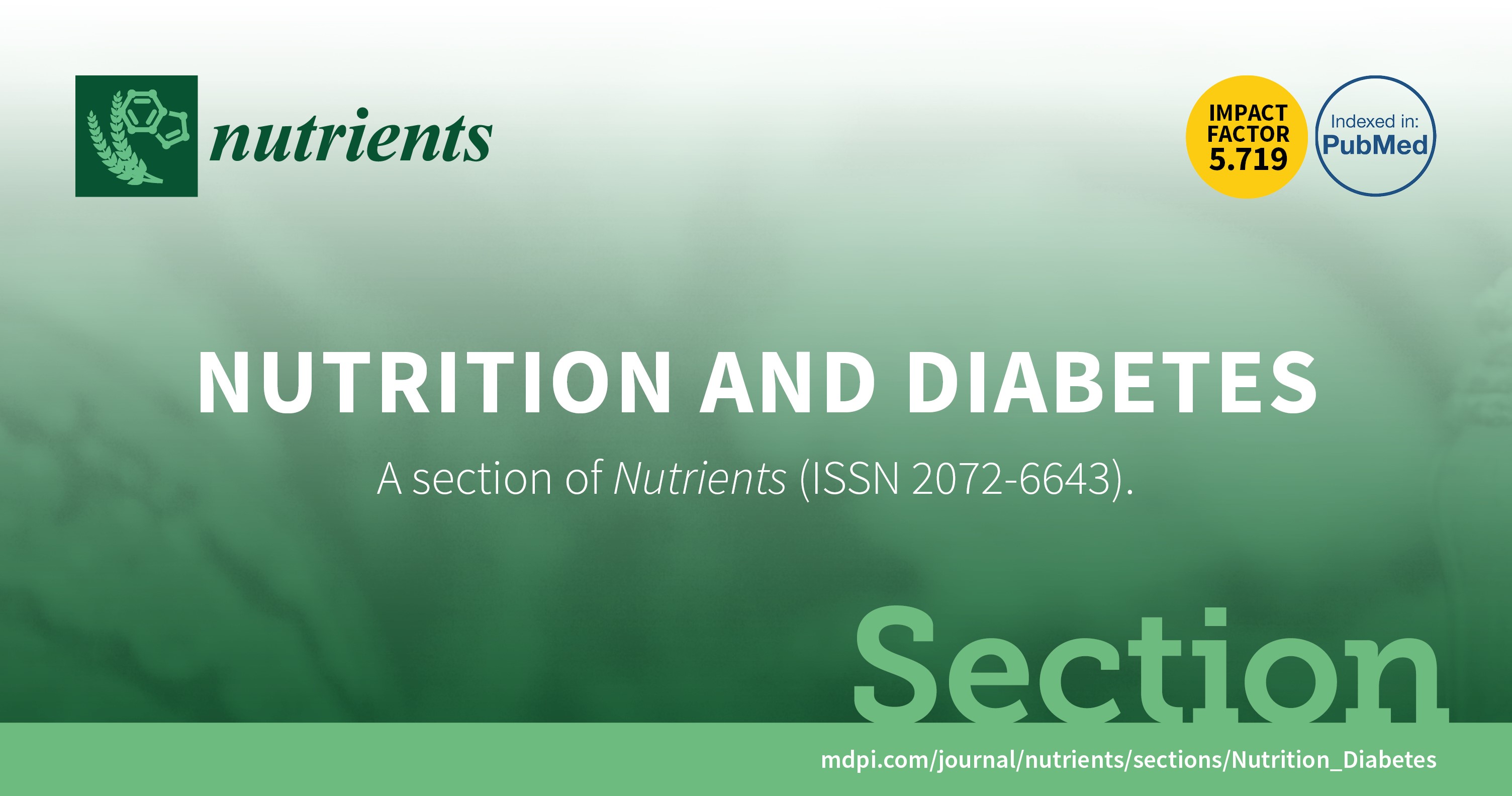
We are currently recruiting Editorial Board Members for the new Section “Nutrition and Diabetes” (https://www.mdpi.com/journal/nutrients/sections/Nutrition_Diabetes). If you are interested in serving on the Editorial Board or have potential candidates to recommend, please do not hesitate to contact the Section Managing Editor Ms. Elisa Yuan (elisa.yuan@mdpi.com).
Nutrients (ISSN 2072-6643) is an international, peer-reviewed, open access journal advancing knowledge in the field of Human Nutrition. Nutrients is fully covered by the leading indexing services, including PubMed/MEDLINE, Science Citation Index Expanded (Web of Science), Scopus/SciVerse and Google Scholar. Full-text articles are also available in PubMed Central. The newly released Impact Factor of Nutrients is 5.719.
The Section welcomes original research articles describing basic, clinical, and applied studies representing novel and significant advances in all areas relevant to Type 1 and Type 2 diabetes and related disorders, as well as reviews.
As an Editorial Board Member, you will have the following responsibilities:
- Attending Board Meetings to advise on journal development strategy;
- Setting up at least one Special Issue on a topic related to your research interests (or supervising Special Issues related to your research field);
- Pre-screening and making decisions on new submissions in your research interests (about one per month or fewer);
- Inviting and contributing high-quality papers;
- Helping to promote the journal among your peers or at conferences.
As an Editorial Board Member, you would have the following privileges:
- A certificate of recognition as an Editorial Board Member of Nutrients;
- Publishing one paper free of charge per year in Nutrients;
- Inviting senior authors to submit high-quality papers to be published in Nutrients with certain discounts;
- Applying for travel grants if you attend some conferences and help promote the journal.
For further information, please do not hesitate to contact the Editorial Office (nutrients@mdpi.com).
10 February 2022
Nutrients | Call for Special Issue Proposals for New Section “Nutrition and Diabetes”
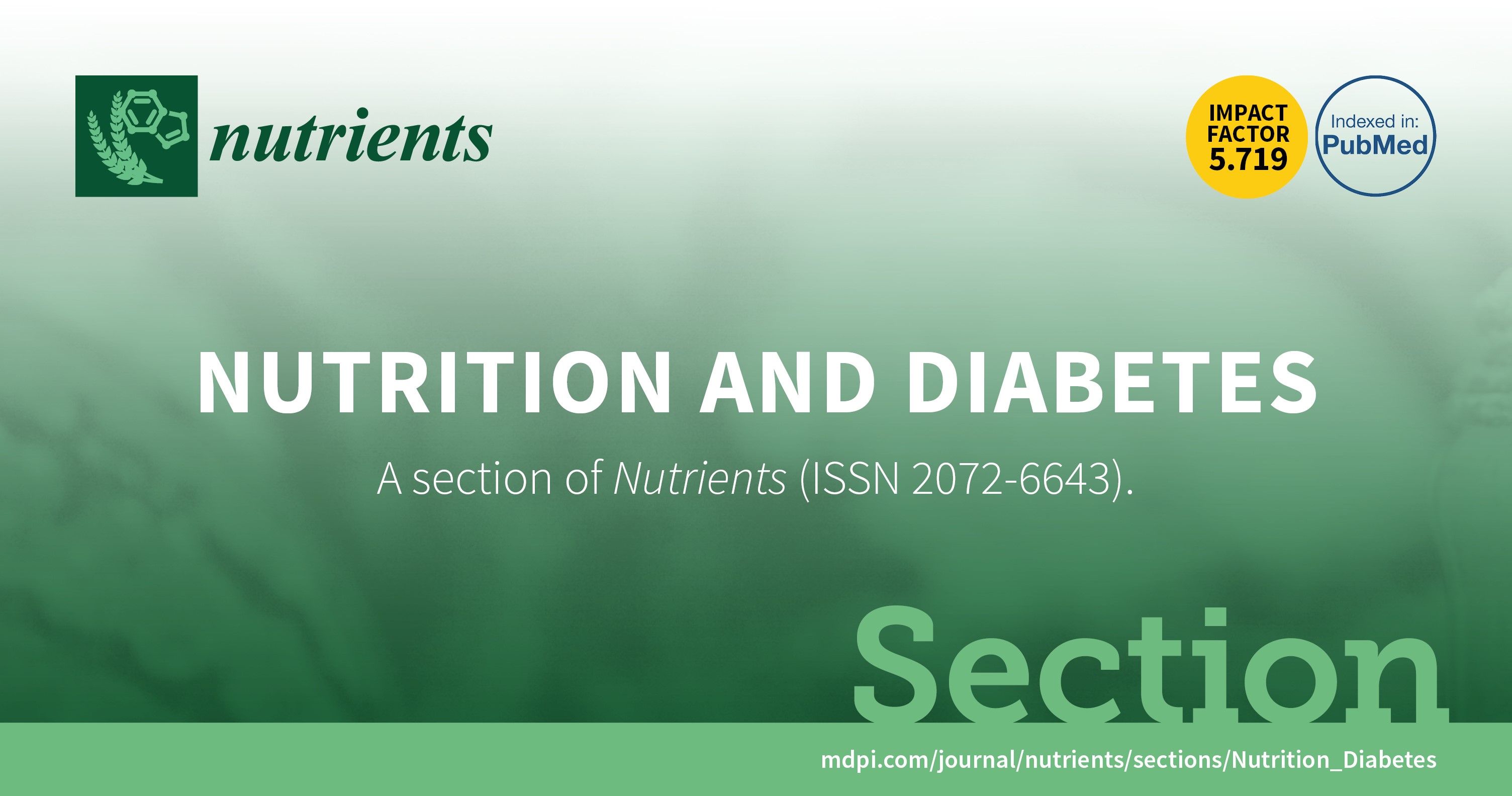
We are now recruiting Special Issue proposals for the new Section “Nutrition and Diabetes” (https://www.mdpi.com/journal/nutrients/sections/Nutrition_Diabetes). If you are an active researcher in the field and are passionate about publishing cutting-edge research, please do not hesitate to contact the Section Managing Editor Ms. Elisa Yuan (elisa.yuan@mdpi.com).
In recent decades, diabetes incidence has grown from around 3.5% of the adult population in Europe to around 10%. Underlying fat storage (adiposity) has become the most prevalent metabolic disorder worldwide. Taken together with hyperlipidemia and hypertension, they are the major risk factors for cardiovascular disease, non-alcoholic fatty liver disease, cancer, and numerous other complications. In recent years, our knowledge of diabetes and adiposity, often called “diabesity”, has greatly improved, but more research is needed to better understand the mechanisms underlying the development of this metabolic condition and its diagnosis and pathophysiology, as well as optimize its management.
We welcome original research articles describing basic, clinical, and applied studies representing novel and significant advances in all areas relevant to Type 1 and Type 2 diabetes and related disorders, as well as reviews. The areas of research covered by this Section relate to all aspects of diabetes diagnosis, pathophysiology, and treatment.
The following information should be provided in a proposal:
- A 150–200-word summary that clearly states the significance, novelty, technical advancement, and adherence to the scope of the journal of the proposed topic;
- A list of 5–10 keywords relating to the topic;
- A proposed submission deadline (a Special Issue will usually be open for submissions for 6–8 months);
- A list of at least 20 potential contributors, or a list of 8 planned papers.
As a Guest Editor, you would be responsible for:
- Inviting your peers to submit papers to be published in your Special Issue;
- Checking the suitability of abstracts/manuscripts submitted to the Special Issue;
- Making pre-check decisions on whether a manuscript can be sent out for peer-review;
- Making decisions on whether a manuscript can be accepted based on the reports we collect;
- Promoting the Special Issue and increasing its visibility at related academic conferences.
As a Guest Editor, you would have the following privileges:
- A certificate of recognition as a Guest Editor of Nutrients;
- Publishing one paper free of charge in your Special Issue;
- Inviting senior authors to submit high-quality papers to be published in your Special Issue with certain discounts;
- If ten or more papers are published in this Special Issue, we can make a Special Issue book and send a hard copy to each Guest Editor.
For further information, please do not hesitate to contact the Editorial Office (nutrients@mdpi.com).
10 February 2022
Nutrients | Special Issue “Advances in Nutrition: Opportunities and Challenges in 2022”—Open for Submission
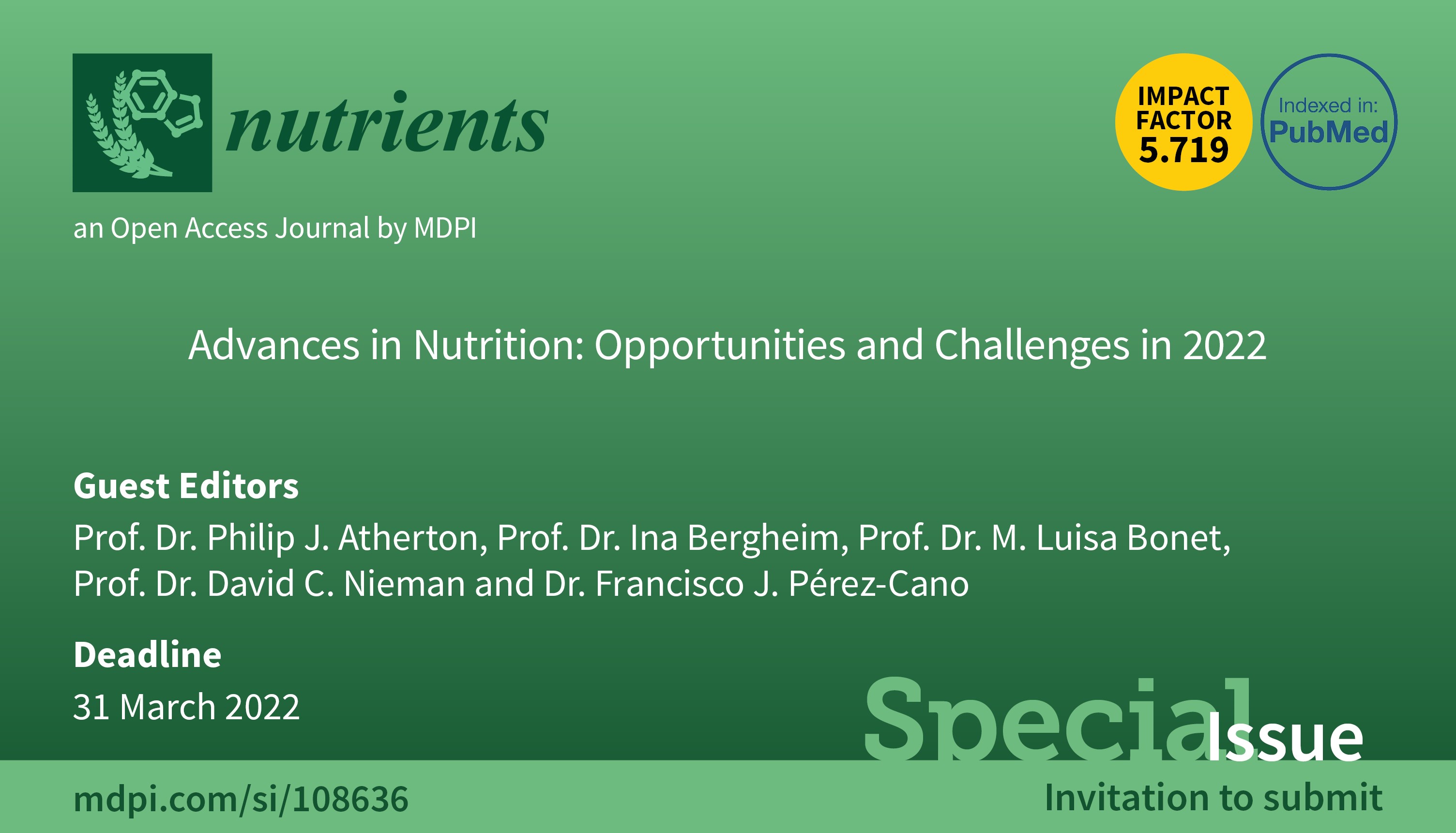
We are pleased to share with you the good news that Nutrients has announced a Special Issue entitled “Advances in Nutrition: Opportunities and Challenges in 2022”. Prof. Dr. Philip J. Atherton, Prof. Dr. Ina Bergheim, Prof. Dr. M. Luisa Bonet, Prof. Dr. David C. Nieman and Dr. Francisco J. Pérez-Cano are serving as the Guest Editors. The submission deadline is 31 March 2022.
This Special Issue will focus on the aspects of nutrition and nutritional sciences that are already at the center of current concerns, and which may help humans to face the social and health scenarios that are envisaged in the years to come.
Many aspects of how food and diet can improve individual health, performance and wellbeing remain to be discovered. The exact composition and nutrient availability of diets (food types, preparation and combinations, etc.), as well as the characteristics of individuals (genetics, microbiome, physiological or pathophysiological status, age, etc.) and the environment that surrounds them should be known.
Thus, this Special Issue will consider original articles, commentaries, and review articles that focus on the following potential topics (but not limited to these):
- Sustainable protein sources and impacts of alternative protein sources;
- Food, dietary pattern, and health;
- Food, dietary pattern, and cognitive function;
- Application of post-genomic technologies to the innovative investigation of nutritional questions and mechanisms of nutrient action, including biomarkers of nutrition and health and precision nutrition;
- Diet and exercise interactions at young and old age and their impact on health and performance;
- Impact and mechanisms underlying the relationship between nutrition, immunity, and infection.
This Special Issue is the first issue of Nutrients’ New Year Special Issue Series. The series reflects on the achievements, scientific progress, and “hot topics” of the previous year in the journal. Submissions of articles whose lead authors are Board Members are highly encouraged. However, we welcome articles from all authors.
For more information on this Special Issue and submission guidelines, please visit the following page: https://www.mdpi.com/journal/nutrients/special_issues/Advances_in_Nutrition.
If you have any questions, please do not hesitate to contact the Editorial Office (nutrients@mdpi.com).
24 January 2022
Nutrients | Call for Special Issue Proposals for Section “Nutritional Immunology”
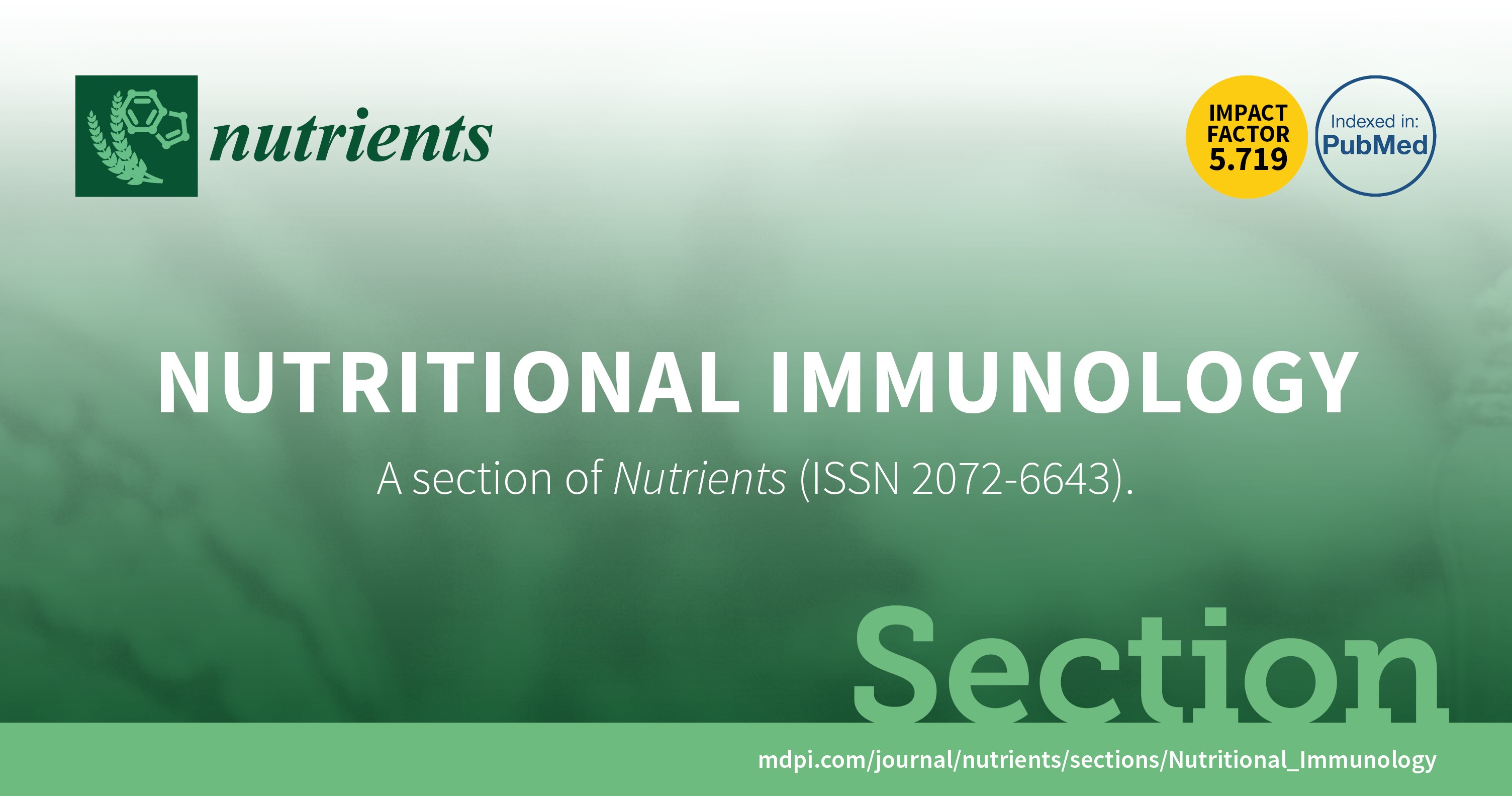
We are currently inviting Special Issue proposals for the Section "Nutritional Immunology". If you are an active researcher in the relevant field and are passionate about cutting-edge research, please do not hesitate to contact the Section Managing Editor Ms. Aria Chen (aria.chen@mdpi.com).
Diet plays a role in almost every function in the body. Among other factors, diet is critical in maintaining optimal immune function. Extensive research has demonstrated the immunomodulatory properties of particular nutrients; however, in many cases, the mechanisms still remain unclear.
This Section invites authors to submit original research and review articles describing the impact and mechanisms underlying the relationship between nutrition and immunity. We are interested in articles describing this complex relationship in humans and also in animal models, either in health or during pathological processes, in which the dietary compounds may act by modulating immune response. Studies performed in appropriate in vitro approaches are also welcome. For further information, please do not hesitate to contact the Editorial Office (nutrients@mdpi.com).
We look forward to receiving your proposals.
13 January 2022
Nutrients | Call for Special Issue Proposals for Section “Nutrigenetics and Nutrigenomics”

The completion of the human genome sequencing project and the advances in high-throughput ‘omic’ technologies place nutrigenetics and nutrigenomics at the very core of the modern nutrition science. These achievements are enabling novel hypothesis- and nonhypothesis-driven approaches to study how an individual’s genome and other variable biological layers (epigenome, gut microbiome, health status, etc.) impact and modulate the relationship between nutrition and health and are themselves affected/programmed by nutritional conditions, particularly at early life stages. Current goals are to define the biomarkers of effect and exposure, biological targets, and mechanisms of action of dietary factors/patterns, both in health and disease states (particularly diet-related noncommunicable complex diseases), to translate this knowledge into personalized nutrition strategies for optimal health and disease prevention, and to advance our understanding of the impact of diet on systems biology.
This Section of Nutrients (ISSN: 2072-6643) aims to publish contributions on all aspects of nutrigenetics and nutrigenomics. We encourage the submission of manuscripts that provide novel and mechanistic insights and papers that report significant advances in the field.
Topics of interest include, but are not limited to: nutrigenetics; nutrigenomics; functional genomics; metabolomics; nutriomics; microbiota and microbiomics; epigenetics and epigenomics; gene–diet interactions; personalized nutrition; dietary patterns; metabolic programming; biomarkers; circulating RNAs; obesity; diabetes; cardiovascular disease; and cancer.
Nutrients is an international, peer-reviewed, open access journal advancing knowledge in the field of human nutrition. Nutrients is fully covered by the leading indexing services, including PubMed/MEDLINE, Science Citation Index Expanded (Web of Science), Scopus/SciVerse and Google Scholar. Full-text articles are also available in PubMed Central. The newly released Impact Factor of Nutrients is 5.719.
The following information should be provided in a proposal:
- A 150–200-word summary that clearly states the significance, novelty, technical advancement, and adherence to the scope of the journal of the proposed topic;
- A list of 5–10 keywords relating to the topic;
- A proposed submission deadline (a Special Issue will usually be open for submissions for 6–8 months);
- A list of at least 20 potential contributors, or a list of 8 planned papers.
As a Guest Editor, you would be responsible for:
- Inviting your peers to submit papers to be published in your Special Issue;
- Checking the suitability of abstracts/manuscripts submitted to the Special Issue;
- Making pre-check decisions on whether a manuscript can be sent out for peer review;
- Making decisions on whether a manuscript can be accepted based on the reports we collect;
- Promoting the Special Issue and increasing its visibility at related academic conferences.
As a Guest Editor, you would have the following privileges:
- A certificate of recognition as a Guest Editor of Nutrients;
- Publishing one paper free of charge in your Special Issue;
- Inviting senior authors to submit high-quality papers to be published in your Special Issue with certain discounts;
- If ten or more papers are published in this Special Issue, a Special Issue book can be made and a hard copy sent to each Guest Editor.
Please do not hesitate to contact the Editorial Office (nutrients@mdpi.com) for further information. We look forward to receiving your proposals.
13 January 2022
Nutrients | Call for Special Issue Proposals for New Section “Carbohydrates”
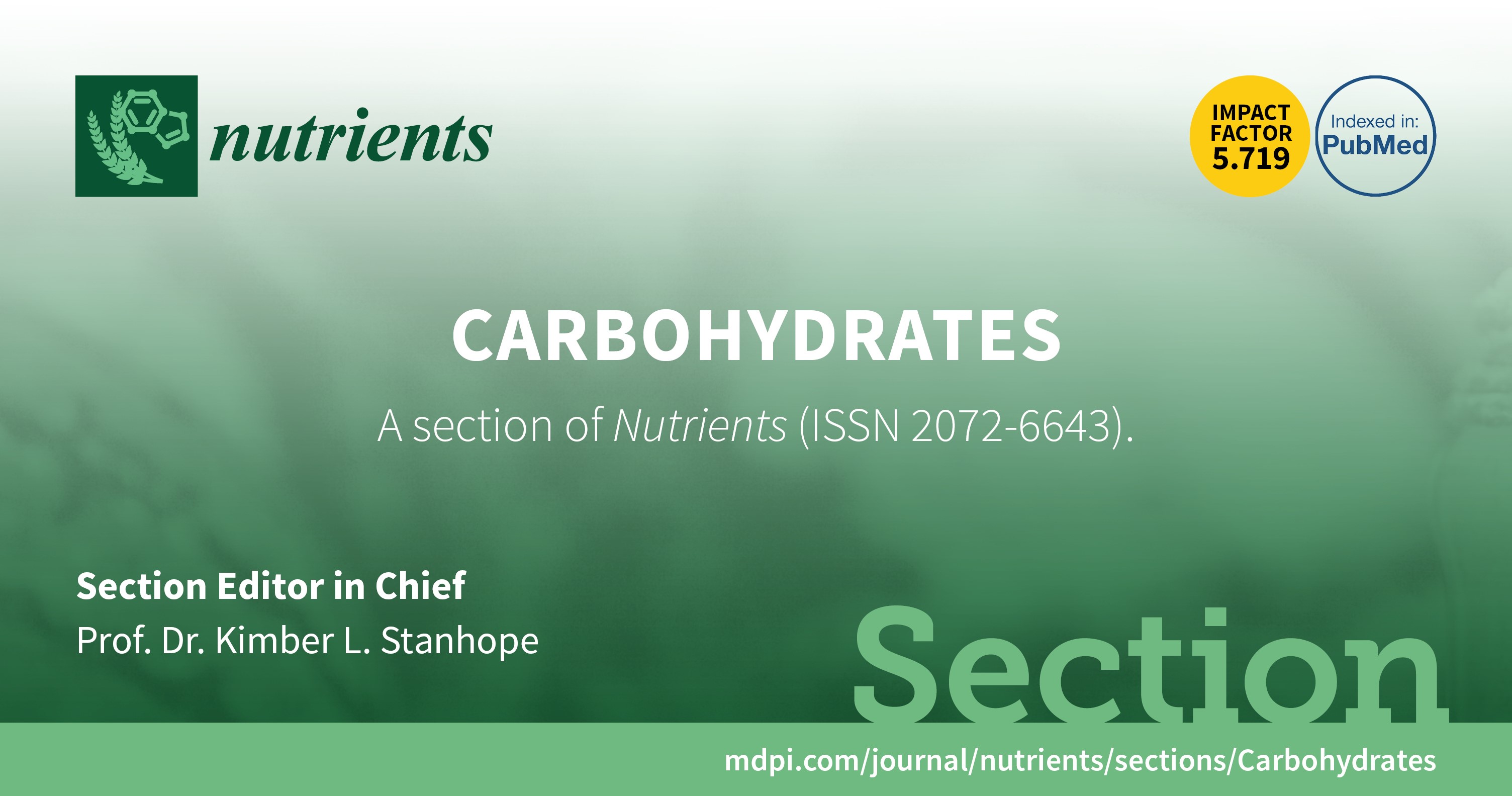
We are now accepting Special Issue proposals for the new Section "Carbohydrates" (https://www.mdpi.com/journal/nutrients/sections/Carbohydrates) of the journal Nutrients (ISSN: 2072-6643). If you are an active researcher in the field and are passionate about publishing cutting-edge research, please do not hesitate to contact the Section Managing Editor Ms. Jessie Guo (jessie.guo@mdpi.com).
Dietary carbohydrates are a heterogeneous group of molecules derived from plants that include mono- and disaccharides, oligosaccharides, polysaccharides and fiber. It is well documented that the health effects of dietary carbohydrate can be detrimental when high amounts of fructose-containing sugar are consumed, or beneficial when high amounts of fiber are consumed.
Yet more understanding is needed about the mechanisms by which added sugar mediates detrimental health effects, and how these effects differ from those of the other carbohydrates and non-nutritive sweeteners.
Similarly, there is still much to learn about the protective effects of food fibers and fiber supplements, especially those that are mediated via effects on microbiota. The health effects of a diet high in carbohydrate compared to a high-fat diet continue to be debated, and the answer is likely affected by the carbohydrate source (simple versus complex, refined versus unrefined, grain versus legume) and/or dependent on the genotype or phenotype of the individual. Thus, the “Carbohydrates” Section of Nutrients is open to increasing understanding of the heterogeneity of dietary carbohydrates and determining the carbohydrate components of the optimal diet for the promotion of health and prevention of disease.
Topics of interest include but are not limited to:
- Added sugar and the pathology of obesity and chronic disease:
- Added sugar and refined complex carbohydrate;
- Added sugar and naturally occurring sugars;
- Added sugar and non-nutritive sweeteners;
- Added sugar in solid food and sugar-sweetened beverage.
- High complex carbohydrate diet and the pathology of obesity and chronic disease:
- High complex carbohydrate diet and high-fat diet;
- Refined and unrefined complex carbohydrate diet;
- Food-specific sources of carbohydrate (e.g., legume versus grain);
- Effects of genotype or phenotype on metabolic response to high carbohydrate diet.
- Protective effects of fiber:
- Food fiber and fiber supplements;
- Intact fiber and pulverized fiber (e.g., whole bean versus hummus, whole fruit versus smoothie).
Nutrients is an international peer-reviewed open access journal advancing knowledge in the field of human nutrition. Nutrients is fully covered by the leading indexing services, including PubMed/MEDLINE, Science Citation Index Expanded (Web of Science), Scopus/SciVerse and Google Scholar. Full-text articles are also available in PubMed Central. The newly released Impact Factor of Nutrients is 5.719.
The following information should be provided in a proposal:
- A 150–200-word summary that clearly states the significance, novelty, technical advancement, and adherence to the scope of the journal of the proposed topic;
- A list of 5–10 keywords relating to the topic;
- A proposed submission deadline (a Special Issue will usually be open for submissions for 6–8 months);
- A list of at least 20 potential contributors, or a list of 8 planned papers.
As a Guest Editor, you would be responsible for:
- Inviting your peers to submit papers to be published in your Special Issue;
- Checking the suitability of abstracts/manuscripts submitted to the Special Issue;
- Making pre-check decisions on whether a manuscript can be sent out for peer-review;
- Making decisions on whether a manuscript can be accepted based on the reports we collect;
- Promoting the Special Issue and increasing its visibility at related academic conferences.
As a Guest Editor, you would have the following privileges:
- A certificate of recognition as a Guest Editor of Nutrients;
- Publishing one paper free of charge in your Special Issue;
- Inviting senior authors to submit high-quality papers to be published in your Special Issue with certain discounts;
- If ten or more papers are published in this Special Issue, we can make a Special Issue book and send a hard copy to each Guest Editor.
Please do not hesitate to contact the Editorial Office (nutrients@mdpi.com) for further details and clarifications. We look forward to receiving your proposals.
6 January 2022
Nutrients | Recruiting Editorial Board Members for New Section “Hydration”

We are currently recruiting Editorial Board Members for the new Section "Hydration" (https://www.mdpi.com/journal/nutrients/sections/Hydration), to be published in the journal Nutrients (ISSN: 2072-6643). If you are interested in serving on the Editorial Board, or have potential candidates to recommend, please reach out to us.
Applicants for the Editorial Board positions may nominate a specific section in which they feel their expertise lies, or they may nominate themselves as an Editorial Board Member for the entire journal.
Nutrients is an international, peer-reviewed, open access journal containing research in the field of human nutrition, advancing the knowledge in this area. Nutrients is fully covered by the leading indexing services, including PubMed/MEDLINE, Science Citation Index Expanded (Web of Science), Scopus/SciVerse, and Google Scholar. Full-text articles are also available in PubMed Central. The newly released impact factor of Nutrients is 5.719.
As an Editorial Board Member, you will have the following responsibilities:
- Pre-screening submissions and making decisions on whether they should be rejected or accepted for processing;
- Editing a Special Issue on a topic related to your research;
- Recommending timely topics and suggesting potential Guest Editors;
- Publishing/inviting/recommending one paper, free of charge, per year;
- Identifying appropriate conferences for the promotion of Nutrients;
- Promoting the journal at conferences and on social media.
If you are an active researcher in the field and are passionate about publishing cutting-edge research, please do not hesitate to contact the Section Managing Editor Ms. Coco Lv (coco.lv@mdpi.com).
We look forward to hearing from you soon.
Nutrients Editorial Office
30 December 2021
Nutrients | Two New Sections Established
We are pleased to announce that we are launching two new Sections in the open-access journal Nutrients (ISSN 2072-6643), which publishes reviews, research papers, and communications in all areas of hydration and geriatric nutrition research.
The two new Sections being launched are as follows:
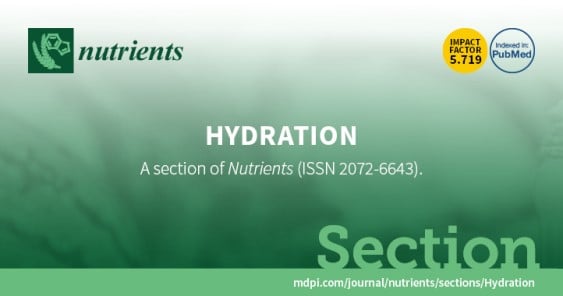
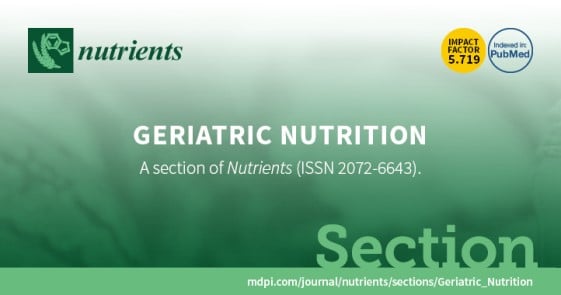
If you are interested in publishing your research, please do not hesitate to contact us at nutrients@mdpi.com; we welcome original research articles and reviews in the above-mentioned fields.
Nutrients Editorial Office
29 December 2021
Nutrients | Season’s Greetings from Editorial Board Members
Video message from the Editor-in-Chief of Nutrients (ISSN: 2072-6643) and the Section Editors-in-Chief:
|
|
Prof. Dr. Federica I. Wolf Editor-in-Chief of the “Micronutrients and Human Health” Section |
Dear readers,
Notwithstanding the viral storm that has blasted the world over the last two years, we are here to talk about science, ready to start the new year with unfailing enthusiasm.
It has been a difficult time for us all. Both our work environments and our social lives have been greatly affected, and we have experienced an unprecedented feeling of social isolation and restraint, as well as anxiety for the future of ourselves and the whole community.
Fortunately, we were blessed by the might of the web, which has helped us in the face of so many difficulties. We have learned how to explore and communicate in a virtual world—slang such as call and link and tele-this or tele-that has penetrated our language and become our leitmotiv to survive isolation and loneliness. This could not in any way compensate for the collapse of personal interactions, but it removed what was initially perceived as an insurmountable wall between us and the others, helping us to realize we were not alone after all. In looking back at the last two years, we might conclude that the Sars-Cov2 pandemic changed our lifestyle and made our days less frantic and neurotic. We suddenly found ourselves with plenty of time for thinking, putting ideas together, and brainstorming in the search for new scientific avenues.
In reviewing how the scientific literature embraced thousands of solid or naïve reports on the evil virus, I have the impression that we never stopped conducting science. Looking at how our journal faired during the pandemic, it is clear that our authors faced the challenges presented to them head on and broadened their focus on what a healthy lifestyle means. We all became, more than ever, aware of the importance of nutrition as a preventive or curative indispensable strategy. As a result, nutrition research is stronger than before and represents a unique arena to welcome translational collaborations and efforts to fight COVID-19. More importantly, nutrition research has become a flagship of a revitalized interest in life and the environment.
I wish you all a healthy and fruitful 2022!
|
|
Prof. Dr. Yvan Vandenplas Editor-in-Chief of the “Pediatric Nutrition” Section |
The whole team in “Pediatric Nutrition” wishes all co-workers and authors a very happy 2022 and we thank you for your devotion and interest.
|
|
Dr. Javier Gómez-Ambrosi Editor-in-Chief of the “Nutrition and Obesity” Section Co-Editor-in-Chief of the “Nutrition and Diabetes” Section |
On behalf of the Editorial Office of Nutrients we would like to extend our sincere gratitude to Nutrients’ authors, readers, Editorial Board members, and reviewers, thanking them for their kind and continued participation in the journal in 2021.
This year, we have published many relevant findings in the field of human nutrition. For example, several important papers have highlighted the role of vitamin D in reducing the severity and mortality rate of COVID-19, or other factors such as vitamin K or zinc, and how the pandemic has changed the dietary habits and physical activity due to lockdowns. Nutrients has also published studies demonstrating the positive health effects of nuts and coffee and has reviewed the benefits of fasting and its application. We have also seen research concerning meta-analysis, showing that animal protein tends to be more beneficial for lean mass than plant protein, a work suggesting that a ketogenic low-carbohydrate high-fat diet induces a deleterious blood lipid profile, and an innovative study using a metagenomics and metabolomics approach to show how western and Mediterranean diets differently affect gut microbiota metabolism. Finally, some studies have also shed more light on controversial topics such as the effects of the consumption of potatoes and saturated fats on health.
In 2021, the impact factor of Nutrients has increased to 5.719 and thanks to all the excellent papers we have published in 2021, we expect to further increase the impact of Nutrients in 2022.
We wish you a very happy new year, and we welcome submissions of even more excellent articles in 2022.
|
|
Prof. Dr. David C. Nieman Editor-in-Chief of the “Sport Nutrition” Section |
Wishing you health and happiness in the New Year ahead.
Sports nutrition is a rapidly expanding area of scientific investigation. The interaction of exercise and nutrition is compelling and complex. Advances in measurement technologies have allowed hundreds of metabolites, proteins, lipids, and genes to be measured simultaneously. This approach has improved the capacity to provide accurate and practical guidelines for athletes. The “Sports Nutrition” Section of the journal Nutrients is devoted to advancing scientific understanding, and I encourage you to send us your best papers in 2022.
|
|
Prof. Dr. Yan Chen Editorial Board Member in Nutrients |
Wish for Nutrients to be nutritious and important to all fields of biological research.
|
|
Prof. Dr. Gloria Lena Vega Editor-in-Chief of the “Nutrition and Metabolism” Section |
Dear readers,
Congratulations to all those who contributed to this year’s “Nutrition and Metabolism” Section and to our supportive readers and editorial staff. We were pleased to receive very informative manuscripts on diverse topics. The Section published about 400 manuscripts representing the scientific activities of researchers and scholars from the Americas, Asia, and Europe. The scope of the science is broad reflecting the many aspects of nutrition and metabolism research being conducted in well-established research centers.
We look forward to your continued support by submitting reviews, original research, and/or editorials on topics that are of greatest importance to nutrition and metabolism. In these challenging times of the pandemic, scientists are to be commended for their resilience and commitment to their work. As we learn to navigate the present health challenge, we anticipate additional submissions on new aspects of the role of the immune system in metabolism and new strategies to enhance immunity through nutrition. We encourage you to continue to submit your research findings to this section next year. We urge you to encourage your fellows and students to publish their thesis work and to use this forum as a key resource of innovative research in nutrition and metabolism.
We extend to our readership, authors, and very able editorial staff best wishes for a productive 2022 and for better control of the healthcare challenges we confront worldwide.
|
|
Prof. Dr. Luis A. Moreno Editor-in-Chief of the “Nutritional Epidemiology” Section |
Dear readers,
On behalf of the “Nutrition Epidemiology” Section of our journal Nutrients, we wish all authors and readers a happy Christmas time and a scientifically productive 2022, with our best wishes for your personal and familial life.
|
|
Prof. Dr. Ina Bergheim Editor-in-Chief of the “Clinical Nutrition” Section |
Dear readers and authors,
The last two years have been very challenging to all of us. People all over the world lost loved ones and many suffered economic hardship. Even though the pandemic is not over, it is thanks to the outstandingly fast development of COVID-19 vaccines that many of us will be able to meet friends and family in this holiday season and hopefully lead a more normal life in 2022. Therefore, I would like to take the opportunity to send a word of gratitude to our fellow scientists who worked hard to develop the COVID-19 vaccines.
Additionally, I would also like to take the opportunity to thank you, the readers and the authors, for following Nutrients and for publishing more than 400 excellent original manuscripts and review articles this year in the “Clinical Nutrition” Section. Indeed, if I look at the many submissions and manuscripts published in this Section, but also the journal in general throughout the past year, I have the impression we never stopped engaging with science, and that nutrition research is an ever-developing discipline being one of the keys to a healthy life.
Happy Holidays to everyone and a healthy and fruitful 2022!
|
|
Prof. Dr. Kimber L. Stanhope Editor-in-Chief of the “Carbohydrates” Section |
As we near the end of another challenging year, a Season’s Greeting full of enthusiasm for the progress we have made in the world of nutrition research and optimism for our future progress is the order of the day. It is easy for me to be enthusiastic about progress. I was lucky to stumble on a research path that has made particularly impressive progress during the last two decades—the metabolic effects of added sugar consumption. I assess this progress starting in 2001 with our NIH summary statement for our first R01 proposal to conduct a well-controlled dietary intervention study on the metabolic effects of fructose and glucose. A reviewer panned our hypothesis that fructose consumption increased risk factors for CVD, stating that it had already been disproven 30 years ago when it was proposed by John Yudkin (eventually, and luckily, we got funded anyway). Fast forward to 2015, reviewers of our new proposals were questioning the need for any more dietary intervention studies on added sugar. Specifically, one reviewer wrote that everyone, except those associated with the sugar industries, knows that the consumption of sugar is bad for health. While the comment is arguable, specifically concerning the “everyone knows” part, it certainly suggests a lot of results were generated and a lot of learning occurred in only 13 years! We can also reasonably claim that the change in the 2015 US Dietary Guideline for the upper limit of added sugar consumption is indicative of outstanding progress; down from 25% of daily energy to 10% of daily energy. However, the U.S. per capita consumption of added sugar (sucrose plus HFCS) has only decreased 17% since 2002 (from 350 to 292 Kcal/day), therefore the average level of added sugar consumption in the U.S. is still closer to 15% of daily energy than 10%. Furthermore, the decrease consisted of solely high fructose corn syrup (HFCS); sucrose intake has increased by 16 kcal/day since 2002. (Nutrition educators, please broadcast the finding of our latest publication: Liver fat, insulin resistance, circulating lipids/lipoproteins, and uric acid are significantly increased by consumption of sucrose, and the increases are comparable to those caused by consumption of HFCS.)
Clearly, we need to keep adding to the evidence base that demonstrates that the refined Western diet is a mediator of chronic disease, ensure that the evidence is translated to dietary advice and education for the public, and develop and test new strategies that will promote dietary change. Does my enthusiasm for our recent progress on the topic of added sugar translate to optimism that we can make equally impressive progress on the goals stated above? I am not sure. I worry that the challenge of obtaining funding to conduct a clinical dietary intervention study, the gold standard of nutrition research, has sky-rocketed alarmingly during the last decade. The researcher must not only meet the NIH standards for being significant and innovative (a challenge in itself), but many reviewers are judging the study design (approach) based on the same standards set for evidence-based medicine. These evidence-based medicine standards for sample size, duration, direct disease outcomes, blinding, control of confounding variables, and compliance monitoring are achievable for a Phase III drug study, for practical, ethical, and methodological reasons, they are not realistic standards for clinical dietary intervention studies.
Furthermore, I think summary statements from my recent unfunded NIH proposals illustrate additional challenges that face nutrition researchers who are seeking funding for clinical dietary intervention studies. For example, in the same summary statement, two reviewers offered completely non-reconcilable critiques of my plan to provide the human subjects with 6 weeks of standardized meals and beverages prepared in our metabolic kitchen. The first reviewer described the dietary protocol as a weakness as it “...is so tightly controlled it is unclear how generalizable these findings will be”; the second reviewer described the dietary protocol as a weakness as the subjects “are not brought into a monitored or controlled setting” for meal consumption, thus may cheat.
I was also disconcerted when a reviewer of my most recent unfunded proposal stated that it was unclear how elucidating the mechanism between consumption of sugar-sweetened beverages and weight gain would result in public health policy to reduce the availability of SSB. It is the objective of nearly all dietary intervention studies to generate results that will influence public health policy. While many of us researchers put substantial effort into trying to ensure our published results have an impact, the role of translating research evidence into public health policy belongs to others specifically trained for this. Luckily, more and more of our young people are embracing this role, and from 1992 to 2016 the number of post-graduate degrees conferred in public health has more than tripled.
One of the hurdles that the current and future public health advocates have to deal with in their efforts to impact dietary policy is gaps in the evidence base. Filling these gaps is our role, and it takes three types of studies to do this: 1. The observational studies that can show associations between dietary components and health or disease; 2. The basic animal research that can demonstrate causal mechanism between dietary components and health or disease; and 3. Clinical dietary intervention studies to test the relevance of the mechanisms in humans using surrogate markers of health and disease. With all three, we will arm the public health advocates with the best possible evidence base. Therefore, we have to work to ensure that unrealistic standards do not impede the conduct of clinical dietary intervention studies. Dietary intervention studies will never test CVD or diabetes as outcomes, only their surrogates. They will never have sample sizes or durations to rival Phase III drug studies. If they use a free-living/free-choice dietary protocol, the results are subject to confounding by other dietary variables. If they use the standardized dietary protocol in which subjects are confined to consuming only the study diet, mis-compliance is still possible and the results may not be generalizable to real-world diets. While it may be my fantasy, it is not possible, even with unlimited funding, to conduct a dietary intervention study that will not have limitations and that will single-handedly impact dietary policy and consumer behavior. This must not become an excuse not to conduct them. Let us work together to ensure that it does not!
Happy Holidays to everyone!
|
|
Prof. Dr. Guansheng Ma Editorial Board Member in Nutrients |
As the pandemic continues to rage around the world in 2021, nutrition research is still being conducted, despite the impact. To fight against COVID-19, the link between vitamin D, zinc, polyphenols, other nutrients and resistance to infection and immune function has received particular attention. The results of these studies have shown that adequate and appropriate intake of nutrition is essential for strengthening immunity and preventing the infection of COVID-19. Investigations have concluded that quarantine does changes dietary behavior and physical activity, eventually impacting the health of the population. Nutrition and healthy aging, food allergies, mechanisms and effects of dietary factors on chronic diseases are the focus of research; moreover, the food environment, food systems, low carbon and sustainability are the focus of researchers.
In the coming year, 2022, as researchers, our scientific research in nutrition and health will never stop. We will continue to make new advances in our own research fields in order to benefit both mankind and nature.
Happy Holidays! I wish you all a healthy and fruitful 2022!
22 December 2021
Nutrients | Call for Special Issue Proposals for New Section “Protein”
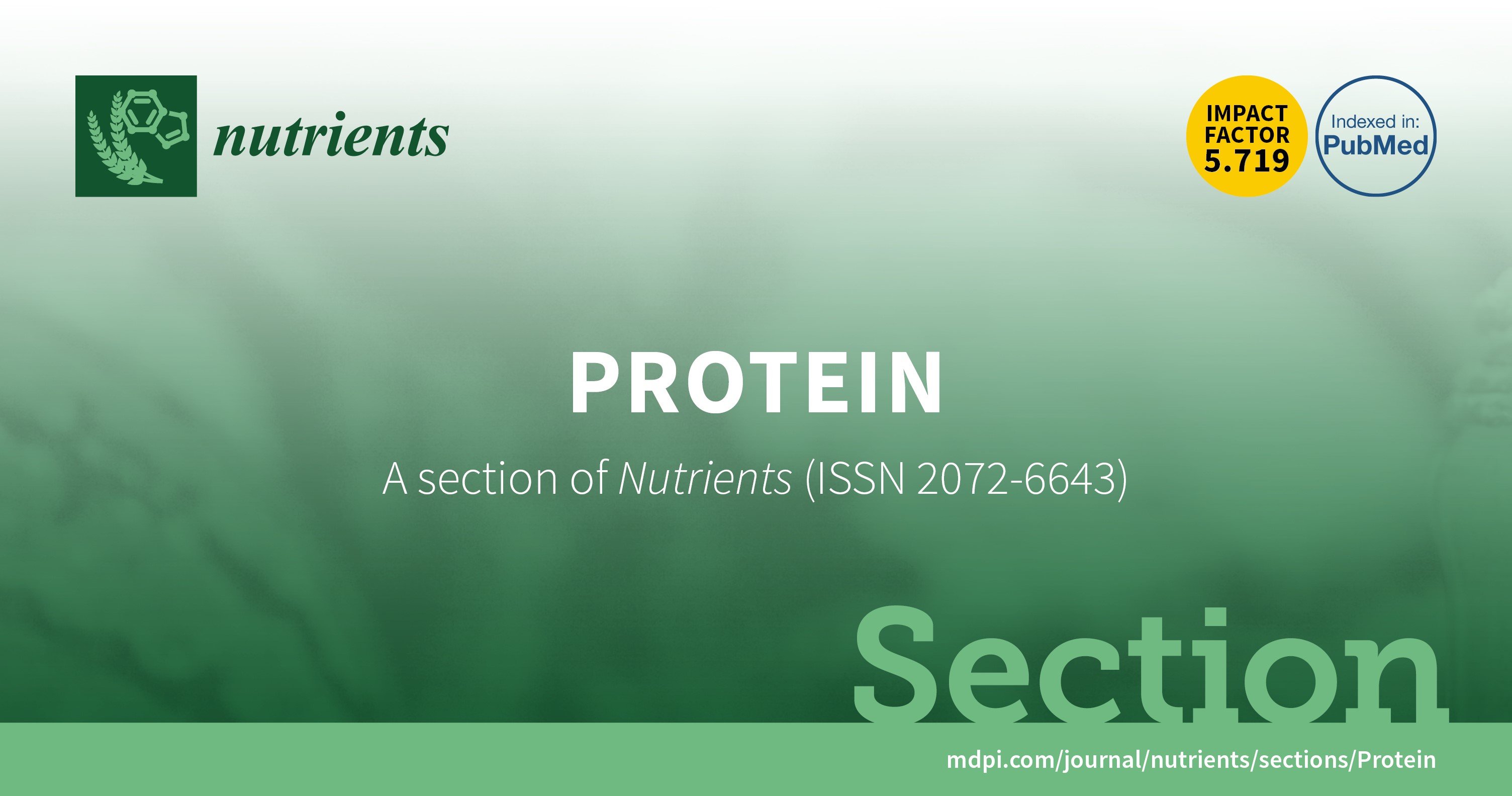
We are currently inviting Special Issue proposals for the new section "Protein". If you are an active researcher in the relevant field and are passionate about cutting-edge research, please do not hesitate to contact the Section Managing Editor Ms. Susan Yu (susan.yu@mdpi.com).
Dietary protein is fundamental to health. Authors are invited to submit original research and review articles to this Section, describing the impact and mechanisms underlying the relationship between dietary protein (and its constituents, e.g., peptides and amino acids) and metabolism/physiology. We are interested in articles describing these relationships in humans and in animal models, in health, across the life course, or during pathological processes, wherein the dietary constituents of protein impact physiological functioning. We also welcome studies performed using appropriate “in vitro” approaches.
For further information, please do not hesitate to contact the Editorial Office (nutrients@mdpi.com).
We look forward to receiving your proposals.
20 December 2021
Nutrients | Call for Special Issue Proposals for New Section “Lipids”

We are currently accepting Special Issue proposals for the new Section of Nutrients (ISSN: 2072-6643), "Lipids" (https://www.mdpi.com/journal/nutrients/sections/Lipids). If you are an active researcher in the field and are passionate about publishing cutting-edge research, please do not hesitate to contact the Section Managing Editor, Ms. Jin Wang (jin.wang@mdpi.com).
Lipids play an important role in the development of obesity, diabetes, cardiovascular disease, cancer, and mental illness. Some fatty acids and lipid-soluble substances have shown the ability to modulate the pathophysiology of these lifestyle-related diseases due to their unique absorption route, selective incorporation into various tissues, and influence on metabolic pathways, resulting in the alteration of blood lipid levels, pro- and anti-inflammatory mediators, platelet aggregation, eicosanoid production, and hormonal responses.
We welcome original research articles and reviews describing basic, clinical, and applied studies representing novel and significant advances in all subject areas relevant to lipids and lipid-related diseases.
Topics include, but are not limited to, the following: medium chain fatty acids; omega-3 polyunsaturated fatty acids; monounsaturated fatty acids; oils; cholesterol; fat-soluble vitamins; lipids in the pathology of a disease; blood lipids and lipoproteins; membrane lipids; impact on inflammation, platelet aggregation, and blood pressure; functional foods and lipids; carotenoids; and polyphenols.
Nutrients is an international peer-reviewed open access journal that aims to advance knowledge in the field of human nutrition. Nutrients is fully covered by the world’s leading indexing services, including PubMed/MEDLINE, Science Citation Index Expanded (Web of Science), Scopus/SciVerse, and Google Scholar. Full-text articles are also available on PubMed Central. Nutrients has recently received a newly released Impact Factor of 5.719.
The following information should be provided in any submitted proposals:
- A 150–200-word summary that clearly states the significance, novelty, technical advancement, and adherence to the scope of the journal of the proposed topic;
- A list of 5–10 keywords relating to the topic;
- A proposed submission deadline (a Special Issue will usually be open for submissions for 6–8 months);
- A list of at least 20 potential contributors or a list of 8 planned papers.
As a Guest Editor, you would be responsible for:
- Inviting your peers to submit papers to be published in your Special Issue;
- Checking the suitability of the abstracts/manuscripts submitted to the Special Issue;
- Making pre-check decisions to determine whether a manuscript can be sent out for peer-review;
- Making decisions as to whether a manuscript can be accepted based on the reports we collect;
- Promoting the Special Issue and increasing its visibility at related academic conferences.
As a Guest Editor, you would have the following privileges:
- A certificate of recognition for undertaking the role of a Guest Editor for Nutrients;
- Publishing one paper free of charge in your Special Issue;
- The opportunity to invite senior authors to submit high-quality papers to be published in your Special Issue with certain discounts;
- If ten or more papers are published in this Special Issue, we will also be able to publish this Special Issue as a book and will send a hard copy to each Guest Editor.
Please do not hesitate to contact the Editorial Office (nutrients@mdpi.com) for further detail and clarification. We look forward to receiving your proposals.
22 November 2021
722 MDPI Editorial Board Members Receiving "2021 Highly Cited Researchers" Distinction
It is our great honor to congratulate the Editorial Board Members and Editors in MDPI's journals who have been distinguished as 2021 Highly Cited Researchers by Clarivate, according to Web of Science data. We herewith express our gratitude for the immense impact the named researchers continue to make on scientific progress and on our journals' development.
Clarivate's annual list of Highly Cited ResearchersTM identifies the most highly cited scientists for the past decade. Their impactful papers are among the top 1 per cent in the citation distribution of one or more of 22 fields analyzed in the "Essential Science Indicators", distinguishing them as hugely influential among their peers.
| Abate, Antonio Abatzoglou, John T. Abbaszadeh, Mostafa Acharya, U. Rajendra Acharya, Viral V. Agarwal, Ravi P. Ahn, Myung-Ju Airoldi, Laura Ali, Imran Allakhverdiev, Suleyman I. Aluko, Rotimi E. Anasori, Babak Andersson, Dan I. Andes, David Anker, Stefan D. Apergis, Nicholas Ariga, Katsuhiko Arqub, Omar Abu Aschner, Michael Assaraf, Yehuda G. Astruc, Didier Atala, Anthony Atanasov, Atanas G. Atangana, Abdon Bahram, Mohammad Bakris, George L. Balandin, Alexander A. Baleanu, Dumitru Balsamo, Gianpaolo Bando, Yoshio Banks, William A. Bansal-Travers, Maansi Barba, Francisco J. Barros, Lillian Basit, Abdul W. Baskonus, Haci Mehmet Bassetti, Matteo Battino, Maurizio Bell, Jordana T. Bellomo, Nicola Benediktsson, Jon Atli Benelli, Giovanni Benjakul, Soottawat Bhatnagar, Amit Biddle, Stuart J. H. Biondi, Antonio Biondi-Zoccai, Giuseppe Bjarnsholt, Thomas Blaabjerg, Frede Blaschke, Thomas Blay, Jean-Yves Blumwald, Eduardo Blunt, John W. Boffetta, Paolo Bogers, Marcel Bonomo, Robert A. Bowman, David M.J.S. Boyer, Cyrille Brestic, Marian Brevik, Eric C. Buhalis, Dimitrios Burdick, Jason A. Byrd, John C. Cabeza, Luisa F. Cai, Xingjuan Cai, Jianchao Calhoun, Vince D. Calin, George Cao, Jinde Cao, Guozhong Carvalho, Andre F. Castellanos-Gomez, Andres Cerqueira, Miguel Ângelo Parente Ribeiro Chang, Jo-Shu Chang, Chih-Hao Chastin, Sebastien Chau, Kwok-wing Chemat, Farid Chen, Xiaobo Chen, YangQuan Chen, Jianmin Chen, Chaoji Chen, Min Chen, Qi Chen, Jun Chen, Xi Chen, Peng Chen, Yulin Chen, Bo Chen, Chen Chen, Zhi-Gang Chen, Wei-Hsin Chen, Gang Chen, Yongsheng Chen, Xiang Chen, Yimin Chen, Runsheng Chen, Lidong Chen, Shaowei Chen, Qian Chen, Yu Chen, Shuangming Chiclana, Francisco Cho, Sun Young Choi, Wonyong Chowdhary, Anuradha Choyke, Peter L. Cichocki, Andrzej Corella, Dolores Corma, Avelino Cortes, Javier Cortes, Jorge Costanza, Robert Crommie, Michael F. Cui, Yi Cui, Haiying Cui, Qinghua Cummings, Kenneth Michael Dai, Shifeng Dai, Sheng Daiber, Andreas Davis, Steven J. Dawson, Ted M. de la Fuente-Nunez, Cesar Decker, Eric Andrew Dekel, Avishai Demaria, Marco Deng, Yong Deng, Xiangzheng DePinho, Ronald A. Desneux, Nicolas Dimopoulos, Meletios-Athanasios Ding, Aijun Dionysiou, Dionysios D. Dokmeci, Mehmet Remzi Dolgui, Alexandre Dong, Fan Dou, Shi Xue Dou, Letian Du, Qian Du, Bo Dube, Shanta Rishi Dufresne, Alain Dummer, Reinhard Dupont, Didier Edwards, David Elaissari, Abdelhamid Elhoseny, Mohamed Ellahi, Rahmat Ellis, Erle C. ElMasry, Gamal Esteller, Manel Estévez, Mario Fabbro, Doriano Facchetti, Antonio Fan, Zhanxi Fang, Chuanglin Fasano, Alessio Fečkan, Michal Felser, Claudia Feng, Liangzhu Fensholt, Rasmus Ferdinandy, Péter Fernandez-Lafuente, Roberto Ferreira, Isabel C. F. R. Filippi, Massimo Fisher, Helen Fortino, Giancarlo Fosso Wamba, Samuel Franceschi, Claudio Fujita, Hamido Fujita, Masayuki Gai, Francesco Gaisford, Simon Galanakis, Charis M. Galluzzi, Lorenzo Galvano, Fabio Gan, Ren-You Gan, Lihua Gandomi, Amir H. Gao, Bin Gao, Feng Gao, Minrui Gao, Huijun Gao, Wei Gao, Huile Garbe, Claus Garcia, Hermenegildo Gasbarrini, Antonio Gasco, Laura Gautret, Philippe Geng, Yong Gerdts, Gunnar Geschwind, Daniel H. Ghadimi, Noradin Ghaffari, Roozbeh Ghamisi, Pedram Giampieri, Francesca Glick, Bernard R. Gnant, Michael Goel, Ajay Gogotsi, Yury Goldewijk, Kees Klein Gong, Jinlong Gong, Yongji Govindan, Kannan Granato, Daniel Grancini, Giulia Green, Douglas R. Grosso, Giuseppe Gu, Ke Guan, Cao Guastella, Adam J. Guerrero, Josep M. Gui, Guan Guizani, Mohsen Guo, Zaiping Gupta, Rangan Gutzmer, Ralf Haase, Dagmar Habibi-Yangjeh, Aziz Hagemann, Stefan Hagger, Martin Hamblin, Michael R. Hammoudeh, Shawkat Han, Heesup Hanes, Justin Harrison, Roy M. Hartung, Hans-Peter Hasanuzzaman, Mirza He, Jr-Hau He, Hongwen He, Jiaqing He, Debiao Henseler, Jörg Herrera, Francisco Herrera-Viedma, Enrique Hetz, Claudio Ho Kim, Jung Holmes, Elaine Hossain, Ekram Hsueh, Po-Ren Hu, Xiaosong Hu, Wenbin Huang, Jianping Huang, Hongwei Huang, Yu Huang, Jianying Huang, Peng Huang, Baibiao Huang, Shaoming Hubacek, Klaus |
Iqbal, Hafiz M. N. |
Saad, Fred |
The full list of 2021 Highly Cited Researchers can be accessed at the following webpage in the Web of ScienceTM https://recognition.webofscience.com/awards/highly-cited/2021/.
--- Highly Cited Researchers (HCR) is a Clarivate product.
18 November 2021
Nutrients | Call for Special Issue Proposal for New Section “Nutrition and Obesity”
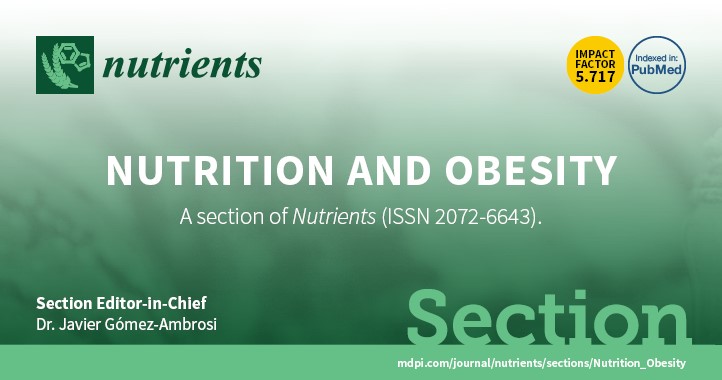
We are now recruiting Special Issue proposals for the new section "Nutrition and Obesity" (https://www.mdpi.com/journal/nutrients/sections/Nutrition_Obesity) of the journal Nutrients (ISSN: 2072-6643). If you are an active researcher in the field and are passionate about publishing cutting-edge research, please do not hesitate to contact the Section Managing Editor Ms. Elisa Yuan (elisa.yuan@mdpi.com).
Over the last few decades, obesity has become the most prevalent metabolic disorder worldwide. Excess adiposity increases the risk for the development of cardiometabolic alterations, such as type 2 diabetes, cardiovascular disease, dyslipidemia, non-alcoholic fatty liver disease and cancer, among others. In recent years, our knowledge of obesity has greatly improved, but more research is needed to better understand the mechanisms underlying the development of this metabolic condition and its pathophysiology, and to optimize its management.
We welcome original research articles describing basic, clinical and applied studies representing novel and significant advances in all areas relevant to obesity and related disorders, as well as reviews. The areas of research covered by this section relate to all aspects of obesity diagnosis, pathophysiology and treatment.
Topics include, but are not limited to the following: Obesity; Adipose tissue pathophysiology; Biomarkers; Physical activity; Adipokines; Pediatric obesity; Obesity phenotyping; Omics studies; Regulation of appetite; Body composition; Energy expenditure; Genetics; Cardiometabolic risk factors; Nutritional epidemiology; Animal models; Aging; New technologies (for phenotyping or treatment); In vitro models, including organoids; Psychological aspects; Metabolic syndrome; Type 2 diabetes; Non-alcoholic fatty liver disease; Other obesity-related metabolic disturbances; Dietary treatment; Lifestyle intervention; Pharmacological treatment; Metabolic surgery; Intermittent fasting; Cardiometabolic risk improvement after weight loss; Body composition changes; Weight regain; Predictors of treatment success; Use of apps for weight loss; Novel targets; Transgenerational effects; and Treatment of children and adolescents.
Nutrients is an international peer-reviewed open access journal advancing knowledge in the field of Human Nutrition. Nutrients is fully covered by the leading indexing services, including PubMed/MEDLINE, Science Citation Index Expanded (Web of Science), Scopus/SciVerse and Google Scholar. Full-text articles are also available in PubMed Central. The newly released Impact Factor of Nutrients is 5.717.
The following information should be provided in a proposal:
- A 150–200-word summary that clearly states the significance, novelty, technical advancement, and adherence to the scope of the journal of the proposed topic;
- A list of 5–10 keywords relating to the topic;
- A proposed submission deadline (a Special Issue will usually be open for submissions for 6–8 months);
- A list of at least 20 potential contributors, or a list of 8 planned papers.
As a Guest Editor, you would be responsible for:
- Inviting your peers to submit papers to be published in your Special Issue;
- Checking the suitability of abstracts/manuscripts submitted to the Special Issue;
- Making pre-check decisions on whether a manuscript can be sent out for peer-review;
- Making decisions on whether a manuscript can be accepted based on the reports we collect;
- Promoting the Special Issue and increasing its visibility at related academic conferences.
As a Guest Editor, you would have the following privileges:
- A certificate of recognition as a Guest Editor of Nutrients;
- Publishing one paper free of charge in your Special Issue;
- Inviting senior authors to submit high-quality papers to be published in your Special Issue with certain discounts;
- If ten or more papers are published in this Special Issue, we can make a Special Issue book and send a hard copy to each Guest Editor.
Please do not hesitate to contact the Editorial Office (nutrients@mdpi.com) for further details and clarifications. We look forward to receiving your proposals.
16 November 2021
Topical Advisory Panel Established to Support Editorial Board
Academic editors play a crucial role in leading our journals and ensuring that each article undergoes a robust and timely peer-review. With the launch of Topics this year and addition of Topic Editors to our family of academic editors, we decided it would be a good time to restructure our academic boards, thus providing more clarity and support for each role. MDPI is pleased to announce the launch of a new position—Topical Advisory Panel Member, that will replace the previous position of Topics Board Member. The Topical Advisory Panel will be comprised of early career researchers eager to gain experience in editorial work.
The main responsibility of the new members of the Topical Advisory Panel is to regularly provide support to Guest Editors, Topic Editors, and Section Board Members. The responsibilities of the Topical Advisory Panel are available here: https://www.mdpi.com/editors.
Each year, the members’ performances are evaluated, and outstanding members are promoted to the Editorial Board by the Editor-in-Chief.
To qualify as a Topical Advisory Panel Member, applicants must:
- Have expertise and experience in the field related to the journal;
- Have received a Ph.D. in the last 10 years, approximately;
- Have at least 6-8 published papers in the last 5 years as first author or corresponding author;
- Currently hold an independent research position in academia or a government institute.
If you are interested in this role, please contact the editorial office by email.
We look forward to hearing from you soon.
25 October 2021
Open Access Week 2021 | It Matters How We Open Knowledge: Building Structural Equity, 25–31 October

Founded in 1996, MDPI was one of the first fully Open Access publisher. Over 25 years MDPI has grown to become the largest Open Access publisher globally, publishing over 160,000 articles across more than 350 journals in 2020. At the core, MDPI was founded in response to a pressing need of fast publication and inclusion. The scholar was set at the centre of the publication process for the first time. Acting as a service provider, rather than a product provider, MDPI exists to help scientists achive their objective to disseminate research results. At MDPI, we believe scientists deserve a better service from the publishing world.
The International Open Access Week (Open Access Week), founded by the SPARC (the Scholarly Publishing and Academic Resources Coalition) Alliance and student partners in 2008, has been successfully running for 13 years. As an advocate and pioneer of open access publishing, MDPI actively responds to the call of International Open Access Week. This year’s theme of “It Matters How We Open Knowledge: Building Structural Equity” highlights the Recommendation’s call for equitable participation from all authors and readers.
For the last 25 years, MDPI has been committed to disseminating open research. Here is a video showing MDPI’s Commitment to Equity, Inclusion and Diversity for More than 25 Years.
International Open Access Week is an important opportunity to catalyze new conversations, create connections across and between communities that can facilitate this co-design, and advance progress in the building of more equitable foundations for opening knowledge—discussions and actions that need to be continued, year in and year out. MDPI has always aimed to provide professional and efficient publishing services to scholars around the world.
Our mission is to make scientific research accessible to everyone; this year, we interview and hold discussions with open science ambassadors on how to build an equal and inclusive environment for open science. Academic editors help us collaborate with more institutions to advocate for open access ideas.
Besides this, our scientific community is a key driver of our success and MDPI’s remarkable growth. Despite the pandemic, we have prepared online conferences and workshops to gather scholars from different communities.
The Basel Sustainable Publishing online forum provides an equal opportunity for stakeholders and researchers from multi-cultural environments to exchange ideas and eliminate barriers to participation.
Conference date: 25 October 2021, online
Conference website: https://bspf2021.sciforum.net/
Main topics: MDPI discusses the current dilemma of open access science from various perspectives such as governments, libraries, and publishers, and related measures on how to change the status quo of discrimination from a global perspective.
We aim to support equality, inclusion, diversity, and accessibility in scholarly communications. We collaborate with universities and key laboratories and have scholarly communications with researchers, teachers, and students on open access workshops.

- 25 October 2021
Energies journal and Institute of Mechanics, Chinese Academy of Sciences
- 28 October 2021
Machines journal and State Key Laboratory of Traction Power, Southwest Jiaotong University
- 29 October 2021
Processes journal and Beijing Institute of Technology
- 29 October 2021
Coatings journal and Wuhan University of Technology
MDPI is committed to providing open access and high-quality publishing services for scholars and promoting rapid dissemination of academic achievements. We hope to promote the practices and policies of open access publishing and diversify the dissemination of academic achievements.
23 September 2021
2020 MDPI Top Reviewer Award—Winners Announced
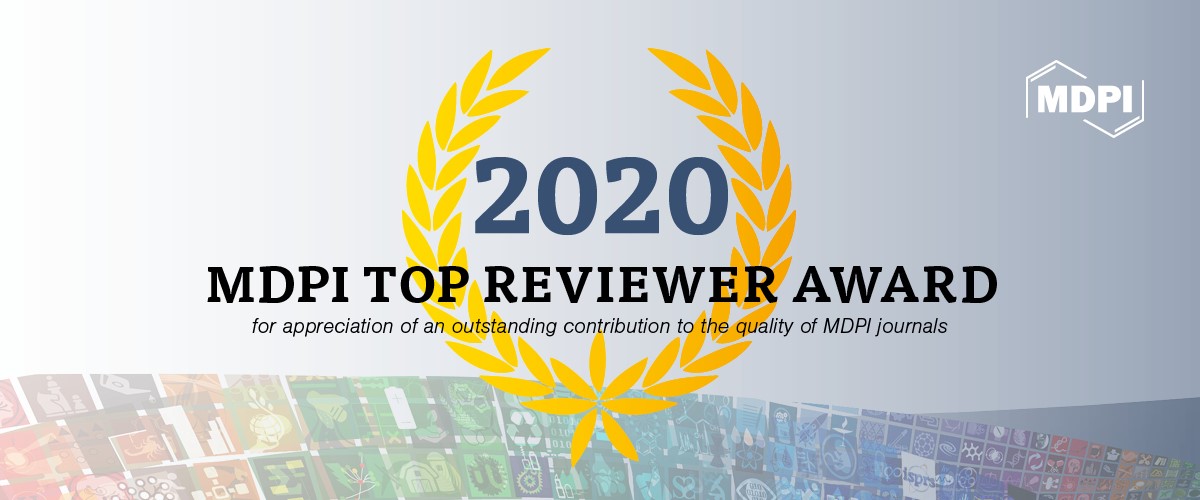
Rigorous peer-review is the cornerstone of high-quality academic publishing. Over 369,916 scholars served as reviewers for MDPI journals in 2020. We are extremely appreciative of all those who made a contribution to the editorial process in this capacity. At the beginning of every year, journal editorial offices publish a list of all reviewers’ names to express our gratitude. In addition, this year, the MDPI Top Reviewer Award was announced, to recognize the very best reviewers for their expertise and dedication, and their high-quality, and timely review reports. We are pleased to announce the following winners of the 2020 MDPI Top Reviewer Award:
- Adriana Burlea-Schiopoiu;
- Alban Kuriqi;
- Álvaro González-Vila;
- Alessandro Alaimo;
- Alexey Beskopylny;
- Alexander Yu Churyumov;
- Alberto Fernández-Isabel;
- Andrea Mastinu;
- Antonios N. Papadopoulos;
- Anton Rassõlkin;
- Antonio Humberto Hamad Minervino;
- Arkadiusz Matwijczuk;
- Artur Słomka;
- Baojie He;
- Bartłomiej Potaniec;
- Bojan Đurin;
- Camilo Arturo Rodriguez Diaz;
- Carmelo Maria Musarella;
- Chiachung Chen;
- Chiman Kwan;
- Cristian Busu;
- Danil Pimenov;
- Dan-Cristian Dabija;
- Delfín Ortega-Sánchez;
- Demetrio Antonio Zema;
- Denis Butusov;
- Elena Lucchi;
- Gaurab Dutta;
- Livia Anastasiu;
- M. R. Safaei.
For more information about how to become a reviewer of MDPI journals, please see: www.mdpi.com/reviewers.
22 September 2021
MDPI Joins SDG Publishers Compact

UN's 17 Sustainable Development Goals (SDGs) are the blueprint to achieve a better and more sustainable future for all. In 2020 the SDG Publishers Compact was launched, aimed to inspire publishers and accelerate progress to achieve the 17 goals by 2030. Members of the programme are committed to support the publication of materials that will promote and inspire actions towards SDGs.
MDPI is an eager advocate of SDGs and has already been supporting the programme by creating Special Issues and publishing a series of books on SDGs prior to joining the Compact in 2021. MDPI's Sustainability Foundation initiated the World Sustainability Awards in 2016. We fully support UN's goals to promote sustainable actions that make the world a better place for all and, as part of its commitment, we will focus our actions on SDG10: Reduced Inequalities whilst promoting all 17 SDGs. For more details, please visit the programme’s website: https://www.un.org/sustainabledevelopment/sdg-publishers-compact/.
Joining this initiative was a unanimous decision. MDPI has in its core values the dissemination of science for all, breaking the wall between research access and under-represented members of the scientific community and the general population. To support this initiative further and continue to support under-represented scientists, MDPI will take a series of actions that will be announced once ready.
The first action MDPI takes is to nominate Dr. Liliane Auwerter as the coordinator of the programme. Dr. Auwerter studied Environmental Process Technology (UTFPR, Brazil), obtained her MSc degree in Water and Environmental Engineering (University of Surrey, UK) and in 2020 completed her PhD in self-healing low-friction materials for water transport (Imperial College London, UK), always focusing on diverse scientific projects that would potentially bring sustainability to industrial processes. As a student in Brazil, she engaged in volunteering activities focused on environmental education and took part in the Millennial Development Goals meetings held at the university.
For more information, please contact:
Dr. Liliane Auwerter
Scientific Officer
liliane.auwerter@mdpi.com
18 September 2021
Nutrients | Four New Sections Established
In order to specifically develop different research areas and attract more high-quality papers, we are pleased to announce the following four sections in Nutrients:
We are now recruiting Editorial Board Members (EBMs) for these sections. If you are an active researcher in one of the aforementioned fields and are passionate about publishing cutting-edge research, please do not hesitate to get in touch (nutrients@mdpi.com). Alternatively, you can submit your work directly via the following link: https://www.mdpi.com/journal/nutrients.
Nutrients (ISSN: 2072-6643) is a peer-reviewed, open access journal of human nutrition published monthly online by MDPI.
Please feel free to contact us with any questions.
We look forward to collaborating with you.
Nutrients Editorial Office
16 September 2021
Nutrients Webinar | Sports Nutrition Current Trends and Insights, 20 September 2021
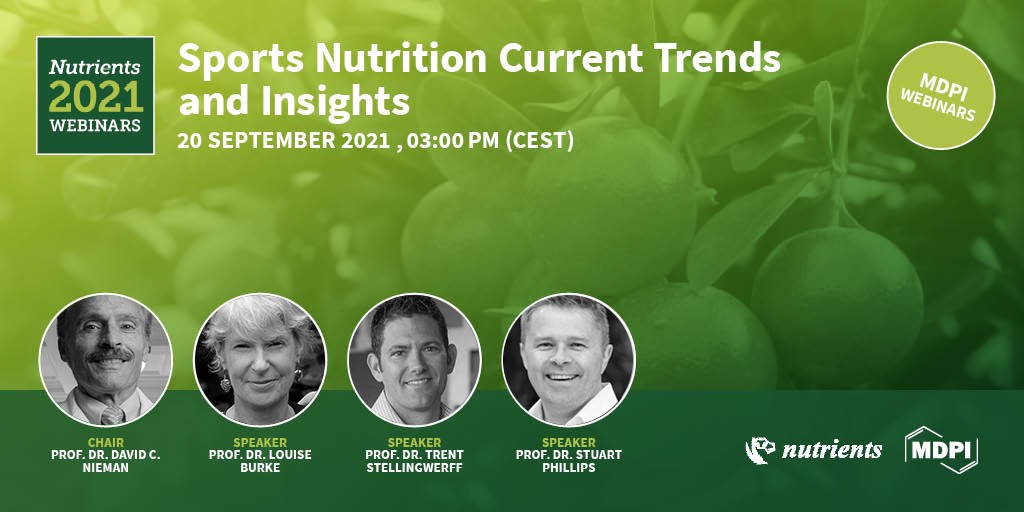
We are pleased to invite you to participate in the upcoming Nutrients free webinar on 20 September 2021: Sports Nutrition Current Trends and Insights.
Next to training and genetic endowment, nothing is more essential to athletic performance than nutrition. The modern area of performance nutrition dates back to the 1960s. An early focus was on the importance of hydration, increased energy intake, and carbohydrate supplementation. The sports nutrition research area has since rapidly expanded to answer questions being raised by athletes and coaches. This webinar will provide insights on current trends in sports nutrition. We have three international research leaders in the area of sports nutrition as our webinar presenters.
Date: 20 September 2021
Time: 3:00 pm (CEST)
Webinar ID: 836 6093 1878
Register for free here: https://nutrients-4.sciforum.net/#registration
Program
|
Speaker/Presentation |
Time in CEST |
|
Prof. Dr. David C. Nieman |
3:00 - 3:10 pm |
|
Prof. Dr. Louise Burke |
3:10 - 3:40 pm |
|
Prof. Dr. Trent Stellingwerff |
3:40 - 4:10 pm |
|
Prof. Dr. Stuart Phillips |
4:10 - 4:40 pm |
|
Q&A Session |
4:40 - 5:00 pm |
|
Prof. Dr. David C. Nieman |
5:00 - 5:10 pm |
For any questions about the webinar, please send an email to nutrients.webinar@mdpi.com.
We look forward to your participation in this event.
Nutrients Editorial Office
27 August 2021
Nutrients Webinar | Nutrigenetics: Translation into Clinical and Nutritional Practice, 7 September 2021

We are pleased to invite you to participate in the coming Nutrients free webinar on 7 September 2021: Nutrigenetics: Translation into Clinical and Nutritional Practice.
The human genome contains a huge amount of information. Information variability among human subjects is even greater. We are beginning to grasp this genetic variability and its implications for health, behaviour, capacities (physical and intellectual), aging, and responses to different types of interventions. As Editor-in-Chief of the “Nutrigenetics and Nutrigenomics” section of the journal Nutrients, it is my pleasure and my honour to have reunited, in this Webinar, three outstanding scientists acknowledged worldwide in the field, who will show us relevant examples emerging from their research and such momentum of the area that we can envisage the possibilities and limitations open to us.
Date: 7 September 2021
Time: 2 pm (CEST)
Webinar ID: 833 3321 7030
Register for free here: https://nutrients-3.sciforum.net/#registration
Program
|
Speaker/Presentation |
Time in CEST |
|
Prof. M. Luisa Bonet |
2:00–2:10 pm |
|
Prof. Anne-Marie Minihane |
2:10–2:50 pm |
|
Prof. Alfredo Martínez |
3:00–3:40 pm |
|
Prof. Ahmed El-Sohemy |
3:50–4:30 pm |
|
Q&A Session |
4:30–4:55 pm |
|
Prof. M. Luisa Bonet |
4:55–5:00 pm |
For any questions about the webinar, please send an email to nutrients.webinar@mdpi.com.
We look forward to your participation in this event.
Nutrients Editorial Office
3 August 2021
Announcement on Japanese Consumption Tax (JCT)
This serves to announce to our valued authors based in Japan that value-added tax, or consumption tax will now be imposed on article processing fees and other service fees for all papers submitted, or resubmitted (assigned new paper IDs), effective from 15 August 2021. The change is in accordance with the Japanese "Act for Partial Revision of the Income Tax Act and Other Acts" (Act No. 9 of 2015), which includes a revision of consumption taxation on cross-border supplies of services such as digital content distribution.
For additional information from the National Tax Agency please see here ("Cross-border supplies of electronic services").
Contact: Setsuko Nishihara, MDPI Tokyo
30 June 2021
2020 Impact Factors - Released
The 2020 citation metrics have been officially released in the Journal Citation Reports (JCR)!
We are pleased to announce that 85 MDPI journals are included, of which:
- 10 journals received their first impact factor
- 96% of journals increased their impact factor from 2019
- 32 journals (38%) ranked among the top 25% of journals, in at least one category
| Journal | Impact Factor | Rank | Category |
| Cancers | 6.639 | Q1 | • Oncology |
| Cells | 6.600 | Q2 | • Cell Biology |
| Pharmaceutics | 6.321 | Q1 | • Pharmacology & Pharmacy |
| Antioxidants | 6.313 | Q1 | • Food Science & Technology |
| • Biochemistry & Molecular Biology | |||
| • Chemistry, Medicinal | |||
| Biomedicines | 6.081 | Q1 | • Medicine, Research & Experimental |
| • Pharmacology & Pharmacy | |||
| • Biochemistry & Molecular Biology | |||
| International Journal of Molecular Sciences | 5.924 | Q1 | • Biochemistry & Molecular Biology |
| Q2 | • Chemistry, Multidisciplinary | ||
| Pharmaceuticals | 5.863 | Q1 | • Pharmacology & Pharmacy |
| • Chemistry, Medicinal | |||
| Journal of Fungi | 5.816 | Q1 | • Mycology |
| • Microbiology | |||
| Nutrients | 5.719 | Q1 | • Nutrition & Dietetics |
| Biosensors | 5.519 | Q1 | • Chemistry, Analytical |
| • Instruments & Instrumentation | |||
| Q2 | • Nanoscience & Nanotechnology | ||
| Marine Drugs | 5.118 | Q1 | • Chemistry, Medicinal |
| • Pharmacology & Pharmacy | |||
| Biology | 5.079 | Q1 | • Biology |
| Nanomaterials | 5.076 | Q1 | • Physics, Applied |
| Q2 | • Chemistry, Multidisciplinary | ||
| • Materials Science, Multidisciplinary | |||
| • Nanoscience & Nanotechnology | |||
| Viruses | 5.048 | Q2 | • Virology |
| Journal of Personalized Medicine | 4.945 | Q1 | • Medicine, General & Internal |
| • Health Care Sciences & Services | |||
| Metabolites | 4.932 | Q2 | • Biochemistry & Molecular Biology |
| Biomolecules | 4.879 | Q2 | • Biochemistry & Molecular Biology |
| Remote Sensing | 4.848 | Q1 | • Geosciences, Multidisciplinary |
| Q2 | • Remote Sensing | ||
| • Imaging Science & Photographic Technology | |||
| • Environmental Sciences | |||
| Gels * | 4.702 | Q1 | • Polymer Science |
| Antibiotics | 4.639 | Q2 | • Infectious Diseases |
| • Pharmacology & Pharmacy | |||
| Toxins | 4.546 | Q1 | • Toxicology |
| • Food Science & Technology | |||
| Vaccines | 4.422 | Q2 | • Immunology |
| • Medicine, Research & Experimental | |||
| Molecules | 4.412 | Q2 | • Chemistry, Multidisciplinary |
| • Biochemistry & Molecular Biology | |||
| Foods | 4.350 | Q2 | • Food Science & Technology |
| Polymers | 4.329 | Q1 | • Polymer Science |
| Journal of Clinical Medicine | 4.242 | Q1 | • Medicine, General & Internal |
| Toxics | 4.146 | Q2 | • Toxicology |
| • Environmental Sciences | |||
| Catalysts | 4.146 | Q2 | • Chemistry, Physical |
| Microorganisms | 4.128 | Q2 | • Microbiology |
| Membranes | 4.106 | Q1 | • Polymer Science |
| Q2 | • Engineering, Chemical | ||
| • Materials Science, Multidisciplinary | |||
| • Chemistry, Physical | |||
| Genes | 4.096 | Q2 | • Genetics & Heredity |
| Fermentation * | 3.975 | Q2 | • Biotechnology & Applied Microbiology |
| Journal of Cardiovascular Development and Disease * | 3.948 | Q2 | • Cardiac & Cardiovascular Systems |
| Plants | 3.935 | Q1 | • Plant Sciences |
| Life | 3.817 | Q2 | • Biology |
| Diagnostics | 3.706 | Q2 | • Medicine, General & Internal |
| Current Oncology | 3.677 | Q3 | • Oncology |
| Materials | 3.623 | Q1 | • Metallurgy & Metallurgical Engineering |
| Q2 | • Materials Science, Multidisciplinary | ||
| • Chemistry, Physical | |||
| • Physics, Applied | |||
| • Physics, Condensed Matter | |||
| Sensors | 3.576 | Q1 | • Instruments & Instrumentation |
| Q2 | • Chemistry, Analytical | ||
| • Engineering, Electrical & Electronic | |||
| Pathogens | 3.492 | Q2 | • Microbiology |
| Agronomy | 3.417 | Q1 | • Agronomy |
| • Plant Sciences | |||
| Chemosensors | 3.398 | Q2 | • Instruments & Instrumentation |
| • Chemistry, Analytical | |||
| Q3 | • Electrochemistry | ||
| Land | 3.398 | Q2 | • Environmental Studies |
| Brain Sciences | 3.394 | Q3 | • Neurosciences |
| International Journal of Environmental Research and Public Health | 3.390 | Q1 | • Public, Environmental & Occupational Health (SSCI) |
| Q2 | • Public, Environmental & Occupational Health (SCIE) | ||
| • Environmental Sciences (SCIE) | |||
| Tomography | 3.358 | Q2 | • Radiology, Nuclear Medicine & Medical Imaging |
| Fractal and Fractional * | 3.313 | Q1 | • Mathematics, Interdisciplinary Applications |
| Sustainability | 3.251 | Q2 | • Environmental Sciences (SCIE) |
| • Environmental Studies (SSCI) | |||
| Q3 | • Green & Sustainable Science & Technology (SCIE) | ||
| • Green & Sustainable Science & Technology (SSCI) | |||
| Water | 3.103 | Q2 | • Water Resources |
| • Environmental Sciences | |||
| Journal of Theoretical and Applied Electronic Commerce Research | 3.049 | Q3 | • Business |
| Energies | 3.004 | Q3 | • Energy & Fuels |
| Agriculture | 2.925 | Q1 | • Agronomy |
| ISPRS International Journal of Geo-Information | 2.899 | Q2 | • Geography, Physical |
| • Computer Science, Information Systems | |||
| Q3 | • Remote Sensing | ||
| Micromachines | 2.891 | Q2 | • Instruments & Instrumentation |
| • Physics, Applied | |||
| Q3 | • Chemistry, Analytical | ||
| • Nanoscience & Nanotechnology | |||
| Coatings | 2.881 | Q2 | • Materials Science, Coatings & Films |
| • Physics, Applied | |||
| Q3 | • Materials Science, Multidisciplinary | ||
| Children | 2.863 | Q2 | • Pediatrics |
| Processes | 2.847 | Q3 | • Engineering, Chemical |
| Separations | 2.777 | Q3 | • Chemistry, Analytical |
| Insects | 2.769 | Q1 | • Entomology |
| Animals | 2.752 | Q1 | • Agriculture, Dairy & Animal Science |
| • Veterinary Sciences | |||
| Symmetry | 2.713 | Q2 | • Multidisciplinary Sciences |
| Atmosphere | 2.686 | Q3 | • Meteorology & Atmospheric Sciences |
| • Environmental Sciences | |||
| Applied Sciences | 2.679 | Q2 | • Engineering, Multidisciplinary |
| • Physics, Applied | |||
| Q3 | • Chemistry, Multidisciplinary | ||
| • Materials Science, Multidisciplinary | |||
| Photonics | 2.676 | Q2 | • Optics |
| Buildings * | 2.648 | Q2 | • Construction & Building Technology |
| • Engineering, Civil | |||
| Healthcare | 2.645 | Q2 | • Health Policy & Services (SSCI) |
| Q3 | • Health Care Sciences & Services (SCIE) | ||
| Minerals | 2.644 | Q2 | • Mining & Mineral Processing |
| • Mineralogy | |||
| • Geochemistry & Geophysics | |||
| Forests | 2.634 | Q1 | • Forestry |
| Crystals | 2.589 | Q2 | • Crystallography |
| Q3 | • Materials Science, Multidisciplinary | ||
| Entropy | 2.524 | Q2 | • Physics, Multidisciplinary |
| Diversity | 2.465 | Q2 | • Biodiversity Conservation |
| Q3 | • Ecology | ||
| Journal of Marine Science and Engineering | 2.458 | Q2 | • Oceanography |
| • Engineering, Marine | |||
| • Engineering, Ocean | |||
| Medicina | 2.430 | Q2 | • Medicine, General & Internal |
| Machines * | 2.428 | Q2 | • Engineering, Mechanical |
| Q3 | • Engineering, Electrical & Electronic | ||
| Electronics | 2.397 | Q3 | • Engineering, Electrical & Electronic |
| • Computer Science, Information Systems | |||
| • Physics, Applied | |||
| Fishes * | 2.385 | Q2 | • Fisheries |
| • Marine & Freshwater Biology | |||
| Metals | 2.351 | Q2 | • Metallurgy & Metallurgical Engineering |
| Q3 | • Materials Science, Multidisciplinary | ||
| Horticulturae * | 2.331 | Q1 | • Horticulture |
| Veterinary Sciences * | 2.304 | Q1 | • Veterinary Sciences |
| Universe | 2.278 | Q3 | • Physics, Particles & Fields |
| • Astronomy & Astrophysics | |||
| Mathematics | 2.258 | Q1 | • Mathematics |
| Magnetochemistry | 2.193 | Q3 | • Chemistry, Inorganic & Nuclear |
| • Chemistry, Physical | |||
| • Materials Science, Multidisciplinary | |||
| Current Issues in Molecular Biology | 2.081 | Q4 | • Biochemistry & Molecular Biology |
| Actuators | 1.994 | Q3 | • Instruments & Instrumentation |
| • Engineering, Mechanical | |||
| Aerospace * | 1.659 | Q2 | • Engineering, Aerospace |
* Journals given their first Impact Factor in 2021
Source: 2020 Journal Impact Factors, Journal Citation Reports ® (Clarivate, 2021)
29 June 2021
Nutrients 2nd Webinar | Dietary Patterns, Dietary Behaviour in Children and Adolescents
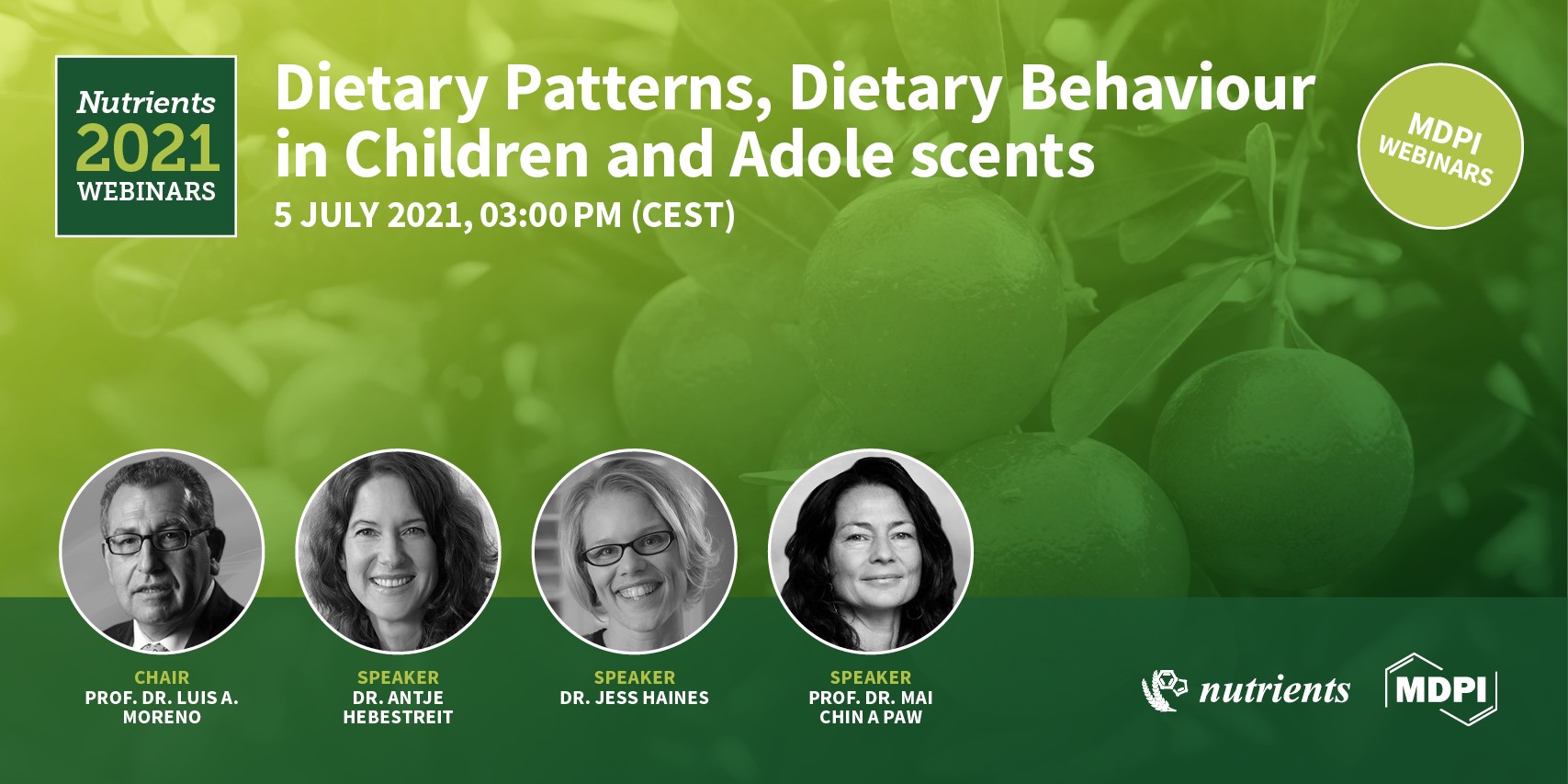
Dietary behaviours develop from early stages of life. Dietary patterns start to be established during childhood. Early interventions should be able to positively influence the development of healthy dietary patterns. In order to design intervention programs, the first step is to know what the main determinants of dietary behaviours and dietary patterns in children and adolescents are. Several strategies have been proposed to deal with optimal behaviour development. Of recent interest are the support of food literacy in families and co-creation strategies to improve energy balance-related behaviours. All the previously mentioned topics will be covered during the present webinar.
Date: 5 July 2021
Time: 3 p.m. (CEST)
Webinar ID: 917 5682 3262
Register for free here: https://nutrients-2.sciforum.net/#registration
Program
|
Speaker/Presentation |
Time in CEST |
|
Prof. Dr. Luis A. Moreno Chair Introduction |
3:00–3:10 pm |
|
Dr. Antje Hebestreit Determinants of Dietary Patterns and Dietary Behaviour in Children and Adolescents |
3:10–3:35 pm |
|
Dr. Jess Haines Strategies to Support Food Literacy Among Families |
3:35–4:00 pm |
|
Prof. Dr. Mai Chin A Paw Co-Creating Interventions to Improve Energy Balance Behaviours |
4:00–4:25 pm |
|
Q&A and Discussion |
4:25–4:45 pm |
|
Conclusion & Closing of Webinar |
4:45–5:00 pm |
Chair:
|
Prof. Dr. Luis A. Moreno "Growth, Exercise, Nutrition and Development" (GENUD) Research Group, Facultad de Ciencias de la Salud, Universidad de Zaragoza, Spain Luis A. Moreno is Professor of Public Health at the University of Zaragoza (Spain). He did his training as Medical Doctor and his PhD thesis at the University of Zaragoza. He studied Human Nutrition and Public and Community Health at the University of Nancy (France). He has participated in several research projects supported by the Spanish Ministry of Health, and the European commission (HELENA, IDEFICS, EURRECCA, ENERGY, ToyBox, iFamily, Feel4Diabetes, GrowH! And DigiCare4You). He has published more than 700 papers in peer-reviewed journals. He is the coordinator of the GENUD (Growth, Exercise, Nutrition and Development) research group, at the University of Zaragoza. He is a former member of the ESPGHAN Committee of Nutrition and former President of the Spanish Nutrition Society. |
|
Speakers:
|
Dr. Antje Hebestreit Leibniz Institute for Prevention Research and Epidemiology—BIPS GmbH, Germany Dr. Antje Hebestreit is head of the Unit Lifestyle-Related Disorders at the Leibniz Institute for Prevention Research and Epidemiology—BIPS, in Bremen, Germany. After her PhD in Nutritional Sciences and Home Economics, and further training in epidemiology, she worked as a Postdoctoral Research Fellow for Harvard University and as a consultant for the UN World Food Programme. Over the years, her work has focused on studying the role of dietary intake, dietary behaviour, and their determinants in the development of non-communicable diseases, as well as primary prevention strategies for childhood obesity. |
|
|
Dr. Jess Haines Department of Family Relations and Applied Nutrition, University of Guelph, Canada Jess Haines is a dietitian and a Professor of Applied Nutrition at the University of Guelph in Canada. Dr. Haines’ research aims to bridge epidemiologic research on the determinants of health behaviours with the design, implementation, and evaluation of interventions to support children’s healthy eating and growth. Dr. Haines is the Co-Director of the Guelph Family Health Study, a longitudinal family-based cohort, and the Director of the Parent–Child Feeding Laboratory, which focuses on identifying how parent–child feeding interactions influence children’s eating behaviours. |
|
|
Prof. Dr. Mai Chin A Paw Department of Public and Occupational Health, Amsterdam Public Health Research Institute, Amsterdam UMC, Vrije Universiteit Amsterdam, 1081 BT Amsterdam, The Netherlands Mai Chin A Paw dreams of a world where children grow up healthy and happy. Such a world provides plenty of opportunities for active play, inspiring education, and nutritious and delicious foods. Mai is fascinated by why we do what we do and how this affects health, with a particular interest in youth. As university chair of the Child and Adolescent Public Health research section of Amsterdam University Medical Center, she combines her scientific expertise in human movement science and epidemiology to unravel working mechanisms using innovative methodologies, exploring unique intervention strategies and creatively combining multiple disciplines. Mai is the current president of the International Society of Behavioral Nutrition and Physical Activity until June 2021. Growing up in a multicultural family, she learned to observe the world from various perspectives, enjoy diversity, believe in serendipity and search beyond the expected. This sculpted her unique scientific frame of mind. |
|
For any questions about the webinar, please send an email to nutrients.webinar@mdpi.com.
29 June 2021
Nutrients | New Section “Lipids” Established
We are pleased to announce the new Section “Lipids” (https://www.mdpi.com/journal/nutrients/sections/Lipids) in the journal Nutrients. Prof. Dr. Manohar Garg is serving as the Section Editor-in-Chief.
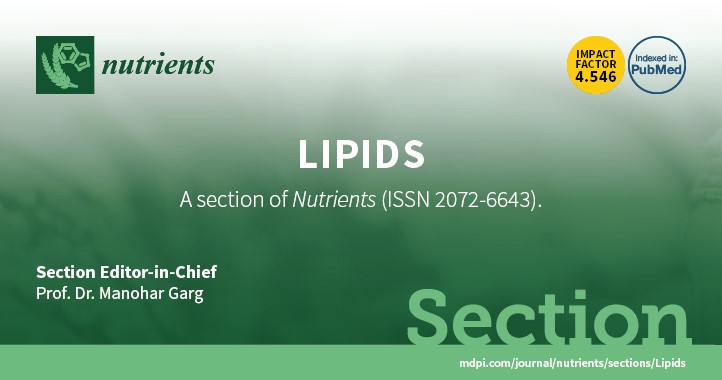
Lipids are no longer considered to only be important as energy-rich nutrients, and specific fatty acids and lipid-soluble substances are now known to act as metabolic regulators. Lipids also play an important role in the development of obesity, diabetes, cardiovascular disease, cancer, and mental illness. Some fatty acids and lipid-soluble substances have shown the ability to modulate the pathophysiology of these lifestyle diseases due to their unique route of absorption, selective incorporation into various tissues, and influence on metabolic pathways, resulting in alteration of blood lipid levels, pro- and anti-inflammatory mediators, platelet aggregation, eicosanoid production, and hormonal responses. The “Lipids” Section of Nutrients is open for contributions from health professionals and clinicians researching the area of lipids, including but not limited to:
- Medium chain fatty acids;
- Omega-3 polyunsaturated fatty acids;
- Monounsaturated fatty acids;
- Oils;
- Cholesterol;
- Fat-soluble vitamins;
- Lipids in pathology of the disease;
- Blood lipids and lipoproteins;
- Membrane lipids;
- Impact on inflammation, platelet aggregation, and blood pressure;
- Functional foods and lipids;
- Carotenoids;
- Polyphenols.
To access more detailed information, please see here: https://www.mdpi.com/journal/nutrients/sections/Lipids.
28 April 2021
Book Builder—Compile a Customized E-Book from Your Favorite MDPI Open Access Content
MDPI Books recently released Book Builder, a new online tool to conveniently arrange, design and produce an eBook from any content published in MDPI journals. Book Builder offers two functions: on the one hand (1) Selections, available to every registered user of MDPI; on the other hand (2) Special Issue Reprints, which can be used exclusively by Guest Editors of Special Issues.
Selections
In just a matter of a few clicks, all users are now able to assemble books from MDPI articles and receive instantaneous feedback in the form of a fully produced and compiled book (PDF), which can be downloaded or ordered as print copy. Selections can include any paper published with MDPI, picking and combining content from different journals and special issues.
This way, the user may for example choose to compile an ebook focusing around a particular topic, or assemble articles from a group of others.
We invite you to make yourself familiar with the new tool! The Book Builder can be found here: https://www.mdpi.com/books/book_builder.
Special Issue Reprints
The Book Builder allows Guest Editors of MDPI journals to create a reprint from a successfully completed Special Issue or Topical Collection in book format. If you are a Guest Editor for an MDPI journal, you can use the new tool to create an PDF document which includes all articles published in the Special Issue as well as a book cover and table of contents.
For Special Issues containing a minimum of 5 articles, the Guest Editor can request its publication on the MDPI Book platform. Published reprints are assigned an ISBN and DOI.
In addition to the PDF copy of the Reprint Book, as a token of our gratitude, MDPI offers every Guest Editor one (1) complimentary print copy (via print-on-demand). All contributors benefit from a discount on orders of any additional print copies, to share with colleagues or libraries or others.
In line with our organization's values, MDPI Books publishes all content in open access, promoting the exchange of ideas and knowledge in a globalized world. MDPI Books encompasses all the benefits of open access—high availability and visibility, as well as wide and rapid dissemination. MDPI Books are distributed under the terms and conditions of the Creative Commons Attribution License, meaning as an author you retain the copyright for your work. In addition, with MDPI Books you can complement the digital version of your work with a high-quality printed counterpart.
If you are interested in editing a book volume or series, or have a monograph manuscript to be considered for publication, please submit your proposal online and look at our Information for Authors.
Contact: Laura Wagner, MDPI Books Manager (email)
15 April 2021
MDPI Celebrates Company Milestone With 25th Anniversary Page
"We exist to help scientists achieve their own objectives"

In June of this year, MDPI will celebrate the 25th anniversary of its foundation. To mark this significant milestone, we have created a 25th Anniversary page on our website that evokes the development of our company over the past quarter-century.
MDPI has been a pioneer of Open Access publishing ever since the concept was first created.
In a wide-ranging interview, our CEO Delia Mihaila reflects on the company’s 25th anniversary and its contribution to the world of scientific publishing.
Delia considers how MDPI has evolved since starting life in 1996 as a visionary ‘project’ run out of an apartment in Basel, Switzerland, by Dr. Shu-Kun Lin. A chemist who was passionate about the long-term preservation of rare chemical sample, Dr. Lin was determined to help scholars publish their findings as quickly as possible and make their research results available to as wide a readership as possible worldwide. That determination remains unchanged 25 years later.
Today, MDPI is an international organization with over 4,000 employees based on three continents and in ten countries, and ranks among the world's top four academic publishers.
MDPI's mission is to accelerate access to new scientific research, delivering insight faster for researchers worldwide. Read more here about the company's remarkable success story and what the Open Access publishing model can offer the global scientific community.
10 March 2021
Journal Selector: Helping to Find the Right MDPI Journal for Your Article
At MDPI, we strive to make your online publication process seamless and efficient. To achieve this, our team is continuously developing tools and features to make the user experience useful and convenient.
As the number of academic papers continues to grow, so does the need to analyze and work with them on a large scale. This prompted us to design a new feature aimed at helping researchers find journals that are relevant to their publication by matching their abstract topic. In this regard, we designed a similarity model that automatically identifies the most suitable academic journals for your paper.
We are pleased to introduce Journal Selector, a new feature that measures similarity in academic contexts. By simply entering the title and/or abstract into our Journal Selector, the author will see a list of the most related scientific journals published by MDPI. This method helps authors select the correct journals for their papers, highlighting the time of publication and citability.
The methodology is known as representation learning, where words are represented as vectors in hyperspace. Representation helps us differentiate between different concepts within articles, and in turn, helps us identify similarities between them.
We used an advanced machine learning model to better capture the semantic meanings of words. This helps the algorithm make better predictions by leveraging scientific text representation. In turn, this ensures high precision, helping authors decide which journal they should submit their paper to.
The goal is to support authors to publish their work in the most suitable journal for their research, as fast as possible, accelerating their career progress.
Contact: Andrea Perlato, Head of Data Analytics, MDPI (email)
4 March 2021
Nutrients Established New Section—“Nutrition in Women”
Nutrients has established a new section called “Nutrition in Women”. This Section will publish high-level, peer-reviewed research on nutrition, dietary, and food approaches to understand the impact of nutrition on women’s health and disease across the lifespan. Papers in this section include basic and discovery science studies, clinical studies, and epidemiological investigations involving women only or studies of sex differences.
The following Special Issues of this section are currently open for submissions:
- Nutrition Challenges for Middle-Aged and Older Women (Deadline 30 April 2021)
- Nutrition and Women Bone Health (Deadline 18 May 2021)
- Nutrient Intake and Physical Exercise as Modulators of Healthy Women (Deadline 20 August 2021)
If you are interested in submitting a manuscript to any of these new sections, please click here.
To propose or request further information, please contact the Nutrients Editorial Office.
15 December 2020
MDPI adopts C4DISC principles to improve diversity and inclusion in scholarly communications
MDPI is proud to adopt the principles of the Coalition for Diversity & Inclusion in Scholarly Communications (C4DISC) to support building equity, inclusion, diversity, and accessibility in scholarly communications.
The C4DISC represents organizations and individuals working in scholarly communications and is focused on addressing issues of diversity and inclusion within the publishing industry.
MDPI’s Managing Editors encourage the Editors-in-Chief and Associate Editors to appoint diverse expert Editorial Boards. This is also reflective in our multi-national and inclusive workplace. We are proud to create equal opportunities without regard to gender, ethnicity, geographic location, sexual orientation, age, disability, political beliefs, religion, or socio-economic status. There is no place for discrimination in our workplace and editors of MDPI journals are to uphold these principles in high regard.
Representatives from C4DISC meet monthly, and have started to implement initiatives to shed light and improve on the lack of diversity in scholarly communications. Some of the initiatives include developing a joint statement of principles; conducting market research; providing training resources, best practices, toolkits, and documentation for our collective memberships; and establishing outreach programs, curricula, events, and publications.
The Coalition is committed to:
- eliminating barriers to participation, extending equitable opportunities across all stakeholders, and ensuring that our practices and policies promote equitable treatment and do not allow, condone, or result in discrimination;
- creating and maintaining an environment that respects diverse traditions, heritages, and experiences;
- promoting diversity in all staff, volunteers, and audiences, including full participation in programs, policy formulation, and decision-making;
- raising awareness about career opportunities in our industries to groups who are currently underrepresented in the workforce;
- supporting our members in achieving diversity and inclusion within their organizations.
14 December 2020
Article Layout and Templates Revised for Future Volumes
At MDPI we have slightly revised the layout for articles to be published in the 2021 Volume, starting at the end of December 2020. As of today, the article templates available for download on ‘Instructions for Authors’ pages have been updated.
The most noticeable change can be found on the first page of the article, where a left-hand column has been created to include the following front matter elements: (i) the recommended citation style for the article, (ii) the publishing history, (iii) as well as the Creative Commons Attribution license used (iv) a standard note regarding affiliations. At the same time, the extra spacing on the left means the authors’ affiliations are now more clearly set apart than before. Other front matter key elements such as journal logo, article type, article title, authors, abstract and keywords remain unchanged.
The blank column on the left runs through all pages in an article; as a result, the main text is slightly more condensed, which improve reader friendliness for smaller screens. Small figures/tables are aligned on the left with standard indenture, while large figures/tables are centered and covering the full width of the page. The revised layout was applied in the article pictured below, to serve as an example:

1) Information is displayed in the left information bar.

2) In the main text, there is a blank column on the left.

3) Small tables/figures are aligned on the left, large tables/figures are centered.
11 December 2020
2020 "Highly Cited Researchers" on MDPI Journal's Editorial Boards
We are pleased to acknowledge that many academic editors who have made an impact on MDPI journals as editorial board members, editors-in-chief, or section editors, are recognized as 2020 Highly Cited Researchers by Clarivate.
Highly Cited Researchers highlights the top 1% of researchers, by citations, in one or more of the 22 fields used in Clarivate Analytics Essential Science Indicators. We offer our congratulations to 279 academic editors of MDPI journals who were recognized as the most influential scholars in their fields in 2020.
Adams, Dave Agarwal, Ravi P. Ahn, Choon Ki Ahn, Myung-Ju Albrecht, Randy A. Andersson, Dan I. Anker, Stefan D. Apergis, Nicholas Ariga, Katsuhiko Artaxo, Paulo Balsamo, Gianpaolo Barba, Francisco J. Benediktsson, Jon Atli Benelli, Giovanni Bhatnagar, Amit Bialystok, Ellen Blaabjerg, Frede Blay, Jean-Yves Bogers, Marcel Bolton, Declan J. Boyer, Cyrille Brocca, Luca Bruix, Jordi Buhalis, Dimitrios Burdick, Jason A. Byrd, John C. Cabeza, Luisa F. Cabrerizo-Lorite, Francisco Javier Cai, Jianchao Calhoun, Vince D. Cantu, Robert C. Cerqueira, Miguel Chang, Jo-Shu Chau, Kwok-wing Chemat, Farid Chen, Jianmin Chen, Jun Chen, Min Chen, Shaowei Chen, Wei Chen, Wei-Hsin Chen, Xiaofeng Chen, Yangkang Chen, Zhi-Gang Chiclana, Francisco Corella, Dolores Cortes, Javier Cortes, Jorge Cummings, Kenneth Michael Dai, Shifeng Decker, Eric A. DePinho, Ronald A. Dimopoulos, Meletios-Athanasios Dincer, Ibrahim Du, Yihong Dupont, Didier Edwards, David Ellahi, Rahmat Ellis, Erle C. ElMasry, Gamal Esteller, Manel Estruch, Ramón Fang, Chuanglin Fasano, Alessio Fernandez-Lafuente, Roberto Ferreira, Isabel Fortino, Giancarlo Galluzzi, Lorenzo Galvano, Fabio Gandomi, Amir H. Gandomi, Amir H. Gao, Bin Gao, Feng Gao, Wei Garbe, Claus García, Hermenegildo Geschwind, Daniel H. Giampieri, Francesca Giralt, Sergio A. Glanz, Karen Goldewijk, Kees Klein Gössling, Stefan Govindan, Kannan Granato, Daniel Grosso, Giuseppe Grosso, Giuseppe Guerrero, Josep M. Haase, Dagmar Hagger, Martin S. Hamblin, Michael R. Han, Heesup Jankovic, Joseph Janotti, Anderson |
Jiang, Hai-Long Kalaji, Hazem M. Kalantar-Zadeh, Kourosh Kaner, Richard B. Karimi, Hamid Reza Kataoka, Kazunori Keesstra, Saskia Kepp, Oliver Kerminen, Veli-Matti Keyzers, Robert A. Khademhosseini, Ali Khan, Nafees A. Kim, Ki-Hyun Klemeš, Jiří Jaromír Klenk, Hans-Peter Konopleva, Marina Y. Krammer, Florian Krebs, Frederik C. Kroemer, Guido Kudo, Masatoshi Kurths, Juergen Kurzrock, Razelle Kuznetsov, Nikolay V. Kyrpides, Nikos C. La Vecchia, Carlo Lai, Yuekun Lam, James Lancellotti, Patrizio Lee, Sangmoon Leung, Victor C. M. Li, Jinghong Li, Yurui Lindahl, José M. Merigó Lip, Gregory Y. H. Loh, Xian Jun Long, Hualou Lund, Henrik Luo, Jingshan Luque, Rafael Lyons, Timothy W. Ma, Jun Ma, Wen-Xiu Ma, Yanming Maeda, Keisuke Makarova, Kira Mantovani, Alberto Martín-Belloso, Olga Martinoia, Enrico Marzband, Mousa Masclaux-Daubresse, Celine Masson, Patrick Mateos, María Victoria Mathiesen, Brian Vad Matyjaszewski, Krzysztof McArthur, Grant A. McCauley, Darren Medlock, Jolyon M. Melero, Ignacio Mezzetti, Bruno Miroshnichenko, Andrey E. Moran, Daniel Mueller, Lukas A. Mueller-Roeber, Bernd Naushad, Mu Nemeroff, Charles B. Nieto, Juan J. O'Donnell, Colm Ogino, Shuji Olabi, Abdul-Ghani O'Regan, Donal Orsini, Nicola Oswald, Isabelle P. Ozcan, Aydogan Pahl-Wostl, Claudia Pang, Huan Payne, James E. Peng, Shushi Perc, Matjaz Perez-Alvarez, Jose Angel Piquero, Alex R. Ploss, Alexander Postolache, Mihai Pradhan, Biswajeet Prinsep, Michele R. Qian, Dong Qu, Xiaogang Reiter, Russel J. Riahi, Keywan Richter, Andreas Rignot, Eric Robert, Caroline Ros, Emilio Rosell, Rafael |
Rosen, Marc A. |
The full list of 2020 Highly Cited Researchers can be accessed on https://recognition.webofsciencegroup.com/awards/highly-cited/2020/
--- Highly Cited Researchers (HCR) is a Clarivate product.
23 July 2020
The 1st International Electronic Conference on Nutrients (IECN)—Open for Submission
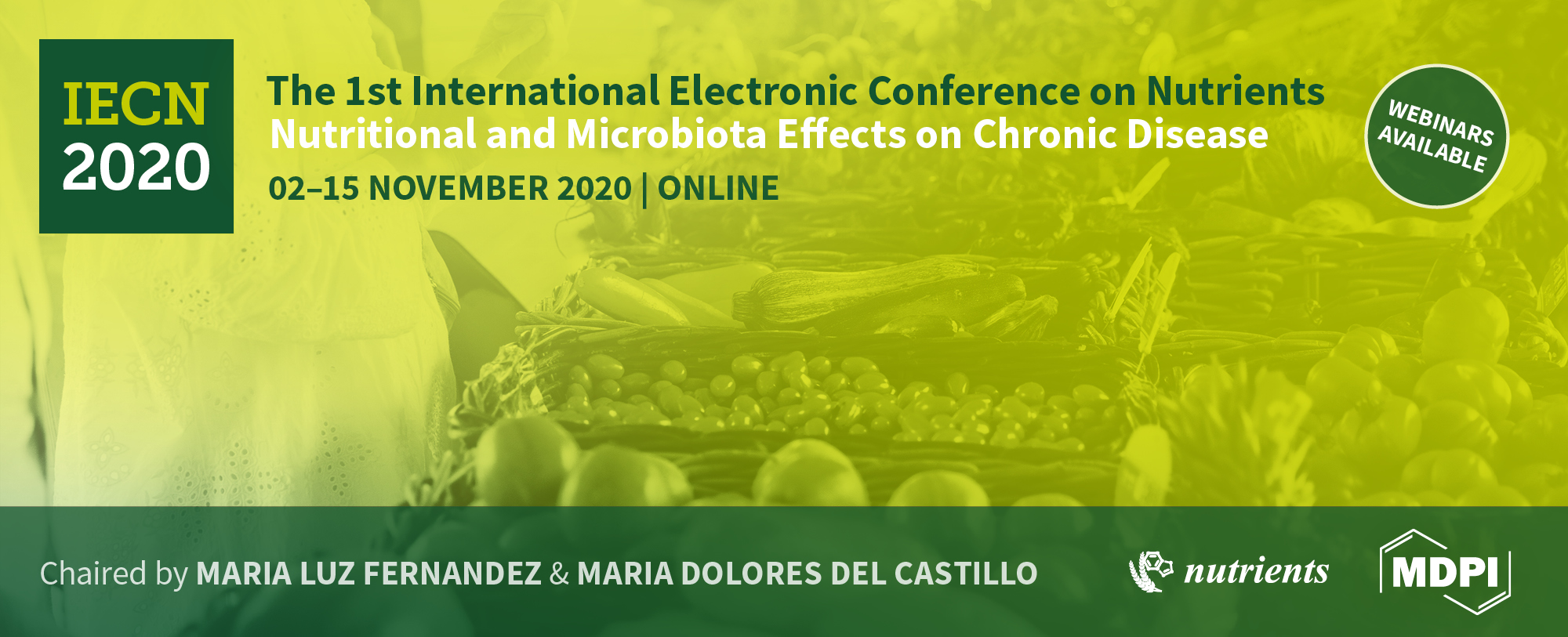
We are pleased to announce that the 1st International Electronic Conference on Nutrients (IECN)—Nutritional and Microbiota Effects on Chronic Disease, chaired by Prof. Dr. Maria Luz Fernandez, from University of Connecticut, USA, and Prof. Dr. Michael E. Symonds, from University of Nottingham, UK, will be held 2–15 November 2020 at Sciforum (https://iecn2020.sciforum.net/).
These are some of the topics that we expect to cover:
- Interrelationships among microbiota, poor nutrition choices, and chronic disease.
- Simple sugars, diabetes, and metabolic syndrome;
- Saturated fat and heart disease;
- Increased caloric intake and obesity;
- Interactive effects of physical activity.
- Potential nutraceutical effects of nutrients, phytochemicals, and microbiota in chronic metabolic disorders.
- Obesity;
- Inflammation;
- Metabolic syndrome;
- Insulin resistance and diabetes;
- Hypertension and dyslipidemias;
- Fatty liver disease.
- Brain–gut axis and chronic disease.
- Nutrients;
- Phytochemicals;
- Gastrointestinal health;
- Food/eating addiction;
- Interrelationship between gut–brain axis and gut–lung axis.
The conference will be completely free of charge, both to attend and for scholars to upload and present their latest work on the conference platform. There will also be the possibility to submit selected extended papers to the Special Issue of the conference entitled "Selected Papers from the 1st International Electronic Conference on Nutrients—Nutritional and Microbiota Effects on Chronic Disease" (https://www.mdpi.com/journal/nutrients/special_issues/Nutritional_Microbiota) in Nutrients (ISSN 2072-6643, 4.546/Q1; https://www.mdpi.com/journal/nutrients), with a 20% discount on the Article Processing Charge
Important Dates
- Abstract Submission: 15 September, 2020;
- Acceptance Notification: 1 October, 2020;
- Full Paper Submission: 15 October, 2020;
- Conference Open: 2–15 November, 2020.
For more information on IECN, please visit the conference website (https://iecn2020.sciforum.net/) or contact us by email (iecn2020@mdpi.com).
9 July 2020
Open Access Agreement Between Jisc Collections and MDPI
We are delighted to announce the establishment of our Open Access agreement with Jisc Collections, which will allow UK institutions to benefit from access to article processing charge (APC) discounts and streamlined payment workflows.
All institutions participating in the agreement will also gain access to the MDPI online submission system where they can find full article metadata and pricing information for easy identification and additional transparency.
Eligible authors affiliated with the participating institutions are prompted to choose the corresponding Institutional Open Access Program (IOAP) when they submit an article via our online submission system.
About Jisc
Jisc's vision is for the UK to be the most digitally advanced education and research nation in the world. At its heart is the super-fast national research and education network, Janet, with built-in cyber security protection. Jisc also provides technology solutions for its members (colleges, universities and research centres) and customers (public sector bodies), helps members save time and money by negotiating sector-wide deals and provides advice and practical assistance on digital technology. Jisc is funded by the UK higher and further education and research funding bodies and member institutions.
For more information, contact helen.dobson@jisc.ac.uk.
About MDPI
MDPI is a publisher of fully peer-reviewed, Open Access journals with a focus on thorough and rapid editorial processing. Its aim is to ensure that high-quality research is verified and made available to the research community as quickly as possible. MDPI stands at the forefront of the Open Access movement, having launched its first online journal Molecules in 1996. Today, MDPI is a leader in Open Access publishing with over 250 journals across all research disciplines, and all content published under a Creative Commons Attribution License (CC BY).
For any questions about this agreement, please contact the MDPI IOAP team at ioap@mdpi.com.
29 June 2020
Updated Impact Factors Released in the Journal Citation Reports (Clarivate)
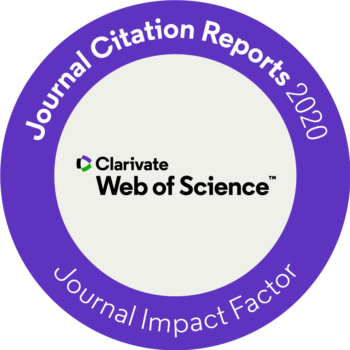
The updated citation metrics have been released in the Journal Citation Reports (JCR), published by Clarivate. The recent release of the JCR includes seventy-one MDPI titles. Out of these, 18 titles are newcomers, receiving a first Journal Impact Factor which is based on citation activity in 2019: Actuators, Agriculture, Biology, Biomedicines, Biosensors, Chemosensors, Children, Healthcare, Journal of Fungi, Journal of Personalized Medicine (JPM), Land, Life, Magnetochemistry, Membranes, Pharmaceuticals, Photonics, Separations and Toxics.
- Out of the previously listed journals, a total of 72 percent boast an increased Impact Factor.
- 25 journals are ranked among the top 25% of journals in at least one of the categories they are ranked for.
- Articles published in 2019 in MDPI journals account for approximately 17 percent of of articles published in gold Open Access journals covered in the Science Citation Index Expanded (SCIE) and Social Sciences Citation Index (SSCI).
First Impact Factors
| Journal | Impact Factor | Rank | Category | Details |
| Actuators | 1.957 | 31/64 (Q2) | • Instruments & Instrumentation | Link |
| Agriculture | 2.072 | 25/91 (Q2) | • Agronomy | Link |
| Biology | 3.796 | 19/93 (Q1) | • Biology | Link |
| Biomedicines | 4.717 | 30/138 (Q1) 36/270 (Q1) |
• Medicine, Research & Experimental • Pharmacology & Pharmacy |
Link |
| Biosensors | 3.240 | 24/86 (Q2) | • Chemistry, Analytical | Link |
| Chemosensors | 3.108 | 16/64 (Q1) 27/86 (Q2) 13/27 (Q2) |
• Instruments & Instrumentation • Chemistry, Analytical • Electrochemistry |
Link |
| Children | 2.078 | 50/128 (Q2) | • Pediatrics | Link |
| Healthcare | 1.916 | 62/102 (Q3) 45/87 (Q3) |
• Health Care Sciences & Services (SCIE) • Health Policy & Services (SSCI) |
Link |
| Journal of Fungi | 4.621 | 5/29 (Q1) 31/135 (Q1) |
• Mycology • Microbiology |
Link |
| Journal of Personalized Medicine | 4.433 | 24/165 (Q1) 10/102 (Q1) |
• Medicine, General & Internal • Health Care Sciences & Services |
Link |
| Land | 2.429 | 58/123 (Q2) | • Environmental Studies (SSCI) | Link |
| Life | 2.991 | 26/93 (Q2) 109/267 (Q2) |
• Biology • Microbiology |
Link |
| Magnetochemistry | 1.947 | 22/45 (Q2) 109/159 (Q3) 201/314 (Q3) |
• Chemistry, Inorganic & Nuclear • Chemistry, Physical • Materials Science, Multidisciplinary |
Link |
| Membranes | 3.094 | 53/143 (Q2) 129/314 (Q2) 23/89 (Q2) |
• Engineering, Chemical • Materials Science, Multidisciplinary • Polymer Science |
Link |
| Pharmaceuticals | 4.286 | 49/270 (Q1) | • Pharmacology & Pharmacy | Link |
| Photonics | 2.140 | 48/97 (Q2) | • Optics | Link |
| Separations | 1.900 | 53/86 (Q3) | • Chemistry, Analytical | Link |
| Toxics | 3.271 | 32/92 (Q2) 92/265 (Q2) |
• Toxicology • Environmental Sciences |
Link |
Updated Impact Factors
| Journal | Impact Factor | Rank | Category | Details |
| Agronomy | 2.603 | 18/91 (Q1) 65/234 (Q2) |
• Agronomy • Plant Sciences |
Link |
| Animals | 2.323 | 10/63 (Q1) 14/142 (Q1) |
• Agriculture, Dairy & Animal Science • Veterinary Sciences |
Link |
| Antibiotics | 3.893 | 23/93 (Q1) 64/270 (Q1) |
• Infectious Diseases • Pharmacology & Pharmacy |
Link |
| Antioxidants | 5.014 | 10/139 (Q1) 56/297 (Q1) 7/61 (Q1) |
• Food Science & Technology • Biochemistry & Molecular Biology • Chemistry, Medicinal |
Link |
| Applied Sciences | 2.474 | 161/314 (Q3) 32/91 (Q2) 88/177 (Q2) 62/154 (Q2) |
• Materials Science, Multidisciplinary • Engineering, Multidisciplinary • Chemistry, Multidisciplinary • Physics, Applied |
Link |
| Atmosphere | 2.397 | 48/93 (Q3) | • Meteorology & Atmospheric Sciences | Link |
| Biomolecules | 4.082 | 98/297 (Q2) | • Biochemistry & Molecular Biology | Link |
| Brain Sciences | 3.332 | 113/271 (Q2) | • Neurosciences | Link |
| Cancers | 6.126 | 37/244 (Q1) | • Oncology | Link |
| Catalysts | 3.520 | 65/159 (Q2) | • Chemistry, Physical | Link |
| Cells | 4.366 | 70/195 (Q2) | • Cell Biology | Link |
| Coatings | 2.436 | 10/21 (Q2) | • Materials Science, Coatings & Films | Link |
| Crystals | 2.404 | 10/26 (Q2) 165/314 (Q3) |
• Crystallography • Materials Science, Multidisciplinary |
Link |
| Diagnostics | 3.110 | 39/165 (Q1) | • Medicine, General & Internal | Link |
| Diversity | 1.402 | 119/168 (Q3) | • Ecology | Link |
| Electronics | 2.412 | 125/266 (Q2) | • Engineering, Electrical & Electronic | Link |
| Energies | 2.702 | 63/112 (Q3) | • Energy & Fuels | Link |
| Entropy | 2.494 | 33/85 (Q2) | • Physics, Multidisciplinary | Link |
| Foods | 4.092 | 27/139 (Q1) | • Food Science & Technology | Link |
| Forests | 2.221 | 17/68 (Q1) | • Forestry | Link |
| Genes | 3.759 | 53/177 (Q2) | • Genetics & Heredity | Link |
| Insects | 2.220 | 18/101 (Q1) | • Entomology | Link |
| International Journal of Environmental Research and Public Health (IJERPH) | 2.849 | 58/193 (Q2) 32/170 (Q1) 105/265 (Q2) |
• Public, Environmental & Occupational Health (SCIE) • Public, Environmental & Occupational Health (SSCI) • Environmental Sciences (SCIE) |
Link |
| International Journal of Molecular Sciences (IJMS) | 4.556 | 74/297 (Q1) 48/177 (Q2) |
• Biochemistry & Molecular Biology • Chemistry, Multidisciplinary |
Link |
| ISPRS International Journal of Geo-Information (IJGI) | 2.239 | 31/50 (Q3) 18/30 (Q3) |
• Geography, Physical • Remote Sensing |
Link |
| Journal of Clinical Medicine | 3.303 | 36/165 (Q1) | • Medicine, General & Internal | Link |
| Journal of Marine Science and Engineering | 2.033 | 31/66 (Q2) | • Oceanography | Link |
| Marine Drugs | 4.073 | 16/61 (Q2) | • Chemistry, Medicinal | Link |
| Materials | 3.057 | 132/314 (Q2) | • Materials Science, Multidisciplinary | Link |
| Mathematics | 1.747 | 28/324 (Q1) | • Mathematics | Link |
| Medicina | 1.205 | 107/165 (Q3) | • Medicine, General & Internal | Link |
| Metabolites | 4.097 | 95/297 (Q2) | • Biochemistry & Molecular Biology | Link |
| Metals | 2.117 | 18/79 (Q1) 185/314 (Q3) |
• Metallurgy & Metallurgical Engineering • Materials Science, Multidisciplinary |
Link |
| Micromachines | 2.523 | 56/92 (Q3) 23/64 (Q2) |
• Nanoscience & Nanotechnology • Instruments & Instrumentation |
Link |
| Microorganisms | 4.152 | 37/135 (Q2) | • Microbiology | Link |
| Minerals | 2.380 | 6/21 (Q2) 11/30 (Q2) |
• Mining & Mineral Processing • Mineralogy |
Link |
| Molecules | 3.267 | 70/177 (Q2) 141/297 (Q2) |
• Chemistry, Multidisciplinary • Biochemistry & Molecular Biology |
Link |
| Nanomaterials | 4.324 | 89/314 (Q2) 42/103 (Q2) |
• Materials Science, Multidisciplinary • Nanoscience & Nanotechnology |
Link |
| Nutrients | 4.546 | 17/89 (Q1) | • Nutrition & Dietetics | Link |
| Pathogens | 3.018 | 65/135 (Q2) | • Microbiology | Link |
| Pharmaceutics | 4.421 | 44/270 (Q1) | • Pharmacology & Pharmacy | Link |
| Plants | 2.762 | 58/234 (Q1) | • Plant Sciences | Link |
| Polymers | 3.426 | 16/89 (Q1) | • Polymer Science | Link |
| Processes | 2.753 | 59/143 (Q2) | • Engineering, Chemical | Link |
| Remote Sensing | 4.509 | 9/30 (Q2) | • Remote Sensing | Link |
| Sensors | 3.275 | 22/86 (Q2) 77/266 (Q2) 15/64 (Q1) |
• Chemistry, Analytical • Engineering, Electrical & Electronic • Instruments & Instrumentation |
Link |
| Sustainability | 2.576 | 120/265 (Q2) 26/41 (Q3) 53/123 (Q2) 6/8 (Q3) |
• Environmental Sciences (SCIE) • Green & Sustainable Science & Technology (SCIE) • Environmental Studies (SSCI) • Green & Sustainable Science & Technology (SSCI) |
Link |
| Symmetry | 2.645 | 29/71 (Q2) | • Multidisciplinary Sciences | Link |
| Toxins | 3.531 | 21/92 (Q1) 34/139 (Q1) |
• Toxicology • Food Science & Technology |
Link |
| Universe | 1.752 | 18/29 (Q3) 42/68 (Q3) |
• Physics, Particles & Fields • Astronomy & Astrophysics |
Link |
| Vaccines | 4.086 | 57/158 (Q2) 50/138 (Q2) |
• Immunology • Medicine, Research & Experimental |
Link |
| Viruses | 3.816 | 12/37 (Q2) | • Virology | Link |
| Water | 2.544 | 31/94 (Q2) | • Water Resources | Link |
Source: Clarivate 2020, InCites Journal Citation Reports®.
25 June 2020
The Spanish Nutrition Society (SEÑ) is Now an Affiliated Society Member of Nutrients
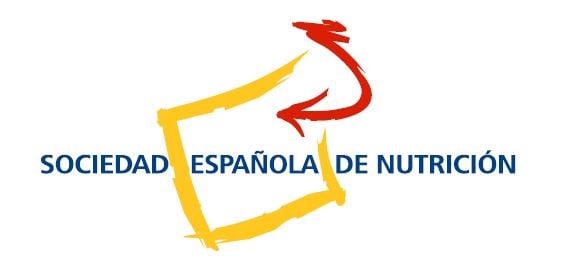
In June 2020, the Spanish Nutrition Society (SEÑ) became affiliated to Nutrients. As part of this collaboration, all members of SEÑ enjoy a discount on the article processing charges (APC) when submitting articles to Nutrients.
The Spanish Nutrition Society (SEÑ) was founded in 1978 to promote the development, innovation, research and education of Nutrition in Spain. It organizes scientific meetings and seeks other means of establishing and maintaining contact between Spanish nutritionists as well as between them and foreign scientists.
SEÑ is a professional organization whose functions are highly relevant to the scope of Nutrients. We look forward to collaborating with SEÑ and publishing state-of-the-art research from its members in this field.
24 June 2020
Nutrients Free Webinar: Diet and CKD: Old and New Concepts—8 June 2020

MDPI has provided several Free Open Platforms that may help to accelerate scientific exchange and provide support to academics during this particularly tough period. Thanks to our brilliant technical support, we are pleased to report that the first Nutrients webinar on Diet and CKD: Old and New Concepts is coming soon.
Date: Wednesday 8 June 2020 | 03:00 pm (CEST) | 09:00am (EDT) | 09:00pm (CST)
Duration: Maximum 2 hours
Webinar ID: 886 7523 9724
Register for Free Here: https://sciforum.net/conference/Nutrients-1
Chair:
|
|
Presentation: His main fields of clinical and research interest are kidney transplantation, clinical nephrology, CKD-MBD, acid-base and electrolyte disturbances. |
|
Prof. Dr. Piergiorgio Messa Guest Editor of “Renal Nutrition and Metabolism” |
|
Speakers:
|
|
Presentation: CKD progression, kidney failure, hypertension, dialysis, and CV risk in uremic patients. |
|
Prof. Dr. Francesca Mallamaci |
|
|
|
Presentation: His main research interests include the pathological mechanisms involved in extraosseous calcifications, and the phosphate and vitamin D metabolism in chronic kidney disease-mineral and bone disorder (CKD-MBD), and he has served as principal investigator in several clinical multicentre trials in the CKD-MBD field. |
|
Prof. Dr. Markus Ketteler |
|
|
|
Presentation: His main research interests include various aspects of inflammation, wasting, and metabolism in chronic kidney disease patients. |
|
Prof. Dr. Peter Stenvinkel |
|
For any questions about the webinar, please send an email to webinars@mdpi.com.
13 May 2020
COVID-19 Academic Resources Center

Since 1996, MDPI has been committed to supporting the research community by providing the latest research freely available and making relevant and useful research available as quickly as possible. The world is current experiencing a pandemic of COVID-19, and researchers are working extremely hard to understand it and find a cure.
The values MDPI holds strongly are particularly important at the moment, and we will continue to publish relevant, peer-reviewed research as quickly as possible in open access format. This means that it will immediately be available for researchers, health professionals, and the general public to read, distribute, and reuse. We believe that scientific advancements will be crucial to overcoming this pandemic, and will do everything we can to support researchers working looking for solutions.
COVID-19 Academic Resources Center contains a variety of information related to COVID-19 available from MDPI, including journal articles, special issues, and preprints, among others.
For more information, please visit: https://www.mdpi.com/covid-19
20 April 2020
Meet us at the 2020 IAFP (International Association for Food Protection) Annual Meeting, held in Cleveland, Ohio, USA, 25–28 October 2020.

MDPI will be attending 2020 IAFP Annual Meeting, held in Cleveland, Ohio, USA, 25–28 October 2020.
Each year, the International Association for Food Protection hosts an Annual Meeting, providing attendees with information on current and emerging food safety issues, the latest science, innovative solutions to new and recurring problems, and the opportunity to network with thousands of food safety professionals from around the globe. Held in various locations throughout North America, this meeting has grown over the years to become the leading food safety conference worldwide. IAFP 2020 will be held at the Huntington Convention Center of Cleveland in Cleveland, Ohio.
The IAFP Annual Meeting is attended by more than 3,800 of the top industry, academic and governmental food safety professionals from six continents. This renowned event owes its reputation and success to the quantity, quality, and diversity of each year’s program; the quality and relevance of exhibits sharing the latest in available technologies; leading experts speaking on a variety of timely topics; and special recognition of outstanding professionals and students for their contributions in the food safety field.
The following MDPI journals will be represented:
- Foods (Leading journal)
- Microorganisms (co-leading)
- Nutrients
- Sustainability
- Safety
- Applied Sciences
- Antioxidants
If you are also attending this conference, feel free to stop by our booth (Booth #736). Our delegates look forward to meeting you in person to answer any questions you may have. For more information about the conference, please see the following link: http://www.foodprotection.org/annualmeeting/
9 April 2020
Free Open Platforms to Support Academics During the COVID-19 Pandemic

As a leading Open Access publisher, MDPI is committed to fostering open scientific exchange in all forms across all disciplines. Due to the outbreak of COVID-19, many researchers have to stay at home and many academic conferences have been cancelled or postponed. In light of these changes, MDPI has adopted numerous initiatives that may help accelerate scientific exchange and provide support to the academics during this period.
Scholarly Community—Encyclopedia
Encyclopedia is an online reference created and curated by active scholars. It aims to highlight the latest research results as well as providing benchmark information for researchers and the general public interested in accurate and advanced knowledge on specific topics.
Comprehensive and Free Literature Database—Scilit
Scilit is a comprehensive, free database for scientists that uses a new method to collate data and index scientific material. Our crawlers extract the latest data from CrossRef and PubMed on a daily basis. This means that newly published articles are immediately added to Scilit.
Display Academic Achievements—SciProfiles
SciProfiles is an innovative social network for researchers and scholars that is developed by MDPI. In line with our broad mission, the purpose of SciProfiles is to accelerate discovery and innovation by facilitating immediate access to research results and providing opportunities for academic networking.
Organize and Participate in Conferences Online—Sciforum
Sciforum is an event planning platform that supports open science by offering the opportunity to host and participate in academic conferences. It provides an environment for scholarly exchange, discussion of topics of current interest, building of networks, and establishing collaborations.
Post Early Versions of Research Outputs—Preprints
Preprints is a platform dedicated to making early versions of research outputs permanently available and citable. We post original research articles and comprehensive reviews, and papers can be updated by authors at any time. Content on Preprints is not peer-reviewed, and feedback can be received from readers.
***
MDPI remains committed to open science and open data and has signed a statement, along with more than thirty scholarly publishers, showing our intention to facilitate sharing of new research findings as early on as possible. The initiative sees publishers collectively removing barriers to new research, in the face of a global healthcare crisis.
25 March 2020
MDPI Comment on the COVID-19 Virus
The world is currently suffering from a global pandemic of the corona virus COVID-19. MDPI expresses its sympathies for all of those affected by the virus and stands in solidarity with medical staff and researchers treating patients and searching for scientific solutions.
MDPI has previously published papers covering corona viruses in addition to new papers on the current outbreak, see all papers here. In particular, Viruses has published a number of Special Issues and papers on the topic (see here, here, and here) as well as a forthcoming Special Issue.
Alongside journal articles, MDPI has been a strong supporter of preprints, which are increasingly being used to rapidly disseminate the latest research, and we run the preprint server Preprints.org. Our database of research articles, Scilit, is free to use and covers all publishers including preprint servers. New papers are often in search results within hours of publication and users can set up alerts for new papers.
Our main priority during this period has been the health and safety of staff, and we continue to allow staff to work at home and closely monitor the situation in all locations in which we work. Despite the restrictions, we continue to provide a full publication service and, by close collaboration with our editorial boards and making use our in-house teams, ensure that there are no unnecessary delays in publishing vital research. Fast and open publication has always been at the core of MDPI values and is now more important than ever.
We hope that a solution to the current situation will emerge soon. In the meantime, we will do our best to continue communicating vital research in all fields.
19 March 2020
Nutrients Award for Young Investigator 2020

Dear Colleague,
We are inviting nomination for the Nutrients Award for Young Investigators 2020, which will be given for remarkable research achievements or for career achievements. The nominations will be assessed by an Evaluation Committee presided by the Editors-in-Chief of Nutrients Prof. Dr. Lluis Serra-Majem and Prof. Dr. Maria Luz Fernandez.
Nutrients AWARD
FOR YOUNG INVESTIGATOR 2020
Candidates’ Requirements:
- Ground-breaking contribution to the advancement of Nutrition and Dietetics
- 35 years age and under (by 30 September 2020)
- Candidates must be nominated by their supervisor(s).
Required Nomination Documents:
- Curriculum Vitae and a list of publications
- A description of the candidate’s research and a scanned copy of the candidate’s doctorate certificate
- Nomination letter from your supervisor in Nutrition and Dietetics field
The Award will consist of 2000 Swiss Francs and a waiver of the 2000 Swiss Francs article processing fee for a manuscript accepted for publication in Nutrients, and there will be two awardees.
Please send the nomination by 30 September 2020. The winners will be announced in Nutrients by 30 November 2020.
Please send your nomination to the Nutrients Editorial Office at nutrients@mdpi.com by 30 September 2020.
Nutrients Editorial Office
St. Alban-Anlage 66
CH-4052, Basel, Seitzerland
nutrients@mdpi.com
https://www.mdpi.com/journal/nutrients
18 March 2020
MDPI Co-Signed Position Statement on Transformative Agreements
The advantages of the open access model of scientific publishing are being increasingly recognized in the scientific community. It allows new scientific evidence to be accessed from the moment of publication for free by anyone around the globe, boosting the impact of new research. In response, many funders, libraries and universities have been adopting new principles to accelerate the transition to open access.
Recently, “transformative agreements” have been negotiated between traditional publishers and various institutions. While increasing the number of open access papers, these agreements lack binding commitments to a full transition to open access, their conditions vary across different regions, and access is still limited for many users.
MDPI is a co-signatory of the recent position statement raising concerns about potential downsides of transformative agreements and how they may delay a full transition to open access. The statement highlights that these models “risk perpetuating current limitations on access, transparency and market competitiveness, while simultaneously facilitating excessive charges on the public purse”.
As a pioneering open access journal publisher, MDPI is the first to promote the importance of science being made available to everyone. Our peer-reviewed journals, covering diverse academic disciplines, are fully accessible to the public free of charge under a Creative Commons Attribution License (CC BY). This is why, along with other open access publishers, MDPI is a proud signatory of the position paper and is committed to contributing to the replacement of weak transitional agreements with “agreements with publishers that are already fully committed to open science and who offer full, immediate and transparent Open Access”.
Read the position paper here
16 March 2020
Encyclopedia Outstanding Contributor Awards 2020 - Open for Application
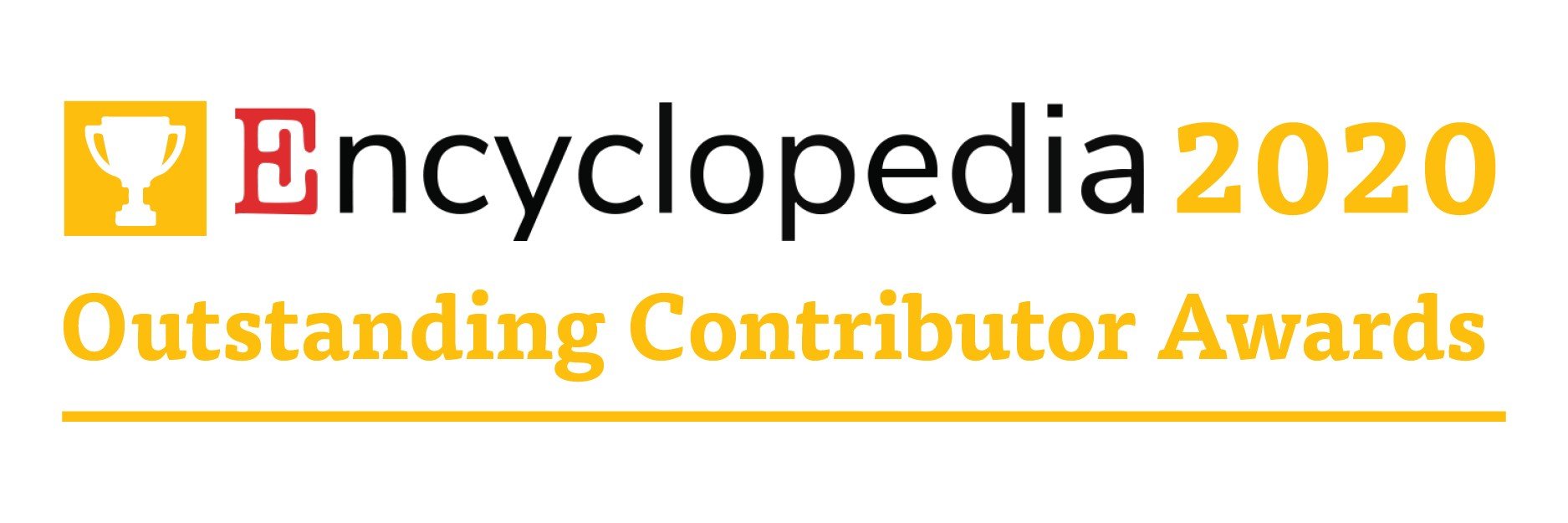
We are pleased to announce that Encyclopedia will be awarding five Outstanding Contributor Awards for researchers in 2020. The nominations and applications will be assessed by an Evaluation Committee consisting of senior scholars from the Encyclopedia Editorial Board.
Prize for Winners
- An official certificate;
- A cash award of 500 CHF or an MDPI discount voucher of 800 CHF.
Application Deadline
31 December, 2020 (Please send your application email with a list of all entries you contributed to our office before the deadline: office@encyclopedia.pub)
Candidate Requirements
- Have a Ph.D. degree;
- Have more than three qualified entries published in Encyclopedia in 2020.
Evaluation Standards
- Number of entries published in Encyclopedia in 2020;
- Quality of entries online (including length, figure quality, and novelty);
- Impact of entries (including the number of likes, discussion contents, views, and downloads).
If you are a researcher and have not yet contribute entries to Encyclopedia, please do not miss this chance to highlight your research results.
19 February 2020
Meet Us at the 2020 Annual Meeting of American Society for Nutrition (Nutrition 2020) in Seattle, WA, USA, 30 May–2 June 2020

(Update 5 March 2020) Note from the organizers: "Nutrition 2020 is currently proceeding as planned [...]. ASN is carefully monitoring health and safety updates and recommendations."dd
MDPI will be attending the 2020 Annual Meeting of American Society for Nutrition in Washington State Convention Center, Seattle, WA, USA, 30 May–2 June 2020.
At Nutrition 2020 over 3,500 of the top scientific researchers, practitioners, global and public health professionals, policy makers and advocacy leaders, industry, media and other related professionals will gather to advance nutrition science and its practical application.
Nutrition offers the latest and best nutrition research, the opportunity to present research, network with peers, and touch and see the latest products and technology in the exhibit hall.
Nutrition is an immersive nutrition experience offering the greatest minds in nutrition science, superior research, interactive exhibits, new technology, and boundless opportunities for networking in a welcoming environment.
The following MDPI journals will be represented:
If you are also attending this conference, please feel free to stop by our booth (Booth 201). Our delegates look forward to meeting you in person to answer any questions you may have. For more information about the conference, please visit: https://meeting.nutrition.org/.
20 November 2019
Meet Us at ICoFF2019 and ISNFF2019 in Kobe, Japan, 1–5 December 2019
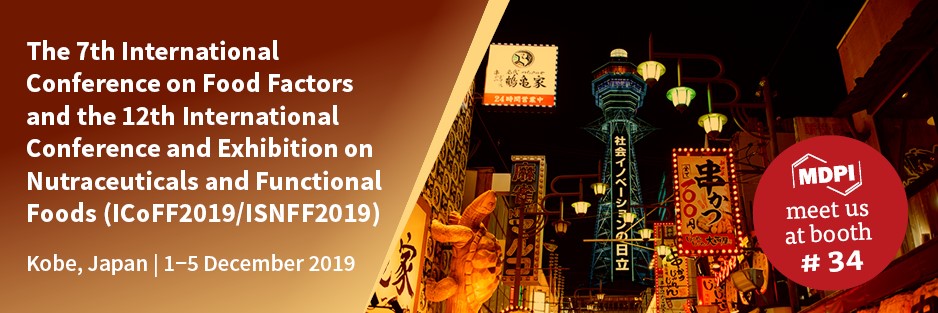
MDPI will be attending the 7th International Conference on Food Factors and the 12th International Conference and Exhibition on Nutraceuticals and Functional Foods (ICoFF2019 / ISNFF2019) in Kobe, Japan, 1–5 December 2019.
With the mission of promoting research into all aspects of basic and applied Food and Nutritional Science, ICoFF held its first conference in 1995 and has continued to hold every four years. ICoFF is one of the largest international conferences for researchers, scientists, professors and students in the field of food factors and their health-promoting effects. ISNFF, founded in 2007, has been focusing on the research and development on materials that can be used as functional foods.
The following MDPI journals will be represented:
If you are also attending this conference, please feel free to stop by our booth (Booth #34). Our delegates look forward to meeting you in person to answer any questions you may have. For more information about the conference, please visit: http://icoff2019.umin.jp/index.html.
11 October 2019
Introducing SciProfiles, an Academic Social Network
MDPI is pleased to announce the release of SciProfiles, its social network platform for researchers and scholars.
The purpose of SciProfiles is aligned with MDPI’s broad mission to accelerate discovery and innovation by facilitating immediate access to research results and to serve scholars and communities by providing opportunities for academic networking.
SciProfiles also ambitions to serve as a sustainable, transparent and community-driven research evaluation system aligned with the DORA principles (https://sfdora.org/). Through their scientific profiles, academics can highlight their contribution to research communities, and measure their impact on their field, beyond publication numbers and impact factors. SciProfiles is currently a beta version and will enrich to give researchers the possibility to highlight all of their contributions to science and their scientific communities as authors, reviewers, editors, conference organizers, conference panelists, conference keynote speakers, or even as lecturers or student mentors at their University.
The classic components of popular community social networks, including follower/following, classical metrics, endorsements and recommendations (https://www.mdpi.com/about/announcements/1690), comments (https://www.mdpi.com/about/announcements/1397) are or will be very soon highlighted in SciProfiles as open science contributions.
To help increase the impact and visibility of articles and their authors to an appropriate audience, the platform offers a NewsFeed that includes recommendations of relevant content based on interests, publication history, saved searches or colleagues’ recommendations.
SciProfiles’ avatars are now being integrated on several MDPI platforms, meaning that you will directly access researchers’ profiles from any of the MDPI platforms:
MDPI's journal publishing website: www.mdpi.com
MDPI's conference hosting and management website: www.sciforum.net
MDPI's pre-print website : www.preprints.org
MDPI's knowledge sharing website : www.encyclopedia.pub
MDPI's books store: www.mdpi.com/books
MDPI's literature database : www.scilit.net
SciProfiles aims to serve scientific communities at large. It can be embedded into third-party websites and also welcomes integration of data from third-parties.
Dr. Shu-Kun Lin: https://sciprofiles.com/profile/2
Dr. Franck Vazquez: https://sciprofiles.com/profile/FranckVazquez
Dr. Martyn Rittman: https://sciprofiles.com/profile/martynrittman
2 October 2019
Winners of the 2019 MDPI Writing Prize
We are delighted to announce the winners of the 2019 MDPI Writing Prize. Entrants were asked to write on the theme "Judging research: How should research and researchers be evaluated and rewarded?" We received a large number of excellent essays from PhD students and postdocs, and the process of shortlisting and choosing winners was not an easy one. The winners demonstrated excellent writing skills alongside interesting and thought-provoking ideas.
As last year, we will begin the process of collating all entries into a book that will be available in open access format. Alongside promoting good writing skills, we see the prize as a way to promote the voices of early career researchers within broader debates and policy discussions.
Congratulations to all of the participants and especially the winners. The winners are:
1st Prize (500 CHF):
Albin Nilsson (National Centre for Nuclear Research, Warsaw, Poland)
[Read here]
2nd Prize (250 CHF):
Qi Zhang (Shandong University, Jinan, China)
[Read here]
Igor Ogashawara (Indiana University, Indianapolis, US)
[Read here]
3rd Prize (100 CHF):
Margaret Sivapragasam (Universiti Teknologi Petronas, Perak, Malaysia)
[Read here]
Arvind Sharma (The University of Queensland, Gatton, Australia)
[Read here]
Jose Flores-Guerrero (University Medical Center Groningen, Groningen, The Netherlands)
[Read here]
The MDPI Writing Prize is an annual award supported by MDPI Author Services, which provides services including language editing, reformatting, plagiarism checks, and image editing.
20 September 2019
MDPI Now Gives Scholars the Possibility to Endorse and Recommend Articles

MDPI is pleased to announce the release of a new functionality giving the possibility for researchers and scholars to endorse, and formally recommend articles to their colleagues.
MDPI was an early signatory of the San Francisco Declaration on Research Assessment (https://sfdora.org/read/) which calls for improvement in how quality and impact of scholarly research outputs are evaluated, especially in moving beyond journal-based citation metrics (journal Impact Factor, Scopus Citescore, etc.).
MDPI supports the establishment of article-level impact metrics, including citations, views, downloads, and Altmetric scores. These measures serve as an impact indicator for research articles on a case–by-case basis, assessing paper on its own merit. However, these metrics are also subjective and can give a biased picture of the article impact: they do not directly reflect the quality or the intrinsic scientific value of the article.
In our view, community engagement with publications based on community-driven metrics can help to overcome this limitation. We have therefore launched an option for scholars to endorse articles, indicating their own assessment of its content and making a recommendation to their community. This follows our implementation of the open source Hypothesis commenting tool, which has been available for all articles published by MDPI for over a year (https://www.mdpi.com/about/announcements/1397). Both endorsement and commenting are available for all previously published and forthcoming MDPI articles.
In addition to potentially serving as a sustainable solution to article assessment, endorsements will help scientific communities to identify the most relevant articles, independently of the journal in which it was published.
The code for the endorsing functionality, which relies on DOIs and ORCIDs, will be made available on GitHub with an open source license.
Dr. Shu-Kun Lin, President and Founder
Dr. Franck Vazquez, Chief Scientific Officer
Dr. Martyn Rittman, Publishing Director
11 September 2019
Create an Entry in Encyclopedia to Get a 100 CHF Voucher in Publishing in MDPI Journals
Encyclopedia is a free online reference created and curated by active scholars. It aims to highlight the latest research results as well as provide a comprehensive record of scientific development. If you have any suggestions or questions, please feel free to contact us via office@encyclopedia.pub.

6 August 2019
Preprints Reaches 10,000 Posted Articles Milestone
We are pleased to announce that Preprints has passed the milestone of 10,000 posted preprints. We are delighted to have reached this after just over three years of operation. Our congratulations and thanks go to our authors and advisory board who have supported growth of the platform and been crucial to its operation.
You can find further details at https://www.preprints.org/announcement/show/37.
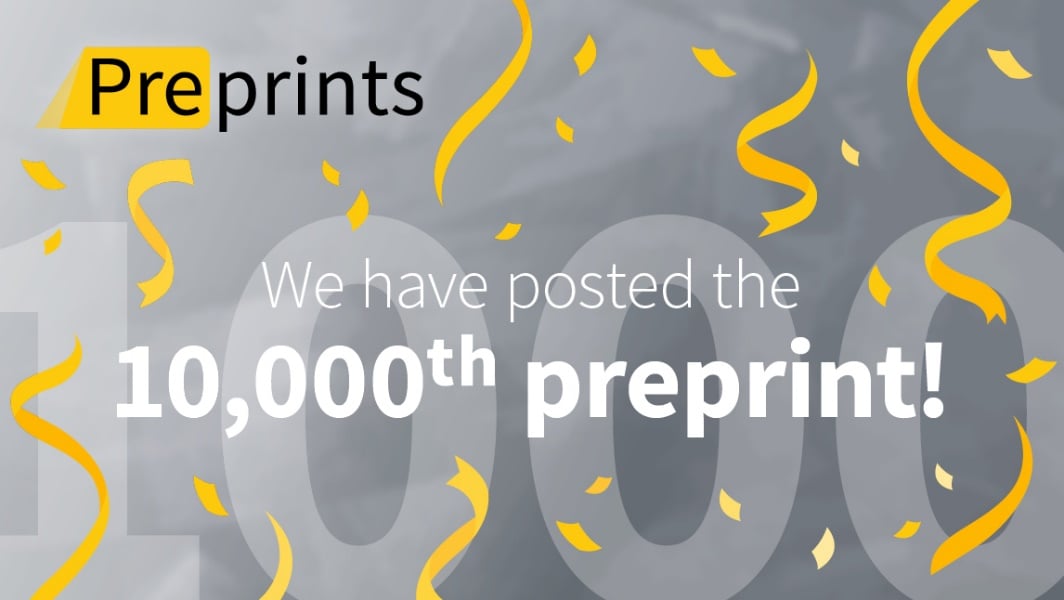
2 August 2019
DeepGreen Partnering with Publishers and Universities in Distributing Open Access Content to Institutional Repositories
Last week, the DeepGreen initiative in Germany started into an advanced test phase with the publishing partners S. Karger AG, SAGE Publishing, MDPI, Frontiers and De Gruyter, as well as 27 universities from all over Germany, from Hamburg University of Applied Sciences to University of Konstanz.
DeepGreen aims at lowering the barriers for open access publishing by automatically delivering metadata and full text publications from participating publishers to authorized repositories at German universities.
In preparation for a later live operation, the advanced test phase serves to gain experience with extensive data deliveries from publishers and also handling different repository software (including OPUS4, DSpace, EPrints, MyCoRe). DeepGreen thereby acts as a sophisticated platform, receiving articles published by authors affiliated with German universities and depositing these articles to respective university repositories, based on the affiliation metadata. For more information about DeepGreen: https://deepgreen.kobv.de
Karger AG has been a close cooperation partner of the DeepGreen consortium since 2016. S. Karger has more than 80 subscription-based and around 20 open access journals covering a wide spectrum in health science. DeepGreen will assign S. Karger articles to authorized institutions on the legal basis of German alliance and national licenses.
SAGE Publishing was founded by Sara Miller McCune in 1965 to support the dissemination of usable knowledge and educate a global community. SAGE publishes more than 1,000 journals and over 600 new books each year, spanning a wide range of subject areas. Our growing selection of library products includes archives, data, case studies and video. SAGE remains majority owned by our founder and after her lifetime will become owned by a charitable trust that secures the company’s continued independence. Principal offices are located in Los Angeles, London, New Delhi, Singapore, Washington DC and Melbourne. SAGE Publishing has been a close cooperation partner of DeepGreen since 2016.
MDPI is a scientific open access publisher and has been a partner of DeepGreen since 2017. MDPI comprises 205 peer-reviewed journals of various disciplines. All articles are published under a CC-BY license and are freely available without embargo period.
Frontiers is a scientific open access publisher with 61 journals of over 600 academic disciplines. All articles are peer-reviewed and published freely available under CC-BY license.
De Gruyter is an academic publisher with more than 700 subscription-based and open access journals of 29 disciplines. Articles provided by De Gruyter will be assigned to institutions with German alliance and national licenses.
There is promising communication with other publishers.
DeepGreen is funded by the German Research Foundation (DFG) and the consortium comprises six institutions: the Cooperative Library Network Berlin-Brandenburg, Bavarian State Library, Bavarian Library Network, University Library of the Technische Universität Berlin, University Library of Erlangen-Nuremberg and the Helmholtz Open Science Coordination Office at the GFZ German Research Centre for Geosciences.
If you would like to know in more detail which institutions take part in the advanced test phase of DeepGreen, you can find more information here.
17 July 2019
First Basel Sustainable Publishing Forum
The University of Basel and the MDPI Sustainability Foundation are organizing the First Basel Sustainable Publishing Forum on 9th September 2019.
The aim of this event is to provide background and perspectives on Plan S to Learned Societies, which have to make well-informed decisions to transition their journals to Open Access (OA).
The BSPF will bring together several representatives of Learned societies, Plan S architects as well as representatives from various publishers and publishing platforms. After getting the big picture from cOAlition S, panel discussions will allow to better understand the diverse challenges that Learned societies are facing to transition their journals to OA as well as to identify sustainable, implementable and scalable solutions for successful Open Access transition.
For program details and registration, please follow the link below:
https://sciforum.net/conference/SustainableSolutionsToOpenAccess
20 June 2019
Nutrients Receiving 2018 Updated Impact Factor of 4.171
We are pleased to inform that Nutrients received an updated Journal Impact Factor of 4.171 in the recent release of the Journal Citation Reports®. The journal's 5-Year Impact Factor is 4.813. Nutrients now ranks 16/86 (Q1) in the category 'Nutrition & Dietetics'.
Evolution of Impact Factor, Citations and Publications for Nutrients:
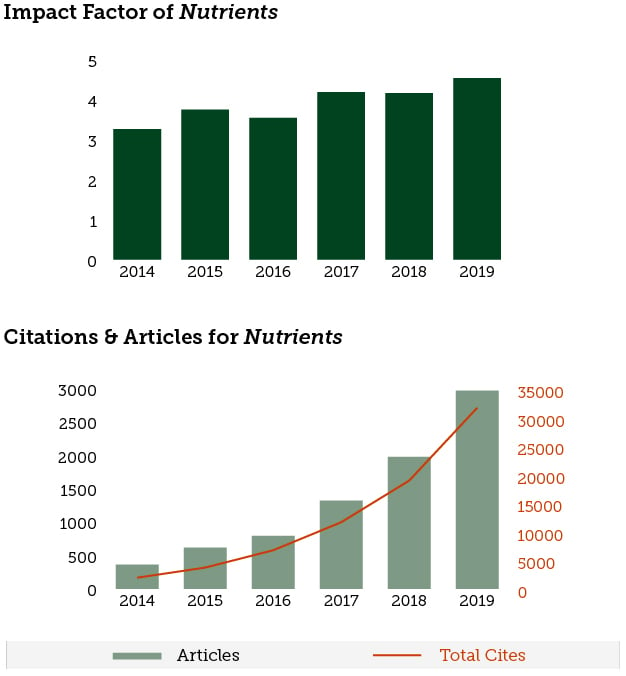
Source: data according to Journal Citation Reports®, 2018 release, a Clarivate Analytics product; and Scopus journal metrics.
28 May 2019
Meet US at the 2019 Annual Meeting of ASN in Baltimore, MD, USA, 8–11 June 2019
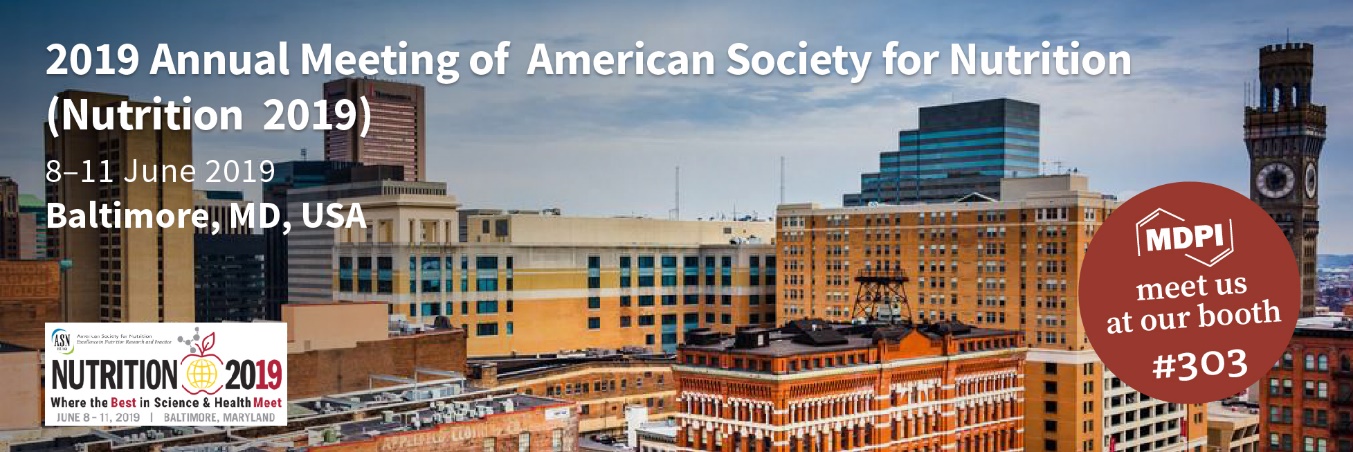
MDPI will be attending the 2019 Annual Meeting of American Society for Nutrition in Baltimore, MD, USA, 8–11 June 2019.
At Nutrition 2019, 3600 of the top scientific researchers, practitioners, global and public health professionals, policy makers and advocacy leaders, industry, media and other related professionals will gather to advance nutrition science and its practical application.
The following MDPI journals will be represented:
If you are also attending this conference, please feel free to stop by our booth (Booth #303). Our delegates look forward to meeting you in person to answer any questions you may have. For more information about the conference, please visit: https://meeting.nutrition.org/
28 May 2019
Meet US at the 52nd Annual Meeting of ESPGHAN in Glasgow, Scotland, 5–8 June 2019

MDPI will be attending the 52nd Annual Meeting of ESPGHAN, to be held in Glasgow, Scotland, 5–8 June 2019.
Every year the ESPGHAN Annual Meeting attracts the key opinion leaders in the field of Pediatric Gastroenterology, Hepatology and Nutrition from Europe and all around the world, making the congress the largest conference of its kind worldwide.
Attended by 4.600 participants from 100 countries, the previous 51st Annual Meeting in Geneva offered more than 950 abstract presenters a stage to publish their latest research results. Thus, the congress is a great opportunity to meet colleagues in your field from around the world and provides a unique platform to exchange new ideas and discuss the latest developments in these fields. In 2019, the scientific programme will once again include a wide range of sessions and symposia, a clinical track, postgraduate courses as well as the popular hands-on endoscopy learning zone.
The following MDPI journals will be represented:
If you are also attending this conference, please feel free to stop by our booth (Booth #45). Our delegates look forward to meeting you in person to answer any questions you may have. For more information about the conference, please visit: https://www.espghancongress.org/
9 May 2019
Obituary—Prof. Dr. Valerio Nobili
Valerio served on our Editorial Board for over a year and made important contributions to the journal's success. On behalf of the Editorial Board and the MDPI Editorial Team we offer our deepest condolences to his family, friends and colleagues.
Prof. Dr. Lluis Serra-Majem
Prof. Dr. Maria Luz Fernandez
Editors-in-Chief of Nutrients
20 March 2019
Fostering Open Access Publishing Worldwide: New IOAP Participants in February and March 2019
We are pleased to welcome more universities from Poland, Italy, Germany, Brazil and other parts of the world to MDPI's Institutional Open Access Program (IOAP). A warm welcome to the institutions listed below, who have joined the Program in February and March this year.
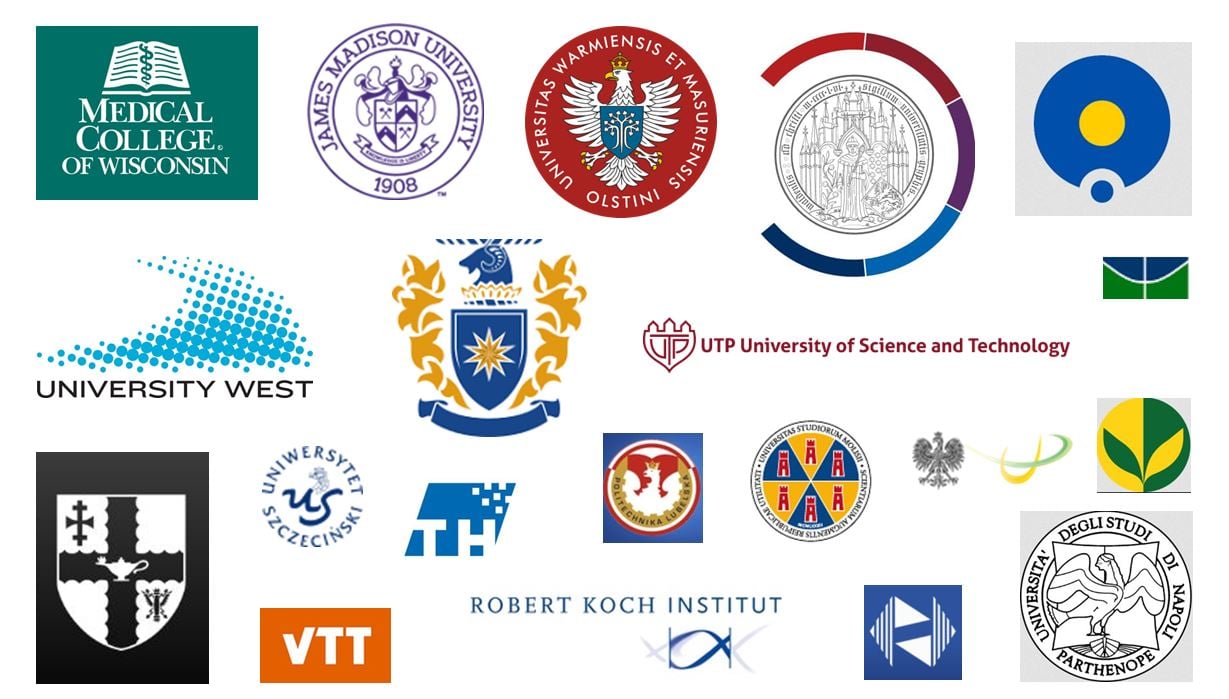
Authors affiliated with these institutions can now enjoy a discount on the APC for papers accepted for publication in any MDPI journal. If you would like to learn more about our program, please visit: https://www.mdpi.com/about/ioap or email us at ioap@mdpi.com.
5 March 2019
MDPI Joins Jisc’s Publications Router Service
We are delighted to announce our participation in Jisc’s Publication Router project, as of March 2019.
Publications Router is a Jisc service that automatically sends notifications about research articles to institutions' systems such as their repositories or CRISs, since May 2015. Through this agreement, MDPI will provide Jisc with daily feeds and information regarding published articles, which will be gathered by their system and delivered to institutions also registered to this service. Nearly all of our articles are published within 15 days of acceptance, so institutions will receive them quite promptly.
The feed will include the full text of the published version of record, with no embargo, so the articles can be exposed immediately for public view. They are accompanied by rich metadata, including confirmation of the immediate CC BY licence, minimising the need for any manual intervention or checking.
For more information about Publications Router, you may contact Jisc’s central helpdesk at help@jisc.ac.uk. For any queries about MDPI’s institutional agreements and collaborations, you may get in touch with MDPI’s Institutional Engagement team at ioap@mdpi.com, which would be very happy to hear from further UK institutions.
1 February 2019
2018 MDPI Top Reviewer Award—Winners Announced
Rigorous peer-review is the cornerstone of high quality academic publishing. Over 97,000 scholars served as reviewers for MDPI journals in 2018. We are extremely appreciative of all those who made a contribution to the editorial process in this capacity. At the beginning of every year, journal editorial offices publish a list all reviewers’ names to express our gratitude. In addition, this year the “MDPI Top Reviewer Awards” are announced, to recognize the very best reviewers for their expertise, dedication, high quality, and timely review reports. We are pleased to announce the following winners of the 2018 MDPI Top Reviewer Awards:
- Ali Behnood
- Andrea Pezzuolo
- Angela Gorgoglione
- Anna D'Auria
- Antonio D'Andrea
- Azhar Abbas
- Bogdan Zagajewski
- Chunhui Chen
- Dominika Głąbska
- Dominika Guzek
- Dragan Pamucar
- Francisco J. G. Silva
- Frank Li
- Gianluca Serafini
- Gyorgy Szekely
- Haozhi Pan
- Helvi Heinonen-Tanski
- José Manuel Gómez-Soberón
- Kathy Lewis
- Klara Kosova
- Luis N. López De Lacalle
- M. Z. Naser
- Malwina Tytła
- Masoume Amirkhani
- Matteo Ghidelli
- Moretti Laura
- Petra Schneider
- Roberto Cerchione
- Spyros Papaefthymiou
- Ştefan Cristian Gherghina
24 January 2019
JAMS Journals: A Low-Cost Publishing Platform

Since 2010, MDPI has run its own online submission system. More recently, we have made the software, with accompanying publishing services, available to other publishers as JAMS (Journal and Article Management System). We are now delighted to announce the launch of JAMS Journals, a standardized platform for operating open access journals at low cost.
JAMS Journals provides a comprehensive service, including a shared submission website, journal websites hosted at a URL provided by the publisher, and a full production service. There is a small setup fee and the cost for each published paper is just a few hundred Swiss francs.
The platform demonstrates that running an open access journal can be straightforward and affordable. The JAMS Journals platform is suitable for
- small publishers or groups of scholars looking to launch their own journal;
- existing publishers or societies seeking to explore open access options;
- publishers looking to convert an existing subscription journal to open access.
JAMS journals launches with two journals from Canadian-based publisher Etcetera Publications:
- Canadian Journal of Pesticides & Pest Management (http://www.cjppm.ca)
- Nanotechnology in Agriculture, Food & Environment (http://www.nanoafe.ca)
Dr AJ Al-Rajab (President of Etcetera Publications) comments:
“In the past few months, we were working on our project to launch new open access scientific journals in the field of agricultural and environmental sciences. We decided to go with JAMS for this venture because of the high quality of their services, reasonable prices, professionalism and easy communication. Our portfolio is expected to grow rapidly during 2019 to include more titles covering different areas in agriculture and environment. MDPI earned already our complete satisfaction and we are looking for a long term cooperation.”
Alongside the new platform, we continue to provide flexible, tailored journal management solutions for existing publishers. For any questions or to request a quotation, contact Dr. Constanze Schelhorn (constanze.schelhorn@mdpi.com).
24 January 2019
Popularity of Preprints Continues to Grow

2018 was a great year for preprints, with increasing numbers of authors looking to make their papers available online before peer review. Along with other preprint servers, our platform Preprints.org saw an increase in the uptake from authors, and more than double the number of announced papers compared to 2017. In fact, we recently passed two important milestones: 8000 preprints online and 30,000 authors.
We believe that the whole research community has the opportunity to benefit from work being available online as early as possible. We thank and congratulate our authors for supporting us to make this goal a reality.
In 2019, we will be looking carefully at how to provide better value for authors, maintain efficiency while growing in size, and make sure we remain well-connected with the research community.
If you want to participate, you can consider screening preprints or joining our advisory board. And, of course, posting your own work.
9 January 2019
Open Access Agreement between the Austrian Academic Library Consortium (KEMÖ), the Austrian Science Fund (FWF), and MDPI

We are delighted to announce the establishment of our national Open Access agreement with the Austrian Academic Library Consortium (KEMÖ) and the Austrian Science Fund (FWF). Through this national agreement, the Austrian institutions listed below as well as FWF will cover the Article Processing Charges (APC) of manuscripts published by eligible corresponding or funded authors in MDPI journals as long as central funds are available.
All participating institutions have gained access to the MDPI online submission system where they can find full article metadata and pricing information as well as Funder and Grant ID details for easy identification and additional transparency. At the same time eligible authors are benefited from an APC discount which comes at no cost for the institutions.
Eligible corresponding authors affiliated with the participating institutions are prompted to choose the corresponding Institutional Open Access Program (IOAP) when they submit an article via our online submission system. The program will be selected automatically if authors submit their papers using their institutional email address. To claim their discount, FWF funded authors should choose the particular funder and add their Grant ID upon online submission of their manuscript. The institutions will then crosscheck the information and confirm the APC funding.
Eligible authors that have their APC covered by their institution or funder are advised to include the following sentence in their acknowledgments: "Open Access Funding by the [name of the institution/funder]".
The full text of the agreement is openly available online at: http://doi.org/10.5281/zenodo.2536007
For any questions about the agreement, please contact the KEMÖ Consortium at emedien@obvsg.at, FWF at Katharina.Rieck@fwf.ac.at, or the MDPI IOAP team at ioap@mdpi.com.
The Austrian institutions participating in this agreement are:
- Austrian Science Fund (FWF)
- University for Continuing Education Krems
- University of Applied Sciences BFI Vienna
- University of Applied Sciences Upper Austria
- University of Applied Sciences Technikum Wien
- Vorarlberg University of Applied Sciences
- International Institute for Applied Systems Analysis (IIASA)
- Institute of Science and Technology Austria
- MCI Management Center Innsbruck
- University of Graz
- University of Linz
- University of Salzburg
- Graz University of Technology
- TU Wien
- University of Veterinary Medicine Vienna
- University of Vienna
This is our first collective agreement with a national library consortium, while the individual institutions around the world participating in our IOAP are now more than 500 - see details here: https://www.mdpi.com/about/ioap. We would be mostly interested in discussing about possible collaborations with other consortia, funders, and institutions in our mutual efforts to accelerate Open Access.
2 January 2019
Encyclopedia—the Scholarly Community Encyclopedia

We are pleased to announce the new platform Encyclopedia, which is an online reference created and curated by active scholars. It aims to highlight the latest research results as well as providing benchmark information for researchers and the general public interested in accurate and advanced knowledge on specific topics.
We encourage authors of review articles to quote and adapt the content of their published papers to create Encyclopedia entries. You can create completely new entries on topics in which you have knowledge and expertise. There is no limit on the topics or research fields. All of science and the humanities are included. Each entry will be published directly after submission.
We also have prepared a DOI application function in Encyclopedia. Once a DOI application is approved, the entry website will announce the DOI number and a pdf version with DOI information will be automatically created.
We look forward to your contributions and hope you will make use of this service. Find more about the service at: https://encyclopedia.pub/
3 December 2018
Nutrients Young Investigator Award Winners Announced
We are pleased to announce that the winners of the 2018 Nutrients Young Investigator Awards are Dr. Rachel Murphy (School of Population and Public Health at the University of British Columbia, Vancouver, Canada) Dr. Hannah Holscher (Department of Food Science and Human Nutrition at the University of Illinois, Urbana, USA).
For more information about Nutrients Awards, please visit: https://www.mdpi.com/journal/nutrients/awards.
30 October 2018
Institutional Open Access Agreement between Bill and Melinda Gates Foundation and MDPI

We are delighted to announce that the Bill and Melinda Gates Foundation (BMGF) is now a participant of our Institutional Open Access Program (IOAP). Authors funded by the BMGF can enjoy discounts on the APC, while the funder covers the costs of eligible articles centrally. BMGF also has access to the MDPI online submission system where they can find full article metadata and pricing information as well as Grant ID details for easy identification and additional transparency.
We hope that funded authors find the programme beneficial and we are happy to offer our IOAP to other funders that need a streamlined workflow of compliance checking and APC coverage.
To claim their discount, BMGF funded authors should choose the particular funder and add their Grant ID upon online submission of their manuscript.
For any questions about the BMGF agreement, please contact the funder at support@chronos-oa.com or the MDPI IOAP team at ioap@mdpi.com.
2 October 2018
MDPI Welcomes Plan S
Recently, it was announced that a group of European funders supported 10 principles that will help to expand open access, known as Plan S. MDPI warmly welcomes this move as a step towards achieving more open and accessible communication of research across all disciplines. Some aspects remain to be clarified, however the details given so far match the aims and values that MDPI has held over the past two decades.

We believe that open access publishers should be active participants in discussions around Plan S, particularly regarding potential new business models and practical aspects of implementation. MDPI supports APCs as a transparent unit of payment for article publishing, however we are committed to exploring other measures and recently signed the Jussieu Call. Sustainability is a key value for MDPI, and future funding models should have at their heart the sustainability of knowledge and research dissemination. Plan S provides an opportunity for funders and publishers to directly discuss funding of open access journals in ways that are beneficial to all parties involved.
7 September 2018
Professor Lluis Serra-Majem and Professor Maria Luz Fernandez Appointed Editors-in-Chief of Nutrients
We are pleased to announce that starting from 1st September 2018 the editorial leadership of Nutrients has been taken over by Professor Lluís Serra-Majem (University of Las Palmas de Gran Canaria) and Professor Maria Luz Fernandez (University of Connecticut).

Maria-Luz Fernandez is Full Professor of Nutrition at the Department of Nutritional Sciences, University of Connecticut (USA) where she has been a faculty member since 1997.
Dr. Fernandez’ research focuses on the effects of dietary strategies and drug treatment to prevent cardiovascular disease. She has employed different dietary regimes in her research, including the Mediterranean diet, carbohydrate restricted diets, inclusion of antioxidants from grapes, and more importantly she has established the lack of association between eggs and heart disease risk factors. She has ongoing collaboration studies with reserch centers in Mexico to determine the effects of egg intake in diverse populations, including children and diabetic individuals; she has also conducted a study in the United Arab Emirates to evaluate risk factors for metabolic syndrome in this population. Dr. Fernandez was a member of the FDA Nutrition committee from 2010–2014.
Dr. Fernandez has authored 251 peer-review papers, 14 book chapters, and 235 scientific abstracts. She has been invited to present her work in the international arena including Argentina, Brazil, Canada, Colombia, Ecuador, Egypt, Ireland, Mexico, Panama, Peru, Portugal, Saudi Arabia, Spain, South Korea, and the United Arab Emirates. During her tenure at the University of Conneticut, Dr. Fernandez has graduated 34 PhD and 20 Master’s students from all over the world, who studied in the area of diet and heart disease and currently hold prominent positions in academia, industry and government agencies.

Lluís Serra-Majem is a medical doctor with a Ph.D. specializing in Preventive Medicine and Public Health Nutrition. In 1988, he became Associate Professor of Preventive Medicine and Public Health at the School of Medicine of the University of Barcelona, where he founded and is the Director of the Community Nutrition Research Centre of the University of Barcelona Science Park. In 1995 he became Full Professor of Preventive Medicine and Public Health at the University of Las Palmas de Gran Canaria and Senior Consultant at the Preventive Medicine Service at CHUIMI. He also holds the UNESCO Chair for Local Health Systems and Food Systems as well as serves as Director of the Biomedical and Health Research Institute (IUIBS), where he also leads the International Chair for Advanced Studies on Hydration and the program The Island in your Plate. He is colligated with the Spanish Ministry of Health’s Thematic Centre of Obesity and Nutrition Research (CIBER OBN group coordinator) and participates in the PREDIMED Study and Network.
In 1989 he founded the Spanish Society of Community Nutrition, of which he served as President from 2000 to 2006. He is President and founder of the NGO Nutrition without Borders, as well as of the Nutrition Research Foundation (FIN); he also served as President of the Mediterranean Diet Foundation (from 1995 to 2012) where he was leading the candidacy of the Mediterranean Diet as an Intangible Cultural Heritage by the UNESCO. He chairs the Spanish Academy of Nutrition and Food Sciences, and the International Foundation of Mediterranean Diet (IFMeD), and he is a visiting professor at several universities. He has published 75 books and 538 peer reviewed scientific papers with an impact factor over 2300 and an H-index of 56 (80 in Google Scholar). His main areas of research are public health nutrition, Mediterranean diet, obesity prevention and hydration. He was the President of the I and III World Congress of Public Health Nutrition.
They will work closely with over 100 Editorial Board Members from across the globe.
We are confident that under their leadership the journal will continue as a highly respected journal in the field.
We would like to take the opportunity to express our gratitude to the previous Editor-in-Chief, Prof. Jon Buckley, and the founding Editor-in-Chief, Prof. Peter Howe for their invaluable contributions to the journal.
30 August 2018
MDPI establishes Open Access agreement with Qatar National Library

We are happy to announce the establishment of an Open Access (OA) agreement with Qatar National Library (QNL). QNL is committed to supporting and helping Qatar authors publish OA at no cost. Through this national agreement, QNL will cover the Article Processing Charges (APC) of manuscripts published by Qatar-based corresponding authors in MDPI journals.
Eligible corresponding authors affiliated with Qatar research centers and universities are prompted to choose QNL as part of our Institutional Open Access Program (IOAP) when they submit an article via our online submission system. The program will be selected automatically if authors submit their papers using their institutional email and/or a computer registered with the institution’s IP range. QNL will then crosscheck the information and confirm the APC funding.
Qatar authors that have their APC covered by QNL are advised to include the following sentence in their acknowledgments: "The publication of this article was funded by Qatar National Library".
For more information, please visit Open Access at QNL or email the QNL Open Access team at openaccess@qnl.qa.
26 June 2018
2017 Impact Factor Released for Nutrients: 4.196
We are pleased to inform that Nutrients received an updated Journal Impact Factor of 4.196 in the June 2018 release of the Journal Citation Reports®. The journal's 5-Year Impact Factor is 4.603. Nutrients now ranks 18/81 (Q1) in the category 'Nutrition & Dietetics.'
Overview of Citation Metrics:
- Journal Impact Factor, 2 yrs (2017): 4.196
- 5-Year Impact Factor (2017): 4.603
- CiteScore, 3 yrs (Scopus): 4.35
- SJR Scimago Journal Rank 2017 (SJR): 1.557
- Source Normalized Impact 2017 (SNIP): 1.403
Evolution of Impact Factor, Citations and Publications for Nutrients:

Source: data according to Journal Citation Reports®, 2018 release, a Clarivate Analytics product; and Scopus journal metrics.
1 June 2018
Nutrients 2017 CiteScore™ Announced - 4.35
We are pleased to report Nutrients received a CiteScore of 4.35 for 2017. The metric reflects citation activity in 2017 in Scopus for papers published in the period 2014‒2016.
Nutrients ranks among the Top 10% of journals in the 'Nutrition and Dietetics' and 'Food Science' categories.
For the full details in the current CiteScore release, please see the journal's Source profile. To check the full list of MDPI journals receiving CiteScores, please see here.
31 May 2018
2017 CiteScore™ Metrics Released
The 2017 CiteScore™ data is available now, based on citation data in the Scopus® database. The current CiteScore reflects citation activity in 2017 for articles published in 2014‒2016. Please note that the list below includes journals assigned a CiteScore in this year’s release. For a full list of journals indexed in Scopus, please see our journal list.
Thirteen of our journals received a CiteScore which is in the top 10% of the distribution in at least one of the categories (marked with * in the table below), while a further 32 journals exhibit scores that are in the first quartile of the respective categories.
To access the full data for MDPI journals, please see here. More data can also be found in SJR Scimago Journal & Country Rank.
Unlike CiteScores and the widely used Journal Impact Factors, the Source Normalized Impact per Paper (SNIP) metrics are normalized in order to correct for differences in citation practices between scientific fields. Therefore, the SNIP allows direct comparison between journals specialized in different fields.
According to 2017 data, MDPI publishes six journals with an average citation impact, or SNIP, in excess of 1.500. These journals are Biomolecules, Cancers, Journal of Clinical Medicine (JCM), Marine Drugs, Remote Sensing and Sensors (see the last column in the table below).
CiteScore Data for MDPI Journals
| Journal | Rank (Quartile) |
Category | Link | CiteScore 2017 | 2016 |
2015 |
SNIP 2017 |
| Aerospace | 43/116 (Q2) | • Aerospace Engineering | Link | 1.23 | - | - | 1.152 |
| Agriculture | 69/309 (Q1) 91/398 (Q1) 78/255 (Q2) |
• Agronomy and Crop Science • Plant Science • Food Science |
Link | 1.93 | - | - | 1.133 |
| Agronomy | 46/309 (Q1) | • Agronomy and Crop Science | Link | 2.38 | - | - | 1.115 |
| Algorithms | 22/46 (Q2) 61/125 (Q2) 60/107 (Q3) 64/114 (Q3) |
• Numerical Analysis • Computational Mathematics • Computational Theory and Mathematics • Theoretical Computer Science |
Link | 1.03 | 1.15 | 1.07 | 0.749 |
| Animals | 12/154 (Q1) * 48/367 (Q1) |
• General Veterinary • Animal Science and Zoology |
Link | 2.02 | 1.46 | 1.66 | 1.099 |
| Antibiotics | 6/68 (Q1) * 62/263 (Q1) 55/230 (Q1) 31/108 (Q2) 47/134 (Q2) 139/398 (Q2) |
• General Pharmacology, Toxicology and Pharmaceutics • Infectious Diseases • Pharmacology (medical) • Microbiology (medical) • Microbiology • Biochemistry |
Link | 2.85 | 1.65 | - | 0.975 |
| Antibodies | 43/143 (Q2) 61/164 (Q2) 85/189 (Q2) |
• Drug Discovery • Immunology and Allergy • Immunology |
Link | 2.85 | - | - | 0.844 |
| Antioxidants | 23/119 (Q1) 35/169 (Q2) 100/398 (Q2) 119/367 (Q2) 102/264 (Q2) |
• Clinical Biochemistry • Physiology • Biochemistry • Molecular Biology • Cell Biology |
Link | 3.42 | - | - | 1.361 |
| Applied Sciences | 48/270 (Q1) 15/66 (Q1) 31/116 (Q2) 18/53 (Q2) 151/434 (Q2) 186/535 (Q2) |
• General Engineering • Fluid Flow and Transfer Processes • Instrumentation • Process Chemistry and Technology • General Materials Science • Computer Science Applications |
Link | 1.90 | - | - | 0.801 |
| Biology | 12/177 (Q1)* 32/186 (Q1) 10/40 (Q1) |
• General Agricultural and Biological Sciences • General Biochemistry, Genetics and Molecular Biology • General Immunology and Microbiology |
Link | 3.48 | 3.02 | 2.78 | 0.961 |
| Biomolecules | 31/398 (Q1) * 41/367 (Q1) |
• Biochemistry • Molecular Biology |
Link | 5.72 | 1.67 | 3.08 | 1.542 |
| Biosensors | 20/119 (Q1) | • Clinical Biochemistry | Link | 3.59 | 2.83 | 2.37 | 1.122 |
| Brain Sciences | 47/111 (Q2) | • General Neuroscience | Link | 2.56 | - | - | 0.695 |
| Cancers | 26/323 (Q1) * 23/191 (Q1) |
• Oncology • Cancer Research |
Link | 5.82 | 5.02 | 4.07 | 1.567 |
| Catalysts | 32/151 (Q1) 21/46 (Q2) |
• Physical and Theoretical Chemistry • Catalysis |
Link | 3.23 | 3.44 | 3.45 | 0.954 |
| Crystals | 76/272 (Q2) 140/434 (Q2) 127/398 (Q2) 26/64 (Q2) |
• General Chemical Engineering • General Materials Science • Condensed Matter Physics • Inorganic Chemistry |
Link | 1.97 | 1.89 | 1.47 | 0.745 |
| Diagnostics | 49/119 (Q2) | • Clinical Biochemistry | Link | 2.43 | - | - | 0.788 |
| Diversity | 30/124 (Q1) 14/52 (Q2) 83/306 (Q2) 11/29 (Q2) |
• Nature and Landscape Conservation • Agricultural and Biological Sciences (miscellaneous) • Ecology • Ecological Modelling |
Link | 2.15 | 2.03 | 1.96 | 1.300 |
| Electronics | 109/644 (Q1) 26/148 (Q1) 42/224 (Q1) 50/259 (Q1) 23/96 (Q1) |
• Electrical and Electronic Engineering • Hardware and Architecture • Control and Systems Engineering • Computer Networks and Communications • Signal Processing |
Link | 2.97 | - | - | 1.227 |
| Energies | 6/73 (Q1) * 31/192 (Q1) 103/644 (Q1) 4/16 (Q1) 47/140 (Q2) |
• Control and Optimization • Energy Engineering and Power Technology • Electrical and Electronic Engineering • Energy (miscellaneous) • Renewable Energy, Sustainability and the Environment |
Link | 3.11 | 2.50 | 2.87 | 1.340 |
| Entropy | 35/202 (Q1) | • General Physics and Astronomy | Link | 2.41 | 1.87 | 1.99 | 1.189 |
| Forests | 17/129 (Q1) | • Forestry | Link | 2.31 | 2.06 | 1.76 | 0.990 |
| Future Internet | 132/259 (Q3) | • Computer Networks and Communications | Link | 1.25 | - | - | - |
| Games | 132/187 (Q3) 78/110 (Q3) 305/418 (Q3) |
• Statistics and Probability • Statistics, Probability and Uncertainty • Applied Mathematics |
Link | 0.61 | 0.87 | 0.57 | 1.038 |
| Genes | 21/91 (Q1) 74/311 (Q1) |
• Genetics (clinical) • Genetics |
Link | 3.49 | 3.62 | 3.18 | 0.374 |
| Geosciences | 32/182 (Q1) |
• General Earth and Planetary Sciences | Link | 1.97 | 1.67 | 1.29 | 0.856 |
| Information | 143/251 (Q3) | • Information Systems | Link | 1.16 | 0.78 | 0.94 | 1.146 |
| Insects | 27/135 (Q1) | • Insect Science | Link | 1.85 | 1.81 | 1.38 | 0.719 |
| International Journal of Environmental Research and Public Health (IJERPH) | 80/478 (Q1) 34/106 (Q2) |
• Public Health, Environmental and Occupational Health • Health, Toxicology and Mutagenesis |
Link | 2.41 | 2.38 | 2.42 | 0.931 |
| International Journal of Molecular Sciences (IJMS) | 7/69 (Q1) * 61/535 (Q1) 20/163 (Q1) 9/64 (Q1) 26/151 (Q1) 89/367 (Q2) 17/46 (Q2) |
• Spectroscopy • Computer Science Applications • Organic Chemistry • Inorganic Chemistry • Physical and Theoretical Chemistry • Molecular Biology • Catalysis |
Link | 3.86 | 3.73 | 3.37 | 0.998 |
| ISPRS International Journal of Geo-Information (IJGI) | 79/605 (Q1) 22/82 (Q2) 13/36 (Q2) |
• Geography, Planning and Development • Earth and Planetary Sciences (miscellaneous) • Computers in Earth Sciences |
Link | 2.10 | 1.62 | 1.52 | 1.062 |
| Journal of Clinical Medicine (JCM) | 10/841 (Q1) * | • General Medicine | Link | 7.07 | - | - | 1.535 |
| Journal of Functional Biomaterials (JFB) | 43/199 (Q1) 23/77 (Q2) |
• Biomedical Engineering • Biomaterials |
Link | 3.47 | - | - | 1.344 |
| Journal of Low Po- wer Electronics and Applications (JLPEA) |
301/644 (Q2) | • Electrical and Electronic Engineering | Link | 1.12 | 0.98 | 0.83 | 0.367 |
| Journal of Personalized Medicine (JPM) | 54/189 (Q2) | • Medicine (miscellaneous) | Link | 2.61 | - | - | 0.944 |
| Land | 50/124 (Q2) 129/306 (Q2) 36/65 (Q3) |
• Nature and Landscape Conservation • Ecology • Global and Planetary Change |
Link | 1.44 | - | - | 0.658 |
| Life | 4/94 (Q1) * 70/561 (Q1) 40/186 (Q1) 20/80 (Q2) |
• Palaeontology • Ecology, Evolution, Behavior and Systematics • General Biochemistry, Genetics and Molecular Biology • Space and Planetary Science |
Link | 3.16 | 2.95 | 1.68 | 0.935 |
| Marine Drugs | 17/146 (Q1) | • Drug Discovery | Link | 4.58 | 3.83 | 3.66 | 1.537 |
| Materials | 83/434 (Q1) | • General Materials Science | Link | 3.02 | 3.26 | 3.11 | 1.285 |
| Membranes | 5/18 (Q2) 15/53 (Q2) 4/10 (Q2) |
• Chemical Engineering (miscellaneous) • Process Chemistry and Technology • Filtration and Separation |
Link | 2.69 | 2.19 | 2.95 | 0.880 |
| Metabolites | 47/209 (Q1) 103/398 (Q2) 127/367 (Q2) |
• Endocrinology, Diabetes and Metabolism • Biochemistry • Molecular Biology |
Link | 3.35 | - | - | 0.925 |
| Metals | 155/434 (Q2) | • General Materials Science | Link | 1.87 | - | - | 0.955 |
| Micromachines | 105/554 (Q1) 154/644 (Q1) 64/224 (Q2) |
• Mechanical Engineering • Electrical and Electronic Engineering • Control and Systems Engineering |
Link | 2.31 | 1.83 | 1.78 | 0.987 |
| Minerals | 33/175 (Q1) 45/208 (Q1) |
• Geotechnical Engineering and Engineering Geology • Geology |
Link | 2.21 | 2.13 | 1.77 | 1.149 |
| Molecules | 4/25 (Q1) 25/172 (Q1) 18/104 (Q1) 31/163 (Q1) 30/151 (Q1) 31/146 (Q1) 55/160 (Q2) |
• Chemistry (miscellaneous) • Pharmaceutical Science • Analytical Chemistry • Organic Chemistry • Physical and Theoretical Chemistry • Drug Discovery • Molecular Medicine |
Link | 3.27 | 3.09 | 2.65 | 1.146 |
| Nutrients | 11/255 (Q1) * 9/112 (Q1) * |
• Food Science • Nutrition and Dietetics |
Link | 4.35 | 4.29 | 4.07 | 1.403 |
| Pathogens | 38/263 (Q1) 20/108 (Q1) 9/40 (Q1) 40/164 (Q1) 110/367 (Q2) |
• Infectious Diseases • Microbiology (medical) • General Immunology and Microbiology • Immunology and Allergy • Molecular Biology |
Link | 3.52 | - | - | 1.166 |
| Pharmaceuticals | 14/172 (Q1) * 33/160 (Q1) |
• Pharmaceutical Science • Molecular Medicine |
Link | 4.12 | 4.90 | 3.64 | 1.370 |
| Pharmaceutics | 21/172 (Q1) | • Pharmaceutical Science | Link | 3.68 | 3.83 | 2.68 | 1.092 |
| Photonics | 30/116 (Q1) 80/270 (Q2) 53/160 (Q2) |
• Instrumentation • Radiology Nuclear Medicine and Imaging • Atomic and Molecular Physics, and Optics |
Link | 1.96 | - | - | 0.817 |
| Plants | 73/561 (Q1) 48/389 (Q1) 44/306 (Q1) |
• Ecology, Evolution, Behavior and Systematics • Plant Science • Ecology |
Link | 3.13 | - | - | 0.969 |
| Polymers | 17/142 (Q1) 63/359 (Q1) |
• Polymers and Plastics • General Chemistry |
Link | 3.30 | 3.74 | 3.37 | 1.213 |
| Religions | 26/389 (Q1) * | • Religious Studies | Link | 0.56 | - | - | 0.676 |
| Remote Sensing | 13/182 (Q1) * | • General Earth and Planetary Sciences | Link | 4.03 | 3.56 | 3.76 | 1.559 |
| Resources | 19/142 (Q1) 39/261 (Q1) |
• Nature and Landscape Conservation • Management, Monitoring, Policy and Law |
Link | 2.69 | - | - | 1.387 |
| Scientia Pharmaceutica | 92/172 (Q3) | • Pharmaceutical Science | Link | 0.86 | - | - | 0.513 |
| Sensors | 9/116 (Q1) * 25/160 (Q1) 100/644 (Q1) 19/104 (Q1) 113/398 (Q2) |
• Instrumentation • Atomic and Molecular Physics, and Optics • Electrical and Electronic Engineering • Analytical Chemistry • Biochemistry |
Link | 3.23 | 2.78 | 2.21 | 1.550 |
| Social Sciences | 81/213 (Q2) | • General Social Sciences | Link | 0.60 | - | - | 0.445 |
| Sustainability | 61/605 (Q1) * 55/261 (Q1) 60/140 (Q2) |
• Geography, Planning and Development • Management, Monitoring, Policy and Law • Renewable Energy, Sustainability and the Environment |
Link | 2.37 | 1.96 | 1.78 | 1.030 |
| Symmetry | 44/327 (Q1) 17/45 (Q2) 16/40 (Q2) 14/25 (Q2) |
• General Mathematics • Computer Science (miscellaneous) • Physics and Astronomy (miscellaneous) • Chemistry (miscellaneous) |
Link | 1.32 | 1.12 | 0.95 | 0.802 |
| Toxins | 18/106 (Q1) 21/111 (Q1) |
• Health, Toxicology and Mutagenesis • Toxicology |
Link | 3.32 | 3.34 | 3.76 | 1.136 |
| Vaccines | 5/230 (Q1) * 13/263 (Q1) * 18/302 (Q1) * 11/146 (Q1) * 32/189 (Q1) |
• Pharmacology (medical) • Infectious Diseases • Pharmacology • Drug Discovery • Immunology |
Link | 4.88 | 1.23 | 3.76 | 1.255 |
| Viruses | 29/263 (Q1) 16/68 (Q1) |
• Virology • Infectious Diseases |
Link | 3.88 | 3.60 | 3.74 | 1.130 |
| Water | 66/605 (Q1) 37/191 (Q1) 43/199 (Q1) 193/398 (Q2) |
• Geography, Planning and Development • Water Science and Technology • Aquatic Science • Biochemistry |
Link | 2.29 | 2.05 | 1.96 | 1.007 |
30 April 2018
Winners of the First MDPI Writing Prize
We are pleased to announce the results of the first MDPI Writing Prize. We received a large number of entries from across the globe on the theme of “The Global Benefits of Open Research”. It was a pleasure to read so many original, well-researched and well-presented ideas, and the final choice was not an easy one. We are pleased to announce that the winners are as follows:
1st prize (500 CHF, Swiss knife and certificate)
Edmond Sanganyado, Shantou University, China
2nd prizes (250 CHF, Swiss knife and certificate)
Kamala T. Rajahgopal, Asia e University, Malaysia
Yin Zhixuan, Qingdao University of Technology, China
3rd prizes (100 CHF, Swiss knife and certificate)
Alexandra Ticea, Carol Davila University of Medicine and Pharmacy, Romania
Ankur Sarker, University of Virginia, USA
Daniel Attoye, United Arab Emirates University, UAE
Congratulations to all of them! The winning entries can be downloaded by clicking on the names above. A compilation of all entries will soon be available as an open access book.
The writing prize is sponsored by the MDPI English editing service.
23 March 2018
Check for Updates: A New Function in the Article PDF Version

At MDPI, we always want to keep you up to date. Even for already published articles, some corrections or minor changes may occur. To prevent you from missing any updates, from now on you will be able to access the latest version of any manuscript by clicking on the “check for updates” logo that you can find in the PDF file, even if you have saved the file on your computer.
15 March 2018
Congratulations to Eleven Journals for Publishing the Tenth Volume in 2018
Congratulations to the journals Cancers, Diversity, Future Internet, Nutrients, Polymers, Pharmaceutics, Remote Sensing, Sustainability, Symmetry, Toxins and Water for publishing their 10th volume in 2018!
We would like to send warm wishes from the Editors-in-Chief of these journals and look to the future. Acknowledgement of our past achievements provides the strongest stimulus for future endeavor.

To date, the journal Cancers has published more than 1000 papers and will receive its first impact factor in June. This milestone could not be achieved without our readers, authors, peer reviewers, editors, and all the people working for the journal who, for years, have contributed their tremendous efforts.
— Prof. Dr. Samuel Mok
Editor-in-Chief of Cancers

Ten years is a long time but a short period for a new journal. When we started Diversity 10 years ago, we had hoped that a journal with such a broad coverage of topics would attract potential authors and good contributions. We are very satisfied that our vision became reality.
Today, Diversity is home to interesting studies on different aspects of diversity mainly in biology, ranging from systematics, phylogeny and evolution, to ecology, biodiversity and conservation issues. I am confident that the next 10 years will witness the further growth of Diversity both in quality and quantity.
— Prof. Dr. Michael Wink
Editor-in-Chief of Diversity

Ten years have passed from the foundation of the “Future Internet” MDPI journal. We have witnessed the positive evolution of our journal, with ever-increasing interest from potential authors. The increasing fundamental eco-systemic importance of the journal’s subjects has also had positive effects. Therefore, the journal is currently evolving to cope with the increasing interdisciplinary and transdisciplinary views.
Past achievements and future prospects give us reason to celebrate ten years since the journal’s foundation. We will also set up a commemorative Special Issue.
— Prof. Dr. Dino Giuli
Editor-in-Chief of Future Internet

It is with great pride that Nutrients enters its 10th year of publication. Through the hard work and dedication of its Editorial Board, journal staff, and individuals who have unselfishly given their time to peer-review manuscripts, the journal has grown to become a leading publisher of nutrition research. During this 10th Anniversary year of Nutrients, I would like to take the opportunity to thank all who have contributed to the journal during its first decade.
— Prof. Dr. Jonathan Buckley
Editor-in-Chief of Nutrients

I am pleased and honored to celebrate the first decade of Pharmaceutics, as the founding Editor-in-Chief. This is also an opportunity for me to thank our authors, readers, reviewers, and editorial board members for their continuous support. We will receive our first impact factor in June 2018, in recognition of the great efforts made in the past ten years. We shall strive to improve the journal in the next ten years.
— Prof. Dr. Yvonnne Perrie
Editor-in-Chief of Pharmaceutics

Since its foundation in 2009, Polymers has evolved into an internationally renowned and successful Open Access journal. The core concept, namely that Open Access publishing can stand for high-quality publications, is working well. On a daily basis, ever since the journal’s foundation, the editorial team and the editorial board dedicate themselves to ensuring a high-quality rigorous peer-review process: only 30 to 50% of the submissions will be published in Polymers. This strategy been complemented by, among other features, the increasing impact factor of Polymers, the most recent one being 3.364. On the occasion of Polymers’ 10th anniversary, we would like to thank all authors who have contributed to the success of the journal by submitting their high-quality research papers. We look forward to your continuous support and the continued growth of the journal in the next decade.
— Prof. Dr. Alexander Böker
Editor-in-Chief of Polymers

MDPI’s Open Access journal Remote Sensing is now one of the top international scientific journal 's in remote sensing science. Well known scientists in the subject, from all over the world, publish in it on a regular basis. It has an outstanding and dedicated editorial team, editorial office, and reviewers. We pride ourselves on publishing high-quality original scientific articles. Our goal remains to become # 1 Journal in Remote Sensing Science.
— Dr. Prasad S. Thenkabail
Editor-in-Chief of Remote Sensing

The tenth anniversary of Sustainability is a momentous milestone, and it has been a privilege for me to be a part of it as Editor-in-Chief. This anniversary demonstrates the growing interest in and recognition of the importance of sustainability. The journal has been able to showcase the many advances made over the last decade in the thinking, methods and applications surrounding sustainability. Recently, the content of the journal has reflected the 17 Sustainable Development Goals of the 2030 Agenda for Sustainable Development that was adopted by the United Nations in September 2015. Sustainability has had a notable impact and expects to have an even greater impact over its next decade through publishing research on new advances in sustainability and fostering critical discussion.
— Prof. Dr. Marc A. Rosen
Editor-in-Chief of Sustainability

Our journal Symmetry celebrates its 10th anniversary in 2018. During the last 10 years, the journal has become one of the leading journals among all multi-science journals. This shows the fundamental role played by the symmetries of nature in natural science. This also reflects the huge number of researchers whose work relates to symmetry. We hope to achieve even better results in the coming years.
— Prof. Dr. Sergei D. Odintsov
Editor-in-Chief of Symmetry

It is my honor as Editor-in-Chief of Toxins to inaugurate the 10th anniversary of the journal’s inception. From the founding EIC, Professor Florian Lang and EIC Vernon Tesh and the many Section EICs and Editorial Board Members, the combined leadership of this effort to provide an outstanding vehicle for the dissemination of the results of high-quality scientific investigations and in-depth, insightful comprehensive reviews has resulted in the flagship journal of toxinology as we know it today. The publication metrics associated with Toxins support this claim by virtue of our increase in manuscript submissions and publications and annual citation rate of articles published in Toxins. Importantly, the impact factor for Toxins remains strong and representative of the significance of the science published in Toxins. As we progress in this anniversary year, we will celebrate the 10th anniversary with a continuation of our acclaimed travel award program for Post-Doctoral Fellows in the field of Toxinology as well as our soon to be announced “Toxins' 10th Anniversary Top Cited Researcher Award” program.
Thus, 2018 will be an exciting year, celebrating the 10th anniversary of Toxins, but also a year of looking forward for the best practices by which the journal can serve the toxinology community. With that in mind, please join us in celebrating the journal by submitting your work to Toxins and as always I welcome your suggestions for the improvement of “our” journal.
— Prof. Dr. Jay W. Fox
Editor-in-Chief of Toxins

Thank you to all the dedicated researchers, reviewers and editors who have made Water a success. The journal has become a popular outlet for cutting-edge research in the broad field of water science, technology, management and governance. The Open Access format has proven to be attractive, and authors highly value the quick handling of papers. After ten years, Water has become an established journal in the field.
— Prof. Dr. Arjen Y. Hoekstra
Editor-in-Chief of Water
To mark the anniversaries, we have established a Special Issue to look back over the previous decade of outstanding accomplishments and highlight innovative frontier research perspectives. We encourage you to keep an eye on the publications in this Special Issue and this journal, and hope you consider it as a venue for your future publications.
13 March 2018
MDPI Becoming a Member of UKSG

We are proud to announce that MDPI is now a member of UKSG, the UK´s largest scholarly communications community. Through UKSG, different stakeholders share their knowledge and experience in order to improve the knowledge and information environment for researchers. UKSG´s members include universities, publishers, content providers, intermediaries, and other similar organisations. Members participate in discussions and events on issues around scholarly communications.
The UKSG Annual Conference and Exhibition is a flagship initiative from the UKSG and one of the most stimulating events in the scholarly communications calendar. It is held annually and attracts a large number of delegates. More information is available at https://www.uksg.org/events/annualconference
MDPI is delighted to be a part of this active community and we look forward to making our own contribution. We will continue to support organisations and initiatives that boost collaboration and vision within scholarly communication.
More information about UKSG can be found at https://www.uksg.org/. The full membership list is available at: https://www.uksg.org/members.
1 February 2018
MDPI Signed the San Francisco Declaration on Research Assessment (DORA)

The DORA initiative addresses the need for advanced approaches in the evaluation and measurement of the quality of scientific research outputs. It is a worldwide initiative covering all scholarly disciplines. MDPI proudly joins a list of more than 400 organizations around the world which support DORA’s recommendations for improving the way the quality of research results is evaluated.
More info can be found at http://www.ascb.org/dora/
22 January 2018
Meet Us at the Experimental Biology 2018 (21–25 April 2018) in San Diego, CA, USA

MDPI will be attending the Experimental Biology 2018 annual meeting in San Diego, CA, USA from 21 to 25 April 2018, representing the following open access journals:
Antibiotics
Antioxidants
Behavioral Sciences
Bioengineering
Biology
Biomedicines
Brain Sciences
Cancers
Cells
Dentistry Journal
Diagnostics
Diseases
Epigenomes
Fermentation
Genes
High-Throughput
International Journal of Molecular Sciences (IJMS)
International Journal of Environmental Research and Public Health (IJERPH)
Journal of Clinical Medicine (JCM)
Journal of Developmental Biology (JDB)
Journal of Functional Morphology and Kinesiology (JFMK)
Metabolites
Methods and Protocols
Microorganisms
Non-Coding RNA
Nutrients
Pharmaceuticals
Pharmaceutics
Proteomes
Sports
Veterinary Sciences
Viruses
Experimental Biology is the annual meeting of five societies comprised of more than 14,000 scientists and 25 guest societies.
The areas of primary focus include anatomy; biochemistry and molecular biology; investigative pathology; nutrition; pharmacology; physiology. Attendees represent scientists from academic institutions, government agencies, non-profit organizations and industry.
Conference details:
San Diego Convention Center
San Diego CA
USA
21–25 April 2018
Do you want to learn more about MDPI open access journals? Don’t miss this opportunity to discuss them with our editors and MDPI delegates. If you are at Experimental Biology 2018, just come visit our booth for a moment to have a chat. We have some gifts for you to take home and will answer any questions that you have about the open access journal (booth # 1034).
For more information, please visit:
http://experimentalbiology.org/2018/Home.aspx
19 December 2017
Announcing the MDPI English Writing Prize
The competition is still open until end of March! Please check out the banner for more details: https://mdpi-res.com/data/english-prize.pdf
15 December 2017
UCL Press Adopts the MDPI Editorial Platform JAMS
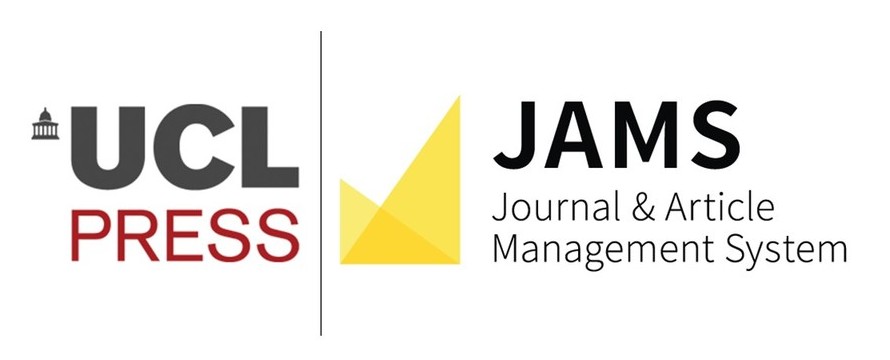
We are delighted to announce that UCL Press has adopted MDPI's Journal Article & Management System, JAMS, including production services. JAMS is a modular, integrated editorial platform for academic publishers. It offers flexibility, ease-of-use, and is a fully integrated solution for the end-to-end management of scholarly journals. JAMS is based on the software used to publish MDPI’s portfolio of journals.
Ian Caswell, UCL Press Journals Manager, says he is "excited to see UCL Press and MDPI partner together to implement the JAMS submission system for all UCL Press journals. The system offered a flexible, efficient and straightforward solution for our processes from author submission to ready for publication. I am grateful for the valuable experience and support MDPI have offered and look forward to developing our programme with an effective submission system in place.” Dr Martyn Rittman, MDPI’s Publishing Services Manager, adds, “We are proud to support one of the UK’s premier university presses in their publishing operation. This is an excellent way for us at MDPI to share our experience and knowledge, and benefit the research community beyond our own journals.”
JAMS combines services that are kept separate for many publishers. The entire editorial process, production and invoicing (e.g. for open access article processing charges) are fully integrated into a single platform. This allows for efficient, fast manuscript processing. For further information about JAMS, see https://www.mdpi.com/publishing_services.
23 November 2017
New Participants in the Institutional Open Access Program (IOAP)
We are pleased to welcome new participants to MDPI's Institutional Open Access Program (IOAP), designed to help institutions manage the transition to the Open Access publishing model. Researchers affiliated with participating universites benefit from a 10% discount on the Article Processing Charges (APC) for any paper published in an MDPI journal, while the participating library or university incurs no basic fee for participating in the program.
The IOAP set of free services, provided by MDPI to institutions that sign up, include:- No fee for participants and no obligation to prolong after the initial 12 months. The participants may withdraw from the programme at any time, and we will also keep it free for the library for as long as they continue in the programme.
- Authors affiliated with the university will receive a 10% discount on the APC.
- The institution is granted free access to the MDPI submission system and can receive free alerts of new submissions to our journals.
- By default, authors from the institution will continue to be invoiced directly unless the institution opts for central billing.
- Auto-archiving of papers into the institutions´ repository as long as it supports SWORD 1.3.
More details about the programme and a list of our current participant institutions can be found at: https://www.mdpi.com/about/ioap
Institutions which are interested to participate may do so online at: https://www.mdpi.com/ioap-form
The following North American universities have signed up to the IOAP program recently:
Connecticut College, USA
Emory University, USA
Florida International University, USA
Johns Hopkins University, USA
Mississippi State University, USA
Northeastern University, USA
Rice University, USA
University of Ontario Institute of Technology, Canada
University of Rhode Island, USA
University of Texas Southwestern Medical Center, USA
University of Toronto, Canada
University of Windsor, Canada
University of Wisconsin–Madison, USA
Wellesley College, USA
West Virginia University, USA
Many prestigious institutions from Europe and Asia have joined as well:
Asia Pacific University of Technology & Innovation, Malaysia
Czech Technical University in Prague, Czech Republic
Gdansk University of Technology, Poland
Martin-Luther-Universität Halle-Wittenberg, Germany
National Chung Hsing University, Taiwan
Newcastle University, UK
Northumbria University, UK
Southwest University, China
Technical University of Crete, Greece
University Malaya, Malaysia
University of Antwerp, Belgium
University of Cyprus, Cyprus
University of Manchester, UK
University of Reading, UK
University of Sussex, UK
University of Warwick, UK
West Pomeranian University of Technology Szczecin, Poland
We offer a warm welcome to the new participants!
10 November 2017
Available Journal Awards at MDPI
In order to reward the academic community, especially young researchers, and enhance communication among scientists, MDPI journals regularly offer various awards to researchers in specific fields, for example, Young Investigator Awards, Travel Awards, Best Paper Awards, and Best Poster Awards, etc. The awardees range from PhD students to junior scientists.
Currently, the following 44 awards given by MDPI journals are accepting applications. Please click on the award title below to check whether you are eligible for it and start the application process.
|
Subject |
Journal |
Award |
Intended Awardee |
|
Biology & Life Sciences |
Animals |
PhD students or postdoctoral researchers |
|
|
Antioxidants |
Postdoctoral researchers or PhD students |
||
|
Biology |
PhD or postdoctoral fellows |
||
|
Forests |
Postdocs or PhD students |
||
|
International Journal of Molecular Sciences (IJMS) |
Ground-breaking contribution in the fields of Molecular Biology, and Molecular Pathology |
||
|
Journal of Fungi (JoF) |
Travel Awards 2018 |
PhD graduate students, and postdoctoral fellows |
|
|
Life |
Travel Award 2018 |
PhD students or postdoctoral fellows |
|
|
Metabolites |
PhD students |
||
|
Pharmaceuticals |
PhD students |
||
|
Toxins |
Postdoctoral fellows |
||
|
Viruses |
Viruses 2018 participants |
||
|
Viruses |
Viruses 2018 participants |
||
|
Water |
2018 Young Investigator Award |
Young investigators |
|
|
Chemistry & Materials Science |
Biomimetics
|
Graduate Student or Postdoctoral Trainee / Research Associate |
|
|
Catalysts |
PhD students |
||
|
Chemosensors |
PhD or postdoctoral fellows |
||
|
Entropy |
Young investigators |
||
|
Fibers |
2018 Travel award |
Postdocs or PhD students |
|
|
Magnetochemistry |
Postdocs |
||
|
Materials |
PhD or postdoctoral fellows |
||
|
Metals |
PhD or postdoctoral fellows |
||
|
Minerals |
PhD or postdoctoral fellows |
||
|
Sensors |
Travel Award 2018 |
PhD or postdoctoral fellows |
|
|
Sensors |
Sensors' reviewers in 2017 |
||
|
Sensors |
Young investigators |
||
|
Technologies |
PhD students |
||
|
Computer Science & Mathematics |
Multimodal Technologies and Interaction (MTI) |
Postdoctoral researchers or PhD students |
|
|
ISPRS International Journal of Geo-Information(IJGI) |
Postdocs |
||
|
Journal of Sensor and Actuator Networks (JSAN) |
Postdoctoral fellows and PhD students |
||
|
Journal of Imaging |
Postdoctoral fellows and PhD students |
||
|
Engineering |
Actuators |
PhD or postdoctoral fellows |
|
|
Remote Sensing |
Authors |
||
|
Machines |
PhD or postdoctoral fellows |
||
|
Micromachines |
PhD or postdoctoral fellows |
||
|
Fluids |
Postdoctoral fellows and PhD students |
||
|
ChemEngineering |
Postdoctoral researchers and PhD students |
||
|
Environmental & Earth Sciences |
Diversity |
Travel Awards 2018 |
Postdoctoral fellows |
|
International Journal of Environmental Research and Public Health (IJERPH) |
Authors who submit from 1 Nov 2017 to 31 Oct 2018 |
||
|
Resources |
Postdocs or PhD students |
||
|
Geosciences |
Postdoctoral fellows and PhD students |
||
|
Physical Sciences & Astronomy |
Galaxies |
Ph.D. students, postdoctoral fellows, or lecturers in cosmology or galaxies physics |
|
|
Applied Science |
Postdocs |
||
|
Medicine & Pharmacology; Public Health & Healthcare |
Journal of Clinical Medicine (JCM) |
PhD or postdoctoral fellows |
|
|
Medicines |
Postdocs |
7 November 2017
MDPI has signed the Jussieu Call for Open Science and Bibliodiversity
The Jussieu Call aims to develop and implement alternative models to meet the aims of open science while promoting bibliodiversity. In particular it wishes to promote new business models for funding open access publication. It was drafted on the Jussieu campus in Paris by a group of French researchers and scientific publishing professionals.
MDPI supports scholarly communities and initiatives that innovate and further promote Open Access publishing. There is a need to explore different frameworks to fund open access in ways that ensure that excessive funds are not diverted from research towards publishing. Many fair funding models already exist, and they can be further developed and extended. These include institutional support, library contributions or subsidies, premium services, participatory funding, etc. For this reason, MDPI has signed up to the Jussieu call and welcomes its aims.
More information can be found at http://jussieucall.org/ (archived here)

6 October 2017
Dr. Franck Vazquez, MDPI CEO, Interviewed by Scholarly Kitchen
The Society for Scholarly Publishing’s popular blog about topics in academic publishing, Scholarly Kitchen, recently interviewed MDPI’s CEO, Dr. Franck Vazquez. He shared some thoughts and information on the past and future of MDPI and open access publishing in general:
“In the long run, we aim to anchor MDPI in research communities. We recently developed and launched the preprint platform Preprints, revamped our free-to-use conference hosting platform Sciforum, and are working on other projects, such as Scilit, our bibliographic database.”
Read the full interview here.
19 September 2017
A Warm Welcome to the New IOAP Participants
We are delighted to have welcomed 24 new participants to our Institutional Open Access Programme (IOAP) since the beginning of September this year. These are University libraries and Research Institutions located around the world; from the USA and Canada to the UK, and from Norway and Spain to Greece. Well respected Universities, such as the University of Denver, the University of Colorado Boulder, and the University of Arizona in the US, have signed up, while their researchers can now benefit from a 10% discount on the Article Processing Charges (APC) for any papers they publish in MDPI journals, at no cost for the library or the University.
We are more than happy to see the Open Access movement growing stronger and wider every day and we appreciate the vital role which librarians, repository managers, and other scholarly communications professionals play in the field. Our communication with and service to this community is, therefore, one of our principal priorities. The IOAP is our way to support academic and scientific Institutions as well as their scholars in managing, administrating, and publishing research in an Open Access world.
The IOAP set of free services, provided by MDPI to institutions that sign up, include:
- No fee for participants and no obligation to prolong after the initial 12 months. The participants may withdraw from the programme at any time, and we will also keep it free for the library for as long as they continue in the programme.
- Authors affiliated with the university will receive a discount on the article processing charge (APC).
- The institution is granted free access to the MDPI submission system and can receive free alerts of new submissions to our journals.
- By default, authors from the institution will continue to be invoiced directly unless the institution opts for central billing.
- Auto-archiving of papers into the institutions´ repository as long as it supports SWORD 1.3.
More details about the programme and a list of our current participant institutions can be found at: https://www.mdpi.com/about/ioap
Institutions which are interested to participate may do so online at: https://www.mdpi.com/ioap-form
The full list of the Institutions that signed up in September is as follows:
- University of Denver, USA
- University of Colorado Boulder, USA
- University of Arizona, USA
- Institute of Metrology of Bosnia and Herzegovina, Bosnia and Herzegovina
- Middlebury College, USA
- Touro College, USA
- University of New Orleans, USA
- University of Leicester, UK
- Indiana University-Purdue University Indianapolis, USA
- University of Strathclyde, UK
- Cranfield University, UK
- Hope College, USA
- Oregon State University, USA
- Drew University, USA
- Swansea University, UK
- University of South Florida, USA
- University of Georgia, USA
- Arizona State University, USA
- University of Southern Mississippi, USA
- Université du Québec à Chicoutimi, Canada
- Grinnell College, USA
- Norwegian University of Science and Technology, Norway
- University of Patras, Greece
- Public University of Navarre, Spain
23 June 2017
Congratulations for Publishing the 100,000th Peer-Reviewed Article
Congratulations to the authors Javier Monroy and Javier Gonzalez-Jimenez from Universidad de Malaga, Spain, Victor Hernandez-Bennets, Han Fan and Achim Lilienthal from Örebro University, Sweden for publishing the 100,000th peer-reviewed article.
The article is published in the Chemical Sensors section of Sensors.
GADEN: A 3D Gas Dispersion Simulator for Mobile Robot Olfaction in Realistic Environments
Evermore pressing environmental concerns have led global actors and decision-makers to search for stricter emission monitoring approaches. As part of novel monitoring systems, robots with gas and environmental sensors are a promising solution. However, validation of such robotic inspectors is expensive, time consuming, and plagued by repeatability issues. In this article, we present GADEN (the short form for Gas Dispersion Simulator for Mobile Robot Olfaction in Realistic Environments), which combines gas dispersion and robotics simulation in a common framework. Developed under the widely used Robot Operating System (ROS), GADEN enables validation of sensing strategies with gas dispersion being simulated using computational fluid dynamics and filament dispersion theory. GADEN allows simulating complex, realistic, 3D environments for reproducible testing of robotic gas sensing algorithms. Through qualitative and quantitative evaluations, we show that GADEN is a versatile and user-friendly evaluation tool and emphasize its enormous potential for the mobile robot olfaction community.
Read the full article here: https://www.mdpi.com/1424-8220/17/7/1479/htm
14 June 2017
2016 Impact Factor Released for Nutrients – 3.550
Nutrients now ranks 23/81 (Q2) in the category ‘Nutrition & Dietetics’. The journal continues to rank second among ten other Open Access journals in nutrition and dietetics.
Evolution of Impact Factor, Citations and Publications for Nutrients:
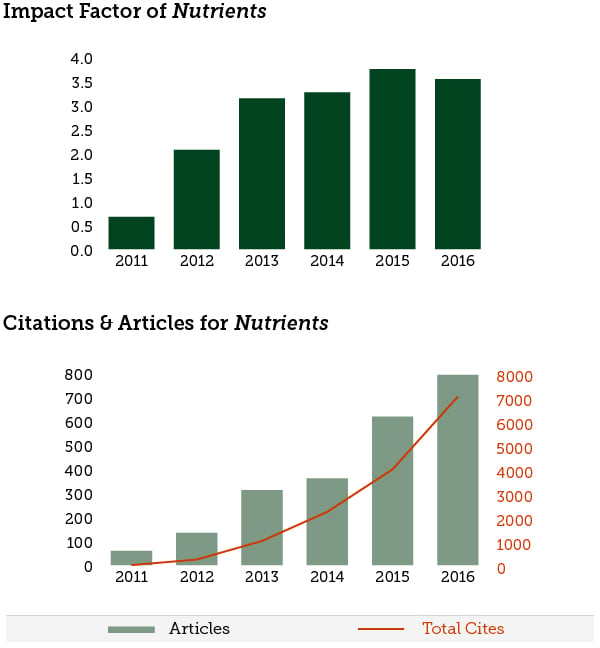
6 June 2017
CiteScore™ Metrics Released for Scopus Journals
The CiteScore, the new citation metric for journals covered in the Scopus® database, was released on 1 June 2017, reflecting the citation activity in 2016 for articles published during the three previous years. Please note that the list below does not contain all MDPI journals covered in Scopus. For the CiteScore to serve as a reliable metric at least three volumes of articles need to be indexed in Scopus; journals which have not met this criterion have been omitted here.
Ten MDPI journals received a CiteScore which is in the Top 10% of scores in at least one of the categories, while a further 21 journals exhibit scores that are in the first quartile of the respective categories.
CiteScore Data for MDPI Journals
| Journal | Rank | Category | Link | CiteScore 2016 | 2015 |
2014 |
| Algorithms | 44/112 (Q2) 49/111 (Q2) 19/42 (Q2) 52/113 (Q2) |
• Numerical Analysis • Computational Mathematics • Computational Theory and Mathematics • Theoretical Computer Science |
Link | 1.15 | 1.07 | 1.06 |
| Animals | 69/343 (Q1) 21/146 (Q1) |
• Animal Science and Zoology • General Veterinary |
Link | 1.46 | 1.66 | 0.74 |
| Biology | 13/92 (Q1) 34/81 (Q1) 10/75 (Q1) |
• General Agricultural and Biological Sciences • General Biochemistry, Gene- tics and Molecular Biology • General Immunology and Microbiology |
Link | 3.02 | 2.78 | 1.74 |
| Biomolecules | 234/382 (Q3) 260/353 (Q3) |
• Biochemistry • Molecular Biology |
Link | 1.67 | 3.08 | 1.00 |
| Biosensors | 36/118 (Q2) 209/2156 (Q1) |
• Clinical Biochemistry • General Medicine |
Link | 2.83 | 2.37 | 2.04 |
| Cancers | 29/196 (Q1) 27/321 (Q1) |
• Cancer Research • Oncology |
Link | 5.02 | 4.07 | 2.31 |
| Catalysts | 18/44 (Q2) 27/144 (Q1) |
• Catalysis • Physical and Theoretical Chemistry |
Link | 3.44 | 3.45 | 2.17 |
| Crystals | 70/270 (Q2) 25/64 (Q2) 118/398 (Q2) 131/424 (Q2) |
• General Chemical Engineering • Inorganic Chemistry • Condensed Matter Physics • General Materials Science |
Link | 1.89 | 1.47 | 1.03 |
| Diversity | 10/41 (Q1) 9/25 (Q2) 76/291 (Q2) 24/109 (Q1) |
• Agricultural and Biological Sciences (miscellaneous) • Ecological Modelling • Ecology • Nature and Landscape Conservation |
Link | 2.03 | 1.96 | 1.82 |
| Energies | - | - | Link | 2.50 | 2.87 | 2.66 |
| Entropy | 51/198 (Q2) | • General Physics and Astronomy | Link | 1.87 | 1.99 | 1.69 |
| Forests | 17/127 (Q1) | • Forestry | Link | 2.06 | 1.76 | 1.84 |
| Games | 204/398 (Q3) 83/181 (Q2) 48/105 (Q2) |
• Applied Mathematics • Statistics and Probability • Statistics, Probability and Uncertainty |
Link | 0.87 | 0.57 | 0.64 |
| Genes | 62/300 (Q1) 18/90 (Q1) |
• Genetics • Genetics (clinical) |
Link | 3.62 | 3.18 | 1.33 |
| Geosciences | 36/169 (Q1) |
• General Earth and Planetary Sciences | Link | 1.67 | 1.29 | 1.13 |
| Information | 156/237 (Q3) | • Information Systems | Link | 0.78 | 0.94 | 0.74 |
| Insects | 28/131 (Q1) | • Insect Science | Link | 1.81 | 1.38 | 1.23 |
| International Journal of Environmental Research and Public Health (IJERPH) | 67/446 (Q1) 31/102 (Q2) |
• Public Health, Environmental and Occupational Health • Health, Toxicology and Mutagenesis |
Link | 2.38 | 2.42 | 2.47 |
| International Journal of Molecular Sciences (IJMS) | 23/157 (Q1) 8/64 (Q1) 90/353 (Q1) 22/144 (Q1) 16/44 (Q1) 8/62 (Q1) |
• Organic Chemistry • Inorganic Chemistry • Molecular Biology • Physical and Theoretical Chemistry • Catalysis • Spectroscopy |
Link | 3.73 | 3.37 | 3.06 |
| ISPRS International Journal of Geo-Information | 12/29 (Q2) 28/79 (Q2) 96/587 (Q1) |
• Computers in Earth Sciences • Earth and Planetary Sciences (miscellaneous) • Geography, Planning and Development |
Link | 1.62 | 1.52 | - |
| Journal of Low Power Electronic Applications (JLPEA) | 301/645 (Q2) | • Electrical and Electronic Engineering | Link | 0.98 | 0.83 | 0.83 |
| Life | 65/525 (Q1) 36/186 (Q1) 5/92 (Q1) 20/80 (Q2) |
• Ecology, Evolution, Behavior and Systematics • General Biochemistry, Gene- tics and Molecular Biology • Palaeontology • Space and Planetary Science |
Link | 2.95 | 1.68 | 1.20 |
| Marine Drugs | 18/145 (Q1) | • Drug Discovery | Link | 3.83 | 3.66 | 3.59 |
| Materials | 63/424 (Q1) | • General Materials Science | Link | 3.26 | 3.11 | 2.69 |
| Membranes | 103/424 (Q1) | • Materials Science | Link | 2.19 | 2.95 | 2.42 |
| Micromachines | 173/645 (Q2) 69/211 (Q2) 113/526 (Q1) |
• Electrical and Electronic Engineering • Control and Systems Engineering • Mechanical Engineering |
Link | 1.83 | 1.78 | 2.10 |
| Minerals | 45/206 (Q1) 29/167 (Q1) |
• Geology • Geotechnical Engineering and Engineering Geology |
Link | 2.13 | 1.77 | - |
| Molecules | 32/157 (Q1) | • Organic Chemistry | Link | 3.09 | 2.65 | 2.62 |
| Nutrients | 12/247 (Q1) | • Food Science | Link | 4.29 | 4.07 | 3.78 |
| Pharmaceuticals | 8/168 (Q1) 21/158 (Q1) |
• Pharmaceutical Science • Molecular Medicine |
Link | 4.90 | 3.64 | 1.92 |
| Pharmaceutics | 19/168 (Q1) | • Pharmaceutical Science | Link | 3.83 | 2.68 | 2.46 |
| Polymers | 13/138 (Q1) 44/354 (Q1) |
• Polymers and Plastics • General Chemistry |
Link | 3.74 | 3.37 | 4.10 |
| Remote Sensing | 13/169 (Q1) | • General Earth and Planetary Sciences | Link | 3.56 | 3.76 | 3.23 |
| Sensors | 25/96 (Q2) 25/159 (Q1) 124/382 (Q2) 103/645 (Q1) |
• Analytical Chemistry • Atomic and Molecular Physics, and Optics • Biochemistry • Electrical and Electronic Engineering |
Link | 2.78 | 2.21 | 2.40 |
| Sustainability | 49/129 (Q2) 68/587 (Q1) 56/236 (Q1) |
• Renewable Energy, Sustai-nability and the Environment • Geography, Planning and Development • Management, Monitoring, Policy and Law |
Link | 1.96 | 1.78 | 1.52 |
| Symmetry | 17/42 (Q2) 49/111 (Q2) |
• Numerical Analysis • Computational Mathematics |
Link | 1.12 | 0.95 | 1.02 |
| Toxins | 16/102 (Q1) 16/108 (Q1) |
• Health, Toxicology and Mutagenesis • Toxicology |
Link | 3.34 | 3.76 | 2.85 |
| Vaccines | 146/184 (Q4) 151/250 (Q3) 93/145 (Q3) 186/299 (Q3) 130/232 (Q3) |
• Immunology • Infectious Diseases • Drug Discovery • Pharmacology • Pharmacology (medical) |
Link | 1.23 | 3.76 | 2.85 |
| Viruses | 15/68 (Q1) 34/250 (Q1) |
• Virology • Infectious Diseases |
Link | 3.60 | 3.74 | 3.80 |
| Water | 33/184 (Q1) 48/195 (Q1) 62/587 (Q1) 198/382 (Q3) |
• Water Science and Technology • Aquatic Science • Geography, Planning and Development • Biochemistry |
Link | 2.05 | 1.96 | 1.45 |
17 May 2017
Three New Institutional Memberships Established
We are pleased to announce that the Goethe University of Frankfurt, the Technical University of Hamburg (TU Hamburg-Harburg), as well as the Humboldt University of Berlin, in Germany, have joined MDPI's institutional membership program: Primary authors from these instititions will benefit from a 10% discount on the article processing charges.
Additional details can be found on our institutional membership page.
4 May 2017
MDPI Supports the Initiative for Open Citations (I4OC)
As an open access publisher, we are keen to support openness and transparency in the research process. Citation data is very important for assessing the value of individual papers and the contribution of researchers. As such, we support the recently launched Initiative for Open Citations (I4OC). The initiative recognizes that citations should be freely available and machine-readable. By doing so, authors gain the maximum benefit from having their work cited.
MDPI now uploads citation data with metadata uploaded to Crossref when registering digital object identifiers (DOIs) for published papers. We are delighted to take this step to support a truly open research environment.
2 May 2017
Publons Peer Review Academy Goes Live
Getting high quality review reports is critical for any journal’s editorial process. At MDPI we have put in place several measures to motivate reviewers and reward them for their work. We are proud of the quality of reviewer reports we receive and grateful for the hours put in by active researchers from across the globe.
Reviewers of MDPI’s largest journals can get recognition via Publons, a website dedicated to rewarding peer reviewers. They have now taken this one step further and launched the Publons Reviewer Academy to help train reviewers to provide useful feedback. Through the academy, researchers can be trained and tutored in various aspects of how to provide structured feedback that will be of genuine help to editors and authors. We support this initiative and recommend it to potential MDPI reviewers, especially early career researchers. See the Publons announcement for further information.
More information on reviewing for MDPI, including how to volunteer as a reviewer, can be found here.
24 April 2017
Two New Institutional Memberships Established
We are pleased to announce that the following universities have joined MDPI's institutional membership program: Trinity University, San Antonio, Texas, USA and the University of New South Wales (UNSW), Sydney, Australia. Primary authors from these instititions will benefit from a 10% discount on the article processing charges.
Additional details can be found on our institutional membership page.
30 March 2017
Credit for Preprints Comments via Publons
Preprints.org is a platform run by MDPI that allows authors to make early versions of manuscripts available before peer review has been completed.
One of the major benefits of putting a preprint online is to get feedback before journal submission. Until now, however, the feedback has been on a voluntary basis. Preprints is delighted to be the first preprint server to collaborate with Publons to acknowledge substantial comments as reviews and give commentators the opportunity to receive credit for their efforts.
When you add a comment to any article, there is a check box to click for it to appear on Publons. If you have already linked your account it will be passed on automatically. If you don't already have a Publons account, you will be contacted soon afterwards with instructions on how to create one.
We appreciate the enthusiasm and cooperation of Publons in this project and expect it to be of great benefit to authors and commenters alike.
20 March 2017
MDPI 2016 Annual Report Released
We are pleased to announce that our annual report for the year 2016 has now been published.
It contains information regarding company and journal performance, conferences and other publishing services that we provided throughout 2016.
To read the report in full or download a copy, please click here.
15 March 2017
Our 100,000th Article Could be Yours!
After the 20th anniversary of MDPI in 2016, we will reach another milestone this year and will publish the 100,000th peer-reviewed article in one of our 170+ open access journals.
We would like you to be part of this great achievement and so are offering to publish the 100,000th accepted paper free of charge.
To be in with a chance, select a journal in one of our 10 scientific subject areas and submit your paper.
Access the live tracker on published articles here.
![]()
3 March 2017
1000 Preprints Online
We are delighted that Preprints now has 1000 papers online since its launch on 3 May 2016.
For more information, see the editorial here.
9 February 2017
Hero Scientists Publish Paper in Nutrients
The research aims to demonstrate that the partial substitution of refined cereals by wholegrain cereals was not affecting the sensorial acceptability of the infant cereals in both infants and parents.
Read the full Hero press release here.
The Hero Group is an international food company focused on branded nutritional food products, founded in 1886 in Lenzburg, Switzerland.
9 February 2017
Minister and State Secretaries Visit MDPI Office at STP, Belgrade, Serbia
Earlier this week the Science Technology Park in Belgrade, Serbia was visited by Swiss Secretary of State Dr. Mauro Dell’Ambrogio, as well as Serbian Minister of Public Administration and Local Self-Government Ana Brnabic, State Secretary Dr. Vladimir Popovic and Mayor of Belgrade Mr. Siniša Mali.
During the visit to the STP they had a short presentation from MDPI’s CEO Dr. Franck Vazquez and IT Manager Mr. Miloš Čučulović, and further discussed important issues such as Open Access and Open education. Dr. Dell'Ambrogio said he was impressed with the potential for development and ideas for business.
For more information please see:
http://bit.ly/2kpIu7k and http://bit.ly/2kpUQfz
7 February 2017
The 6th World Sustainability Forum: Final Press Release
Basel, 29 January 2017
The 6th World Sustainability Forum #WSF2017SA: African universities critical to achieving the Sustainable Development Goals
Jeffrey and Sonia Sachs win first World Sustainability Award.
Universities need to take the lead in solving the greatest challenges the world faces today, particularly in Africa. They need to do this not only through education – teaching the next generation to think critically and creatively to find sustainable solutions – but also through research that cuts across a range of disciplines. To ensure these solutions are implemented, they need to partner with the private sector and with government.
This was the key message from the 6th World Sustainability Forum (WSF2017), which took place in Cape Town on 27 and 28 January 2017. Sponsored by MDPI and the journal Sustainability under the patronage of the Universities of the Western Cape (UWC), Cape Town (UCT), University of Basel and the National Research Foundation (NRF) of South Africa, the conference was attended by key national and international speakers, including world-leading economist Professor Jeffrey D. Sachs, senior United Nations (UN) advisor and director of the Earth Institute at Columbia University.
The WSF is an annual sustainability conference which addresses research in a range of areas related to sustainable development and sustainability globally. This was the first WSF to take place on the African continent. Discussions at the 2017 conference were driven by the 17 sustainable development goals (SDGs) adopted as part of the 2030 Agenda for Sustainable Development by the UN in September 2015.
Achieving the SDGs “is the moonshot for our generation,” said Sachs. “Like the moonshot [moon landing] of the 1960s, these are tough, bold and achievable objectives.”
“This is a nasty, tough world we live in, and our world agrees on very little. So when 193 governments agree on something, that is important. And when they agree on something as important as sustainable development, that is really something for us to grab hold of – that is a lifeline.”
There was agreement at the WSF that the SDGs are particularly important for Africa, and that African universities in particular have a role to play in achieving them.
Said Professor Tyrone Pretorius, vice-chancellor of UWC: “The quest for sustainable development can only be met through education. Universities today are the oil that fuels the knowledge economy.”
As part of the drive to develop academic capacity to provide the knowledge needed to meet the SDGs, WSF2017 was preceded by the 1st Postgraduate Forum on Sustainability. “A series of workshops for postgraduate education linked to WSF are important, in order to equip postgraduates with the skills necessary to promote sustainability,” said Professor Thandi Mgwebi, director for research at UWC. A second postgraduate forum will take place alongside the WSF2018 in Beijing.
This capacity development is particularly critical to Africa. Said Sachs: “African universities need to do research to find solutions to Africa’s development challenges, because no other university will.”
The UN set a target of achieving the SDGs by 2030: “I regard this as the breakthrough period to end extreme poverty on the continent,” said Sachs, “and for Africa to become one of the most dynamic centres of the world economy.”
It is a critical time for South African universities, said Professor Mamokgethi Phakeng, deputy vice-chancellor for research and internationalisation at UCT: “Higher education is at a crossroads, and there is much polarisation. We need to think carefully about how this sustainable development agenda is owned by all so that it is inclusionary.”
There was also strong emphasis on public–private partnerships – for universities, business and government to work together to achieve the goals.
Said Professor Francis Petersen, deputy vice-chancellor at UCT and vice-chancellor designate at the University of the Free State: “Business sustainability has become critical, because there is increasing demand and complexity of demand on business from the natural, social and economic environment. Sustainability cannot be a standalone issue, divorced from business as usual. Sustainability needs to be embedded into business.”
Environmental crises and climate change was also high on the WSF agenda. In his keynote address, Sachs noted the irreversibility of the climate- and environmental-related challenges.
“If we don’t get our act together, we lose the chance of safety,” he said.
Said Professor Mark New, pro vice-chancellor and director of the African Climate and Development Initiative at UCT: “We have a fundamental challenge in responding to climate change, and we must go further than just putting a plaster on a wound. We need to address the deep structural issues, to move from our current model of development into climate-compatible development.”
“This requires researchers to find the evidence for the correct development pathways to take, and then support the ability of policymakers at all levels to enable the shift to climate-compatible development planning.”
Said Dr. Aldo Stroebel, executive director of international relations and cooperation at the NRF, in closing: “We have seen over the past two days an urgency towards the next step of thinking, that critical type of framework that we all must engage with, not only from an academic perspective, but further up into the policy environment and into rural-based environments where one can clearly see the links and effectiveness of the work.”
World Sustainability Awards
The first World Sustainability Award and the first Emerging Sustainability Leader Awards were presented by Prof. Thandi Mgwebi, Director of Research at UWC, and Dr. Franck Vazquez, CEO of MDPI, during the ceremony on 27 January 2017 as part of the gala dinner of the 6th World Sustainability Forum in South Africa.after day one of proceedings of the 2017 World Sustainability Forum South Africa.
Professor Jeffrey D. Sachs and Dr. Sonia Ehrlich Sachs are the joint recipients of the first World Sustainability Award. Jeffrey Sachs is a world-renowned economist and senior United Nations (UN) advisor and director of the Earth Institute at Columbia University. Sonia Sachs is a paediatrician and public health specialist, and director of the Health Centre at the Centre for Sustainable Development, also at Columbia University.
The joint recipients of the first Emerging Sustainability Leader Award are Dr. Esther Ngumbi and Dr. Xiaosong Hu. Esther Ngumbi is a postdoctoral researcher at Auburn University in Alabama USA and serves as a 2015 Clinton Global University Mentor for agriculture. Xiaosong Hu is a professor at the Chongqing University in China and specialises in automotive control systems and mechanical engineering.
The World Sustainability Award and the Emerging Sustainability Leader Awards are funded to encourage new initiatives and developments in sustainability with the ultimate aim of fostering the transition to sustainable practices and societies.
The World Sustainability Award is funded by the MDPI Sustainability Foundation, and included a monetary prize of USD 100,000 to Jeffrey and Sonia Sachs. The Emerging Sustainability Leader Award is funded by the journal Sustainability, awarded to researchers under 40, and included a monetary prize of USD10,000.
Issued jointly by: UCT Global Strategy and Visibility, Research Office, UWC Communications & Media and MDPI AG
Conference photos are free available at: https://sciforum.net/conference/wsf-6/page/175 Photo credit: Matthias Burkhalter
|
Carla Bernardo |
Luthando Tyhalibongo |
Matthias Burkhalter |
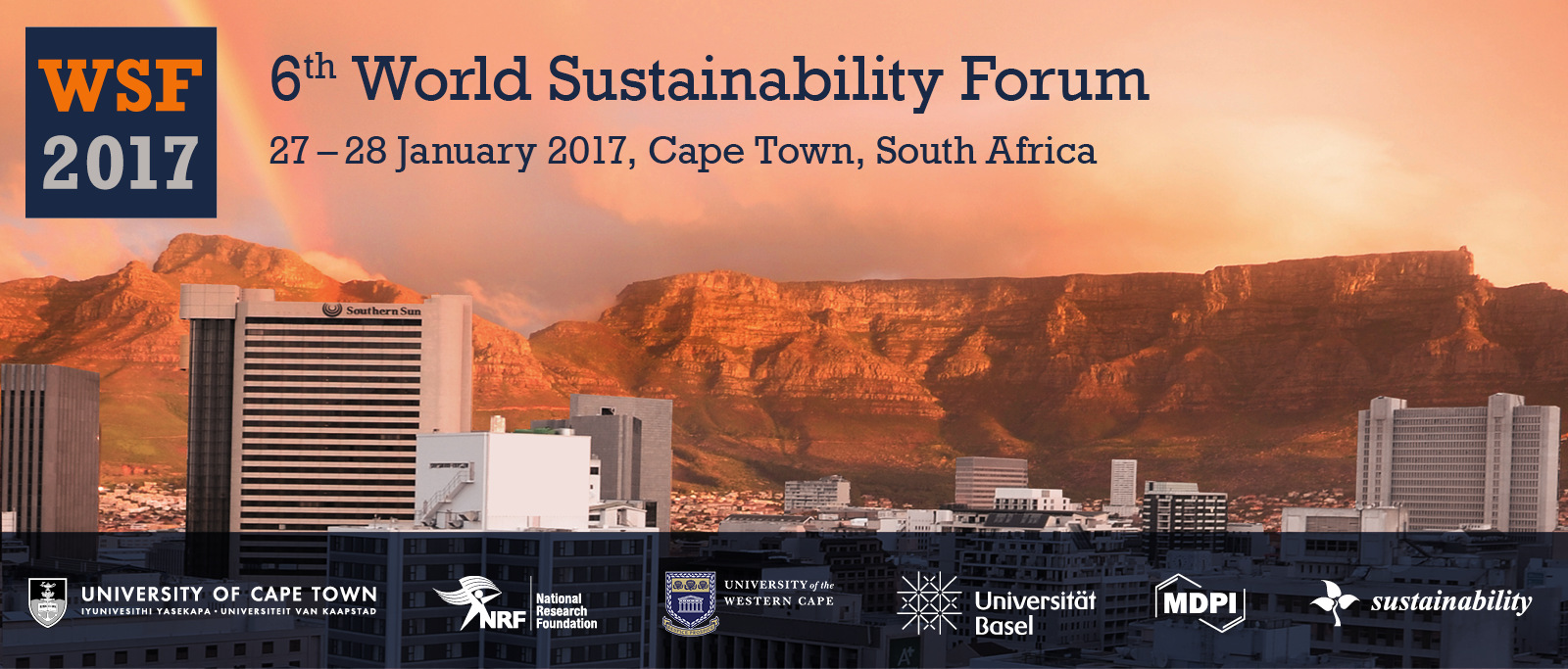
31 January 2017
Three New Institutional Memberships Established
We are pleased to announce that the Chalmers University of Technology, Sweden, the University of Manitoba, Canada and the Technical University of Cartagena, Spain, have joined MDPI's institutional membership program: Primary authors from these institutions will benefit from a 10% discount on the article processing charges.
Additional details can be found on our institutional membership page.
27 January 2017
6th World Sustainability Forum under way in South Africa
The 6th World Sustainability Forum is currently being held at the Cape Sun Hotel until 28 January 2017.
The Forum will showcase the work of internationally renowned researchers and include more than 150 presentations. During the conference dinner, the World Sustainability Award, associated with a US$ 100,000 prize, will be announced, as well as the Emerging Sustainability Leader Award, associated with a US$ 10,000 prize. The prizes are sponsored by the MDPI Sustainability Foundation and Sustainability, an academic open access journal by MDPI.
Here are some pictures from the forum so far:
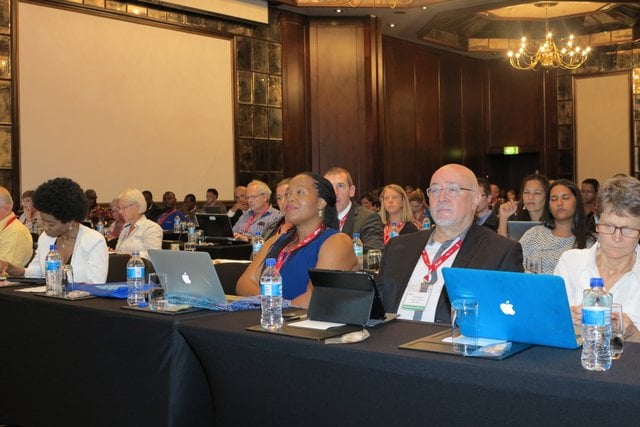


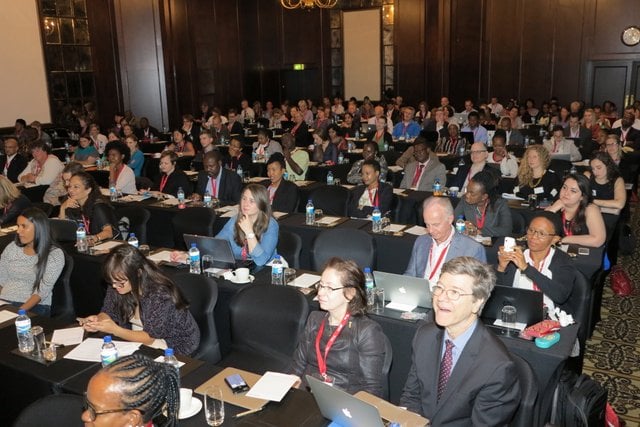
To see the full WSF2017 program and schedule, please see here: https://sciforum.net/conference/wsf-6/page/schedule
19 January 2017
Cape Town to Host the 6th World Sustainability Forum
Cape Town will host the 6th World Sustainability Forum at the Cape Sun Hotel on 27 and 28 January 2017. This prominent event, held for the first time in Africa, will include many illustrious South African and international experts, such as Her Excellency Graça Machel (Sustainable Development Advocate for the United Nations, Mozambique), Joyene Isaacs (HoD Agriculture Western Cape Government), Jeffrey Sachs (Columbia University, USA), Max Bergman (SRaM, University of Basel), Mark New (Pro Vice-Chancellor, University of Cape Town), Frans Swanepoel (FutureAfrica, University of Pretoria) and Francis Petersen (Vice-Chancellor-designate, University of the Free State). The Forum will provide a stage for national and international debates on sustainability in South Africa, the African continent, and about international perspectives on sustainability. It brings together researchers and representatives from government and the business sector to discuss a wide-ranging set of issues associated with sustainability, including food security, water and energy scarcity, mining, poverty reduction, climate change, and urbanisation.
The next few decades will be marked by profound changes in the relationships between global economics, national societies, and the environment. We have entered what some call the Anthropocene, an age in which human activity dominates the climate and the environment. These changes will have numerous consequences on societies around the globe. South Africa and Africa will play a central role, for better or worse, in creating opportunities and risks during these changing times as Africa is profoundly influencing and being influenced by global developments.
The adoption of the 17 United Nations Sustainable Development Goals and the 2030 Agenda for Sustainable Development in September 2015 was accompanied by what insiders considered an optimism they have not experienced in relation to UN resolutions before. The relative efficiency in the drafting, the lack of trenches between East and West, or between North and South, and the unanimity of support of the 193 countries speak volumes. In stark contrast, sustainability seems to go against a changing economic and political tide, where waves of nationalism and protectionism from some of the most powerful countries risk the wellbeing of the rest of the world. The 6th World Sustainability Forum will enable fruitful exchanges, which sensitise South African and international communities to the global urgency and specifics of sustainability.
The Forum will showcase the work of internationally renowned researchers and include more than 150 presentations. During the conference dinner, the World Sustainability Award, associated with a US$ 100 000 prize, will be announced, as well as the Emerging Sustainability Leader Award, associated with a US$ 10 000 prize. The prizes are sponsored by the MDPI Sustainability Foundation and Sustainability, an academic open access journal by MDPI. The World Sustainability Forum is preceded by the Postgraduate Forum on Sustainability, which will introduce more than 100 young scholars from South Africa and the African continent to sustainability research. Both events are organized and sponsored by the University of Cape Town, the University of the Western Cape, the University of Basel, MDPI, and by the National Research Foundation of South Africa.
Contacts:
Scientific Matters: Prof Manfred Max Bergman, Social Research and Methodology Group (SRaM), University of Basel, Switzerland; Email: max.bergman@unibas.ch
Press Accreditation and General Enquiries: Mr Matthias Burkhalter, MDPI AG, Basel, Switzerland; Email: burkhalter@mdpi.com; Tel. +41 61 683 77 34
Follow us on Twitter
#WSF2017SA
6 January 2017
MDPI Supports the OA2020 Initiative
MDPI is now a proud supporter of the OA2020 Initiative.
Open Access 2020 is an international initiative that aims to induce the swift, smooth and scholarly-oriented transformation of today’s scholarly journals from subscription to open access publishing.
MDPI is participating in the upcoming Berlin13 conference in March 2017, where we are contributing to the initiative by aiding in the design of the roadmap which will make OA the default publishing model.
For more information please see here.
5 January 2017
Three New Institutional Memberships Established
We are pleased to announce that the University of Texas at Arlington, USA, the Harbin Institute of Technology, China and TU Darmstadt, Germany, have joined MDPI's institutional membership program: Primary authors from these institutions will benefit from a 10% discount on the article processing charges.
Additional details can be found on our institutional membership page.
22 December 2016
Two New Institutional Memberships Established
We are pleased to announce that the Otto-von-Guericke-Universität Magdeburg, Germany and the University of California, Berkeley, USA, have joined MDPI's institutional membership program: Primary authors from these instititions will benefit from a 10% discount on the article processing charges.
Additional details can be found on our institutional membership page.
19 December 2016
MDPI and Wellcome Trust Compliance
The Wellcome Trust has, for a number of years, required that the results of its funded projects are published in open access format. Recently it announced criteria that publishers must fulfil for publication fees to be paid by the Trust. MDPI is pleased to have been added to the list of compliant publishers.
Only publishers who have confirmed their compliance by 16 December 2016 will be eligible to receive payment of APCs by the Wellcome Trust as of 1 April 2017. For more information on the criteria and a full list of publishers that meet them, see here.
13 December 2016
Meet MDPI at the 2016 AGU Fall Meeting
 MDPI is currently attending the 2016 AGU Fall Meeting (12–16 December, 2016)
MDPI is currently attending the 2016 AGU Fall Meeting (12–16 December, 2016)
If you are also attending the conference, please feel free to stop by our booth (Booth #1147) and meet the representative editors.
Conference details:
2016 AGU Fall Meeting
12–16 December 2016
Moscone Center
747 Howard St
San Francisco, CA 94103, USA
8 December 2016
Three New Institutional Memberships Established
We are pleased to announce that Purdue University, USA, the Universitat Politécnica de Valencia, Spain and the Queensland University of Technology, Australia, have joined MDPI's institutional membership program: Primary authors from these instititions will benefit from a 10% discount on the article processing charges.
Additional details can be found on our institutional membership page.
16 November 2016
World Sustainability Award - Final Extension
The deadline for the World Sustainability Award has been extended for one last time! You now have one more month to nominate an individual researcher, group or project! The final deadline for nominations will be December 15, 2016.
For full details, please visit here.
11 November 2016
Three New Institutional Memberships Established
We are pleased to announce that the University of Minnesota, USA, the Universidad Politécnica de Madrid, Spain and Shanghai Jiao Tong University, China, have joined MDPI's institutional membership program: Primary authors from these instititions will benefit from a 10% discount on the article processing charges.
Additional details can be found on our institutional membership page.
4 November 2016
MDPI Joins the United Nations Global Compact
MDPI has become a member of the United Nations Global Compact to support corporate sustainability and have committed ourselves to the ten principles associated with the Compact.
Sustainability has always been at the core of MDPI’s values, starting with the collection and preservation of rare chemical samples that started in 1996 and led to the first journal, Molecules. Sustainability has become one of our flagship journals and we have supported and organized several conferences and events based on Sustainability, including the upcoming 6th World Sustainability Forum. As a global enterprise, we see it as our duty to promote responsible practices that will ensure a bright future for our planet. Given this, the choice to join the Global Compact was an easy one and we will do our utmost to fully implement it.
3 November 2016
MDPI Now a Member of SPARC Europe
We are delighted to announce that MDPI has become a member of SPARC Europe, an organization that works for open scholarship in Europe, including support of open access publication.
As one of the few publishers to join SPARC Europe to date, MDPI looks forward to making a contribution that puts open scholarship on a positive and sustainable path. We fully support the goals of open scholarship that allow the largest number of people possible to benefit from work of researchers in all disciplines. We hope that our membership will enable us to work with other stakeholders to find the best possible solution.
2 November 2016
World Sustainability Award Deadline Extension
The deadline for the World Sustainability Award has been extended! You now have until November 15, 2016 to nominate an individual researcher, group or project!
For full details, please visit here.
26 October 2016
Four New Institutional Memberships Established
We are pleased to announce that the Wuppertal Institut, Germany, the University of Girona, Spain and Central South University and Huazhong University of Science and Technology, China, have joined MDPI's institutional membership program: Primary authors from these instititions will benefit from a 10% discount on the article processing charges.
Additional details can be found on our institutional membership page.
24 October 2016
International Open Access Week 2016
Meet us during International Open Access Week 2016! We will be presenting at various locations in Europe and China.
To get involved and for full details see the complete list of events organised by MDPI here.
18 October 2016
Institutional Membership established with Universitat Pompeu Fabra, Spain and Aalto University, Finland
We are pleased to announce that the Universitat Pompeu Fabra, Spain and Aalto University, Finland, have joined MDPI's institutional membership program: Primary authors from these universities will benefit from a 10% discount on the article processing charges.
Additional details can be found on our institutional membership page.
12 October 2016
Institutional Membership Established with Iowa State University and the University of North Texas, USA
We are pleased to announce that the Iowa State University and the University of North Texas, USA, have joined MDPI's institutional membership program: Primary authors from these universities will benefit from a 10% discount on the article processing charges.
Additional details can be found on our institutional membership page.
7 October 2016
MDPI at Open Access Days in Munich, 10-11 October 2016
Meet MDPI during the Open Access Days held from 10-11 October 2016 at Ludwig Maximilian University of Munich, Germany.
The two-day event will feature experts from the open access sector, scientists from all disciplines, publishing representatives and supporters of scientific research and communication from libraries as well as research institutes and funding institutions. Join us!
For more information about the event and to see the program, visit the event webpage.
7 October 2016
Institutional Membership Established with the University of Sevilla and the University of Alicante, Spain
We are pleased to announce that the University of Sevilla and the University of Alicante, Spain have joined MDPI's institutional membership program: Primary authors from these universities will benefit from a 10% discount on the article processing charges.
Additional details can be found on our institutional membership page.
29 September 2016
Institutional Membership Established with the University of Delaware
We are pleased to announce that the University of Delaware, USA, has joined MDPI's institutional membership program: Primary authors from this university will benefit from a 10% discount on the article processing charges.
Additional details can be found on our institutional membership page.
19 September 2016
Peer Review Week 2016
As an open access publisher indebted to the work of our peer reviewers, we are proud to support Peer Review Week 2016. As part of the week's activities and to celebrate this year's theme "Recognition for Review", MDPI will host two webinars that anyone can join.
These webinars will explore the role and value of reviewers and the recognition they receive from a publishers perspective, with examples from MDPI's experience in publishing nearly 80,000 peer reviewed papers, along with evidence from reviewer surveys. It will also touch upon potential changes in how review is carried out and tips for early career researchers who want to be involved in the review process.
Details and links to join can be found below:
Wednesday September 21, 08:00 (CEST)
Friday September 23, 16:00 (CEST)
For more information about all the activites taking place, please visit the Peer Review Week website.
6 September 2016
Institutional Membership established with Kansas State University and Northwestern University, USA
We are pleased to announce that Kansas State University and Northwestern Universty, USE, have joined MDPI's institutional membership program: Primary authors from these universities will benefit from a 10% discount on the article processing charges.
Additional details can be found on our institutional membership page.
5 September 2016
Institutional Membership Established with University College Cork
We are pleased to announce that University College Cork, Ireland, has joined MDPI's institutional membership program: Primary authors from this university will benefit from a 10% discount on the article processing charges.
Additional details can be found on our institutional membership page.
22 August 2016
MDPI New Office Location
We are pleased to announce that MDPI has now moved to a new permanent address:
MDPI AG
St. Alban Anlage 66
CH-4052 Basel
Postfach, CH-4020 Basel
Switzerland
Telephone and fax numbers remain unchanged.
10 August 2016
Institutional Membership established with the University of Texas at Austin, USA, the Wroclaw University of Science and Technology, Poland and the University of Granada and the Compultense University of Madrid, Spain
We are pleased to announce that the following institutions have joined MDPI's institutional membership program in August 2016:
- University of Texas at Austin, USA
- Wroclaw University of Science and Technology, Poland
- University of Granada, Spain
- Compultense University of Madrid, Spain
Authors affiliated with these institutions will benefit from a 10% discount on the article processing charges.
Additional details can be found on our institutional membership page.
18 July 2016
Institutional Membership established with Louisiana State University and Florida State University, USA, Royal College of Surgeons, Ireland, University of Rostock, Germany, AGH University of Science and Technology, Poland and Southeast University, China
We are pleased to announce that the following institutions have joined MDPI's institutional membership program in July 2016:
- Louisiana State University, USA
- Florida State University, USA
- Royal College of Surgeons, Ireland
- University of Rostock, Germany
- AGH University of Science and Technology, Poland
- Southeast University, China
Authors affiliated with these institutions will benefit from a 10% discount on the article processing charges.
Additional details can be found on our institutional membership page.
12 July 2016
MDPI Moving to New Office Location in Basel (Switzerland) in August 2016
As of 20 August 2016, MDPI's new address in Basel will be:
MDPI AG
St. Alban-Anlage 66
CH-4052 Basel
Switzerland
Telephone and fax numbers remain unchanged.
St. Alban-Anlage 66 was built from 1947 to 1948 and initially the home of the "Bühler AG", a book printing business.




For more information about this building, see: https://www.mdpi.com/about/headquarters
21 June 2016
"Behind the Scenes of Academic Publishing—A Publisher's Perspective" - MDPI's Lecture at the University of Basel
From the 15-16 September, 2016, MDPI will run a course on Academic Publishing at the University of Basel.
In this two day workshop, MDPI will look in detail at the role performed by academic journal publishers and how they interact with academics. Ethical dimensions, what happens when problems occur and how the publisher coordinates all aspects of the submission process will also be covered.
For more detailed information about the program, trainers and registration please visit the course webpage.
14 June 2016
2015 Impact Factors Released
We are pleased to report the 2015 Journal Impact Factors in the latest Journal Citation Reports® Science Edition, published by Thomson Reuters in June 2016. Twenty out of 25 journals have seen an increase in their Impact Factor and two journals (Crystals and IJGI) received a first Impact Factor. Coatings was recently added to SCIE and will receive its first Impact Factor in next year’s JCR.
Updated Impact Factors for Journals in the Science Citation Index Expanded (SCIE)
| Journal | 2015 Impact Factor | Details | Category Rank |
| Applied Sciences | 1.726 | Link | 83/163 (Q3) in ‘Chemistry, Multidisciplinary’; 129/271 (Q2) in ‘Materials Science, Multidisciplinary’; 64/145 (Q2) in ‘Physics, Applied’ |
| Atmosphere | 1.221 | Link | 66/84 (Q4) in ‘Meteorology & Atmospheric Sciences’ |
| Catalysts | 2.964 | Link | 53/144 (Q2) in ‘Chemistry, Physical’ |
| Energies | 2.077 | Link | 43/88 (Q2) in ‘Energy & Fuels’ |
| Entropy | 1.743 | Link | 25/79 (Q2) in ‘Physics, Multidisciplinary’ |
| Forests | 1.583 | Link | 19/66 (Q2) in ‘Forestry’ |
| Genes | 3.242 | Link | 60/165 (Q2) in ‘Genetics & Heredity’ |
| International Journal of Environmental Research and Public Health (IJERPH) | 2.035 | Link | 101/225 (Q2) in ‘Environmental Sciences’ |
| International Journal of Molecular Sciences (IJMS) | 3.257 | Link | 110/289 (Q2) in ‘Biochemistry & Molecular Biology’; 51/163 (Q2) in ‘Chemistry, Multidisciplinary’ |
| Marine Drugs | 3.345 | Link | 13/59 (Q1) in ‘Chemistry, Medicinal’ |
| Materials | 2.728 | Link | 63/271 (Q1) in ‘Materials Science, Multidisciplinary’ |
| Metals | 1.574 | Link | 18/73 (Q1) in ‘Metallurgy & Metallurgical Engineering’; 145/271 (Q3) in ‘Materials Science, Multidisciplinary’ |
| Micromachines | 1.295 | Link | 30/56 (Q3) in ‘Instruments & Instrumentation’ 63/83 (Q4) in ‘Nanoscience & Nanotechnology’ |
| Minerals | 1.468 | Link | 9/21 (Q2) in ‘Mining & Mineral Processing; 14/29 (Q2) in ‘Mineralogy’ |
| Molecules | 2.465 | Link | 24/59 (Q2) in ‘Chemistry, Organic’ |
| Nanomaterials | 2.690 | Link | 64/271 (Q1) in ‘Materials Science, Multidisciplinary’; 36/83 (Q2) in ‘Nanoscience & Nanotechnology’ |
| Nutrients | 3.759 | Link | 16/78 (Q1) in ‘Nutrition & Dietetics’ |
| Polymers | 2.944 | Link | 20/85 (Q1) in ‘Polymer Science’ |
| Remote Sensing | 3.036 | Link | 5/28 (Q1) in ‘Remote Sensing’ |
| Sensors | 2.033 | Link | 36/75 (Q2) in ‘Chemistry, Analytical’; 16/27 (Q3) in ‘Electrochemistry’; 12/56 (Q1) in ‘Instruments & Instrumentation’ |
| Sustainability | 1.343 | Link | 146/225 (Q3) in ‘Environmental Sciences’; 22/29 (Q4) in ‘Green & Sustainable Science & Technology’ |
| Symmetry | 0.841 | Link | 31/63 (Q2) in ‘Multidisciplinary Sciences’ |
| Toxins | 3.571 | Link | 16/89 (Q1) in ‘Toxicology’ |
| Viruses | 3.042 | Link | 14/33 (Q2) in ‘Virology’ |
| Water | 1.687 | Link | 33/85 (Q2) in ‘Water Resources’ |
Journals with First Impact Factors
| Journal | 2015 Impact Factor | Details | Category Rank |
| Crystals | 2.075 | Link | 13/26 (Q2) in ‘Crystallography’ |
| ISPRS International Journal of Geo-Information | 0.651 | Link | 45/49 (Q4) in ‘Geography, Physical’; 26/28 (Q4) in ‘Remote Sensing’. |
14 June 2016
2015 Impact Factor Released for Nutrients – 3.759
We are pleased to inform you that the new Impact Factor of Nutrients has been released. According to the Journal Citation Reports®, published by Thomson Reuters in June 2016, the new Impact Factor is 3.759, and the 5-Year Impact Factor is 4.064. Compared to last year, the Impact Factor has increased by 15 percent (see figures below).
Nutrients now ranks 16/78 (Q1) in the category ‘Nutrition & Dietetics’. The journal ranks second highest among the Open Access journals in nutrition and dietetics.
Evolution of Impact Factor, Citations and Publications for Nutrients:
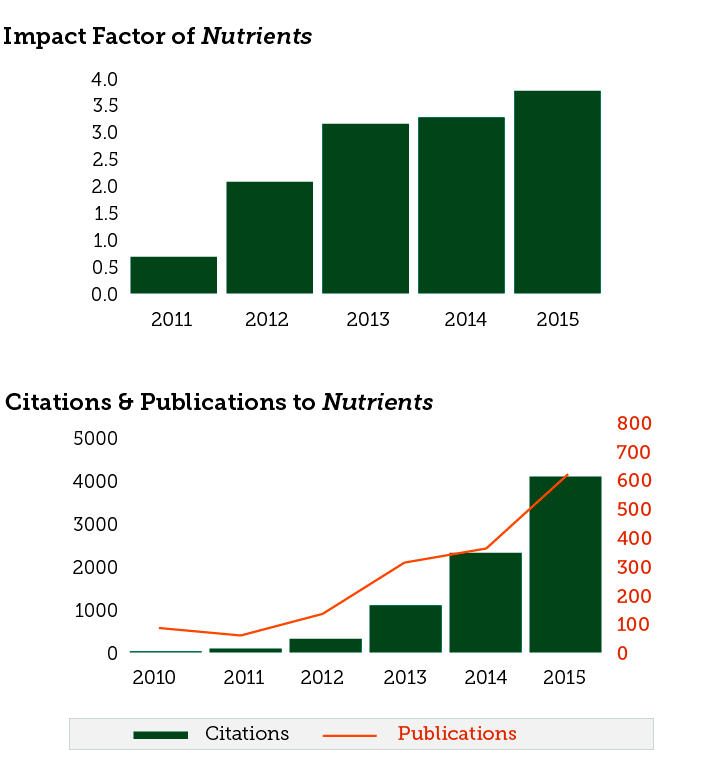
26 May 2016
Institutional Membership established with University of Bremen, Germany, Koç University, Turkey, IIASA, Austria and Jilin University and Kunming Institute of Botany, CAS, China
We are pleased to announce that the following institutions have joined MDPI's institutional membership program in May 2016:
- Unversity of Bremen, Germany
- Koç University, Turkey
- International Institute for Applied Systems Analysis (IIASA), Austria
- Jilin University, China
- Kunming Institute of Botany, Chinese Academy of Sciences, China
Authors affiliated with these institutions will benefit from a 10% discount on the article processing charges.
Additional details can be found on our institutional membership page.
23 May 2016
Institutional Membership Established with the KTH Royal Institute of Technology, Sweden and the South China University of Technology, Beijing University of Technology and Southern Medical University, China
We are pleased to announce that the following institutions have joined MDPI's institutional membership program in April and May 2016:
- KTH Royal Institute of Technology, Sweden
- South China University of Technology, China
- Beijing University of Technology, China
- Southern Medical University, China
Authors affiliated with these institutions will benefit from a 10% discount on the article processing charges.
Additional details can be found on our institutional membership page.
26 April 2016
New Section on www.mdpi.com - Latest Books
You may have noticed a new section that is now visible on our home page. This section is called "Latest Books" and showcases recent publications from MDPI Books, our book publishing service.
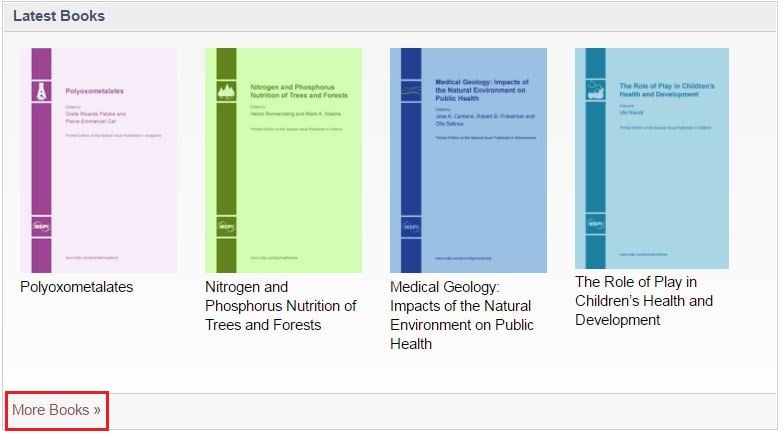
By clicking on the hyperlink "More Books" you will be taken to the MDPI Books Home Page. There you will find more information about the service, as well as the "Recent Publications" list.
Clicking on any of the book images in this list will take you to detailed information about that book (shown below). Here you can also download a PDF version of the book, or order a hardcover printed copy.
For further information about the MDPI Books service, please visit the webpage or contact books@mdpi.com.
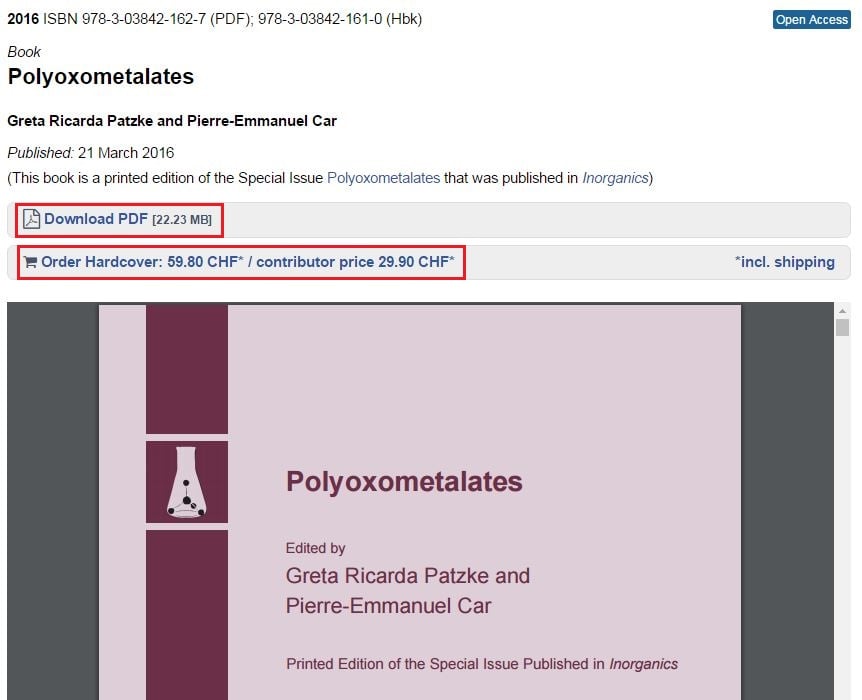
5 April 2016
Membership established with the Asia Pacific Nutrigenomics Nutrigenetics Organisation (APNNO)
We are pleased to announce that Asia Pacific Nutrigenomics Nutrigenetics Organisation (APNNO):
Primary authors from APNNO will benefit from a 25% discount on the article processing charges as of 1 April 2016.
Additional details can be found on our institutional membership page.
31 March 2016
Axioms, Behavioral Sciences, Photonics, Separations and Toxics added to the Emerging Sources Citation Index in Web of Science
We are pleased to announce that the journals Axioms, Behavioral Sciences, Photonics, Separations and Toxics were recently accepted for inclusion in the newly launched Emerging Sources Citation Index (ESCI) in Web of Science.
ESCI serves to highlight promising journals which are still under consideration for the Science Citation Index Expanded (SCIE) or the Social Sciences Citation Index (SSCI).
The Emerging Sources Citation Index (ESCI), Science Citation Index Expanded (SCIE), Social Sciences Citation Index
(SSCI), and Web of Science™ (WoS) are Thomson Reuters products.
30 March 2016
Institutional Membership established with the University of Winchester, UK, Silesian University of Technology, Poland and Beijing Jiaotong University and Zhejiang University, China
We are pleased to announce that the University of Winchester, UK, the Silesian University of Technology, Poland and Beijing Jiaotong University and Zhejiang University, China, have joined our Institutional Membership program. Primary authors from these universities will benefit from a 10% discount on article processing charges.
Additional details can be found on our institutional membership page.
24 March 2016
New Editorial Office in Barcelona, Spain
We are excited to announce the opening of our new editorial office in Barcelona, Spain. The launch team is led by a Senior Editor and comprises further staff holding doctoral degrees with several years of research experience. The new editorial team will help us to get closer to European research communities and progress Sciforum, the platform to support the scientific community via conference hosting and other functions. They will also help spread the word about Open Access and meet academics at scientific events.
We are in the process of hiring more doctoral and masters graduates to join the editorial team and welcome applications via jobs@mdpi.com. For contact details about the office, see our contact page.

22 February 2016
Membership Established with the Max Planck Society
We are pleased to announce that the Max Planck Digital Library (MPDL) has signed an agreement with MDPI to support authors associated with the Max Planck Society (Max-Planck-Gesellschaft). As of 22 February 2016, corresponding authors will receive full funding from the MPDL for articles published in MDPI journals, with a 10% discount applied to the Article Processing Charges. Additional details can be found at our institutional membership page.
Founded in 1948, The Max Planck Society is one of Germany’s leading research organizations, and is currently made up of 83 institutes conducting basic research in natural sciences, life sciences, social sciences and humanities. 18 Nobel laureates have emerged from its ranks of scientists and the society has more than 15,000 publications in scientific journals each year.
5 February 2016
Institutional Membership Extension: Wageningen University, CSIC, University of Zürich, ETH Zürich, University of Tübingen and Osnabrück University
We are pleased to announce that Wageningen University, the Netherlands, the Spanish National Research Council (CSIC), Spain, the University of Zürich and ETH Zürich, Switzerland, and the University of Tübingen and Osnabrück University, Germany, have not only renewed their institutional memberships with MDPI after two years of successful cooperation, but have also increased the reduction of the article processing charges (APCs) for affiliated authors to 25%.
Additional details can be found on our institutional membership page.
5 February 2016
Institutional Membership established with Brock University, Canada and the University of Pisa, Italy
We are pleased to announce that Brock University, Cananda, and the University of Pisa, Italy, have joined MDPI's institutional membership program: Primary authors from these universities will benefit from a 10% discount on the article processing charges as of 01 February 2016.
Additional details can be found on our institutional membership page.
25 January 2016
MDPI Sponsors diss:kurs with the University of Basel
MDPI is pleased to announce its newly established sponsorship of diss:kurs, an event coordinated by the University of Basel to support their doctorate program. For more information about the event and how to register, please visit the diss:kurs webpage.
7 January 2016
New Institutional Memberships Established with Tsinghua University, the Chinese Society of Micro-Nano Technology, Ruhr University Bochum and the University of Ulm
We are pleased to announce that the following institutions have joined MDPI's institutional membership program as of 1 January 2016:
- Tsinghua University, China
- Chinese Society of Micro-Nano Technology (CSMNT)
- Ruhr University Bochum, Germany
- University of Ulm, Germany
Authors affiliated with these institutions will benefit from a 10% discount on the article processing charges.
Additional details can be found on our institutional membership page.
5 January 2016
Safety, Fermentation, C-Journal of Carbon Research, Magnetochemistry, Batteries and Horticulturae Released Their First Issue in December 2015
We are pleased to announce that MDPI's open access journals Safety, Journal of Imaging, Fermentation, C-Journal of Carbon Research, Magnetochemistry, Batteries and Horticulturae released their first issue at the end of December 2015.
17 December 2015
Institutional Membership Extension: University of Bern, Switzerland
We are pleased to announce that the University of Bern, Switzerland has not only renewed their institutional membership with MDPI after two years of successful cooperation, but also increased the reduction of the article processing charges (APCs) for affiliated authors to 25%.
17 December 2015
Institutional Membership with the University of Ulm and Helmholtz Zentrum Munich
We are pleased to announce that University of Ulm, Germany and Helmholtz Zentrum Munich, Germany has joined MDPI's institutional membership program:
Primary authors from the University of Ulm and Helmholtz Zentrum Munich will benefit from a 10% discount on the article processing charges as of 1 January 2016. Additional details can be found on our institutional membership page.
9 December 2015
Membership Established with the Virginia Polytechnic Institute and State University (Virginia Tech)
We are pleased to announce that Virginia Tech has joined MDPI's institutional membership program. Authors from Virginia Tech will benefit from a 10% discount on the article processing charges as of 1 December 2015. Additional details can be found on our institutional membership page.
1 December 2015
Membership Established with the Technical University of Denmark and the University of North Florida
We are pleased to announce that the following universities have joined MDPI's institutional membership program:
- Technical University of Denmark (as of 1 November 2015)
- University of North Florida, USA (as of 15 November 2015)
Primary authors from the Technical University of Denmark and the University of North Florida will benefit from a 10% discount on the article processing charges.
Additional details can be found on our institutional membership page.
2 October 2015
Membership Established with the University of Freiburg and the University of Regensburg
We are pleased to announce that the following universities have joined MDPI's institutional membership program:
University of Freiburg, Germany
University of Regensburg, Germany
Primary authors from the University of Freiburg and the University of Regensburg will benefit from a 10% discount on the article processing charges as of 1 October 2015 and 1 November 2015.
Additional details can be found on our institutional membership page.

30 September 2015
Associate Editors
Nutrients is pleased to announce that four members of the Editorial Board have been appointed to the position of Associate Editor. The appointees are Dr. Cindy Davis from the Office of Dietary Supplements at the National Institutes of Health, Professor Antonio Ferrante from the Children's Research Centre at the University of Adelaide, Professor Trevor Mori from the School of Medicine and Pharmacology at the University of Western Australia and Professor Susan Whiting from the College of Pharmacy and Nutrition at the University of Saskatchewan. With its impact factor continuing to increase Nutrients has been receiving an increasing number of submissions and the appointment of these Associate Editors, who bring a wealth of experience and expertise to the positions, will assist the journal in continuing to increase the quality of its publications and its impact within the field of Nutrition research.
19 June 2015
Updated Impact Factor for Nutrients – 3.270
We are pleased to report the 2014 Impact Factor for Nutrients. According to the 2015 release of the Journal Citation Reports® Science Edition (published by Thomson Reuters in June 2015), the updated Impact Factor for Nutrients is 3.270. The 5-Year Impact Factor is 3.671. Nutrients now ranks 21/77 (Q2) in the category ‘Nutrition & Dietetics’.
Evolution of the Nutrients Impact Factor:
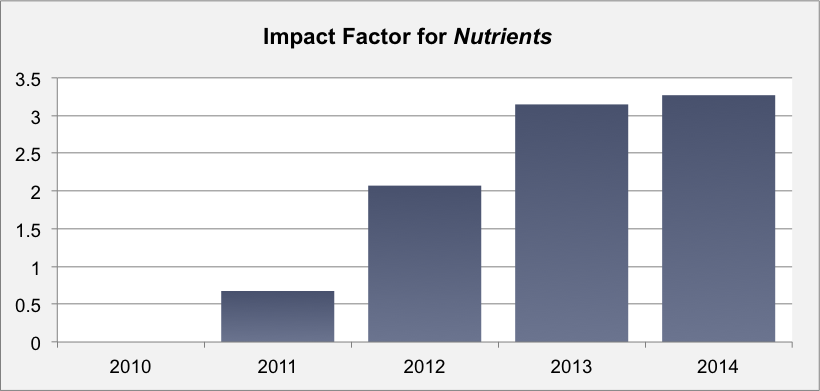
Evolution of citations to Nutrients:
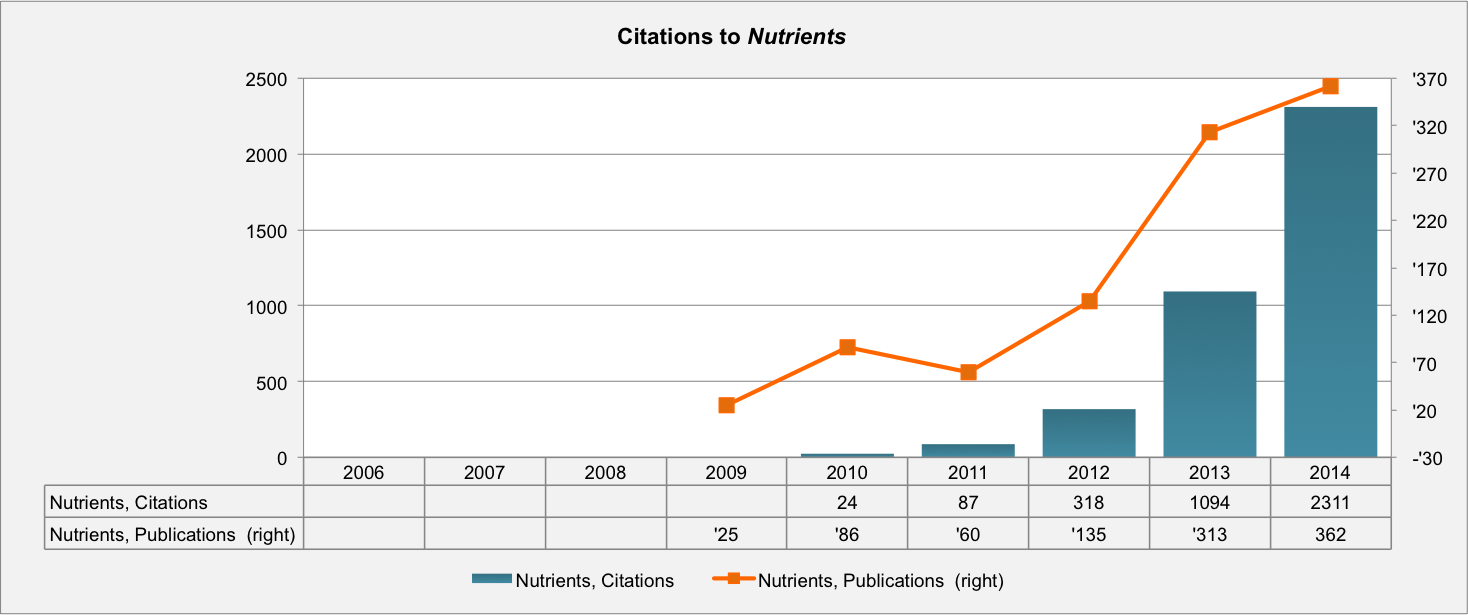
18 February 2014
Editorial Statement - Nutrients 2013 Progress Report
Nutrients would like to share with our readers some encouraging statistics on the journal’s progress through 2013.
- We received 586 submissions in 2013; 303 were published. The rejection rate was 44%.
- The publication rate was a substantial increase compared with 134 published in 2012 and 58 in 2011.
- 48% of the articles published in 2013 were original research articles and 48% reviews. Their countries of origin are illustrated below.
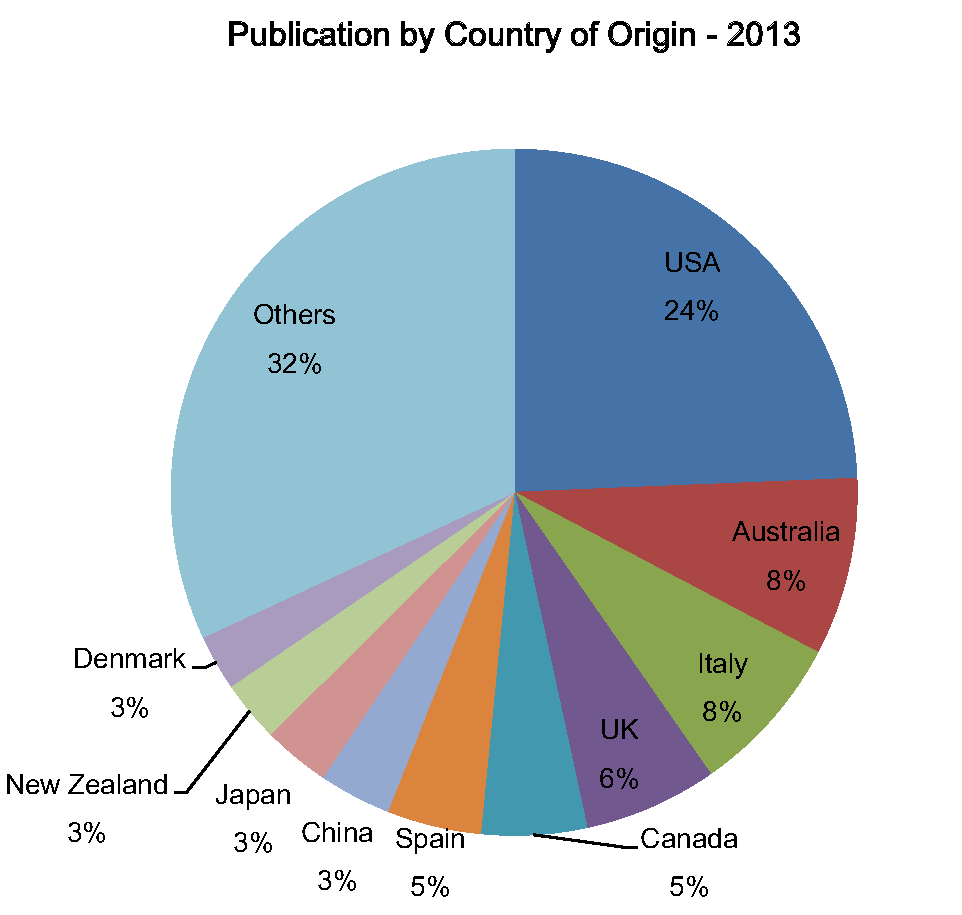
- Almost half of these articles were published in the following special issues:
- “Nutrition and the Eye” edited by Drs Frank Eperjesi, Hannah Bartlett (11 articles published)
- “Polyphenols and Human Health” edited by Dr Winston Craig (9 articles published)
- “Nutrients and Immune Function” edited by Drs Alma Nauta, Johan Garssen (11 articles published)
- “Dietary Fiber and Nutrition” edited by Dr Nancy Turner (8 articles published)
- “Dietary Iron and Human Health” edited by Dr Mitchell Knutson (14 articles published)
- “Vitamin D and Human Health” edited by Dr Simon Spedding (22 articles published)
- “Nutrition and Respiratory Disease” edited by Dr Lisa Wood (10 articles published)
- “Vitamin B12 and Human Health” edited by Dr Kristina Pentieva (7 articles published)
- “Nutrition and Infectious Diseases” edited by Dr Mark Kuhlenschmidt (5 articles published)
- “Chocolate and Cocoa in Human Health” edited by Dr Margarida Castell (8 articles published)
- “Vitamin C and Human Health” edited by Drs Anitra Carr, Margreet Vissers (10 articles published)
- “Nutrition and Celiac Disease” edited by Drs Carlo Catassi, Alessio Fasano (19 articles published)
- “Vitamin A and Carotenoids” edited by Drs Loredana Quadro, William Blaner (10 articles published)
- “Nutrition and Neuroscience” edited by Dr Kevin Laugero (3 articles published)
- The average time from first submission to publication was 95 days.
- Nutrients’ manuscripts were accessed on-line 191835 times. Over 30% of these were from the USA.
- Importantly, there were 149067 full text downloads from the MDPI website.
- Our citation rate continues to rise rapidly (89 citations in 2011, 330 in 2012, over 1000 in 2013)
- Nutrients’ Impact Factor has increased consistently from 0.676 in 2011 to 2.072 in 2012. The 2013 Impact Factor is likely to exceed 3.
We would like to thank our readers for their continuing interest and support which has enabled Nutrients to make great progress in its first four years. We also acknowledge the efforts of our Editorial Board members, those who have guest edited our special issues and the many expert reviewers who have so generously, often repeatedly, given their valuable time to ensure the quality of our publications. We trust that Nutrients will continue to fulfil a need for on-line, open access scientific communication in your field and we hope that we can expand this role by encouraging the promotion and reporting of conferences and other relevant events through the Nutrients website.
Peter Howe & Jonathan Buckley








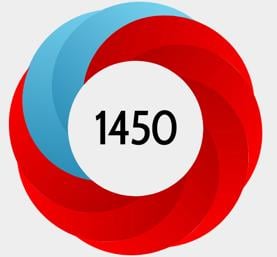




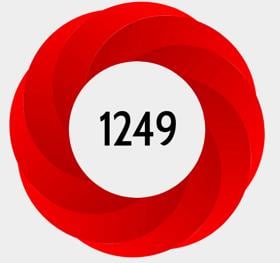
















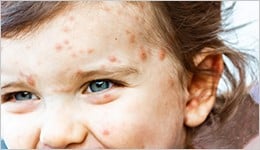

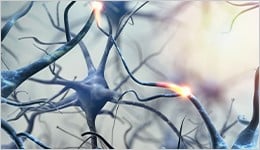
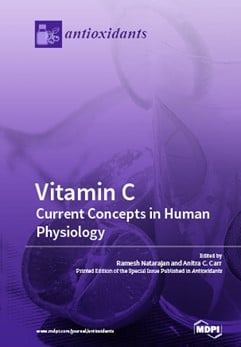
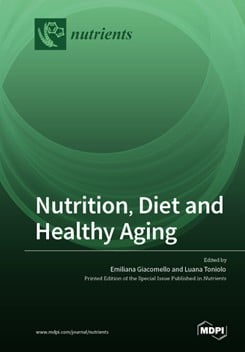
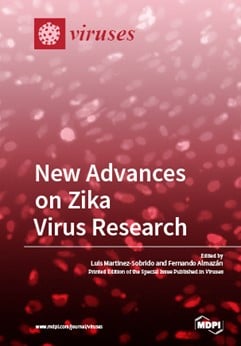
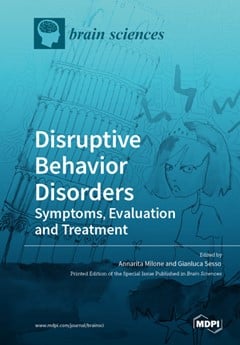























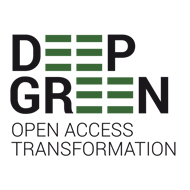
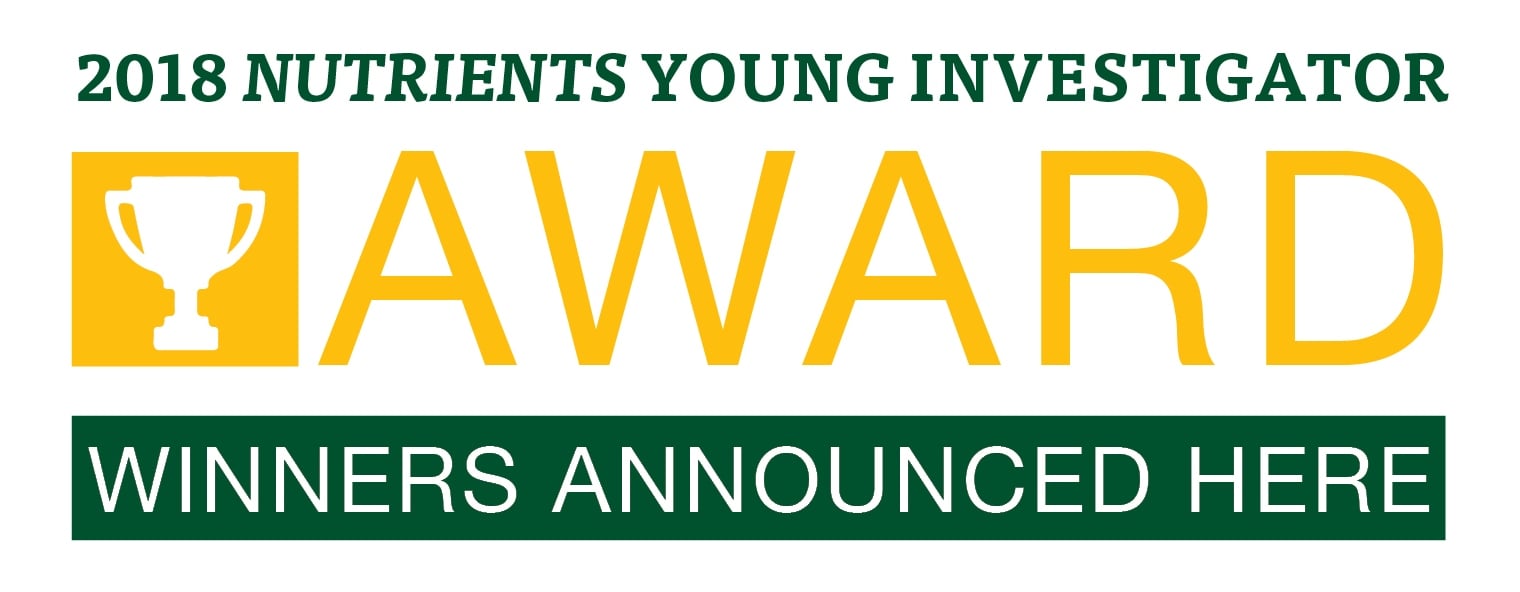








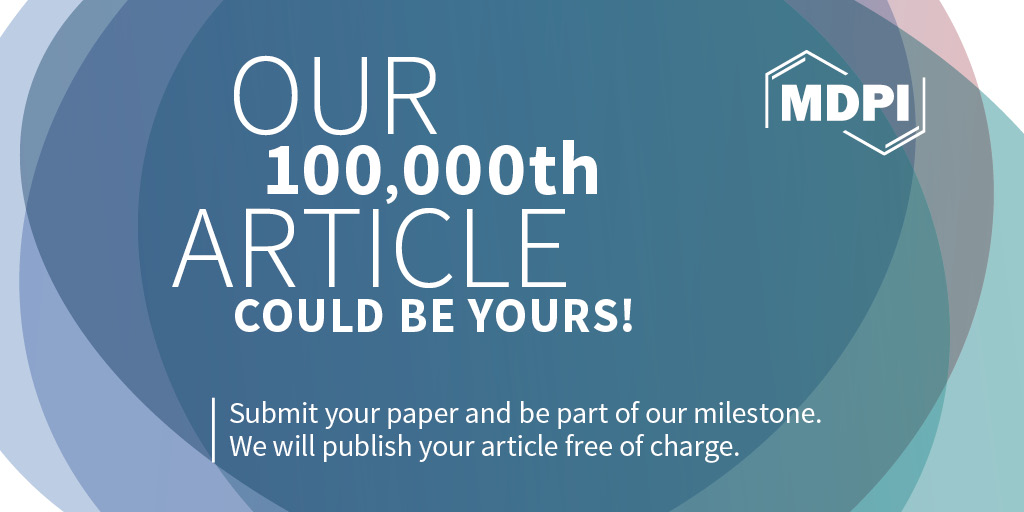




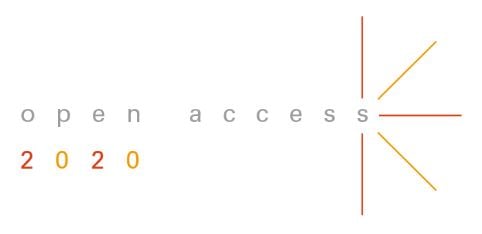









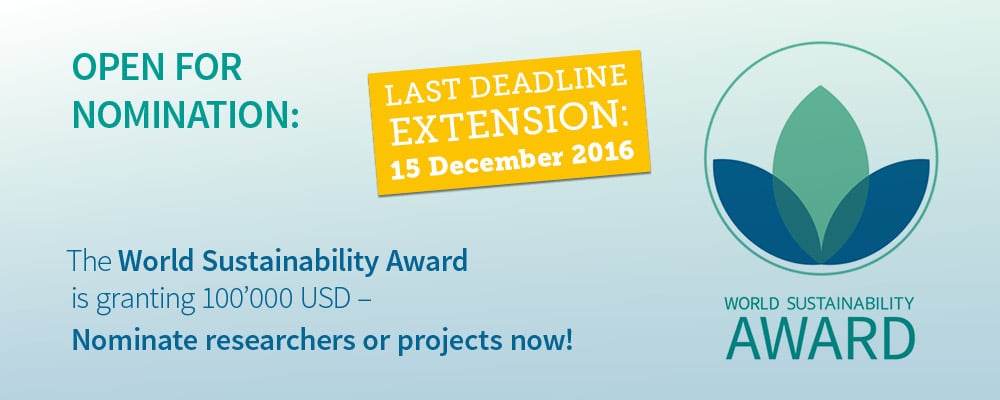



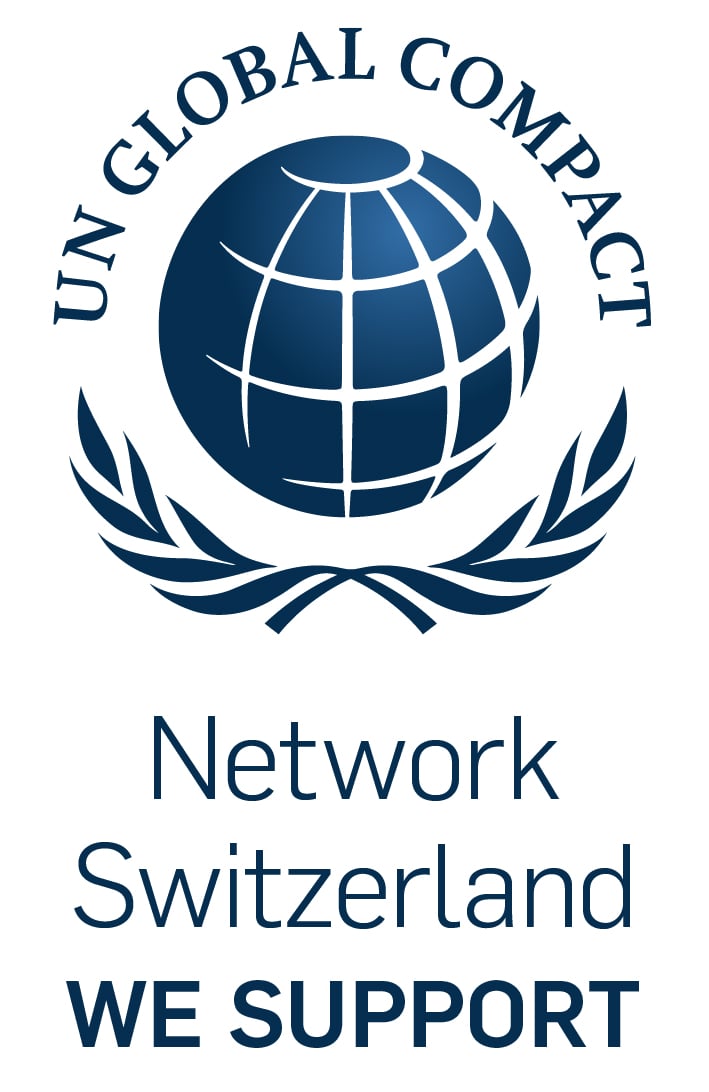
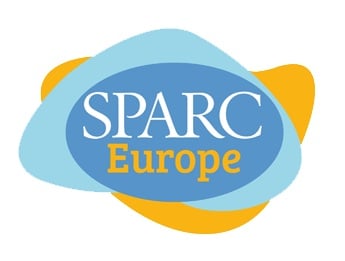
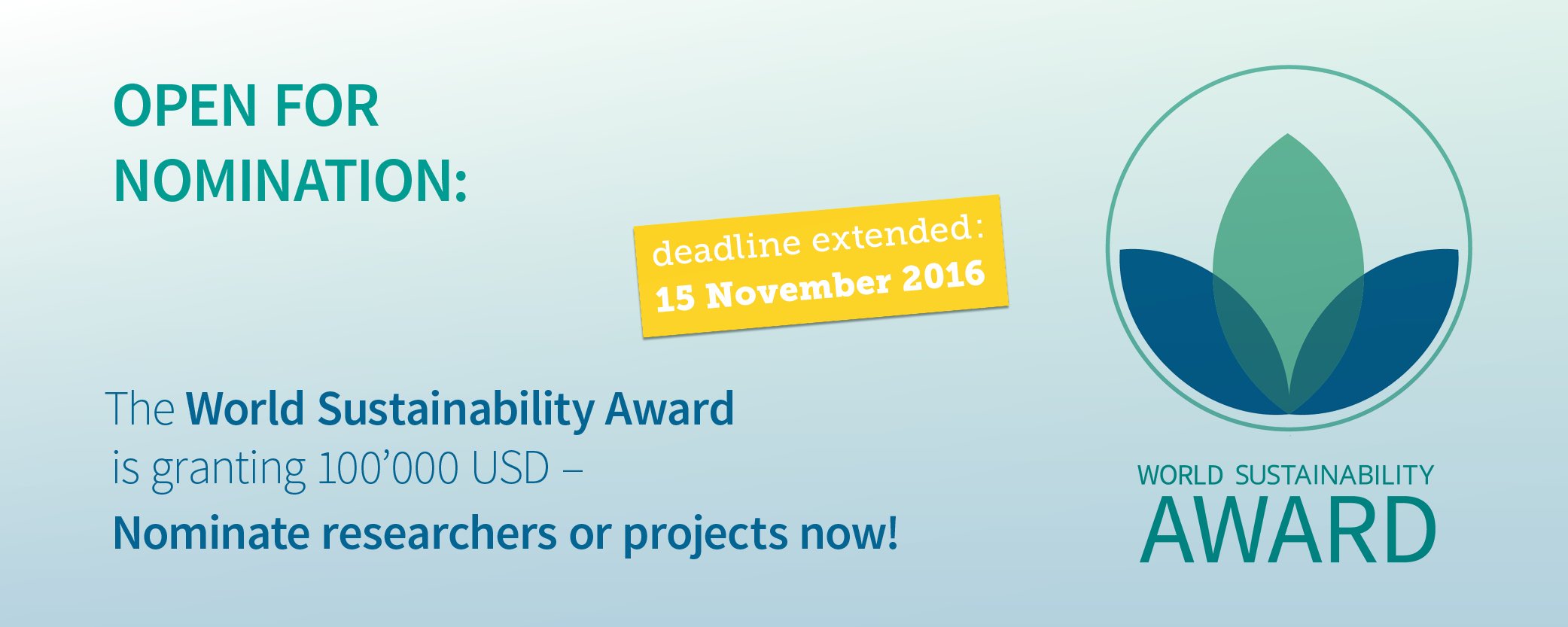 .
.
